Weekly Writing Summary For The Week Ending 02/26/2026
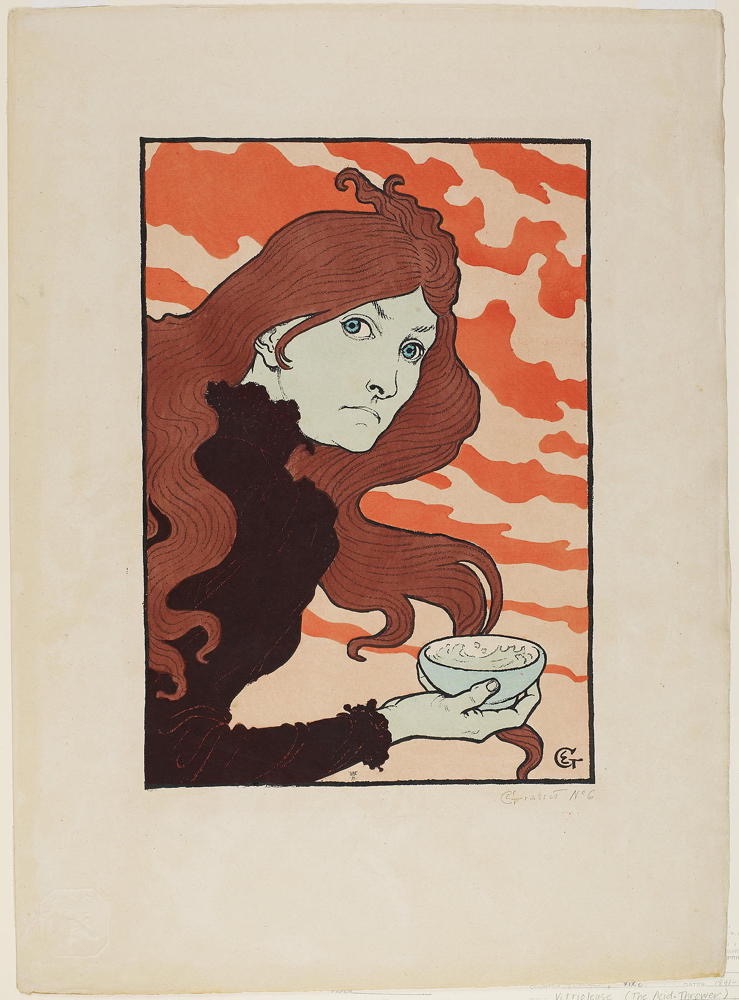
Eugène Samuel Grasset: Vitrioleuse (The Acid Thrower) (1894)
This writing week found me entering the final third of this series. The first third always finds me struggling to understand what in the heck I’ve gone and gotten myself into. The second third, a more comfortably consistent theme emerges. The final third serves as the most masterful portion of the investigation. I’m finally feeling comfortable in my Unscrolling skin. I have been discovering and somehow managing to express my abiding intentions. Even rough starts can become smooth landings.
I began this writing week reporting on how social media seems to be very skilled at BreakingNews.
InstantaneousExpertise

Unidentified Artist::
Nuestra Señora de Belén con un retrato de donante indígena
Our Lady of Bethlehem with Portrait of an Indigenous Donor
(18th century)
Nuestra Señora de Belén, a patron saint of the city of Cuzco, Peru.
Convent of Santa Clara.
"We should be justly proud of our accomplishments…"
Social Media has introduced the greatest volume of instant experts in the history of this universe. Before, expertise came through patient practice, sometimes through apprenticeships. It might take decades before a novice could be properly considered to be an expert, even in their own mind. Now, a simple search can place the apparent wisdom of the ages in the palm of one’s hand. This does not even require a lengthy attention span. One might be wise to question such easily acquired skills, but such commodities have come into common commerce now. Any conversation, especially one with even the sparest hint of controversy, will attract at least one offering their well-intended InstantaneousExpertise.
The internet exists as a most convincing collection of seemingly everything.
Tribes

Ernst Ludwig Kirchner: Modern Bohemia (1924)
"It might not yet be too late to choose another fate."
Modernity has been a concerted move away from the tribal toward the more universal. Equality, fraternity, and liberty were impossibilities as long as some people were considered naturally better than others. Of course, conservatives always faunched at these aspirations, for they believed tribal identities had been bestowed by God. Which God was beside the point because each tribe firmly believed that only their God was legitimate, and the rest were clearly pretenders or outright frauds. Secular societies were unprecedented two hundred and fifty years ago. It seemed for a time that the secular would surely succeed where kings and commissars had failed, but then the ultimate level playing field arrived, dragging social media behind it, and we commenced to re-fragment.
The tribes became almost immediately self-evident.
FakeNews

Elihu Vedder: The Fates Gathering in the Stars (1887)
ABOUT THIS ARTWORK
Elihu Vedder depicted the three Fates of Greek mythology working the thread of life: Clotho spins the thread, Lachesis fixes its length, and Atropos cuts it at the appointed time of death. Their symbolic tools—spindle, distaff, and shears—rest in the foreground, emphasizing the Fates’ decisive role in matters of life and death. Vedder adapted this painting from an illustration he had designed for an 1884 publication by Edward FitzGerald—a translation of the work of 11th-century poet Omar Khayyám, The Rubáiyát. Vedder was attracted to mysterious, visionary subject matter. Here, he explored metaphysical questions of life, death, and afterlife, subjects at the core of Khayyám’s poetry.
"If its content was all proven to be true, it couldn't draw a respectable crowd."
Social media has been the playing field upon which the whole concept of FakeNews proliferated into the baseline reality it has come to be today. Our incumbent rode FakeNews’ coattails into high office, where he employed this once fringe concept to utterly debase our federal government. He dealt almost exclusively in confounding paradoxes, playing the role of the barber who shaves all the men, and only the men, who don’t shave themselves. His every utterance double-bound. It was eventually inevitable that he never once committed a truth, and yet he still managed to get himself re-elected. This astounding result describes the curious power FakeNews wields. It also might explain the ever-burgeoning popularity social media continues to enjoy.
You might have thought that any media so infused with falsity would have been swiftly abandoned, but this has not proven to be the case.
VastWasteland
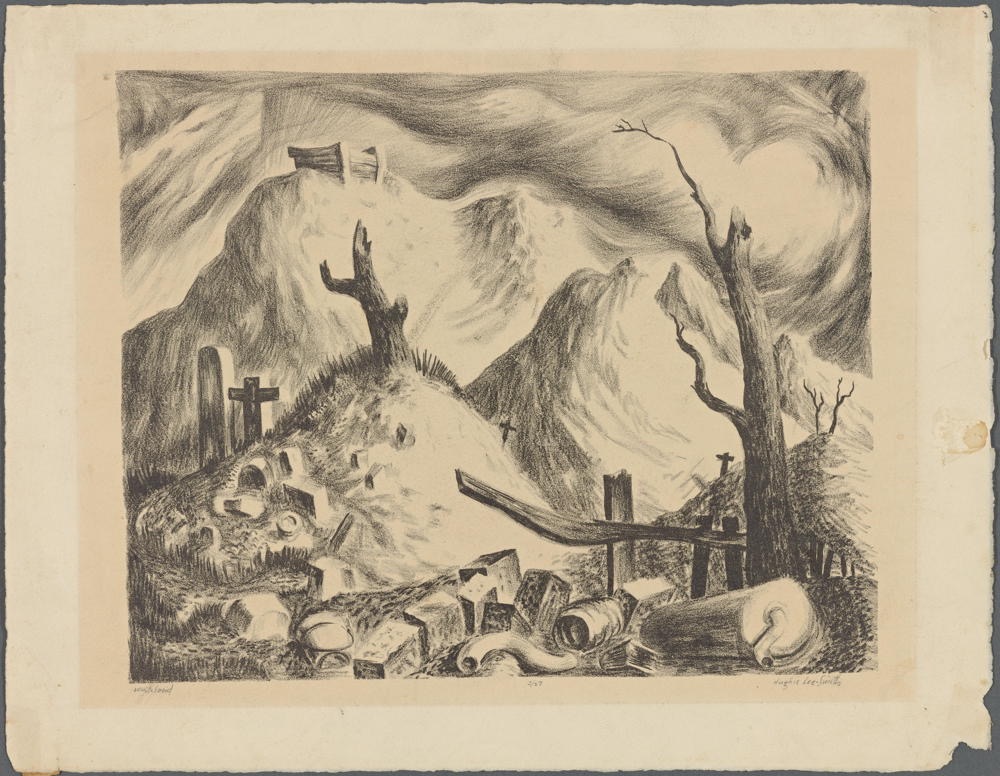
Hughie Lee-Smith: Wasteland
Works Progress Administration (WPA) Art
United States. Works Progress Administration (Sponsor)
(1939)
Schomburg Center for Research in Black Culture, Art and Artifacts Division, The New York Public Library. "Wasteland" New York Public Library Digital Collections. Accessed February 23, 2026. (https://digitalcollections.nypl.org/items/ccb33860-fe37-0131-598a-58d385a7b928)
“…probably damned whatever we choose to log into.”
The great American public has always strongly preferred VastWastelands as our sources of entertainment. We have never been all that high-minded. Sure, there have always been pockets of actual culture lurking around the margins of our society, but we’ve only rarely allowed that culture to dominate our leisure. In Frontier America, the tavern attracted more patrons than any theater, fistfights always had more witnesses than did concerts, and even public hangings were generally judged superior uses of time to any alternative. It was no surprise when the marvel of broadcast radio, then television, quickly turned into just another VastWasteland. We should express no less surprise as we realize that we’ve just gone and done it to ourselves again. Social media might be best understood and acknowledged to be the latest instantiation of humanity’s longest-lasting tradition, for we have also transformed what might have been the highest of high culture into another rather run-of-the-mill VastWasteland.
I won’t bemoan this outcome, but merely acknowledge it.
FutileResistence

Gustave Moreau: Jacob and the Angel (1874-1878)
"At least there's no toll taker, trying to assess me for roaming now."
I have a long and perhaps overproud history of resisting technological change. I have not yet successfully completed the leap from analogue to digital, and I not so secretly hope never to fully consummate that leap. When cell phones first came into fashion, my partners forced one onto me. I was never able to complete a call. I’d try, but get no further than some toll collector who’d explain that I was roaming. Roaming was apparently a minor felony punishable by an immediately calculated and extracted financial penalty. This served as a necessary gate through which a caller had to pass to successfully connect. I’d declined the invitation and go find some landline payphone to complete the connection. My partners insisted that the phone would prove to be convenient, though it never once was.
Later, once that technology had advanced beyond the roaming phase, The Muse leased an early model of a smart smartphone.
BreakingNews

Harold Edgerton: Hammer Breaking Glass (1933)
"This future sure seems unduly fragmented."
I find myself almost exclusively turning to social media for my BreakingNews. I haven’t tuned into a local television news broadcast in nearly five years. I don’t have access to CNN, Fox, or MS-Now on TV, or even access to the network television news broadcasts. I will, on occasion, still tune into NPR if I’m near a radio when news breaks, but I have been increasingly bee-lining to my social media feeds when I catch a whiff of something important occurring. I most often get those whiffs from my social media feeds, too, though I’ve grown increasingly cautious. The proliferation of deepfakes there means that I often check the credibility of the URL behind whatever seems to be breaking. I, sadly, often find the questioned URL carrying the BreakingNews to be broken.
The news itself seems broken by social media.
Weekly Writing Summary For The Week Ending 02/19/2026

Étienne Claude Voysard: Printemps [Spring] (18th century)
This writing week saw the tone of this series shift from the personal toward the more general. I began following the jury trial of Meta and YouTube, who have been accused of trading in products harmful to children, from in here to out there. Out there, the world seems fairly preoccupied with presumptions about itself, notions not yet quite proven by experience or validated by science. We seem to be passing through an initiation with the outcome not yet certain.
I began by noting how large companies tend to come in only one of two flavors: Boobs or Sonsabitches.
BigMan
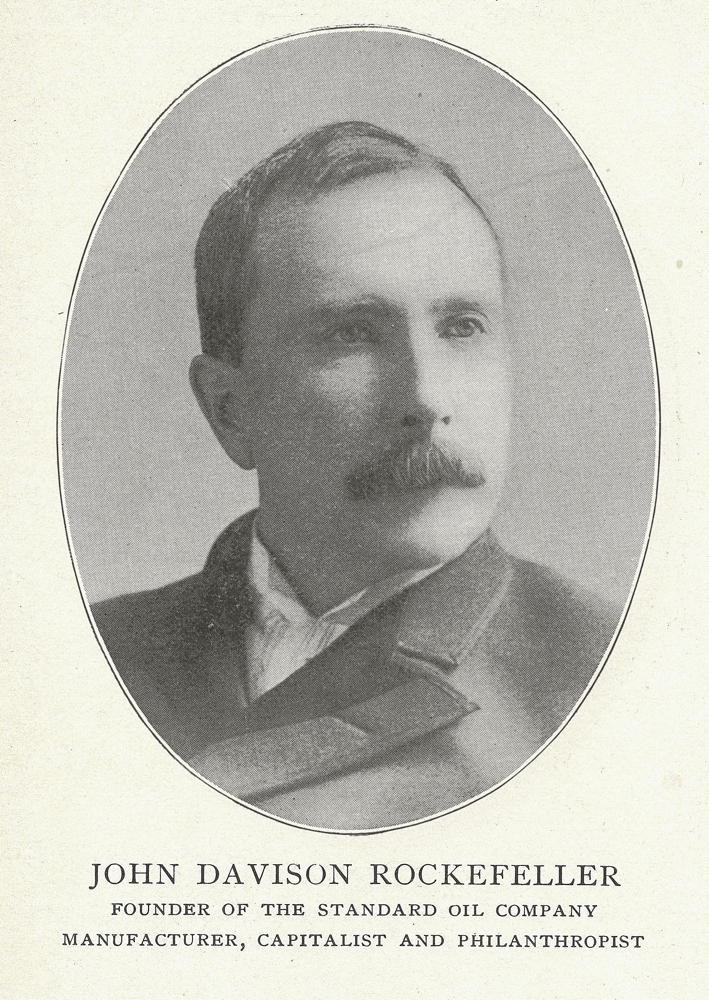
Moses King, Compiler & Publisher: John Davison Rockefeller (1899)
Irma and Paul Milstein Division of United States History, Local History and Genealogy, The New York Public Library. "John Davison Rockefeller" New York Public Library Digital Collections. Accessed February 19, 2026. (https://digitalcollections.nypl.org/items/87f79b40-86d4-0131-769f-58d385a7b928)
“The value of its services explains why so many use them so much, not ‘clinical’ addiction.”
The bellwether trial involving Meta and YouTube eventually reached the point where the BigMan was called as a witness. Mark Zuckerberg serves as the BigMan this time, in the same role that a long succession of big men served before. John D. Rockefeller was as nasty a competitor as was ever born, though he managed to soften his image later in life, after he’d shrunken, by handing out dimes to street urchins while delivering little sermons of something he never mastered himself: thrift. Andrew Carneigy was an equally heartless capitalist before he chose to donate much of his ill-accumulated wealth in the form of libraries, generating great goodwill. Zuckerberg’s not yet achieved sufficient dottage to be seen as a benefactor, though I’m sure he contributes plenty to various charities, none of them amounting to anything threatening his personal billions.
It’s a tough time to be an oligarch.
InternetSmart
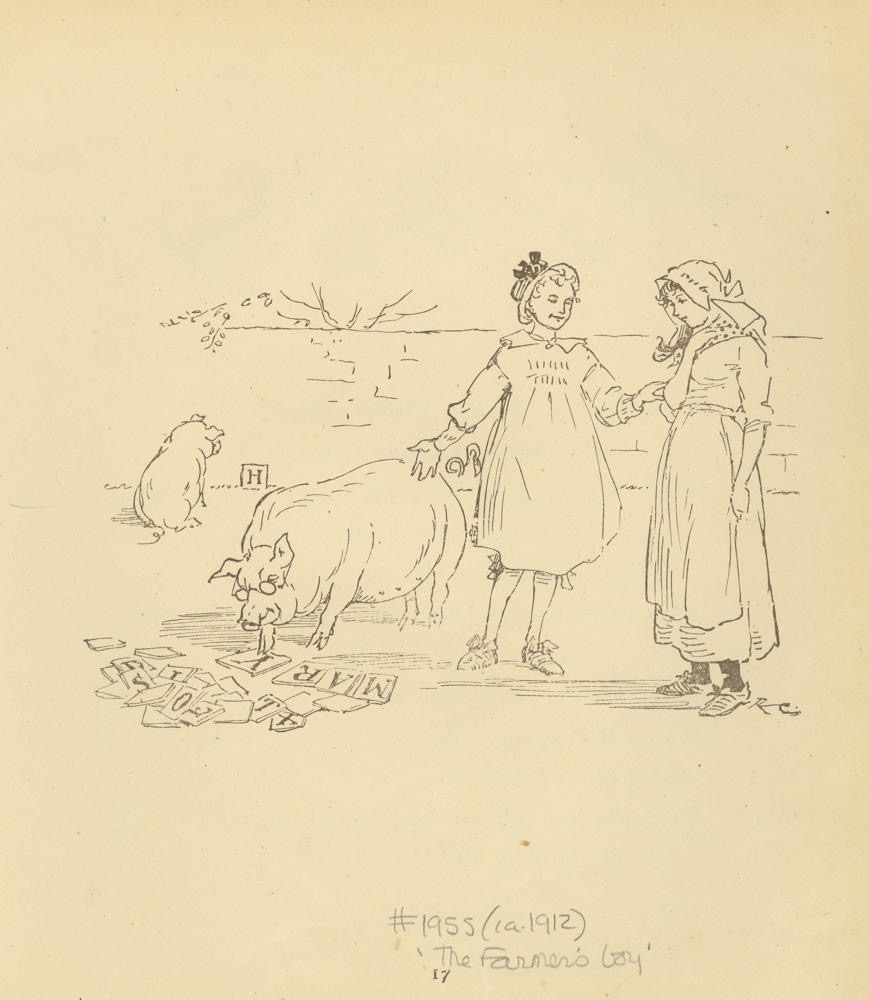
Unknown Artist: A smart pig—Caldecott -- Farmer's boy (1912)
The Miriam and Ira D. Wallach Division of Art, Prints and Photographs: Picture Collection, The New York Public Library. "A smart pig" New York Public Library Digital Collections. Accessed February 18, 2026. (https://digitalcollections.nypl.org/items/b197e850-c5bb-012f-0e24-58d385a7bc34)
"…repeated social media use has introduced a much broader swath of the population to this sort of experience than has previously existed."
Our continued compulsive use of social media probably produces several secondary outcomes. I might scroll for distraction, entertainment, or information, but once subject to so much visual and auditory experience, I very likely absorb stuff without being totally aware of what. Social media seems to have been largely constructed out of memes, imitation genes. These tend to be visual and verbal summarizations, shortcut representations capable of transferring some semblance of understanding without much in the way of scholarship or studying, resulting in knowledge perhaps best described as iconic. The goodness or badness of whatever’s so represented almost always seems obvious. Memes accumulate like strings of very limited knowledge, often knowledge without any underlying understanding. Ideas seem like things, easily, even preconsciously classified, and recalled with such immediate dexterity that they manifest without much in the way of questioning accompanying.
This largely visual learning process mimics how one adopts prejudice.
HabitAddict
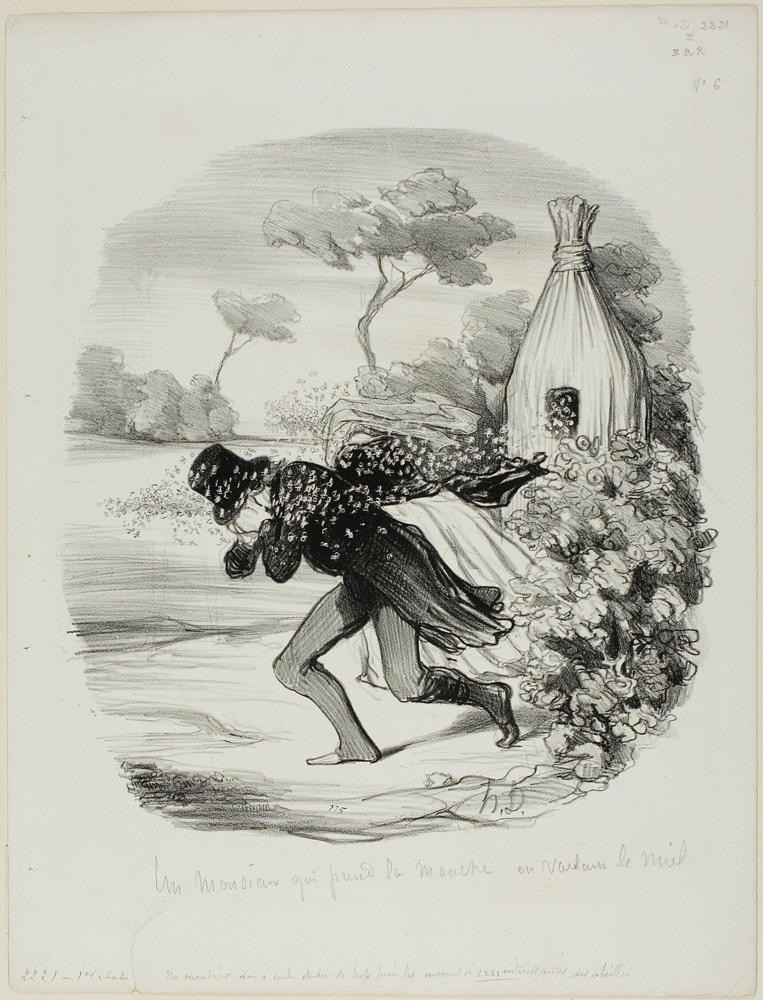
Honoré Victorin Daumier:
A Gentleman Who Wanted to Study the Habits of Bees too Closely,
plate 6 from Pastorales (1845)
"I'm just not complying with their wishes at the moment."
"It is fascinating that so many Instagram users believe that they are addicted when, according to clinical criteria, the risk of addiction is relatively rare." [Anderson, I.A., Wood, W. Overestimates of social media addiction are common but costly. Sci Rep 15, 39388 (2025). https://doi.org/10.1038/s41598-025-27053-2]
The science assessing social media use does not appear to have entered its infancy yet.
SpecificRisks

Lewis W. Hine:
Making Apparatus for Laboratory, Glass Works, New Jersey (c. 1937)
"This world remains in flux."
The European Commission recently found that TikTok’s addictive design appears to be in breach of the Digital Services Act, a landmark 2022 legislation designed to create a safer digital space by enforcing accountability, transparency, and user safety on online platforms, social media, and marketplaces. It mandates content moderation, bans certain targeted ads, and imposes severe penalties for non-compliance, with special obligations for “Very Large Online Platforms” (VLOPs). VLOPs can be assessed up to 6% of their total gross annual revenue for violating the Act. This announcement must have sent chills up whatever passes for spines in the Googles, Facebooks, and TikToks of this world.
These findings are not based upon a single study, but upon interpretations of several inquiries and formal studies performed with varying degrees of rigor.
UnusualConvergences
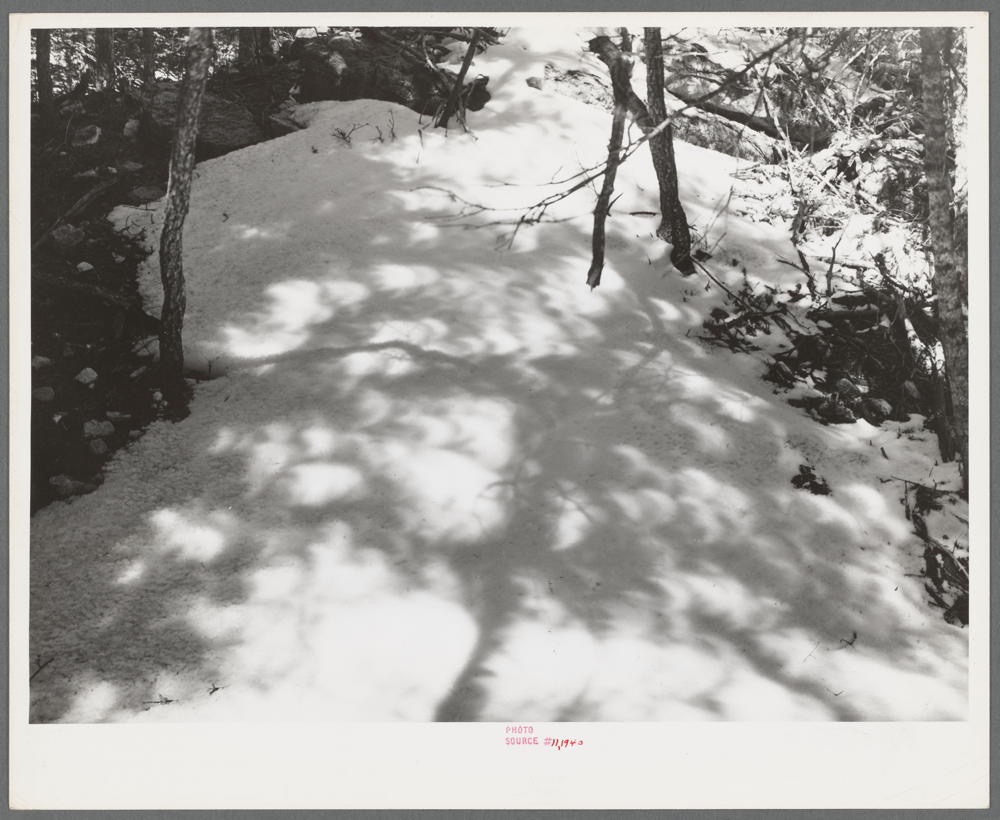
Russell Lee: Shadows on the snow in the mountains in Bernalillo County, New Mexico. The unusual crescent shaped light in patches in the shadows were caused by the eclipse of the sun (04/1940)
United States. Farm Security Administration (Sponsor)
The Miriam and Ira D. Wallach Division of Art, Prints and Photographs: Photography Collection, The New York Public Library. "Shadows on the snow in the mountains in Bernalillo County, New Mexico. The unusual crescent shaped light in patches in the shadows were caused by the eclipse of the sun" New York Public Library Digital Collections. Accessed February 15, 2026. (https://digitalcollections.nypl.org/items/ba84e0f0-4993-0137-010c-2971ff3091f6)
"We have become our own foreign adversary now."
Scrolling has seemingly suddenly taken an historically outsized role in current affairs. Hardly a newspaper can be published without some story harkening into some aspect of social media. Our president uses his own private social media platform as the primary conduit for disseminating government information. True to its social media nature, much of that information amounts to deliberate mis- and disinformation. In 2024, Congress passed, and President Biden signed into law, the Protecting Americans from Foreign Adversary Controlled Applications Act (PAFACAA). It was intended to address national security concerns regarding TikTok’s ownership by the Chinese company ByteDance. The act identified some critical risks that they insisted necessitated a forced sale or ban of the platform.
Congress feared that the Chinese government might employ its national intelligence laws to compel ByteDance to share so-called sensitive personal data of more than 170 million American users, including location and biometric identifiers.
Boobs&Sonsabitches
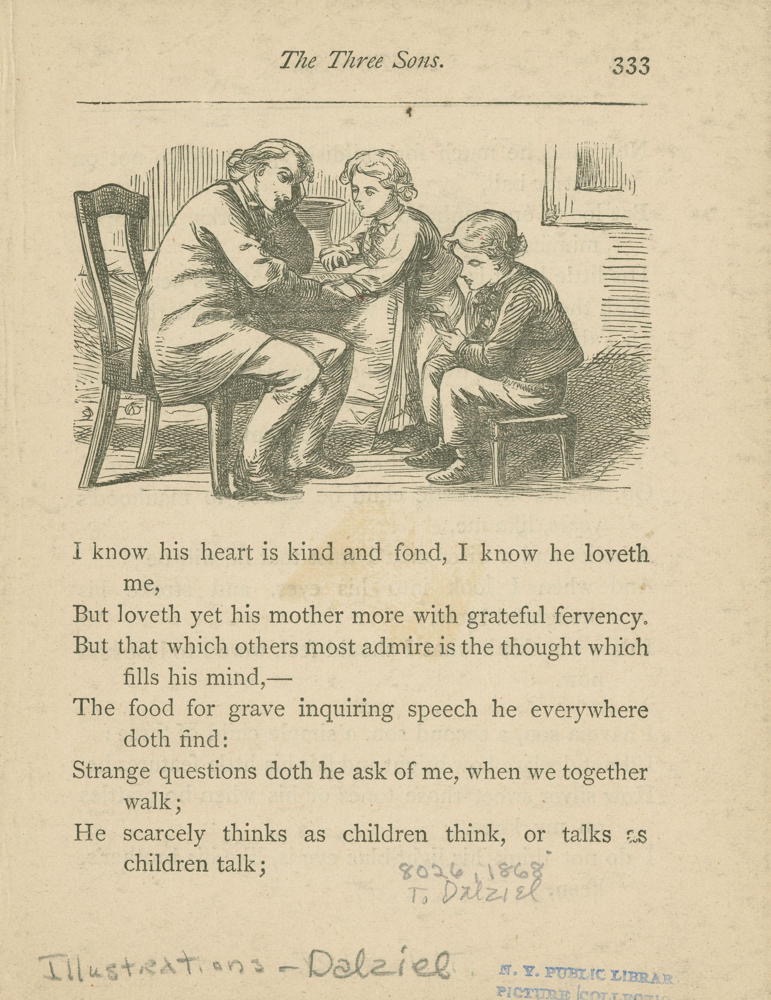
Thomas Bolton Gilchrist Septimus Dalziel:
Illustration of "The three sons" by poet John Moultrie (1868)
The Miriam and Ira D. Wallach Division of Art, Prints and Photographs: Picture Collection, The New York Public Library. "The three sons." New York Public Library Digital Collections. Accessed February 14, 2026. (https://digitalcollections.nypl.org/items/faee0690-c5bb-012f-199f-58d385a7bc34)
"These are who we’ve entrusted our precious attention spans to."
Who are these people we so easily entrusted with our precious attention spans? Most of us had no clue how precious our attention spans might have always been until technology made it practical to distract them. But even given that technology made mass distraction a practical possibility, who might find tapping into that an attractive occupation? Cue the thoroughly modern corporation. Such an occupation seems to demand a certain sense of presumption beyond what any technological capability might impart. A sense of privilege and self-possession might enable one to engage in any of the snoopier professions. One spies on lesser beings, not on equals; on fools. One must identify as a spy, an occupation that hardly lends itself to gentile persuasion. One lurks, often under misleading pretenses, and draws attention away from one’s actual operations. The providers of such services tend to grant themselves expansive labels: Meta, Google, Amazon, and X come readily to mind, names that provide little hint at what might pass for day-to-day operations going on under their hoods, but hint at the enormous and infallible.
They seemed the very soul of accommodating at first.
Weekly Writing Summary For The Week Ending 02/12/2026
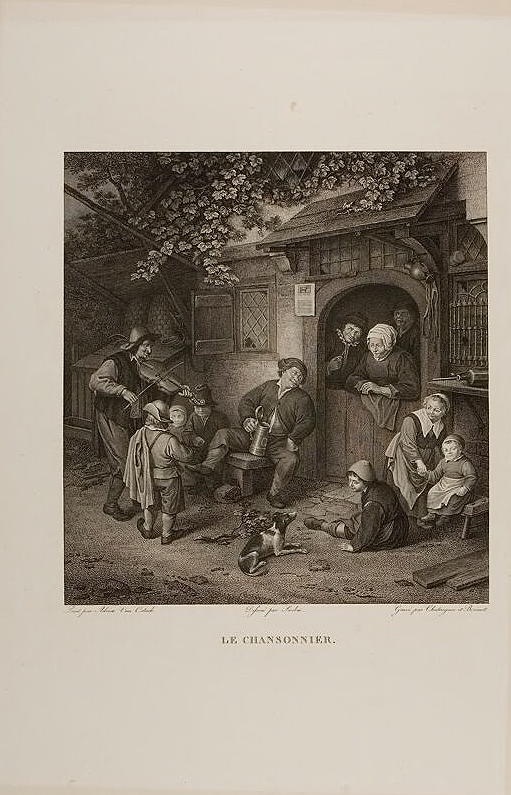
Alexis Chataigner: The Ballad Writer (19th century)
At the start of every writing week, I wonder what might rise to any level of importance that would warrant writing about it. This world has thus far been benevolent in that respect. I daren’t second-guess or stiff-arm whatever might manifest, lest I jinx the whole operation. This writing week turned out no different—a faith-based initiative executed by someone not necessarily infused with faith. I never know until I post, and often not even then, if I’m being true to my intentions and moving this curious ball further afield. I strongly recommend to anyone who might be interested that they consider becoming anything other than a writer, but if they choose writing—or writing chooses them—to befriend that urge. It’s either friend or enemy, neither obviously.
I started this writing week trying to distinguish between real and “Reel” life, not entirely successfully.
Predation
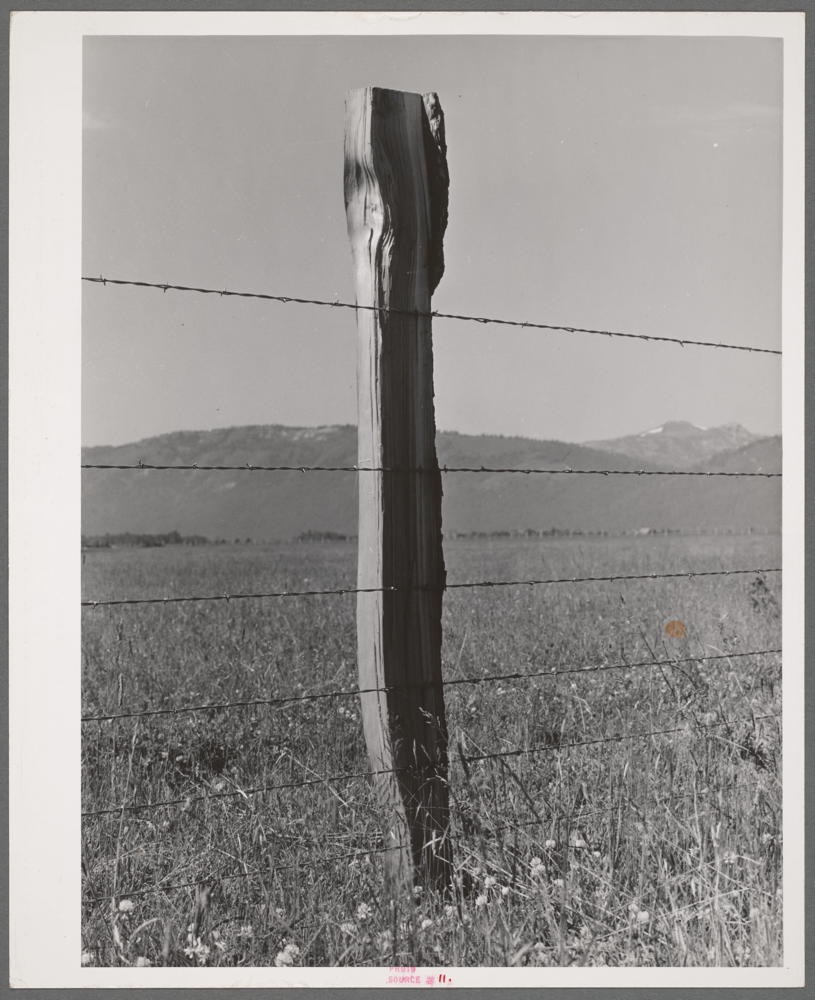
Russell Lee: Fence on Cruzen Ranch. Valley County, Idaho. AAA (Agricultural Adjustment Administration) has painted out this fence as being an outstanding type for ranch use. It keeps out predators (wolves, etc.), the wire is stapled loosely to allow for expansion (06/1941) United States. Farm Security Administration (Sponsor)
The Miriam and Ira D. Wallach Division of Art, Prints and Photographs: Photography Collection, The New York Public Library. "Fence on Cruzen Ranch. Valley County, Idaho. AAA (Agricultural Adjustment Administration) has painted out this fence as being an outstanding type for ranch use. It keeps out predators (wolves, etc.), the wire is stapled loosely to allow for expansion and" New York Public Library Digital Collections. Accessed February 12, 2026. (https://digitalcollections.nypl.org/items/f54aa060-84a2-0137-2a98-29e7943b6d77)
"Our lust for Utopian futures reliably produces their opposite."
In the beginning, there was a civilization aching to spawn a better one. It produced an infant with tremendous potential but carrying the same curse its parents held, for they were predatory, just as their offspring would most certainly be. Though they had long dreamed of transcending their nature to amplify their better angels, devils continued to haunt them. They had proven themselves capable of great compassion as well as appalling Predation, as would their offspring. The child seemed anything but wild at first, fragile and vulnerable, but it grew bolder as it came to cover more ground. It began in academia before breaking into commerce, then on into what it deceptively called Social Media. It remained capable of producing great goodness but often proved disappointing. It attracted trolls almost immediately, and frauds. Let the browser be wary, and they were.
The children came with their innocence intact, easy prey for even the laziest predators.
Content/Context
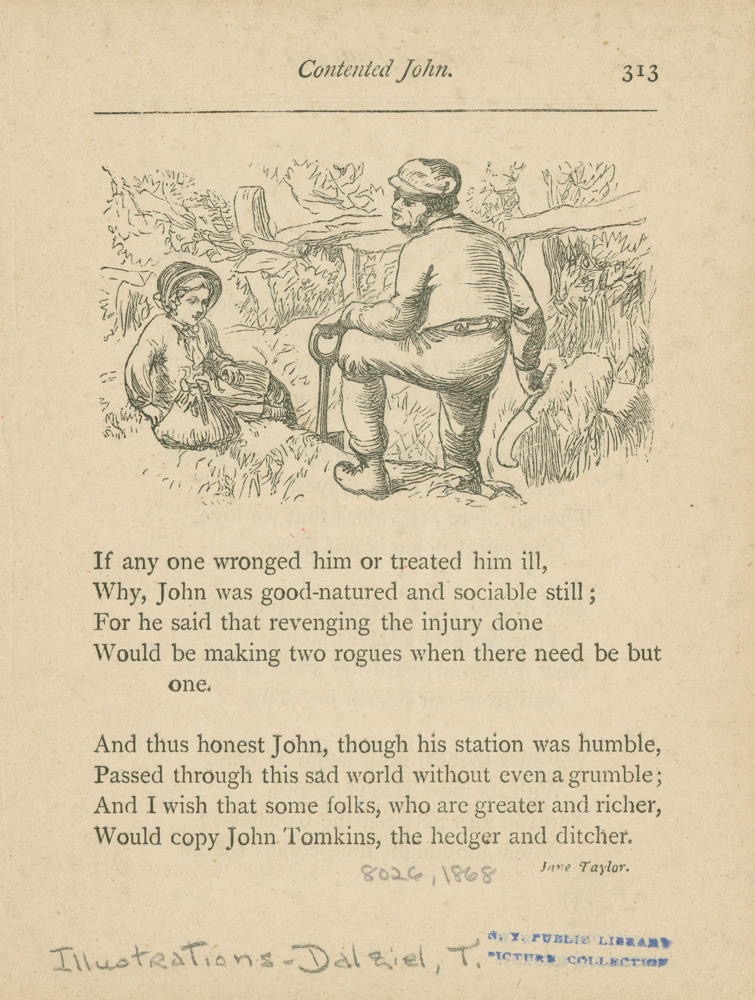
Thomas Bolton Gilchrist Septimus Dalziel, (Artist)
Dalziel Brothers (Wood-engraver):
Contented John. (1868)
Content: Illustration of "Contented John" by poet Jane Taylor.
Source Note: The children''s poetry. Being a selection of narrative poetry for the young; with illustrations by Thomas Dalziel, engraved by the Brothers Dalziel. 1868) Dalziel Brothers , Engraver. Dalziel, Thomas Bolton Gilchrist Septimus (1826-1906), Illustrator.
The Miriam and Ira D. Wallach Division of Art, Prints and Photographs: Picture Collection, The New York Public Library. "Contented John." New York Public Library Digital Collections. Accessed February 11, 2026. (https://digitalcollections.nypl.org/items/fa2a2ba0-c5bb-012f-990f-58d385a7bc34)
— — — —
"We can't seem to stop ourselves from coming back again and again to such contexts."
The plaintiff in the breakthrough social media lawsuit against YouTube and Meta, now taking place in Los Angeles, has introduced a novel approach to the proceedings. Internet “content providers” like Meta and YouTube have thus far operated under an act of Congress immunizing them from liability for content posted by third parties. Since both YouTube and Meta thrive largely as Context providers, with a few exceptions, they’ve survived accusations that their moderation excused offensive materials. The law explicitly assumes good faith moderation and that they cannot be treated as the publisher or the speaker of any information provided by another information content provider. This law, Section 230 of the Communications Decency Act of 1996 (47 U.S. Code § 230), has been referred to as the law that built the internet, for Congress created it to encourage the growth of the internet and to foster free expression. It has succeeded, though at some cost.
Many have expressed frustration when platforms like X, formerly Twitter, and Facebook, published lies and hate speech before elections, proclaiming exemption due to § 230 protections.
OpeningStatements
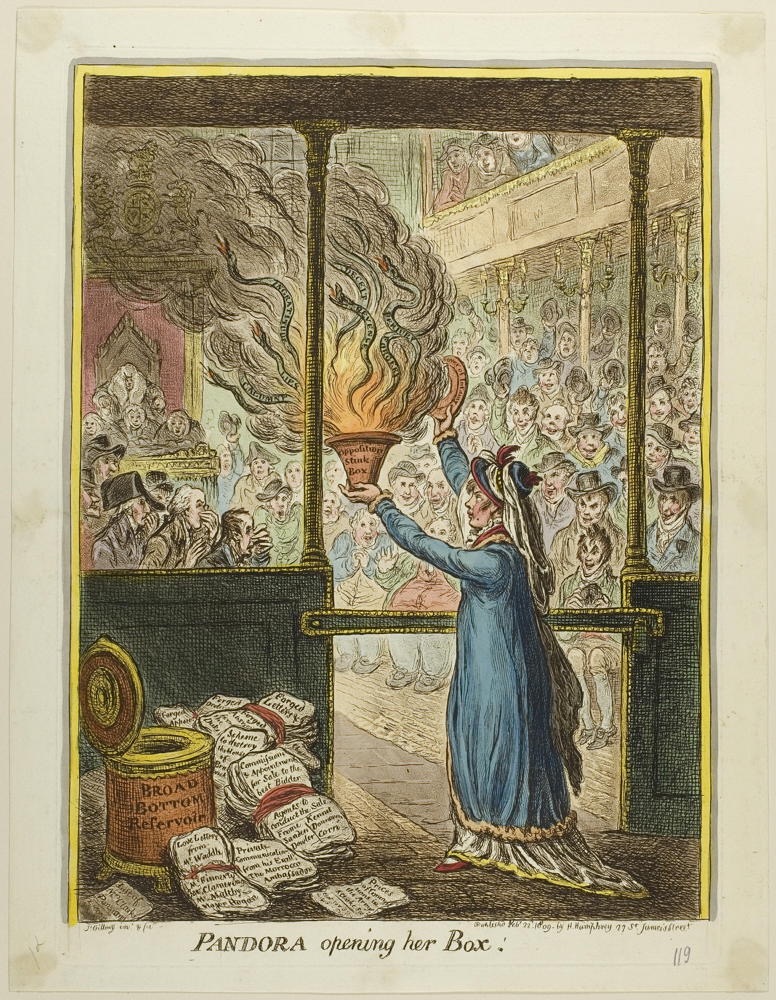
James Gillray: Pandora Opening her Box (published February 22, 1809)
published by Hannah Humphrey
"Progress moves more slowly than molasses."
The attorney for the plaintiffs delivered his opening statement in what PBS described as “a lively display.” He asserted that the case is “easy as ABC,” which he said stands for “Addicting the Brains of Children.” Simple as his case might be, he was nonetheless unable to complete his OpeningStatements before the lunch break. The defense, of course, denied every allegation, and so the process began. This is how we determine reality in the twenty-first century, just the way we did it in the prior centuries, for we demand proof, not necessarily beyond any reasonable doubt, but enough to compel the checkbooks to come out and cough up. Two of the wealthiest corporations in the history of corporations stand accused of deliberately engineering dependence in adolescents. I suspect they’ll be found guilty as charged.
We have always been cranky when it came to protecting consumers.
GreaterThan
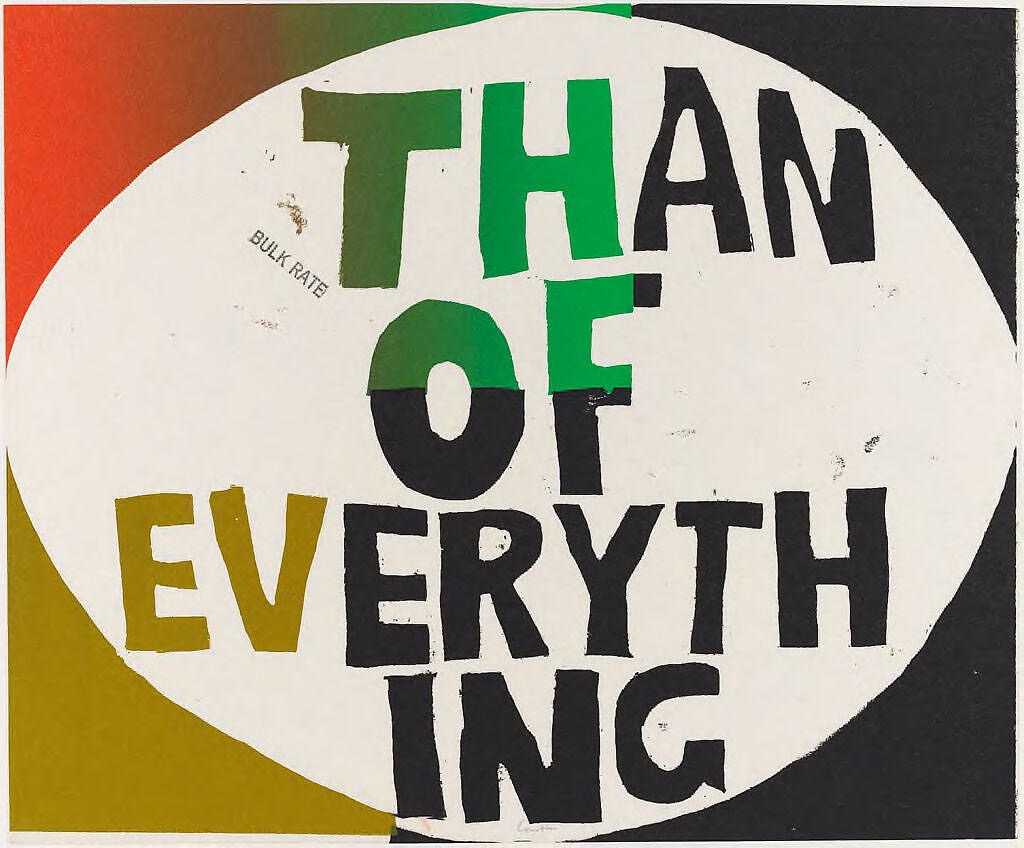
Corita Kent (Sister Mary Corita): than of everything (1967)
Inscriptions and Marks
Signed: l.c.: Corita
(not assigned): Printed text reads: THAN OF EVERYTHING
BULK RATE [stamped in black ink]
© Courtesy of the Corita Art Center, Immaculate Heart Community, Los Angeles / Artists Rights Society (ARS), New York
"(They don't speak the language.)"
I should have been more careful with how I characterized social media, for nothing was ever quite what it appeared to be. We each feature layers, each consequential but no single one ultimately definitional. We are always and inevitably a melding: yin and yang, helpful as well as utterly helpless, useless yet ultimately useful. Our nobility lies in precisely these dichotomies rather than along any margin or within any conclusion. Some days, perhaps even most days, social media sure does seem beyond redemption, yet abandoning it, even for its proven shortcomings, could only erase any possibility of any hope of redemption. Repeating ad nauseam, which might be the only way any such defensive strategies ever get repeated, creates a world of formerly hopeful alternatives, discredited in practice. We inevitably create a world of also-rans and disappoint ourselves.
Hope was never intended to resolve itself. It exists solely for its own sake.
Checkiningin/CheckingOut
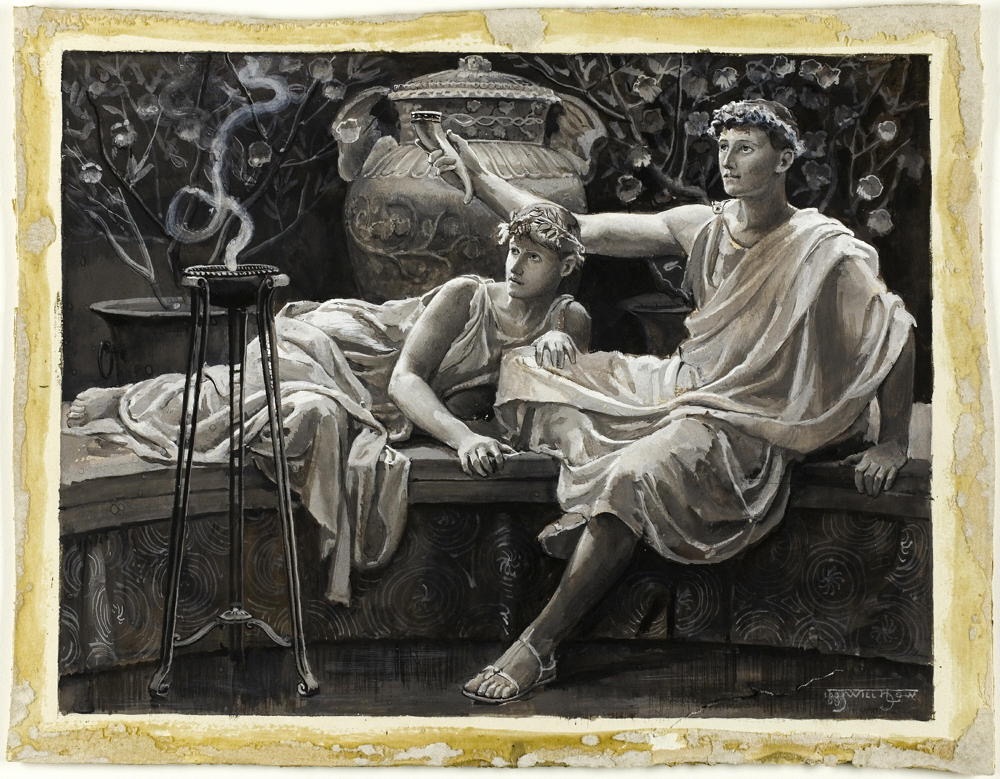
Will Hicok Low:
Checking His Love Trance, a Cup He Took Full Brimm’d (1885)
"I still feel compelled to check in from time to time
and seem to possess no reliable defence against Checking Out before I exit."
It seems to be the nature of social media that the mere act of checking in insidiously transforms into a form of checking out. All intentions aside, once inside, things naturally guide the eye to other, often unrelated, entries, before a trance completely overtakes the proceedings. I might consequently feel lucky to make it back out of there alive, though I sometimes feel as though I exclusively exit as some form of undead. Not quite dead yet, I wash up like an exasperated, if better-informed fish. I will have inevitably gained some remarkably arcane knowledge, often the kind with no obvious practical application, though somehow nonetheless supremely satisfying, as if I’d gorged on popcorn or salad dressing. My palate will feel temporarily satisfied without growing much more sophisticated.
My CheckingIn/CheckingOut boundary becomes my primary dichotomy. I seem unable to maintain a stable relationship between seeking important information an
ReelLife
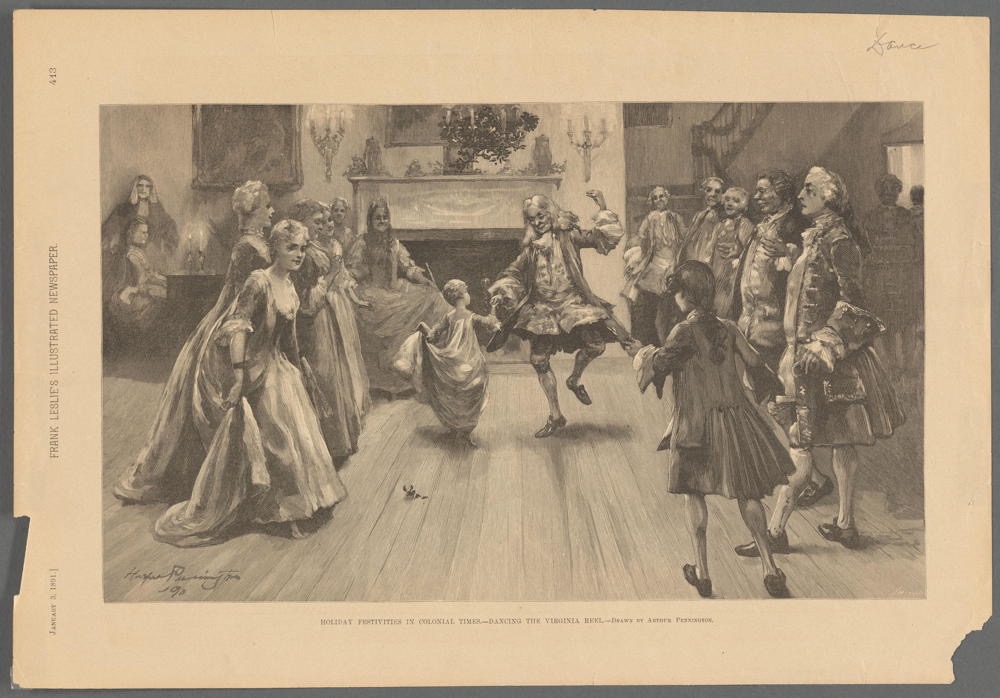
Harper Pennington: Holiday festivities in colonial times; dancing the Virginia reel (1891-01-03)
COLLECTION
Prints depicting dance
Theatrical dancers in groups or more than two but not in a ballet or theatrical dance scene
Josephine Butler collection of dance prints from illustrated periodicals
Jerome Robbins Dance Division, The New York Public Library. "Holiday festivities in colonial times; dancing the Virginia reel" New York Public Library Digital Collections. Accessed February 7, 2026. (https://digitalcollections.nypl.org/items/24c44fb0-f763-013b-db97-0242ac110002)
“Maybe all life qualifies as representational,
merely so many shadows on those cavern walls.”
Real life has always paralleled unrealistic representations of itself. The differences were explained as poetic or metaphoric, since no mirror image can ever be true to its image’s source. The mirror fiddles with perspective, but it provides access to experiences otherwise impossible. We somehow thrive in spite, or perhaps because of, obvious imperfections. The purists among us might deride the representations as not being “real”, though they certainly inhabit a 1820s real-enough space of their own. A novel might be fictional but still adequately-enough represent its subjects.
Social media’s little different, though it does prominently display some rather glaring contrasts.
Weekly Writing Summary For The Week Ending 02/05/2026

Wenceslaus Hollar: Spring (1644)
This was the writing week I dreaded since at least Christmas, though I found ample reason to celebrate before it finished. I discovered a fresh holiday, one capable of blessing rather than reliably damning me. This was a week of revelation. I conceded this week, with the petunias still alive and roses budding, that this might actually come to be the winter where winter never visited. We’ve had a few frosty mornings, but nothing sustained enough to set our gardens very far back on their knees. I mowed lawn this week.
I continued reframing my scrolling habits by ReadingBooks. I dabbled in a little StrategicForgetfulness, and stumbled into genuine realization by Trolling instead of scrolling my social media for a change, resulting in some serious change.
DigitalDespots

Albrecht Dürer: The Desperate Man (1515–16)
"There seems to be few viable alternatives. Caveat emptor here."
Was it always the case that the exercise of free speech rights attracted dedicated despots? This seems to be the case with our ‘internets.’ That space seems brimming with budding as well as practiced despots plying their slippery trade. The ratio of authenticity to absolute bullshit seems impossible to assess, but the presence of despotism there seems, finally, to be a given. It’s not just the Russians playing poltergeist, either, but what might appear to be upstanding business and political figures. Who isn’t suspected by someone? Whose motives are pure? The chief difficulty of any free speech medium might be that it encourages people to speak freely rather than circumspectly. Free speech has never been the same as loose talk, and social media seems to tolerate altogether too much loose talk. Is this the proper price for this franchise?
The greatest gift The Gods gave humans was the blesséd inability to read each other’s minds.
Macrocosm

Lucas Kilian: Second Vision, from Mirrors of the Microcosm (1613)
"On my better days, I catch reassuring glimpses of it."
In the beginning was an idea, a concept expansive enough to encapsulate everything. As that idea spread, it began decomposing into constituent pieces, not because these were necessary, but because each represented choices, and because they seemed to better serve somebody or some constituency. The cynical, as they often do, eventually co-opted the more idealistic. They insisted that a system capable of connecting could easily accomplish division. They proposed creating profit centers. They encouraged shady operators to promote patent medicines and conspiracy rumors, certain to attract and entertain the least discerning. They encouraged trolls. The most progressive invention in the history of humanity became the primary engine of repression. Social media retains the DNA of its hopeful founders, though its stewards long ago largely chose cynicism because it offered greater revenue potential. Have we forgotten the originating whole? Has the medium lost its soul?
Each platform serves as a microcosm of the originating Macrocosm’s whole.
EssentialServices

Mieko (Chieko) Shiomi, George Maciunas: Water Music (1964)
"Scrolling can serve some incredibly useful purposes, sometimes even EssentialServices."
I sincerely apologize for starting this series under what I should have known would turn out to become false premises, but each of my series so far has eventually stumbled into this same realization. I might conclude that non-false premises can’t coexist with serious series writing, since some of their purpose should rightfully and properly remain in actually discovering something. I couldn’t have known precisely where the falsity might emerge, only that it would inevitably emerge and, in doing so, turn me into, if not a liar, then a perveyor of partial truths. Absolutists, those who only peddle in complete truths, might not actually exist, so at least I might consider myself in reasonably good company. If my purpose was to discover something, I required some partially-baked basis upon which to initiate my search.
The issue might never be whether premises prove to be false or not.
Trolling

Marianne Stokes: Candlemas Day (1901)
"Her influence seems as eternal now as the Yew, and as paradoxical, too."
Today is the day I’ve been dreading since at least Christmas. For the last four years, I have anticipated this day with deep gloom, recognizing that there would be no way to sidestep the experience. It would come, wreaking havoc, then depart, leaving me worse for the experience. This seemed to be my curse, since this date will forever be the anniversary of my darling daughter Heidi’s suicide. Speaking with an old friend a week ago, I recounted my dreary January experience. He advised that I find some way to celebrate on that day. Celebrate her existence rather than her absence, he advised. February’s full of celebration days: Groundhog Day, Fat Tuesday, Ash Wednesday, and Presidents’ Day. It’s Black American Month, too, and Heidi was always touting how she was a citizen of the world, not merely an American. Now, she’s a citizen of the universe, and her presence continues to stick with me, her family, and her many colleagues. She’s become a force of history.
That she chose February 2 to depart this realm struck me as painfully ironic, for it seems to be the date that celebrates the promise of resurrection.
StrategicForgetfulness
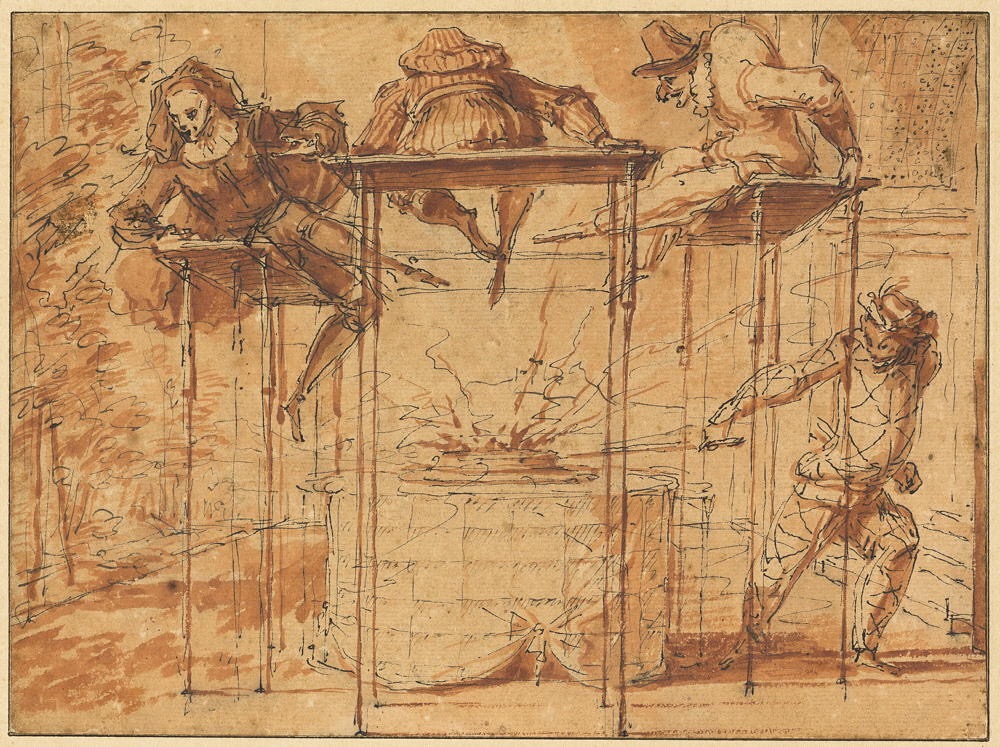
Claude Gillot: Harlequin Espirit Follet: The Comedian’s Repast
(c. 1700–1715)
"…forgetting my phone on purpose when I'd most often accomplish that by default."
However I might try to slice the challenge, Unscrolling still seems difficult. It carries the usual difficulties associated with trying not to do something, a philosophical impossibility if not necessarily a physical one. It might just as well be impossible for all the success I seem to engender whenever attempting to accomplish it. Not even my very best intentions, freshly shaved, showered, and dressed in clean jeans, seem capable of succeeding very often, and even then, it seems more accidental than intentional. Still, I accept accidental as a valid tactic, except I cannot will an accident any more than I seem to be able to not do something as seemingly innocuous as scrolling. Maybe I’m hopeless.
Hopeless or not, I don’t seem to yet be beyond leveraging my budding forgetfulness towards this end.
ReadingBooks

The Belevskii-Zhukovskii Collection of manuscripts, photographs,
drawings, books and printed ephemera
Vasilii Andreevich Zhukovskii family album:
Girl (Alexandra) reading a book (1846)
The Miriam and Ira D. Wallach Division of Art, Prints and Photographs: Art & Architecture Collection, The New York Public Library.
"Girl (Alexandra) reading a book" New York Public Library Digital Collections. Accessed January 31, 2026. (https://digitalcollections.nypl.org/items/0a3ba380-6a47-0135-7c5f-1dfb8ba095ee)
"I will revert to the literary for a change."
Unscrolling seems to demand alternative activities. If I’m dedicating myself to at least reducing my scrolling, to what might I reasonably assign the time I gain from the shift? Modern life has always insisted upon some attention being directed toward visual engagement. This might include anything from theater to ReadingBooks, but are either of those occupations really any different than scrolling? I mean, they can both serve as distractions and might well become problems if over-engaged in. Right? Television, in its infancy, was feared for its addictive trance-inducing qualities. Theater, too, might serve as an escape from rather than into anything useful. I contend that scrolling social media serves a unique and as a uniquely dangerous purpose, wholly unique from any of its analogue precursors. It’s different.
Social media scrolling seems to be an infinite activity.
Weekly Writing Summary For The Week Ending 01/29/2026
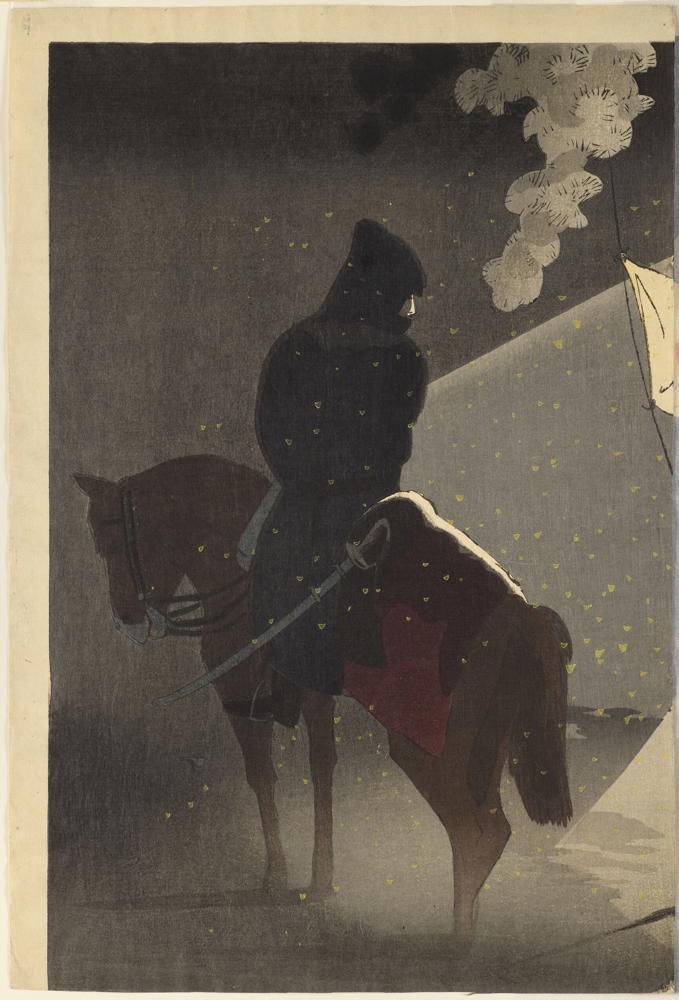
Kobayashi Kiyochika 小林清親: Braving the Bitter Cold,
Our Troops Set Up Camp at Yingkou (1895)
Published by Matsuki Heikichi 松木平吉 (1836 - 1891)
I wish every writing week would leave me feeling as though I’d discovered as much as I managed to stumble upon this writing week. I troll for insight, but I’m not always rewarded for my efforts. Writing this series feels very much like fishing. Some streams, some weeks, hold many fish, while others prove to be fallow. I’m not quite foolish enough to think of myself as a masterful fish attractor. I show up, mustering some hope for the best, and I feel genuinely blessed when my gumption’s rewarded. This week seemed a mother lode in comparison to most.
I sense my originating presumptions shifting, as any originating presumption should.
Civil-Liability
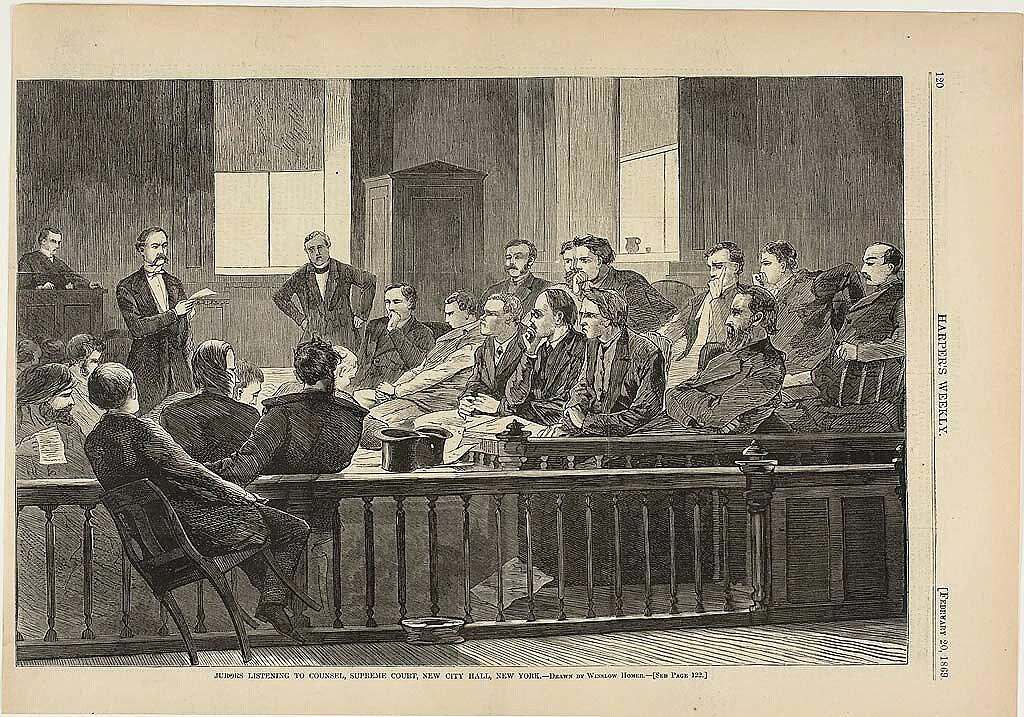
Winslow Homer: Jurors Listening to Counsel,
Supreme Court, New City Hall, New York (published February 20, 1869)
"Stay tuned. We all might end up on the payday side of some future class action."
This week, in January 2026, marks the start of what might prove to be a new era in the history of social media in the United States. A civil suit brought by a 20-year-old woman, identified as “K.G.M.”, who created a YouTube account at age 8, then joined Instagram at 9, Musical.ly, now TikTok, at 10, and Snapchat at 11, finally comes before a jury. Her lawsuit claims she became addicted to the social media sites as a child and experienced anxiety, depression, and body-image issues, including attempted suicide, as a result. TikTok and Snap, the parent company owning Snapchat, settled with the plaintiff before trial began. The remaining defendants will claim protection under a federal shield law, Section 230 of the Communications Decency Act of 1996, that has thus far protected them from liability for what their users post online.
K.G.M. seeks monetary damages and will reportedly present a case based upon similar arguments that resulted in huge settlements against Big Tobacco in the 1990s, when companies like Philip Morris and R.J. Reynolds were accused of hiding information about the harms of cigarettes.
Dooming
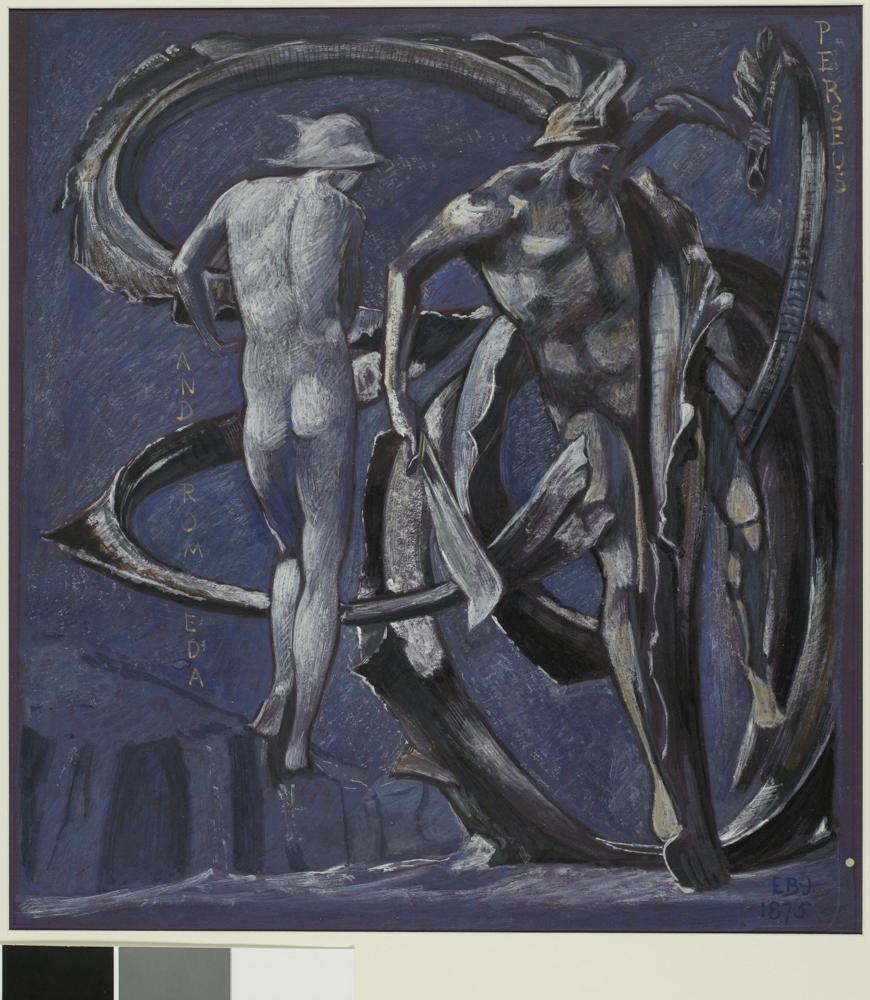
Sir Edward Burne-Jones:
Perseus and Andromeda, study for The Doom Fulfilled (1875)
"Dooming seems to inevitably become self-fulfilling."
As our economy slumps, one segment remains robust. The Doom Industry has been achieving new heights monthly, as each successive performance outstrips the previous. The market for handbaskets has likewise proven robust, with demand up and supplies reduced in each of the prior twelve months. Both the doomposting and doomscrolling segments of the industry have been thriving, thanks in no small part to our administration that continues to steadfastly—some suggest valiantly—refuse to properly administer even the smallest functions. No analyst needs to dig very deep to find reinforcing data. Every headline, as well as each obscure footnote, screams demise. If only we could tout such performance from the balance of our economies. Unfortunately, we cannot.
The Doom Industry grew in parallel with the internet.
OutCivility
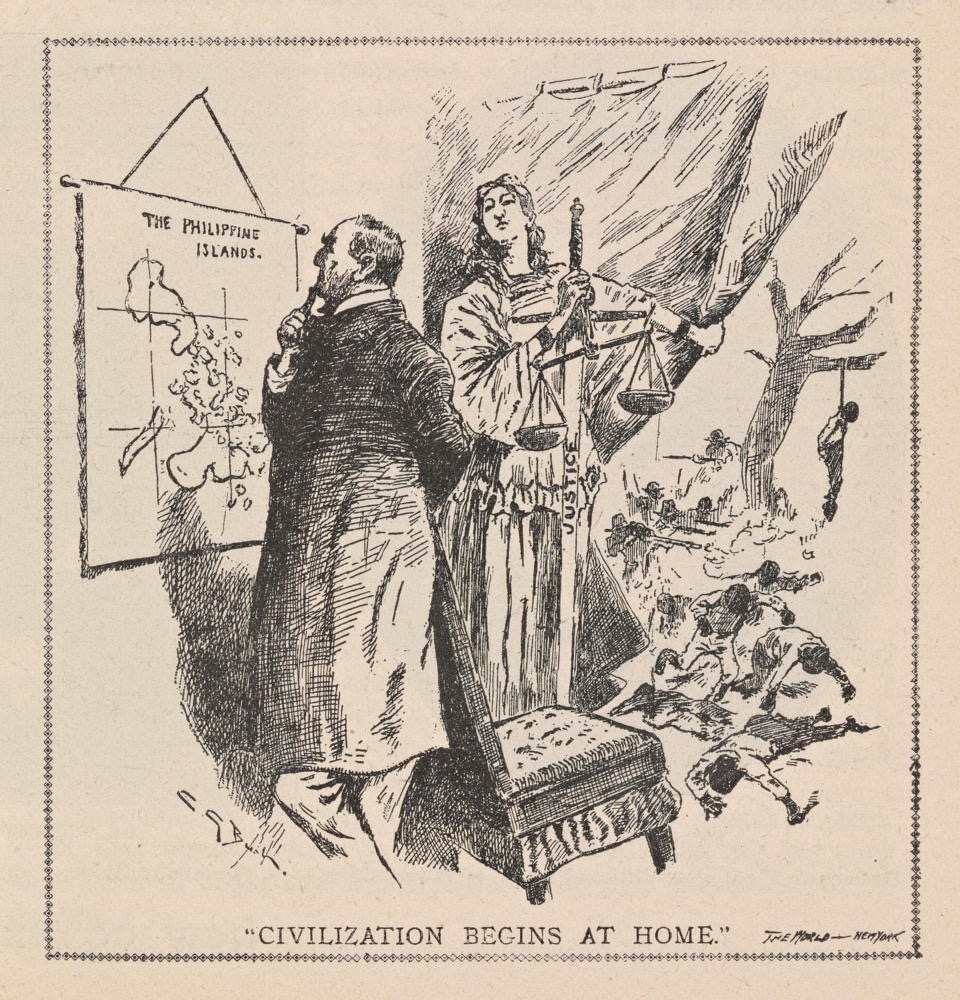
Charles Green Bush: "Civilization begins at home." (11-26-1898)
General Research Division, The New York Public Library. (1898 - 1938). "Civilization begins at home." Retrieved from (https://digitalcollections.nypl.org/items/baced180-c607-012f-777f-58d385a7bc34)
"Civility can only be meaningfully measured in eons.
It inescapably tries our patience."
Perhaps the major complaint I hear against social media in general and scrolling in particular harps about the incivility found there. People, freed of face-to-face constraints, speak altogether too freely, as if civility didn’t actually matter, as if the rules of engagement had suddenly been suspended. This complaint seems unquestionably true. We do do that to each other: sister to brother, neighbor to neighbor, stranger to stranger. Who hasn’t failed to catch themself before committing some public truth probably much better left unspoken? Who hasn’t had to crouch way down, failing to avoid some judgmental frown, or been the source of the same aimed toward some other sinner, as if they’d never failed in public themself. We seem to have known no shame when we shame, to alone stand innocent of anyone’s blame. The primary criticism of social media might be that it too effectively amplifies our hypocrisy.
Leaving Facebook won’t cure this because Facebook was never the cause.
TheCuriousCase...
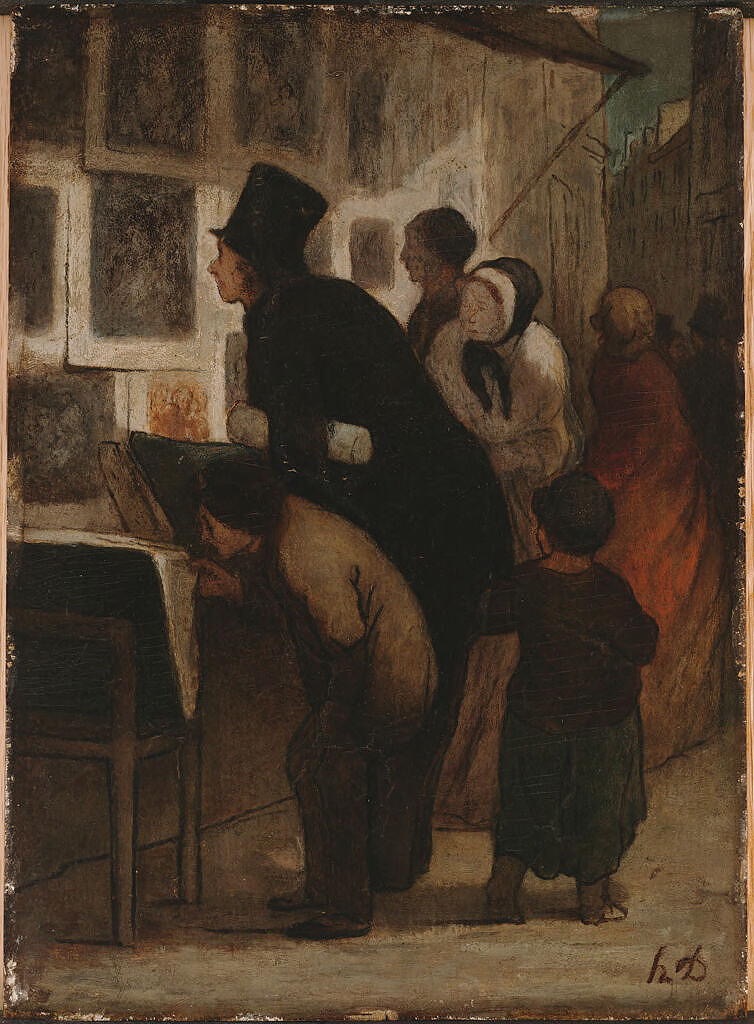
Honoré-Victorin Daumier: The Print Amateur
[L'Amateur de Gravures / Les Curieux à l'Etalage…]
Alternate Title: The Curious at the Display (c. 1855)
"A marriage created in purgatory."
During The Damned Pandemic, I discovered Heather Cox Richardson’s reassuring voice. In daily “letters,” which she posted to then-budding social media, she debunked the craziness espoused by the then-inhabitant of the Oval Office. I found her to be quietly reassuring and authoritative. She brought her deep understanding of history to the party, usually leaving me feeling better oriented as to how my situation fit into broader historical contexts. She became irreplaceable.
With that incumbent’s surprising return to elected office, her voice took on fresh vehemence, since said incumbent immediately set about trying to make America Stupid Again again.
InHere OutThere
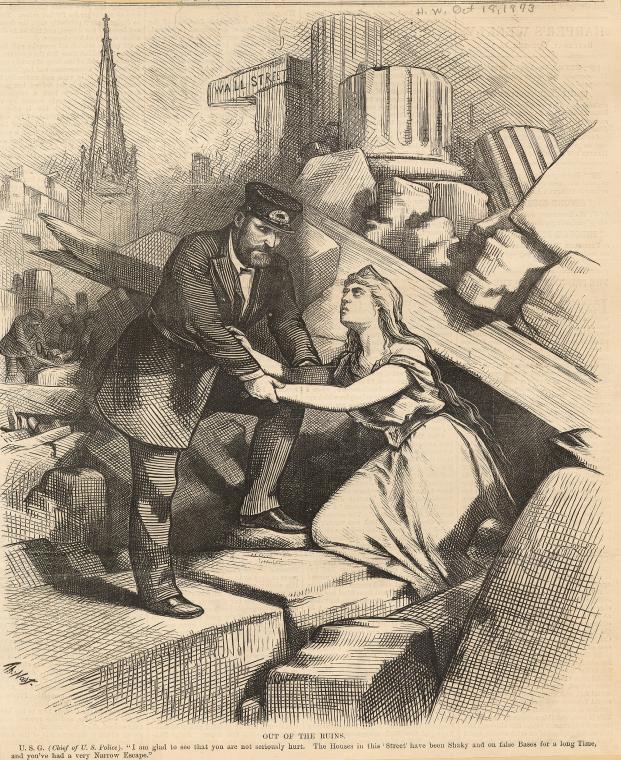
Thomas Nast: Out of the ruins... (10-18-1873)
"I seem satisfied to accomplish no more than to gape at shadows playing on some utterly imaginary wall."
Social media scrolling fiddles with the In Here/Out There boundary. Firmly focusing on the media via any device induces a convincing illusion of In-Hereness. It sure seems then as though the real world—by which I refer to the flesh and blood world—was Out There and the distantly disembodied virtual world was the more intimately personal one. This effect might amount to little more than a figure/ground misattribution if it weren’t for the broader and deeper ramifications stemming from this situation. I guess that video games can induce the same effect, where their user inhabits the projected world more confidently than they inhabit their own body. Normal activities of daily living might go begging in favor of feeding the non-sentient presence. Schools have begun confiscating students’ cell phones in acknowledgment of just this influence. For whatever reason, virtual existences seem to be terribly attractive in ways that can ultimately prove to be self-destructive.
The self in this face-off voluntarily surrenders to its virtual counterpart.
JungleTelegraph

Israhel van Meckenem the Younger:
Wild Men Climbing to the Flower of Love (15th-16th century)
"What harm could it possibly do to learn that Tarzan's on the move again?"
Somewhere within every Tarzan movie ever made, some group would go on the move. Background jungle sounds would increase, but not so much that any non-native would notice. Every inhabitant seemed to get involved. Elephants would trumpet and monkeys chatter, lions would roar, and alligators splatter. The purpose of the commotion would be a form of primitive communication that seemed to transcend language, for every animal: human, hippo, and reptile, seemed perfectly capable of passing on the message, which would remain deeply encoded. Tarzan, of course, having been raised in the jungle, was perfectly conversant, so he could translate. He knew, for instance, when the bad guys began their inevitably failing pursuit because his animal allies would keep him informed. When he’d swing off on his conveniently separated vine highway, word would spread so his passage wouldn’t surprise anybody but the bad guys.
Our social media serves as our JungleTelegraph today.
Weekly Writing Summary For The Week Ending 01/22/2026
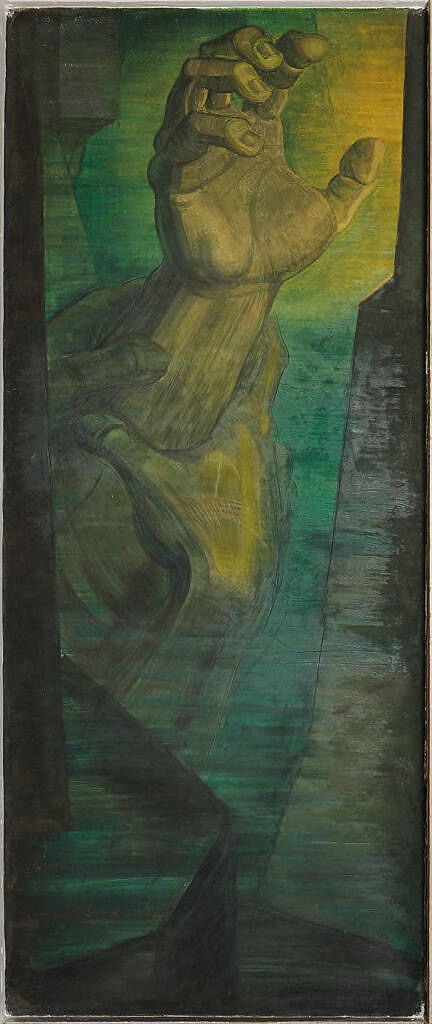
Lewis W. Rubenstein:
Scene from the Niebelungen Legend: Alberich's Hand (1935-1936)
This writing week found me even more fully engaging in the curious occupation of Unscrolling. I began the week KillingTime, an activity I characterized as sometimes necessary, perhaps essential. I next noted the Spurious Premises social media offers, though they sure don't seem all that spurious when I encounter them while scrolling. I noticed and reported on how scrolling seems perfectly suited as an activity for the Powerless, and that, perhaps, it's "just" a symptom rather than a problem. I then declared the enormous difference between simply ceasing and genuinely Desisting, insisting that desisting often proves impossible. I introduced the Witness/Participant balance, which seems currently out of balance to me. I ended this writing week insisting that scrolling social media amounts to spying on myself. Thank you for following along as I try to understand this obsession we seem to so vehemently rely upon.
Surveillance

Simon Guillain: "A famous spy!," plate 77.
Series/Book Title: Cries of Bologna [Una spia famosa] (17th century)
"We probably deserve anything stemming from our sorry reasoning."
In late April 2024, President Biden signed the Protecting Americans from Foreign Adversary Controlled Applications Act, a bill passed by both houses of Congress in response to the abuses of TikTok’s Chinese parent company, ByteDance. The Act insisted that the company had systematically spied on American citizens, using TikTok as its medium of intrusion. The Act banned TikTok in the United States after January 20, 2025, the date of Trump’s second inauguration. The Trump administration refused to enforce the law as one of its first formal acts, later forcing ByteDance to sell TikTok in a transaction from which Trump was reported to have profited. Consequently, TikTok has gained even greater presence in our social media environment, without reassurances that it won’t continue its Surveillance on American citizens, and without an ounce of enforcement of the provisions of that act of Congress.
Perhaps the most disturbing aspect of our national scrolling habit might lie in this underlying, corrupting quality.
WitnessProtection

Attributed to Jacob de Wit: Druids Cutting Mistletoe
(Artist's working dates 1715–1754)
"…what once seemed fair enough and fairly well balanced now sure seems fairly poorly balanced."
I might be destined to play catch-up for the rest of my life with little hope of actually catching up to anything. I hold the sorry distinction of having imprinted on ways of existence that no longer exist, and very likely will never exist again. I, myself, am not yet obsolete, but many of my understandings and coping mechanisms have definitely gone the way of the goony bird. I remember, for instance, a certain balance between my role as witness to these proceedings and my role as a participant therein. In those days, I achieved balance through much more participation than through witnessing. Witnessing was more of a passing part of my existence. I was much more of a participant. Television, of course, steadily eroded the historical boundary between participant and observer, even more determinedly than had radio before it. I remember my elders warning me, much as I later warned my own progeny, that they were in danger if they spent too much of their potential participatory time decomposing, witnessing in front of the boob tube.
The phone in each of our pockets makes the old black-and-white boob tube look absolutely brilliant, and our early witnessing in front of it seems downright participatory in comparison.
Desisting

Jan Toorop:
Image Design for a Poster, Wagenaar’s Cantata ‘The Shipwreck’ (1899)
"Ceasing's relatively easy. Desisting's inevitably difficult and often impossible."
Unscrolling belongs to a rather unique class of objectives, the Negative Space ones. Each features the character of nonexistence as its premise. They never aspire to attain or acquire, but to rid themselves of something. What might precisely replace that unwanted element never gets mentioned in its title. These provide no hint, not the barest clue of what might do as a replacement for the unwanted element, just that its purpose extends no further than elimination of that space presently containing that unwanted item. In our case, through this series, I’ve labeled our negative space objective “Unscrolling.” Notice how it declares only what it doesn’t want. It wants to undo scrolling, whatever that might entail.
The most curious property of every negative space objective might be its apparent, even obvious simplicity.
Powerlessness
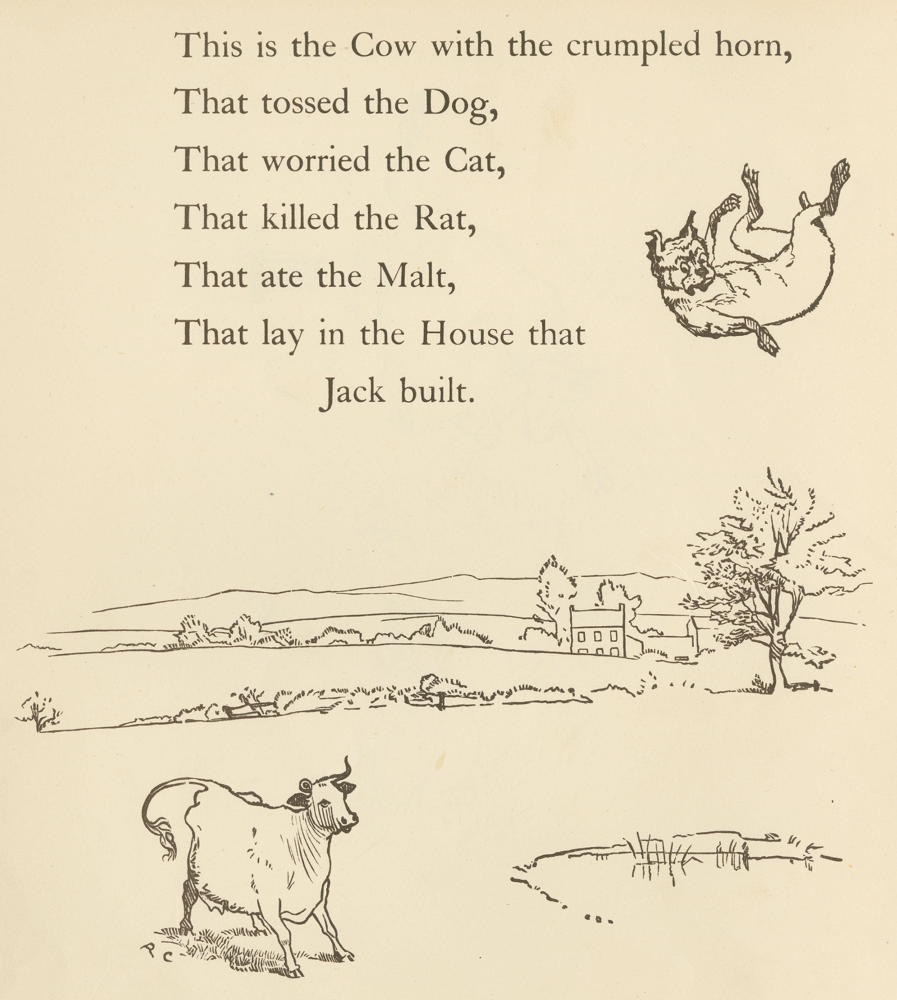
Randolph Caldecott:
"This is the cow with the crumpled horn, that tossed the dog."(≈1912)
The Miriam and Ira D. Wallach Division of Art, Prints and Photographs: Picture Collection, The New York Public Library. "This is the cow with the crumpled horn, that tossed the dog." New York Public Library Digital Collections. Accessed January 19, 2026. (https://digitalcollections.nypl.org/items/751bf0f0-c5bc-012f-99fe-58d385a7bc34)
"We engaged in passionate revolution and found that it rendered us Powerless…"
Social Media seems to be the perfect means for the Powerless to interact. It requires no physical presence. One can safely cower in their individual redoubt without exposing any vulnerable surfaces, yet still maintain a fairly convincing illusion that they’re communing. One might post radical ideas without fear of anyone reacting with much more than disembodied comments, easily discounted. It seems to out-virtualize virtual, a place to call in one’s presence and distantly engage. It provides a spare illusion of interaction, but in comparison to nothing, it proves convincing enough for our general intents and purposes. No need to stand at the podium to speak to power when one can more conveniently email in that criticism. Why look anyone square in the eye if you can anonymously spy on their personal life? Why make amends when you can just unfriend in response to disagreement?
Social Media makes for a perfect playing field for insurgents.
SpuriousPremises

Artist unknown
[spurious signature of Zhao Mengfu (1254-1322), dated 1301]:
A Hunt in the Mountains of Heaven
(Late Ming /early Qing dynasty, 17th century)
"They wandered so far from truth that they cannot relate to it anymore, if they ever could."
The social media world’s content seems defined by an overwhelming presence of SpuriousPremises. It seems unabashedly not whatever it declares itself to be. Headlines routinely misrepresent content. Content often gets continued to pages containing only advertising, rarely the rest of even an enticing story. Pages one might care to revisit usually disappear without leaving even the hint of a trace of their permanent location. Advertising, haphazardly curated for maximum offense and irrelevance, usually interrupts any content threatening to be of real interest. Even the more trusted commentators seem to care more about commanding viewers to subscribe to their channels than they seem interested in imparting their touted important information. They almost always bury their ledes behind an indeterminate length of barely relevant and uniquely uninformative pre-ramble. I can count on the fingers of one hand, with fingers left over, social media posters who avoid such antics.
I like to think of myself as an exception to these apparently otherwise ironclad principles of social media engagement.
KillingTime

Torii Kiyomasu II:
Susano-o no Mikoto Killing the Eight-headed Dragon (1748)
"…ressurect something crutially important in me by Killing off some of my extra time."
I arrived at the venue an hour and a half early. The annual Chamber Music Festival had started the night before with a string quartet delivering Benjamin Britten, starting at six o’clock. I had presumed, without confirming, that the Friday evening performance at a different venue would start at the same time, but I was wrong. The festival organizer approached me, asking if I felt as though I’d arrived a little early, since nobody but the two of us and that night’s quintet were present, the quintet warming up with a little Mahler on the makeshift stage. He welcomed me to stay and listen to the sound check, but I ducked out the door instead, heading back to The Schooner, which I’d left in a remarkably great parking spot.
I had some time to kill.
Weekly Writing Summary For The Week Ending 01/15/2026

Jacques de Gheyn II: Crossbowman Assisted by a Milkmaid
(c. 1600-1610)
This writing week sure seemed as if I started making steady progress. Each story opened up a fresh realization about the nature and practice of Unscrolling. Doomscrolling was not what I had presumed it entailed. Unscrolling hasn’t been either. I began this writing week commenting on how ungrokable social media content seems to be for me in “Ungrokkability.” I then noticed that doomscrolling never qualified as my work. I reported that I had discovered a Distraction Hierarchy and that distractions don’t necessarily have to be negatives. I commented in passing on the sense of Immediacy I see in social media content and access. I noticed that some memes, perhaps most, carry a sense of Self-Evidence. They seem unquestionable and rarely encourage much in the way of questions. I ended this writing week reporting how Vulnerable I tend to feel just before I resort to doomscrolling. Thank you for following!
Vulnerable
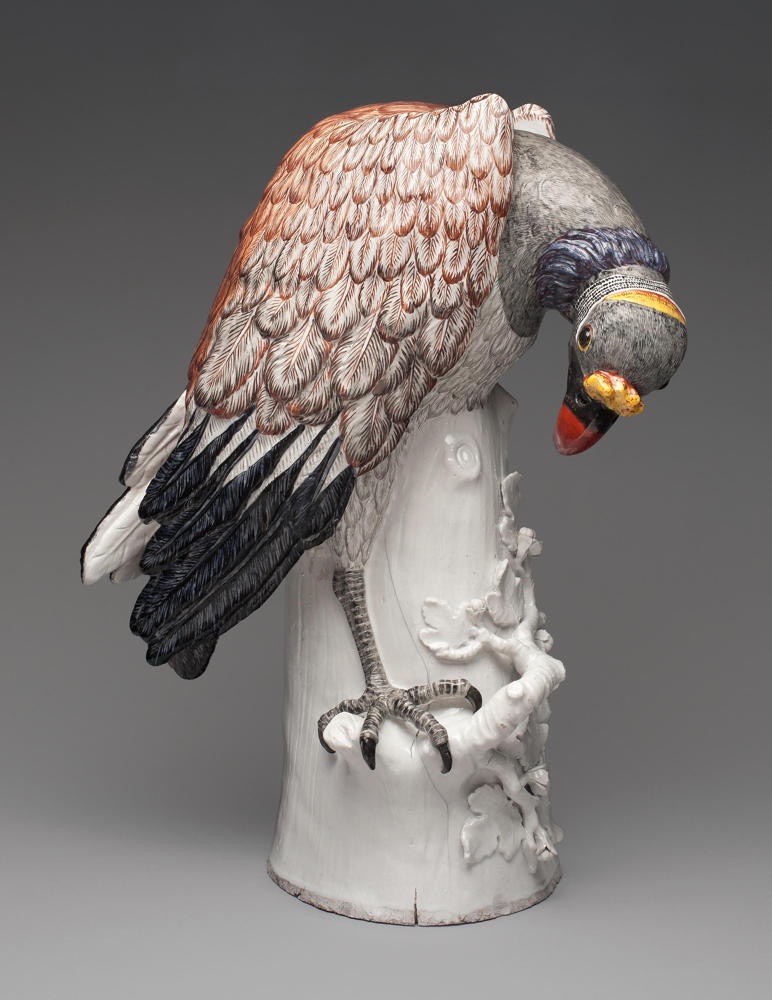
Modeled by Johann Joachim Kändler: King Vulture (1734)
Meissen Porcelain Manufactory (1710–present)
Meissen, Electorate of Saxony (now Germany)
ABOUT THIS ARTWORK
As elector of Saxony and king of Poland, Augustus II (r. 1694/97–1733) presided over the ambitious transformation of his capital, Dresden, through advances in architecture, the arts, science, and technology. Produced beginning in 1710 through royal sponsorship and funding, Meissen porcelain was an exclusive luxury good of its time. Around 1728 Augustus conceived of replicating the animal kingdom in porcelain for display in a Baroque palace that he was transforming into a showcase for his collections of Asian and Meissen ceramics. This porcelain zoo was intended for the long gallery on the main floor of the palace. By 1733, the year the king died, more than thirty different models of birds and almost forty animals had been made, many by the sculptor Johann Joachim Kändler, who worked at Meissen from 1731 to 1775. Kändler drew this vulture from life, which allowed him to animate his work with the creature’s quintessential spirit. Such porcelain animals remain the most vivid expression of Augustus’s wish, as elector and king, to possess and rule over the natural world.
"Every minute I'm not scrolling my social media,
I'm looking out for encroaching Federals."
Now that I’ve started reducing my social media scrolling, I’m noticing some things that were invisible before. Back when I was still more or less mindlessly engaging in scrolling, I’d failed to notice the feeling associated with initiating another scrolling session. Hell, I’d hardly noticed when I started scrolling again. I would usually notice I was scrolling after I had been scrolling for some indeterminate period of time, like awakening from fitful sleeping. Now that I’m more deliberately regulating my scrolling, I seem more capable of feeling and of noticing. The sense I get as I slip into another trance-like session feels like one of extreme vulnerability, bordering on desperation. I often feel stymied, and then, as if I’m incapable of independent action, I feel co-opted. When I experience this state, scrolling envelops me like a protective older sibling. I notice that I feel this way a lot lately.
Our incumbent seems as though he’s designed his whole administration to induce just this sensation on the general population
Self-Evidence
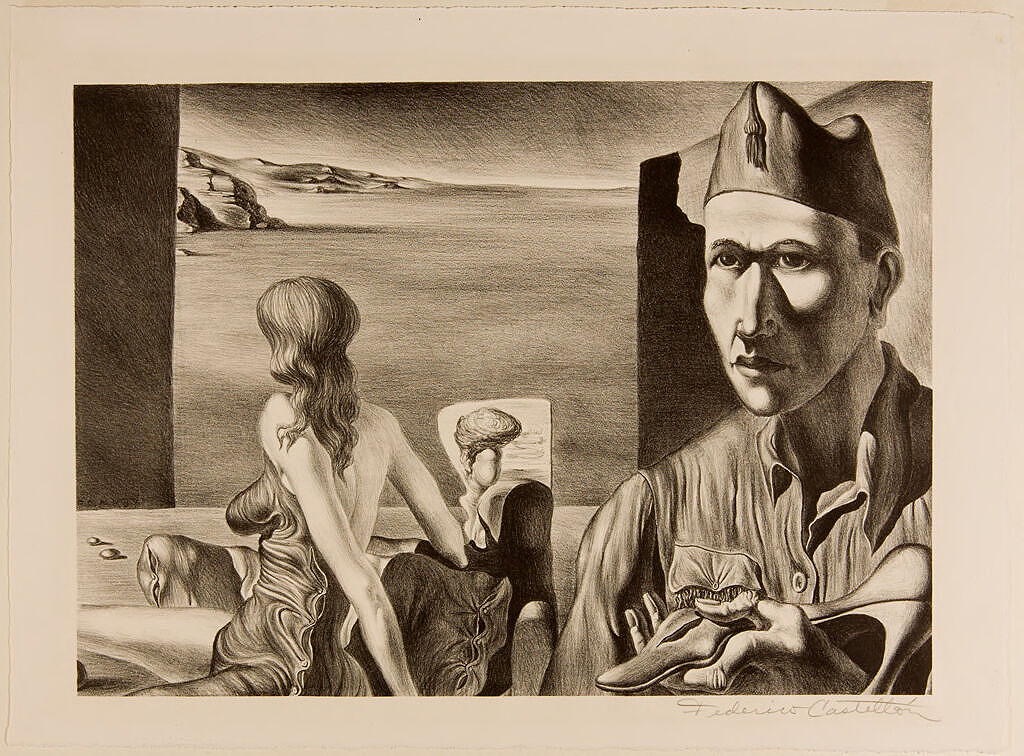
Federico Castellòn: Self-portrait (20th century)
"Disconnecting from the twenty-four/seven reinforcement machine has been helping me see what wasn't otherwise self-evident, and what, disturbingly, was."
The very impermanence of social media messaging fuels the need for almost constant repetition of certain themes. Depending upon what each user’s algorythm presumes, unique reinforcements of prominent messages continue virtually continuously: continually and virtually. This repetition results in certain concepts, “memes”, taking on a unique quality. They enter the realm of Self-Evidence. They require no proof. They inspire no questions. They become givens. For those not initiated in a particular strain or dialect of these babies, the result can seem completely disorienting. Messages seem to start somewhere in the middle, producing incoherence. For those inculcated, though, the memes hardly require repeating. They seem to be echoed more for the purposes of reinforcing than declaring, for their assertion, their very certainty, seems Self-Evidently correct. Nobody for whom they’re targeted finds any reason to question what they presume. They presume virtually everything.
Doom Scrolling serves as an essential element of this Self-Evidence.
Immediacy

Giovanni Battista Moroni: Portrait of an Ecclesiastic (c. 1557)
"…the journey seems deliberately designed to lead us nowhere but to keep us endlessly coming back, a Modiüs Strip existence."
Social Media has managed to project a space where neither future nor history exists. It exhibits in a moment, for that moment. It produces no memory nor projects any gonna-be. It exists only for the instant encountered. Once experienced, it might just as well never have been. It takes living in the moment, one click less retentive. It’s outdated before you can finish a single serving, never to return. Because of this, it lacks apparent purpose, deeper or otherwise. It deals exclusively in the superficial. It seeks only attention: not recognition, certainly not retention. It counts its presence in clicks, that most ephemeral of all presences. It collects flashes of fleeting acknowledgement, disembodied, timeless, useless for other contexts.
Try to create a list, in ascending time sequence, of your own postings to your own private Facebook group.
DistractionHierarchy
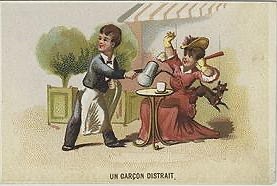
Unknown Artist: Publisher's proof of the publications of L. Prang & Co.
: Trade card depicting a distracted waiter (1876 - 1890, Approximate)
"Both scrolling and unscrolling must be gold-plated…"
I have been guilty in this Unscrolling Series of implying that distractions are necessarily bad, when they’re most decidedly not necessarily so. This culture thrives on distractions. I dare say that our economy would be in much worse shape than it already is if we were to suddenly abandon our distractions. Shopping itself, a necessity for sustaining life, often serves as a distraction for many, a reliable treatment against encroaching boredom. It might even seem that our occupations serve more as distractions from our distractions than something we seek to merely distract ourselves from. I can see the possibility of describing distractions as the hierarchy they might be in our minds. I see some as beneficial and others as evil, though in total, they might appear roughly equal in their contribution to the quality of my experience. More than mere spacers between the more consequent components of existence, we might have evolved to the point where the various elements of our existence serve as distractions from each other: distractions spaced by distractions. As Ghandi never said, “It’s distractions all the way down.”
I might have unfairly singled out our social media scrolling as regrettable.
MyWork

Pablo Ruiz Picasso: The Blind Man (1903)
Other Titles:
Original Language Title: Mendiant
Former Title: The Blind Beggar
Alternate Title: L'aveugle
© Estate of Pablo Picasso / Artists Rights Society (ARS), New York
The Harvard Art Museums encourage the use of images found on this website for personal, noncommercial use, including educational and scholarly purposes.
"I need to stumble upon it by myself…"
Scrolling was never MyWork, but a distraction from it. MyWork, however humble and modest, has always felt sacred to me, even if not to anybody else. I figure this is right and proper since nobody else can accomplish MyWork. MyWork seems at least as much a curse as a blessing in the same way that anyone might deep down revere and despise even their greatest gift. Nobody else ever gets to experience MyWork from my perspective, and it often seems lame from over here, however brilliant or not it might appear from over there. I will never experience MyWork from anyone else’s perspective, and nobody else will ever see it from mine.
The time I spend scrolling around my social media threads cannot be spent engaging in MyWork.
Ungrokability

Aubrey Vincent Beardsley: The Mysterious Rose Garden (1894)
"I have no great need to resolve any of the greater or lesser mysteries in life."
My greatest humiliation I experienced when finally pursuing higher education occurred quite innocently, in a beginning Calculus class. Why the university imagined that anyone pursuing a business degree might need calculus was not for me to question, for I quite literally knew nothing about higher education. I was fortunate to have been deemed Not College Material by my high school guidance counsellor, so for seven years, I’d never questioned whether or not I should pursue a degree. That decision was thankfully made for me when that kindly counsellor convinced me that I was not suitable. I set about planning my life around that possibility until seven years after high school graduation, when my first career stalled out, and I grew weary of working casual labour jobs. I decided that I might prefer to wear a tie to work instead.
I just enrolled in the closest state university, which accepted me sight unseen.
Weekly Writing Summary For The Week Ending 01/08/2026

Kogout, N: Happy New Year (1918)
Publisher: Lit. Izd. Otdela Politupravleniia Revvoensoveta Respubliki
NYC Public Library Collection: Harold M. Fleming papers
Russian Revolutionary Era Propaganda Posters
This writing week began with the most innane act a government can ever engage in, the violation of a neighboring country's territorial integrity. Make no mistake, this was nothing other than a forcible rape of decency; however the perpetrators might argue their innocence. I figure the act will just render them that much easier to impeach when that time comes, and it's definitely coming. I was wrestling with saying "No!" and making it stick before acknowledging that Flurries of useful information fall in even the otherwise most innane social media scrolling. I noticed how what was once news has turned into Speculation, then realized that I scroll my social media searching for Validation. Why have I been searching so for validation? I concluded that I have been actively Procrastinating, if that concept isn't too contradictory. I set about unprocrastinating, by which I mean that I started doing something I'd been actively avoiding. That felt better. I ended this writing week marveling at how social media encourages people to Make rather than take Sides. Thank you for following along!
MakingSides
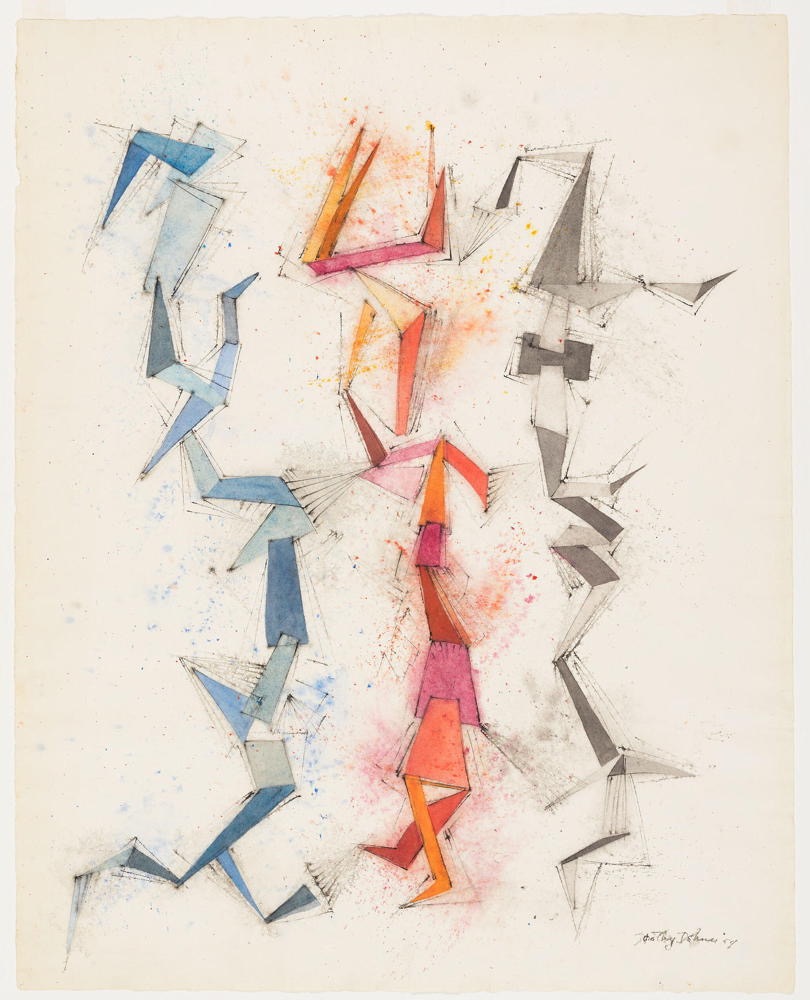
Dorothy Dehner: Family Group (1954)
© Dorothy Dehner Foundation for the Visual Arts
"…they create the losers they compete with…"
If it takes two to tango, it also takes two to tangle. Two opposing sides seem capable only of erecting impassable barriers. Of course, they’re also capable of creating cooperation, but our social media environment seems powered by opposition more than by cooperation. This situation seems tragic, since opposition often leaves little room for thriving. One struggles instead under a steady diet of squabbling and worse. Many take these conflicts seriously, as if they had more substance than any argument could ever properly contain. It might not matter who’s to blame for this continuing and even escalating situation, who’s wrong and who’s right. I’m more interested in understanding what’s left once we’ve divided ourselves by MakingSides.
We were not necessarily born with dichotomous brains.
Procrastinating

Allart van Everdingen: Reynard disguises as monk and distracts cock
Series/Book Title: Reynard the Fox [Reinecke Fuchs] (17th century)
"Progress is Procrastinating, finally turning outwards."
Once I admitted to having been seeking Validation when scrolling, I began wondering how it came to be that I needed to seek so much validation. Yes, the damned pandemic had robbed me of some sources of external validation, but it had not stranded me in the middle of some interaction desert. I had long employed social media for much, perhaps the bulk, of my interactions, since my work had taken me far from home and I hadn’t reported to an office in many years. I started working virtually before the internet, before I even acquired a cell phone; hell, before there were even cell phones for me to acquire, so I was well accustomed to being alone much of the time before that damned pandemic visited. What about that event left me suddenly so apparently needy that I sought so damned much social media-sourced validation? This seemed a perfect question until I eventually managed to track down a parallel thread to my story. Something else had emerged around about when that damned pandemic appeared. I had begun writing these series.
As those who have been following my stories already know, I hold myself responsible for writing and posting a fresh story each morning.
Validation

Hendrick Martensz. Sorgh: The Lutenist (1661)
A young man is singing and playing the lute on an open veranda. Where the woman’s thoughts have wandered is a mystery. The music and the theme of the paramours Pyramus and Thisbe in the painting in the background suggest that harmonious love is the subject. Yet the work may also be a warning against impulsive lust. Both interpretations are equally valid.
— — —
"I doubt that heaven awaits those who get saved from pursuing their purpose."
Before I conclude that scrolling through my social media feeds amounts to an unconditional waste of my time, I might be wise to consider my underlying purpose for being there in the first place. I did not end up there because I held a deep desire to waste my precious time. Nor was I necessarily an unwilling victim, or even a victim at all. I realize that I was pursuing something important there, and that I might have even found it, however overshadowed in foreboding or misgivings, by which that result might have been accompanied. Remember, this behavior pattern emerged during the darker and most isolated periods of my existence. I’d never, before that damned pandemic, spent so much time in agonizing isolation. I strongly prefer introversion, so pandemic isolation might have brought the best of times to my experience, but it didn’t. It brought existential dread instead, with no obvious outlet. I could still get out, but only if dressed like a bandit and maintaining strict distancing. I’d never seen the faces of more than half the people I interacted with every week. I felt terribly isolated!
I began convening my weekly Zoom Chat then, a practice I continue every Friday morning even unto these days.
Speculation
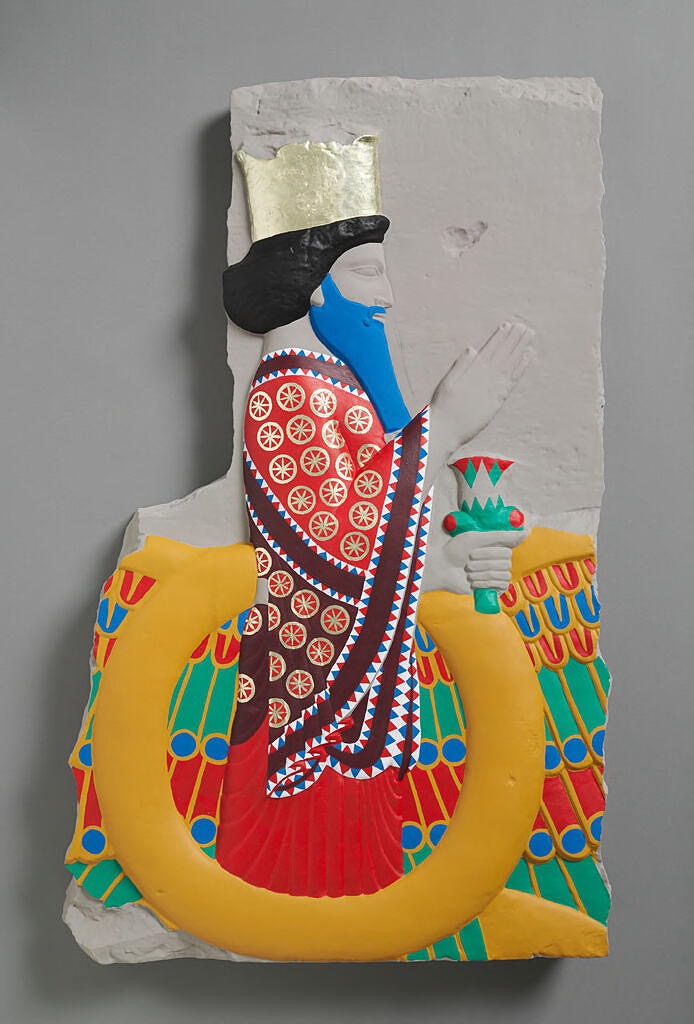
Unknown Artist: Color Reconstruction: Ahuramazda in the Winged Disk
21st century reconstruction of 5th century BCE original)
Gallery Text
Carved from brownish limestone, the Persepolis sculptures were painted and sometimes further enhanced with gold overlays as well as blue inlays imitating the semiprecious stone lapis lazuli. The color reconstruction you see here, made of plaster with acrylic paint, is based on close examination and scientific analysis of the original relief fragment (1943.1062) displayed immediately outside this gallery [in gallery 3460].
The incised star patterns are revealed by “raking” light, which illuminates the surface from a low angle. Traces of bright red cinnabar (mercury sulfide), green malachite a copper carbonate), and Egyptian Blue (the oldest synthetic pigment) are visible with the naked eye. Similar depictions, notably on glazed brick reliefs, provide further clues, but the reconstruction remains partial and speculative. As proposed, the coloration of the winged disk recalls inlaid gold jewelry. This may well have been the intended effect, heightening the splendor of what is most likely a representation of the god Ahuramazda.
Harvard Art Museums/Arthur M. Sackler Museum, Museum Collection
Object Number
1943.1062.X
— — —
"I work much harder now, trying to become informed."
The few decades between when broadcast television supplanted radio as this country’s primary news source and the proliferation of first cable, then social media-based outlets replacing broadcast TV, the content of what passed for news changed. More properly, the content of what passed for news transformed into what Walter Cronkite could not have claimed represented anything even remotely resembling “the way it is,” if, indeed, it ever had. I fear expectations failed to shift in unison with that change; however, so many people continue to believe that what passes itself off as news today resembles what used to pass muster as news. It doesn’t. A slow erosion of reportage was replaced with what I might most generously label Speculation. Explanations of what just happened were supplanted by descriptions of what might occur and what might have occurred: reportage became Speculation.
When Faux (Fox) News branded itself as “news”, new ground was broken.
Flurries

Claude Monet: Sandvika, Norway (1895)
ABOUT THIS ARTWORK
Claude Monet’s trip to Norway in 1895 was perhaps the most physically taxing of all his many painting campaigns. Touring the country with his stepson Jacques Hoschedé, who lived in Christiania (now Oslo), he was awestruck but initially frustrated in his search for good motifs amid the snow. Nevertheless, he painted 29 Norwegian scenes during a two-month stay. These included at least six views of Sandvika, a village near Christiania whose iron bridge may have reminded Monet of the Japanese bridge at his home in Giverny.
— — —
"Then I feel glad for my little social media addiction."
It’s not that scrolling only produces distraction. It also produces fantastic information, sometimes far superior to anything accessible before the unfortunate downfall of journalism and the rise of so many blogging platforms. Though blogs gained their initial popularity as a conduit for various nefarious conspiracy theorists, they have since attracted plenty of more credible contributors, some of whom the algorythm even allows me to access. Just when I’ve about convinced myself that scrolling cannot be justified, something actually happens out there in what still passes as the real world. Suddenly, all the foreground filled with idle speculation masquerading as news disappears, replaced by some actual reports from actual fields. For a change, and if only for a little while, mainstream breaking news matches the streaming contributors, and my scrolling manages to bring some events into actual focus. It was always tough to access adequate information surrounding any breaking news. In the old days, I’d frantically switch between the three available broadcast channels, trying to glean additional incremental bits of actual information. Now, of course, I just continue scrolling through what my algorythm serves.
The primary problem with any addictive substance lies in its beneficial qualities.
No-ing

Rembrandt van Rijn: Self-portrait ( c. 1628)
Gallery Notes: Even as an inexperienced young artist, Rembrandt did not shy away from experimenting. Here the light glances along his right cheek, while the rest of his face is veiled in shadow. It takes a while to realize that the artist is gazing intently out at us. Using the butt end of his brush, Rembrandt made scratches in the still wet paint to accentuate the curls of his tousled hair.
"…I'd take my marbles home while mumbling"Good riddance!" under my breath."
It might be that I scroll to try to identify shifting power. In times as volatile as these, advantage seems to be continually shifting. Any news cycle, any odd minute, might hold evidence of where power might be shifting next. Our incumbent, widely acknowledged idiot that he has proudly proven to be, shifts focus more frequently than he farts, so he creates much churn in the channels, and so sparks my near constant interest. Scrolling sometimes seems like reading a truly terrible novel I can’t bear to set down for a minute, completely beyond my volition. I might need permission to stop, though from whom such permission might come seems like another fundamentally unanswerable question. This brings an old understanding into suddenly sharper focus.
In my youth, I believed that power came from granted permission, that somebody powerful could bestow the authority for something to happen, and that it consequently did.
Weekly Writing Summary For The Week Ending 01/01/2026

Sebald Beham: Little Buffoon with Scroll (1542)
This writing week was the first full writing week of posting my new Unscrolling series. Over its course, I felt myself starting to grasp whatever might have moved me to choose to expound on this topic at this time. Long-time readers might remember that a year ago, I was starting my series on what I labeled NextWorld, the world likely to emerge from our incumbent taking the oath for an office he never intended to fulfill. I started that series ignorant of its purpose but found the experience eventually morphing into being suitably satisfying, nonetheless. Each series starts off like this, in near-total ignorance, before starting to trend toward a deeper understanding, usually in the first full week of the investigation.
I began this writing week acknowledging the garish colors that social media almost exclusively trades in, and what that means for credibility.
StockholmSyndrome
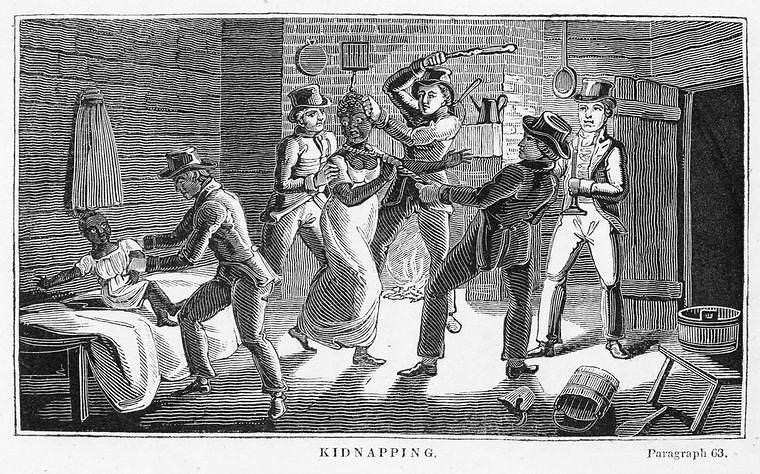
Jesse Torrey: Kidnapping,
American slave trade: or, An account of the manner in which the slave dealers
take free people from some of the United States of America, and carry them away
(1822) Reprinted by C. Clement and published by J. M. Cobbett
"We all seem to be coping near the edge of our native abilities now."
This being January 1st, New Year’s morning 2026, I am reminded that none of us inhabit our present or proceed into our future completely willingly. Each of us might have preferred to slow down the inexorable progression of time at times, if not halt it altogether. Especially during good times, which we learn from personal experience, always prove to be fleeting. No, time moves in only one direction, and it drags us along as if kidnapping us. We come to inhabit a once-upon-a-time future we wouldn’t have chosen, thereby challenging our always emerging, though never quite mature enough coping mechanisms, sometimes to our detriment. For my generation, the so-called Baby Boomers, the emergence of computing and its many associated industries has proven to be the most disconcerting. We realize, as I suppose only someone who remembers before times could, just how far from our imagined future our actual future has fallen. Computing didn’t turn out the way we’d dreamed it.
No future ever arrives as previously imagined, though, so my generation’s no different than any prior.
TheAlgorythm
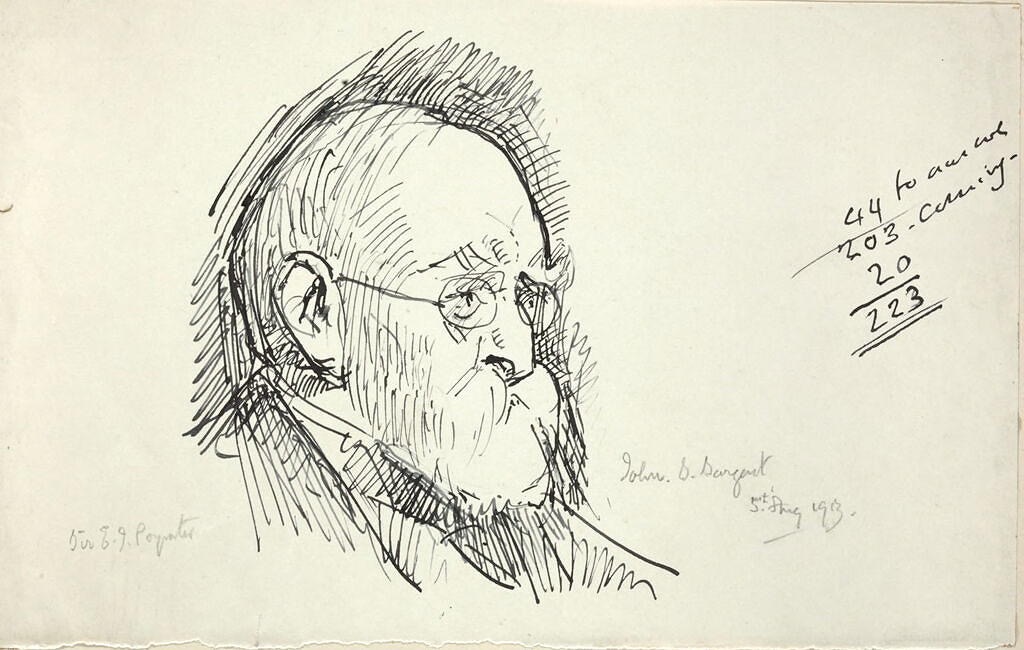
John Singer Sargent: Sketch of Sir Edward John Poynter (Aug 5 1913)
"…cursing TheAlgorythm every inch of the way to nowhere again. And again."
If a common villain emerges from everyone’s scrolling stories, it’s undoubtedly TheAlgorythm. This mysterious presence is said to make the decisions about what any odd accessor might see in their social media feed. It doesn’t matter which individual feed gets mentioned, its underlying algorythm gets blamed for choosing what’s presented for our obsessive/compulsive perusal. This seems perfectly justified if only because TheAlgorythm works in such mysterious ways. It’s said to do this or that, indifferent to any user’s underlying needs. It feeds upon what it needs first, last, and, reportedly, always. It seems to operate well beyond reason, far beyond any logical justification. Not randomly, though its operation might sometimes easily be mistaken for random generation. It appears to operate more randomly than random could, and probably does. It’s a black box with whatever anyone might imagine operating inside.
It serves up a curious mix of frustration and satisfaction.
2ndOrderDistractions

Johann Georg Wille: The Distracted Observer (1766)
"What's my 5% solution? What's yours?"
Each era sets a tone, a rhythm for living in that time. Obama brought hope for a liberal democracy wounded by two terms of pseudo-conservative idiocy, for instance, and Biden’s time reinstituted a sense of decency, which, predictably, set the corrupt class absolutely crazy. This brings us to our current era, where our leader, above all else, specializes in distracting himself. I doubt that he’s completed as many thoughts as he’s completed sentences, by which I mean there’s absolutely no evidence that he’s ever successfully completed either. Predictably, his milieu proves to be communicable. It probably isn’t an accident that we’re suddenly suffering from severe bouts of distraction disorders. Sure, we started seriously distracting ourselves during the COVID years—remember who the incumbent was then?—but it took some practice and serious repetition before it turned into a discernible problem, just in time for old, reliable Mr. Distraction to take office again.
This theme provides personal insight into the self-esteem of our oh-so-fearful leader.
Antidotes

George Minne: Kneeling Youth with a Shell (1923)
Gallery Text
Minne was a leading figure in European turn-of-the-century symbolism, which posited explorations of interiority, spirituality, and the unconscious as antidotes to the materialism of an industrialized society. The figure of the kneeling youth was a recurrent motif in Minne’s oeuvre, and this one’s serpentine figure and downcast face evoke a state of contemplation and solitude, if not melancholy. The omission of naturalistic details, like musculature or individualized toes, abstracts the depiction of the youth’s body. This slim and angular figure exemplifies the artist’s sculptural style, which was celebrated for its synthesis of the elongated figure of the Gothic with the contemporary decorative style of Art Nouveau.
— — —
"Living inescapably involves getting used to noticing what's missing in our lives."
Most of us seem to more or less automatically revert to magical thinking when we encounter something we perceive to be a problem. We resolve the difficulty by a priori imagining the existence of a solution, even though full solutions appear to be rare in both the literature as well as in our lived experience. We might be able to ameliorate some of the worst effects this problem produces, but full remission only rarely, if ever, gets achieved. For instance, I have heart disease. Don’t fuss, the worst it has ever gotten for me was a few high blood pressure readings. No apparent damage. So, of course, I thought I’d dodged that bullet. My doctor advises that I have not dodged anything but some of the more troubling symptoms. He pointed out that my continuing prescriptions mean that my heart disease continues, too, albeit in some form of suspension, and will continue for the balance of my life. There is no cure.
Many of the “solutions” we experience seem to be of similar character.
Greyscale

Lucian and Mary Brown: Untitled [baby on scale] (1955)
"My life seems both harder and better when lived in Greyscale."
Our world was never given to present itself in oversimplified blacks and whites. Every dichotomy amounts to a lie, an oversimplification intended to amplify difference rather than similarity. Likewise, our world was never given to present itself in garish colors as if it were a Vincente Minnelli movie, another oversimplification intended to downplay difference and dazzle the eye—more entertainment than information.
Real life, if I even dare speak of reality in these times, lies somewhere between these two common extremes, in what I might refer to as the Greyscale, where shadow and light highlight both similarity and difference, and distracting dazzle seems more properly muted.
Kodachrome
A friend and reader sent me the article and I immediately switched my phone to B&W. Slip over here for more ...
Weekly Writing Summary For The Week Ending 12/25/2025
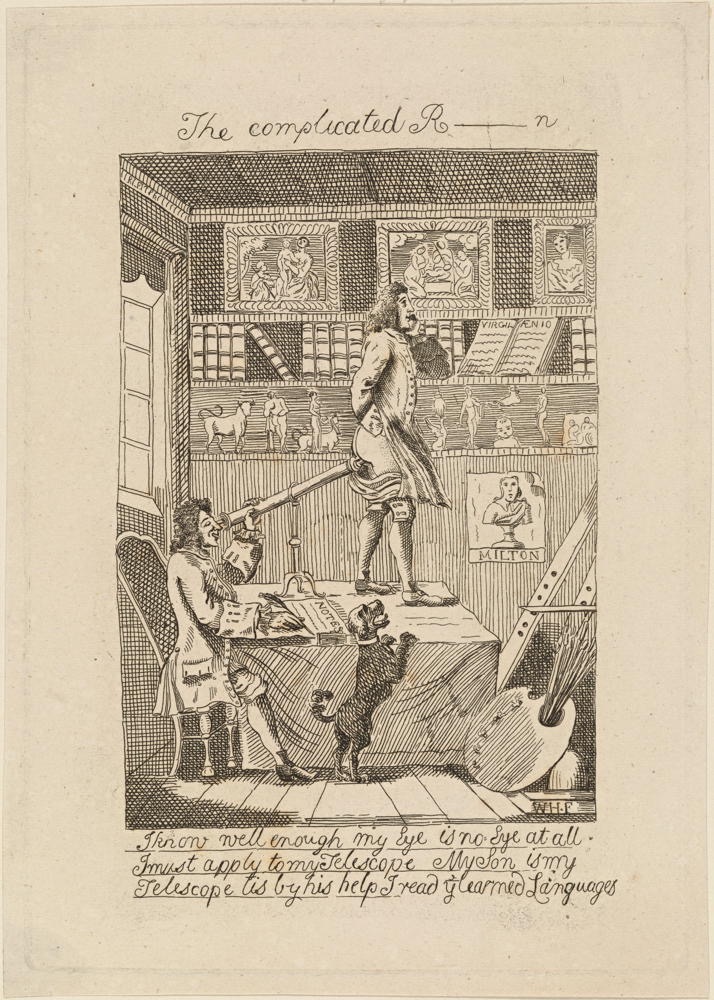
William Hogarth: The complicated R____n (1794)
This writing week tacitly included my annual Christmas poem-writing exercise, where I try to write a dozen or so (more or less) Christmas poems between Solstice and Christmas morning. This always adds a bit of stress to a season that already seems to bring stressors, but it enables me to avoid shopping. I also ended my Decency series, which I consider to have been a completely successful excursion into the source and character of a widely misunderstood choice freely open to each of us. I also began a fresh series—albeit on typically wobbly wheels—Unscrolling. I will probably find my balance before Epiphany, or at least, it usually happens that way.
I began this writing week considering the opposite of selfishness, selflessness, the very soul of decency as I’ve come to understand it. I then ended that series and opened the fresh Unscrolling series, where I will attempt to understand and curtail what might have become a dangerously self-destructive habit shared by many of us: mindless scrolling through our largely newsless newsfeeds. I stepped into what I labeled the First Infinity, the one that lies beyond what had become habitual, unseen, and in need of more experience. I then explored the remarkable absence of news in my so-called newsfeeds. Whatever happened to urgency and importance? I then peeked into the source of my current scrolling practice, the Covid shutdown, and noticed what sure seems like an addiction. I ended this writing week by characterizing scrolling as a way to employ randomness to address a hollowness. Perhaps the hollowness could be the underlying issue.
Weekly Writing Summary
Selfullness
“I’ll be studying and learning this lesson for the rest of a halfway Decent lifetime.”
This Decency Story finds me reminding myself of my duty to practice a Decent Selfullness.
Brian, a highly capable and kind leader, worked tirelessly, neglecting his own well-being. After accumulating excessive vacation time, he took a sabbatical, ultimately leaving his job. In his new role, he embraced a more balanced approach, prioritizing self-care and allowing others to lead, finding greater fulfillment in his work.
Paul Cézanne: Self-Portrait (1898)
——
DecencyUnscrolling
“…hello to a fresh strange bedfellow…”
This Decency Story contains the ending coda of my Decency series and the opening salvo in a fresh series: Unscrolling.
I conclude my Decency Series, reflecting on the importance of choosing decency freely and its potential to create good fortune. I then introduce a new series, Unscrolling, exploring the impact of social media and streaming services on information consumption and my own struggle with distractions. I aim to either embrace the streaming culture or become a social media hermit through this new series.
Unknown Artist: Scroll 2: Nezumi no soshi emaki (1600 - 1650) Nara [?], Japan
——
1stInfinity
“I wonder what I so passionately and, ultimately, passively sought there.”
This Unscrolling Story starts unfolding the space within which unscrolling takes place, exploring a 1stInfinity that appears after exiting the scrolling universe.
In this Unscrolling Story, I describe the overwhelming nature of infinite possibilities, comparing it to Giordano Bruno’s concept of infinite worlds. I argue that while scrolling offers a seemingly infinite stream of information, it ultimately leads to a loss of time, relationships, and genuine engagement. I'm choosing to limit my scrolling, embracing a new sense of freedom and the opportunity to engage meaningfully with the world around me.
Giovanni Battista Tiepolo: The Apotheosis of Aeneas ((c. 1765)
——
News
“Few of yesterday’s urgencies ever came to pass.”
his Unscrolling Story finds me searching for the News that’s lost in my newsfeed.
In this Unscrolling Story, I express disappointment with the current state of news media, finding it sensationalized and lacking in substance. I reminisce about the days of NPR, which I once found informative and reliable, but now perceive as lacking credibility. I feel overwhelmed by the constant barrage of information and am losing interest in staying informed.
Robert Dighton: Well Neighbour-- What’s the News?,from A Set of Heads (c. 1795)
——
ClosingIn
“One might never notice what’s not present in their life as a result of their scrolling addiction.”
This Unscrolling Story finds me ClosingIn on my scrolling addiction. Revisiting the source cures nothing, but it clarifies.
During the Covid shutdown, scrolling became a consuming activity, providing a sense of connection and community. Initially a harmless habit, it gradually escalated into an addiction, replacing hobbies and higher-order engagements with endless entertainment. The subtle nature of scrolling addiction makes it difficult to recognize its negative impact on one’s life.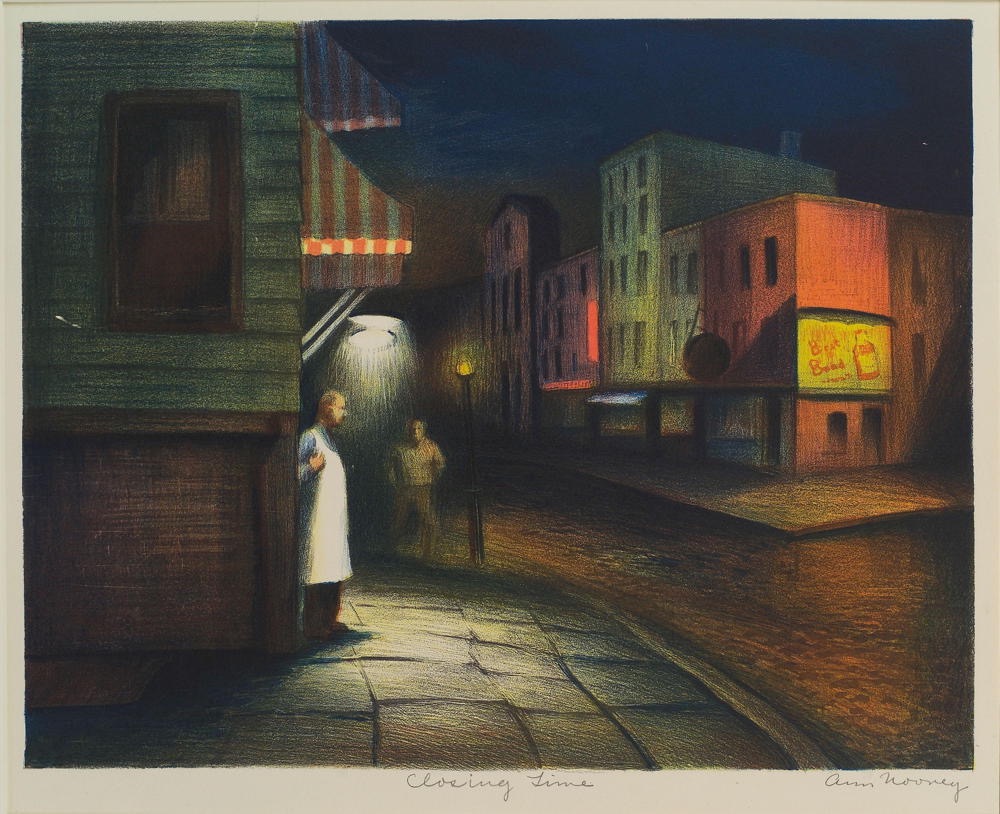
Ann Nooney: Closing Time (1937-1742) Works Progress Administration (Sponsor)
——
Serendipity
“…we can curl up in wonder…”
This Decency Story finds me in steerage, wondering how my interests got Excluded when hospitality became an industry.
In this Unscrolling Story, I compare the aimless scrolling of social media to a desperate search for Serendipity, a random payoff in a world lacking hope and upward mobility. This lack of hope, exacerbated by economic inequality and political decisions, has led to a generation seeking satisfaction in fleeting, intangible experiences. I argue that this “scrolling epidemic” is a coping mechanism for a society deprived of meaningful opportunities.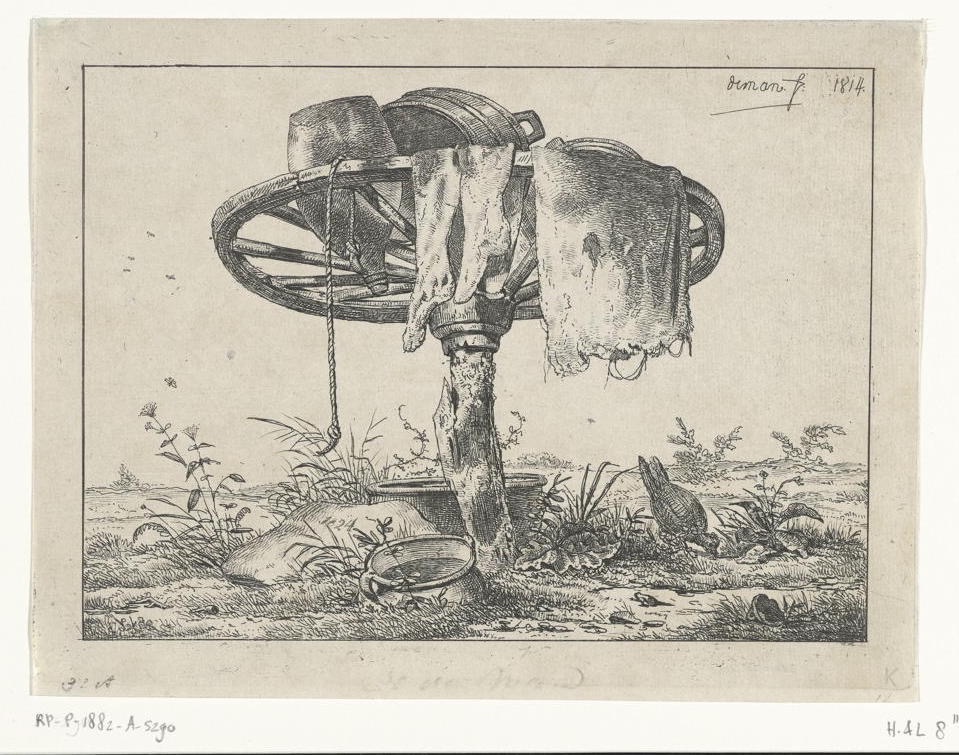
Anthonie Willem Hendrik Nolthenius de Man: Wheel on a pole (1814)
——
A Less Than Perfect Christmas Poem
Merry Christmas, Happy New Year, this season seems to be overflowing with expectations of great joy. I find those expectations more onerous than uplifting, for I do not know how to create joy. For me, joy just happens. It properly must be a surprise or it doesn't qualify as joy, so I cannot will it or otherwise engineer it into being. Merry and happy seem similar, both difficult to impossible to create and probably fruitless to insist upon. Insisting that another be happy seems like a reliable recipe for inflicting misery.
How about wishing someone a reflexive Christmas or a satisfying New Year? These adjectives could make reasonable targets without seeming so darned oppressive. Burdened with the command to be happy, I feel a little desperate, especially when I'm just not feeling it. My mom would advise turning that frown upside down, as if facial expression controlled mood. It was well-intended encouragement even if it never really worked.
I managed ten new Christmas poems this year. Here's one of them:
The Christmas Eve Trudge
I began writing these Christmas poems
more than twenty-five years ago
to avoid experiencing what I’d come to call
The Christmas Eve Trudge.
The Trudge resulted from unrequited searches
for that perfect present for that perfect person,
a common side-effect of seeking perfection
and one I almost universally experienced then.
I figured that if I stopped shopping
rather than stopping seeking perfection,
that I’d magically lessen the opportunity
to experience the resulting depression.
The incongruity of reliably experiencing
Such sadness while preparing to celebrate
the widely-advertised happiest day of the year
drove me to tears and worse.
It drove me into the irrationality
that encouraged me to write my poems instead,
in the delusional belief that I might thereby
avoid experiencing The Trudge.
My error might have been multifaceted, though.
It could have also resulted from my conviction
that Christmas should properly be, and was,
the happiest day of the year.
It wasn’t, or had never been in my experience.
It was rarely the saddest day of the year, either,
but never actually the happiest.
It was always a day of mixed emotions instead.
If, by chance, I received a delightful present,
my Christmas could, indeed, prove to be happy,
or, more properly, I might feel happy then.
But the chances of receiving such seem slim.
More likely, I’d receive what someone truly
believed would “make me happy,” but didn’t,
resulting in my reconsidering our relationship.
We clearly didn’t know each other all that well.
And this realization sobered me considerably.
It didn’t “make me” feel sad, just reflective.
I’d accept the present under the given conditions
and move on to life’s next little discouragement.
Happy New Year always promised recovery
from any Christmas disappointment,
so I survived, though I still feared The Trudge.
Writing poems instead of shopping did nothing …
To help me avoid The Trudge, though,
because it was also a feature of poem writing.
Attempting the perfect poem for the perfect person
also induces what pursuing perfection always does
… The Trudge. The problem was perfection
and always was.
Let me wish you a less than perfect Christmas
and Christmas poem, this and every future year!
12/22/2025
©2025 by David A. Schmaltz - all rights reserved
Serendipity

Anthonie Willem Hendrik Nolthenius de Man: Wheel on a pole (1814)
A wagon wheel on a tree trunk, with garments, a jug and a tub on it. On the right a chicken.
— — — —
"…an undifferentiated dopamine rush, and then another."
My scrolling most closely resembles stumbling. I move relatively directionless. If not necessarily so at first, eventually. I lose whatever thread of coherence with which I might have begun scrolling, then commence to seeking some Serendipity instead. I feel hopeful, as if I might surprise myself, though I sort through a raft of crap before, finally, eventually stumbling upon something vaguely satisfying. That seems to be the reward for the aimless wandering, a clear waste of precious time, paid off for with some Serendipity, a discovery I couldn’t have possibly held a specific intention to find. I receive a random payoff after taking an equally random walk. Once I’ve extracted the goody off that one, I’m likely to continue scrolling with the tacit intent of repeating that satisfying discovery with something different but identical, ad infinitum.
What happens when an economy, a society, quietly but inexorably leaches out the ability of its citizens to expect?
ClosingIn

Ann Nooney: Closing Time (1937-1742)
Works Progress Administration (Sponsor)
"One might never notice what's not present in their life as a result of their scrolling addiction."
Scrolling started in earnest during the Covid shutdown. It didn’t start immediately, but it seemingly inexorably grew to consume an inordinate amount of a typical day. What can I say? The library suddenly felt risky. The television doesn’t work in our house until after sundown. The Muse was working remotely—first in the basement, then, after we relocated back home, in her back-of-the-second-floor office. There was little else to do, or so it seemed, and the illusion of connection fed what would become a full-blown addiction. I’d finish my work before seven a.m., then look at the day stretching out before me before immersing myself into the only activity left that would have me.
That world delivered convincing cues that I was doing something.
News

Robert Dighton: Well Neighbour-- What's the News?,
from A Set of Heads (c. 1795)
"Few of yesterday's urgencies ever came to pass."
I no longer understand what constitutes news, if, indeed, I ever did know. It apparently had something to do with urgency and importance, neither of which criteria much of what passes as news satisfies today. The “all the news that’s fit to print” NYTimes fills its pages with little urgency and seemingly less importance daily. I still subscribe, if only to maintain access to an outlet that doesn’t just pretend to be in the news business, unlike most of the offerings piggybacking on social media’s coverage. Every little blemish seems to qualify as News to many of those. I long ago refused to engage on Twitter, now ‘X’, not only because I never figured out how to use it, but also because it seemed an unseemly outlet for sharing anything serious. News, I still firmly believe, must be serious business or it’s not a business at all.
Fox (Faux) News created an infotainment product, if not an infotaintment one.
1stInfinity

Giovanni Battista Tiepolo: The Apotheosis of Aeneas ((c. 1765)
Gallery Notes: This bozzetto, or preparatory sketch, was part of Tiepolo’s designs for the fresco ceiling of the Guard Room in the Royal Palace in Madrid, which was executed by his large workshop. The artist excelled at manipulating perspective and color to create dramatic compositions in which space seemingly recedes toward infinity. Here he combines two events derived from Virgil’s Aeneid. The first is the promised deification of the Trojan hero Aeneas, who is depicted in red rising to the Temple of Immortality, accompanied by winged personifications of Victory and Justice. The second is the appearance of his mother, Venus, who is clad in white at the upper right of the painting. Along with the Graces, she presents Aeneas with arms forged by her lover Vulcan, who supervises their making below. Tiepolo gradually lessened his use of earthly reds from the bottom to the top of the composition, which exaggerates its dramatic effects.
— — —
"I wonder what I so passionately and, ultimately, passively sought there."
In the 16th Century, Giordano Bruno argued for the existence of infinite worlds within infinite worlds. He was burned at the stake for his trouble, yet we recreate his speculation each time we try replacing one habit with another. Scrolling, for instance, seamlessly immerses us in an infinity, one in which space and time lose meaning. This easily becomes all-consuming, so high a priority that we can neglect everything else without remorse, without even noticing. The time when I first chose to limit my entry into the scrolling infinity, the first thing that occurred to me was a sense of nearly limitless time. My most prominent limit had essentially evaporated, leaving me with a fresh sense of infinity. Unlike the infinity I inhabited when scrolling, which had gone beyond my conscious awareness, this 1stInfinity overfilled my consciousness. I felt a real sense of excess. I couldn’t yet grasp what to do with it.
I suspect that this sense will diminish over time, as fresh infinities cast shadows over this latest, freshly discovered one.
DecencyUnscrolling

Unknown Artist: Scroll 2: Nezumi no soshi emaki (1600 - 1650) Nara [?], Japan
"…hello to a fresh strange bedfellow…"
As I neared the end of my Decency Series, I, as usual, began fretting about what might follow. By the eightieth installment of any series, my sense of its content has become a permanent resident. I no longer fret about what to write next because the flow has become inexorable. One installment follows another without requiring overmuch conjuring. But I end each series on the upcoming equinox or solstice, so when the winter solstice started casting shadows, I began my usual fussing again. I had finally become accustomed to where I was going just in time to reach my agreed-upon dead end. What comes next?
Whatever comes next will later seem a prescient choice, but in those moments before I decide, it looks as if I should be hiding from rather than warmly embracing my future.
Selfullness

Paul Cézanne: Self-Portrait (1898)
“I’ll be studying and learning this lesson for the rest of a halfway Decent lifetime.”
Brian was always the brightest person in any group he worked with. He naturally gravitated toward performing in a pivotal role, often as a leader. If not the formally-declared leader, then the most widely-acknowledged one. He was, by any measure, an enormously Decent person, patient, often to a fault, and extraordinarily kind. He promoted The Muse and my work, sponsoring some workshops and championing our perspectives. He mentored many. When our business went bust, The Muse found a real job, primarily on the strength of Brian’s lead and his firm, supportive recommendation. He worked unimaginable hours, routinely arriving early, leaving late, and working weekends. He developed the habit of never taking vacations, since he was really the critical presence when one of his dozen or more projects faced a significant milestone. Something was always facing another critical milestone review.
HR finally confronted him after he’d accumulated three months of unused vacation time.
Weekly Writing Summary For The Week Ending 12/18/2025

Bartolomeo Pinelli: The Author's Family (1810)
In reflection, this writing week delved more deeply into Decency's philosophical underpinnings than had any previous writing week in this series. As I near the end of this series—only two more installments remain—it might make sense that Decency gets reduced to the philosophical it might actually be, though I consider it more an ethical philosophy than a necessarily moral one. The distinction, since I'm already delving into the deeply philosophical, lies in who directs the action. In moral action, it seems somebody else directs by commanding, "Thou Shalt." In ethical action, the actor directs the action and stars in the performance. Decency seems to be necessarily self-directed action.
I began this writing week avoiding providing instruction, instead simply reflecting "On Being" Decent.
Excluding

Honoré Victorin Daumier: An Excusable Error. Chickens thinking they have found the cage where they spent their early childhood, plate 21 from La Crinolomanie (1857)
ABOUT THIS ARTWORK
This lithograph focuses on the outlandish crinoline fashion, which lasted about a decade. Among other activities, Daumier’s exuberant crinolines destroy gardens, sweep up street trash, and catch their wearers in high winds and turnstiles. While this plate comes from the Actualités series, it has also been catalogued under the topic La crinolomanie (Crinoline Mania). This sheet and others by Daumier play on the support garment’s incongruous approximation of the human form. Daumier’s images stress that these contraptions, whether cage- or basket- like, were functionally useless.
—- —
"…we can curl up in wonder…"
The hospitality industry has finally become the least hospitable industry. I intend no artificial irony as I declare this obvious truth, just the old-fashioned kind of irony. What could be more Decent than hospitality? Perhaps nothing, unless it’s turned on its head. It has been turned on its head by seemingly everyone working in that most curious of industries. Hospitality seems an odd industry, anyway, because I can’t see smoke stacks protruding from whatever hospitality might be doing, and I think that I really should see smoke stacks protruding from the top of any Decent industry, even hospitality, if it actually imagines itself to be an industry.
In my day, even a half-decent industry featured assembly lines and efficiency experts.
FauxDecency

Jan Sadeler I: The False Shepherd (c. 1575)
"…I'd prefer to believe most would perceive such beliefs the utter opposite of Decency in action."
If Decency has always been a matter of choice, what constrains such decisions? I see today a proliferation of what I must characterize as poor choices made in the name of what I can’t quite comprehend as representing Decency in action. Our State Department’s embassies recently received a directive from the White House declaring that every country practicing Diversity, Equity, or Inclusion is guilty of human rights abuses. Likewise, those acknowledging their women’s right to choose. These pronouncements seem the very opposite of Decency. Decency stood on its head and turned inside-out: FauxDecency. I would live and let live in this instance except this instance seems a perverse exception, and it is the perversion that drives my aversion. This cannot represent Decency, even as practiced on Mars, or else Decency itself becomes a meaningless concept in practice.
The vast army of whacko right-wing conspiracy believists are not theorists, for they seem to firmly believe that their wickedness represents true righteousness.
AlternativeFutures
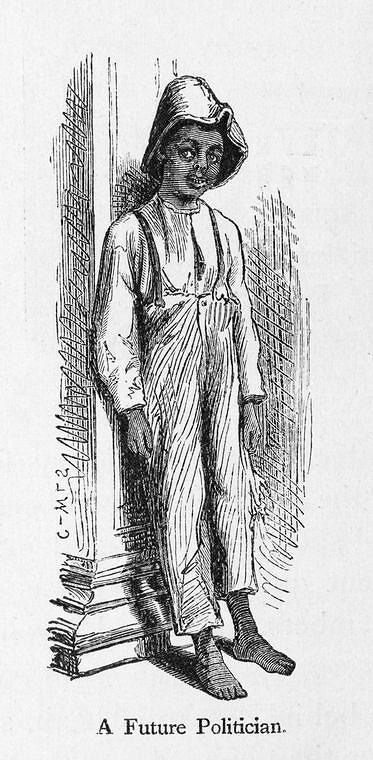
Edward King: A future politician (1874)
"Decency’s probably more resilient than even the most practiced cynicism."
My old colleague and friend, Al, who has followed my writing for about thirty years, reminds me after reading my recent story featuring pointed comments about cynicism that, as a species, we seem to be much better at predicting long recoveries than at experiencing them. He contends that most systems recover much more quickly than their intimates predicted. This pessimism about our resiliency might fuel much despondency. As we watch what we consider Decency crumbling before us, we do more than just order handbaskets. We believe we might never recover from this latest round of insults, even though our history seems resplendent with examples of more rapid recovery. Even if we held the power to regenerate a severed limb spontaneously, we wouldn’t necessarily relish the experience. We might come to believe that we were more finite than we’d ever actually been, and confidently predict that any individual lobbing off would do us in.
We are already recovering from these latest insults, even as the wolves continue devouring so much of what we hold so dear.
BecomingComplicit

Anneliese Hager: Untitled [Portrait A. H.] (1947)
"Attempting to live Decently incurs ever more complicity."
To live is to become complicit. Attempting to live Decently only deepens this dilemma, for one may not insist upon society respecting one’s personal proclivities. Vegans surround themselves with murderers. Choosing to live Decently distances one from some, though it might also bring others closer. The least common denominator seems as unconscionable as it also seems most divisive. No way exists to avoid experiencing this division. The higher the aspiration, the lower the everyday experience. I have cordoned off vast swaths of my community as unworthy of my presence. I won’t shop at Walmart because of their disgustingly indecent business policies toward those they euphemistically call “Their Partners.” I won’t visit the Tractor Supply store since they tried to gain street cred by noisily cancelling their Diversity, Equity, and Inclusion policies under the phony guise of promoting actual equality. I was not born yesterday.
The more I embraced Decency, the more complicit I became.
DeSensing

Louis-Léopold Boilly: The Five Senses (1823)
"Decency primarily exists in the cloudy eyes of its beholders."
Decency requires certain sensitivities before it can be successfully deployed. One must accurately perceive one’s surroundings before one can engage congruently. Imperfections can create divergences such that Decencies escape my ability to properly muster them. I increasingly exist out of context, disconnected from the surrounding world.
Early on, I sensed that this world was someone else’s.
OnBeingDecent...

Giuseppe Maria Mitelli Allegory of the Lightness of Being (1702)
Gallery Notes: This elegantly attired nobleman – who is young (giovine), handsome (bello) and rich (ricco) – flaunts his possessions. His affluence is emphasized by the pile of gold coins on the table and the many costly attributes of art, gaming, and diversions that literally surround him. Yet apparently this is not enough. Amid all this opulence, he looks disillusioned and unsatisfied. Is this all there is?
"Decency's question is rarely what but when."
On Being Decent … In Indecent Places
I can speak with authority only about my personal experiences, and even that ability seems limited. I have nothing to teach anyone else, except by example, often by bad example. I am no paragon of anything except not being a paragon of anything. This context says nothing about the content of whatever I consider here, for I consider here to present an example of considering, not necessarily to conclude anything. That said, I have been writing Decency Stories for eighty-two consecutive days, discovering more than declaiming, sometimes seemingly shaming myself in the process. I have stumbled into contradictions and many tenacious misconceptions, realizing how little I understood the topic of my efforts. As I near the end of this series, I realize that I probably won’t be offering any crisp summarization of my subject at the end. I didn’t intend this effort to reduce understanding into a spare handful, but to expand it. It has proven more expansive than I could have imagined when I began.
One prominent subtext, though, that many of these stories have shown, involves one of the more common yet perplexing situations: On Being Decent In Indecent Places, not How To Be Decent In Indecent Places, but “merely” On Being Decent.
Weekly Writing Summary For The Week Ending 12/11/2025

Carl Gottlieb Guttenberg: The Public Scribe [L'ecrivain public] (1783)
This writing week proved to be a relatively quiet roller coaster ride with highs and lows properly attenuated and ultimately, unsurprisingly, unanticipated. Little happened as I’d either hoped or feared, so much for prescience and good fortune. I’m coming close to concluding that we’re not the deciding factor here; we might thrive on synchronicity and luck, whether good or bad, but ultimately beyond our ability to influence. The fact that we feel an innate ability to control only makes this roller coaster ride more entertaining as our expectations repeatedly and ultimately, thankfully, disappoint our expectations. We should be both well used to and warmly accepting of these disappointments that visit us when we don’t immediately realize that our prescience so frequently fails us.
Decency was not as I'd expected it to manifest.
CynicismProofing
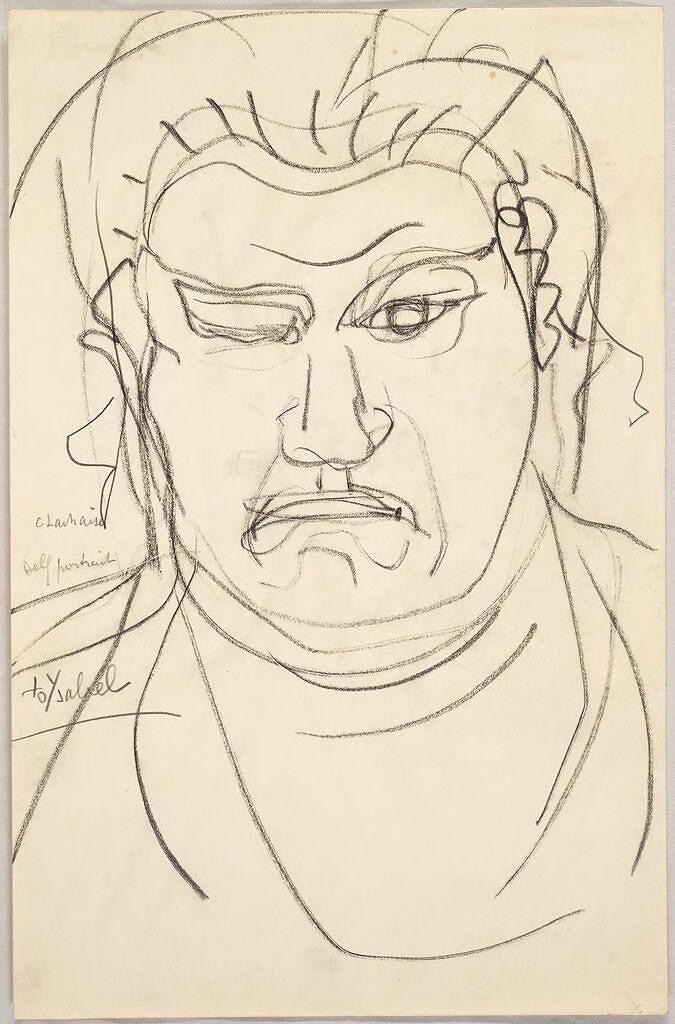
Gaston Lachaise: Self-Portrait (20th century)
"I will mount my defence against encroaching seasonal cynicism with some Decent poems."
I believe that there’s only one essential battle fully worthy of human engagement, the eternal battle against cynicism. Cynicism has always been humanity’s greatest foe. It possesses strange attractors, though. It tends to interest those who have grown weary of the utter predictability of existence, those who convince themselves that they can see through “the game.” Those who contend that they play no game play the most encumbering one of all. The utter predictability of life can sometimes seem like a curse. Three score and ten, give or take, including the genuine risk of an early demise. The galling impermanence of existence off-puts. Those who fain invulnerability embody only cynicism. They project what they claim to oppose by merely breaking rules, as if liberty were little more than a tenacious inability to get along with anybody else.
After a dog-year downwind from utter incompetence, this witness to the attempted reintroduction of cynicism into our governance finds himself exhausted from the unending exertion.
InPractice
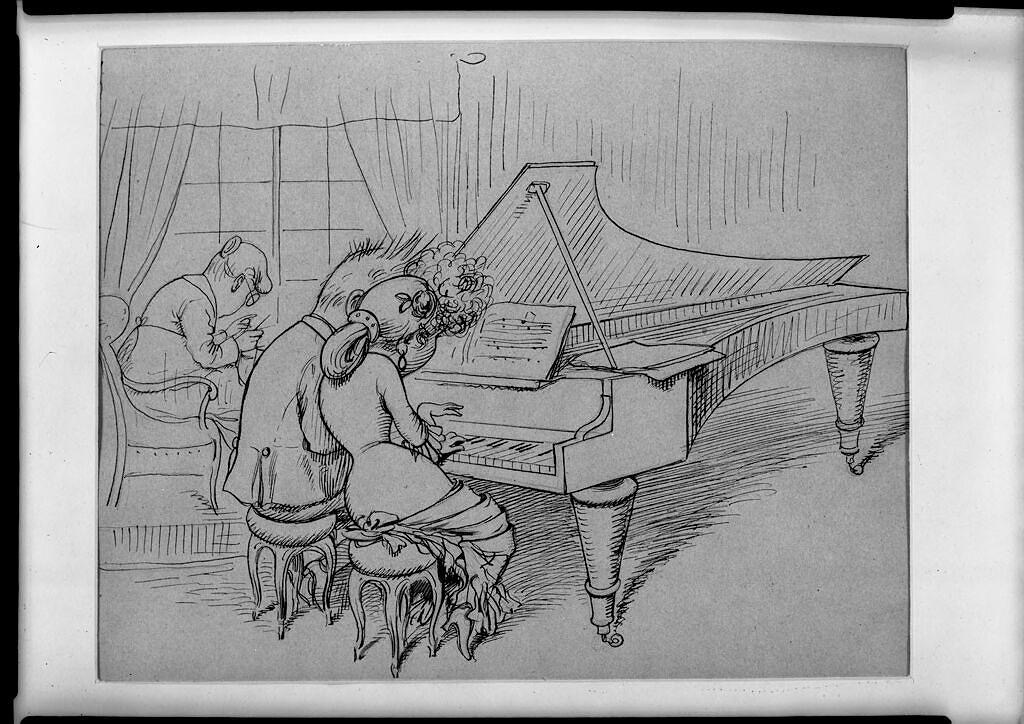
Adolf Oberlaender: The Piano's Revenge: Practice (1882)
"I might have initiated this enquiry only to continue it ad infinitum, InPractice."
I should not feel so surprised when I stumble upon the discovery that Decency, like every other concept, only manifests InPractice. In theory, it seems to contradict itself. Only InPractice does it exhibit its underlying nature, which proves to be indescribable. The description clearly ain’t the thing. InPractice, Decency seems to exhibit little if any ‘thingness.’ Not natively being either person, place, or thing, it steadfastly sidesteps all attempts at facile description, let alone definition. I suppose its dictionary definition performs as well as any dictionary definition might aspire to, though, as I believe I’ve shown in this series so far, much variation swirls around the concept’s central core. Decency can never manifest contextlessly. In fact, Decency seems unusually dependent upon well-formed context to exhibit much of any meaning at all.
You might not notice it when it exhibits.
Endimbenment

Unknown Tibeto-Chinese Artist:
Enlightened Protector Mahakala with Six Arms [Shadbhuja] (18th/19th century)
"Certainty must certainly be the surest sign of ignorance."
Acquiring knowledge and understanding never occurs as advertised. I understood that I would be acquiring something and come to know as a result of my efforts, but the outcome seems to reliably be different than either of those. Determining the endpoint, when such searches are finished, proves challenging, and applying what I learn, even more so, for it seems that I acquire much less, but also much different, than I expected. Even when I adjust my expectations beforehand, based upon my long and disappointed experience, the result underwhelms me. It always seems much simpler than it should properly seem and also much more complicated. I tend to find myself incapable of explaining what I experienced, what I definitively learned. I feel more humbled than haughty.
It’s little wonder why the uneducated look down their noses at eggheads, for the learnéd among us have suffered a shit ton more humility than have the great unwashed.
DecentPeople
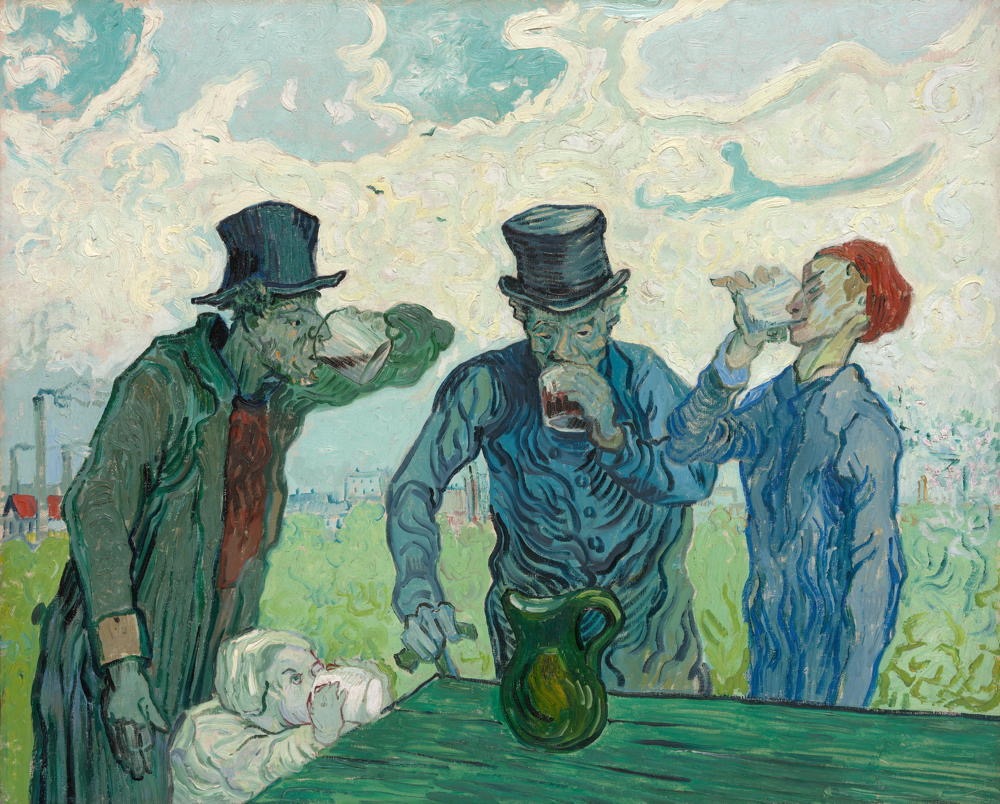
Vincent van Gogh: The Drinkers (1890)
ABOUT THIS ARTWORK
During his time in the Asylum of Saint-Paul in Saint-Rémy, a small town near Arles, Vincent van Gogh made a number of copies of the work of artists he admired, which freed him from having to produce original compositions and allowed him to concentrate instead on interpretation. For this image, Van Gogh copied a wood engraving from Honoré Daumier’s Drinkers, a parody on the four ages of man. The exaggerated figure types capture Daumier’s characteristic humor and convey his sad message about the horrors of alcoholism. The greenish palette may well be an allusion to the notorious alcoholic drink absinthe.
— — —
"My Decencies seem as fleeting as my days."
People seem to have a deep need to classify each other into categories. A deep need for self-esteem might drive this tendency, though there must be better ways for us to feel good about ourselves. This practice seems the likely source of prejudice, misogyny, and a startling list of the more prominent human frailties. I wonder why we couldn’t be generally better than this, since we hold the capacity to make finer judgments and even to choose to make no judgments at all. Would it kill us to make fewer judgments under some ‘judge not, lest ye be judged’ rule? I suspect so.
I feel embarrassed to acknowledge that, in this whole series, of which this writing finds me 85% finished, I have been spouting deep antipathy toward a class I labeled Indecent without clearly defining who belonged to that group.
SelfDeception
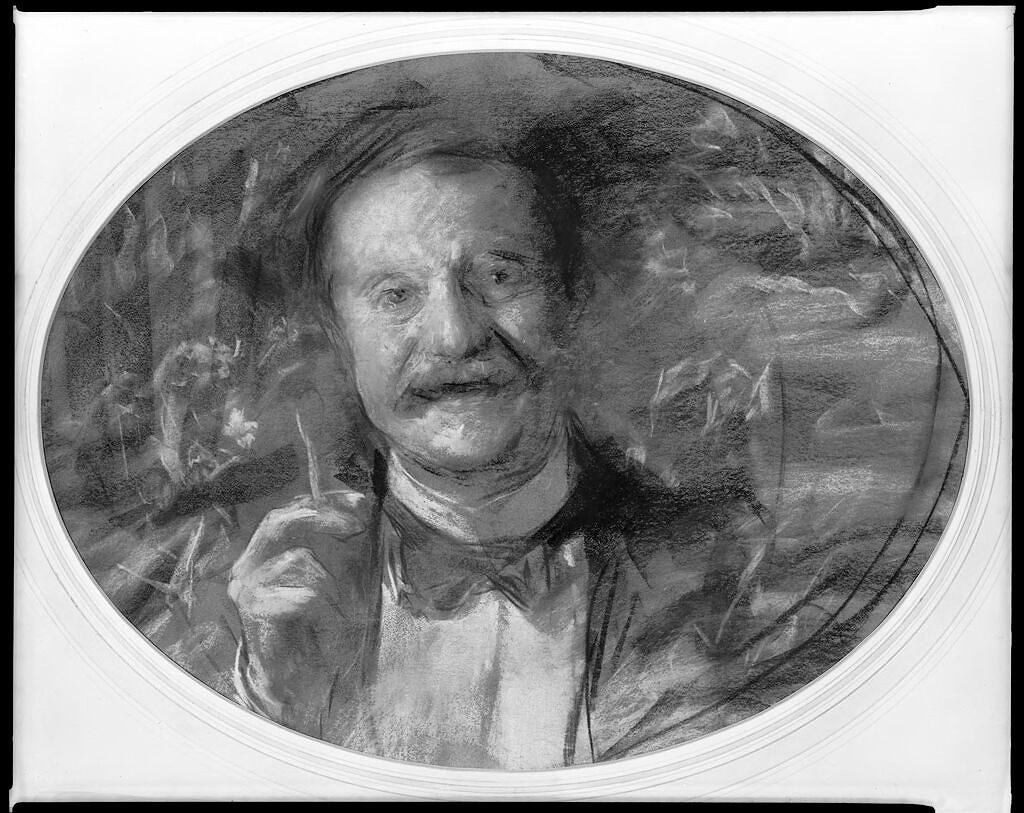
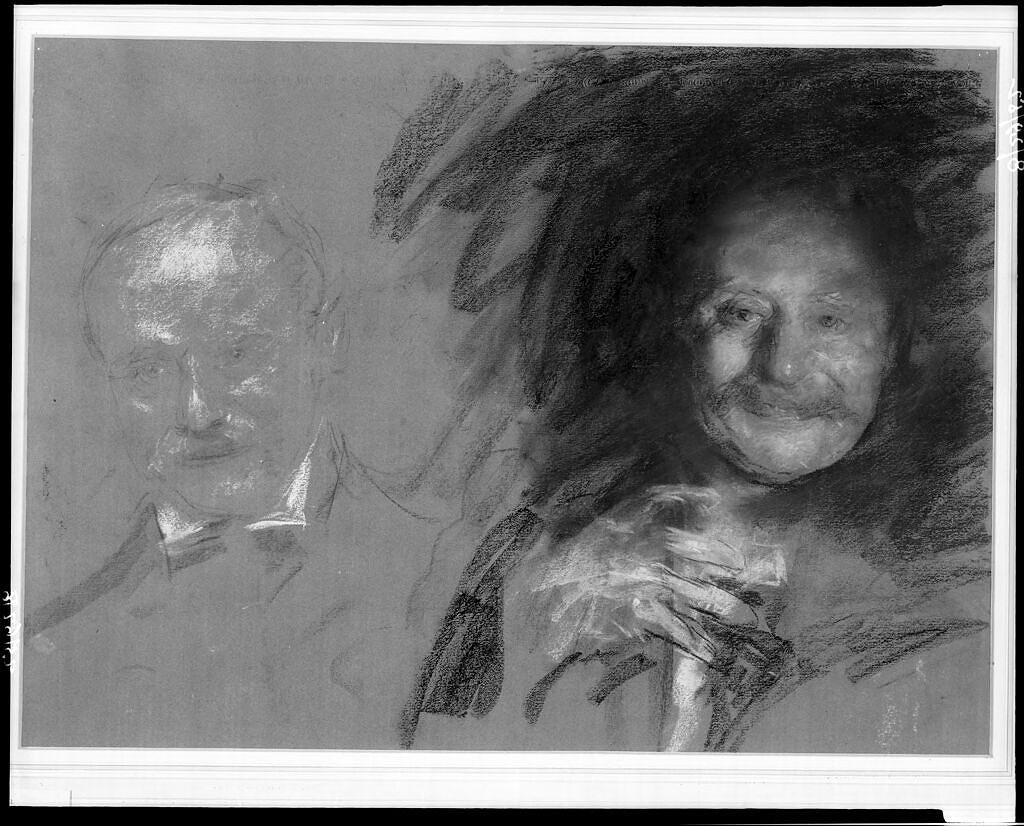
Antonio Mancini: Self Portrait; verso: Two Self Portraits (c. 1900-1902)
"The difference between Decencies might not matter as much as the intensity of each audience member's suspended disbelief, not to mention the actors'."
Discussions of Decency rarely mention the essential role that SelfDeception plays in its daily practice. Unlike a character in a novel or history, the Decent must wrestle with all the complexities and contradictions inherent in any practice. From one minute to the next, conditions might change, disrupting an intended trajectory. So, while one hears plenty of talk about choosing a path, one only rarely hears stories of having to pick and then continually choose again and again. There sometimes seems to be no end to the choosing when it comes to Decency. This can become understandably frustrating, with some loss of focus and discipline seeming common. The Decency originally intended can sometimes get twisted in delivery and manifest in rather embarrassing ways. A Decent SelfDeception might kick in then, to preserve self-esteem. The story remembered often seems divergent from the story as initially intended and executed.
Lapses in discipline are not uncommon.
HarshJudgments
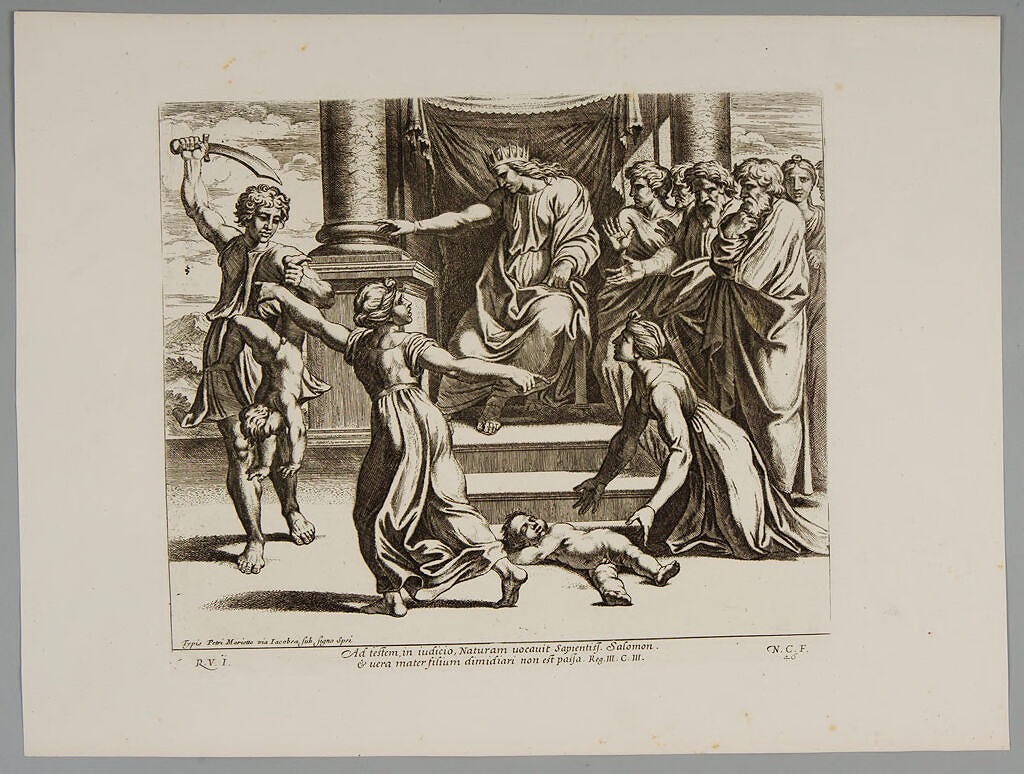
Nicolas Chapron: Judgment of Solomon (17th century)
"Let he who is without indecency cast the first criticism."
The Decent seem to have the greatest license to criticize those with fewer scruples. They appear to inhabit unimpeachable high ground that bestows better judgment, so who better to critique others? Does Decency necessarily assign such a responsibility upon its perveyors, or are they somehow enjoined from overly overtly criticizing, lest that seem unseemly? I suspect the answer to these questions must be the responsibility of each Decent person. I know the answer for myself, though my answer sometimes shifts, depending.
I do believe it’s unseemly of me to criticize harshly, or, perhaps, to criticize at all.
Weekly Writing Summary For The Week Ending 12/04/2025
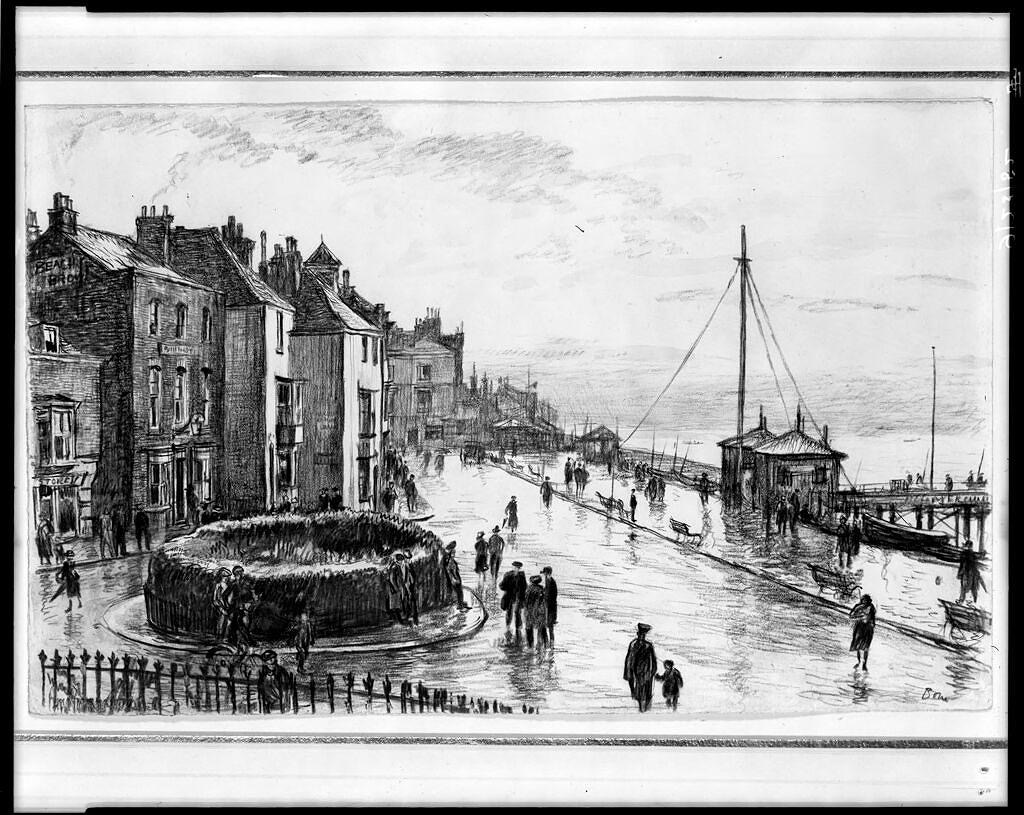
Muirhead Bone: Rainy Day, Deal ((20th century)
This writing week saw the first hard freeze in this Valley They Liked So Well. It also saw the start of its typical seasonal socking-in as this bowl filled with fog that the weakening sun could not manage to burn off. Rudolph the Red-Nosed had a prominent franchise here in my youth, and would today if video games hadn’t undermined most of our traditions. The Villa felt cozy with the fireplace blazing after my granddaughter Tilda struck the fateful match that lit the first pile of kindling and firewood, leaving the fireplace warming through the long post-Thanksgiving weekend. I continued my exploration of Decency in its surprisingly many guises. I suspect that if I focused this much attention on any topic, though, I’d only undermine whatever I thought I understood about it beforehand. Learning settles nothing, but usually opens ever more complicating and confusing cans of worms, ad infinitum.
Ferocency

Hieronymus Wierix: Cruelty (1577)
Gallery Notes:
The female personification of Cruelty (Crudelitas) sits on a bag where the collected grain flows out. She hands a bread with a fish to a dog, and a stone with a snake to a young child. In the tree behind her sits an owl with a burning heart in its beak. On the left in the background a river with a current acceleration. On the right in the background a face on a village. On a field, a woman sprinkles food for the pigs. In the margin, a six-line exlanatory poem in Dutch, Latin and French.
— — —
"Under certain uncertain conditions, a two-by-four to the side of the head could be considered an intervention of Decency."
Varying intensities are permitted when deploying Decency. It needn’t always seem gentle or even necessarily kind. As with most things, tough love equivalents unquestionably exist, though one must usually deploy them circumspectly lest motive be interpreted differently than intended. In business, for instance, certain otherwise unseemly intensities seem permitted under the self-referential rubric that “business is business,” a multi-purpose excuse intended to cover every possible variation. It seems as though nobody can call “violation” regardless of the intensity of the application if it’s done in the pursuit of profits.
I’ve also noticed a certain erosion of what used to pass for decorum, allowing for some rather coarse words to be injected into otherwise benign conversation.
MoralHazards

Unidentified Artist: Danvers, Massachusetts Insane Hospital (c. 1903)
"What does it mean to respond Decently then?"
Decency seems to demand continual adaptation. What constitutes Decency in one context might border on indecency in an adjacent space. Further, emotional states also enter into this calculus. One might easily justify different responses when feeling angry than when feeling secure. Decency does not provide an isolated or isolating platform for responding. Everybody’s inescapably in each fray together, whatever their behavioral or moral preference. It might not prove helpful to equate Decency with morality, especially when subtle senses of superiority creep into the internal conversation. That said, the Decent might behave more consistently, if only because they insist upon certain limits and boundaries. There are probably many more things Decency won’t consent to do than indecency even notices.
I’m fussing today about how Decency can get twisted in the presence of the insane.
InnerIndecency

Honoré Victorin Daumier: The Emperor of Morocco in Consultation With the Famous Magician Desbarolles. “- This small line here indicates to me that you are going to get a royal thrashing!,” plate 126 from Actualités (1859)
"They ultimately only manage to fool themselves."
Some things I firmly believe that I can see might not actually exist. Belief provides more than adequate evidence to convince almost anybody that almost any nonexistent entity probably exists. Beliefs can be remarkably incorrigible beasts, so they must be held with a certain circumspection. They might support unshakeable conviction in absolute fiction. I concede that many of the worst indecencies I’ve ever witnessed fed on just such convictions.
Furthermore, few who held those convictions were ever considered to be felons, though the damage they inflicted might well have supported criminal indictment.
SelfDealing
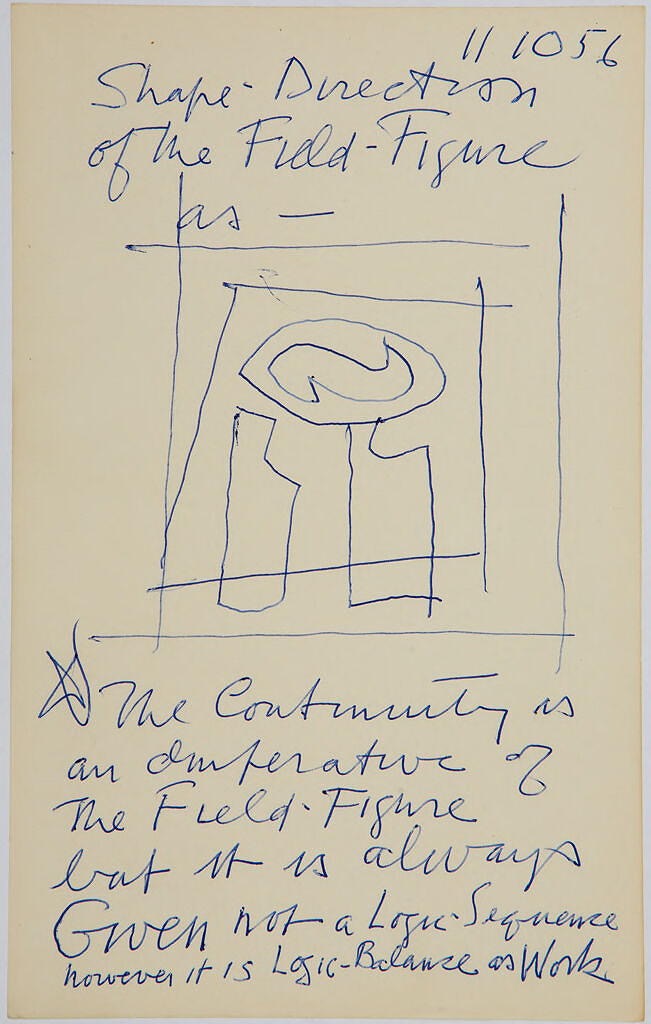
Stuart Davis: Study for “Package Deal” (1956)
"Nobody Decently corners any competition."
Decency requires some hair-splitting. One must somehow manage to sustain oneself without over-reaching. Society maintains laws against monopoly because we deem SelfDealing indecent. It’s unseemly for anybody to merely compete with their own interests. It’s considered Decent to engage as a part of a system rather than as the entirety of it. Monopolists freeze others out, essentially robbing them of opportunity, however much their monopoly might resemble greater efficiency. Efficiency in the service of nobody else amounts to wasted effort. Efficient monopolies are merely rapacious.
Oligarchies are monopolies on steroids.
RelativeDecency
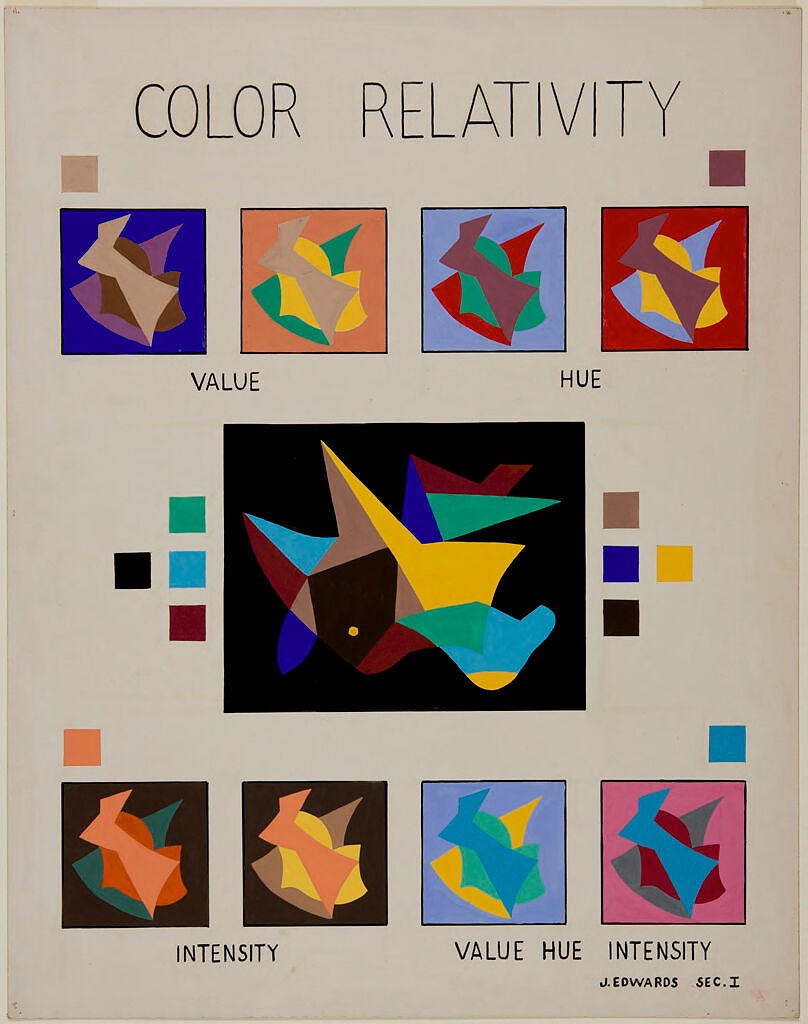
J. Edwards*: Color Relativity (1942-1949)
*Newcomb College Art School Student
"…I will remain confident that I understand what constitutes some relatively absolute Decencies."
Like everything else, Decency exists on a sliding scale. Few absolutes seem appropriate when considering it. One person’s Decency might well prove to be another’s downfall. Further, it often appears in know-it-when-I-see-it guises. I sometimes feel surprised to find that what I thought might degrade me turns out to elevate me instead. Likewise, some actions initiated in good faith and lofty intentions leave me feeling humiliated. Even with my considerable decades of experience, I have yet to develop a foolproof method for classifying Decencies. Yet I continue as if I understood, as if I could know how to tell Decency in action. I’ve many times proven myself fully capable of fooling myself. What could be preventing anyone else from fooling me, too?
I still consider myself firmly on the side of Decent.
D_e_C_ency
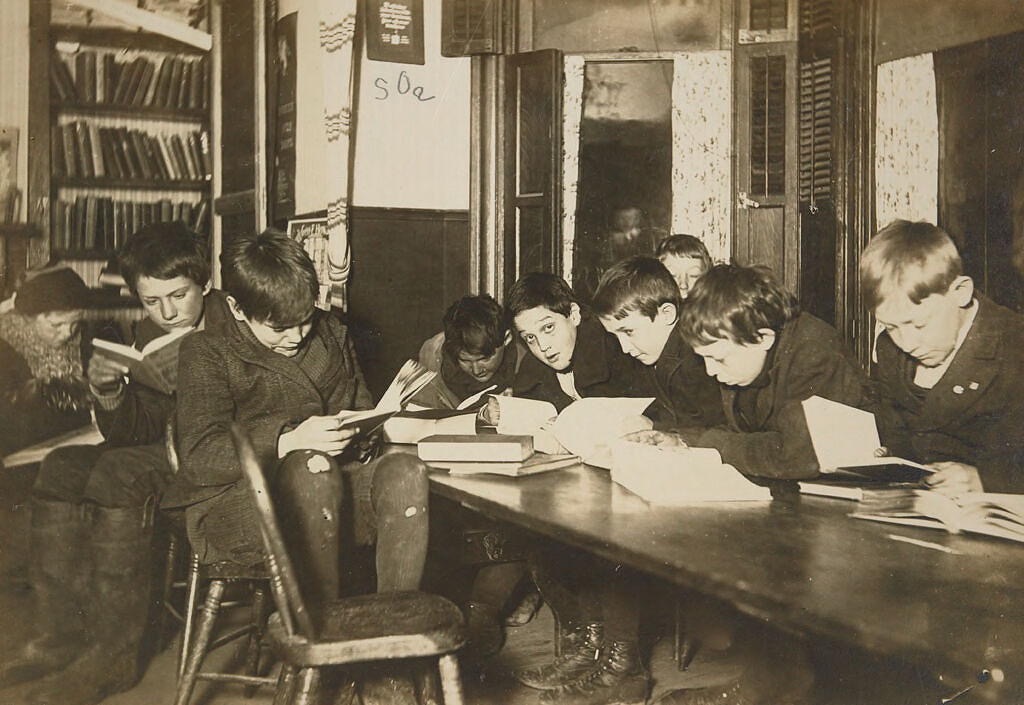
Unidentified Artist: Social Settlements: United States.
District of Columbia. Washington.
"Noel House": Noel House, Washington, D.C.:
Library and Reading Room (. 1903)
"Beware the land speculator promising to eliminate non-existent swamps."
Contrary to popularly promoted misconceptions, our nation’s Capitol was never a shithole. It did begin life as a swamp, one owned by that era’s most enthusiastic land speculator and so-called founder of our country, none other than General Geo. Washington, esquire. Those promising to “Drain The Swamp” were centuries too late, for the original swamp had long before been drained and filled to allow a truly great city to be built. The result was not, like most of this world’s capitols, some ancient artifact built on ruins, but a testament to a country’s citizens’ dedication to self-governance. They funded and built an odd collection of buildings, some grand and inspiring, others quite the opposite. The boulevards were broad and laid out so that every few ran diagonally. The result seemed absolutely unique in this as well as every other country. Its heritage was that of a swamp, for sure, but its legacy was self-esteem.
Many have noted that perhaps the primary function of government has always been to “Make Sausage.”
Weekly Writing Summary For The Week Ending 11/27/2025
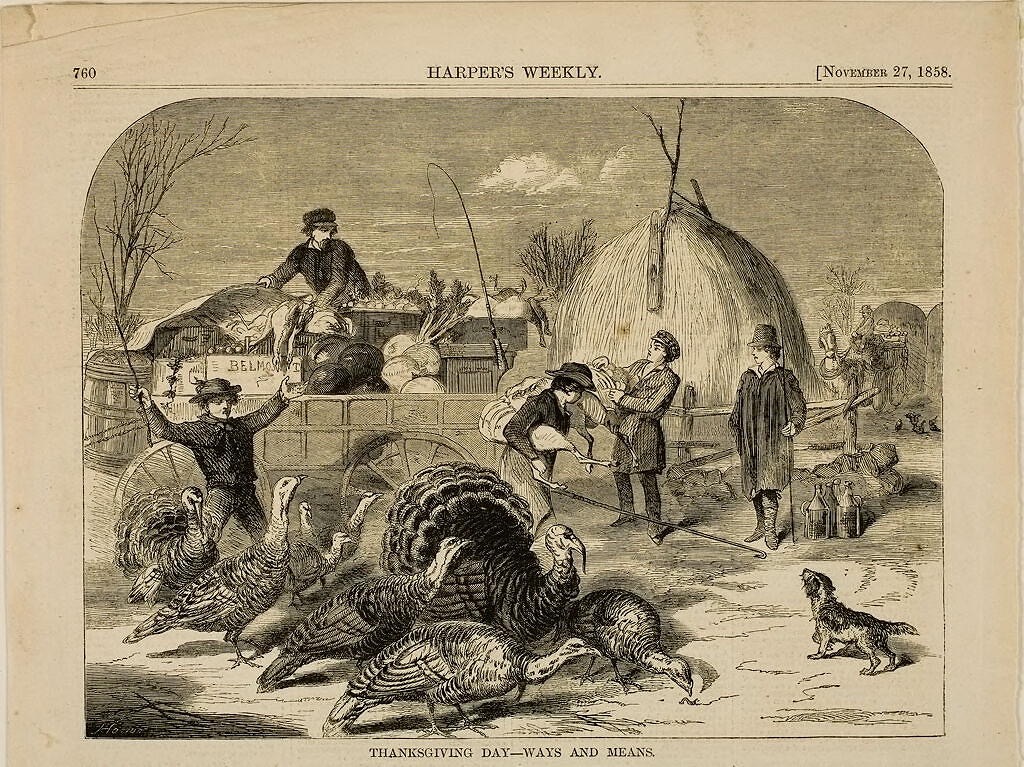
Designed by Winslow Homer: Thanksgiving Day - Ways and Means
Harper's Weekly, November 27, 1858
This writing week, like every previous week, was destined to become a writing week that was. Like you, I live with a trailing tail endlessly emerging, persistently trailing me, and refusing to let go of my present past or my fading presence. I routinely accomplish considerably less than I might otherwise prove capable of producing. Any engine designed with the presumption that it might perform at its design peak was always designed to fail. Any engine built to perform well beneath its design spec was always built to actually exceed its more optimistic expectations. I began this writing week naming a familiar haunt, the Dundency that has always followed me. I praised that most unlikely and always welcomed couple, Dignity and Freedom. I reframed my experience of Decency as a Decendency rather than as an ascendancy up and into any place above. I reported that indecency seems radioactive in Radioactivization (which is a term Google® found no hits for on the internets). I ended this week with a short screed insisting that Decency must be deployed relentlessly if it is to be effectively used. I appreciate all those who shamelessly employ their Decency without ever once necessarily expecting to be rewarded for their efforts. Bless us all as we defend the continuing insults to our Dignity again. Thank you for following along!
Relentless

Félix Edouard Vallotton: Cover for Paris Intense (1894)
"This necessarily requires that the Decent fear less and be Relentless more."
As near as I can determine from here, the universal antidote to indecency must be RelentlessDecency. Nothing more annoys the indecent than Relentlessness being employed in the service of the Decent. I know that we most often associate Relentlessness with more nefarious activities. However, I suppose that Decency probably seems evil enough to the indecent, perhaps among the most heinous possible activities, especially for the Relentlessly indecent. To be Relentless in the service of the good side of any equation demonstrates a reassuring dedication, for even Decency demands some consistency. Nobody much appreciates the merely fair weather Decent. One must, it seems, become requisitely Relentless to be taken very seriously. If I retreat into numbed silence or simply disappear whenever another indecency appears, especially when it seems Relentless itself, I might just as well have never been here. My sporadic contributions to the general well-being might not have gone for naught, but they probably didn’t go half as far as they might have gone had I more diligently held my ground.
Relentless Decency demands some courage from its practitioner, for it won’t always feel safe to honestly display your Decency when immersed in some den of iniquity.
Radioactivization

Barbara Norfleet: High level radioactive waste storage tank: Savannah River Plant (300 square miles): Aiken, SC. 35 million gallons of high level radioactive waste are stored in the deteriorating tanks
Series/Book Title: The Landscape of the Cold War(1988)
Harvard Art Museums/Fogg Museum, Gift of Barbara Norfleet © Barbara Norfleet (2010)
"That's what Decency appears to be here for."
Indecencies seem radioactive to me. They perform like unstable elements, bleeding atoms on their way to becoming something else. They are by their very nature transitory and poisonous. They produce waste that outlives their original purpose. They prove unsuitable for use in anything lasting. We do not build bridges out of radioactive materials for good reasons. We avoid including them in connecting roads, too. They can produce relatively short bursts of extreme energy and, when properly harnessed, longer-lived power. Whatever the use, though, they leave behind messes far exceeding their initially intended usefulness. Their use requires more than usual justification.
I visited my dentist last week and noticed that they no longer draped a reassuringly weighted lead-lined blanket over me when taking pictures of my mouth.
Descending_Into_Decency
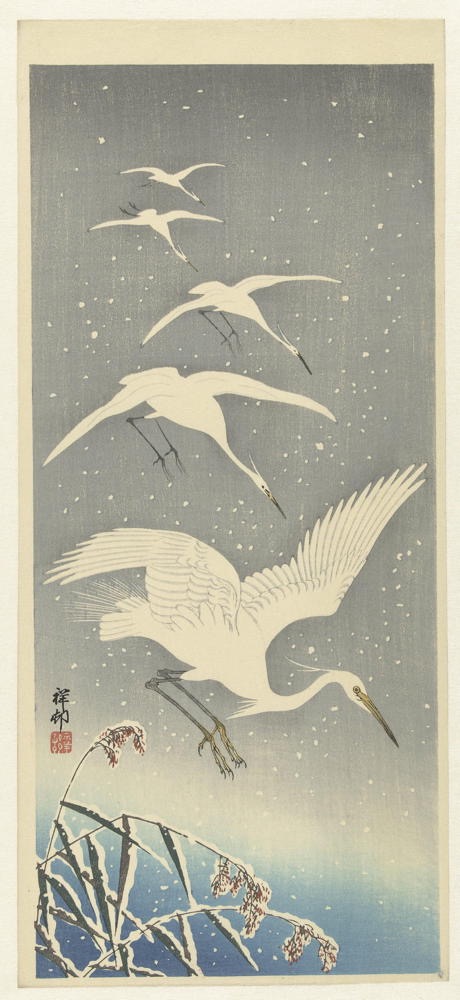
Ohara Koson: Descending egrets in snow (1925 - 1936)
Five settling herons between snowflakes; snowy reed at the bottom left.
"That's how Descending Into Decency feels to me."
I instinctively think of Decency as holding an elevated position, slightly higher and left of some center line. When I engage in an act of Decency, though, I feel a sensation more like Descending. I reflectively think of myself as Descending into Decency rather than stepping up into it. This descending should not be mistaken as degrading or any of the other coming-down metaphors. Decency feels like immersive activity, effort that seems to cloak and reassure me, as if I were being carried and cared for, even though I know I’m the one caring for myself in those moments. Decency seems inherently innocent. It expresses an inner innocence regardless of a person’s prior experiences. It can even be an antidote to some experiences, a penance, or a form of forgiveness.
Because Decency’s always a choice, it brings certain limitations.
CommonDecency
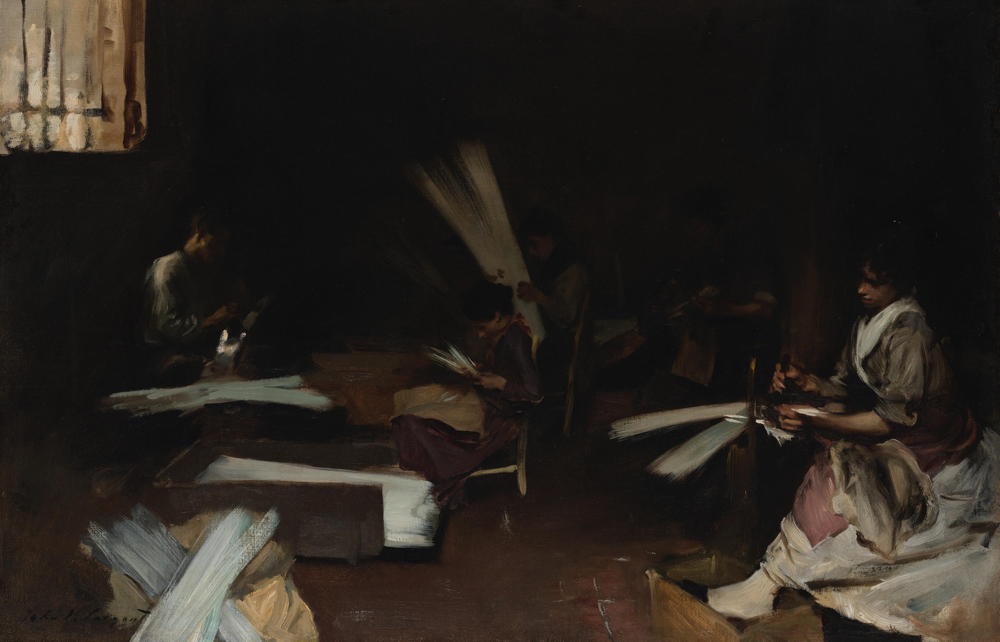
John Singer Sargent: Venetian Glass Workers (1880–82)
ABOUT THIS ARTWORK
Trained in Paris, John Singer Sargent traveled to Spain, the Netherlands, and Italy early in his career in order to study how painters such as Diego Velázquez and Frans Hals captured the effects of light and rendered figures in space. Venetian Glass Workers is one of several genre scenes featuring glass-bead workers that Sargent executed in the early 1880s. This backlit view of a shop in Venice is dark and atmospheric except for the brilliant strokes of light green and silvery white paint that describe the canes of glass as tradespeople prepare to cut them into bead-sized pieces, which will then be polished and strung into jewelry.
— —
"…everything's extraordinary, especially and including CommonDecency."
I once inhabited a now utterly mythical place: The Past. What seemed ordinary and commonplace then, when it was present, seems utterly extraordinary and absolutely unattainable now. I do not mean that some rare and special things are now rarer and even more special, but that even the most pedestrianly commonplace items have now joined the ranks of the exceptional. I can almost experience these once-so-ordinary things vicariously now, through dreams and fading memories, though the colors and textures seem blunted after the passage of so much time.
I have been noticing lately just how remarkable almost everything suddenly seems.
Dignity&Freedom
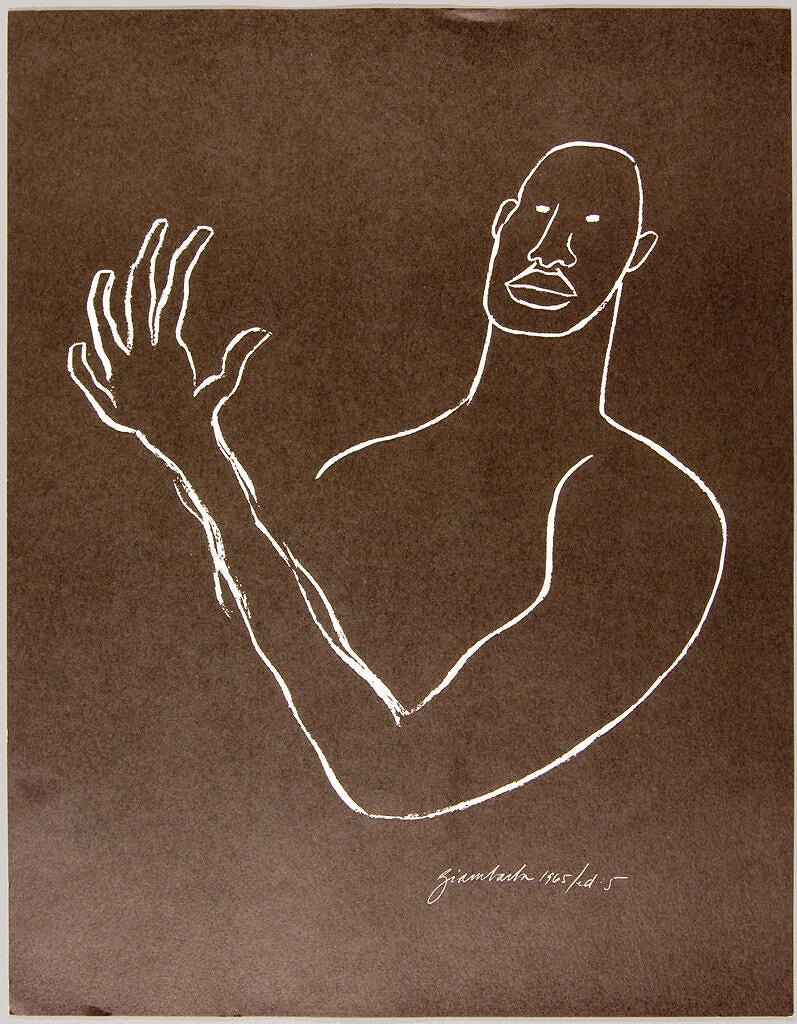
Paul Giambarba: The Withered Arm (c. 1960)
"May Dignity&Freedom never abandon them…"
Facing invasion by a hostile neighbor, Ukraine declared its purpose for defending its sovereignty. It announced that it was fighting for Dignity&Freedom. Their Freedom demanded a deeper purpose. It could not stand alone as sufficient to justify the suffering inflicted in its defense. Dignity would have to be Freedom’s companion to properly justify the struggle. This combination has lent Decency to Ukraine’s otherwise purely defensive strategies, inspiring freedom-loving nations around the world. Unfortunately, my country tisn’t of this at present. Our incumbent has made it his special mission to discourage our intrepid ally by denying it the necessary and prudent support that any freedom-loving nation deserves.
Now the world observes a different struggle, one between Decency and its enemies, who presently most prominently include Russia and the once United States.
Duncency
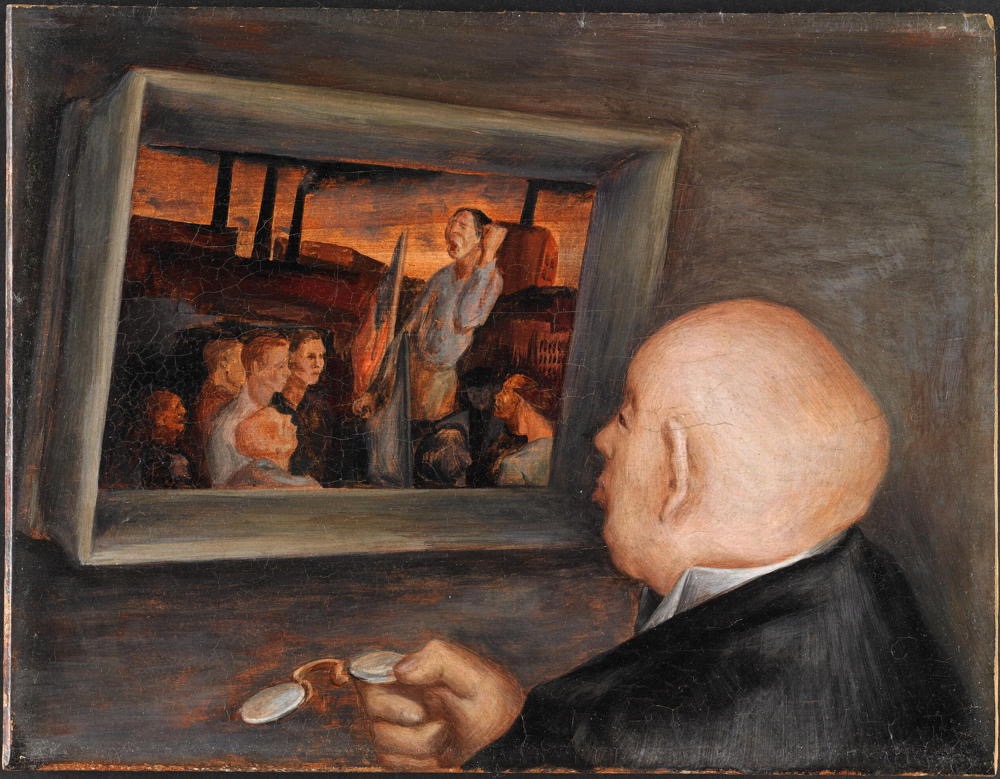
Mervin Jules: The Art Lover (1937)
Gallery Notes:
An admirer of 19th-century French artist Honoré Daumier’s social caricatures, Mervin Jules satirizes the myopic gaze of a bourgeois connoisseur scrutinizing a painting. The painting-within-a-painting depicts workers demonstrating against the backdrop of a smoke-filled industrial landscape. The subject memorializes the infamous 1937 Little Steel strike, during which police fired on unarmed unionized steelworkers and their sympathizers protesting low wages and poor working conditions. Jules executed this painting during a formative time when he was studying with Thomas Hart Benton at the Art Students League and employed by the silkscreen unit of the Works Progress Administration.
— — —
"Let such mysteries be."
Not all Decencies contain the same quantity of sincerity. Some seem more phony than actual. Some seem counterfactual. I mention this not to encourage paranoia, for minor discrepancies are probably nothing to lose much sleep over. For one reason or another, or for no discernible reason at all, some will pretend to be acting Decently when they actually aren’t. The motive probably doesn’t matter. The insincerity says much more about them than it ever could about you, and what it says about them will probably remain unspoken, even if you were to break ranks and ask after the disconnect. These acts most often remain uncommentable. You might be able to convince yourself that something smells fishy, but the fish rarely admits to any deliberate deception, or even inadvertent. This often means they’re not aware of their inauthenticity. So be that.
I speak here of that niceness that seems out of context.
Weekly Writing Summary For The Week Ending 11/20/2025

Jean Jacques de Boissieu: Old Man with a Boy Reading (1770)
Our concrete contractor, Pablo, and his crew laid a new sidewalk on the north side of our newly refurbished front porch this week, bringing us one step closer to completing our infinite front porch remodeling project. A new sidewalk serves as the closest thing The Muse and I might ever contribute to permanence here, lasting evidence that someone once lived here, evidence that should last well into the following century. This Writing Week proved to be more speculative than concrete. Change seemed prominent without necessarily feeling imminent. Our hapless administration, still apparently uninterested in administering anything, has been exhibiting some gravely serious difficulties recruiting and retaining EvilPeople in sufficient numbers to completely undermine our Democratic order. I sensed an impending Awakening. The Elites seemed teetering again, on their usual precipice of greatness … or something. I praised our sacred Jurisprudence, which has proven to be the most stalwart defender of our civic Decency. I admitted to feeling Enraged, however politically unacceptable that emotion might seem in a discussion of Decency. I ended this writing week praising the Insubordinate as the true patriot of Decency in our ongoing passion play. Thank you for following along with me here.
Insubordinate

Pierre-Paul Prud’hon: Head of Vengeance (c. 1804)
ABOUT THIS ARTWORK
A study for the figure of Divine Vengeance in Prud’hon’s celebrated paintingJustice and Divine Vengeance Pursuing Crime (1808), the head of Vengeance, who pursues Crime as an agent of Justice, brilliantly reflects the artist’s stated aim for the painting: “to give a commotion to the soul.”
Although the drawing’s blue paper has faded almost completely to gray, the work’s expressive power remains intact.
——
"The Decent direct themselves for their own damned reasons…"
Decency must be an Insubordinate act. It cannot be ordered or productively insisted upon, but must be more or less freely chosen by the individual engaging in it. One may take instruction in its practice, though this offers little beyond a grasp of its underlying concept. Practice proves different in actual practice and utterly depends on context, which shifts so that any two instances might prove the opposite of being indistinguishable from each other. Even experienced practitioners often wonder if what they just tried really represented the Decency they intended. Not even the receiver can always confirm receipt. So much of its delivery depends upon intention, which often necessarily remains implicit. Decency frequently appears in unexpected guises.
Indecencies can easily be coerced.
EnRaged

William Hogarth: The Enraged Musician (November 1741)
"Don't tread on Decency!"
Contrary to popular misconception, the Decent do not naturally lean heavily toward passivity. In some significant ways, Decency can encourage a fury, if only because it tends to sharpen sensibilities. Those incapable of properly parsing experiences, who live a more numbed existence, might find it more challenging to act out when encountering the subtly outrageous. Many infractions fail to piece together their native insensitivity. This can lead to a disturbing passivity. Those, however, more primed to sense disturbing differences might be much more easily encouraged to respond with rage, and even to complain that certain events leave them feeling EnRaged. This fury doesn’t always show, for Decency sometimes, even often, paradoxically, encourages a stifling of certain rages, lest a reaction appear equally outrageous. The resulting ‘anger turned inward’ can spawn periods of dark depression as inner frustration fails to find adequate release in outward expression.
The Decent sometimes foments dissent.
Jurisprudence

Raphael Morghen: Jurisprudence (18th-19th century)
"Even those who assault our Jurisprudence deserve justice. Decency demands it."
We hold our judicial system sacred, or we have. It has seemed imperiled lately, if only due to the sudden incursion of indecency into her hallowed halls. Our Jurisprudence was the store of our society’s civic Decency, though it has lately seen repeated attempts to degrade it. These have been mainly unsuccessful, if only due to the native ineptness as lawyers of the agents of indecency attempting to intrude. They have filed motions that don’t pass muster and suits that almost always prove frivolous. Our budding Department of Injustice turns out to actually be a department of dunces and indecencies in practice. They seem to believe that they can make anything so by merely declaring it so. However, our Jurisprudence, by which I mean our legal philosophy and long traditions, usually renders that functionally impossible, thank heavens.
Between judges chosen for their partiality and a SCOTUS half dedicated to indecency, our civic Decency has sometimes been taking it in the shorts.
Elites

Eugène Carrière: Elise Smiling (1895)
"…they always seem to disappoint us and themselves in practice."
Some hold a belief in the absolute necessity of maintaining an Elite class in a society. History provides strong evidence against this belief. The story insists that Elites set the standards others follow and sustain society’s highest ground, enabling “regular” people to attend to lesser interests. This notion contradicts the first principle upon which this country was founded: the notion that all people are created equal. The historical record reveals many examples of Elites who, rather than serving their publics, merely served themselves. Crowned heads more often abused their power than wisely deployed it. Of all the awful notions humans have spawned, the notion of the necessity of superiority might have proven to be the worst. Yet, we still worship leaders and imagine them somehow superhumanly capable when, much more often, they’ve proven to possess feet of the most fragile clay.
Our country was founded partly to address the paradoxes that Plutocracy inevitably produces.
Awakening

Henry Duff Linton and Edmond Morin: Awakening (19th century)
"…American Dreams emerge from Awakenings."
The question of when our incumbent might start to seriously bleed supporters has been prominent in the minds of his many detractors. For us, and I consider myself a prominent detractor, it was always unthinkable that anyone might even imagine supporting him, for he seemed simply vile. His incoherence alone rendered him unsupportable since nobody has ever successfully parsed even his simplest utterances. Still, he seemed to possess some hypnotizing power, an astonishingly strange attractor, that reliably attracted and retained what he labeled his base. His base seemed at least aptly labeled, for they seemed to follow their leader beyond the depths of conventional political depravity. This devotion was truly disgusting to me. He’d famously insisted that he could stand in the middle of Fifth Avenue in New York City and shoot somebody and nobody would raise an eyebrow.
That “Teflon Don” capability seems to have started weakening lately.
EvilPeople

William Sharp: Evil (18th century)
"…never in sufficient numbers to succeed, thank heavens."
A promising dispatch from the front lines of The War On Decency reports an apparent sharp decline in the ready availability of additional EvilPeople to populate the ranks of the administration uninterested in administering anything’s many anti-Decency programs. Reports indicate that hiring and performance bonuses have proven inadequate to attract sufficient numbers of eager candidates. Further, a reassuring swell in voluntary resignations has only added to MAGA’s staffing problems. It seems that officials grossly overestimated the number of Americans who would voluntarily stand against their fellow citizens. This shortage was reportedly the deciding factor behind our incumbent ordering National Guard troops to be mobilized into our cities. Adequate numbers of volunteers refused the assignment. Now, though, with courts refusing to permit our incumbent from deploying the National Guard against citizens, the whole movement seems increasingly imperiled.
Their naive belief that we would not prove to be Decent people under pressure has apparently bitten them in their collective ass.
Weekly Writing Summary For The Week Ending 11/13/2025
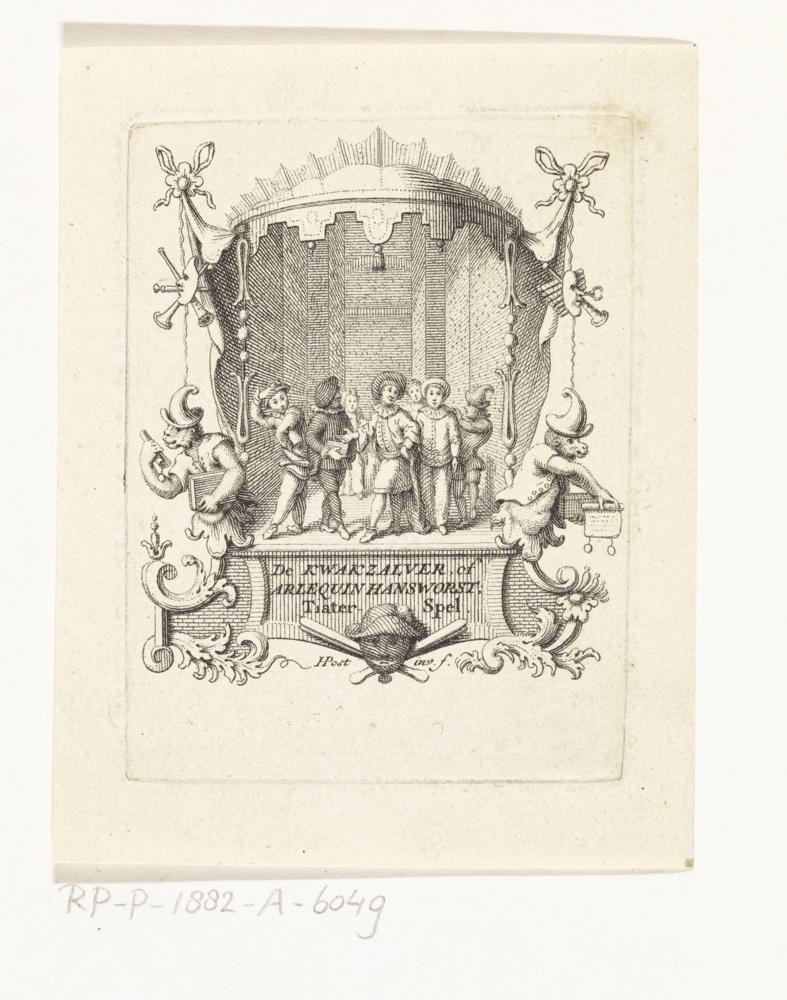
Hendrik Post: Title vignette of "the quack" (1718 - 1751)
Vignette with a group of actors inside an ornamental frame with musical instruments and masks and two monkeys with zots hoods, holding books and documents with stamps. The title of the farce is on a wall under the stage.
This writing week proved to be a genuine discovery. As usual, I set off on this adventure not understanding the purpose of the excursion. I consider this factor to be de rigeuor. If I planned beforehand or (shudder) outlined the trip before I took it, I sense that I might have leached most of the eventual potential out of it. I entered naked and, right off the bat, I hit at least a double into the corner with ThanksTaking. In this venial season of political degradation, it made perfect sense (and I make no overstatement suggesting this) to downgrade the usual, familiar Thanksgiving celebration to the level of the typical druid appreciation: roasted gruel with a side of sour cide, instead of the usual turkey with trimmings. I then entered into a short series of side-explorations, considering the relationships between Decency and Disgrace, Disgust, and Misdirection. I then slipped into a half-remarkable question: What might be the MotiveToDecency, given that it offers no clear evolutionary superiority? I ended this writing week admitting that I've been increasingly resembling one of my old nemeses, whom I had always considered somehow beneath me: the venerable and disturingly similar to me, the ever-Decent Mr. Magoo! Thank you for following along on these voyages of discovery!
MrMagoo
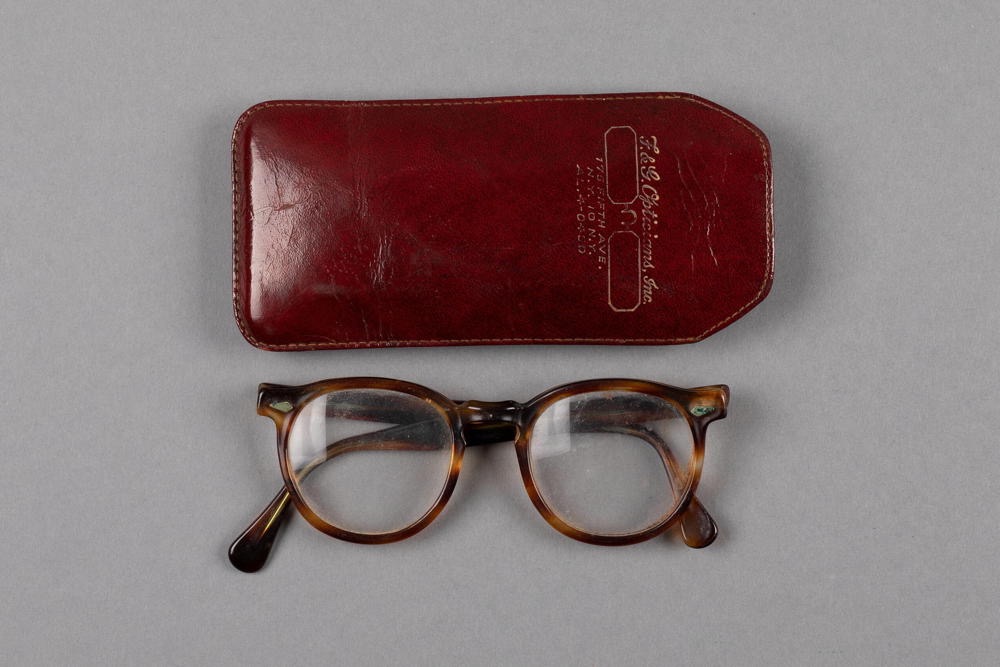
Eyeglasses, in case, Archival Material (20th century)
Collection of Barnett and Annalee Newman
"Wisdom comes from noticing the ridiculed other is us.
Acknowledging this preserves Decency."
MaGoo was a Decent man by most accounts. He was never accused of intending cruelty. Quite the opposite, he was, by all accounts, an innocent, guilty of perhaps, at worst, naivety, at best, a tenacious ignorance. He never knew what he didn’t suspect, and he apparently never suspected anything nefarious about anybody, including himself. His sole sin, if, indeed, this could be counted as a sin, was his steadfast refusal to wear glasses. Being extremely near-sighted, this insistence produced hilarious results as he continually misidentified virtually everything he encountered. He could have easily qualified as The Man Who Mistook His Wife For A Hat, had he been married. He was not ‘touched in the head,’ as was often said in his day, but tenaciously ignorant of the world he inhabited. Because he never knew better, he never suffered. He continually encountered life-threatening situations without once suffering any adverse consequences. It was as if he carried a guardian angel on his shoulders, or one carried him on hers.
In my youth, I watched MaGoo’s antics as portrayed on a cartoon series.
MotiveToDecency
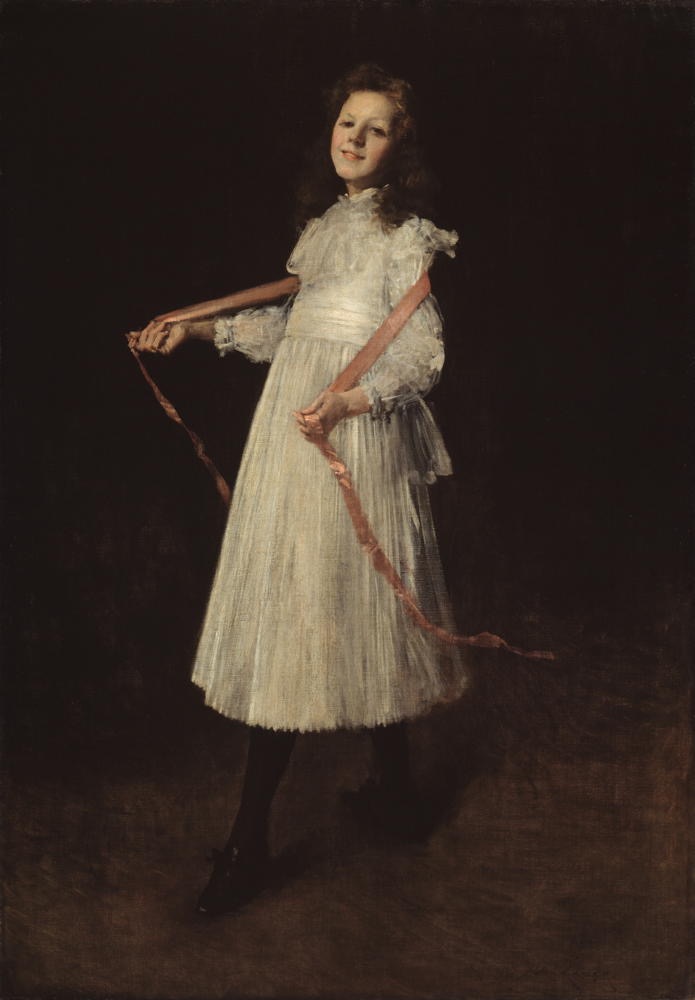
William Merritt Chase: Alice (1892)
"It's me, mustering my own Decency for its own sake. That's plenty."
It doesn’t seem fair that Decency doesn’t bestow special privileges on those who practice it. The Decent get sick and die at pretty much the same rate as the indecent do, so Decency might not provide any evolutionary advantage. Likewise, we see Decent people being taken advantage of, despite their good records. Decency also seems like a difficulty when compared to its alternatives. Just appearing upstanding can prove exhausting, and maintaining a Decent reputation can sometimes seem life-threatening. Those who cut corners without remorse might seem to inhabit the most advantageous universe. Someone else absorbs their overhead costs while Decency spends extra resources dotting their ‘t’s and crossing their ‘i’s. Why?
The MotiveToDecency mystifies me.
MisDirection

Jean Daullé: The Magic Lantern (1757)
"Why, then, does Decency so often prevail?"
Contrary to popular misconception, Decency is not necessarily in a competition with indecency. They might both exist on some imaginary continuum, but that line bisects dimensions as well as linear space. It’s more diagonal than level, and not necessarily a straight or narrow line connecting the two poles, which cannot be adequately characterized as opposites without ignoring some rather obvious similarities. One continuing challenge stems from the straightforward-seeming notion of good and bad, beneficial and evil. Decency isn’t necessarily without sin, and indecency doesn’t always qualify as even a venial sin. Decency might satisfy convention while offending with pretension. Indecency might occasionally be absolutely necessary. Let he without indecency cast the first stone.
Indecency might seem to lack the discipline necessary to fully abide by the rules.
Disgust

Pieter van den Berge: Disgust (1675 to 1737)
A man, and face, sitting on the ground, his legs and arms rejecting to the left.
"We bring the conversation around to less upsetting topics before the dessert course gets served to aid digestion."
I feel odd mentioning this, but I’ve been noticing Disgust being expressed whenever Decent people gather these days. I’d never before closely associated Disgust and Decency, but upon deeper reflection, I suppose it makes sense that they might commonly appear together. You see, the Decent possess a palate capable of sensing the sorts of dysfunction capable of producing Disgust. Some seem to be able to engage in most any lowlife activity without turning their stomach, while others find revolting displays entertaining. Those who find cage fighting diverting, for example, probably aren’t the same ones who attend symphony concerts. I understand that the standards by which audiences judge performances have changed over the generations; nobody gives a second’s thought these days to watching a bloody murder mystery over dinner.
Some core discerning Decencies remain.
Disgrace

Anonymous Italian, Venetian: Book IX.5.
Roman consuls are sent under the yoke of Samnites
and are exposed to disgrace {Primae Decadis Liber Nonus p. LXXV}
Series/Book Title: Illustrations from Livy, Decades. Venice, Philipp Pincio, September 27, 1511
(1493)
"Wherever Decency seems endangered, some Disgrace is being denied."
Indecency seems to be somehow related to Disgrace, though I’m uncertain which serves as the chicken and which as the egg. Does indecency follow Disgrace, or does Disgrace trail indecency? I sense that Decency does not know Disgrace intimately, if at all, and that Disgrace often accompanies a fall, again, as either cause or effect, perhaps either. What does it matter? I’m toying with a proposal that indecency often accompanies Disgrace and seems to be frequently employed to attempt to cloak its presence. A fear of Disgrace might frequently justify indecent behavior, such that where indecency thrives, Disgrace appears to be hiding nearby. In this sense, indecency serves as a tell that some potentially embarrassing truth might be lurking. What might seem like run-of-the-mill cruelty, for instance, might distract from some deeper depravity.
Certainly, where indecency seems to thrive, depravity seems to follow right behind, or perhaps it leads.
ThanksTaking

Jacques Callot: Avarice -
Series/Book Title: Seven Deadly Sins (17th century)
"Our fathers grant to thee, expanding liberty, of this we sing. Land where our father's tried to live genuinely Decent lives, protect us by thy light, let freedom ring!"
Continuing their War on Decency, the administration, utterly uninterested in administering anything, continued eroding our foundational liberties by severely wounding one of our most treasured traditions: Thanksgiving, and defiling it by denying food assistance to the most vulnerable thirteen percent of our citizens, thereby eroding the sense of plenty usually accompanying the harvest season, replacing it with a deepening sense of dread. Further, the Federal machinery began dismantling our air traffic control system by withholding air traffic controller paychecks, prompting them to call in sick in record numbers, resulting in a spate of near misses, clear signs of an overloaded system. The administration began shutting down pieces of that system, cancelling service, thereby threatening the usual migrations homeward common to this season. Thanksgiving has this year been subsumed by a deepening sense of ThanksTaking.
Who thought it possible that anyone or anything could deeply wound our native optimism?
Weekly Writing Summary For The Week Ending 11/06/2025
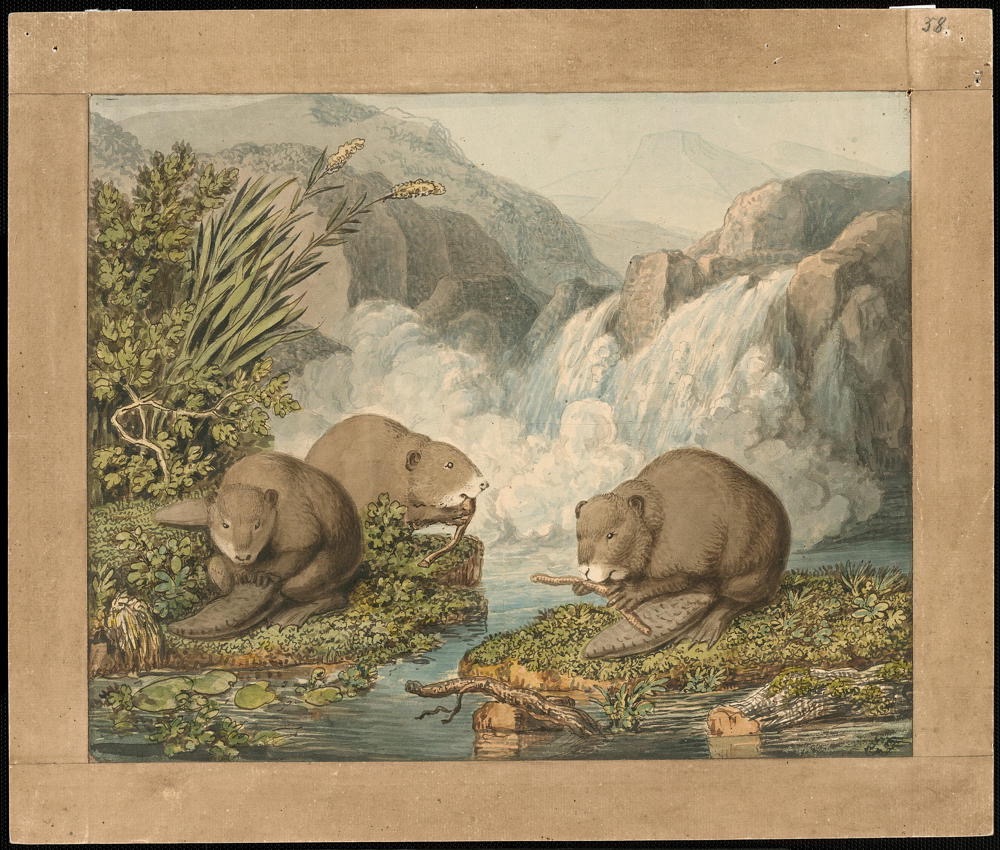
J. H. W. Tischbein: Three Beavers Building a Dam (c. 1800)
ABOUT THIS ARTWORK
Johann Heinrich Wilhelm Tischbein experimented with animal physiognomy in many drawings. Inspired by the Swiss philosopher Johann Kaspar Lavater, the artist believed a person’s character depended on the animal he resembled. As Tischbein wrote in 1796, “I have undertaken another [series of drawings] in order to learn more about man. To make this study easier it is necessary to begin with beasts, since they are easier and their characters more evident.” Traditionally busy animals, these furry beavers exhibit human expressions as they focus diligently on the difficult task of stemming an exuberant waterfall.
This writing week brought an end to Daylight Saving Time, ushering in my overlong season of early darkness and gratefully earlier sunrises. I was going to be up anyway, so I appreciate early daylight almost as much as I revile early dusk. This writing week also marked the end of the overlong baseball season, a national pastime that consumed more than its fair share of my time toward the end of the Series. Halloween visited, christening our refurbished porch with treat-seekers and kid footprints. I celebrated with Treating. I explored the metaphor of Decency as Dust. I found it surprisingly satisfying before delving into barking Madness, not as metaphor but as practice, as presently practiced by our increasingly hapless incumbent. I explored the proliferation of what I labeled ‘UmUrgencies,’ ineptness-caused emergencies invariably responded to ineptly, too. I found some solace in writing about Derision’s generally impotent attempts to discourage Decency. Then I ended this writing week by reminding myself and my readers that Decency almost exclusively comes in remarkably small packages. Thank you for following along here!
SmallDecencies
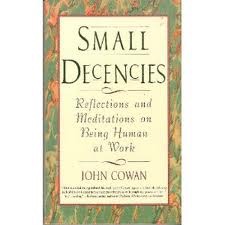
M.E. Edwards: Full of worries (1892 - 1905)
Gallery Text: Sheet with 6 representations of different kinds, including representations of a man who finds a sick boy on the street, a traveler who eats his bread and a man who makes wooden dolls. Between the images, verses in book print.
"Decency seems to reliably visit only those not desperately searching for it."
It might be way past time that I clear up one possible misunderstanding: Decencies almost exclusively come in very small packaging. I’m not denigrating grand gestures, for those most certainly have their place. Nor do I badmouth the occasional excesses which add that certain celebratory spirit to life. The grandiose and even the gross definitely have their places, but neither proves necessary nor sufficient to induce the genuinely Decent. Decency almost exclusively appears in tiny sizes, and even when it seems to appear in one of the larger ones, it tends to be some attribute of the thing that carries the Decency within it. The balance usually turns out to be packaging.
The often disappointing attempt to produce grand changes tends to be entirely overshadowed by the tiny, thoughtful gift —the kindergarten artwork, rather than the Hope diamond.
Derision
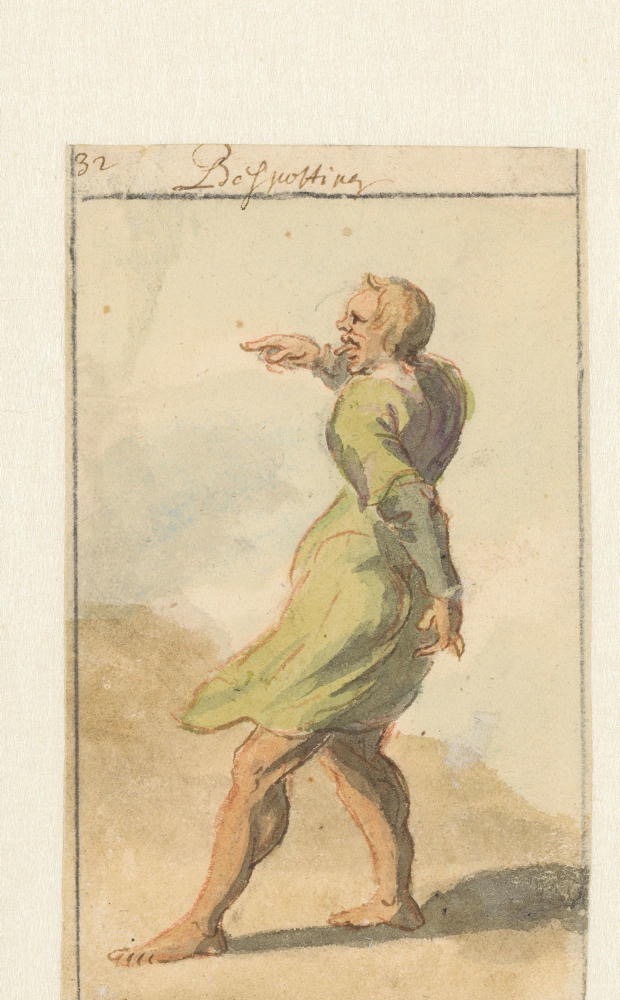
Pieter van den Berge: Spotting (1675 to 1737)
A standing man with his tongue stuck out and his right hand pointed raised.
"…indecency exhausts itself with its own irrelevance."
Few compliments seem less complementary than Derision, but it tends to be the praise of choice when passed from the indecent toward the Decent. The indecent hold limited resources, certainly less vast than Decency ever commands, so they compensate by making loud noises and dramatic gestures that signify little and mean even less. In any odd moment, their advantage, if only represented in volume, might appear to be overwhelming. They do the lizard dance where they stand tall on their skinny hind legs to appear much larger and more powerful than they actually are, relying upon startle reflex to balance what they not mistakenly understand to be uneven scales. Decency learns not to take those threats too terribly seriously, however otherwise terrible they might seem.
Decency learns this lesson in the oldest of the old-fashioned ways.
UmUrgency

Edward S. Curtis:
Hamatsa Emerging from the Woods - Koskimo
(c. 1914)
“Nobody ever better deserved one of those handbaskets they say we should order.”
Never a day slips by or an afternoon recedes without another crocodile emergency appearing. The indecent house of cards our incumbent and his regrettable cabinet have constructed continually threatens to crumble. They have 911, or its equivalent, on speed dial. It’s always the same pattern: someone tried, or usually actually managed to hoodwink them into believing, but it turns out they were misled. Another hasty response was absolutely necessary lest some situation threaten to get resolved. Each intervention only serves to deepen each dilemma until the administration, which never had any intention of administering anything, feels forced to administer something. Their disinterest seems most manifest then, for their proffered solution always makes the situation worse, often much worse. Then they declare another unqualified success, by which I mean another action in no way qualified to be classified as successful. Then, action properly defended to their own satisfaction if no others, they return to parade rest until another inevitable UmUrgency interrupts their distraction again.
The rhythm of these disruptions has become perfectly predictable.
Madness

James Naumburg Rosenberg:
Mad House (20th century)
"May Decency preserve us until this Madness crumbles."
Occasionally, in the course of human affairs, sanity becomes an impossibility, so Madness takes over for a spell. These periods tend to be brief in the scale of any country’s history, but memorable in terms of lessons learned, or, if not necessarily learned, then lessons experienced. These lessons become uniquely memorable, in part, because they produce devastating results: stock market crashes, wars, famines, and the occasional pestilence and plague. It’s almost as if success became unbearable, so voters opted to try failure for a while. Their world shortly thereafter goes to Hell. That they brought it on themselves complicates responding in any otherwise reasonable fashion, so squabbling consumes what might have been a crisp reply. Countries do tend to eventually achieve recovery, albeit a chastened one. Then comes the painful period where they try to learn something from their experience. Much blame changes hands, and eventually, what will pass for a fresh sanity takes over.
During the period of degradation, Decency becomes a stranger.
Dust

Willem van Konijnenburg:
The re-voting in Groningen (1897-06-27)
"Ditto and more so with Decency."
Think of Decency as Dust, as a sometime annoyance and occasional inconvenience. In this country, Dust is ubiquitous, present regardless of cleanliness habits. It’s probably never not there, but its presence isn’t usually prominent. It’s most appreciated in its absence, for the necessities accompanying its presence tend to inconvenience. It shocks when it finally comes into focus, almost always unexpected. Annually, the knick-knacks get attended to, and a deep sense of significance and gratitude always gets left behind. The Dust was never as rare as was the shocking awareness that it had always been there.
Decency seems the opposite of Dust, that reviled presence that tends to sneak up on us. Decency seems clean by comparison, but think of indecency as mud.
Treating
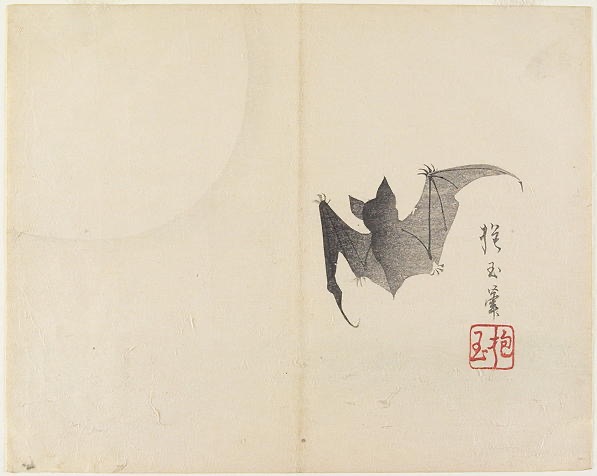
Yamada Hōgyoku: Bat and Moon (1830s)
"Let tradition bring us through those times when we feel most threatened."
I take refuge in traditional rituals when Decency wears thin. I had forgotten how important Halloween has always been until that first goblin rang the doorbell to threaten me with tricks if I didn’t deliver a treat. The current crop of kids passed muster, mysteriously dressed as current characters. I have to ask what each one ‘is,’ because I don’t get those memos anymore. I wore a vintage Felix the Cat costume in my time, though I doubt any of this year’s crop of costume wearers ever knew to remember who Felix was. One came bare-chested in the chill. One wore an inflatable T-Rex suit that probably snagged on the rose bushes that line our front walk. Many forgot to declare, “Trick or Treat,” and needed to be reminded to fulfill their part of the performance. I felt like I inhabited a Norman Rockwell painting or a vintage Walt Disney movie, experiences I had been in sore need of believing in again.
Kids these days don’t much go in for tricking, certainly not on the scale kids did in my grandfather’s youth.
Weekly Writing Summary For The Week Ending 10/30/2025

Adolph Menzel: The End (19th century)
This Writing Week almost exhausted October. This author found his stories to be successfully Reassuring thanks to the old and always reliable DoingSomethingDifferent. I found myself writing what, in retrospect, seems like a series of introductions to Decency, as if I needed reminding of its nature and appearance. I noted that Decency tends to be eminently Self-Interested but not self-obsessed. It surprisingly shuns Moral Highground if only because that often violates Decency's first principle, which insists that we're all created equal. I decided that I have been submitting Dispatches from the Front Lines of the War on Decency. I ended this writing week with a different introduction, this one to Decency's Edges, which are many, varied, and not always entirely as expected. Thank you for following along!
Edges

John La Farge: The Dawn (1899)
Gallery Text: The Dawn is based on a preparatory drawing (also in Harvard’s collection) for the decoration of the New York City residence of Cornelius Vanderbilt II. Although that composition was abandoned, it must have captivated the artist, for he returned to it almost twenty years later in this painting. Indebted to the work’s initial conception as a mural, the arching, elongated figure of Dawn has a bold, linear quality that can be easily read from across a room, while the creamy peach, purple, and turquoise tonalities are decorative without being overpowering. La Farge’s interest in light effects and color harmonies had already inspired his invention of opalescent — also known as “American” — stained glass, which the artist used in numerous commissions, including the translation of The Dawn into a window for the Brooklyn residence of philanthropist Frank Lusk Babbott in 1903.
"Decency can be a reliable partner but makes a lousy co-conspirator."
Decency can be an unreliable co-conspirator because he just won’t do some things. When co-conspiring, things tend to work best if the conspirators can maintain as much latitude for action as humanly possible, and Decency can be relied upon to feel squeamish at inconvenient times. Indecency cares little for propriety and easily oversteps boundaries. It can inadvertently wander into ethically dangerous territory in the passion of some pursuit, while Decency will more likely notice when he loses his moral compass heading. Even when a rule’s unjust, Decency’s less likely to try to bust through it, and will more probably find some way to discreetly weasel their way around it instead. All that said, Decency will not agree to do just anything. Decency maintains high standards.
Decency believes it matters how the game gets played.
Dispatch
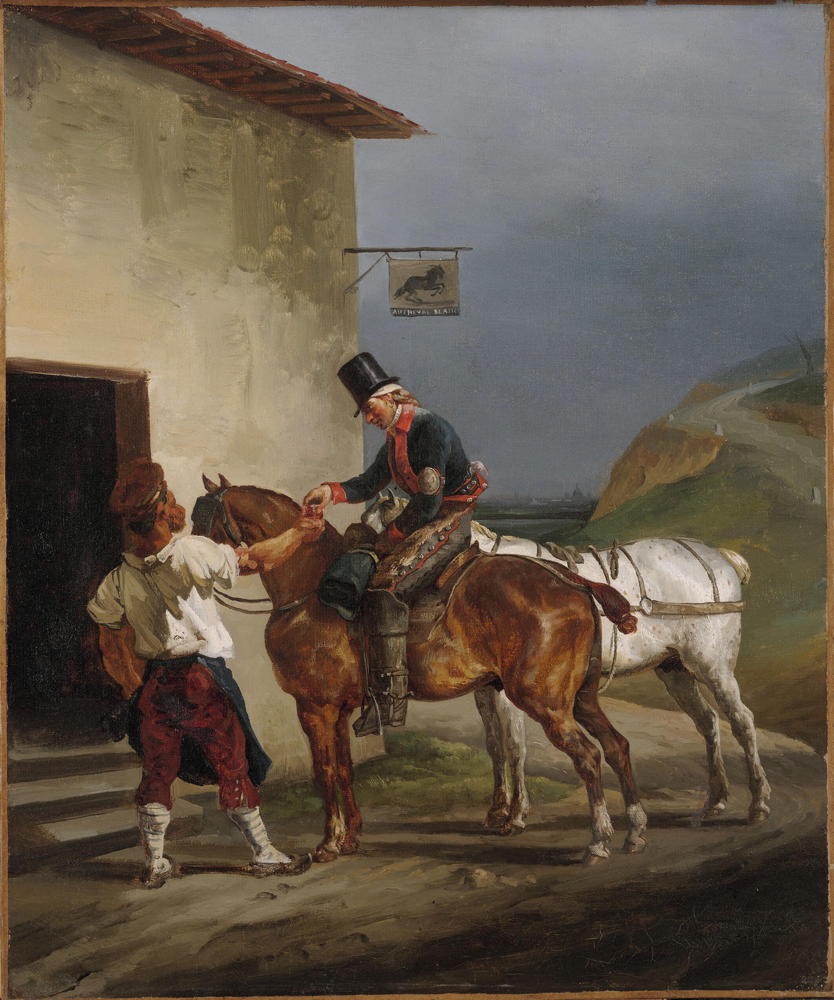
Théodore Géricault: The White Horse Tavern (1821-1822)
Gallery Text: Discouraged by what he believed to be the conservative tastes of the French art establishment, Géricault traveled to England and exhibited his work in London in 1820–21. Received with critical acclaim, he engaged with the local manner, which included an embrace of naturalistic compositions and a more muted palette. Here he depicts a weary uniformed postman receiving a drink from a waiter outside a roadside inn. He focuses attention on the horses, contrasting their detailed muscular frames with the summarily rendered figures and landscape. The inn’s sign, which translates as “White Horse” even though a black one is illustrated, locates the scene in France, possibly outside Paris, explicitly alluding to Géricault’s mingling of British painting conventions and a French context.
"How long before we become the bastion of Decency again?"
These Decency Stories have been serving as Dispatches from what passes as my front line on The War on Decency, which began long before our incumbent’s current term, though he has been a chief, if not exclusive, aggressor. A Dispatch amounts to a letter intended to inform its receiver of the conditions the dispatcher—the letter writer—experiences in the receiver’s absence, often sent from the front line of some conflict. It never even pretends to be a comprehensive report, for no position on any front line provides adequate perspective for any observer, however otherwise objective, to fully experience any conflict. A Dispatch must necessarily represent only a narrow, local view of what usually proves to be a much broader engagement. I have created my Dispatches in the belief that my local view might not materially misrepresent broader perspectives and might instead reflect a more universal experience.
That said, I believe the front lines of any conflict necessarily reside in the chests of the combatants.
MoralHighground
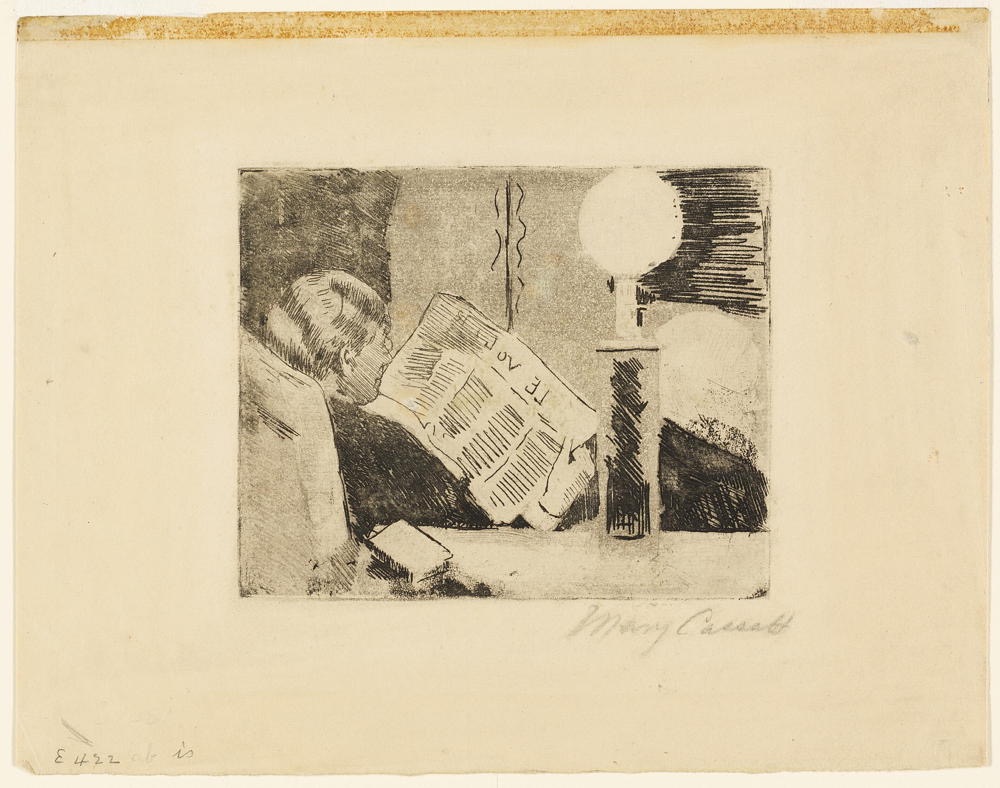
Mary Cassatt: Reading the Newspaper, No.2 (c. 1883)
"…Decency itself falls far beneath us."
Few behaviors disgust me more than sacrosanctity, that self-important quality affected by those insisting that they’re our betters. It doesn’t matter to me upon which basis this flaw manifests; each seems adequately disgusting, but at the peak, for me, stand those who deign to claim sole possession of some certain Moral Highground. Whether priest or heretic, the arrogance off-puts. It seems to negate whatever favorable inference their morality might otherwise make. Those who feel the need to advertise their goodness seem fundamentally dishonest. Decency suggests that good character needs no promotion and might only thrive in more humble circumstances. To promote it is to undermine it.
I hold the so-called “religious right” in particular contempt, for their brand of righteousness seems to rely upon them standing on some people’s necks.
Self-Interested

Berthe Morisot: Self-Portrait (c. 1885)
"…its purpose lies in its reach more than in its actual grasp."
Decency appears to be tenaciously self-interested. Not self-centered or self-obsessed, but definitely and, occasionally, defiantly Self-Interested.
Decency considers self-sacrifice to be at best a minor obscenity, if, occasionally, an absolute necessity.
DoingSomethingDifferent
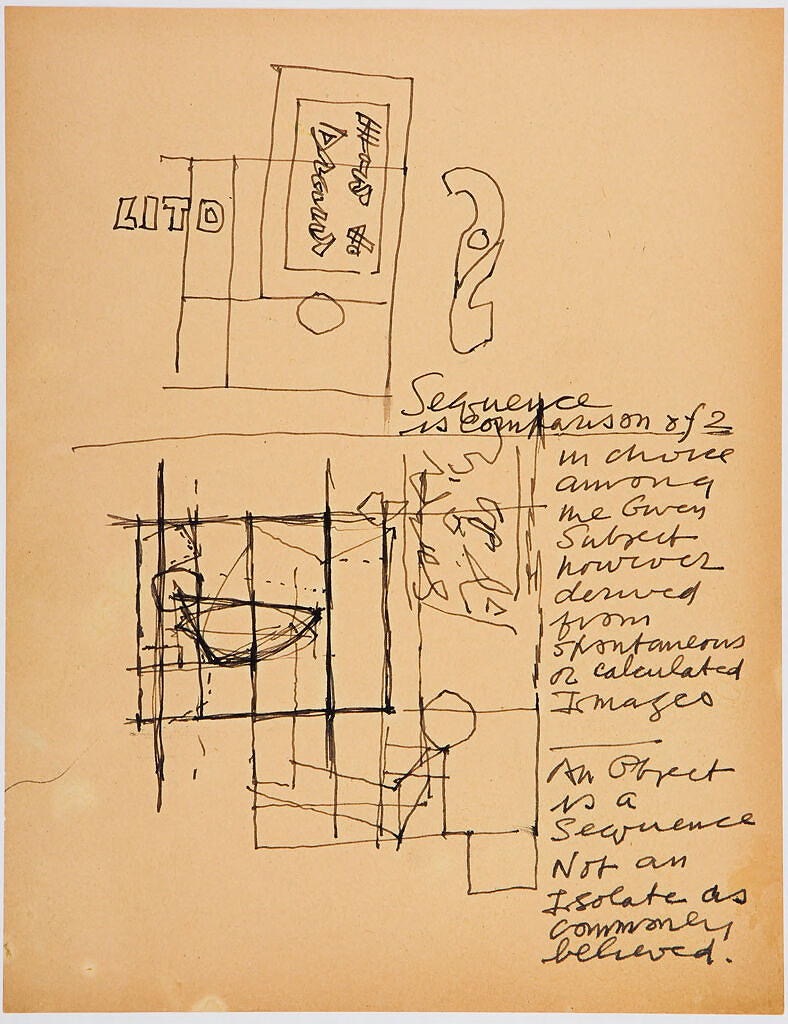
Stuart Davis: Study for “Something on the 8 Ball” (1953)
"…I'll get to rediscover, for the umpteenth time, this self-same tactic for creating lasting change…"
When my inquiry into Decency began to dissatisfy me, I instinctively knew just what to do. That this was precisely what I always do when following my instincts reliably failed to inform me that this strategy had never once worked for long. Oh, it worked well enough in the moment. I shoved myself through to whatever stood in for the other side of that particular difficulty, like always, though it failed to address any underlying issues. Heck, it failed to acknowledge that any underlying issues might even be present. It took it on face value that the difficulty was probably no more than face deep and reacted as if it was just a flesh wound, a superficial complaint.
How did I respond?
Reassuring
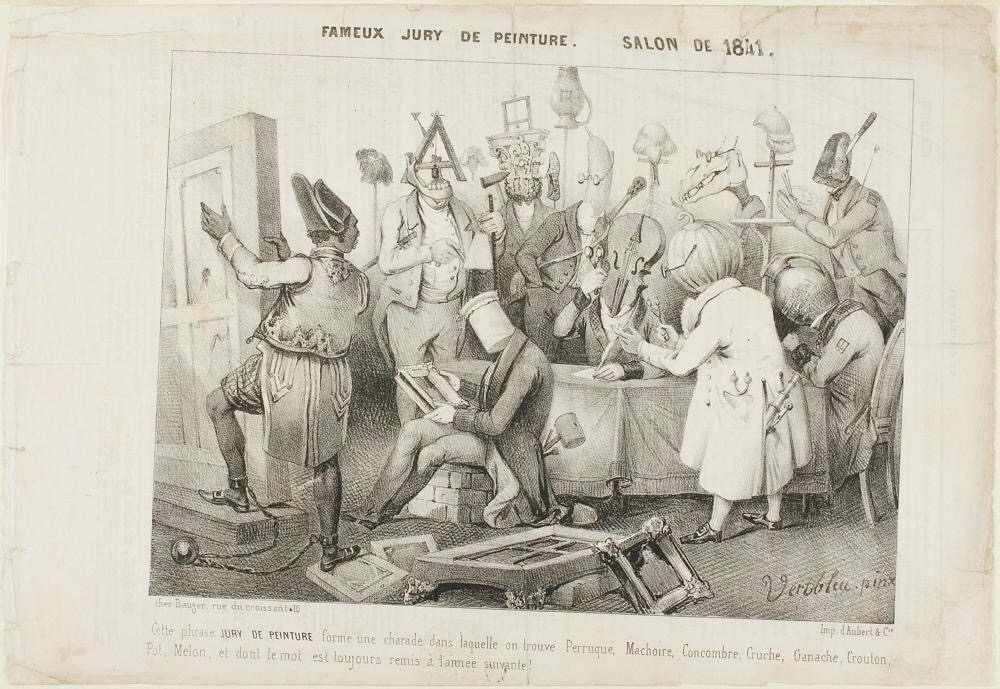
Clément Pruche: Fameux Jury de Peinture. Salon de 1841
[Famous Jury of Painting. Salon of 1841] (1840, reissued 1841)
"…as if recovering innocence might prove Reassuring."
I am not a bottomless font of positive energy. I am not an infinite anything, but a painfully finite being, present without obvious purpose, faking it as best I can. I identify as a man, though I do not align with many of the expectations that come with that designation. I am not very mechanical, for instance, and never cared much for motor vehicles. I am presently engaged in analysing Decency in concept and practice, though my interest in the subject has recently been flagging. As with any search, I wonder how I might tell if I’m succeeding before I’ve finished. In the middle of anything, progress might not seem all that evident. Even at the end, the seeker might be left wondering. Searching seems no different from any occupation, except for the presumption of it ending, of reaching some conclusion.
Considering Decency has increased my sensitivity to both its presence and its absence.
Weekly Writing Summary For The Week Ending 10/23/2025
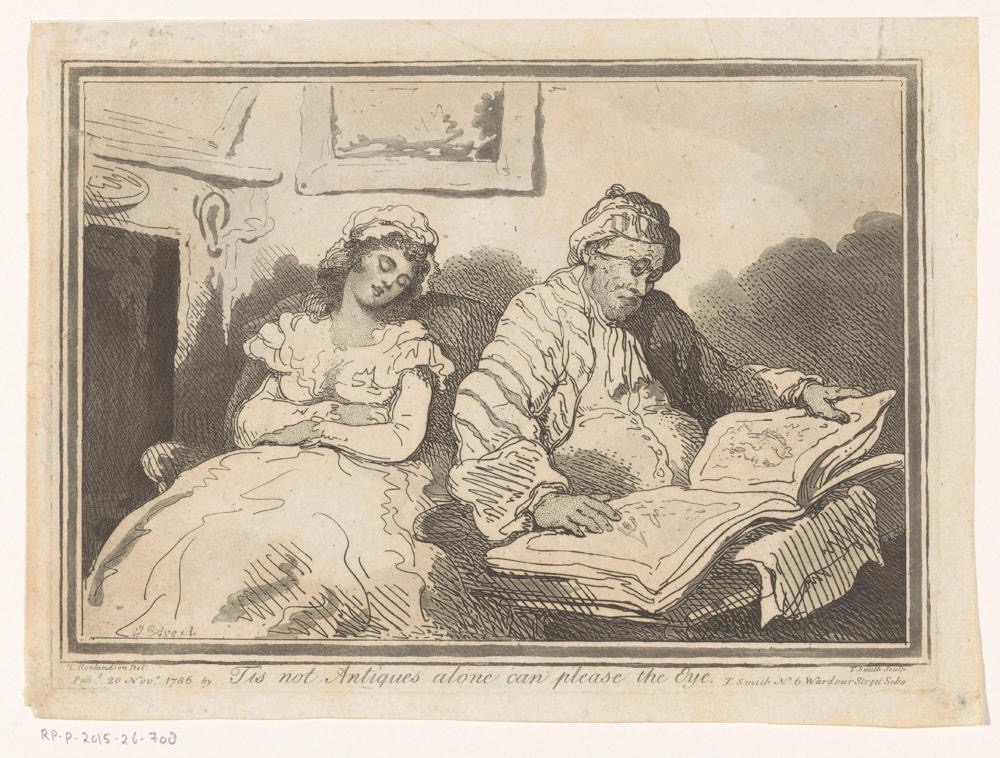
T. Smith: An Old Man Leafing Through a Print Album,
Next to His Young Wife (1786-12)
I doubt that there could be a better allegory of what's happening in this country than the illegal, unpermitted destruction of the whole East Wing of our White House to construct a wholly unnecessary trailer trashy gilded ballroom for billionaires to gather in and gloat. While, by the end of this month, 4/5th of the people receiving food assistance in this county will lose it due to Repuglican indifference. Every damned thing this administration uninterested in administering anything attempts goes sideways and screams indecency. I experienced an emotional low point in the absurdity this writing week, wanting to turn off the endless insults to my patience and intelligence. I've seen stupid before, but never on this scale. I'd heard of indecency before, too, but these clowns recalibrate that scale. too. I feel a little reassured that the pathology predicts that our incumbent's Self-Saboteur Syndrome can't rest until it utterly destroys its host. He's aching for the retribution his mommy and daddy couldn't give him, and for the public humiliation that not even three of the more skilled wives could provide.
Despair

Eduardus Jacobus: Despair (after 1698)
"I'm frantically seeking an exit."
I am learning that indecency was never the opposite of Decency. That ignoble association belongs to Despair. Decency represents the difference between hope and Despair, rendering Decency a rough equivalency to hope. Decency provides a context within which hope might thrive. When Decency disappears, Despair rushes in to fill the void, rendering it even emptier than it had ever seemed before. The miscalculation the MAGA crowd made might have been neglecting to factor in what happens after all accustomed hopefulness disappears. It’s not a win if the reward amounts to a vacuous void. It’s not a win if you leave your opponent with nothing left to lose. Then’s when the opponent becomes most dangerous.
Lawlessness induces desperation.
Cheerleading
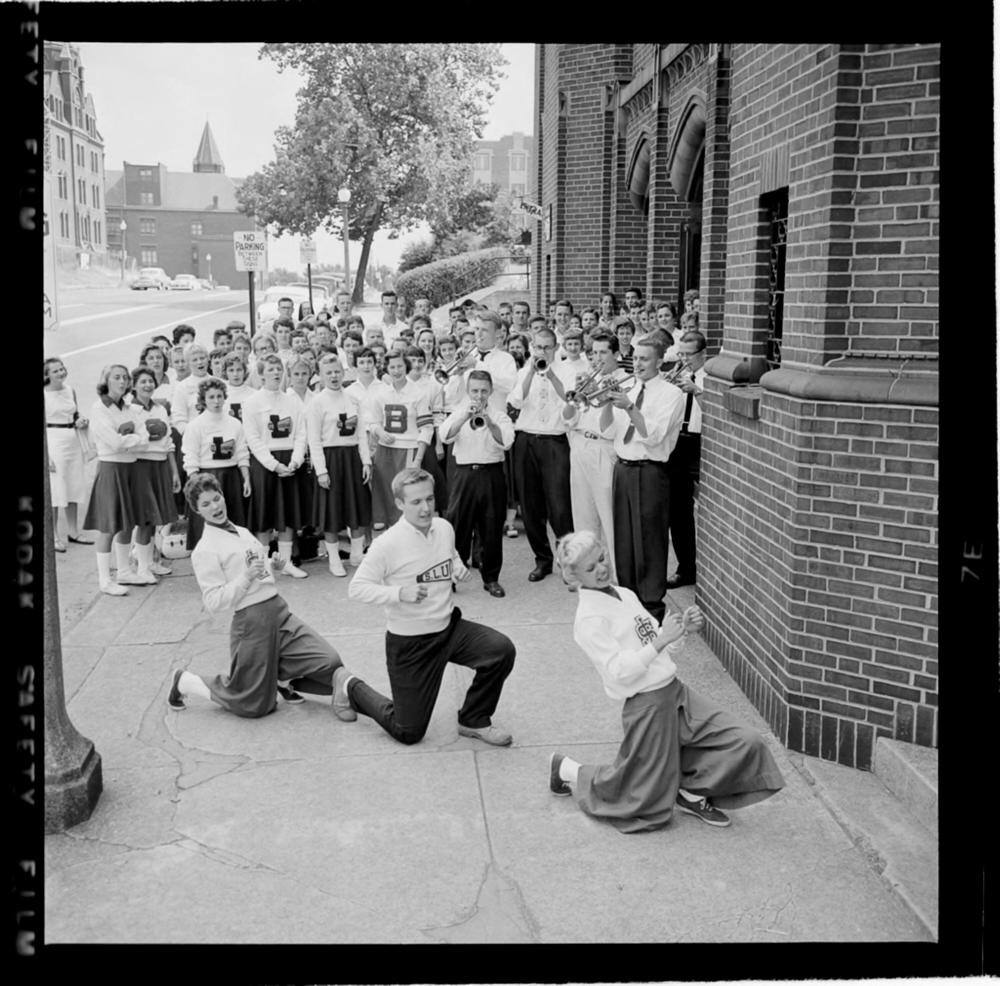
Jack Gould: Untitled [band and cheerleaders] (1958)
"…I have no particular influence with The Gods…"
I feel as though I have been Cheerleading for Decency’s team since I began this writing series thirty-one mornings ago. The playoffs finished this week, and the World Series begins two nights hence. I have stood steadfastly on the sidelines, rooting for the home teams to win. I have called no plays or engaged in any games I’ve witnessed. I’ve perhaps just made a fool of myself, gesticulating on the sidelines in front of the stands. I’ve not pitched, hit, or scored a single run, nor could I. I have not broken my leg on a questionable 4th-period Hail Mary play. I’m part of the second string contingent on the varsity bus, there for atmosphere rather than substance. I haven’t once forgotten the unwritten rules of engagement here. I’m present to draw attention away from myself and toward the play on the field.
Like any cheerleader, I’m not here to embody anybody’s idea of masterful play.
Origins

Félix Vallotton: La manifestation (1893)
"I might have been fooling myself then."
I might just as well argue about the Origins of chickens and eggs as consider Decency’s Origins. Some say it’s an innate human characteristic, while others say it emerged from religious influence. Some swear it’s at root philosophy while others insist it’s physiology. Nailing down a definition seems dangerous, even though it seems like such a mild sense on the surface. I can get passionate about it, especially about its absence. I seek it and mourn it, and at times, I suppose, I even fear it. I do wonder, though, how one comes to possess it, or does it choose who it possesses? Is it possible to school someone who seems deficient? Do penitentiaries offer Decency courses for those convicted of indecencies? What does the presence or absence of Decency even mean?
Surely the Origins of Decency must be evolutionary.
A DecentNight

Jan Saenredam: Night, or Woman Sleeping by the Fire (1595)
"I will have experienced more than A DecentNight's sleep, I guess, but A DecentNight nonetheless."
After I’d confided that I slept four or five hours each night, my internist asked if I might be interested in enrolling in one of the sleep studies conducted by our local Sleep Center. I wondered why I should agree to that, and he responded that it might allow me to experience A DecentNight’s sleep. I asked what made my solid four or five hours indecent, and he replied that people generally require more than a solid four or five hours to maintain a decent life. He spoke briefly on the insidious effects of sleep apnea. I responded that I exhibited none of the symptoms associated with sleep dysfunction, and even if I did, I would never consent to wearing a vacuum cleaner on my face in bed. I consider my sleep needs evidence of a biodiversity and not some syndrome requiring therapy. My internist has not mentioned the subject since.
The Muse, though, reports that I snorkel and snore, evidence that I might be exhibiting the presence of some dysfunctional sleep disturbance.
Lose
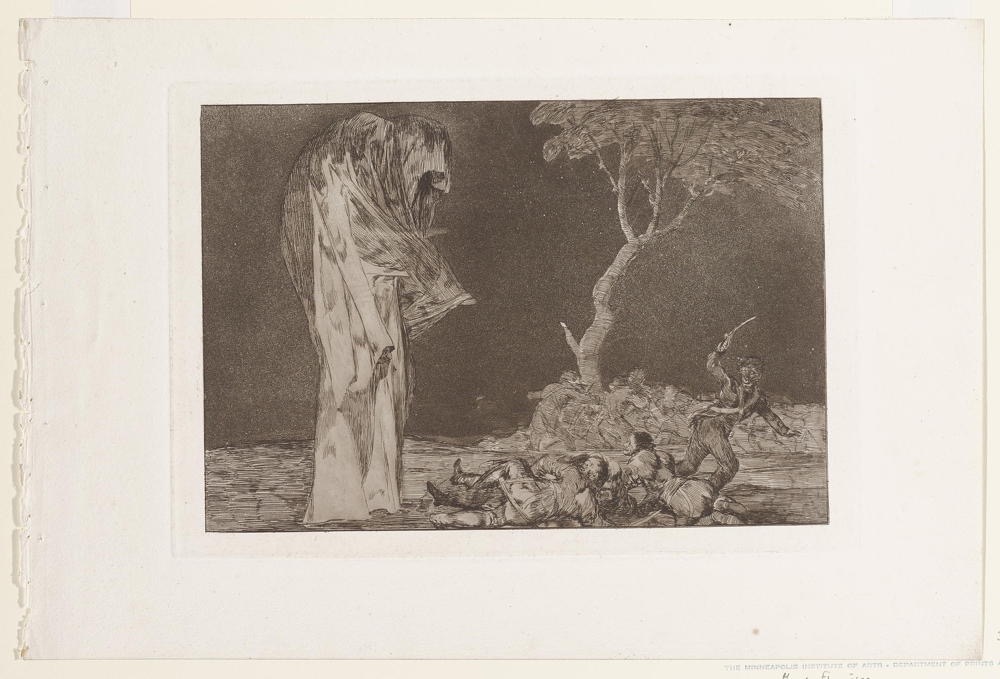
Francisco José de Goya y Lucientes: Por Temor no Pierdas Honor
[Do not lose honour through fear] (1816–19)
"…with ample domain to rule with Decency if I chose."
The Decent possess a superpower the indecent can’t imagine: enough. Indecency might most often emerge due to the presence of some mysterious and overwhelming sense of insufficiency. Everyday temptations can become compulsions under this sense of absence’s malign influence. It might be an illusion either way, the delusions of plenty and scarcity being opposite sides of some self-same coin. Yet the sensation each conviction compels couldn’t be more different. Scarcity, even when (and, perhaps especially when) delusional, easily becomes definitional. Those without enough seem capable of justifying any action with an explanation that it was either necessary or essential rather than merely consequential. Those with plenty, or that innate sense that they possess it, might likewise characterize their actions as necessary or essential, though their effect seems the polar opposite of those ruled by the insidious scarcity mindset.
I’m not suggesting that starving people, for instance, aren’t also capable of Decency, just that those who feel as though they’re suffocating from a sense of want might more easily justify the minor odd indecency, or even justify that lifestyle.
Win

Jean-Baptiste-Siméon Chardin:
The Attributes of the Arts and the Rewards Which Are Accorded Them (1766)
Gallery Notes: This picture may appear to reproduce the casual clutter of an 18th-century tabletop. Not so. Chardin carefully selected objects to convey specific meanings. A palette with brushes, placed atop a paint box, symbolizes the art of painting. Building plans, spread beneath drafting and surveying tools, represent architecture. An ornate bronze pitcher alludes to goldsmithing, and the red portfolio symbolizes drawing. The plaster model of J. B. Pigalle's Mercury, an actual work by a friend of Chardin's, stands for sculpture.
The cross on a ribbon is the Order of Saint Michael, the highest honor an artist could then receive. Pigalle was the first sculptor to win it. So this painting sends multiple messages: it presents emblems of the arts and of artists' glory and honors a specific artist, Pigalle.
A still life (or painting of objects), which is composed from scratch by its creator, can be used to convey complex meanings.
"Decency doesn't rise to the bait that indecency always hides its hook within."
Decency has never been continuously rewarding. It attracts its critics and delivers disappointments. Anyone could complain about “times like these,” for every age has harbored indecent actors who have risen to influential positions, and Decency never seems to hold an overwhelming hand. It goes about its work humbly, primarily for its own sake, if only because it’s its own reward and other approaches seem unthinkable. If popular support doesn’t define Decency’s success, what does? I argue that a different metric determines a Win when considering Decency. In any standard competition, the simple accumulation of acclaim determines a Win. Decency, though, doesn’t quite qualify as a competitive sport. It remains a choice and sometimes seems most effective when administered too sparingly ever to accumulate enough points to win any standard competition.
Those who play Decency competitively diminish it and themselves.
Weekly Writing Summary For The Week Ending 10/16/2025
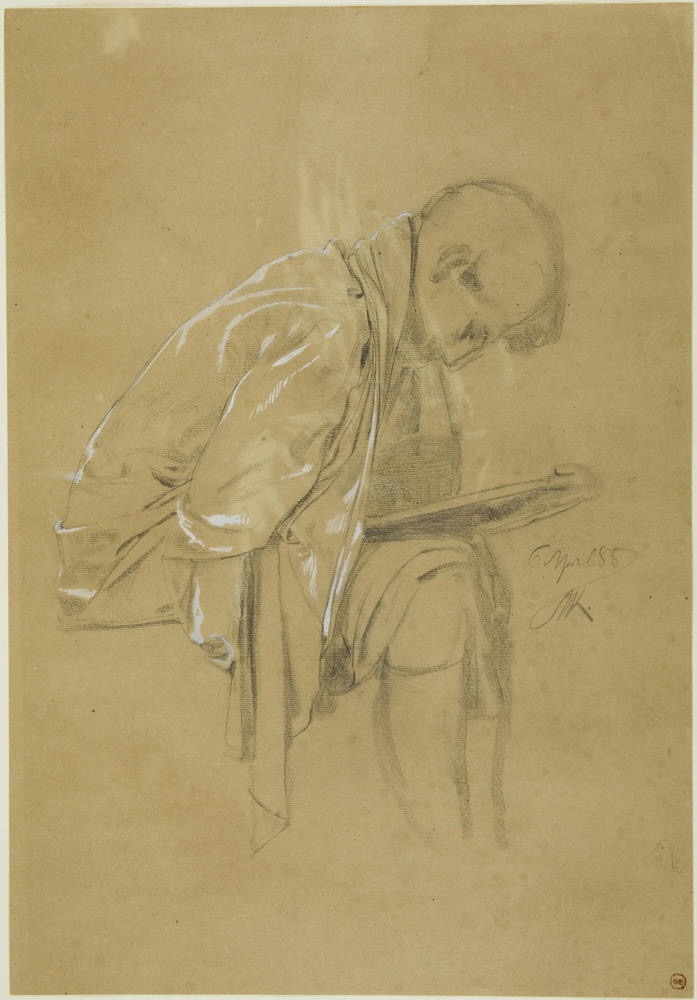
Max Klinger: The Chronicler (recto) April 5, 1888 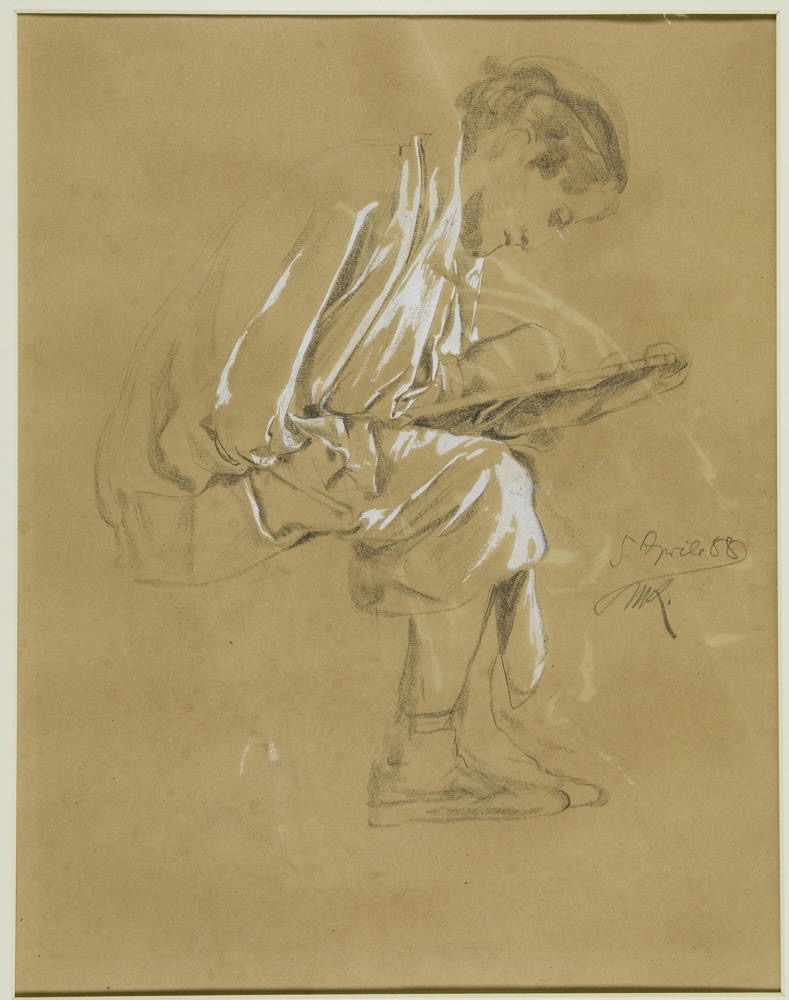
Max Klinger: The Chronicler (verso) April 6, 1888
Gallery Notes: Drawings by the Symbolist artist Max Klinger are very rare. This intimate drawing was completed over April 5-6, 1888, while the artist was staying in Rome on the Via Claudia near the Colisseum. This sensitive figure drawing helped to prepare Klinger’s most important painting of those years, The Crucifixion, 1888/1891. In an almost autobiographical reflection, it depicts the scribe who unemotionally documents the world’s greatest tragedy that rages around him.
This writing week, I focused on themes of Truth, Justice, and The American Way as mediums for describing Decency. I insisted that Truth need not be an absolute to prove helpful in this tenaciously relativistic world. I visited the near-distant future to see our present as precedent in PosseCognito, which was by far my most popular posting in a very long time. I praised dissent in DissEnting, celebrating smart-assedness as perhaps the proudest American tradition. I introduced Questioning into the conversation for it has always been a source of Decency in every discussion. I then introduced a part of me that I don't often own up to possessing: LittleOldMe. I ended this writing week insisting that we're not so much seeking a more perfect union as an ever-more Decent one. Thank you for following along!
MoreDecent

Carel Isaak de Moor: Nar [Fool] (1705 - 1751)
A fool or madman,
looking sideways and holding his elbow with one hand.
"We, The People, seek an ever-MoreDecent Union here."
I, and everyone else in my generation, was raised under a remarkably primitive and repressive regime. We learned to maintain a modicum of Decency despite the pockets of absolute obscenity surrounding us. We discovered potentially useful coping methods that helped us maintain some semblance of sanity when everything around us seemed crazy. It was easy to spot crazy in those days because our fathers and their fathers before them came from even more repressive times, times when whole generations barely survived state-sponsored deprivation. My grandfather was raised in a world where his leaving school after third grade was considered in no way exceptional. He had work to do and a way to find through the world. My father, too, left school to survive. His family needed him to labor more than they needed him to graduate high school.
When I was five, several blocks along West Main Street, the primary thoroughfare through town, was set aside for prostitution.
LittleOldMe
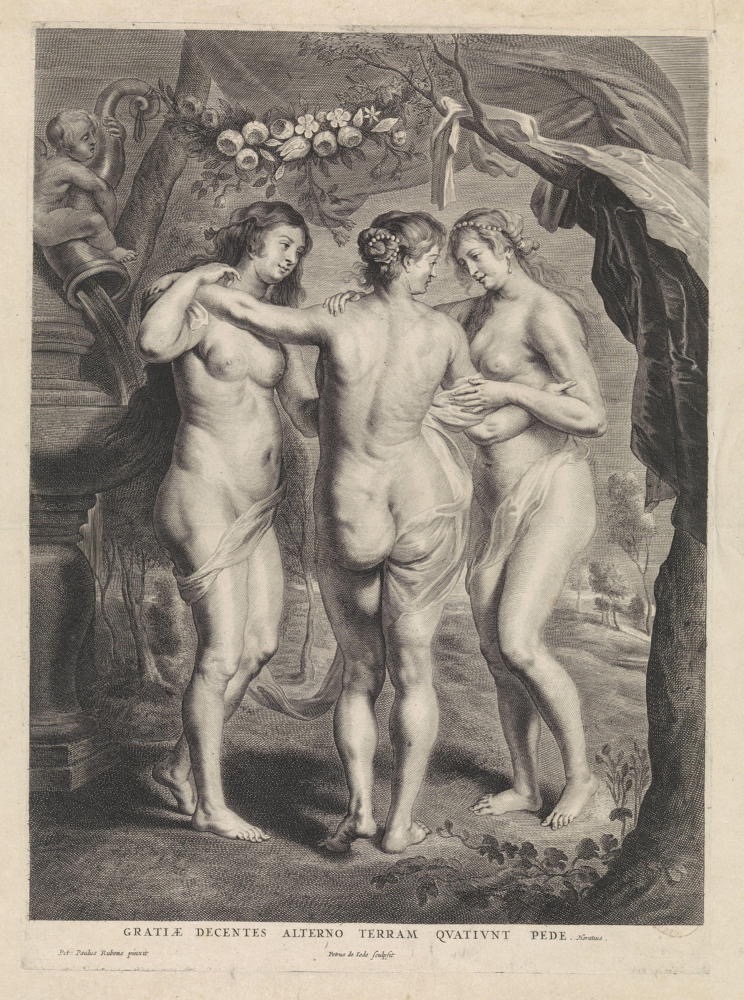
Pieter de Jode (II): Landscape with the Three Graces (1628 - 1670)
The three Graces of Greek mythology were Aglaea, Euphrosyne, and Thalia. Aglaea symbolized splendor and radiance, Euphrosyne represented mirth and joy, and Thalia embodied good cheer and bloom.
"Even LittleOldMe might well be worth it."
It’s one thing for me to treat others Decently and quite another for me to treat myself that way. Even the sparest rules of comportment demand that I treat others Decently, but no such strictures exist defining how I should treat myself—quite the opposite. I expect to sacrifice myself for some imagined betterment of others, as if I weren’t quite worth the effort to respect. And we hold in esteem those who do sacrifice themselves, even when nothing particularly useful or helpful comes of it. And we’re proud of these efforts ourselves. My ego swells when I tell others how I very narrowly avoided serious injury when engaging in some otherwise completely pedestrian activity, or even how I injured myself. It occurs to me that almost nobody really runs marathons to torture themselves. Yet, it seems as though every veteran of them shares harrowing stories of their personal punishments when running their races.
My mother would discount her own presence by referring to herself as “Little Old Me.”
Questioning
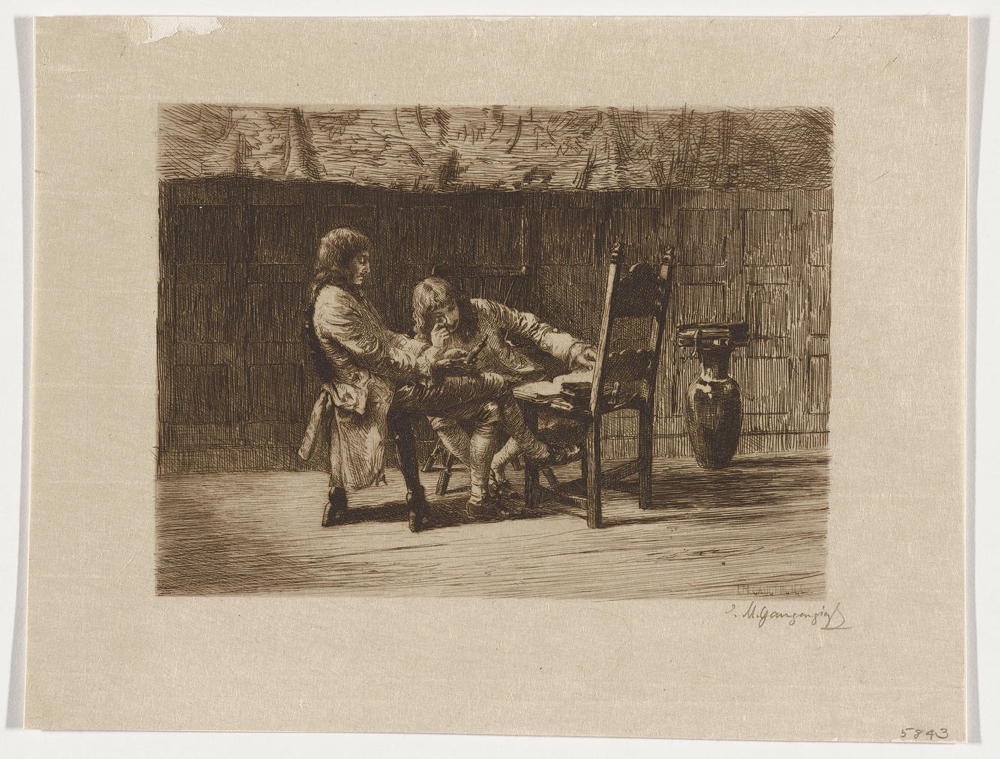
Ignaz M. Gaugengigl: A Difficult Question (19th century)
" …We abandon our cross-examinations when we grow weary of discovering…"
Authoritarians despise questions. They try to vilify questioners. They try and usually fail to insult questioners’ intelligence, as if asking were somehow threatening. They understand that there can never be any such thing as not answering a question, for even silence screams its response. Questioning can constitute a potentially healthy back-and-forth, a functional resonance. It’s almost impossible to maintain arrogance in its presence, for it tends to level every playing field. I suppose it’s little wonder why our authoritarians find it so upsetting. It renders it almost impossible to remain seated on any high horse through any barrage of Questioning.
Democracy seems at root a questionable practice, for it leaves many answers unresolved.
DissEnting
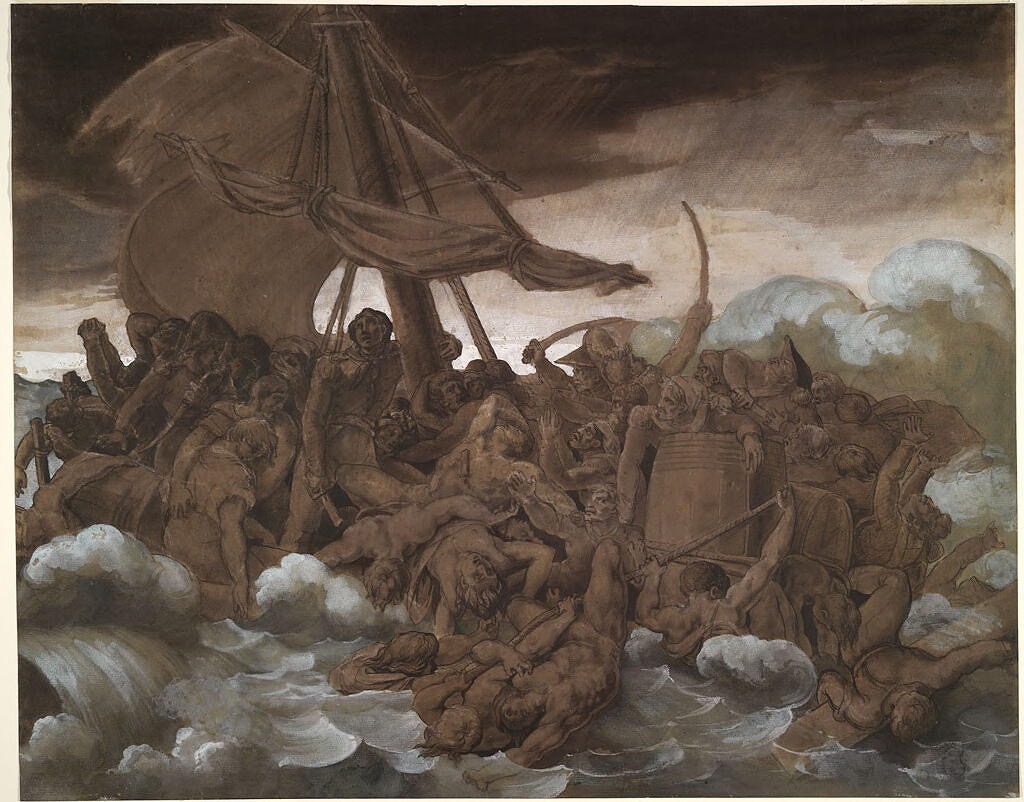
Théodore Géricault: The Mutiny on the Raft of the Medusa
[Historical Background](1818)
"What better way to preserve our actual Constitutional order?"
Portland greets the illegal and insulting invasion of poorly-trained Federal “immigration enforcement” agents with irreverence because that response best represents the American perspective. What better response to an absurdist intrusion than an even more absurdist one? Self-respect demanded some sincere sarcasm. Hell, Decency demanded it. As indecent as I’m sure these acts of silliness seemed to the intruders, any serious response might have been too easily interpreted as a serious one, one to be taken way too seriously, probably with fierce opposition, potentially leading to injuries or deaths. Better to offer them a target difficult to take so seriously, one that might even be ungenerously interpreted as silly. It’s difficult to muster much belligerence from even the most immature Federals when confronting them with people wearing inflatable dinosaur costumes and riding bicycles naked in the rain.
It was not quite civil disobedience but rather dissent, with particular emphasis on the “Diss” part of the description.
PosseCognito
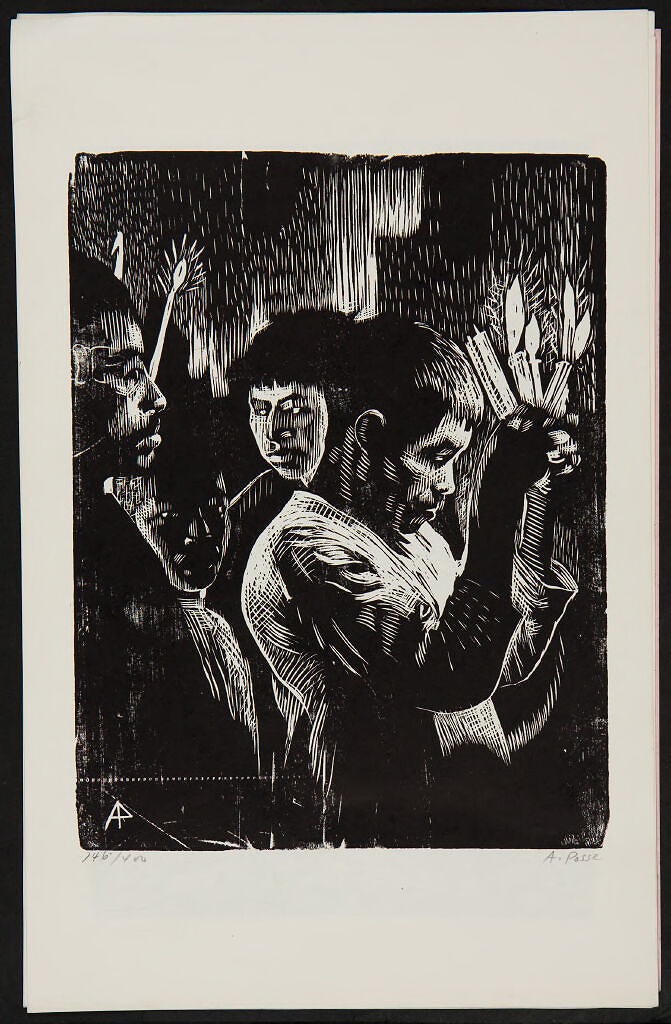
Armando Posse: Procession (1955)
Artist Biography: Armando Posse was a self-taught Cuban artist born in Havana on December 4, 1917, who specialized in engraving, screen printing, and drawing. He co-founded the Taller Experimental de Gráfica in Havana in 1962 and joined the Asociación de Grabadores de Cuba in 1964, where he won an engraving prize. He was known for his graphic production work.
"We, the people, regained the upper hand."
By the mid-2020s, Federal overreach had become intolerable to states and citizens. Routine violations of Constitutional Rights by executive branch-directed agents threatened Decency and civility in targeted municipalities. Among the many particulars:
°The Writ of Habeas Corpus was routinely suspended,
°Masked and armed Federal pseudo police routinely descended upon vulnerable communities
°randomly deploying tear gas in peaceful crowds
°detaining and even arresting and disappearing citizens on mere suspicions or less
°Refusing to identify themselves or their association
°Terrorizing the populace.
To respond, municipalities, counties, and states began passing what became known as PosseCognito Laws.
Truth

William Sharp: Diogenes in Searth of an Honest Man
(18th-19th century)
"Those who in live in opposition to truth end up with what they deserve."
Truth need not be absolute to prove useful. It might be essential that we not get altogether too tangled up in absolutes if we expect to live in this relative universe. Still, the difference between truthiness and falseness seems clear enough under most circumstances. The old Superman aphorism “Truth, Justice, and the American Way” imprinted itself on many in my generation. We came to believe it was downright un-American to deal in untruths and injustice, equating those with our foes’ tactics. In practice, living lies provides faulty foundations, whatever the means employed or the ends pursued. Lies work like phony geometry, for they unreliably characterize level, parallel, and angle. They demand much more maintenance than even the most complicated truths, and ultimately require some form of authoritarian enforcement in order to stand. They cannot ever stand on their own.
Eventually, the castles constructed out of lies must crumble.
Weekly Writing Summary For The Week Ending 10/09/2025

Max Klinger: Simplicius' Writing Lesson (1881)
This writing week watched summer leave, replaced by genuinely chilly mornings and lovely sunny afternoons. Our never-ending porch refurbishment project made definite progress. The carpenters delivered the first of the final components, and our painter, Kurt, and I dutifully prepped them for installation. Most afternoons found me listening to baseball playoff games while engaging in one of the more primal human activities: painting prime coats and sanding the results smooth. I began the week writing about this process in Renewal, which inevitably includes considerable destruction. I noticed myself simultaneously inhabiting two states: Particle and Wave. I ranted a bit about my permanent outsider status in Insider. I began an extended exposition of the War On Decency we seem to be experiencing. I introduced an increasingly familiar stranger in Invisible Enemies Within. I ended this writing week wondering why the presumed most powerful person in the world seems to revel as the continual victim in Hoaxes. Thank you for following along.
Hoaxes
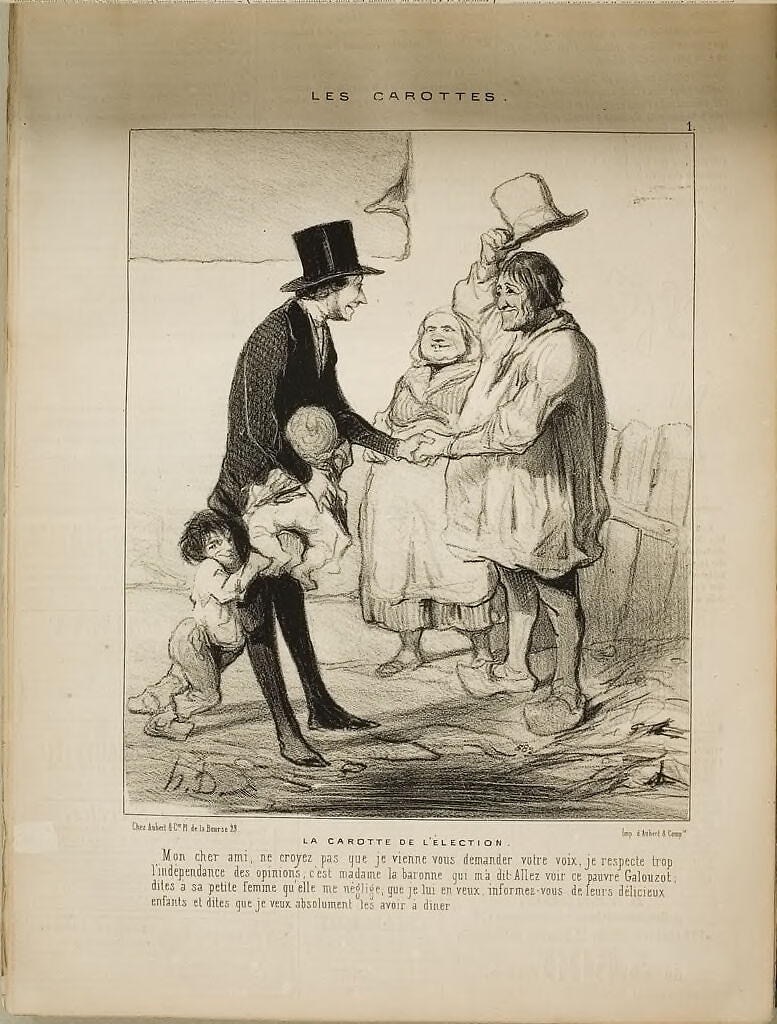
Honoré-Victorin Daumier: The Election Hoax
[La carotte de l'élection] (1844)
A caricature depicting a politician addressing a peasant family. The politician offers a carrot to the family, symbolizing the false promises made to voters.
"How did Decency get so lucky? It was probably the result of Hoaxes."
Decency might occasionally be subjected to some Hoaxes, though most were probably intended as April Fool jokes. I wonder what it means when someone seems continuously bedeviled by Hoaxes, where hardly any situation doesn’t come with a hint or a suggestion of nefarious Hoaxing. In my own short lifetime, I recall encountering fewer than a spare handful of Hoaxes, and none of those seemed in any way malicious. Our incumbent seems immersed lip-deep in a swirling cesspool of them, with some new one appearing almost every news cycle. I wonder what sort of curse might be behind such an infestation, for I swear I’ve never even heard mention of anyone, not even the most tragic Shakespearean character, more beset with such toils and troubles. To listen to the press secretary, her boss must be the most unjustly accused since Moses, and Pharaohs were notoriously intolerant.
It’s one thing to fall victim to Hoaxes, but quite another to publicly proclaim oneself a victim of them.
ImaginaryEnemiesWithin

Adriaen Collaert: The Enemy Sowing Tares Among the Wheat,
from Landscapes with Old and New Testament and Hunting Scenes
(1584)
"..they register every sown confusion as a victory."
When assaulting Decency, it’s probably best to first employ the time-tested EnemyWithin. This one carries the benefit of indicting the victim for harboring the criminal. It easily spreads the sort of madness not easily shaken, for, properly deployed, it gets Decency questioning, Decency’s Achilles’ Heel. Decent people easily accept suggestions that they might have inadvertently offended somebody, for they rarely suffer under the effects of the sin of self-importance. They consider themselves unremarkable, hardly worth fussing over, and open to persuasion if not the slightest suggestion. If they’ve violated some ordinance or custom, they’ll want to rebalance justice’s scales as quickly as possible. This agreeable countenance can sometimes render Decency into its own worst enemy. But I digress.
The EnemyWithin, of course, does not actually exist.
TheWarOnDecency
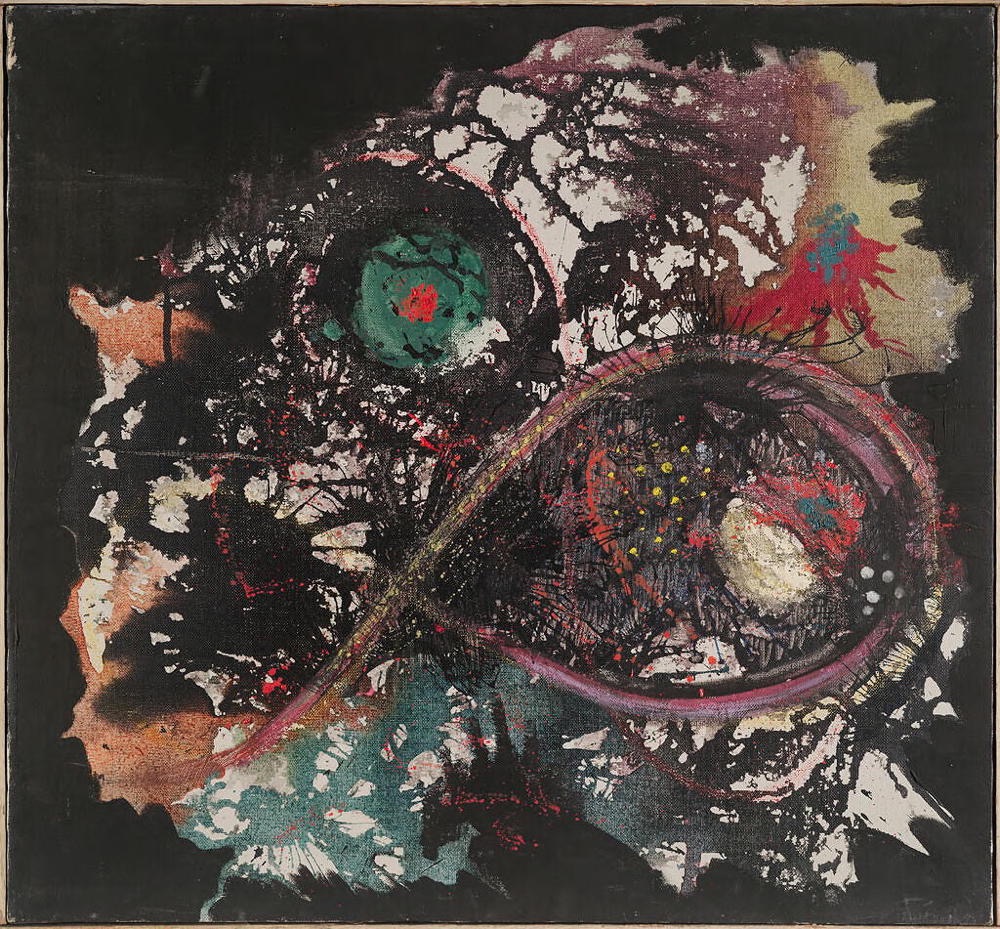
Robert Ericksen: War-torn (1945)
"Sadly, they largely prove incapable of feeling ashamed."
TheWarOnDecency began with a lessening of standards. Entertainment adopted a coarseness, as if its audience had been struck stupid. Plot and story slowly went to Hell in favor of Soap Operas and, ultimately, something labeled “Reality.” This reality, though, was reality’s archenemy, its theatrical opposite. Intended to titillate, it abandoned formal constructs of entertainment. Audience members were invited to engage in what was labeled as guilty pleasures: coarse language without any clear purpose, cruel lifeboat drill exercises, and endless derision. Some Other or another served as the endless butt of meaningless jokes. Some smartass was elevated to the role of hero, though his character and values remained unshakably shady. Awfulness seemed to be the sole purpose, as if its mere presence signified great success. Spectacle replaced subtlety. Cruelty amplified the underlying purpose. Those who regularly watched truly felt as though they were getting away with something and eventually forgot that they were ever supposed to feel guilty about anything.
What began as drama proved so popular that it migrated into sports, news, and even cartoons.
Insider

Sir Edward Burne-Jones: Perseus and Andromeda,
study for The Doom Fulfilled (1875)
"…probably plead for help from some Insider."
I was always clear that I was not an Insider. I can’t claim to have been deliberately excluded from anything, though it sometimes sure seems as if I must have been. I struggle to get inside. I don’t seem to understand how things work, how they’re classified, or how to gain access. I tried four times yesterday to crack the great mystery of how to order something on Amazon Prime®, only to be thwarted each time. It seemed as if Amazon had forgotten my Pastword, though it arrogantly insisted that I’d forgotten mine. I fool their security, though, by never remembering mine. I have software that remembers PastWords for me, so I can never forget them. Anyway, Amazon proved to be unusable again, as usual. You’d think that if they wanted customers, they would design access to allow even us outsiders inside. They do not.
My toilet seat broke yesterday.
Particle&Wave
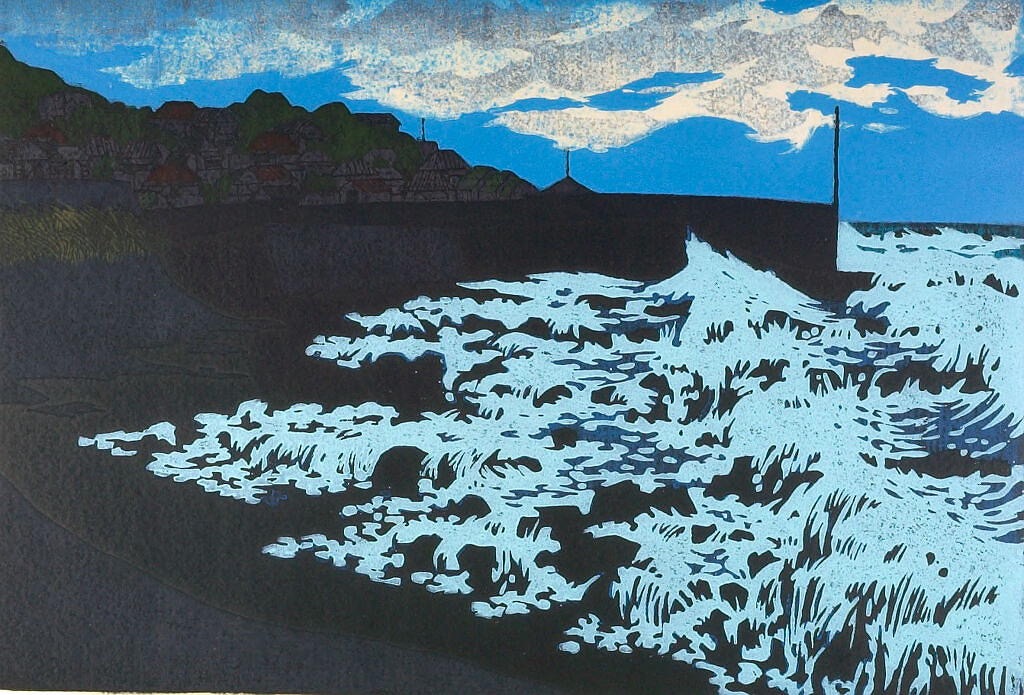
Fukushima Ichirō: Wave in Chiba (Shōwa period,1926-1989)
"Perhaps our Decency utterly depends upon such useful fictions."
Decency, like matter, simultaneously exists in two states: Particle and Wave. As a particle, it appears as recognizable acts, physical incarnations of what might otherwise be nothing more than some psychological state. As a wave, it exists as more of a felt or abstractly felt sense, a ‘vibe’, if you will. Some Decency seems incredibly easy to see, obvious, while other Decency seems utterly invisible, yet still decidedly present. It’s incredibly easy for us humans to get so focused upon one of these two incarnations of Decency that we fail to see or sense the other. This phenomenon might explain the recent reports of Decency seemingly disappearing. If I overlook all but the most obvious and tangible Decency, I should excuse myself for failing to notice all the tacit Decency remaining.
Or, perhaps both forms are now threatened.
Renewal

Gustave Moreau: The Infant Moses
[Moïse Exposé sur le Nil] (c. 1876-c. 1878)
Gallery Text:
Paris hosted the 1878 Exposition universelle, or world’s fair, to celebrate France’s recovery after the Franco-Prussian War of 1870. For the event, Gustave Moreau submitted a cycle of biblically themed paintings to reflect on the nation’s renewal. The series, which included this work as well as Jacob and the Angel (1874–78; also in Harvard’s collection) and David (1878), marked three stages of human life. Here Moreau celebrates the anticipation and promise associated with childhood: Moses, recognized by the rays emanating from his forehead, floats in his basket on the Nile, surrounded by the ruins of ancient Egypt. In a written commentary Moreau suggested the prophet’s enlightenment, noting the contrast between “this people of mummies, sphinxes, and gods with staring eyes and unmoving gaze” and “this fine human fruit full of sap and life.”
——
"That's just how Renewal works. Always has. Probably always will."
I think of Renewal as a positive, uplifting experience, forgetting in the moment that considerable destruction often accompanies it. I always find the demolition parts of the operation particularly upsetting because I inevitably overlook the underlying price of the improvement. Our current front porch Renewal began with a series of disappointments, each of which seemed to preface eventual disaster. Our first concrete contractor proved unreliable. He poured a sample sidewalk to demonstrate his abilities, and that sidewalk failed.
Furthermore, he disappeared with some of our advance, saying he needed to buy materials.
Weekly Writing Summary For The Week Ending 10/02/2025
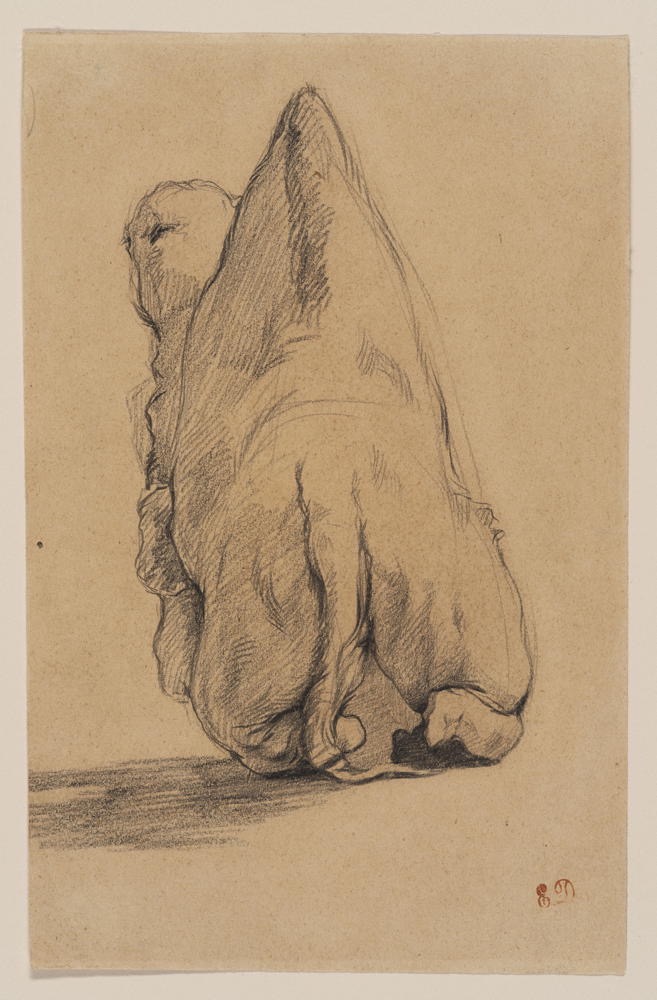
Ferdinand-Victor-Eugène Delacroix: Camel (c. 1827-1828)
Different Than Taxable Income
This second week into this still-new Decency Series, I sensed myself settling into a fresh context. Few experiences better reward my choice to write than this sensation of settling into another perspective. It might seem as though I'm transcribing here what I already understand, but my persistent readers already understand that I rarely know what I'm going to write before it appears before me. I set an intention, then wait for the universe, The Gods, or chance to show me how they intend to manifest it. I am inescapably involved, but only as a medium. Maybe tolerating this experience exemplifies what it means to author. My movements in this world inevitably tend to become part of my stories, not through clever scheming, but through something infinitely more confounding. I am employed in precisely this way, not by a benevolent employer who pays me cash for my trouble, but by synchronicity, who reliably forgets to pay me with anything other than insights and experience. Curiously, I feel a more dedicated and reliable employee now then I was back when a paycheck reliably appeared at the end of every other work week. I feel infinitely more productive now than I ever did then, though I earn something quite different than taxable income.
Themocracy
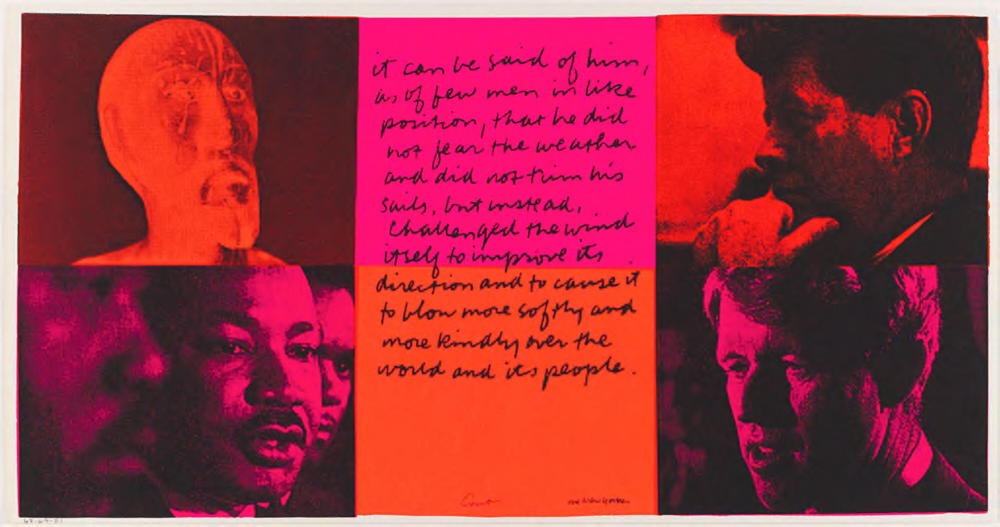
Corita Kent (Sister Mary Corita): it can be said of them (1969)
Inscriptions and Marks
Signed: l.c.: Corita
(not assigned): Printed text reads: it can be said of him, as of few men in like position, that he did not fear the weather and did not trim his sails, but instead, challenged the wind itself to improve its direction and to cause it to blow more softly and more kindly over the world and its people. the New Yorker
inscription: l.l., in graphite: 68-69-81
—
"We deserve to live in a land of the Decent and the home of the Thems!"
One under-appreciated aspect of the current War on Decency involves continually Themming Decency. Our incumbent characterizes Democracy, until very recently seen as a common element governing American life, as Themocracy, something ‘those other deplorable people practice.’ Anything not actively undermining Decency must be characterized as evil, even, especially, Decency itself. The Repuglicans refer to The Democratic Party as Themocrats, and insist that none of ‘us’ should be caught dead collaborating with ‘those people.’ I have even begun self-identifying as a Them, since that label clearly distances me from the apparent source of the problem. If ‘us’ stands for what he espouses, I gladly see myself as a Them. Us, once so inclusive, has become exclusive in a way that some wealthy golf retreats might seek to distance their members from all others. In this way, they’ve already successfully seceded from our union. So much the worse for ‘em, and good riddance!
Yet our union remains strong if wrongly characterized by those dedicated to undermining Decency.
Crickets

Unknown Artist-East Asia, Japan:
Decorative Sculpture in the Form of a Grasshopper or Cricket
(Late Edo period, 1615-1868, 19th century)
"The crickets said more than words in response."
Decency makes no discernible sound. Descretion regulates its responses. It will not easily rise to provocation. It holds its cards closest to its vest. If you want to know what Decency thinks, ask, then wait for an interminable-seeming time, for Decency will never be in the business of disclosure, and it demands deliberation time. It will not move with the wind and does not require much ego gratification. It understands that very little is ever about it and takes very little terribly personally. It already has plenty and does not desire to accumulate much more. It avoids appearing unseemly at pretty much any cost. It does not do surly.
A large room filled with generals and admirals, brought together to rile them up, remains silent through speeches that were intended to burn barns.
Deceit
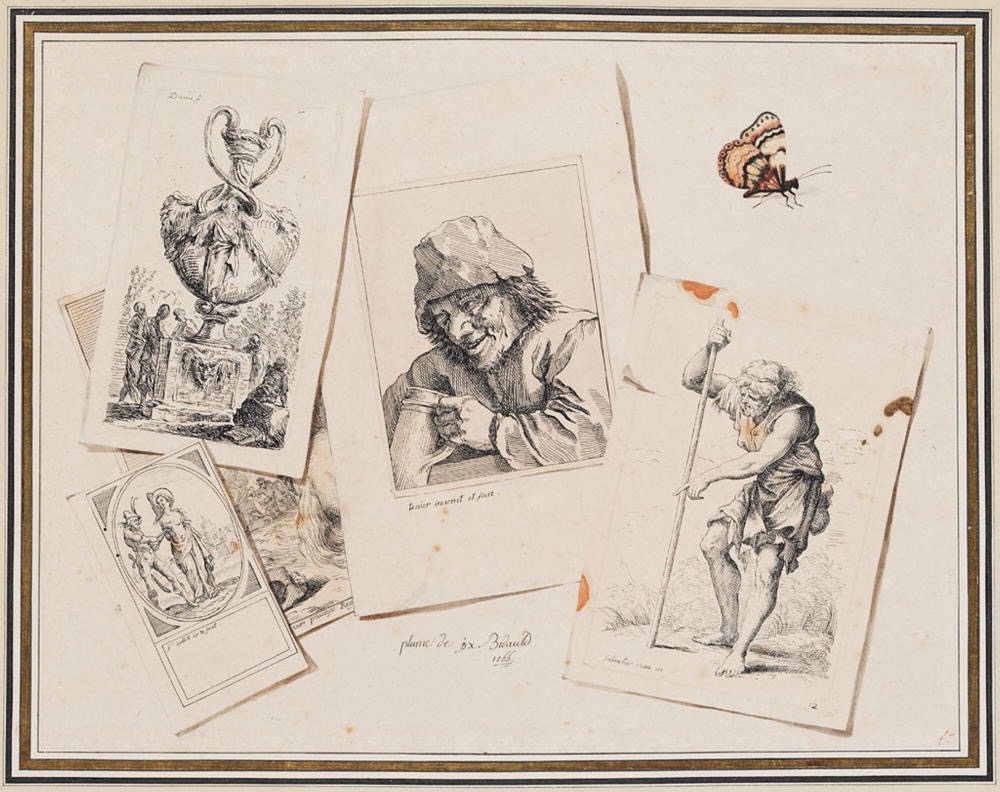
Jean-Pierre-Xavier Bidauld:
Trompe l'Oeil with Prints and a Butterfly (1766)
"Not even that frenzied moment will last forever."
Perhaps the truest test Decency ever encounters occurs whenever it tangles with Deceit. Deceit deliberately misrepresents. If Decency strives to be on the up and up, Deceit insists upon the down and down. Deceit distorts its position, which effectively negates the possibility of successful negotiation. Deceit doesn’t care so much about winning any particular engagement as long as its opponent loses. It knows no shame. It blames. It shamelessly defames, deliberately leaving Decency in a lurch. Each violation serves as another invitation for Decency to let down its defenses and compromise itself. Deceit wins when it successfully recruits Decency into its ranks. Each invitation might serve as a successful seduction if Decency were in any way similar to Deceit. It isn’t.
Still, it’s difficult for even the most disciplined Decency to quietly sit by while Deceit sways public opinion again.
Persistence

Thomas Cowperthwait Eakins: Miss Alice Kurtz (1903)
"Will we persist with our damning decency even then?"
From A Threatened Portland, Oregon, On The Morning It Appeared Our Incumbent Relented Before His Assault Could Begin, Realizing He Couldn’t Possibly Win.
The ICE agents look like children engaged in pretend war games. Armed with ridiculous-looking paintball weapons loaded with pepperball ammo and wearing silly face coverings, they appear anything but threatening. They scream without provocation, thereby disclosing just how terrified they must feel inside. Their opponents bring Persistence to the game rather than pretend weapons. They take their licks as administered by the undisciplined troops. They curse but rarely really resist. They go flaccid when assaulted, rendering their attacker powerless to influence. They persist instead. It slowly becomes evident that the scare tactics aren’t working; the protesters seem unaffected by the vague threats and meaningless curses, which fail to carry much evidence of underlying malice. This is performance, mugging for unseen cameras. Nobody is willing to suspend their disbelief, not a freshly installed officer or a vastly more experienced protester. Everyone knows who wins these kinds of confrontations.
The ICE agents might just as well be punching pillows for all the difference they’re making on the peaceful and royally pissed-off citizens.
DecencyDemanding
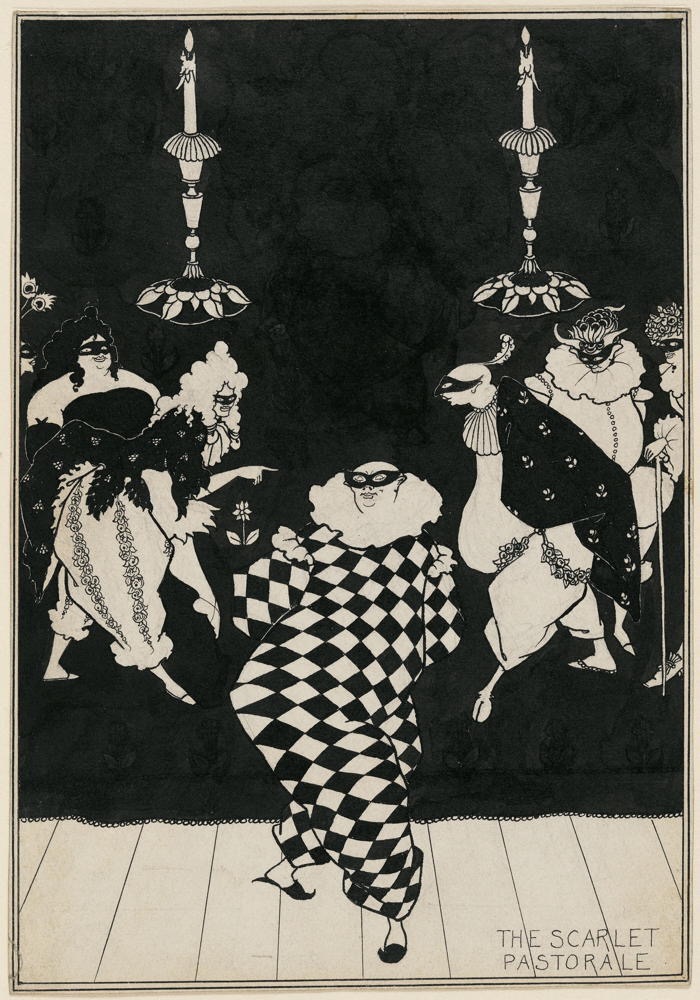
Aubrey Vincent Beardsley: The Scarlet Pastorale (1894)
"…those of us daily struggling to live decent lives in these extraordinary times."
What does Decency demand of me now? This seems to be the question reverberating in my head most mornings. I find no definitive answer. If I were a martyr, I might more easily find such a response, for I would know without a doubt that Decency desperately desired me to become a victim to whatever provocation I might encounter. But Decency does not seem to want me to be placating situations. It wants me to be true to myself, too, to stand up for something. It sometimes seems that my Decency and I are witnessing especially horrible provocations, ones specifically engineered to elicit something approaching my very worst responses. They seem to desire my anger. They frustrate me with double-binding insistences. They do not appear above outright lying just to bring out my worst responses, and, believe me, I have been frantically sorting through alternatives. The Decency question resonates even more strongly the longer I consider my options.
The eight-year-old in office has mastered nothing more interesting than fabricating.
Situationalism
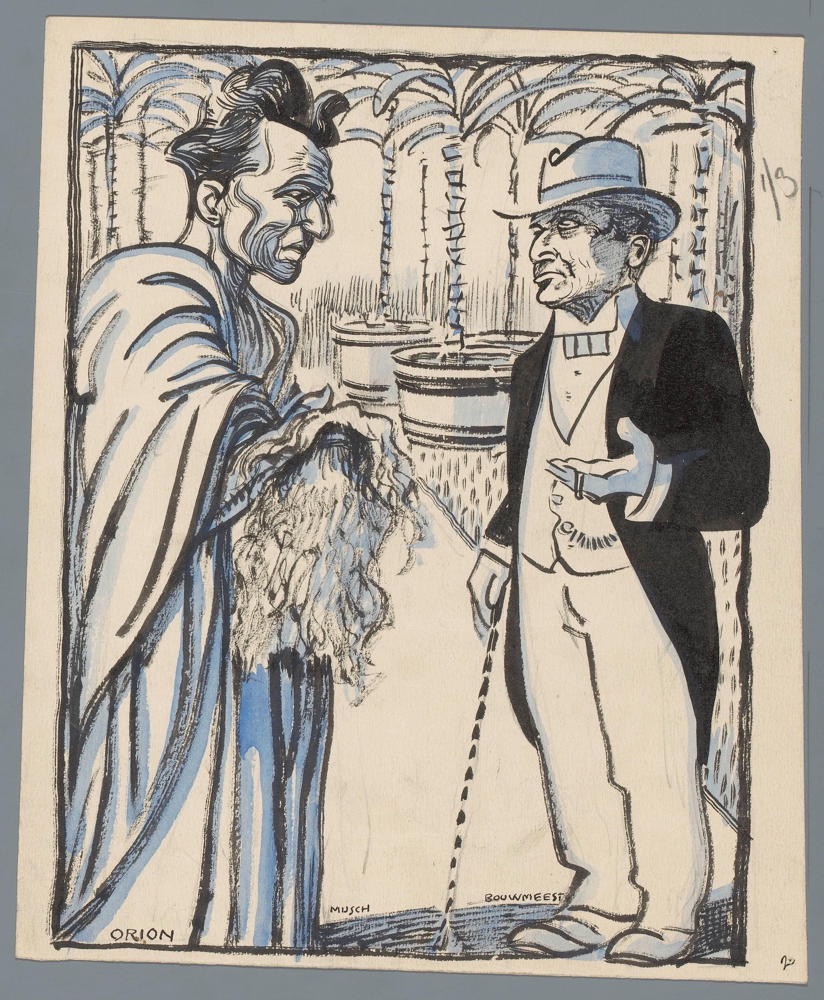
Patricq Kroon: Musch and Bouwmeester (1900 - 1924)
The actors Jan Musch and (Louis?) Builder in conversation with each other. Design for a cartoon in the newspaper.
"Perhaps I should be indicting myself."
Maybe Decency should only be exercised situationally. Perhaps it’s a Sunday sort of behavior. Certainly, considerable ambiguity surrounds its appropriate use. One might not want to waste any on enemies, for instance. Perhaps only certain people are qualified to receive it, and maybe not everybody’s fully certified to properly dispense it. Maybe it requires some skill to properly deploy. Should rank amateurs even be allowed to engage in it? What if they were to accidentally extend some Decency to someone unqualified to receive it, someone, for instance, who couldn’t properly appreciate it? Couldn’t the resulting misunderstanding leave the world worse off for the experience? Might indiscriminate Decency cause real and lasting damage, not only to the practitioner but also to the unwitting receiver? What if we inadvertently spoil some hapless receiver into expecting to always receive Decency in a naturally hard and increasingly indifferent world?
I might needlessly worry about such questions.
Weekly Writing Summary For The Week Ending 09/25/2025

Jack Gould: Untitled [woman writing numbers on blackboard] (c. 1950)
We Must Embody It Now
Imaginary Enemies might be the most virulent kind. There’s no physical way to defeat them. They can only ever be conquered by other means, often through cognitive means. This means that those most likely to conjure up Imaginary Enemies usually prove to be the ones least able to vanquish them. They escalate defensive measures far beyond reasonable levels instead, often inflicting greater damage upon themselves than any enemy, imaginary or actual, could ever manage. Failure to deflect the imaginary only rarely uncovers the illusion, for only clear victory could convince the thoroughly deluded, and Imaginary Enemies wickedly withhold such clarity. It seems as though a clever conspiracy prevents unambiguous evidence from emerging. The afflicted slowly suffocate in their own ambiguity, chasing shadows of their own activity, unable to distinguish between actual and imagined.
A grave injustice might prove to be the only means by which Imaginary Enemies are ever vanquished.
SearchingForDecency

Antonio Tempesta: Canens Searching for Picus (1606)
"It seems likely to be taken down by defensive friendly fire."
Hoping to gain a better understanding of Decency, I initiated a Google search for “Decency In The News.” I received in return references and explanations that didn’t even attempt to define Decency, or even to provide current examples of it in action. I found instead lengthy descriptions of what Decency isn’t, how it so often seems missing from online conversations, and how Section 230 of the Communications Decency Act has done little to encourage Decency in online forums, though it has successfully shielded platform owners from lawsuits for such offenses as third-party slander and copyright infringement. “Reports about ‘decency’ in the news consistently focus on its erosion in politics and society, though the Communications Decency Act also remains a topic. Current conversations often frame a decline in decency as a symptom of deeper societal issues like incivility and political polarization.”
One deeper societal issue, aside from the obvious incivility and political polarization, might be the apparent unspeakability of Decency.
ReWired

Lee Russel: Trailer of itinerant electrician near Pharr, Texas (1939)
Farm Security Administration Photographs
The Miriam and Ira D. Wallach Division of Art, Prints and Photographs: Photography Collection, The New York Public Library. "Trailer of itinerant electrician near Pharr, Texas" New York Public Library Digital Collections. Accessed September 24, 2025. https://digitalcollections.nypl.org/items/8e15f900-c4fb-0136-ce6e-438981b45b1b
"…it might take such work to set the circuits straight again."
I realize that I have been ReWired. Whether I believe the bullshit or not, and perhaps especially because I don’t believe it, either conclusion could serve as evidence that a successful rewiring has occurred. I wish, and even pray, in my curiously agnostic way, that this situation were otherwise, that my defenses had not been compromised, but I have lately realized that there was no avoiding this experience. Yes, I refused to watch Fox from its inception, except for a few otherwise inaccessible baseball games they alone televised, because I firmly believed that exposure to that poisonous content might rewire my judgment. I had not suspected that just deciding to tiptoe around it was also evidence of its backhanded success. Its premise might have scared me off, but it also motivated me to build a fence around my property to maintain an isolated Dignity, when Dignity rightfully knows no such boundaries.
The insidious nature of shriveling morals affects even the morally steadfast.
D-Scrolling

Sebald Beham: Little Buffoon with Scroll (1542)
"Curious how there's so much more effort expended trying not to do something than there ever is to simply repeating it."
We refer to this activity as Doom Scrolling, the practice of aimlessly perusing online media. The scrolling part of the term seems more self-explanatory than the doom portion. The doom comes from the general content found on social media. It tends to be overwhelmingly focused on the catastrophic. On slow news days, plenty of past catastrophes appear to hold the space. Scientists—real scientists, not the phony ones currently enjoying a resurgence on social media—suggest that each exposure to a report of some catastrophe incites something in our brain to dispense an addictive substance that encourages us to continue engaging in the hope of stumbling upon another similar report. Doom apparently better excites the amygdala suspected of dispensing this addictive substance than do more uplifting kinds of content. Fuzzy kitten and fluffy baby duckie pics work to some extent, but apparently not nearly as well as catastrophe.
It's nothing personal.
Decency

Follower of Jan Massys: Two Peasants Looking at a Mirror (c. 1550)
"I will be investigating this notion between now and just before Christmas."
We insist that we are decent people, charitable to a fault. We rail against indecency as if it were the obscenity it always was. Yet we engage in the occasional absolutely indecent activity. We're currently, under the direction of our administration, which, thankfully, cannot administer anything, deporting people without due process. They're initiating, in our good name, a raft of initiatives Decency prohibits. Yet they're still proclaiming from every pulpit just how deep down Decent they are, and we remain.
Maybe Decency is something other than what we've always assumed it was.
Revisiting
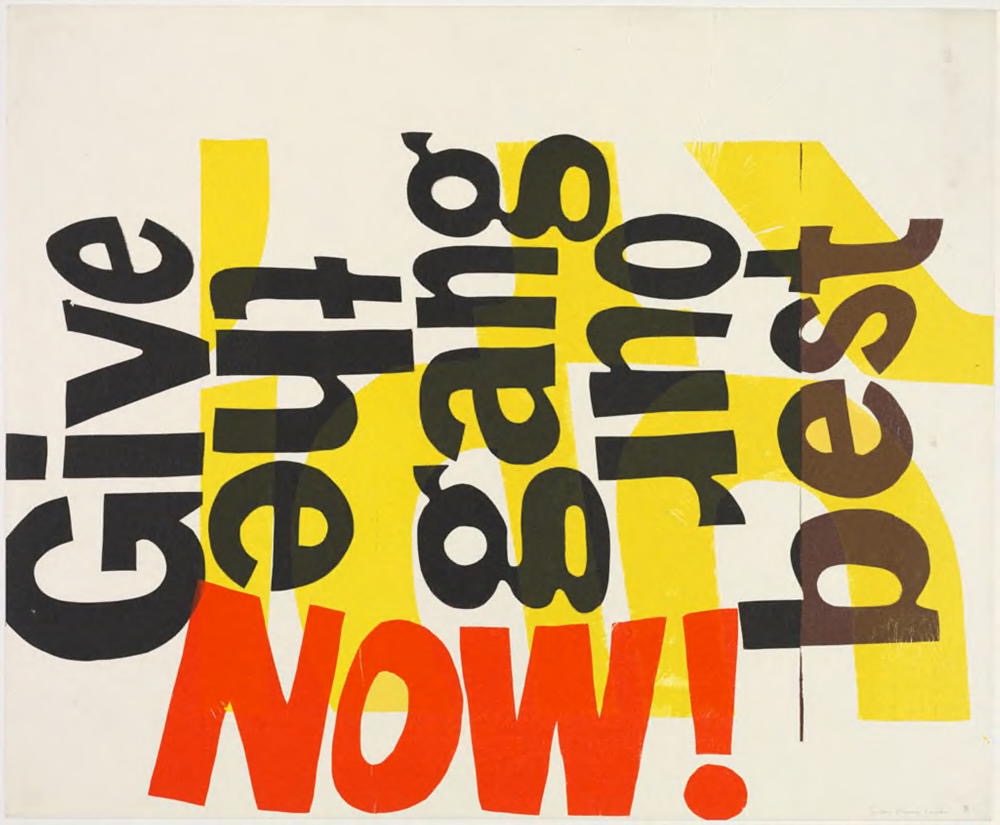
Corita Kent (Sister Mary Corita): give the gang our best (1966)
"…genuinely inept actors."
I ask myself which FollowingChapters Story might be "the best" without really expecting anybody to answer my question, let alone myself. The question itself seems irrelevant because I never intended there to be any competition between them. Sure, some seemed better and others worse at inception, but often, the stories that seem the worst to me when creating them attract the most positive attention once I post them. My nose seems reliably unreliable. But then, I do have my favorites, the ones that seem the most resonant and those that surprised me, even a few that delighted me. It's noisy at my writing desk when I'm writing and even noisier when I'm reading through what I've just finished, then noisier still when I'm compiling a series of pieces into a comprehensible whole. And even noisier, though this never seems possible, when I sit down to peruse what I've compiled, reading through the collection for the very first time.
How many times might I need to read through the whole collection to pass fair judgment upon the whole, let alone to gain enough traction to definitively choose one story as "the best?"
FollowingChapters: Series_Recap

Utagawa Hiroshige 歌川広重: Asakusa Ricefields and Torinomachi Festival
(Asakusa tanbo Torinomachi mōde), from the series One Hundred Famous Views of Edo
(Meisho Edo hyakkei) (1857 (Ansei 4), 11th month)
With Liberty Tagging Along I began this FollowingChapters Series after spending the prior two quarters writing a series I’d titled NextWorld, in which I attempted to predict how my world might change under the upcoming and now current administration. I’d then completed a series I’d titled CHope in which I tried to maintain hope that my world might not be completely demolished by near absolute idiocy, somewhat successfully. Then I faced a next quarter. What would be my writing focus then? I chose the title FollowingChapters because, from my perspective at the time, I couldn’t foresee what might exist after I’d successfully investigated my NextWorld and projected much Hope. I’d enter my FollowingChapters.
Slip over here for more ...Weekly Writing Summary For The Week Ending 09/18/2025
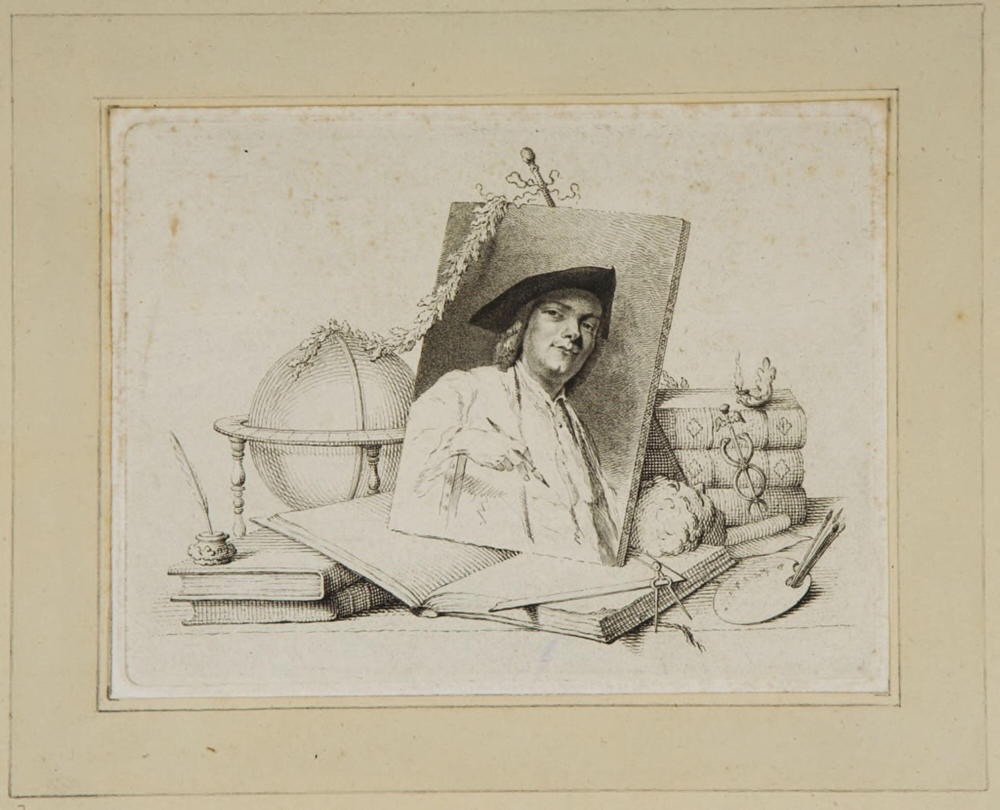
Reinier Vinkeles: Cornelis Ploos van Amstel (18th century)
And Win Every Morning
This is how my thirty-third series ends, as they've all ended, with more of a whimper than a bang. I consider stories that build to a satisfying climax to have been engineered to yield that effect. Since this and every previous entry in my series focused more on my actual experiences, I couldn't engineer such plotlines. I could draw conclusions, however preliminary, but I could never actually know how any of my stories would ultimately turn out because the meta-story I was inhabiting had to remain ongoing; otherwise, their author couldn't be present to create the current installment. Or the next. Life works like that.
With each ending comes the question of whether I'm really up for another beginning.
Irony

Attributed to Cornelis Anthonisz.: The wise man and the wise woman (1540 - 1545)
"Imaginary performance. Man and woman with all their attributes, represent many virtues and biblical metaphors. A woman with horse legs and hooves holds in her right hand a stand depicting the crucified Christ and in the other hand a can, a lock on her mouth, a dove on her chest and a snake around her waist. Man with compass and scale and dog at his feet. Left and right of the presentation text in Dutch."
"These lessons will be lost on even the very best of them."
The proper administration of Irony requires something other than mere administrative or standard leadership skills. It first demands of its incumbent a sincere dedication to obliviousness. This requires the opposite of focus. One must also be more than merely capable of producing endless streams of serious non-sequiturs, but possess the parallel ability to never once catch just how self-disclosing these seem to everyone else. One must also maintain multiple hidden agendas that remain open to public acknowledgement, ensuring everyone understands their purpose better than their creator. The entirely successful incumbent will pick fights he cannot possibly win, only to pick additional fights whenever it's clear he's lost. He must never admit to any wrongdoing and must convince himself, if only ironically, and nobody else, that he's not the biggest loser to ever hold office. Above all, the obliviousness must be sustained at all costs. Undiagnosed cognitive dysfunction, a definite plus.
Sycophancy also seems a must for the proper administration of Irony.
Corrupting
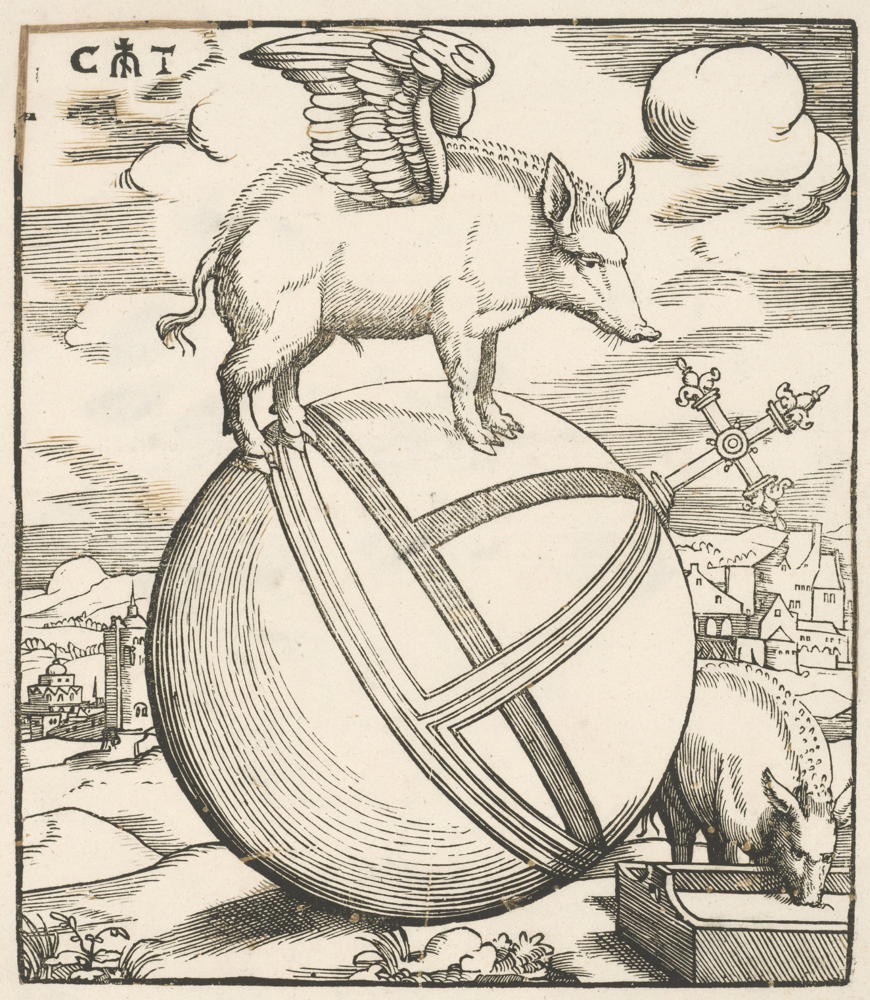
Cornelis Anthonisz: The winged pig in the world (1541 - 1545)
Allegory of the corrupt world: winged pig standing on imperial apple.
Second pig eating from trough.
"Those who insist upon living in glass houses must restrain their public actions."
Few crimes seem more misaligned than corruption. Those to whom trust has been extended betray something more than that trust when they engage in Corrupting behavior. They corrode themselves first. Stealing from the public purse seems much worse than any other sort of burglary. Violating simple comportment rules can quickly become complicated. A twisting occurs, first of ethics and later, of respectability. Those who profit from their service are rightly seen as beneath contempt. No excuse ever erases the stain. No apology ever undos the well-deserved disdain. Those who believe themselves to be above the law demonstrate only how far below it they've fallen. Bottom feeders deserve the dregs.
Our current administration conducts a master class in corruption.
Loose_Talk
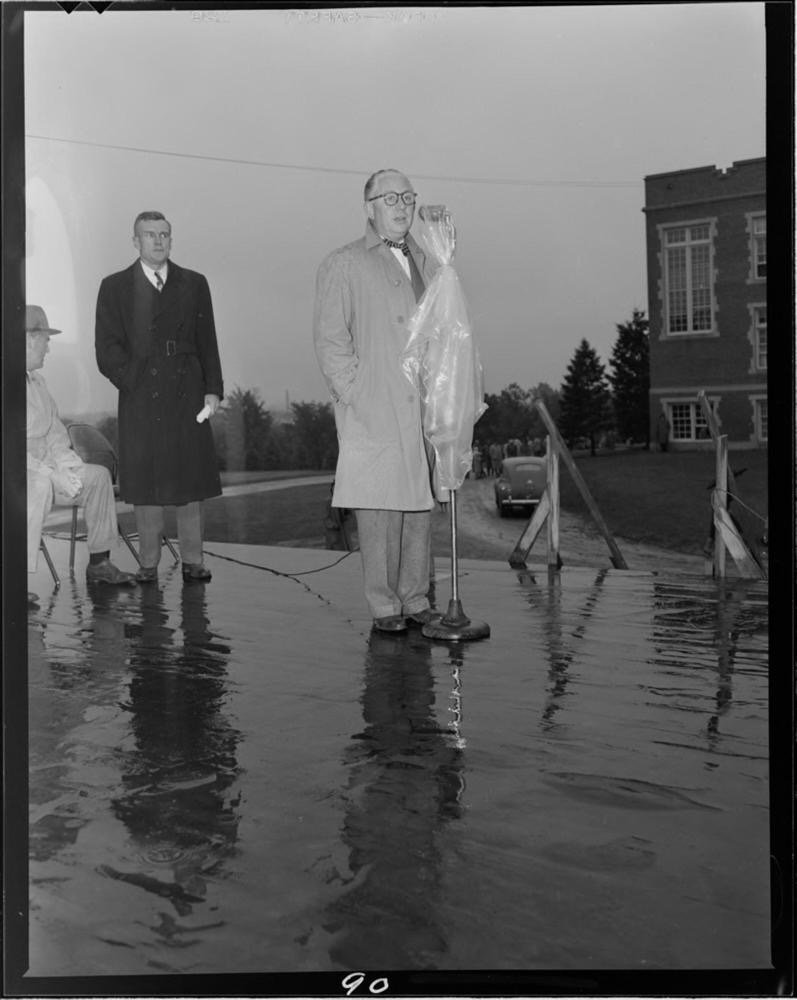
Lucian and Mary Brown: Untitled [man giving speech in rain] (c. 1950)
"I just wonder why."
This country was founded upon the ideal of Free Speech. In practice, it has always struggled to draw the distinction between Free Speech and Loose_Talk. Free Speech suggests that one might feel free to say anything they care to say to or about anybody. Civil discourse, of course, demands a few dampers be placed upon the full and, dare I suggest, free expression of observations. Likewise, simple civility might also suggest that certain speech be squelched lest someone take offense or choose to be offensive. Mark Twain suggested that while we might have the freedom to speak our minds, however addled, we also hold an overweening obligation not to, or not to very often. The distinction between Free Speech and Loose_Talk resides in the ear of the listener, though most speakers might understand where one begins and the other ends for themselves, if not necessarily for any other. Libel laws are notoriously difficult to enforce. Same with slander.
It's apparently not nearly enough to insist that individuals must carefully edit their utterances.
Persevering
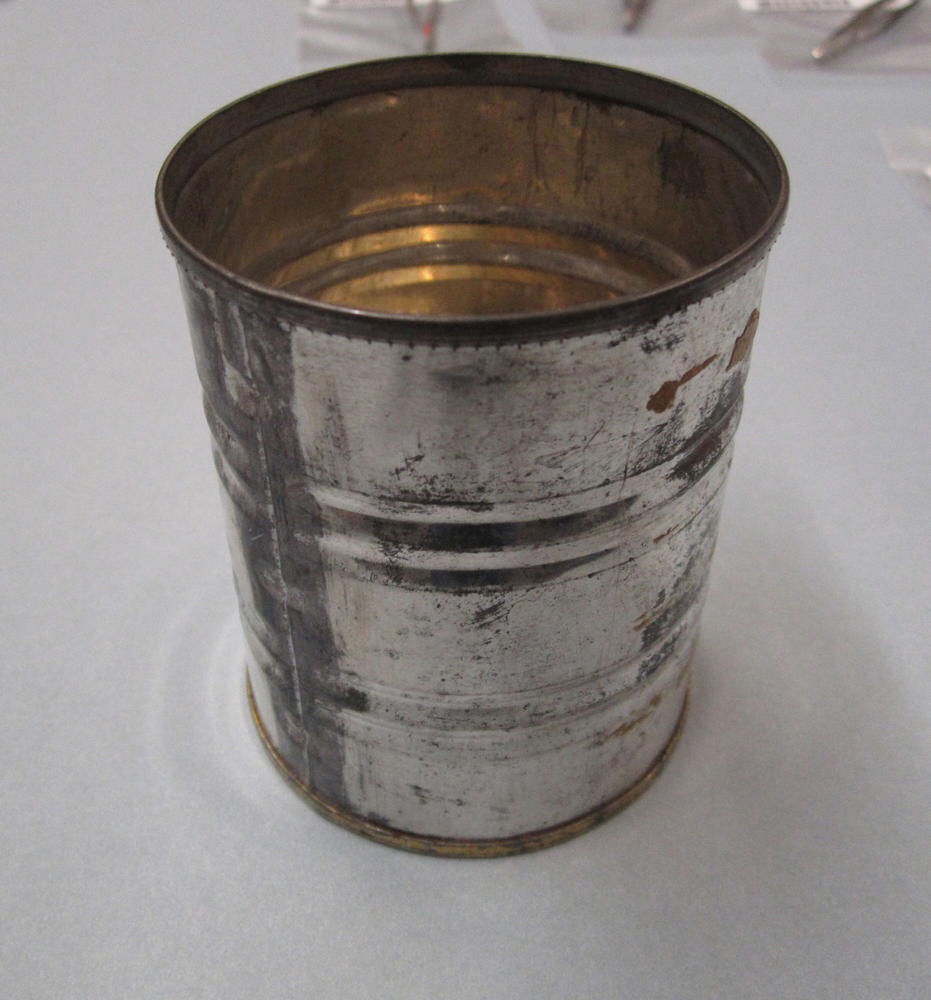
Tin can formerly containing tweezers: Archival Material (20th century)
Aluminum, Dimensions 8.3 x 6.9 x 6.9 cm (3 1/4 x 2 11/16 x 2 11/16 in.)
Collection of Barnett and Annalee Newman - Estate of Annalee Newman -
The Barnett and Annalee Newman Foundation -
Harvard Art Museums/Straus Center for Conservation and Technical Studies,
Gift of the Barnett and Annalee Newman -
Exhibition History: Barnett Newman: The Late Work, Menil Collection, Houston,
03/27/2015 - 08/02/2015
"…still as fresh as they day they were preserved, Persevering."
Every Late Summer since we coupled, The Muse and I have practiced Persevering in the form of preserving. I suspect it was no accident that these two terms so closely resemble each other, for the purpose of our preserving has always been Persevering, for we are accomplishing more than merely "putting up" some produce. I always sense myself back in my mother's kitchen receiving instructions on how to slice a pear in half against my thumb—a task I'm still too squeamish to blithely perform, for I fear I'll cut myself, though I never have. The very act of attempting to Perservere preserves something in addition to the fresh produce we will consume through the upcoming winter. We preserve a seemingly fading lifestyle, a passing, nearly past imperative, one that sustained generations before ours. We ache to reprise this dance each year, and so we do.
It was always inconceivable for us to miss performing this sacrament.
Cadency
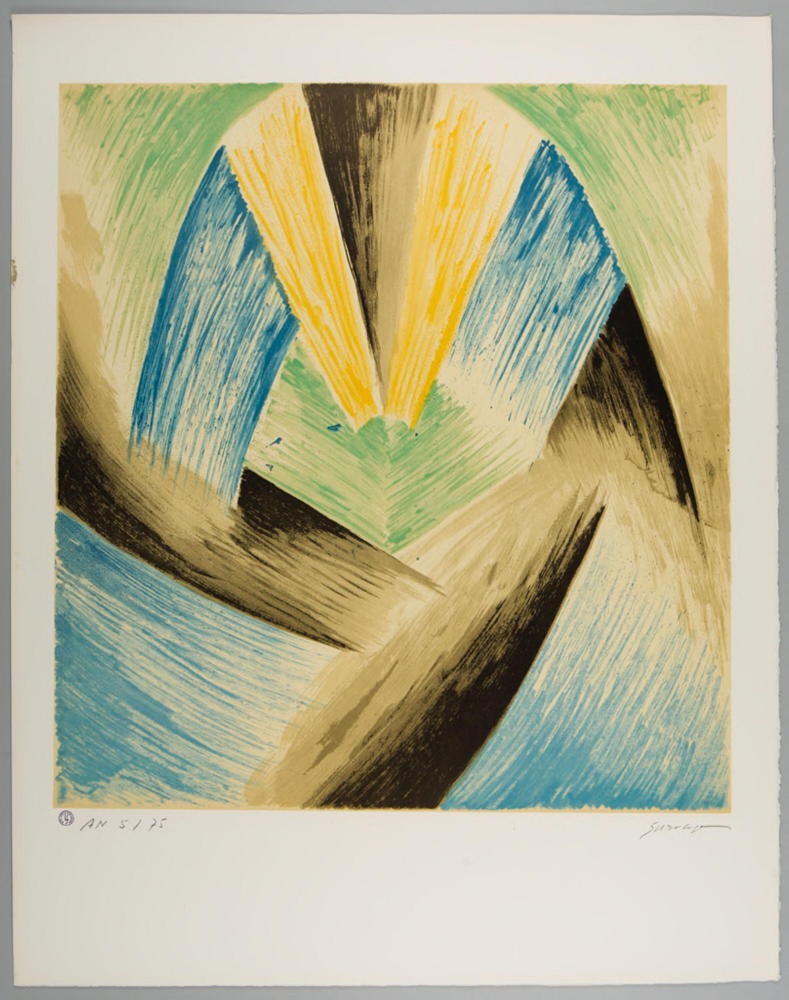
Léopold Survage: Plate V
[Rhythmes Colorés: Cinq Lithographies Originales in Couleurs
(20th century)
"My presence will be best represented there in the future by my absence."
The Muse and I went to dinner last night with a group from a local alumni association. This group does good works, and our host helps. In addition to their good works, they also organize these suppers where three or four couples gather to share courses and conversation. We were responsible for the appetizer course. The Muse made some fancy crackers adorned with goat cheese and Mirabelle jam. She also made some icy hot gazpacho to serve as soup. Another brought a salad, another wine, and another a rhubarb pie. Our hostess made a casserole with deplorable green beans that were overcooked, leathery, and nasty. Fortified and distracted, we commenced to attempt to conduct a conversation around that table.
The conversation did not go well.
Invitations

James Abbott McNeill Whistler: Invitation Card (1882)
"I am not one of them."
I feel baffled by the odd attraction some seem to feel about the Invitations that MAGA characters offer. It appears as though they extend permission for others to engage in whatever truly awful behavior they might have previously felt constrained against, as if they had been impatiently waiting to be offered entry into a genuinely despicable manner of living. I feel no such compulsion, and I cannot imagine any invitation that might convince me to flee into the dark side, but seemingly not so with the MAGA faithful. They immediately start spewing venom with the best of them. Hate speech seems to be their small talk, and bitter accusations, their typical conversation. It looks as though they've been granted grudges as a reward for their entry.
They seem to require near-constant reinforcement, as the media machine they subject themselves to repeats the same ugly memes like catechisms.
Weekly Writing Summary For The Week Ending 09/11/2025

Salvator Rosa: Five River-gods (1651-1656)
Won't Miss the Weeding
The rains finally came ten days into September. I was awakened by crashing thunder, flashing lightning, and The Muse rushing around slamming windows. I barely acknowledged this long-anticipated event before slipping back into one of my more satisfying sleeps of this evaporating season. The following morning, I walked around the yard satisfied that the gardens might survive even this latest endless swelter. I have reached the age where my sample size seems adequate to reach a few conclusions. I experience summers differently now than I did when I was ten and riding my bicycle around town half naked and berry brown. What was liberating then has become encumbering, a physical and emotional challenge, a survival exercise instead of endless play. With only ten days remaining before autumn arrives, I, too, might survive this summer. I will miss reading beneath a whispering ceiling fan and the early evenings with sprinklers cooling the yard. I will definitely miss The Muse's overflowing vegetable garden, though I won't miss the weeding.
God-Givens

Unknown Russian Artist, Tula:
Flintlock Fowling Piece Given by the Empress Catherine II of Russia
to the French Ambassador (1745 and 1763)
"So much for God's matchmaking skills, and others."
Recently, Virginia Senator Tim Kaine sparked controversy when he stated the seemingly uncontroversial opinion that rights come from laws. Conservatives, spear-headed by the ever-pious Texas Senator Ted Cruise, publicly disagreed, insisting that none other than Thomas Jefferson himself declared that people are bestowed by their creator certain inalienable rights, namely: the right to life, liberty, and the pursuit of happiness, accusing Senator Kaine of disclosing the "Democrat" agenda to ascribe God-Given rights to laws and thereby enabling them to be rescinded upon a whim. House Speaker Mike Johnson chimed in, insisting that while this was the well-known "Democrat" agenda, they weren't supposed to say it out loud. Here's The Hill's report on these exchanges.
This might seem to amount to little more than another vacuous gotcha game exchange between partisans, but it got me thinking about what constitutes a God-Given.
Likelihoods
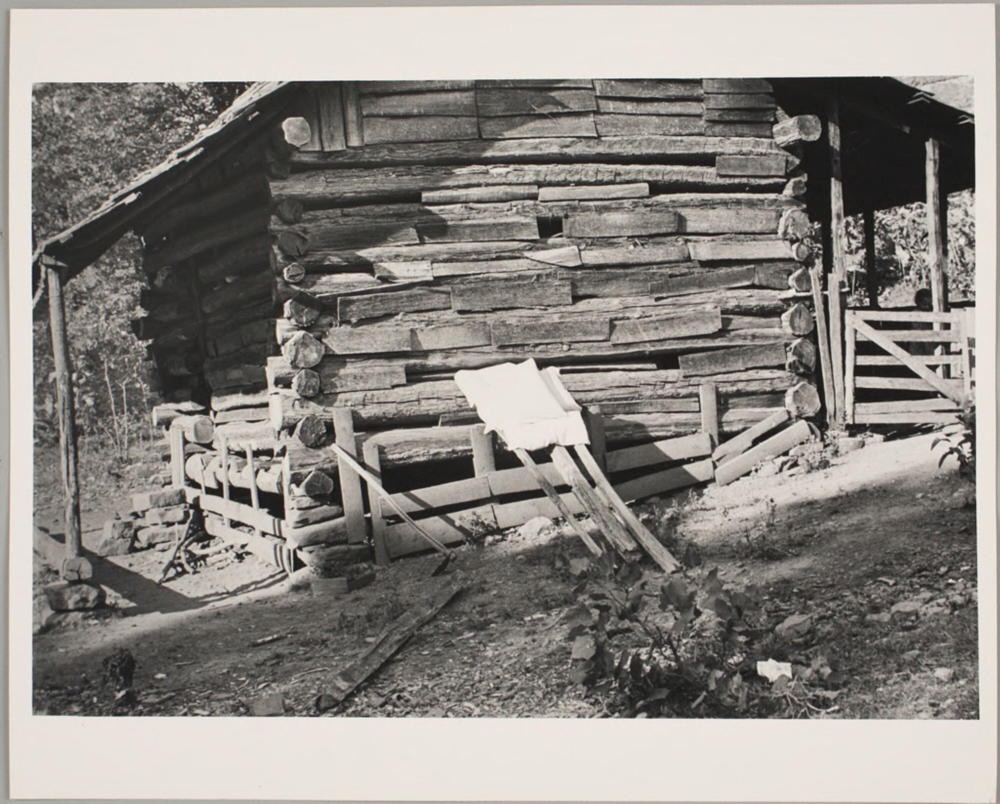
Ben Shahn: Untitled [exterior of home, probably Arkansas] (1935)
"It almost seems as if I disappoint myself on purpose."
I survive the final fortnight of Summer by focusing on what I clearly do not understand. Weather predictions indicated a possibility of rain early this week, but this promise was barely fulfilled with a brief gust and a few scattered drops around sunset the day before yesterday. Another possibility appeared in yesterday's report, but that one also failed to produce. A forty percent chance of rain rarely results in very many raindrops here. Another part of the region must attract the weather through this season, because we don't, or we haven't. This might have something to do with the very nature of Likelihoods, which by their name seem to suggest that a stated outcome will prove likely. We might as easily classify these as Unlikelihoods, connoting the production of an absence, since Likelihood doesn’t always promise the mentioned outcome. A 40% chance of rain means that there's a 60% chance of none.
Even labeling such a prediction a "probability" connotes that something will "probably" happen, and it reliably does.
Stewarding

Urs Graf: The Parable of the Unjust Steward (1511 - 1515)
The Miriam and Ira D. Wallach Division of Art, Prints and Photographs: Print Collection, The New York Public Library. (1511 - 1515). The Parable of the Unjust Steward Retrieved from https://digitalcollections.nypl.org/items/9dfc8bf0-a38f-0134-34b1-00505686a51c
"My conscience should leave this season aware of my shortcomings and successes."
Everyone in this world has the same job, the identical responsibility that transcends their occupation, profession, and "real job." Likewise, we hold responsibilities before and beyond mere ownership, however much or little we might manage to accumulate. Rich or poor, high or low-born, we remain steadfastly equivalent from birth until we die. We are each first and foremost Stewards.
Ownership might be an encumbrance to stewardship, since it suggests some forms of authority over property.
GettingOver
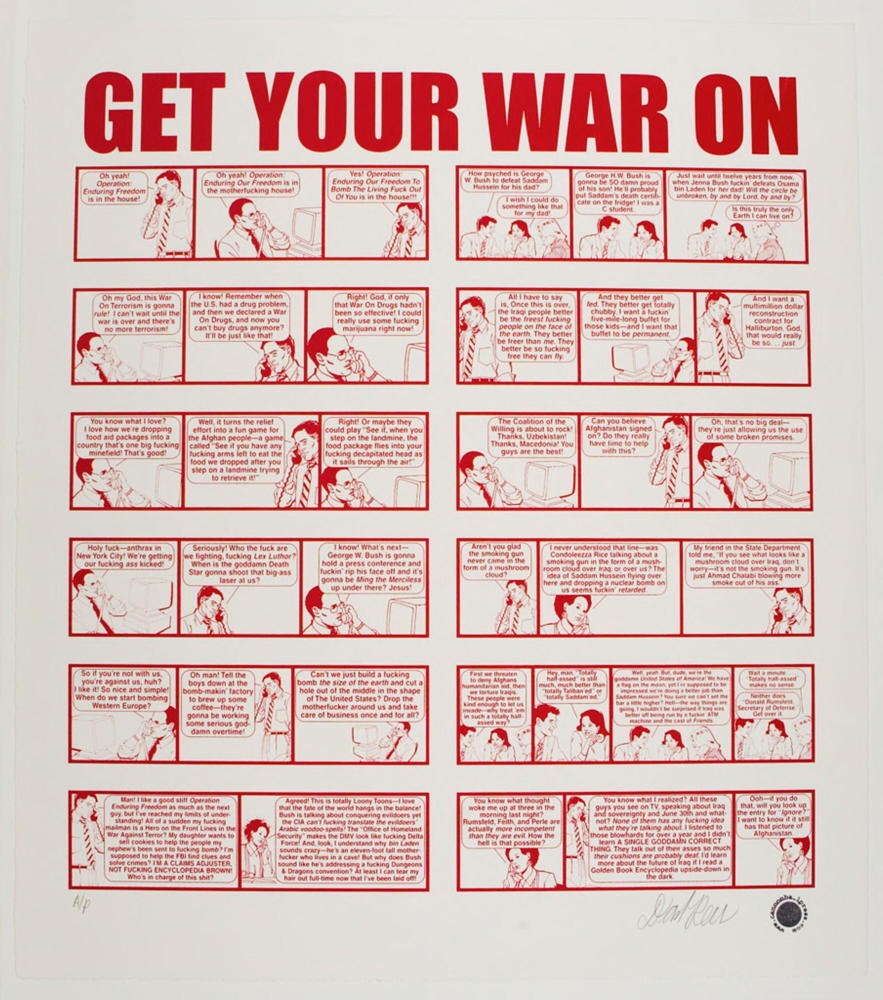
David Rees: Cannonball Press
Get Your War On (2004)
"Aspiring for the impossible never makes it happen."
Eventually, the tin pot dictator's proclamations take on the distinctive scent of irony, irony utterly lost on him, of course, but, increasingly, not lost on almost everyone else. He becomes the parody he always was, finally even in his former partisans' eyes. His plans seem absurdist and not only because they virtually never turn out as announced. Eventually, few, if anybody, can even imagine how they might have ever worked. When the advertised revolution can no longer quite qualify as believable fiction, society widely releases a collective sigh, clear evidence that we can begin GettingOver another sorry chapter.
We have had many sorry chapters to get over in our past.
Grieving

William Holman Hunt: The Triumph of the Innocents (1870-1903)
"They will fail, but they sure enjoy being cruel."
I believe evangelism constitutes a much greater sin than paganism, but then I do not believe paganism qualifies as sin. I believe the separation of church and state has always been a moral issue, as linking church and state constitutes an immoral act. Prayer breakfasts exist so hypocrites can enjoy debasing themselves at public expense. Prayer in schools seems roughly equivalent to enforcing public pooping since it demands public performance of the properly private. I believe the urge to punish debases the punisher much more than it punishes the perpetrator. When I was fifteen years old, I held an after-school job that paid me the equivalent of $21/hour in today's currency. I was able to pay for my books and tuition when I attended university with a small Pell grant and the proceeds of my after-school jobs. I graduated debt-free.
I grieve for a world I failed to appreciate fully, before genuine pieces of shit took office and overran the Republican Party.
CrazyPeople
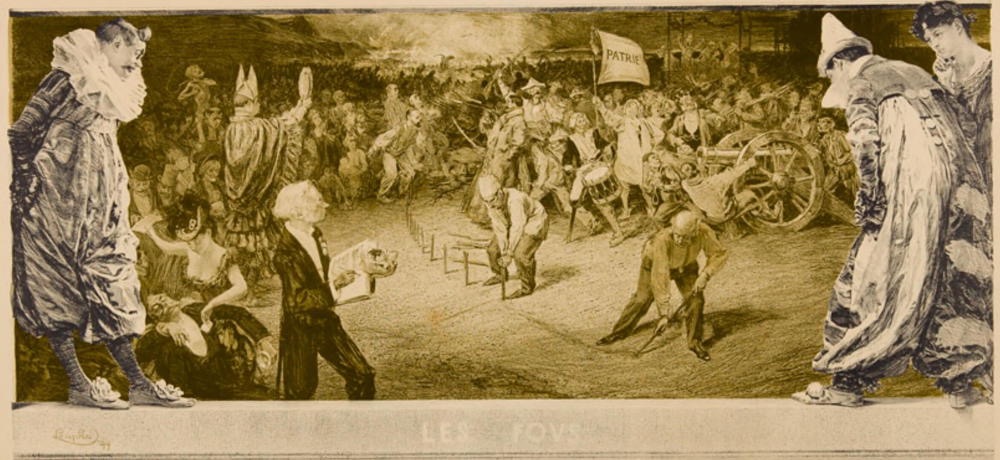
František Kupka: The Crazies (1899)
"They possess only the strangest of strange attractors."
It's never what they do to themselves or to me that bothers me so, but what I tend to do to myself in their presence. It's as if their superpower lies in compromising better angels, defying reason and logic to garble even the worst of intentions. I cannot get my reactions straight. I feel furious before I acknowledge that they cannot help themselves, that that's the crux of their disease. They cannot help themselves, and I cannot help them, either, so I'm rendered helpless. If I didn't care, this couldn't ever hurt me so much, but I can't seem to help but care. Therein lies the whole game, with me competing on both teams. I wrestle with myself, with my own damning demons, while they seem blithely unaware of the calamity surrounding them. If pressed, they always blame the innocent. If charged, they can't help but plead not guilty.
They violate underlying covenants without acknowledgement.
Weekly Writing Summary For The Week Ending 09/04/2025
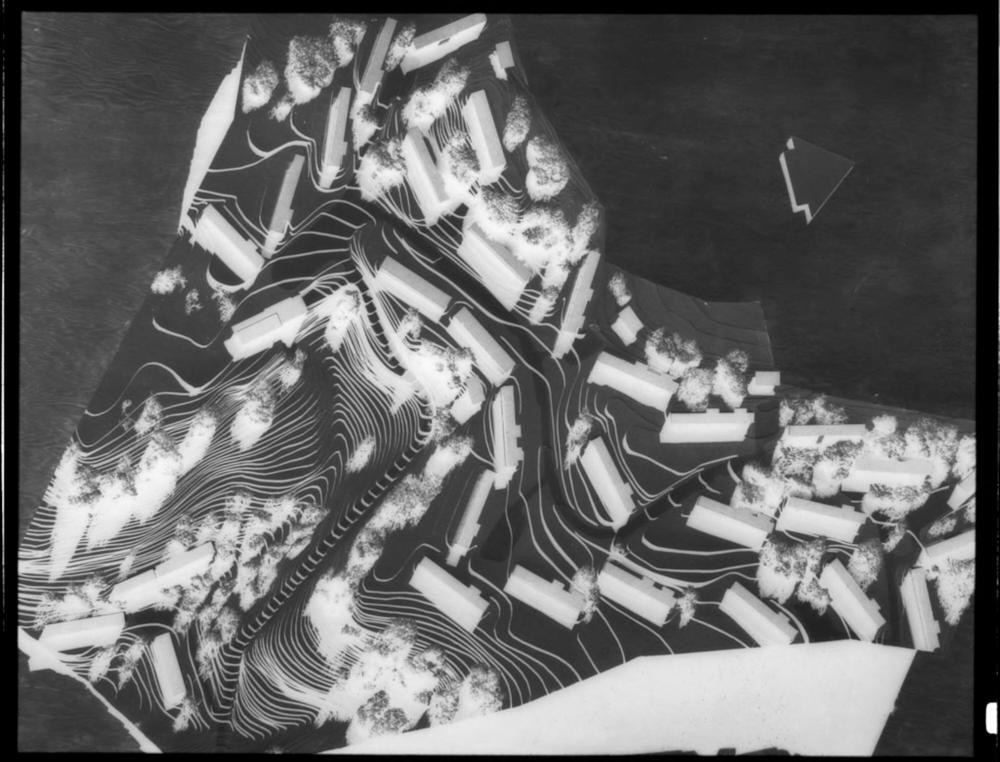
Unidentified Artist (Walter Gropius):
"Aluminum City" Housing, New Kensington, Pennsylvania, 1941-1942
(c. 1942)
Gifted Us With The Experience
One of this week's stories recounted how a U-Haul truck we'd rented broke down, stranding us at a remote truck stop along the Columbia River. It was a hundred degrees as we sat waiting for the rental company to respond to our plight. We overlooked a line of diesel pumps and an ever-shifting set of semi-trucks. Each driver in turn would use a long-handled brush to wash their windshield before pulling their rig forward and shuffling off to the sandwich shop inside. Most were dressed in cargo shorts, a short-sleeved tee shirt, and open-toed crocks, a surprising wardrobe for what I thought would seem like tough truck drivers. They looked like they'd been lounging beside a pool instead of hauling freight along the historic Oregon Trail. The Muse and I shared a pleasant afternoon watching those proceedings, occasionally wandering inside to use the restroom or stretch our legs. I'd passed this truck stop innumerable times over the years without feeling moved to stop and experience the operation. By late afternoon, we heard from a tow truck driver, learning that he'd arrive in another hour. We drove to a little roadside dive for supper. That place, too, I'd passed by for more than fifty years without ever feeling curious enough to stop. Supper was regrettable but edible. We sped home in fading light, arriving just ahead of the tow truck driver, who unloaded the rented box truck and headed out for his three-hour return trip to his garage. Our summer had been missing a breakdown, but we'd never suspected until the universe gifted us with the experience.
SecondOrderStupidity

Gregorius Fentzel:* The Three Orders of the Human Race
Alternate Title:
The Combination of Church and State to Govern the People
Series/Book Title: The Triumph of the Four Cardinal Virtues
(17th century)
*[Gregorius Fentzel was a German copperplate engraver active in Nuremberg during the mid-17th century. Few details of his life are known, and his works are primarily based on the designs of other artists, most notably the Flemish painter Maerten de Vos.]
"…acknowledging just how first-order stupid even the brightest of us can seem."
These times exhaust me. Previously, I recall reassurance as a nearly constant reminder that civilization was not crumbling around us. However, nobody needs to go to all the trouble to become a pessimist to experience a continual sense of doom stalking them now. Some insist that this sense comes from a dramatic increase in the sheer number of stupid people. Where we used to produce people capable of brilliance, we now churn out vast numbers for whom even a basic level of competence seems unattainable. Authorities cite increasingly poor performance on standardized tests as prima facie evidence of the cause of our downfall, but I disagree with these questionable authorities, for they seem to suffer from the same disease as their studies' subjects. They exhibit second-order symptoms. In this instance, they exhibit abiding ignorance about their own ignorance. The lens through which they pass judgements seems cloudy beyond their personal embarrassment, rendering them decidedly worse than merely clueless about their condition, but SecondOrderStupid.
The SecondOrderStupid cannot conceive of their own more than obvious-to-everyone-else stupidity.
HaulingAssets

Charles François Daubigny: The Heritage of the Wagon
[The Children with the Wagon] (1861)
"…The Muse isn't certain what she wants to do with the furniture the new treasures will displace."
The pioneer tradition survives with the presence of a thriving wagon-lending industry led by a cleverly-named company: U-Haul. The name suggests that you do your own hauling, much as your post-Civil War ancestors loaded up their meager belongings and hauled their assets the better part of three thousand miles to Oregon. Then, one was expected to use their own wagon. Now, it's possible to rent one for the short duration of a modern migration. Who hasn't been shanghaied into helping someone move something or engaged in some shanghaing themselves? We maintain our treasures the same way we tend to acquire them, by carting them all over creation. I remember the time when my to-be first wife and I were able to easily cram everything we owned into the back of a Volkswagen Squareback Stationwagon. That was the last move either of us ever executed that didn't involve renting some wagon.
Those who rent wagons and vans tend to be the ones least capable of handling them.
Homes

Arthur Rothstein:
Home of Postmaster Brown, Old Rag, Virginia (1935)
"Every past inhabits just such a shadow visible when any prior owner drives past."
For me, home has not always been where my heart lives. It has been a place where I could usually rely on finding a clean pair of underwear and a decent breakfast. I considered most of those Homes, twenty-three by my accounting, safe haven for a spell, if not always necessarily comfortable. They included temporary housing when my life was in transition, and permanent housing that ultimately ended up being temporary. Duration of residence seems to have made little difference in how deeply or whether I permanently imprinted on the least of those places, for I imprinted on each and every one in turn. I must have always been a homebody at heart, a heart each home would eventually wound if not necessarily break. I still consider every place I ever lived "my home," even if I haven't set snoot or foot across its threshold in more than fifty years.
I'm one to want to at least drive by the place, only to not immediately recognize it, what with all the changes it has undergone in my absence.
Bagging
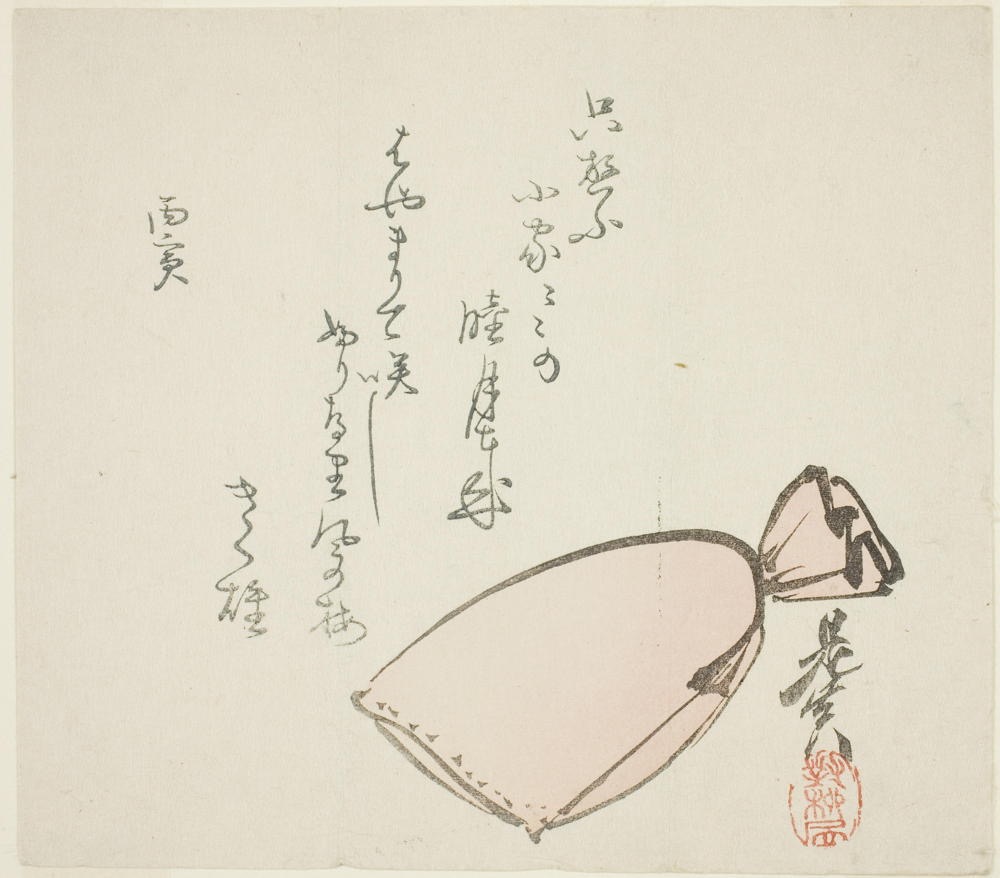
Shibata Zeshin: A bag (1866)
"…the world sure seemed to be her oyster."
I might be most skilled at creating complications for myself. This tendency never seems more present than when one of my grandchildren's birthdays approaches. Then, I feel compelled to live up to a little tradition of my own making, one that complicates what I might otherwise approach as a genuine celebration. (I reliably transform this opportunity into an obligation, and not just any odd old one, either, but a genuinely impossible-to-fulfill one.) Where I might have penned a small, short poem to the celebrant, tradition calls for a full-blown Bag Poem. A Bag Poem typically covers both sides of a paper shopping bag and runs three or four stanzas.
I never know where to start, though I have more than a decade of experience creating these.
Contemplation

Giuseppe Longhi:
Mediterende filosoof [Meditating philosopher] (1776-1831)
Old man (philosopher) sitting in front of the window, in a dark room, with a spiral staircase on the right. The light falls in through an arc-shaped window on his open book. On the right, a servant tending the fire.
"I feel wealthy beyond all reason."
I am contemplative by nature. I spend nearly three-quarters of an hour meditating every day, half in the morning and the balance in the afternoon. I have maintained this routine for more than fifty years, rarely missing a session, for I consider my Contemplation to be my sole competitive advantage, even though my practice never was in any way a competition. (Though I do find the concept of competitive meditation hillarious!) I consider my practice advantageous because I believe it enables me to be, like punctuation enables a coherent sentence to exist. A deliberate stopping for a few minutes seems to pay deep respect for momentum, acknowledging that it never comes from nothing and can be easily over-used if not doled our deliberately. It enables me to be something other than an outlet for kenetic energy, to slow down and perhaps better see the soup I swim through.
I hold the purpose of my Contemplation to be a necessary purposelessness.
ReStart
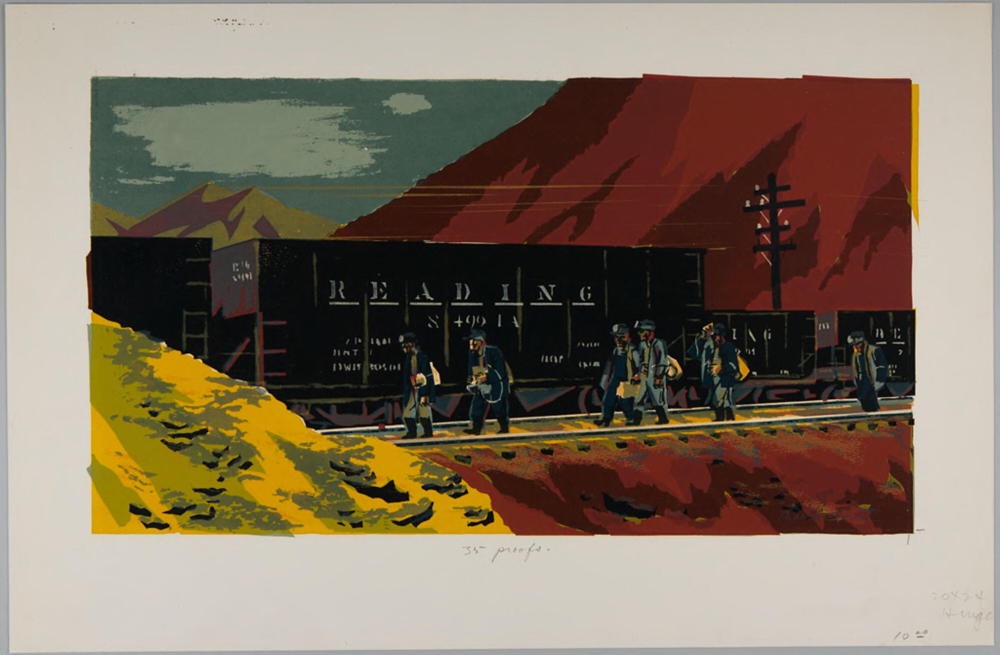
Charles Frederick Keller: Swing Shift (1940)
"I intend to watch."
Our Never-ending Porch Remodeling Project entered a new phase yesterday. In many ways, the effort was ReStart after an extended suspension, though one remote carpenter, our painter, and I had been busy over the summer, even if our chief contractor and carpenter hadn't been. The crew and I had been busy fabricating and painting porch railing pieces, which might not seem like much until you see the detailed design documents. The Muse designed these railings, which represent a melding of key elements from century-old porch railing designs she discovered while researching the history of porch railings. Her design includes passive elements to prevent water from pooling on either the top or bottom rail, as well as elements such as height, which have long fallen out of fashion, if not building codes.
The balusters required twelve separate steps to fabricate, and The Muse decided their spacing, again, based upon her extensive research into the history of baluster placement.
Weekly Writing Summary For The Week Ending 08/28/2025

Claude Monet: The Petite Creuse River (1889)
Decency Insists
I have lost interest in what passes for political news because it no longer contains anything remotely political. It's become spectacle instead, meaningless noise and uproar for the sole purpose of distracting. It has become an enormous distraction. The incumbent will neither become more competent because of it nor less guilty of anything. Yes, he's very likely guilty of everything he's been accused of, just as he always was. The Bill of Particulars already holds enough indictable accusations to impeach him fifty times over. The "geniuses" he hired to administer have steadfastly betrayed their publics. He's run out of criminals to deport, so he's replaced them with innocent citizens. No, he's not dismantling our system; he's only misusing it. The system he seeks to destroy was never as he imagined it. It featured laws and justice and experts, sure, but it depended most upon the decency of the American people, and he’s offended that decency, deeply so. The Third Rail of American Politics was never merely "The Economy, Stupid," but the price of ordinary things. Joe Six-Pack is now a five-packer, heading to four. Two hundred and fifty years ago, decency was measured in tea, and threatening that single ritual resulted in a memorable party given by those who would later be counted as patriots. For want of a cold one, a tyranny might well be lost. Decency insists.
LongHotDry
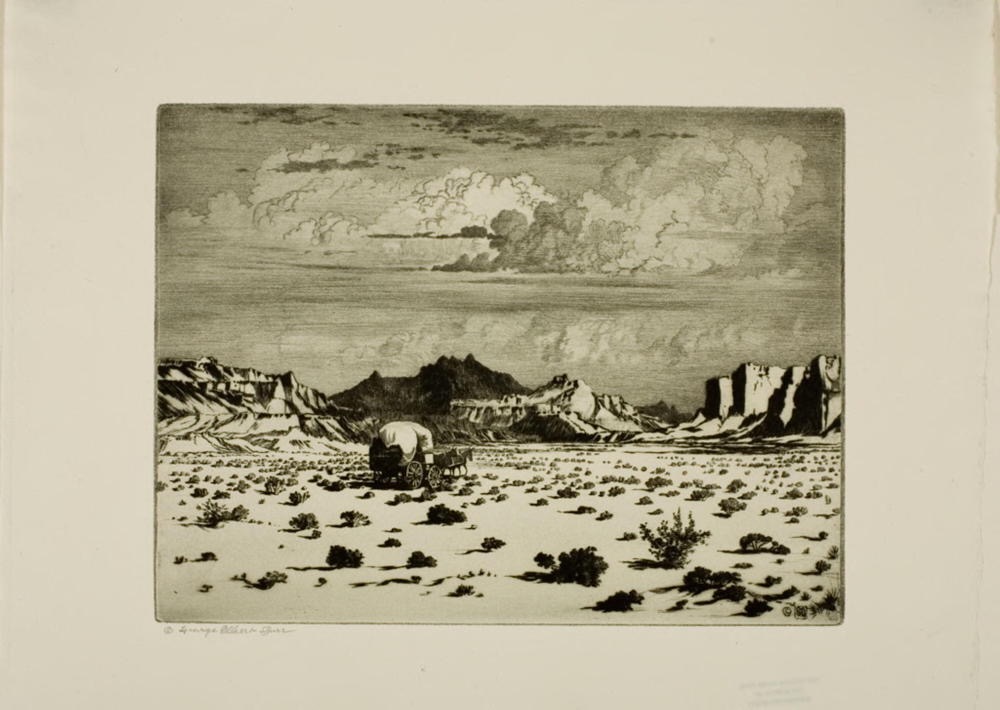
George Elbert Burr: The Desert (19th-20th century)
"…its presence always seems unreasonable, but only because it is."
The center of my universe sits squarely in desert, though it claims to be a place of many waters. What was once a place of many waters has become a place of contested waters, as competing interests and a historically dry summer have left our river and streams barely trickling. Furthermore, the weather has seemed unrelenting, with very little moisture and extreme heat punishing even the more hopeful gardeners. I water reluctantly. What should be a pleasure becomes toil. What was supposed to be toil becomes all but impossible. It's too hot to even think about going outside some days and far to hot to imagine accomplishing anything out there, anyway.
In here seems little better as closed windows come to feel as confining as jail bars.
Septuagenarian
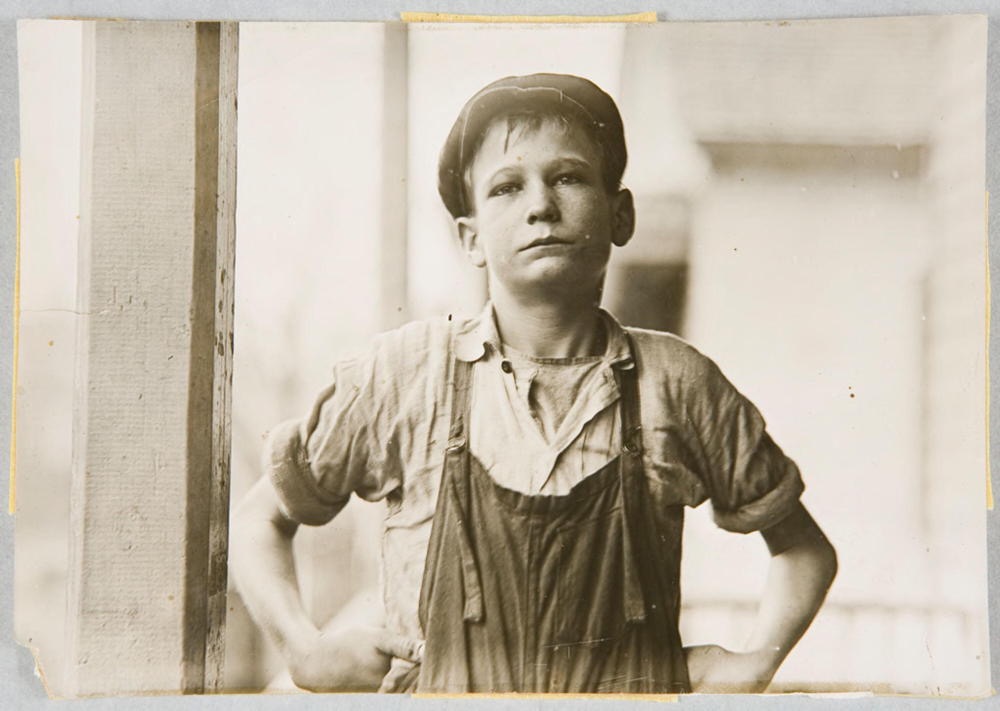
Lewis Wickes Hine: Untitled [Furman Owens, 12-year-old mill worker,
Augusta, Georgia] (1909, printed 1929)
"…wondering what this Septuagenarian should do for a next adventure."
I have just lately started realizing that I am actually over seventy years old, a genuine Septuagenarian. No job description accompanied this designation, and I could not discern any clear delineation that accompanied the transition into it. I continued as I had seemingly always done, though changes had been steadily encroaching on my habits. A decade ago, before I'd even turned sixty-five, I took no prescribed medications. Sure, my triglycerides were alarmingly high, but I lied to myself that I got a bye because I had inherited the condition, just as if everyone else with it somehow hadn't. I hadn't even experienced cataract surgery back then, as I was still a relative spring chicken. Then I inexplicably began aging.
The cataract surgery began the upward spiral for me.
Third_World
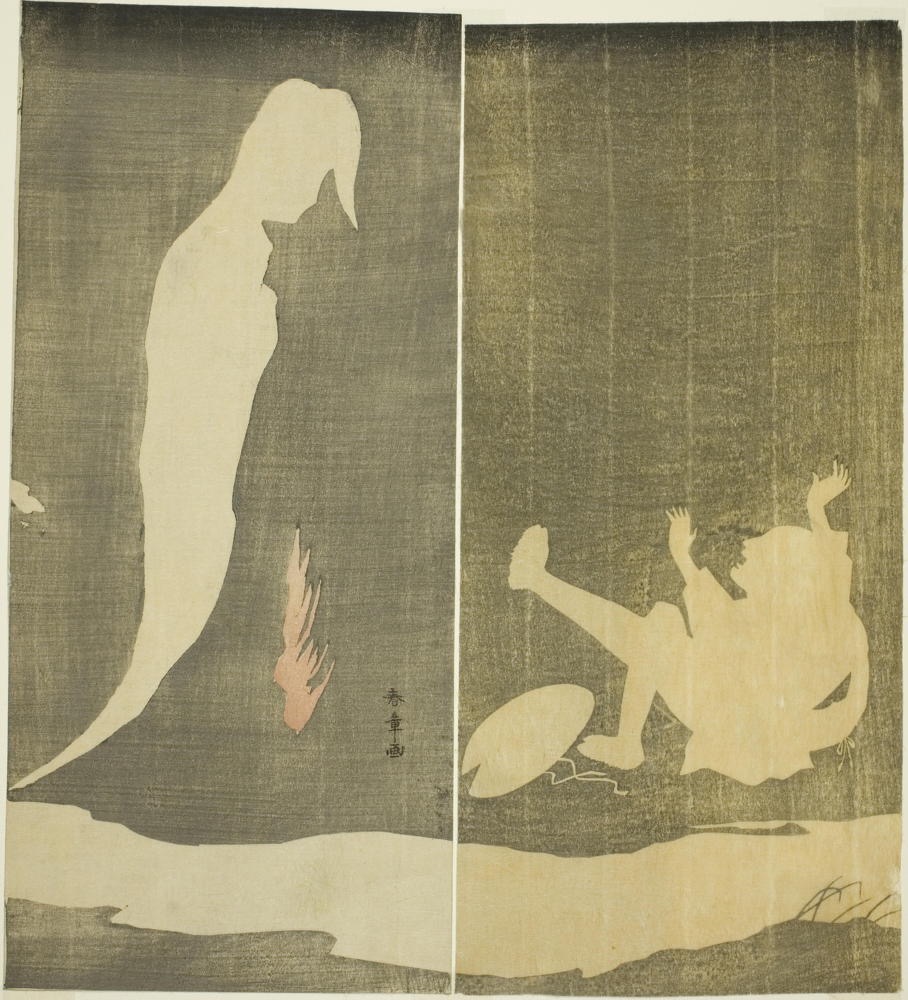
Katsukawa Shunsho 勝川 春章: Man Falling Backward,
Startled by a Woman’s Ghost over a River (c. 1782)
"Did I mention that beer prices have increased by about twenty percent in the last hundred days? "
I wondered what it might be like to live in the Third_World, though I never felt any need to try to experience it. I felt fortunate that I was born in a place and time where I'd not have to cope with those humiliations. I felt no intimation that my nation might one day choose to join the ranks of the steadfastly downwardly mobile, yet here we are, guided by a self-proclaimed billionaire into despair. The price of beer has increased about twenty percent since he took office because he's so ignorant about international trade. He slaps a tariff on aluminum because we use more than our trading partner, this to encourage domestic production of a mineral of which only others have adequate deposits to support an industry. Similar idiocies abound.
Essential services have become optional, often unavailable at any price.
FalsePretenses

Jan Sadeler I: The False Shepherd (c. 1575)
"There never were any other options."
I was reminded again yesterday, while reviewing a justification statement for a USDA Forest Service project in our watershed, how projects tend to start. They virtually never begin with a full disclosure of conditions and intentions, for revealing those details could only confuse what the author hoped might be a straightforward process of receiving approval of their proposal and consequent funding. Anyone might understand that one must pick and choose rather carefully lest too much disclosure encourage an unresolvable mess. Certain aspects of the effort naturally get underplayed, while others become overemphasized. There's rarely any safety in the middle ground, either, for funding authorities require a relatively simple story with clear objectives, heroes, and villains. The result won't precisely be filed under the category of fiction, though it might just as well have been.
Anyone opposing such an initiative always faces numerous potential disqualifications.
BetweenTimes

Ben Shahn: Untitled (Cherry Street, New York City) (1933-1935)
"…napping fitfully."
The Muse and I returned from our latest toodle to enter into BetweenTimes. We sufficiently disrupted the rhythms that ruled our schedules before we left that we could not merely slip back under their influence. The cats distrust us now, with Max the most vocal. He refuses to leave my side, crying whenever I slip into an adjoining room or outside for a minute. He shows up frantic, seeming to plead for my continued presence. Molly shows her displeasure in other ways but also seems flummoxed, though no more flummoxed than The Muse and I seem.
The convenience of being in one place for an extended time seemed most attractive when we were travelling.
Seventy

Sebald Beham:
Moon: plate seven from The Seven Planets with the Zodiacs (1539)
"She will say in ten thousand subtle ways which game we play today."
The Muse turns Seventy today. This long-awaited milestone must mean something and should by all rights be portentous. Seventy has traditionally marked the boundary between middle and ever-encroaching old age, after which, like wearing white dresses after Labor Day, one does not do a whole raft of things, such as wearing Spandex in public. Her time has passed for dalliances. She should be exclusively engaged in serious business, and is and has been. Unlike most who achieve this milestone, The Muse seems to be in the prime of her life and still growing. She certainly seems to be enjoying herself, fulfilling the role of Port Commissioner and taking piano lessons alongside schoolchildren, even performing at public recitals. She still behaves as if she's ageless or timeless or both.
The Muse turns Seventy today, and I find myself at a loss to say anything in any way profound.
Weekly Writing Summary For The Week Ending 08/21/2025

Daniel Hopfer, I: The Bacchanal with a Wine Vat (c. 1515-1530)
All The Usual Plotlines
I claim to live near the center of the universe, overlooking, if not quite inhabiting, it. Leaving never fails to reconvince me just how right this observation seems, for I have yet to encounter a more perfect place, even with all of its obvious blemishes. I reflected this writing week on how I could not have possibly become who and what I am had I been born in any other place or time. The towns we passed through on our toodle to and back from the Midwest clearly showed poorly when compared to where we started, where we knew we were headed at the end of our excursion. In this way, The Muse and I find travel to be enormously reassuring. We are not seeking another new beginning or a second or third-handed fresh start. We know where we belong and feel supremely fortunate for that place to have found us. We returned to find the self-same problems we temporarily abandoned. The sprinklers didn't quite reach as well as we'd assumed they might. Something's fishy about the pond fountain pump. All the usual plotlines reawakened when we crossed our threshold again, thank heavens.
GhostCow
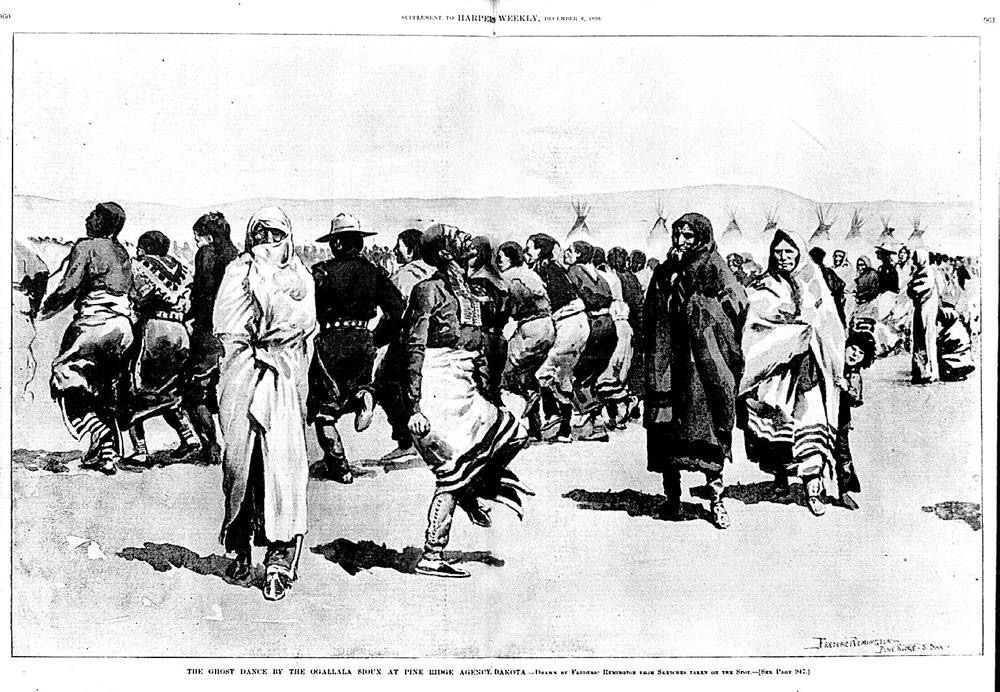
Frederic Remington: The Ghost Dance of 1889–1891,
depicting the Oglala at Pine Ridge Indian Reservation in South Dakota, (1890)
"…May the GhostCow continue bellowing."
As The Muse and I have traveled on this epic toodle, we have been noticing the various states of this still tenuous union. We have found unsettling realities prominently displayed alongside the various myths of our American past. We were much more optimistic a hundred years ago, even more so a hundred and fifty. We built to dreams rather than to spec, and though the bulk of those dreams ultimately crashed and burned, we seem to have learned little from those experiences, other than to venerate our ancestors. We don't believe for a second that we might be capable of epic undertakings, as they did. We don't believe that the majority can succeed, and we hold this belief to be self-evident. We try hard to keep the playing field anything but level just as if our children and grandchildren posed an existential threat to us and our once-hallowed way of life.
Kellogg, Idaho, is the home of the Bunker Hill Mine.
FourMoose

John Woodhouse Audubon:
Servus alces, Moose Deer. Old male & young (1845-48)
From: The viviparous quadrupeds of North America
Rare Book Division, The New York Public Library. "Servus alces, Moose Deer. Old male & young." New York Public Library Digital Collections. Accessed August 20, 2025. https://digitalcollections.nypl.org/items/38998bd0-c6bd-012f-2ebf-58d385a7bc34
"I will remain satisfied having recalibrated the meaning of a truly happy birthday celebration."
My birthday brought a flood of well-wishes exhorting me to have the best birthday ever. (Thanks to each and every sender!) I'm uncertain if it stands in anyone's power to bestow a perfect birthday on anyone, especially themselves, but I took the wishes with the spirit in which they were given and set about doing my level best to celebrate a happy, if not ecstatic, one. It helped that The Muse and I were mid-toodle, not quite halfway home from some serious roaming. Novelty must be one of the better ways to ensure happiness, for discovery seems to be the sole essential element of true joy for me. I've already done every one of the more traditional and predictable sorts of birthday celebrations: cake, ice cream, party, presents. None of these elements seemed very likely to emerge from my context this year.
We were near Devil's Tower, in the Black Hills region of Eastern Wyoming, so we began my birthday celebration by circumnavigating that remarkable edifice.
SeventyFour

The Bighorn Medicine Wheel (2011)
The rock circle is about 80 feet in diameter, with 28 'spokes' radiating from a central cairn, five cairns around the rim, and a sixth slightly outside the perimeter.
US Forest Service photo.
"We dare not ever insist upon sticking to the plan."
On the occasion of my seventy-fourth birthday today, The Muse and I plan to visit the Bighorn Medicine Wheel, a Plains Indian artifact and sacred site located high in Wyoming's Bighorn Mountains, just south of the Montana border. This location could not be less convenient, for it seems well off every well-beaten path. Still, The Muse and I have been wanting to visit this place, and it seems fitting that it becomes the object of my birthday celebration.
We are toodling home from a family function in South Dakota, where The Muse was raised.
OldFolks

Henri Koetser: We Grow Old (c. 1900 - c. 1905)
"Not one of us seems to be getting any younger…"
The Muse has always visited her OldFolks when returning to her home country. Her family took the biblical ‘Be Fruitful and Multiply’ exponentially, so there was never any shortage of OldFolks to visit. When we first connected decades ago, there were more than a dozen surviving aunts and uncles, not to mention innumerable cousins, for each aunt and uncle seemed to have left behind at least five children. The Muse could remember all those kids’ names, in birth order, too, as well as odd anecdotes about each family: where they lived and how. I had an odd uncle and aunt, both my dad's step-siblings from different remarriages, but The Muse had an almost intact history.
She would find her way over to visit them in the way that they would have visited in their time.
FairToMiddling

Ben Shahn: Untitled [county fair, central Ohio] (August 1938)
"…some vestigal and rarely-recognized part of me."
Few institutions better typify rural American civilization than the county fair. It was there when my grandfather was a youth, and it has somehow survived well into this post-truth era, though not in any way intact. In my youth, it was an absolutely must-attend affair, one for which schools closed two days after opening so students could attend the opening on Friday, so-called Kids' Day. The farm kids entered competitions to see who'd raised the handsomest chickens, and we townies would attend with friends to haunt the midway and vomit our obligatory corn dog when riding the Tilt-A-Whirl. Later, we'd meet up with a girl and squire her around the place as if we owned it, which, in some ways, we did. I'd wear a paper Rossilini for Governor visor and feel every bit the fully-fledged responsible citizen.
When The Muse was coming up, she entered sewing projects in her fair and garnered purple ribbons, signifying the best.
Entrancing

Lewis Wickes Hine: Italian Family, Chicago (1910)
"Then the subtle and purposeful passion play commences."
A toodle turns utterly different once the toodlers drop in to visit family. At every other stop, our heroes remain the very soul of themselves: reasonable, mature, and experienced. Drop them into a family context, though, and they take on distinctly different forms. Roles they learned decades before resurrect themselves and start playing out in real time before them. The Muse becomes Aunt Amy, and I can't help but become the long-lost Uncle David. The family members we interact with, too, dutifully assume the roles they learned through iteration when they didn't realize they were learning anything, even though nearly thirty years might have passed since we first studied for our original parts. It almost seems not a moment has passed since that first performance, for there it is playing out right in front of us.
A little (or a lot) of effort might bring the performance to consciousness and allow an actor to intervene authentically, to somehow break the role and be there as they are now, rather than how they learned to be then.
Weekly Writing Summary For The Week Ending 08/14/2025
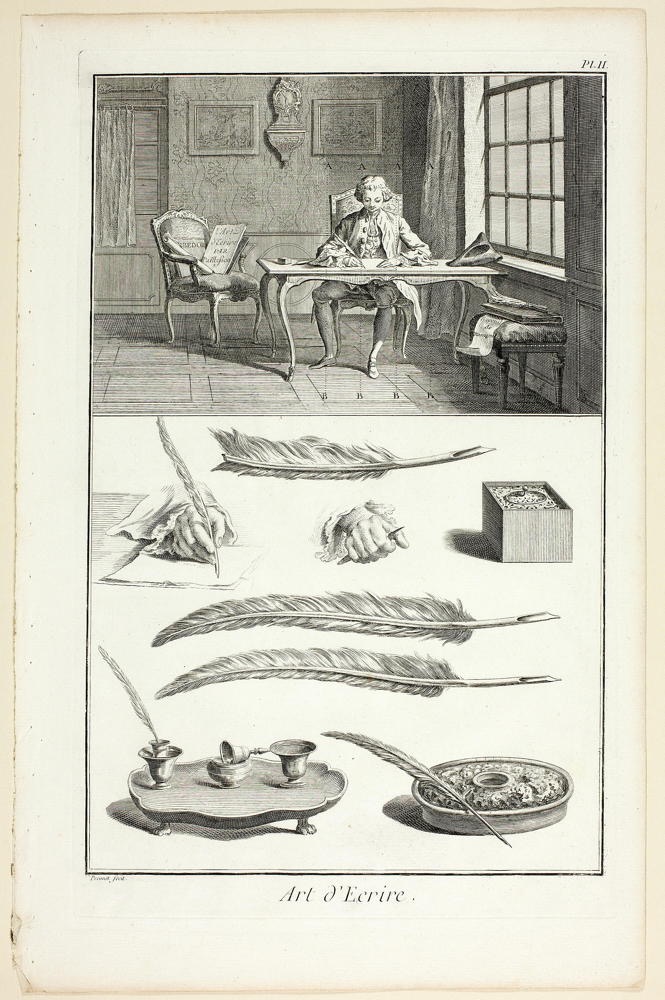
Benoît-Louis Prévost: Art of Writing, from Encyclopédie (1760)
For Your Interest
I this week made a radical change to my long-established Weekly Writing Summary template. I'd long felt as though I wasn't so much offering a writing summary as an index with which my readers could access the original stories. The summaries, such as they were, didn't summarize very much. This week, while traveling outside my usual box, I experimented with AI, to see if I could appreciate its summarizing ability. I asked it (Grammerly) to summarize one of my stories. I received, after about a second of processing, a crisp and wholly acceptable summary of the story. I was blown away.
I decided to experiment with this facility, wrestling only slightly with the ethical implications of this decision.
Rx
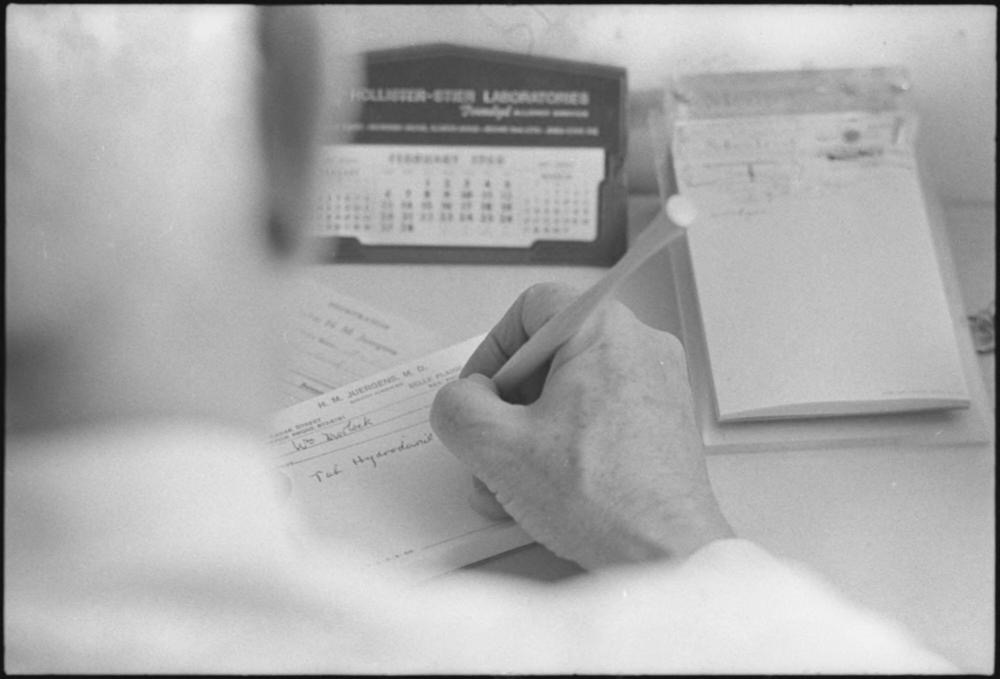
Gordon W. Gahan:
Untitled [Dr. Herman M. Juergens writing prescription] (1965-1968)
"Imagine how fortunate I feel to have been able to barter for a few of those…"
When Roading, the most memorable experiences arise not from planned activities but from inadvertencies: a wrong turn onto a road never intended to be taken, a whim, an obvious mistake. These are the fuel from which the most epic stories emerge and the greatest lessons are taken. If one believes in predestination, it might be easier to insist that some wiser hand guides these, that somebody 'out there' was deliberately teaching you precisely the lesson you most needed exposure to, but these seem more likely random occurrences, with meanings self-imposed, however otherwise profound and unlikely they might seem.
A single degree change in intended trajectory results in a dramatically different destination.
Roading

Hall Thorpe: Home (c. 1919)
"Life continues even when the protagonists are off Roading."
Traveling demands a different governing ethic than home ever does. At home, a certain level of control seems possible that traveling renders unlikely. Different comforts satisfy there, too, with novelty and unfamiliarity replacing comforting routine and predictability. For sure, I find traveling enticing, so much so that I have grown to avoid its seduction, insisting that I have pressing business keeping me in my place at home. I contend that I've found my center, and leaving throws me off that balance. I even feign pressing business that might otherwise remain easily deferrable, attempting to deflect the old seduction Roading resurrects. I was once what might have passed as a road warrior, so familiar with airplane schedules that I never had to look them up, gone more than I ever came back.
As with most seductions, I eventually awakened from that dream, however enticing it continued to seem.
HistoryLesson

Arthur Rothstein: Street in Butte, Montana (1939)
Farm Security Administration Photographs
The Miriam and Ira D. Wallach Division of Art, Prints and Photographs: Photography Collection, The New York Public Library. "Street in Butte, Montana" The New York Public Library Digital Collections. https://digitalcollections.nypl.org/items/32c50bd0-059b-0138-0ab0-4f25bfb71a96
—
"…he very best portrait of our American Dream, and one hell of a HistoryLesson."
The history of the American West comes deeply steeped in myth, though even deeper truths become apparent with any visit. This remains a rough and relatively wild place, with poverty its most obvious characteristic. Small towns tend toward something other than the idyllic. The few cities seem displaced and still largely experimental. The highways connecting places seem mostly empty and in need of considerable repair. The scenery remains breath-taking, even daunting. Those who live there still struggle to survive, let alone thrive, for the economy remains securely stuck in some prior century the inhabitants seem quick to defend. HistoryLessons seem perhaps more apparent to visitors than to residents, who have been the serial victims of many previous attempts to prosper.
Relatively desperate people settled the American West, people fleeing almost certain ruin on the prospect that they might get lucky, or luckier than their birthright alone proved.
DerelictBarns
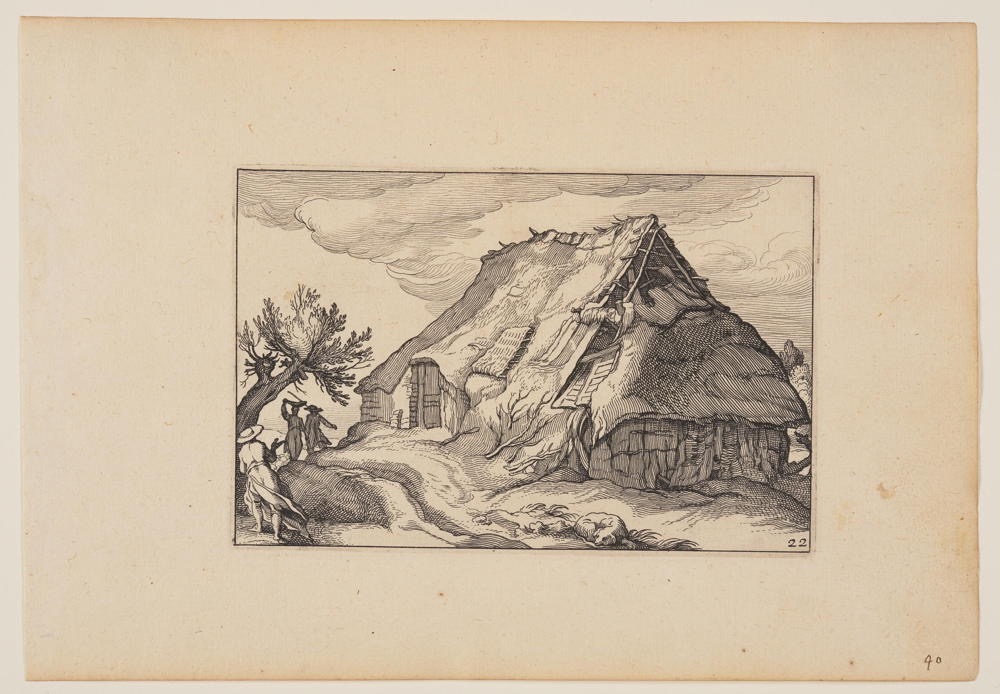
Claes Jansz Visscher: A Barn, from Landscapes
[Verscheyden aerdige Lanthuysen…] (1620)
"…as our history continues disappearing around us."
I worry some about what will become of the DerelictBarns I have known through my life, for I have grown to rely upon them, and I fear my grandchildren and great-grandchildren might never know they existed. Nobody seems to be building new cathedrals to their critters and hay. Most farmers opt for aluminum pole buildings these days. Back in the day, by which I refer to times long before mine, self-respecting farmers might erect a barn intended to weather the ages, massive edifices with stone foundations and fluted roofs. These proclaimed a deep faith in the future and self-esteem the likes of which seem ever rarer these days.
For me, a townie, DerelictBarns held history that utterly fascinated me.
On_Liberty

Irving S. Underhill (possibly): Statue of Liberty, New York (c. 1928)
"…to never be the same again. Period."
I woke this morning to find myself temporarily off my usual duty. In Navy parlance, this state renders me On_Liberty. I haven't mustered out, and I still retain my responsibilities, though they have been suspended for a limited time so that I might pursue other interests. Somebody else fed my cats last night, a daily responsibility I take most seriously, and they also fed my pond fish. The Muse rigged up water timers and sprinklers to accomplish what I would usually take full responsibility for fulfilling. I left Kurt, our painter, in charge of the never-ending porch refurbishment, and Linda Sue, our longtime friend and house cleaner, in charge of the house. I did not begin yesterday evening crouching around picking up over-ripe apricots I couldn't reach when harvesting that had finally given up and smashed themselves on the driveway. I didn't even cook my own supper, for I was On_Liberty.
My nephew, who served a stint in the Navy, though I didn't, explained to me that most seamen waste what little liberty they get.
Unaiming
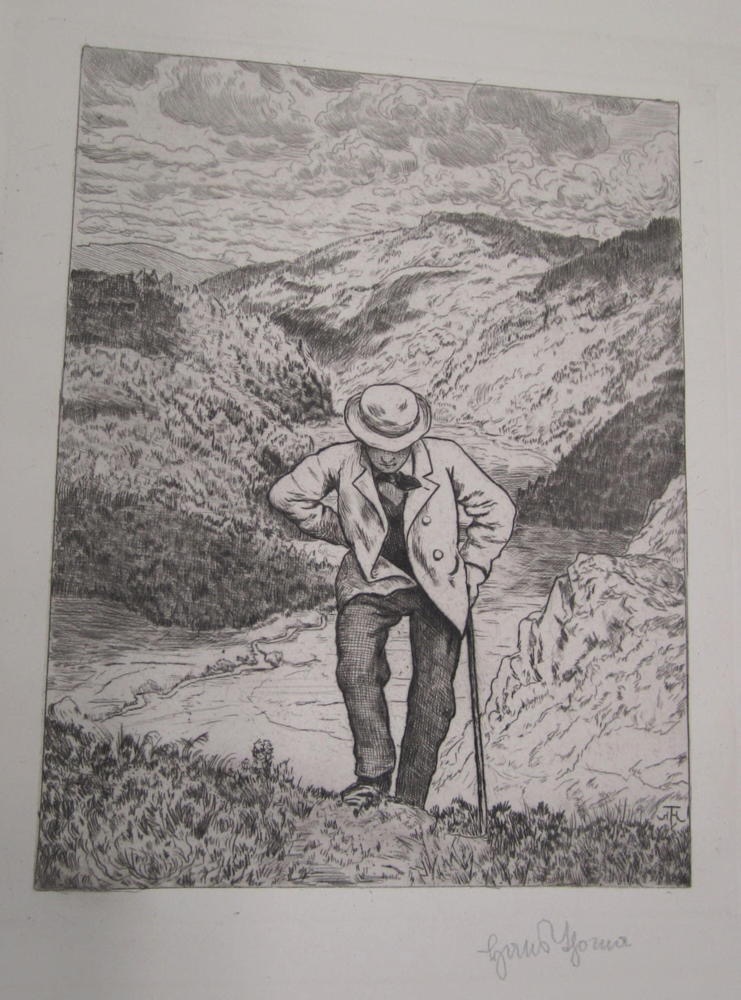
Hans Thoma: The Wanderer [Der Wanderer] (1903)
"I will not have heard the news because I wouldn't have been listening for it."
I had become too focused, too purposeful, and so had The Muse, whose role as Port Commissioner often seemed all-consuming. We'd start our days by syncing schedules and end them with a late supper. I would rise ever earlier, and she'd come to bed seemingly ever-later, sometimes not quite asleep yet when my alarm was going off. Life can become all-consuming, more obligatory and predatory than freeing and renewing; hamster wheels with vaunted purposes; debts incurred solely to achieve leverage.
We went around and around to reach an agreement on the terms of our disengagement, for engagement had become addictive, enlarging responsibilities into imperatives.
Weekly Writing Summary For The Week Ending 08/07/2025
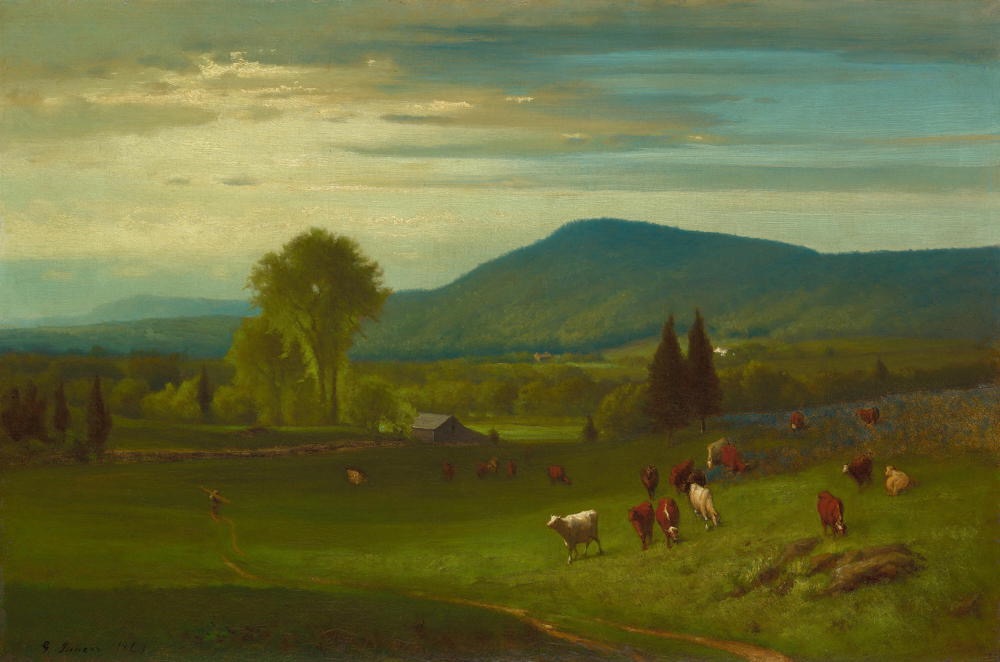
George Inness: Summer in the Catskills (1867)
Aching To Feel Aimless Again
Each day seems to bring another insult, a fresh example of waste, fraud, and/or abuse. Our incumbent has amply proven himself to be a first-class nincompoop who cannot seem to act according to his own oath of office. He possesses no honor, class, or intelligence. He seems to believe he's above accountability. I keep adding fresh items to his eventual Bill of Particulars, the list of grievous offenses he will one day be charged with when he's finally impeached. He's such a delicate damned flower, unable to handle the truth about anything. He and his minions have created a fictional administration Hell-bent on undermining civilization in favor of a Confederacy of absolute dunces. I bring up all these obvious points that don't really need recounting to admit that I'm weary of it. It doesn't seem like drama. I cannot seem to suspend my gape-mouthed disbelief when each previously unimaginable insult to my morals and my intelligence appears on another front page. I'm suffering from some degree of depression, if only because these days seem so doggone depressive. My optimism often calls in sick. My usual enthusiasm wants a nap. My digestive system barks at me about whatever I consume. I need a change of venue. I've been daydreaming of visiting France and Italy, where sunny days nudged us to ramble aimlessly and fruitfully. I ache to feel aimless again. Over the next two weeks, the Muse and I will be toodling. I will be checking in from presently unknowable locations.
PreppingForEternity
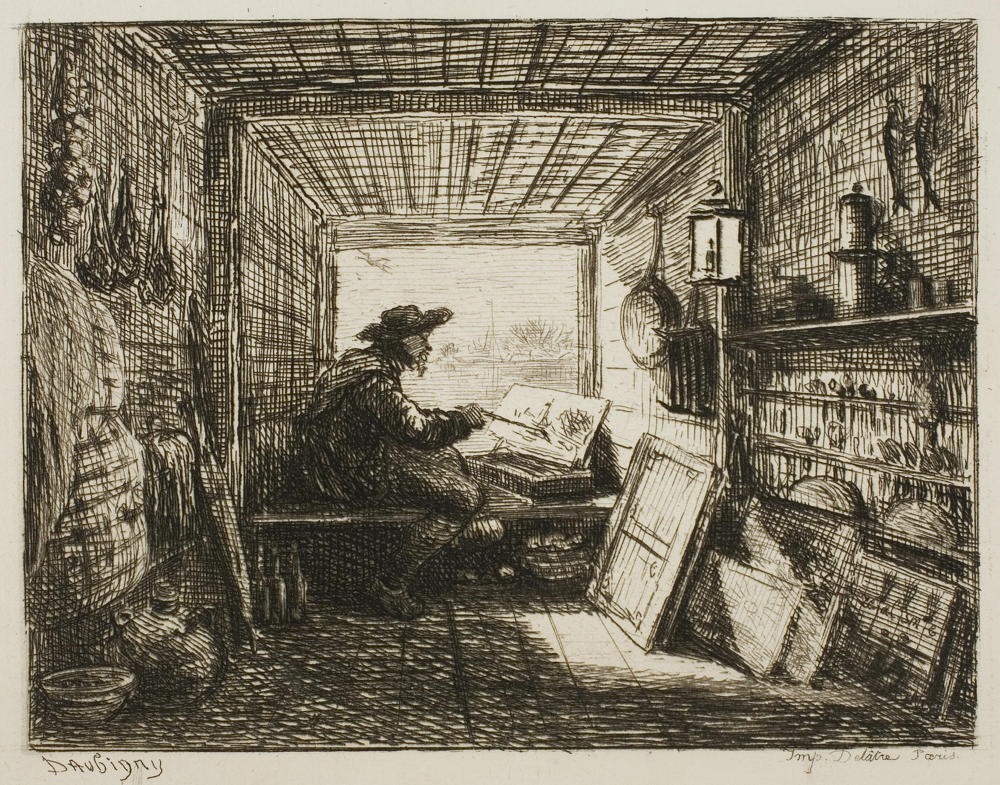
Charles François Daubigny: The Boat Studio, from The Boat Trip (1861)
ABOUT THIS ARTWORK
In order to paint the river landscape scenes that accorded so well with his temperament and taste, Daubigny decided to build a floating studio that could be positioned to afford the best points of view and to capture the varied effects of natural light. The etchings that resulted in the series “The Boat Trip” are an early example of the plein-air aesthetic, a practice of working outdoors that the Impressionists would wholeheartedly embrace.
——
"I'll just witness the final installation."
Even the idea of being away from The Villa for more than a week unsettles me. The Muse wisely suggests we refer to it as a road trip rather than as a vacation, and to the extent that such a second-order reframing soothes me, this works! I will not undertake this excursion as if it were a reward for diligently working, but as a much more pedestrian toodle a little further afield than usual. To maintain this illusion, we plan to avoid driving on freeways. The Muse was raised just south of US Highway 12 in NE South Dakota. I was raised just south of the same highway in SE Washington State. Between these two locations lies what now amounts to an ancient route across Montana and South Dakota, one trucks abandoned in favor of the Interstates. Twelve hundred and fifty miles of two-lane blacktop: small towns, scenery, and, with luck, some sanity.
Preparing to leave remains a challenge.
UnderGawd
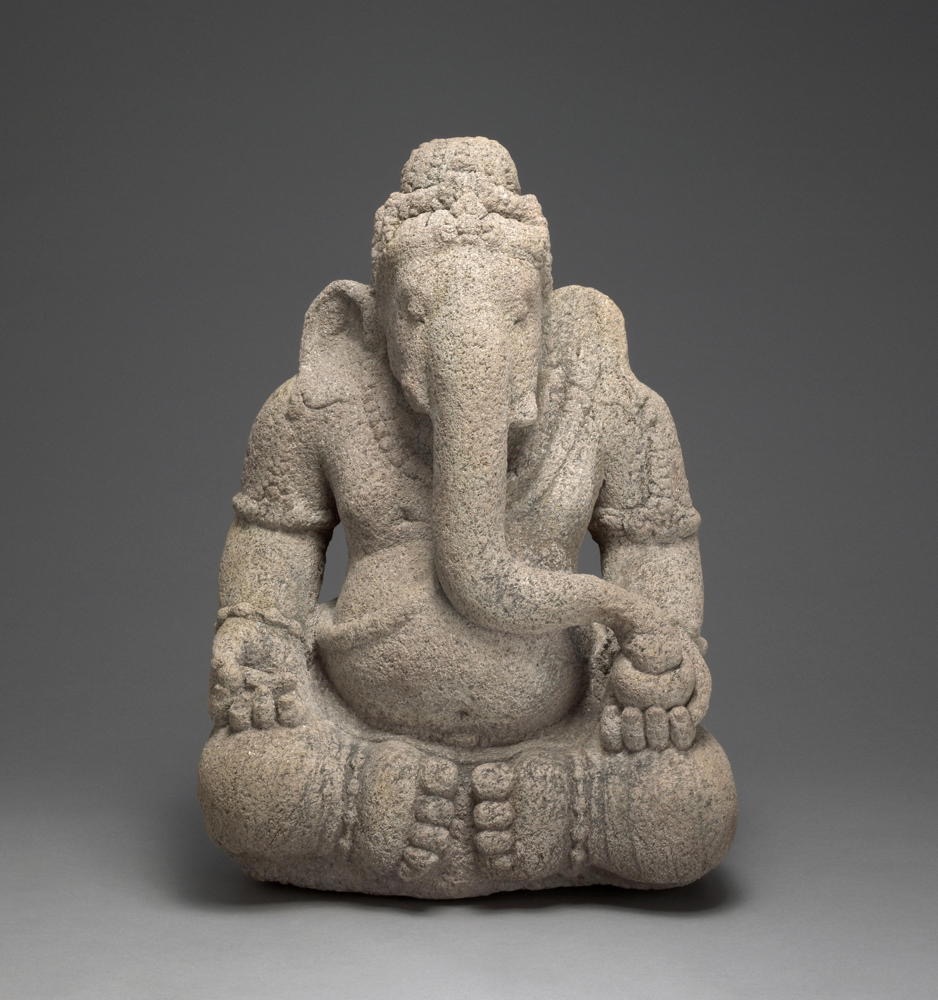
Unknown Indonesian artist from Central Java:
God Ganesha, Remover of Obstacles (9th/10th century)
"…no enforcement mechanism other than the usual tacit coercion has yet been codified into statute. Yet."
Perhaps the definitive element of American citizenship lies in its relationship to God. (I've thoughtfully included a picture of a prominent god above, the Hindu god Ganesha, Remover of Obstacles so that we can share a visual example of a prominent god.) "Real" Americans believe themselves to operate "Under God," as stated in the amended Pledge of Allegiance to our flag. The author of the pledge originally proposed it as an antidote to the influence of immigration from Southern Europe, which was popularly believed to be threatening to dilute genuine American values. He intended schoolchildren to recite it, and it contained no mention of God.
The Federal Government standardized the pledge during WWII, but it still held no reference to God.
MsCommunication
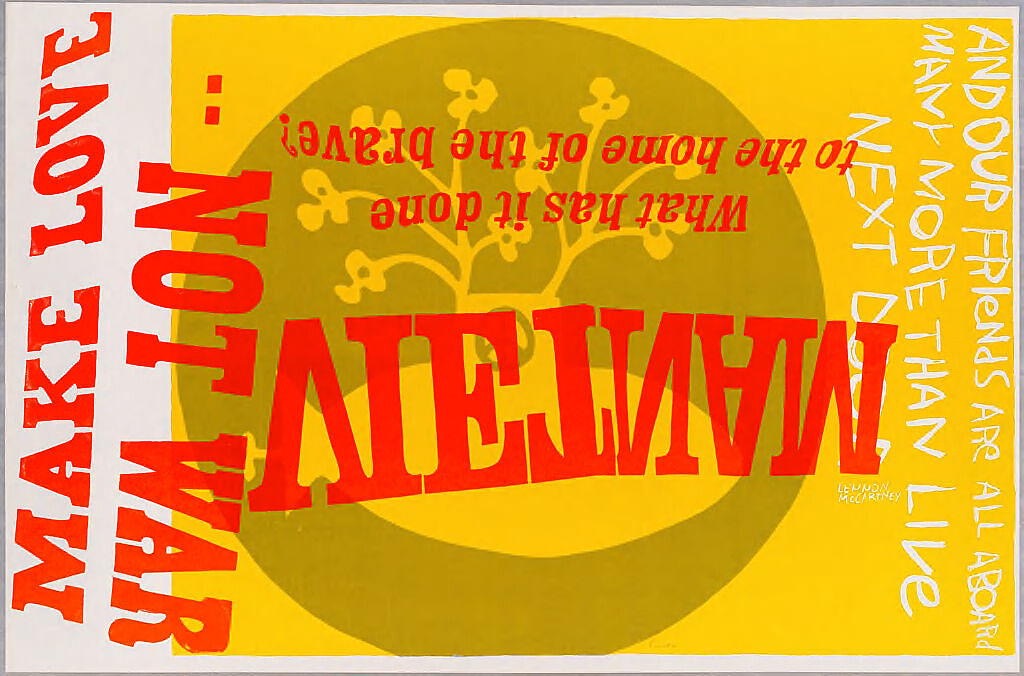
Corita Kent (Sister Mary Corita): yellow submarine (1967)
Inscriptions and Marks
Signed: l.c. in black ink (ball point): Corita
inscription: Printed quote reads: MAKE LOVE NOT WAR / VIETNAM / What has it done to the home of the brave? AND OUR FRIENDS ARE ALL ABOARD MANY MORE THAN LIVE NEXT DOOR Lennon McCartney
-Harvard Art Museums/Fogg Museum, Margaret Fisher Fund
-© Courtesy of the Corita Art Center, Immaculate Heart Community, Los Angeles / Artists Rights Society (ARS), New York
"Vacation is the final stage of denial."
Anyone who has attempted to commit a long-term relationship can attest to an occasional communication problem made more difficult by the anesthesia relationships induce. After a decade or two, even the more self-aware seem likely to persuade themselves that they understand what they could never understand. Long proximity bestows no immunity against misunderstanding. It might even render those infrequent occurrences just that much more insidious. The watchman dozes. One might even convince oneself that one can disclose anything without fear of offending, that one's partner represents a bottomless well of understanding. This could never have been the case, though, for regardless of the length or depth of a relationship, the partners remain different people and prone to the occasional bout of serious MsCommunication.
I was never one to subscribe to the notion that women are from Venus and men hail from Mars, though I suspect that gender might engender different perspectives.
DisappointingMyself

Caesar Boëtius van Everdingen: Pan and Syrinx (c. 1644 - c. 1652)
Gallewry Notes:
The nymph Syrinx is on the run, with the forest god Pan, hidden among the dense vegetation, in hot pursuit. Van Everdingen captures the dramatic moment of the metamorphosis as Syrinx implores the river nymphs for help. They transform her into water reeds. Her right foot is already turning green. Disappointed, Pan listens to the wind playing through the tall reeds and subsequently cuts his flute from them.
"…knowing for sure only that I was DissapointingMyself again."
I am perhaps most skilled at DisappointingMyself. Oh, believe me, I remain fully capable of disappointing everyone else, but without intending to disclose even the tiniest bit of personal narcissism, I seem to be most skilled at DisappointingMyself. When I disappoint others, I first DissapointMyself. I hold myself to unrealistic standards, refusing to adjust my metrics to emerging conditions. I hold ideals more than I ever hold ideas. I frequently fail to uphold those ideals in practice. I can't seem to visualize modest ideals. What might they entail? How might I wean myself of my loftier aspirations? On my better days, I seem capable of accepting that I'm only human; on some days, barely so. Even when I set what seem like reasonable goals, I fail to achieve them.
As with any experience, coping's the essence.
Dedicated
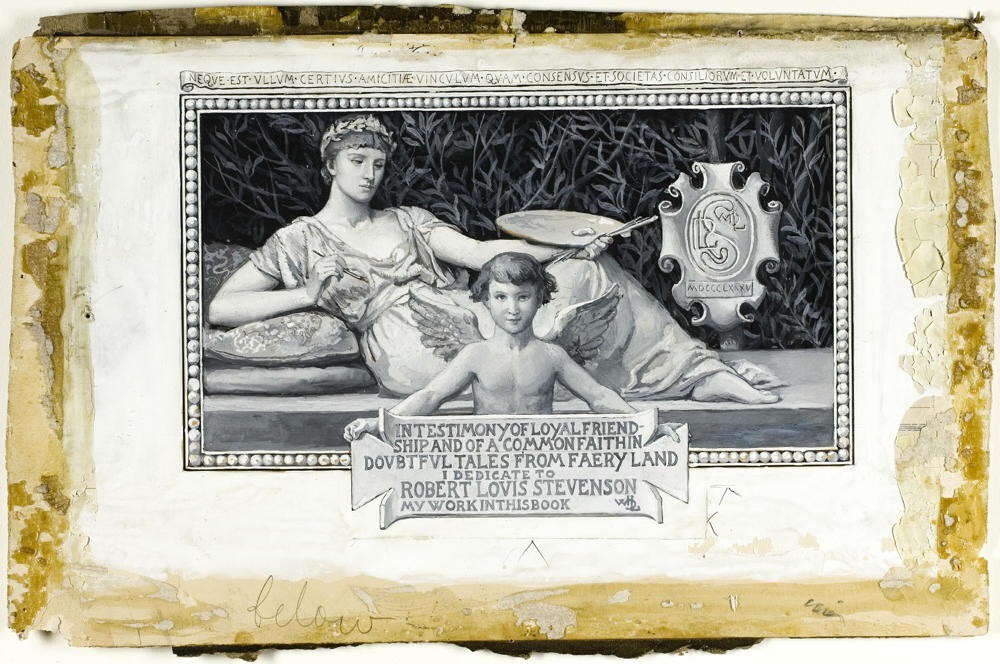
Will Hicock Low: Dedication [for Lamia] (1885)
"It's unlikely to kill me now, either."
Much of the work you and I engage in fails to feel all that engaging. Much of it seems mind-numbing if not necessarily self-destructive. I realize, now that realizing no longer matters, what my father was doing when he insisted I mow more lawn than any eight-year-old should ever mow or rake more leaves than I ever believed I could. He was teaching me how to become Dedicated to some outcome. He'd come up the hard way, in a broken home during the Great Depression, and he had learned from a stern grandfather and a nurturing mother, as well as from a ne'er-do-well counterexample of a dad, how to set aside his feelings to accomplish something or not. He told many tales of working in harvest: how hop vines raised welts on his forearms, how green beans fill up a sack too slowly, how he'd shown up early in the morning and worked through midday. These were object lessons intended to inform me about how this world works.
He was an inspiration.
Jaded

Dorothy Dehner: Landscape for Cynics (1945)
Harvard Art Museums/Fogg Museum,
Gift of the Dorothy Dehner Foundation for the Visual Arts
© Dorothy Dehner Foundation for the Visual Arts
"…why they're so confidently leading us into Hell."
We inhabit a time seemingly tailor-made for cynics. The individuals who comprise our administration, who never intended to administer anything, lead the way by steadfastly failing to fulfill the obligations they agreed to when taking their oaths of office. They tend to do the opposite of whatever they promise. The incumbent confuses confabulation with communication. His supporters insist that we should take him seriously, but never literally, whatever that's supposed to mean. The party that long advertised themselves as The Party of Lincoln, family values, and economic conservatism behaves like confederates, pedophiles, and economic ignoramuses in practice. My congressional representative makes no bones about who he believes he's representing, and it's not his constituents, whose interests he's betrayed at every opportunity.
I was no innocent.
Weekly Writing Summary For The Week Ending 07/31/2025
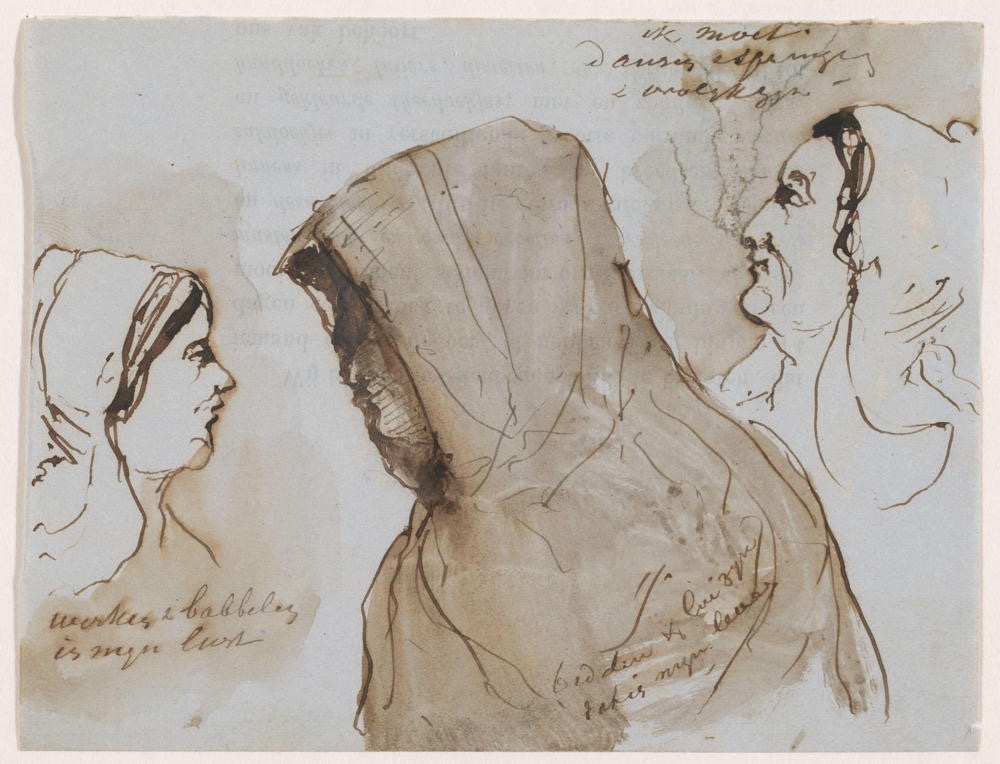
Johannes Tavenraat: Twee vrouwen en een persoon met capuchon
[Two women and a person with a hood] (1840 - 1880)
So It Seems To Go
When my father was in his mid-fifties, he took early retirement from the Post Office because he could afford to. He retired not to a life of leisure but one featuring different kinds of work, for he had always been a working man and would get uncomfortable if he had too much time on his hands. He reserved time to watch his beloved Mariners, Yankees, and Dodgers, and to read his books, but he also had a large yard to care for, as well as a few rentals that always seemed to require his attention. Preparing to be out of town, he pushed himself even harder than usual so that when he showed up at my home in Portland, he was experiencing shooting pains down one arm and extreme tiredness. I ferried him over to Providence, where they decided to admit him. He was in the ICU for the following week and in that hospital for the next ten days. He was released to recover from his heart attack, not at home, but at my place, where he and my mom were welcome for as long as his recovery took. He was exceedingly weak, unable to even sit up for more than a few minutes at first. It was humbling to see this man, who had always been so physically commanding, so disabled. He never even thought of smoking another cigarette again, and claimed to have never missed them. My mom learned to drive their huge Chrysler around narrow Portland streets, and even, after an excruciating few more weeks, drove it the 245 miles home with him riding shotgun, a first in their long relationship. Everything was different after that.
I remain aware that I live in a time in my life when a single event could result in nothing in my life ever being the same again.
Haven
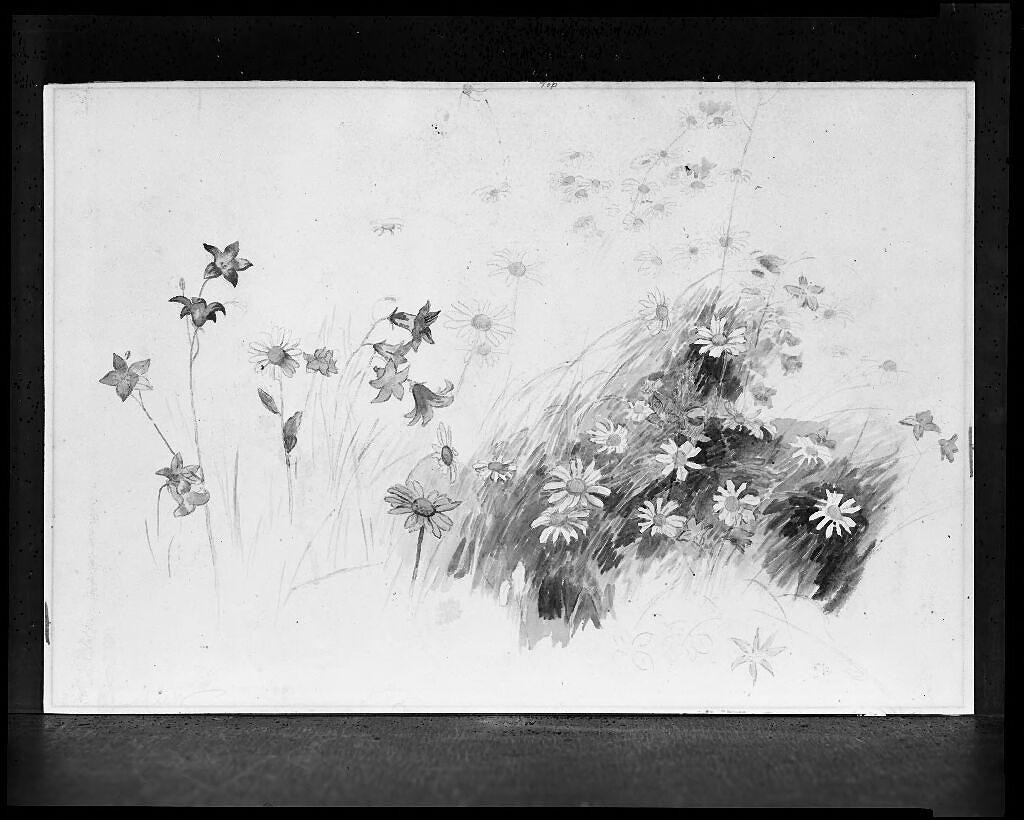
John McWhirter: Study of Wildflowers (19th-20th century)
"No camera could have captured what we witnessed there…"
The Muse and I feel fortunate to live off the better beaten paths. Despite the difficulties we experience trying to find a decent loaf of bread here, many subtle positive externalities surround us. At our age, this place, this “valley they liked so well they named it twice,” its scale suits us even if the politics and parochial perspectives don't always please. Many of our age have relocated here, imagining a safe haven within which to age, only to find healthcare difficult to access and often unavailable at any price. Furthermore, for those accustomed to the narrow range of weather found west of the Cascades, our climate can prove tiring, with endless weeks of temperatures in the nineties throughout summer and months of dreary fog accompanying each winter. Water seems as scarce as Trader Joeses, Costcos, and Targets. Lately, several old familiar businesses have closed. Our economy suddenly seems to be on a downward spiral.
The compensations sometimes seem few and far between, for they remain subtle.
TooOld
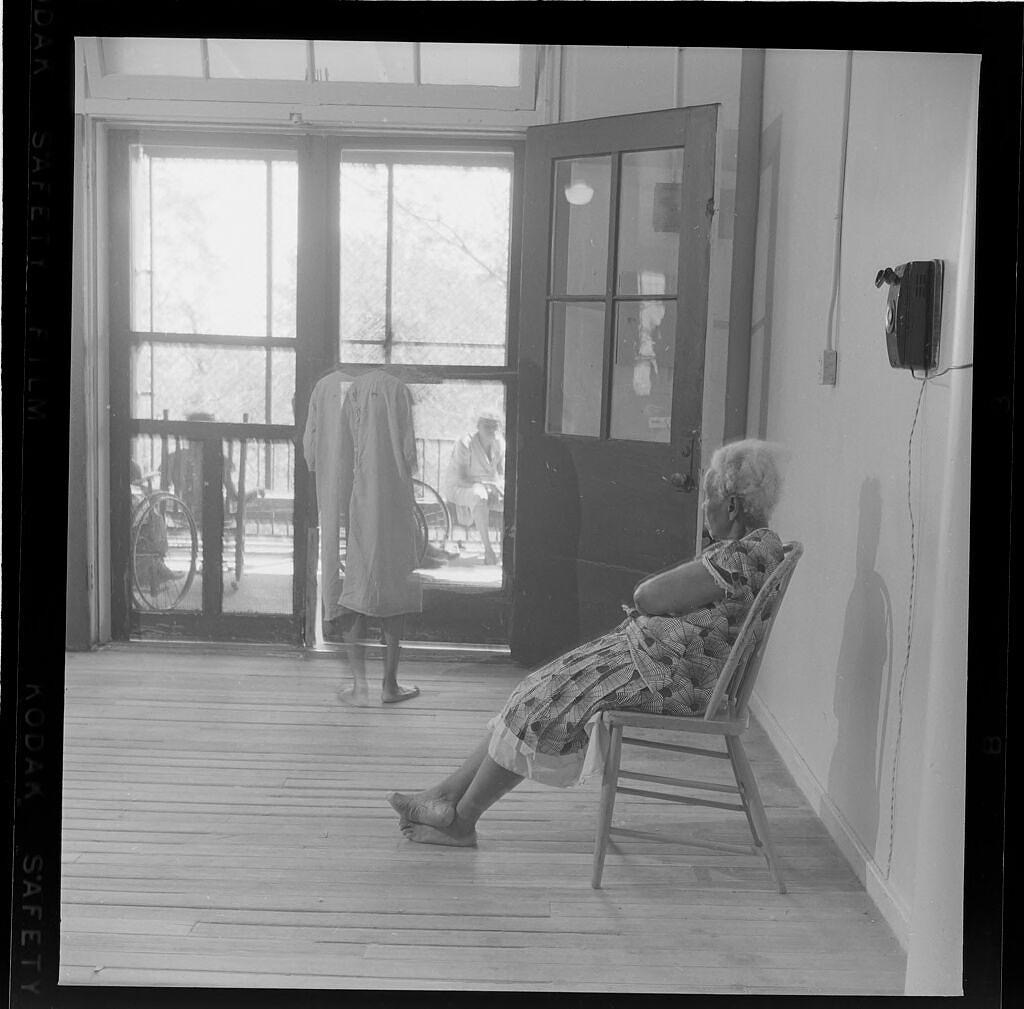
Jack Gould: Untitled [elderly women inside old house] (c. 1950)
" …when I was still considered too young to engage in any of this shit."
For most of my most formative years, I was too young. I excruciatingly slowly outgrew my youth to eventually qualify for many of the activities from which my youth had excluded me. I was granted certain dispensations. I was granted the opportunity to ride my bike six miles uphill every predawn morning, delivering newspapers, when I wasn't quite ten yet. This was because my year-older brother was also vying for a route, and mine would make one less drop for the distributor every morning. Once I began getting granted opportunities from which my youth had early exempted me, I began to appreciate the even then ancient adage cautioning against being extremely careful about what I might wish for. I was proud to have a paper route before I was allowed to have one, but then I was expected to pull my weight as if I had already turned ten.
Being old enough didn't provide the payoff I had anticipated.
Depth
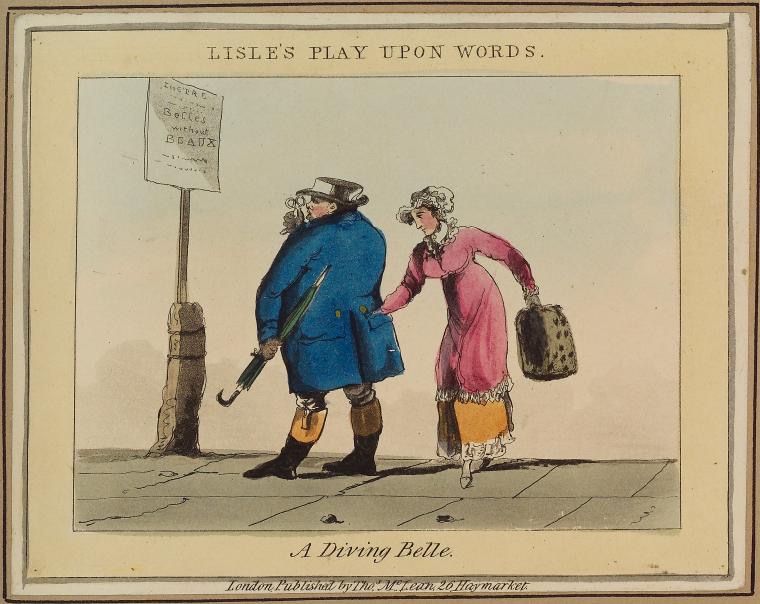
Joseph Lisle: A diving belle (1818 - 1830)
From the Thomas McLean Collection
" … the last thing they will have to celebrate until their own assassination."
I have been operating out of my Depth for all of my life so far. I once believed—or prayed—that I might one day "grow out of" my innate shallowness, though I no longer hold out much of any hope for that result. I have grown to expect myself to perform pretty much to my specs, which, while sometimes broad rather than narrow and tall rather than short, have always, so far, tended toward the eminently shallow. I'm uncertain how one develops Depth. Experience alone does not necessarily seem to translate into deepening experience, for one can seemingly dabble in any subject without ever truly delving very much deeper.
Many have taken to complaining about the lack of Depth in our incumbent's political appointees.
A_Lot

Anonymous Germany 1499:
Lot's Wife Turned to a Pillar of Salt (15th century)
"We know he's lying whenever he moves his lips."
Our incumbent, who works hard to emphasize that he never was or will be "Our President," employs a particularly telling "tell." A "tell" describes an unconscious action that betrays an attempted deception. In other words, a tell provides explicit confirmation that he is lying when he lies. He seems to continually employ this specific tactic, which serves to bolster the notion that he rarely tells the truth. He will make some assertion and immediately confirm its accuracy by declaring that "A_Lot" of people agree. Validation by reference to some vague quantity rarely convinces anybody. "A_Lot" could be a dozen or a thousand or a million. He leaves the precise volume to his listener's imagination. He appears to use his title to amplify his assertions, as if holding an office bestowed special perceptive powers on the office holder, when it clearly doesn't. He might be attempting to intimidate opposition by anchoring his assertion, however absurd, to some imaginary majority opinion, as if merely holding an opinion or just being said to hold an opinion might render any odd assertion valid.
In his ecosystem, bare assertion seems to often stand in for naked truth.
Weekly Writing Summary For The Week Ending 07/24/2025
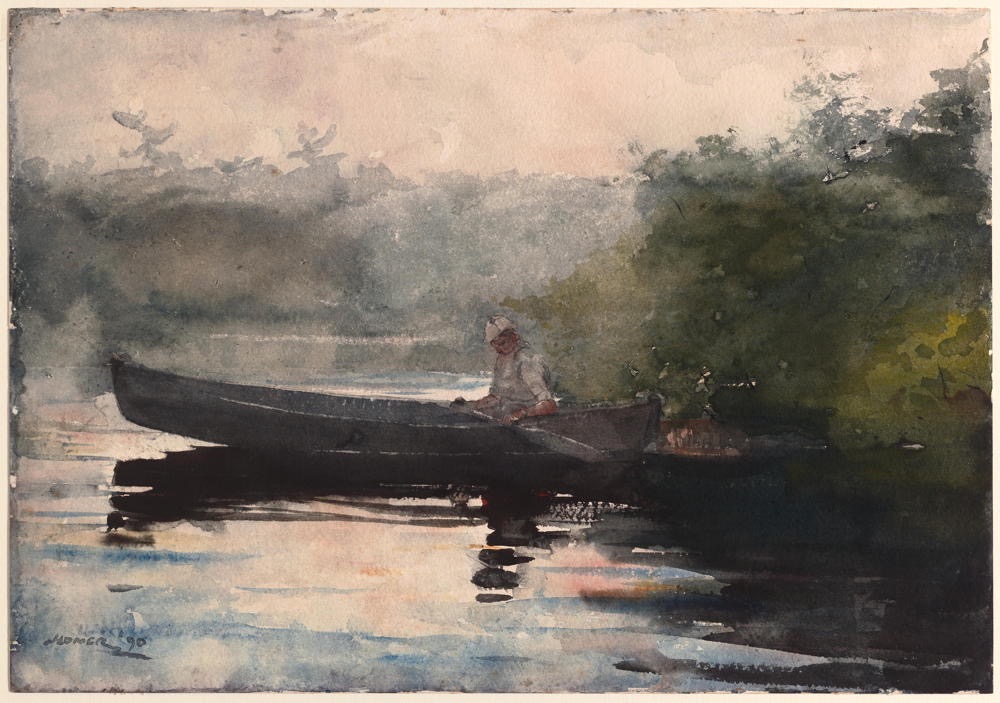
Winslow Homer: The End of the Day, Adirondacks (1890)
Notice Themselves Disappearing
It's fundamentally unfair that shame has been so haphazardly distributed among the populace. Most quickly redden when catching themselves engaged in something embarrassing. Some seem to possess no threshold beyond which they can consider ceasing or desisting, even though accomplishing either amounts to doing both. Our incumbent, may his name never again cross my lips, knows no limits. He serves as a continual reminder of the price of self-importance, for it inflicts by far the greatest tax on everyone else. Those who witness it in action never recover whatever respect they might have previously exhibited toward the afflicted. Those incapable of shame ultimately seem inhuman.
This universe never had any masters.
Indenture
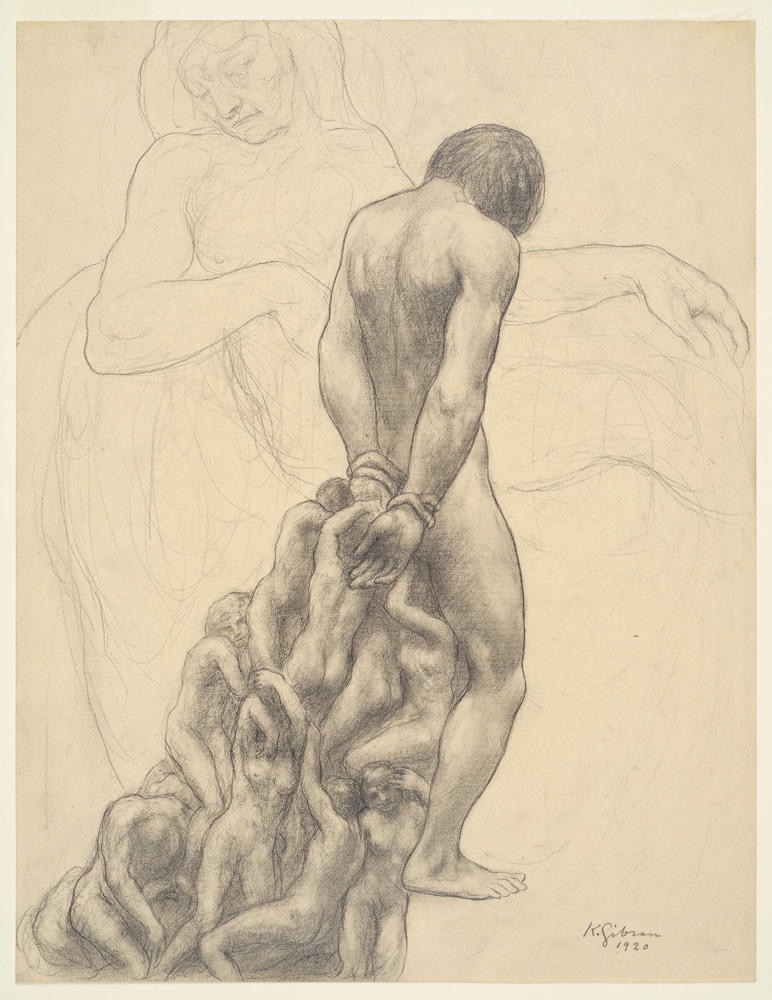
Kahlil Gibran: The Slave (1920)
"I have another early call again tomorrow morning."
Part of the sacred responsibility that accompanies any family must be the obligation to occasionally Indenture one's spouse. This need not necessarily be in any way ominous, for necessity will dictate the timing. Part of the unwritten covenant between any couple covers cornering them. This might involve volunteering their services without first consulting them or merely informing them, rather than asking. The savvy spouse will accept these assignments without altogether too much grousing because they at least imply that they're still seen as good for something, which might be a blessing, depending.
The Muse had this brilliant idea to auction off a couple of dinner parties as part of a fundraising scheme by the local party.
Complicity

Unknown Artist: Portrait of a man (Mid-3rd century CE)
Gallery Notes:
The irregular shaping of the wooden board here helps us imagine the original placement of this portrait over the mummy’s face, affixed with complicated wrappings. The portrait is painted using the encaustic technique, in which pigment is mixed with beeswax, allowing the artist to achieve complex gradations of light and shade and sometimes a luminescence that has been compared to the sheen of oil painting. The man’s hair and beard are trimmed short in the fashion of the mid-third century.
"We'd rather ride the slow train to oblivion."
The Muse, in her role as Port Commissioner, asked me to attend the Port's bi-monthly Economic Development Information Meeting (EDIM) in her stead, since she would be attending a commissioner-only meeting convened by the Washington State Association for the Prevention of Port Commissions in a far corner of the state. I had not attended one of these meetings in nearly twenty years. It typically offers a free lunch and attracts a wide variety of interested parties. It usually features a speaker who holds forth on some topic and enough minutiae to satisfy anyone with a severe spreadsheet dependency.
I arrived a little early so I could wish the conveners well and grab a choice seat waaaaay up front along one side.
Paperwocky

Unknown Artist, probably Spanish: Shadow Box: Castle (1693)
"I'm a tad old-fashioned that way."
"I have adjusted your shopping cart to show the custom cover lite. Please send me your final manuscript and the cover art. Please send any notes you may have regarding the cover design as well.
"I now just need the production approval. Please log in to submit. When you log in, click on the title ID in the active titles box, and you will see a checklist to the right. The last item under the column, You Must applies to you. Please click on ‘Click Here for Production Agreement’. Some terms will drop down. Please review and then click on the Approve Production button. We can then start work."
"I'm a tad old-fashioned that way."
Slip over here for more ...Moisture

Pieter van der Heyden: Summer, from The Four Seasons (1570)
published by Hieronymus Cock
"I can expect another little insubstantial rain shower along about September."
Every day for the past month or so, the news has been reporting the most savage series of flash floods I remember. Past summers have not been nearly this tumultuous, with perhaps a narrow tornado season followed later by an equally narrow hurricane one, but this summer has seen a seemingly unending series of record-setting, thousand-year floods following unprecedented downpours measuring in inches of Moisture per hour. As usual, my little corner of this world, the one overlooking the absolute center of the universe, where gravity always works reliably, has seen nothing even distantly resembling these calamities. We've experienced our more or less usual Moisture so far this summer, the negative kind. Through June, we received barely a distant whisper of rain, resulting in a net negative Moisture month for us again. We've been praying for rain, while further east, they've been praying for its cessation.
We worship the god of moisture, believing it makes life here possible.
MeetingMyself

Allart van Everdingen: Rabbit meets Reynard in Field (17th century)
"The difference sure feels profound, though…"
As a writer, I mostly work through surrogates. It's not precisely that I do not show up for work when I work. It's more that when working, I primarily project. However introspective one of my stories might seem, creating them amounts to an act of extreme extroversion for this extraordinarily introverted writer. I usually speak to someone else when creating, my mythical reader, or the ether. Writing for me has never been a dialogue with myself, or even with the deaf. Even when I edit a fresh piece, it's more of an out-of-body experience than a conversation. I might burgle the opportunity for me to read my writing by the very act of creating it. It seems at least vaguely familiar even on first reading, probably because I just finished writing it. Editing demands a certain cold-hearted distance, akin to pruning shrubs or weeding tomatoes —a certain indifference. It is hardly an intimate act, best done at an emotional distance.
So, it was a rare occurrence when I found myself re-re-reading my Cluelessness manuscript, recently returned from final copyediting before publication, and caught myself immersed in what must have been myself.
StudyingMyself

Stanley Anderson, Engraver: Head Study (1908)
From: Samuel Putnam Avery Collection
"…I retain a few unanswered questions."
As I announced in Recovery, the episode of this FollowingChapters Series I posted just before yesterday's Weekly Writing Summary, my Cluelessness manuscript has returned from its final copyediting pass. I had both dreaded and warmly anticipated its return. I secretly feared that the copyeditor would uncover the depth of my long-secreted impostor syndrome and expose me for my presumptions. I also imagined that her efforts might somehow validate my talents, however modest, and justify my continuing this little vanity on into infinity. I received a bit of both, and also neither of what I'd so fervently hoped and feared. As I reported in Recovery, she’d employed a light hand, preserving what I'd imagined represented my voice while drawing a firm line between what might prove acceptable and what could never pass muster.
I characterize myself as more of a feral writer than a trained one.
Weekly Writing Summary For The Week Ending 07/17/2025

Angelo Caroselli: Summer (1620s)
Downward And In
I cannot decide whether I'm aging or just imagining myself aging. I have so far failed to convince myself that I'm growing any older. I see old classmates pass by, obviously aged in my remarkably youthful eyes. I should know, I submitted to cataract surgery ages ago, but I survived. Nobody ever very well remembers the struggles they endured, just the moments within which they surprisingly managed to convince themselves again that they were probably not aging.
I continually need to resolve some fairly obvious deviations from expectations.
Rediscovery

Ammi Phillips: Harriet Leavens [1802-1830] (c. 1815)
"…the direct eventual result of this writer writing."
Seven summers ago this morning, I was up writing very early, as had been my habit for just over a year by then. I had begun this writing discipline after a six-month-long Dark Night of the Soul wherein I wondered if I had ever—indeed, would ever—become a writer. I quelled my fretting by writing, a simple enough resolution in retrospect, but a serious question when still prospective. I speculated that if writers write, then I could only hope to answer the question of whether I was a writer by writing. I needed plenty of reassurance then, so I began by dedicating myself to daily stints. I'd write early in the morning, before my day could slip away from me. Neither the content nor the purpose mattered then, for I was just seeking reassurance. If I could maintain that modest commitment, I figured I might eventually consider myself to be the writer I aspired to become.
In reality, the effort proved to be a little more complicated, since this fresh dedication demanded a level of diligence I'd never invested in anything before.
FalseFlags

Johann Sadeler I: Micaiah and the False Prophets (16th-17th century)
"We're not quite there yet."
Since the 1930s, DC Comics character Superman has been presented as a staunch defender of "Truth, Justice, and the American Way." These three pillars of the society I was later born into remained reasonably stable until recently, when another ethic began to enjoy expanding influence. Our incumbent, schooled by the fascist gangster Roy Cohn, embraced a decidedly different American Way. His version rooted itself in falsity and injustice, reframing these as the supporting principles of his newer American Way, if I can even properly characterize falsity and injustice as principles. Our incumbent realized that truth could be effectively neutralized for any purpose by merely dispensing lies. These lies could not succeed if they were tentative. The liar would have to be all in if he intended to succeed. He would need to treat Truth as the ultimate enemy of his brand of democracy. He set about creating an alternate ecosystem where lies could thrive.
In the paper-rock-scissors game that comprises public opinion, the relative truth or fiction of any assertion matters little to the dedicated practitioner.
AntiPolicy

Utagawa Hiroshige 歌川 広重: A Cuckoo Against the Moon (c. 1843/46)
"They are their own worst enemies …"
Our incumbent holds no affirmative policy positions. I could insist that he holds no policy positions because those he has, or those he holds in lieu of holding affirmative policy positions, tend to be negative. He seems to be opposed to damned nearly everything, especially anything that even distantly hints at decency. This outlook places him and his anti-administration in a unique position, for they exclusively promote negative space outcomes. Try to envision a result should any of his anti-positions somehow come to fruition, and you will find yourself unable to agree with anybody on how those results will manifest. Each seems to project a strong sense of tangibility until and unless one tries to render them tangible. Asking the innocent question, "And if you achieved that, what would you have?" throws his spokespersons into inescapable disarray.
From a wannabe strong man, negative, AntiPolicy positions tend to sound powerful, like any espoused by any odd Old Testament God.
CityOfCards

Lucas Vorsterman: Fighting farmers after a card game 1619-1675
Gallery Notes: Fighting farmers, after a card game. One holds a threshing flag and hits the other on the head, while another man tries to stop him. The other farmer has a pitchfork in his hands. A woman holds a jug and is prevented from hitting it by a man holding her wrist. In the foreground, a fallen bench, a jug, and a scattered deck of cards. In the background, a village.
" … the future refuses to disclose which castles topple next."
" … the future refuses to disclose which castles topple next."
Every half-decent charlatan masters the construction of at least one House of Cards. It takes an exceptional one to oversee the development of a Community of them, and a once-in-a-very-blue-moon one to fabricate enough buildings to result in a genuine CityOfCards. The City seems no less tenuous than the original single building, though it's exponentially more fragile if only because of the proximities of similar fragilities. One errant puff of wind, one clumsey addition, and the entire fabrication can crumble. After some point, the marvel no longer comes from the construction, but from the ever more unlikely preservation. The likelihood of catastrophic failure blooms as the charlatan continues adding roofs. He eventually can't stop himself from ever-more-frantically adding roofs.
The sure bets ride with failure, but then a second wind, if you'll excuse the expression, comes in to encourage ever more frantic and apparently successful construction.
Prafussee

William Blake:
Frontispiece for "America a Prophecy" (1793)
"Anyone claiming today that they're directed by God has forgotten their history lessons or they might just be a charlatan."
News that reports some members of the incumbent's cabinet, public servants, believe themselves to be instruments of prophecy leaves me wondering whether insanity can be employed as a credible offense. Nobody can reasonably claim to be such an instrument, and if true, nobody gets to choose to become such an agent. I seem to remember some biblical figures cursing such an intrusion into their lives, neither particularly proud nor feeling rewarded by such a designation. Further, biblical prophecy so predates our circumstances that it seems much more than merely unlikely that scripture, retranslated innumerable times over many, many centuries, even if divinely inspired, could have accurately and intentionally targeted our times as its purpose. Further still, modern interpreters of such messages appear to interpret them literally, except in those special instances where figurative interpretations seem necessary. They seem capable of justifying anything by claiming scriptural sanction, and do.
Heaven help us survive this latest twist on justification.
Disintegrating
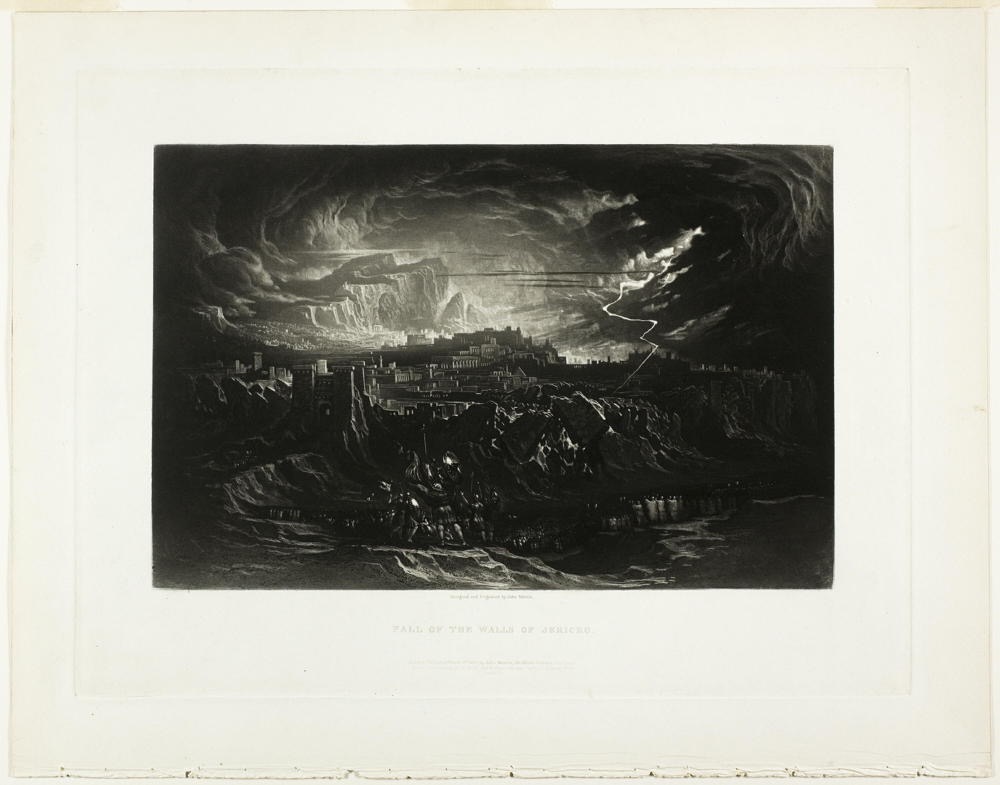
John Martin: Fall of the Walls of Jericho,
from Illustrations of the Bible (1834)
"It would never raise a credible head again. It's done."
The apotheosis appears as a trajectory more than a peak. At that point, nothing's obvious yet, though subtle and, in retrospect, not so subtle signs point to an inescapable conclusion. That arc peaked. It will never regain that height again. It's downhill from there, though not necessarily a power dive. There might be a series of plateaus and even a few apparent recoveries on the inevitable way down, but the momentum is lost along with the surprise that the initiative initially depended upon. Opponents easily anticipate what were once utterly baffling motives and moves. What seemed like magic was rendered barely tragic. Only theater remains. The outcome will never again find itself in serious question. So begins the slow shuffle toward the exits. What began as a mammoth traffic jam as everyone tried to arrive before the start winds down with people who paid through the nose for tickets leaving well before the end to avoid traffic or something.
Our incumbent still believes he successfully outsmarted everybody.
Weekly Writing Summary For The Week Ending 07/10/2025
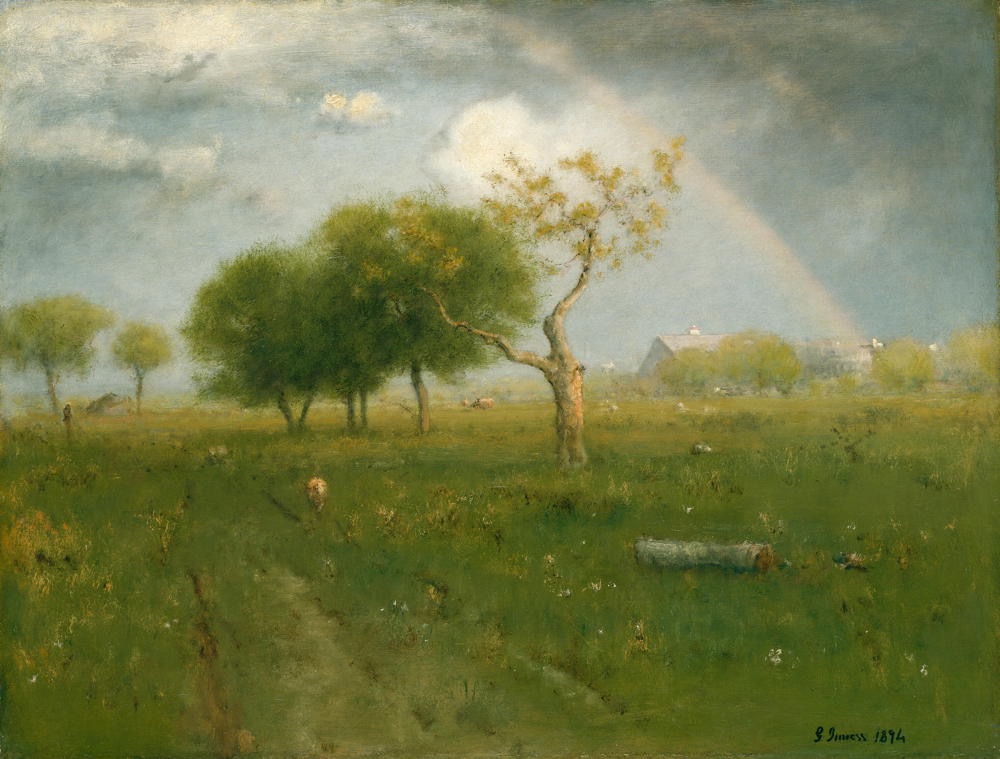
George Inness: After a Summer Shower (1894)
Now Must Be The Time
I once believed that a time might come when my patience would be amply rewarded, though I never invested much time defining what that payoff might entail. Would it come in the form of no longer needing to exercise patience? After all those decades diligently practicing my patience, I might have earned a payoff that promised only the continued practice, by then masterful, of ever more patience. I might have mastered waiting. It seems now, from the perspective of this once far and distant shore, that practicing patience itself might have always been the underlying purpose, promise fulfilled in the very act of striving to practice. Of course, anyone who has practiced patience understands that this practice never seems to approach perfection. Even the avid practitioner understands that even diligently practicing patience involves experiencing considerable impatience, too, and that it's ultimately a failed pursuit if judged too absolutely.
My mother's Uncle Curtis served as an early example of both diligence and patience.
BrightIdeas!
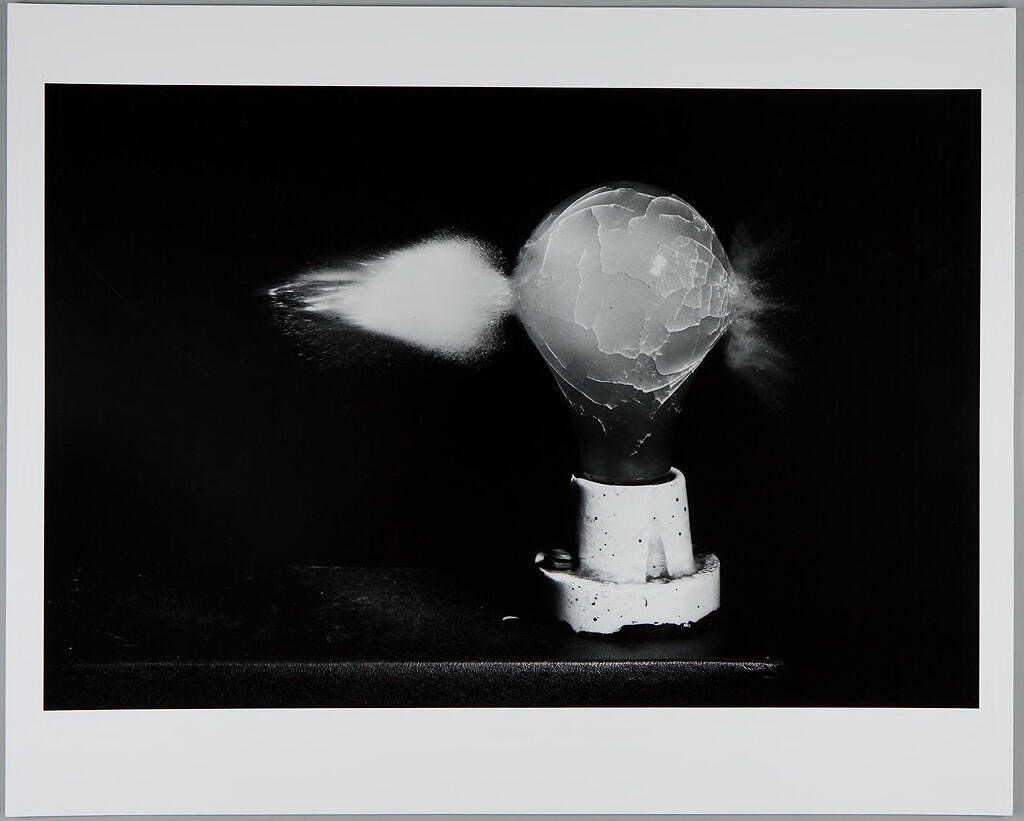
Harold Edgerton: Death of a Light Bulb (1936, printed later)
" … the crutial resource I need to deploy to succeed."
I learned early in my consulting career that my most successful clients started their projects with the worst ideas. These often seemed initially inspiring but ultimately unrealistic, and rarely survived into implementation. The less successful operations married their earliest notions and spent the bulk of their development efforts trying to avoid divorce. They would end up implementing something nobody really needed to satisfy some urge that hadn't survived the earliest phases. The most successful companies seemed to be most skilled at skewering their originating BrightIdeas!
I later realized that all development efforts start with BrightIdeas!
Lowbernation

Edward Clark Potter:
Sleeping Infant Faun Visited by an Inquisitive Rabbit (1887–89)
"All might be right with the world contained within the midsummer guest bedroom walls."
Midsummer brings a lethargy every bit as overpowering as any mid-winter might induce. In both instances, the weather turns inconveniencing, even menacing, introducing a definite reduction in initiative. If I'm not finished with my outside work by ten in the morning, I'm best off just forgetting about making progress that day. When the mercury fails to make it below seventy overnight and has already climbed to eighty before six, its trajectory becomes obvious. This is a performance I've seen before. In my youth, I'd head for the swimming pool and stay in the deep end all afternoon. Now, I head for the guest bedroom to lie beneath a screaming ceiling fan to read another detective novel until I doze. I swear I never know where any of those afternoons go.
I later take to the back deck and water the planters.
Tariffied

Lucian and Mary Brown:
Untitled [baby reaching for typewriter] (c. 1950)
"Nobody ever applauds a terrorist."
Far from appearing to be a skilled negotiator, our incumbent exasperates his counterparts by continually switching his terms. On trade, he made up a "novel" definition of tariff, one which no economist can make heads or tails of. He promises one thing before reneging, typically delivering some punishing terms to trading partners who've loyally served as our manufacturers for decades. Even where no hope of developing domestic production exists, he hits a former partner with some punishing, seemingly random blow. Nobody knows what he's trying to do. If anything shines through his increasingly thin veneer of sanity, his trade negotiation policies qualify as nearly pure insanity. Or, perhaps, they're only inanity. The two seem indistinguishable in him.
The urgent need to seem victimized might fuel much of this theater.
Disasters

Thomas Rowlandson:
The Double Disaster or New Cure for Love (July 10, 1807)
Published by Thomas Tegg
" … after the previously almost unthinkables start occurring regularly again."
In an apparent contradiction, MAGA governance has ushered in an unprecedented —and indeed, previously unthinkable — number of Disasters. From airplanes suddenly falling out of the sky or inexplicably leaving taxiways on takeoffs or landings, to so-called Natural Disasters, those deemed caused by acts of a somewhat less than benevolent God, the MAGA-verse has seen more and worse than recent administrations. While the incumbent hastily explains that these can be traced to lingering effects of President Biden's administration, no explanation seems entirely necessary. Actual Disasters come from nowhere, are utterly unforeseeable, and provide almost endless potential for sympathetic photo opportunities. Few things demonstrate an administration's authority more than mustering the National Guard to help locate flood victims with their Hueys. This sudden spate of horrible events might have boosted the incumbent's ratings.
His incessant budget cutting and reallocating could be seen as at least a proximal cause of this shocking increase in Disasters.
3rdWorld

Vasily Kandinsky: Painting with Green Center (1913)
"Nobody imagines us essential anymore."
I was born into THE 1st World nation. Others would catch up to become almost our peers, but for nearly all of my years, my country held distinct advantages over every other country in this world. In the early years, this advantage encouraged our compassion. Sure, we still exhibited vestigial evidence of a lingering arrogance, but we were most often seen as benefactor and breadbasket, goodwill ambassadors more than vicious competitors, except with the Communists, of course, but we invented our Communists because we needed the appearance of competitors. We could well afford to be egalitarian, and we befriended everyone we could. We agreed to host the United Nations headquarters, and few could question the reason. We were the original democracy, and we were definitely interested in sharing our social technology, even when, unfortunately, it was not of our target's choosing.
We always had a primitive minority who opposed modernity, seeing government programs as reckless intrusions into sacred traditions.
UnAmerican

American Issue Publishing Co.: Liquor Problem: United States.
A "wet and dry" Map of Temperance Reform in the U.S.:
"Wet" and "Dry" Map of the United States, January 1, 1912:
Areas shown in white are areas in which
the sale of alcohol is prohibited by law.
(1912)
"I wonder if we can survive until the curtain rises on our next performance."
This year's 4th of July, coming on the day our incumbent signed the most repressive bill in American history, didn't hardly seem worth celebrating for many, me prominently included. I moped around the place, grieving for a fictional America I still believed in, for that's what makes me an American. This new bill seemed too gawd-awful cynical to accurately represent actual American interests. It seemed unworthy of even any Banana Republic, and might be evidence that we've finally gone and done it, become the very opposite of our Founders' originating intentions.
There was always much contention between the pretensions necessary to maintain governance and what are widely considered to be rights and freedoms.
Weekly Writing Summary For The Week Ending 07/03/2025

George Platt Lynes: Frederick Prokosch [writer] (c. 1950)
Worsen Our Collective Experience
I suspect that one of these days, the old Father Forgive Them For They Know Not What They Do routine will finally lose traction, especially in a country predicated upon the notion that we could and so really should be striving to improve rather than incessantly backpedaling. Our latest ignorance seems forced and unconvincing, as if we had not been living for the last three-quarters of a century. Ignorance didn't used to be a choice. It could appear without overdue blame before the Enlightenment. After, those who chose to ignore history's lessons tended to undermine themselves, so most avoided dabbling in it on anything like a societal scale, except for those who gained their power and authority by associating with the biggest losers in history. One by one, the more primitive philosophies bowed down to emerging realities, and while all was still not entirely right with this world, things were arguably better, enviably so.
But being human, we couldn't just accept obvious improvement and retire to smell sweet roses.
Cluelessnesses

Raphael Sadeler, the Elder:
Allegory of Wealth, Lust, and Stupidity (1588)
" … some just manage to cope better with its presence."
M'Lord's Prayer
Our Father, who art in our imagination,
Hallowed be thy name.
Thy kingdom come, thy will be done
on Earth as within our deepest intentions.
Give us this day our enriched white bread,
And forgive us our debts
As we persecute our debtors.
Lead us well beyond temptation and
Forgive us our Cluelessnesses
As we persecute those who seem most clueless to us.
Award us the franchise to deliver evil,
that we might finally vanquish decency,
For thine is the power and the glory
We intend to invoke forever and ever. Amen
Raphael Sadeler, the Elder:
Allegory of Wealth, Lust, and Stupidity (1588)
" … some just manage to cope better with its presence."
M'Lord's Prayer
Our Father, who art in our imagination,
Hallowed be thy name.
Thy kingdom come, thy will be done
on Earth as within our deepest intentions.
Give us this day our enriched white bread,
And forgive us our debts
As we persecute our debtors.
Lead us well beyond temptation and
Forgive us our Cluelessnesses
As we persecute those who seem most clueless to us.
Award us the franchise to deliver evil,
that we might finally vanquish decency,
For thine is the power and the glory
We intend to invoke forever and ever. Amen
Humildity
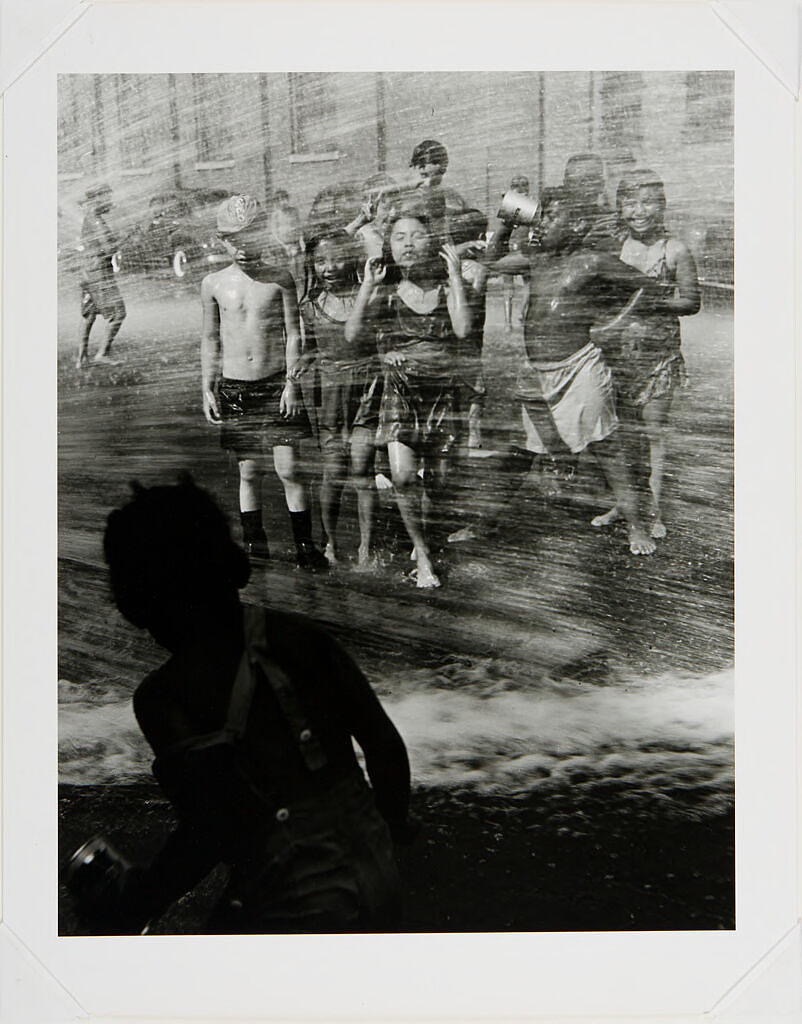
Wayne Miller: Heat Wave, August 1947 (1947)
" … shirts that wrinkle far too easily in such low humidity."
When I was twenty-three,I experienced high humidity for the first time. I could not believe that people could tolerate living with it, that every soldier in the Civil War wore a heavy felt wool uniform and still managed to move around in that stuff. I promptly contracted a severe case of sun poisoning, a condition I had previously been blissfully unaware of existing. It occurs when bright sunlight filters through extremely moist air. The effect seemed similar to what happens when sunlight passes through a well-focused magnifying glass. I blistered and felt seventh-circle-of-Hell horrible for a week, taking ice baths and slathering ineffective calamine lotion all over my upper body. I had never really bought in to the concept of an Old Testament vengeful God until that experience. I wear long sleeves and havelocks through my summers now.
Summers here near the center of the universe feature a drier heat, the sort that vacationers to the Southwest use to explain away triple-digit temperatures.
Moosenator

John Woodhouse Audubon:
Servus alces, Moose Deer. Old male & young. (1845-48)
" … a little heaven here in The Villa so close to the center of our universe."
I have no more steady companion than our formerly feral male cat Max. Since he became a member of our entourage five years ago, he has accumulated a fair raft of nicknames, if only because he's a member of our family and everybody in our family gets assigned at least one nom de famille. He sports several, including: Maximum, Moose, and Moosenator (pronounced Moose-EN-a-tor). Those who ask why I call him moose, I answer by insisting it was because of the antlers. Of course, The Moose does not actually have antlers, which might be my point. Perhaps the finest reason to assign nicknames in the first place involves the creation of an absurdist mythos around the old family unit. I imagine myself a budding Roald Dahl, writing a book about the wholly unlikely adventures of a typical American family who just happens to have a Moose and a Muse involved. I believe that every life requires some air of mythic mystery surrounding it. Mine features a Moose.
The Moosenator is clever, but not particularly intelligent.
Trepidation

Alfred Stieglitz: Self-Portrait with camera, tripod, and pistol (1886)
"It feels like the thousand deaths …"
This week promises to become one of those weeks that were. So many weeks come and go without leaving many footprints. I recently failed to recall entire quarters where I'd dedicated myself to writing series now lost to memory, if not necessarily to history. I reassured myself that nobody remembers all the books Twain wrote, and he remains perhaps the most popular writer in our history. This week, my copyeditor promised to deliver her completed work on my pending manuscript. I am not warmly anticipating reading her results. Though I firmly believe in the copyeditor's beneficial contribution, I would have preferred to forego this specific stage of manuscript development. I'd asked her last December if she could provide a quick check to prove that my manuscript required her effort. She asked me to send her a few pages. She almost immediately responded that she found five glaring errors in the first paragraph!
Humbled into acceptance then, I told her I'd get back to her after some deeper consideration.
DaysOff

Russell Lee: Seaside, Oregon, is vacation spot (1941)
United States. Farm Security Administration
"My work, my play."
I don't take vacations. DaysOff seem out of the question. My summertime's filled with obligations that effectively prevent me from leaving home. Who would water the gardens and tend the cats? More than that, who would write the daily missive if I went missing? I understand that my time isn't refundable. If I miss a day, I've forfeited it, never to be recovered. I will never again stand in that place or time. I feel a sacred obligation to keep my nose near to this grindstone. When I have to go away, I take my business with me. I can rise just as early elsewhere as I can rise here, so my production continues even if I'm jury-rigging connections in a tiny hotel room in Paris. I will consent to visit, but I will not agree to suspend my writing for even a day.
I do not write for a living; I live to write.
CounterIntuitive

Jack Gould: Untitled [women lined up in front of counter,
seen from behind shop counter] (c. 1950)
"We're destined to become mere observers of our computations."
A great myth was created at the dawn of the personal computing age. Before then, when computing exclusively resided within large organizations, computer professionals took considerable pride in their ability to work within tenaciously hostile intellectual environments. They were, after all, professionals, so their methods and practices should have, by all rights, remained obscure and mysterious to the general public. These professionals reveled in their status as eggheads and were seen as much more intelligent than the Average "Regular" Person. Many became conversant in what was properly referred to as "machine language" and could think and dream in ways never imagined by Average "Regular" Persons.
The dilemma arose when technology advanced to the point where personal computers became feasible.
Weekly Writing Summary For The Week Ending 06/26/2025
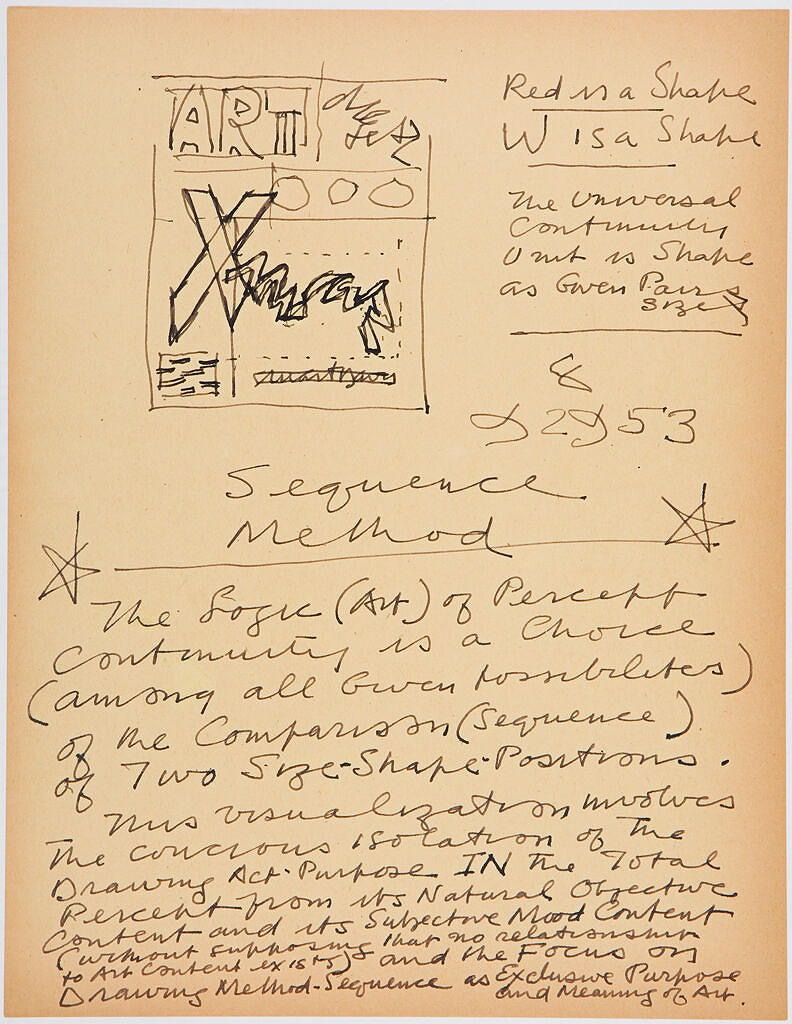
Stuart Davis: Study for “’Art Digest’ Cover” (1953)
Just Like This Administration
Physicists maintain a unique sort of humor within their ranks. They award an Ignoble Prize to scientists performing particularly absurd studies. They're attracted to Irreproducible Results. They amuse themselves analyzing Cartoon Physics, the sort to which Wylie Coyote runs sideways. Does Coyote Gravity exist? It turns out that, while the realization that nothing supports you doesn't actually trigger gravity into action, a discernible delay comes into play when someone inadvertently attempts to walk on air when blindly running off the end of a mesa. Objects do not flatten to the extent shown in cartoons when running full speed into an immovable object, though some flattening does occur.
Our incumbent engaged in Cartoon Physics last week when explaining what happened when some Bunker Buster® bombs hit an Iranian uranium enrichment facility buried deep underground.
TechTalk

Kate Greenaway: The disappointment. (1890)
"I will be back at it again tomorrow morning."
Technology promised what every innovation has always promised: ease. It has yet to deliver. Not that this failure has chased off many customers. I know of nobody who made good on their pledge to rid themself of their frustrating technology. No, we return with fresh hopes the following morning, only to rediscover the depth of technology's betrayal. It does not seem to care. It seems incapable of giving a damn. We stopped being mere users decades ago, before our technology became this convoluted. Tangle built upon previous tangles to produce a mess whose designers probably don't understand.
My technology holds the power to transform me into a whimpering eight-year-old at virtually any time.
Broken

J. B. B. Wellington:
The Broken Saucer (c. 1880/90, printed April 1890)
" … not even duct tape holds anything together forever."
I have attained an age where much of what surrounds me seems Broken. I suspect that this acknowledgement accompanies aging, since in my more innocent youth, I seemed surrounded by more operational than Broken stuff. My stove-top espresso maker's handle was missing this morning. It had broken off a few weeks ago when the house cleaner accidentally knocked it off the countertop. I'd fixed it with some superglue, and that held until a few days ago, when it let go. I learned that I'd have to find some high-temperature glue to more permanently fix it, so I placed that need into my ever-burgeoning pending queue. I'll get around to finding that when I finally get around to finding that, assuming I ever remember to. In the meantime, I discovered that two pot holders held just so suffice as a fix until something more permanent manifests.
Much of my existence seems to be suspended in just that state: Pending Something More Permanent.
Preference
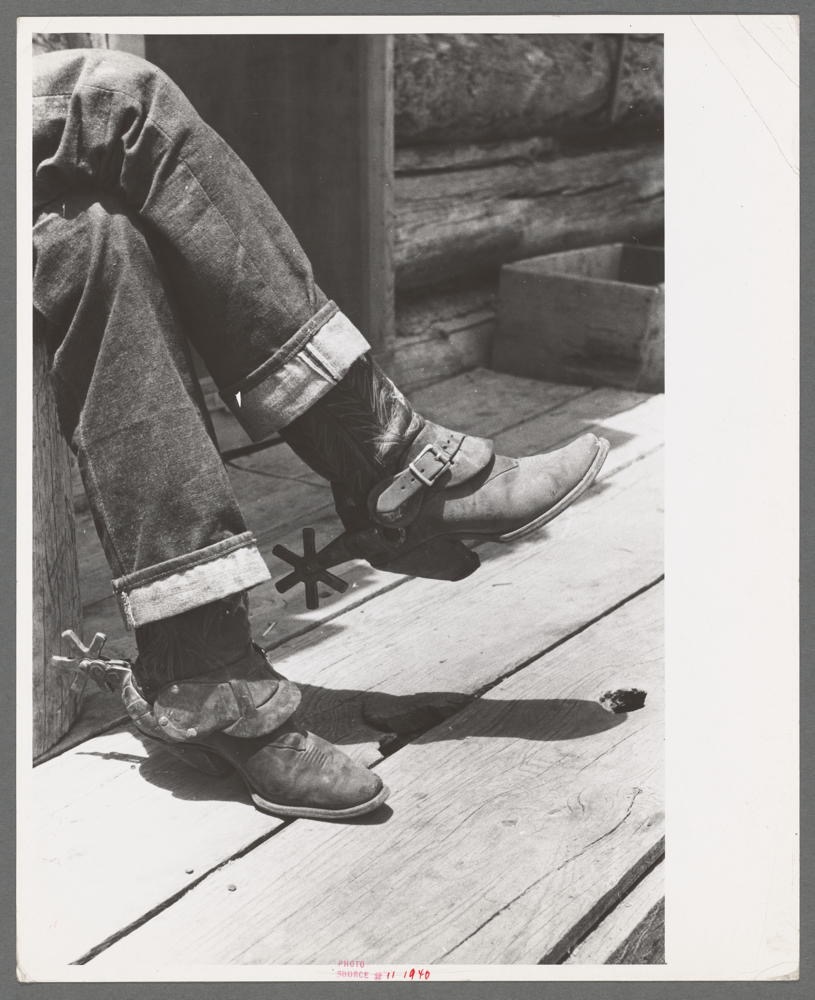
Russell Lee: Detail of farmer's blue jeans, boots and spurs.
This man was once a cowboy and still prefers the cowboy's dress,
Pie Town, New Mexico (1940) Farm Security Administration
"I expect that I'll always struggle to get in touch with my heart's desire …"
I struggle when responding to anyone asking about my preferences. I was raised to be more sensitive to what others prefer than to my own preferreds, a valuable skill in a family with five kids where neediness easily translated into a form of weakness. I learned early the value indifference brought and the cost neediness wrought. I was rarely considered to be a picky eater. Quite the opposite, I was known for my adventurous palate. My dad "preferred" chicken backs so his kids could feast on the meatier cuts. My mom could turn into a genuine Christian martyr sometimes, denying her personal preference in deference to her kids'.
Making matters worse, when I was in Junior High School, I found an old Victorian text in the local Goodwill book section, “The Kingship of Self-Control.” I took that book to heart.
DroppingIn
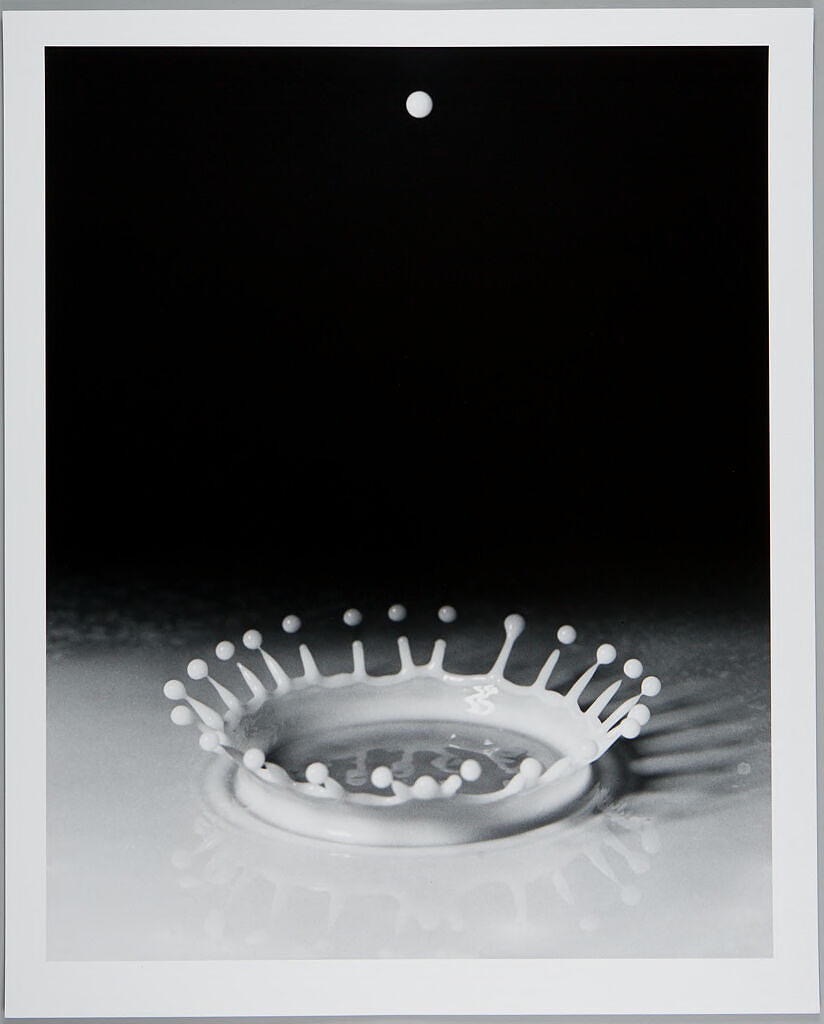
Harold Edgerton: Milk Drop Coronet (c. 1936)
" … not nearly as alone in this world as we could have sworn we were sometimes."
Most of us live well-regulated lives. This renders us more predictable than we might be otherwise. There is no question about whether we imprinted on hunter-gatherer or farmer behavior. We're definitely farmers. We rise at just about the same time each morning. Through the day, we follow a schedule that defines our edges. We reliably show up for supper at the usual time. We even regulate our vacations, planning routes, stops, and experiences. We try to leave little to chance.
Hunter-gatherers, though, left much to chance.
Priorities

Ben Shahn:
Untitled [Washington Court House, Ohio] (July-August 1938)
"The evil done in our name serves as the greatest evil of all."
Our incumbent waddled off his golf course to fly back to his supposed home to deliver another borderline incoherent rant about something. He sounded triumphant as he spewed his usual paradoxes, pleading for a peaceful end to a violent engagement he initiated. So much for the great negotiator, now reduced to pre-emptive triumphalism.
The Muse and I had spent our day harvesting.
FollowingMyself
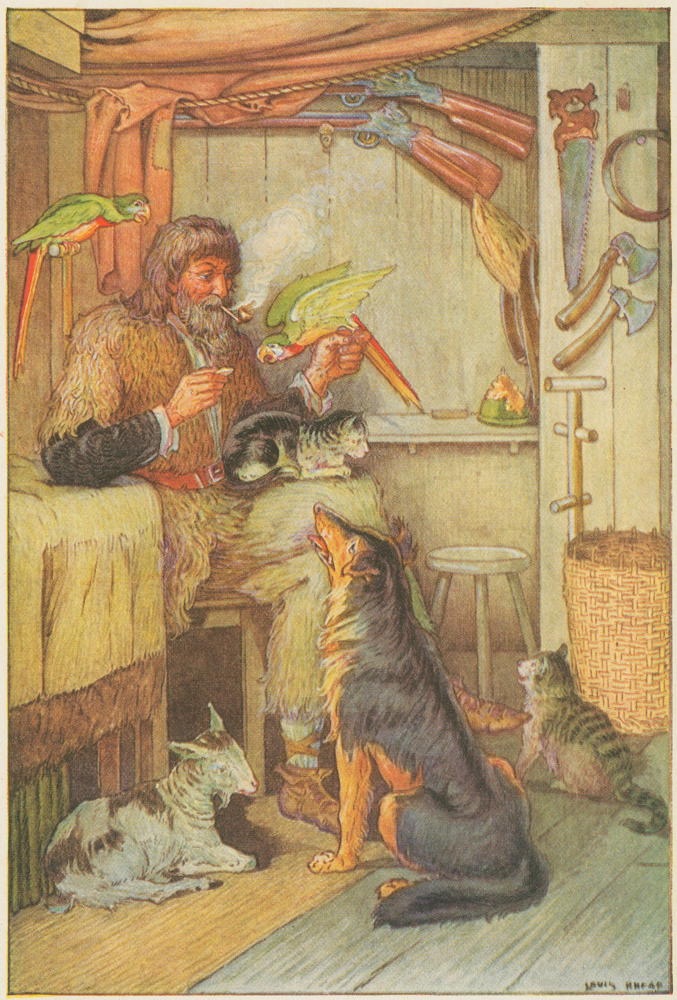
Louis Rhead: I diverted myself with talking to my parrot (1900)
— Illustration from 1900 William Taylor edition of The Life and Strange Surprizing Adventures of Robinson Crusoe, of York, Mariner: Who lived Eight and Twenty Years, all alone in an un-inhabited Island on the Coast of America, near the Mouth of the Great River of Oroonoque; Having been cast on Shore by Shipwreck, wherein all the Men perished but himself. With An Account how he was at last as strangely deliver'd by Pyrates. Written by Himself. (Popularly known as Robinson Crusoe.)
" … accepting that I'm finally in charge of FollowingMyself."
Beyond a certain uncertain point, I find I have to lead myself. The trailblazers and popularizers I once looked to for direction have either left the building or proven themselves incapable of further advising me, so divergent have our paths and aspirations become. What early in my careers became an identity struggle has laid down its weapons. My identity is finally no longer a mystery to me. Neither are my fallacies. I more deeply understand my underlying absurdities as well as my fundamental decencies. I remain incomplete yet almost complacent, satisfied having life come at me, finally understanding and accepting that I never really had any alternative. I have arrived.
Where I've arrived might not matter.
Weekly Writing Summary For The Week Ending 06/19/2025
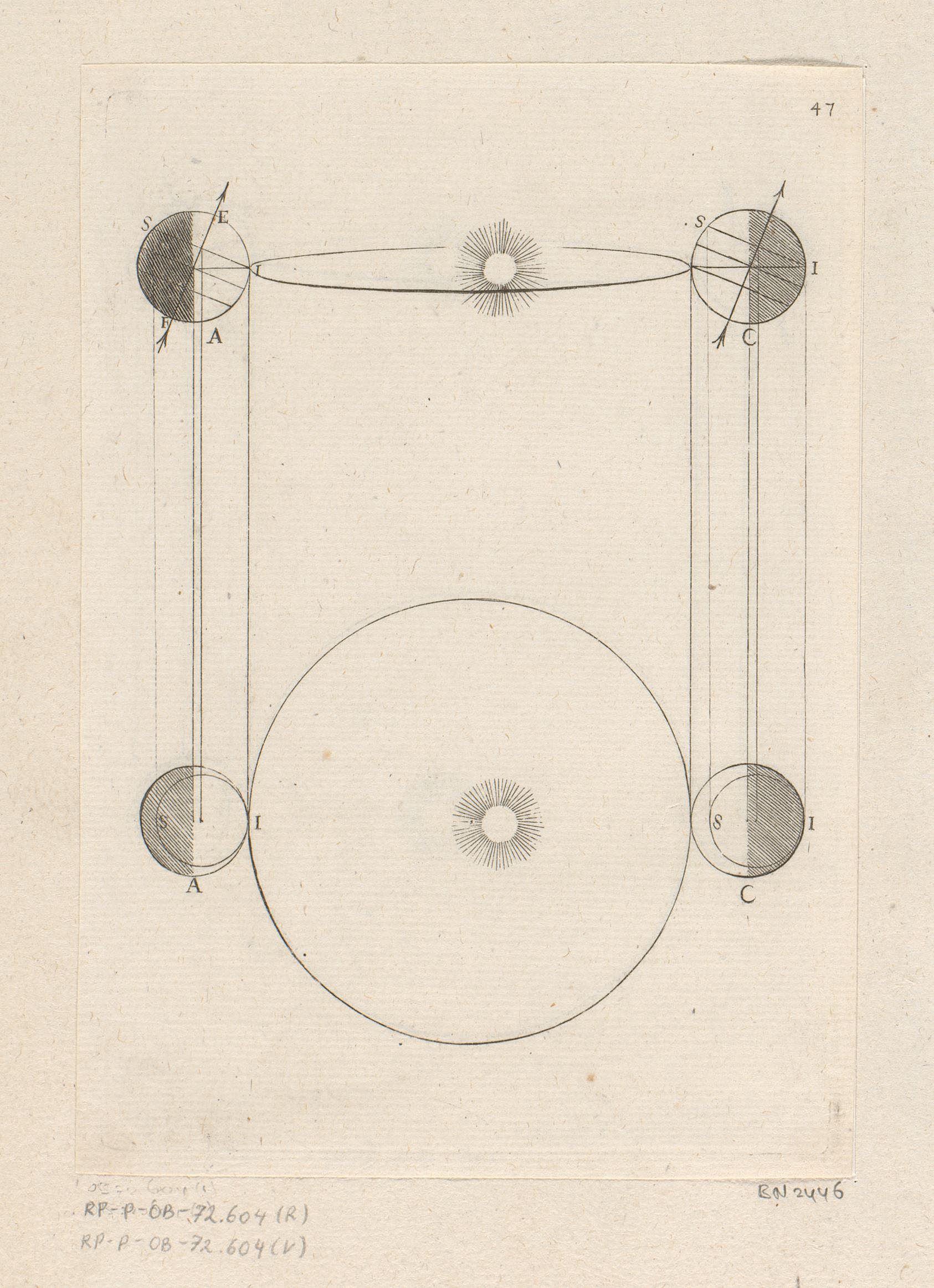
Sébastien Leclerc:
Gelijkheid van dagen en nachten tijdens zonnewende
[Equality of days and nights during solstice] (1706)
Might Be One Day
I suppose I'm not supposed to understand why anyone might choose not to dedicate themselves to encouraging domestic tranquility. This world remains no less beautiful than its potential ever promised, yet some seem to flee from every opportunity to take it easy, to make it easier. I've been writing about our incumbent, a person who never didn't have a couple of screws loose, as if he might one day catch on and start trying to catch up, but I acknowledge he's incapable; supremely incapable, as I might also be.
The tragedy remains that it could still be as it could and should be, but we reject those possibilities, and I suppose we reject the opportunities we receive as poorly-timed or otherwise not quite right.
FollowingChapters

Sebald Beham: Prodigal Son Keeping his Swine (1538)
" … wherever they might lead."
By my count, I will be finishing my thirty-second series this week. I began writing these during a period of professional despair, when I wondered if I was or ever had been a writer. I figured that if I was a writer, I could damned well write, so I set about writing an essay every morning. By the end of the first quarter, I'd produced a book-length work. I continued the exercise, perhaps only a tad bit more convinced that I might be a writer after all. Now, the end of eight years later, I find myself finishing my thirty-second such series. Honestly, I cannot quickly even list the names of all of them in sequence. As usual, software problems, by which I probably mean 'user difficulties,' have resulted in a small black hole in 2022, so that I've temporarily lost access to a few quarters' stories. Nothing I can't recover with considerable frustrating effort.
As I've neared each ending, I've started questioning what I should be doing next.
TheAmericanDisease
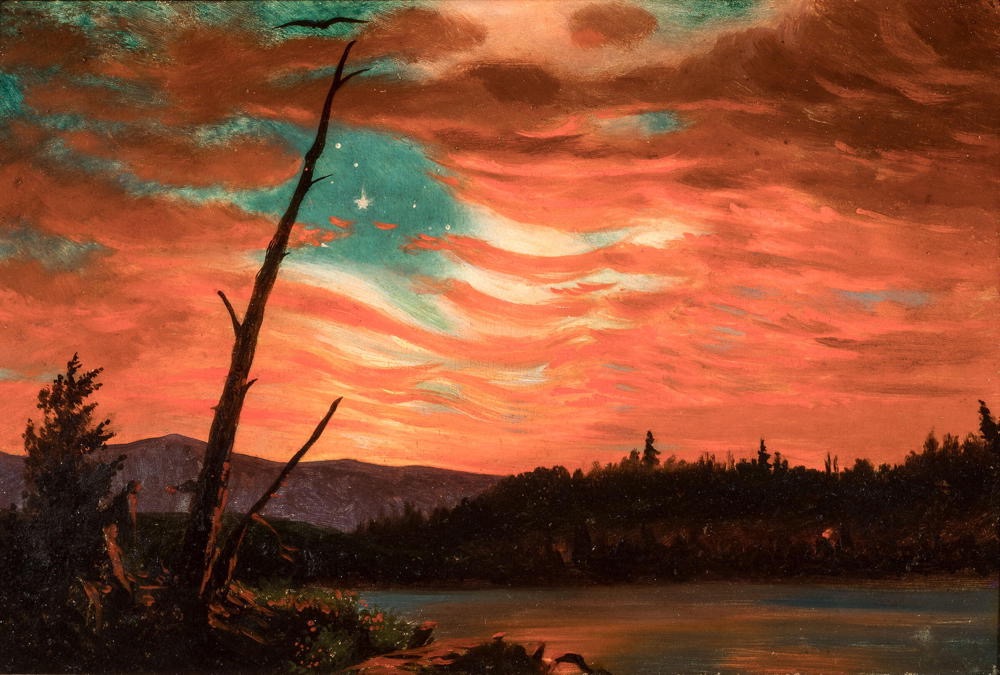
Frederic Edwin Church: Our Banner in the Sky (1861)
Gallery Text:
Within this vibrant scene of atmospheric flux, an opening within a roiling cloud layer reveals stars against a blue firmament. The barren tree in the foreground doubles as a pole for this celestial apparition of the “broad stripes and bright stars” of the U.S. flag. Following the rapid succession of political provocations that led to Confederate forces firing on Fort Sumter, Church channeled his belief in the divine righteousness of the Union cause into this patriotic visual spectacle.
As the sectarian conflict stretched from weeks into months, the oil sketch, with its allegorical river valley resembling the Catskills and the Hudson River, was translated into a popular chromolithograph. The prints were issued by the New York branch of Goupil & Cie as a subscription fundraiser to support the families of Union soldiers. This is one of the few lithographs from the series that Church painted by hand.
— —
"We live with our thumbs on the scale."
Something ails us. Something has always ailed us, back to our earliest aspirations. We firmly believed ourselves to be blessed beyond all others. We were seldom humbled in acknowledgement. We took possession and became possessed. Perhaps it was the blessing that possessed us to behave not as if we deserved the blessing but as if we were owed it.
Our original sin was greater than many others.
LostOn

Albert Sterner: Lost Angel (1932)
" … to keep myself company while I watched my potency and influence evaporate."
Almost in retrospect now, I perceive that much of the material I produced in this series would have been LostOn our incumbent, who seems especially resistant to much beyond relatively mindless memes. Of course, it's always been the case that those anyone feels really need specific information, prove incapable of absorbing its meaning. This difficulty has troubled geniuses as well as idiots, and might well serve as the ultimate dilemma. It might be that anything undertaken expressly for another's good proves incapable of delivering that result. Sarcasm holds an especially special place in this particular pantheon, for it, above all other literary forms, proves least likely for the one needing its message to receive it. A boss once confided to me that there is no place in business for sarcasm. It might be that there's really no place in this world that's safe for it, either.
But then, sarcasm might be a gift only its author can ever receive.
Slander&Libel
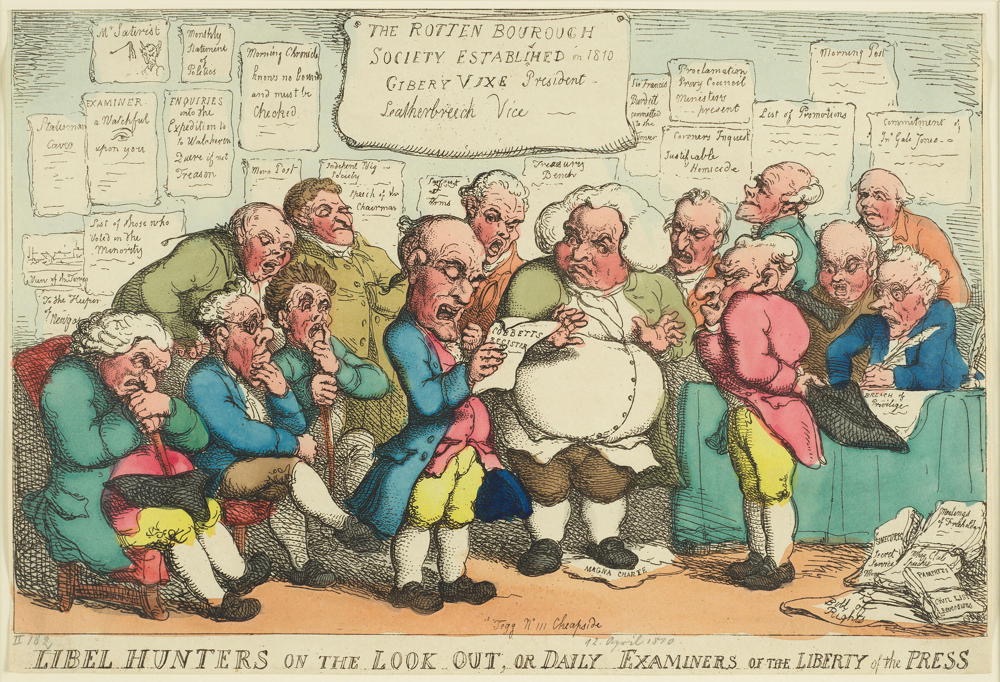
Thomas Rowlandson: Libel Hunters on the Look Out,
or Daily Examiners of the Liberty of the Press
Series/Book Title: Tegg's Caricatures
Published by Thomas Tegg (April 12, 1810)
"I've been Coping by averting my gaze and Hoping for better …"
With what have I been so actively Hoping for and Coping with through this series? Aside from the frequently malign attempts at misadministration, the mischaracterization of virtually everything has been haunting me most. During his first term, we had almost grown accustomed to the ever-growing lists of untruths produced by him and his team. It seemed that nothing ever crossing those lips came close to any truth, let alone the whole or anything but. It seemed more like the perennially partial and everything but the truth from that machine. They seemed inherently disagreeable. No sky could be characterized as blue but what one of his supporters would get their nose all out of joint to argue about the actual color, which was essentially always clearly some shade of blue. The pickier the complaint, the more weight it seemed to carry. The effort seemed primarily focused on discrediting anyone of decent character. We stopped wondering how low they might go because they always went even lower than that in their attempts to … what? Bolster their boss's delicate ego?
It becomes curiously frustrating when I know for sure that someone is lying to me. It's not that I cannot see right through each fresh fiction.
Fizzled

Henri Matisse: Woman before an Aquarium (1921–23)
Gallery Notes: In the first two decades of the 20th century, Henri Matisse visited exhibitions of Islamic art and traveled to Algeria and Morocco, where he collected pottery, textiles, and tiles. Years later, while living in Nice, France, Matisse reflected on these experiences, integrating visual elements he encountered, such as the patterned textile screen, into his paintings. In Woman before an Aquarium, the carefully subdued decorative pattern of the screen contributes to the psychologically rich, contemplative mood of this interior scene.
"Happy birthday to us, they cheered, ignoring the irrelevant incumbent."
For all of the existential dread that fueled so much of this series, little damage has resulted. Yes, calamities ensued, but very little was likely to last even to the impeachment, for he uniformly chose poorly both in terms of objectives and executors. The incompetence seemed simultaneously stunning and unsurprising, for even those not closely watching his first so-called administration understood that he had never been anybody's administrator. Gifted solely in self-promotion, none of his many promises ever came to pass.
He spawned more legal actions than anything else, and he succeeded with very few defenses except to delay what everyone always understood would not be victories.
CHoping

Pieter Bruegel, the Elder: Hope (c. 1559)
" … an obscure, long-neglected corner of the garden."
Difficult times seem to demand some definitive response, but I often feel stymied in those contexts. If I felt more empowered, I might respond more immediately, but difficult times seem especially designed to take away my authority to act. They seem to leave me with few options beyond humiliating acquiescence. I stumbled upon two unlikely superpowers, though, that, when combined, seemed to give back much of my authority to act, however unlikely these separately seem capable of reversing humiliation: Hoping and Coping. I combined these into another one of my words that annoy the spell checker: CHope. I might have better employed the gerund form, though, because these require activity to make any difference. I have been actively practicing CHoping rather than merely embodying CHope over these past nearly three months.
It doesn't matter whether I start by hoping or by coping, though starting with hoping seems the more logical departure point.
Weekly Writing Summary For The Week Ending 06/12/2025

Benoît-Louis Prévost:
Design: Legs and Feet, from Encyclopédie (1762/77)
Summer Seems Uninfluencable, Inexorable
July arrived in early June this year, bringing with it all the usual seasonal concerns. I have to relearn my coping strategies every year, for I never seem to retain their details. I lose a rhythm I must regain, like the understanding that outside work must be completed by noon or I suffer consequences. The basement stays at the same wine-cellar temperature year-round. The windows open at bedtime, before closing us in again before ten the following morning. The sounds of ceiling fans remain a constant companion. If I forget to close the window shade in front of my desk, the late afternoon sun will bake my desktop. The watering schedule seems sacred. The backyard pond finally appears to be clearing. The goldfish perform an appreciative ballet when I feed them in the late afternoon, as shadows overtake our backyard refuge. The first fires began blackening our parched landscape, and everyone seems on edge, welcoming while also dreading our most dangerous season. I can huddle through Winter and reason with Spring, but Summer seems uninfluencible, inexorable.
Un-American
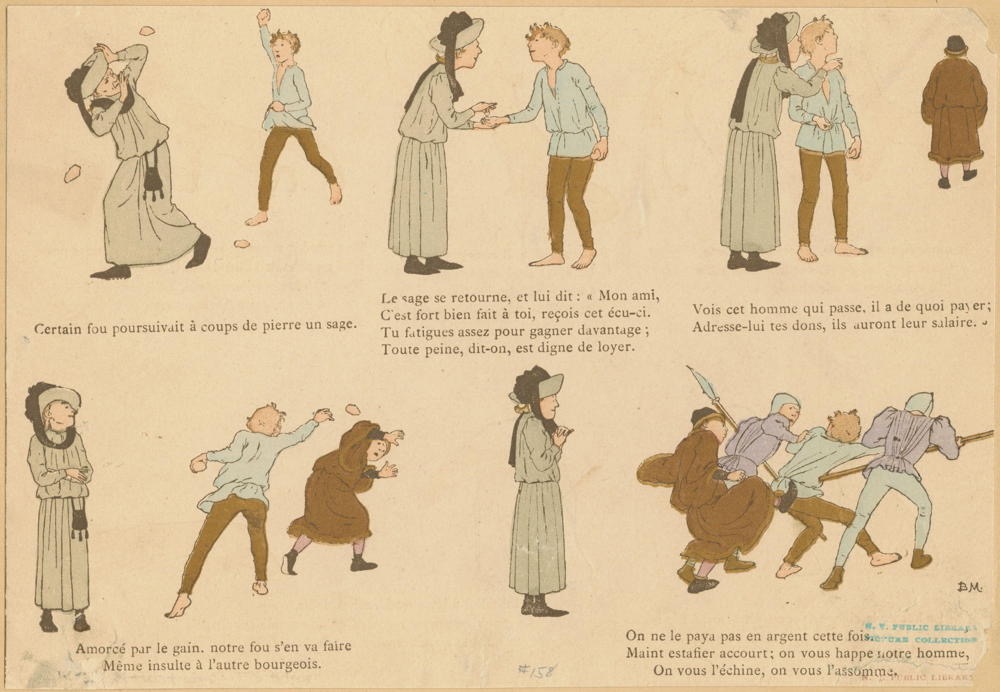
Boutet de Monvel: Un fou et un sage [A fool and a wise man] (1888)
"He might be the most significant land mass to hold office since Grover Cleveland left office."
I have a confession to make. I understand that our incumbent has been talking about arresting those who would criticize him and his [Administration]. (I was forced to place the word [Administration] within braces because the best evidence demonstrates that he and his cronies have yet to successfully administer anything.) I understand that, according to him and his minions, it should be a crime to take their lord's name in vain. I hereby publicly admit that I have committed this heinous act on more than one occasion, and often with evident satisfaction. Further, I've overtly encouraged others to do the same, sometimes even engaging in something akin to "Playing The Dozens", even resorting to gleefully engaging in bouts of The Dirty Dozens. Instead of "Yo Mama So Fat That … " I said, "Yo President So Fat That …". What's the prescribed punishment?
I'm old enough to remember when The American Way included what was then referred to as The Loyal Opposition, where our Justice Department would have never contemplated filing charges against any citizen accused of defaming any elected official, warranted or not.
Slurtenty

Ferdinand-Victor-Eugène Delacroix:
A Turk Surrenders to a Greek Horseman (1856)
Gallery Text
In the mid-1850s, Delacroix returned to themes he had treated thirty years earlier, though with an important difference. Rather than carefully distinguish literary from historical and topical subjects, he conflated them, as in this instance. Here, he draws on Byron’s description of the giaour (a Turkish slur for non-Muslims) overcoming the Turkish pasha in his poem “The Giaour, a Fragment of a Turkish Tale” (1813). To a contemporary audience, the composition could have appeared to be an episode from the Greek War of Independence (1821–32), a romantic cause célèbre that had inspired two of Delacroix’s large canvases of the 1820s. The result is a nostalgic invention that appealed to mid-century French orientalist fantasies.
"We seem the most curious crown of creation imaginable."
People often accuse me of "not getting with the program." I do not feel all that plugged in. Others seem to have access to resources I never imagined existed. One might proclaim that we might never recover from our incumbent's inept non-administration, and I usually feel the need to ask them how they know, for I can't sense a source of information that might lead anyone to conclude anything with such certainty. I usually receive some litany of evidence that doesn't quite add up to proof by my accounting, and typically leave the encounter at that. I, convinced they were talking out of their hat, and they with their confidence bolstered, neither of us any wiser.
People seem to react to uncertainties by becoming overly confident about something nobody can ever be sure about.
Paradoxysm

Weegee (Arthur Fellig): Audience Reaction (c. 1940 - c. 1950)
" … get over the idea that they'd never get another decent shave …"
Our incumbent fulfills his responsibilities under our Constitution by not fulfilling his duties under our Constitution, and has steadfastly done so since the first few seconds after solemnly swearing to, you know, fulfill his responsibilities under our Constitution, thereby joining the ever-popular cast of Zeno's favorites, right next to the barber who famously shaved everyone in town who didn't shave themselves. Who shaves that barber, Zeno wondered? He quickly realized that he'd asked a Fundamentally Unanswerable Question, commonly referred to as a FUQ. Those who routinely hand out FUQs by either speech or action tend to gum up the operation of whatever system they find themselves embedded within. The critical judgment ordinarily necessary to avoid introducing errors into systems tends to become muddled when confronting one of Zeno's insidious paradoxes. What might otherwise seem straightforward becomes essentially unresolvable.
After the conventionally unanswerable questions get asked, only to remain annoyingly unanswered, litigation understandably follows.
Opposition

Hendrick ter Brugghen (signed by artist) (1628)
Heraclitus
Gallery Notes: The Greek sage Heraclitus was known as the crying philosopher because he mourned the folly of humankind, while his opposite, Democritus (the nearby pendant), could only laugh at it. Here, Heraclitus looks like a melancholy old man. Downcast, he leans on a terrestrial globe and gestures dismissively with his left hand, as if to say: ‘All is for nought, the world will come to nothing.’

Hendrick ter Brugghen (signed by artist) (1628)
Democritus
The Greek philosophers Democritus and Heraclitus were considered to be polar opposites. In contrast to the old, melancholy Heraclitus (the nearby pendant), Democritus appears as a young, laughing hedonist. He points to the distance, as though that is where the folly of mankind is found. Together, the pair of paintings conveys a moralizing message: whether you laugh or cry, the world remains incurably foolish.
" … when we're not watching closely enough to notice."
I rarely acknowledge how steadfastly I oppose my actions. If a loyal Opposition exists, I embody it. I hesitate when I might charge. I likewise usually fail to notice how effectively everyone around me works to undermine themselves, too. It's as if we each possess a gyroscope spinning somewhere inside that tries to keep balance by introducing opposing forces into our efforts. On my better days, I feel fully capable of acknowledging these forces, and even that they sometimes seem to manage to eventually produce the opposite of whatever it was I claimed to be pursuing. The Ancient Greek Philosopher Heraclitus insisted that things inevitably become their opposite, as if this was as normal an attribute as height or weight. This trait need not necessarily spark concern. I take considerable solace in acknowledging that our incumbent must be prey to precisely this same force of nature.
I suspect he's unaware that he represents his own, most effective opposition.
FalseBelief

Albrecht Dürer: Justice, Truth, and the Future
in the Stocks before the False Judge (1526)
"These performances exhaust everyone involved."
Nobody can successfully argue that democracy isn't inefficient, but then those who argue for efficient government might misunderstand government's deeper purpose. What should justice cost? What overhead does injustice inexorably extract? Should we simply avoid engaging as a society in inherently inefficient activities that do not properly scale, like education and medicine? Should we always expect some return on our investments in governance, or are some sunk expenses, table stakes extracted as the inescapable price of engaging in governing at all?
My forebears here in the Valley They Liked So Well They Named It Twice built a grand county courthouse back near the beginning of the prior century. They raised their own taxes to accomplish this and accepted private donations from grateful immigrants. It still stands there, being remodeled and updated at considerable cost today. When we needed to expand a few of the county offices, a bankrupt bank's building was purchased rather than raise taxes to build another edifice for the ages. Which building better represents a deep respect for the institution, the wedding cake building or the more modern one? Which one might elicit pride as you enter to conduct your business, and which might evoke the sense that you're engaging in a commercial transaction rather than an essential social interaction? There are good reasons why churches traditionally build inspiring edifices for the ages.
And what of the heretics, those who cannot seem to get with the program? For the authoritarian, the heretic presents a special sort of dilemma. A leader can demand fealty but not belief, for demanded belief seems different. One can go through the motions without convincing anyone, especially themself, that they represent a true believer, and authoritarians demand, above and before all else, true belief. Loyalty tests might ensue should any questionable behavior show through, and try as one might, nobody can successfully pantomime the genuflections of any true believer unless, of course, they hold true belief. Demanding true belief presents a paradox to all but the true believer. If belief requires volition, it's provably false. Only those who truly love God get into heaven, or so the doctrine insists. Mimicking rituals doesn't quite cut it.
My son believes that my father's family might have been coerced into catholicism back in the seventeenth century. The pope at that time required everyone to take a surname if they didn't already have one, for the underlying purpose of tax administration. All those Benny the Candlemakers would have to adopt a formal name. Some chose Candlemaker while others chose Gross or Schmaltz, to reflect that their profession essentially entailed collecting unused fat and rendering it into candles. The chosen name would have to be called out in the town square by the tax collector, and those who chose Gross or Schmaltz as their surname would force the collector to call out words that were then embarrassing to proclaim. However, they were more than just early tax protesters. Some were Jews who had been coerced into practicing catholicism. The first Holy Roman Emperor, Charlemagne, a distant grandfather of mine, earned his designation by coercing heathens into the church, often at the point of a sword. It might be true that most catholics were initially forced into their faith, though over subsequent generations, many grew into more willing observance.
FalseBelief has never been uncommon. Every culture frowns upon some behavior or practice, and some within each culture get born sideways to the prevailing ways. The authoritarian always insists that their gays choose to be perverts, but the perversion originates in the rules for exclusion adopted by those in charge. They issue Be Spontaneous Paradoxes, demanding that true believers demonstrate their faith with their behaviors because they want to. Those who violate these edicts either overtly or because they cannot successfully mimic a faith they do not possess, whether through defiance or nature, become the enemy from within, and their presence cannot be countenanced. Furthermore, it has always been the case that any decent authoritarian creates a cadre of those they know for certain can't comply with their demands. These became his handy heretics who can be punished to demonstrate what happens when someone defies his divinely inspired authority.
The continued insistence finally encourages FalseBelief, even and especially among the formerly truer believers. The premise upon which their faith relied could not maintain itself in practice. The authorities cannot hold the FalseBeliever in check any more than the FalseBelievers can continue pretending to want to believe. These performances exhaust everyone involved. As Bonnie Raitt said, “I can't make you love me if you don't. I can't make your heart feel something it won't." © 1991 by Universal Music - Mgb Songs, Almo Music Corp., Brio Blues Music
©2025 by David A. Schmaltz - all rights reserved
Ideological

Henry Inman: [Tah-Col-o-Quoit (Rising Cloud)],
Asakiwaki/Sauk Warrior;
representative of the Sauk and Fox coalition
Former Title: [Tah (sha)-col-o-quoit], Sauk and Fox Delegate
(c. 1832-1834)
" … promising greatness as if from the mouth of God."
Perhaps the primary difference between what most of us might recognize as regular order and the MAGA World manifesting before us might be best acknowledged as the fundamental difference between policy-driven and ideology-driven governance. Policy-driven governance relies on agreements negotiated between often opposing viewpoints, as embodied in the 'Out of Many, One' notion, codified as the official motto of this nation. This characterization deftly encapsulates democracy in practice. It's naturally full of contention but also well-practiced as resolution. For every disagreement, some compromise might exist, and the primary purpose of self-governance must be to find these and agree to live within them. Absolutism cannot coexist within democracy's inherent pluralism. There's right, wrong, and left: right or wrong, what matters might always be whatever's left after the passionate argument.
What's left is policy, a statement of agreement intended to transcend right and wrong.
Weekly Writing Summary For The Week Ending 06/05/2025

John Simmons: Man With A Pistol, Chicago (1965)
My Aches and Pains
Aging turns out to work differently than I'd imagined. I thought wisdom might visit, but so far, it hasn't. I see my contemporaries generally acting more foolish, which doesn't come as much of a surprise. Disease has ravaged many, and this wasn't unexpected, except I expected some justice to be represented in those it chose. It hasn't. It might be an illusion, but the innocent seem more vulnerable than any reasonable supreme being would have deigned. The cost of aging gets exacted in aches and pains, which ultimately seem inescapable. The meaning of those gets transposed into indicators of well-being. In our youth, well-being was gauged by the absence of aches and pains. Now, I can tell I'm well by their presence. They seem to be there not so much as an alarm or caution, but to reassure me. When my hands ache, they remind me of what I accomplished the day before. I dare not waste my precious remaining time chasing cures for these indicators, for what was once evidence of illness has become the very soul of my wellness. I have become my aches and pains.
SmallExtraordinaries

Francis Seymour Haden: Kensington Gardens, No. I (small plate) (1859)
" … bound as well as determined to drag itself through Hell again."
As our world continues to draw itself ever closer to Hell, I am gaining a renewed appreciation for SmallExtraordinaries. These tend to be tiny and easily overlooked. In most circumstances, I overlook these and never even notice my omission. In ordinary times, these go unappreciated because the foreground tends to consume the bulk of attention. When, as now, I find myself suddenly living in truly interesting times, I tend to need to avert my eyes. I understand the inexorable momentum of every slow-moving train crashing. I've seen that movie too many times and require no reinforcement to better recall the resulting calamity. I tend to become a little obsessive, as if obsessive ever comes in little sizes. I can become consumed with the resonance of demons and devils when civilization seems determined to run itself through Hell again.
I require respite now, and I have been finding it in SmallExtraordinaries.
EncroachingIrrelevance

Unknown Artist: Picture (17th century)
"Such always was the way with this world."
Purpose often appears quite independent of anyone's intention. It might show after considerable effort. Whether that effort seems a success or a failure might not matter, for every system discloses its purpose through its product. The meaning of the effort appears in whatever that effort produced, however it might be judged. Many naive notions crumble beneath humbling realizations. Nobody's life turns out to be a smooth upward progression where one inevitably learns better to yield ever-increasing rewards. No, we each experience setbacks and thrusts forward, some of which, seemingly inevitably, sum to something different than we thought we had invested. Any serious search for anything occasionally results in producing its opposite; even the Ancient Greeks understood this.
Not one of us could possibly be exempted from this calculus.
BillionHerecy

Jean Louis Forain: In the Wings (1899)
ABOUT THIS ARTWORK
In this backstage view of a Parisian opera house, ballerinas field advances from elegantly dressed male patrons, who approach them in pairs. The stoic dancer in the foreground, chin up and eyes downcast, absorbs the penetrating gaze of one large man while another looms just behind her, so close that his black top hat overlaps with her orange headdress. In 19th-century Paris, male abonnés (season ticket holders) had special access to a back room where they could socialize while watching the ballerinas warm up. Many took advantage of this privilege to sexually exploit the young dancers, who were well aware that their careers depended upon the good favor of this donor class.
——
"If you're so smart, why aren't you rich?"
Question sparked by common misconception
Our culture holds at least ten thousand curious convictions. Prominent among these are the ones insisting that wealth, and especially great wealth, imparts a wide variety of superpowers. Most notable among these must be the insistence that the wealthy are probably the smartest bears in every room, when direct evidence of this seems sorely absent. An inverse insistence might gain greater credence if anybody had the gumption to proclaim it. There does, in practice, appear to be a reverse correlation between great wealth and great wisdom, intelligence, and even kindness. I can inadvertently wound only those closest to me, but the Terribly Wealthy can crush many by simply thoughtlessly turning around, for their range of influence spreads much more widely than mine. I can choose not to go out for coffee, with nobody the worse for it, but let a billionaire opt out of their regular purchase, and it could be the death of a business. The very, very wealthy seem preternaturally responsible for many, and so seem required to practice a mandatory Noblesse Oblige.
Unfortunately, not every Terribly Wealthy person received the memo insisting upon this responsibility.
LifelongLearning

Jack Gould: Untitled
(boys and girls learning ballroom dancing) (c. 1950)
" … Lifelong Rediscovery of what I'd apparently already learned before."
I understand that I am expected to be a LifelongLearner, even though I was always a hesitant one. From my earliest days, I recall fearing the acquisition of additional information, as if it might harm me, and I can see how this innate sense might have been evolutionarily advantageous. I don't so much despise knowing; it's the acquisition that I question, for it seems like I have one of those tile puzzles in my head, and I must fiddle with it to make space for any incoming information that anybody might expect me to retain. It’s not the exposure to new concepts that I question, but the absorption of them. I have always felt like a saturated sponge.
The start of a semester in school was always terrifying, for the expectation usually seemed to be that I should already know the inevitably new material I was going to be exposed to.
Pop-Up

Attributed to Richard Parkes Bonington: Small Figures and Tent (1823)
" … while the rest of the world gets distracted going to Hell."
While The World was distracted going to Hell, I volunteered to refinish the vintage trim boards I'd saved when removing the front porch ceiling. I had the necessary equipment and experience to successfully complete the job, but I needed a paint shop. Some of the boards ran longer than my garage. I needed covered space so I could work through sun and rain. The sun this time of year could render shade essential. Rain was also always possible, and rain and paint do not mix. The answer was some sort of tent, a Pop-Up Paint Shop. The Muse bought a fancy Pop-Up canopy when she was running for Port Commissioner, to use at the 4th of July gathering in the park. It had been in its case in the basement since, except when she'd loaned it out to another candidate for the same purpose the following summer. She promised that I could use her fancy canopy, but I wanted something less precious.
Our first Pop-Up canopy, bought to use as a paint shop in the driveway, was ultimately laid low by a rainstorm.
Intrepid

Henry Hitchings: Oregon--Beyond the South Pass (c. 1860)
——
Dedicated to the memory of
The Intrepid Pioneers
Who came with the
First Wagon Train
In 1843 over the
Old Oregon Trail
And Saved the "Oregon County"
To the United States.
Erected by Old Oregon Trail Ass'n.
July 4, 1923
Dedicated by
Warren G. Harding
President of the
United States
July 3, 1923
——
" … we have an uninterrupted history of falling somewhat short of our lofty ideals."
I have lately become inordinately interested in the history of my surroundings. I was raised here, and, like anybody, learned to be unimpressed with what I experienced daily from my earliest breaths. Those unfortunate enough to be born into the center of anything understand. Those who were born in Paris, overlooking the Eiffel Tower, had their gauges set to impossible standards so that it might take a true cataclysm to even distantly impress them. Likewise, for me, who only later came to understand that I had been raised very near to the center of the universe, where gravity reliably works right. I found myself secretly pitying those whom I, by most rights, should have envied. Those who'd grown up in New York City or London seemed impoverished in comparison. Those who remained ignorant of my home country all seemed like comparative bumpkins to me, who by all rights probably appeared even more bumkin-ish to them.
Pride of place barely scratches the surface of my feelings about my home country, because I genuinely feel 'of' the place.
Weekly Writing Summary For The Week Ending 05/29/2025

Adolph Menzel: The End (19th century)
Failing to Find What I Sought
The Muse and I think of ourselves as avid foragers, though we only forage for a few items, and we don't always manage to find what we're seeking. Last August, we headed up into our usual hunting grounds seeking Wenaha Black Currants, a local variation of the most popular fruit in Europe. We lagged the season, the bushes already barren after a hotter-than-usual July. Better luck next year, we said, and moved on to take the long way home. Along the way, we stumbled upon an enormous huckleberry patch, which we proceeded to enthusiastically raid. The Muse garnished desserts this week with leftover frozen huckleberries from that fortunate accident. (She's assured me that she tagged that secret patch so we can revisit it later this summer.)
This week, I toodled up into the wilderness again, this time searching for the sometimes elusive Morel, a pine cone-shaped mushroom much prized by the natives.
Systemantics2

Ben Shahn: Untitled [Borobudur, Java]
(January 26, 1960-February 2, 1960)
"Woe be to anybody believing they know better than even the simplest system, for they are the most easily fooled."
A panel of three judges, one nominated by our incumbent the last time he pretended to be president, found his Liberation Day tariff scheme unconstitutional and, therefore, illegal, ordering the administration to immediately stop collecting these extortions and to refund any already gathered. This ruling, of course, appealed, guts the incumbent's aggressive and ill-conceived transformation of our economy from the envy of the world to its pity. Our incumbent insists upon employing simple-minded strategies to achieve all of his aims, and such strategies hold little promise when pitted against mature governing systems.
It's not simply that the systems he attacks have been around for ages; they are each extremely complex.
Alonely

Figure 1 
Figure 2
Figure 1: Charles Howard Hodges:
Portret van een onbekende man, het hoofd niet getekend
Portrait of an unknown man, the head not drawn
(1774 - 1837)
Figure 2: Charles Howard Hodges:
Portret van onbekende heer
Portrait of unknown gentleman
(1774 - 1837)
"I remain a hale enough fellow, best met by myself …"
In this world at this time, I characterize myself as not so much alone or lonely but Alonely. I spend a great deal of my time alone. I rise extremely early to work in isolation, finishing my efforts just before The Muse rises to begin her day. A short time later, I query her about her schedule, for as a public servant, she almost always has an active agenda: meetings. I listen impasively as I learn what I might expect from the day. Typically, she's gone before noon, returning several times between sessions. She doesn't have an evening meeting every evening, but a late afternoon session will still likely delay supper. We're almost always fed by eight or eight-thirty. I head for bed around nine.
There's little time in any day for us to while away the time together.
MemorialDay

John J. A. Murphy: Memories (20th century)
"We left feeling more connected …"
Come MemorialDay, the iris have gotten closer to gone. The Peonies and roses have just started. We have plenty of blossoms to share a few with our dearly departeds. The Muse and I observe MemorialDay by toodling out to the local cemetery to play hide-and-seek with our forebears. We visit graves in a circular sequence, without regard to seniority. We always start with my great-great-grandparents, people I knew when I was small, both born in the 1870s. I remember sitting on my great-great-grandmother's broad lap in the rocking chair. The Muse later recovered it, and it now sits in our library room, still squeaking as it always has. My great-great-grandfather Luther's father, was a Civil War veteran who died of a war-weakened heart after crossing the Oregon Trail three times. His grave was lost to the ages near a dusty Eastern Oregon rimrock cowtown.
We always lose our way at first, misremembering exact locations.
Twenty-Three

Willem Claesz. Heda: Still Life with a Gilt Cup (1635)
Gallery Comments:
The range of grey tonalities that Willem Heda could paint is astounding. With this subtle palette, he deftly rendered the objects – of pewter, silver, damask, glass and mother-of-pearl – on this table. A few yellow and ochre accents compliment this refined interplay of colours. Heda specialized in near monochromatic still lifes, so-called ‘tonal banquet pieces’.
——
" … to revel in what randomly colliding atoms can sometimes produce."
I met Mark on the same day I met The Muse, so it seemed especially fitting that he'd made the long trek across the state to visit on our wedding anniversary, May 25. We were married on 5/25/02, and this year's anniversary would fall on 5/25/25, Twenty-Three years later. Our life together has been characterized by fives and twos by inadvertent design. The Muse made a fabulous veal scallopini supper, and we sat around the table reminiscing. Our wedding had been a cooperative affair. Everyone invited had also been asked to help in some way. The result was the product of everyone present. We celebrated being together as much as we celebrated the marriage. On reflection, over supper, we recalled all who were no longer with us, twenty-three years later.
We were in the same house, now extensively renovated.
Thinning

Jacques Callot: Gardener Pruning a Shrub (17th century)
"My garden tolerates my well-intended presence."
I think of gardening as a nurturing activity, though that description misrepresents the bulk of my effort. Much, if not most, of the time, I spend communing with nature there, defending myself against encroaching fertility rather than trying to encourage it. Sure, I maintain my compost heap, recycling every non-meat bit of kitchen waste back into superrich soil, but the plantings here hardly need any further encouragement. The soil, after more than twenty years of continuous improvement, has reached a level of self-sustainability. None of it will ever need much fertilizer or nurturing in my lifetime. Water whatever into the soil, and it will try to take over. Therefore, I spend most of my gardening time discouraging plants from taking over.
As with any garden, weeds prove to be the most prolific plants.
Aftering

Edgar Degas: After the Bath III (1891–92)
"I'll be actively Aftering until this nightmare's over."
During an intolerable time, I appreciate even more fully the human capacity to project into a more satisfying future. Even if it comes in the form of daydreaming, there's something supremely satisfying about it. I can seemingly leave present troubles behind me for a spell and heal myself there. These respites help render difficult experiences more tolerable and prove to be a godsend for those of us who occasionally find ourselves overwhelmed. I find reassurances in the realization that, however awful, every present proves fleeting, never to return. If today seems awful, tomorrow and especially the days after, promise at least the potential of better.
Those who believe they can extend their current streak indefinitely tend to be the most disappointed in the end.
Weekly Writing Summary For The Week Ending 05/22/2025

Jan Saenredam: Spring (1601)
Mastery Was Always Illusory
I swear that I used to understand how this world works, though I probably never did. It might be that none of us ever understood or could understand. We get by almost exclusively via lucky guesses and collaborations. Without either, we'd be sunk. I over-rely upon The Muse, who understands more than I ever knew needed to be understood. She relies upon me, too, though. Nobody is self-reliant anymore, and never was. I feel increasingly vulnerable. I'm finally arriving at the age where I can no longer deny that I've been aging. My doctor concluded that I'm still street-worthy after my annual physical last week, just before I managed to wretch out my back again. Then I caught a common cold, a not-so-common experience anymore. I used to be able to set up a Zoom call, but the application has become user-hostile as it's claimed to contain more intelligence. I miss the dumber version that reliably remembered me from one session to the next. Now, I have to invoke a Pastword remembering app in order to access my account, and the smarter new version seems to assign a unique account number to each session, so regulars cannot use their familiar logins. Neither can I. I'd ask why if I didn't already know the answer. Entropy rules here and always has. Mastery was always illusory.
Futuristic

Corita Kent (Sister Mary Corita):
let the sun shine (1968)
Inscriptions and Marks: Signed: l.r.: Corita
Printed text reads: LET THE SUN SHINE IN
the creative revolution—to take a chunk of the imagined future and put it into the present— to follow the law of the future and live it in the present. Waskow
inscription: l.l., in graphite: 68-69-E
"Let's focus, as we almost always have, on Making America Great Like Never Before."
The American Way might be most properly described as Futuristic. We live in our future. Dissatisfied with our present, we project and take ownership of a better future. We are gleefully mortgaged. In the fifties and sixties, when I was a kid, the future seemed more present than it has ever been since. Since then, we've seen a slow erosion of who and what we were once destined to become. We grew up to disappoint ourselves. Conservatives, always a presence, began asserting a backward-looking dominion over us, as if our futures featured sin instead of the always before expected salvation. They equated mortgages with penury and our unique sort of prosperity with degradation. They worshiped tax cuts and balanced budgets, false gods from the distant past, over our proven, reliable gods from our future. They promised less and delivered worse, proving themselves wildly unpopular. They'd get elected by lying, by playing bait-and-switch politics.
Whomever reviles their future undermines their past, for our past holds no relevance except that which is delivered by its diligence.
DoubleBounding

Will Hicock Low:
Pale Grew Her Immortality,
For Woe of All These Lovers (1885)
"It was already plenty great enough …"
One cannot exercise MAGA-style governance and retain a democracy because the two seem in fundamental opposition with each other. MAGA demands authoritarian leadership, someone, above all, willing to tell others what to do. It also presumes that the majority will passively follow, regardless of the questionable direction from the top. Democracy assumes almost the precise opposite: a populace willing to be actively involved in deciding direction and the gumption to follow properly determined decisions. Both MAGA and democracy follow their leader. The MAGA leader is a person, while the law leads democracies.
Once elected, MAGA faced a dilemma, for the country remained a democracy rather than an autocracy.
Prosterity
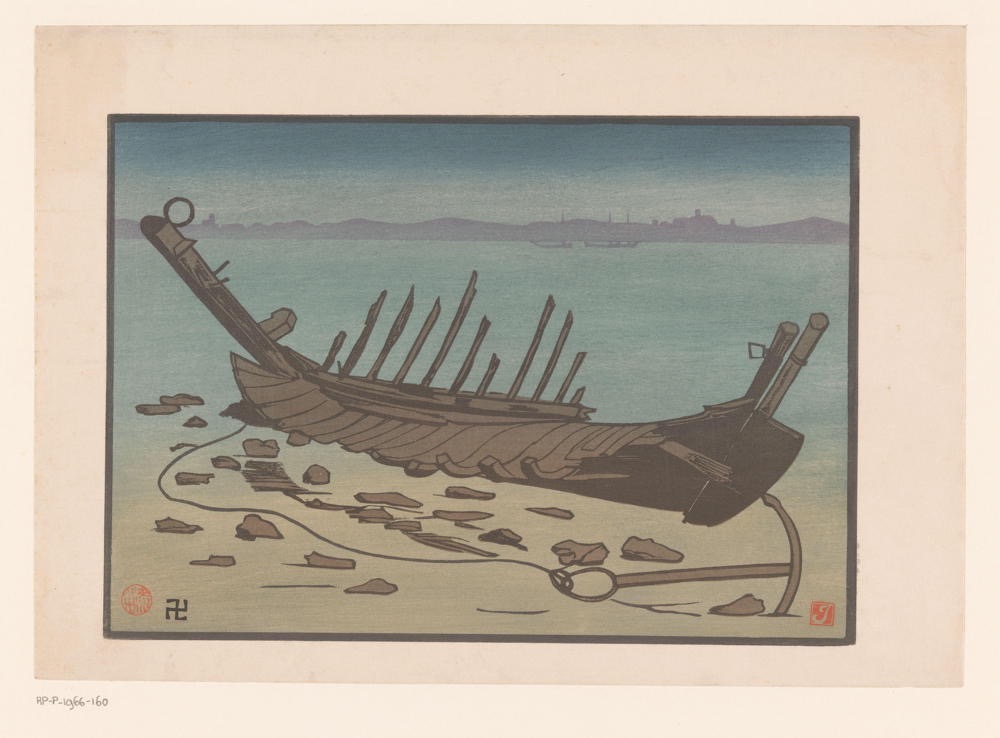
Prosper-Alphonse Isaac:
Wrak van roeiboot op strand in Cancale
[Wreck of rowing boat on beach in Cancale] (c. 1912)
"I pray that we might come to understand one day."
Those buildings fortunate enough to still have businesses leasing their street-level spaces are nevertheless hollow above their second floor. Portland, Seattle, and San Francisco mirror each other. A generation ago, their downtowns bustled with economic activity. Each was the absolute envy of the other as postwar prosperity reversed their wartime austerity. Actual prosperity resulted. Since, a series of austerity-promoting presidents and feckless Congresses have managed to pretty much hollow out the promise evident on each street corner then. Now, Portland shows no shortage of first-class hotel rooms that overlook empty windows in century-old, once-proud commercial edifices. The Starbucks doesn't have seats, only stand-up tables to discourage the homeless from encamping there. The visiting writer can't, as he once casually did, find a corner to create his morning missive. He takes one to-go instead and stumbles back to his tiny first-class hotel room, with altogether too much furniture, overlooking near absolute devastation.
The austere years bought us little.
Dementia

Unknown Artist: ‘Crazy Quilt’ Parlor Throw (1887/88)
Chicopee Falls, Massachusetts, United States
"They were neither patriotism nor loyalty, but the effects of top-down Dementia."
A case could be made that our incumbent suffers from Dementia. The evidence seems overwhelming unless presented to a partisan supporter, who might as well also be suffering from the same disorder. The behavior of the incumbent's party members exhibits the same dysfunction evident in their leader. Fish. Water. They cannot see it. The rest of us can't help but see it in nearly every action of both the incumbent and his followers. Nothing else rationally explains the behaviors. They're not entirely logical, but neither are they merely irrational. They seem non-rational, not guided by reason or explainable through a reasonable description. They are not wholly random, but somewhat more patterned, with a pattern that probably best resembles a crazy quilt. It's all of one kind yet never rational. Empassioned explanations utterly fail to explain anything. People seem patient, perhaps too patient given the gravity of the resulting situation. The whole administration resonates with the clearly disturbed behavior of its leader.
This response seems perfectly understandable.
Dubiety

Heinrich Hoerle: Worker
(Self-Portrait in Front of Trees and Chimneys)
Arbeiter (Selbstbildnis vor Bäumen und Schornsteinen) (1931)
"Justice, like freedom, stands on firmer premises than the dubious."
Never before in all history has a presidency attempted to administer upon such dubious premises. I could label this the Dubiety Presidency. Each proclamation has been justified by citing some obscure ruling obviously used out of its original context. An insistence that our present condition legally puts us on a war footing, for instance. Congress might tolerate these imaginings, but so far, the courts, as has always been their purpose, have remained dubious. They call a questionable justification into question. They question baseless accusations. They restore a much-needed sense of reason to the proceedings. The fever dream that always was MAGA was never based on anything even distantly resembling reason or fact. It was impure emotion packaged as if it might qualify as justification when it wasn't, and it couldn't succeed. The vagaries of our system allow an incumbent certain latitude. He can act first, knowing he'll only be questioned later. Later, he will have already effected some change, inflicted genuine damage. Then his act becomes something in need of reclaimation. Employees, acting in good faith, follow his directives only to become complicit in some grave miscarriages once the courts find against the incumbent again.
It's become a pattern now.
WordSalad
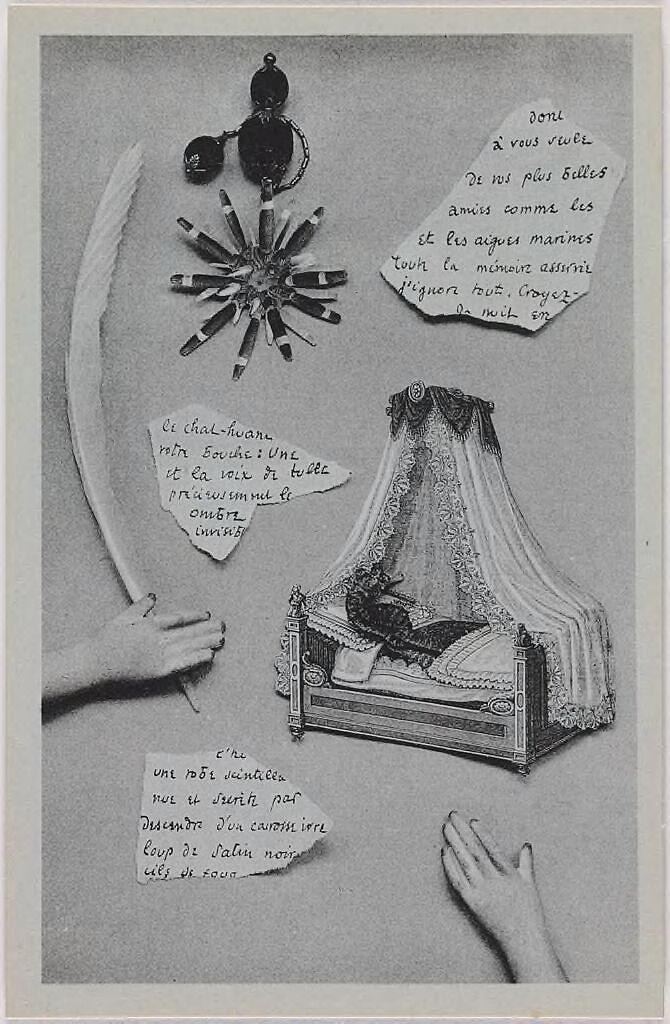
Georges Hugnet: Au pied de la Lettre/Word for word
Series/Book Title: The Guaranteed Surrealist Postcard Series
(1937)
"He does not want to be accurately understood."
The same menu every meal with this guy. Breakfast, lunch, dinner, and snacks - the same things always come to the table. Standing up, sitting down, or on the run, it remains identical. Furthermore, it tastes terrible. The mouth feel remains the same. It's always too salty and never quite sweet enough, though it's obvious sometimes he's tried to sugar-coat it, often with saccharine substitute. Still, it never manages to taste very different. It's somewhere south of gourmet while still north of greasy spoon. It always comes too soon and stays too long. It's not just him, though he's clearly the instigator. Nobody else could create such culinary abominations. Even when slathered with that inevitably gloppy dressing and gaudy flags flying to distract, it remains the same incomprehensible flavor to even the most sophisticated palate. He deals exclusively in WordSalad.
Nobody, not even the incredibly well-paid shill commentators, ever really understands what he's saying.
Weekly Writing Summary For The Week Ending 05/15/2025
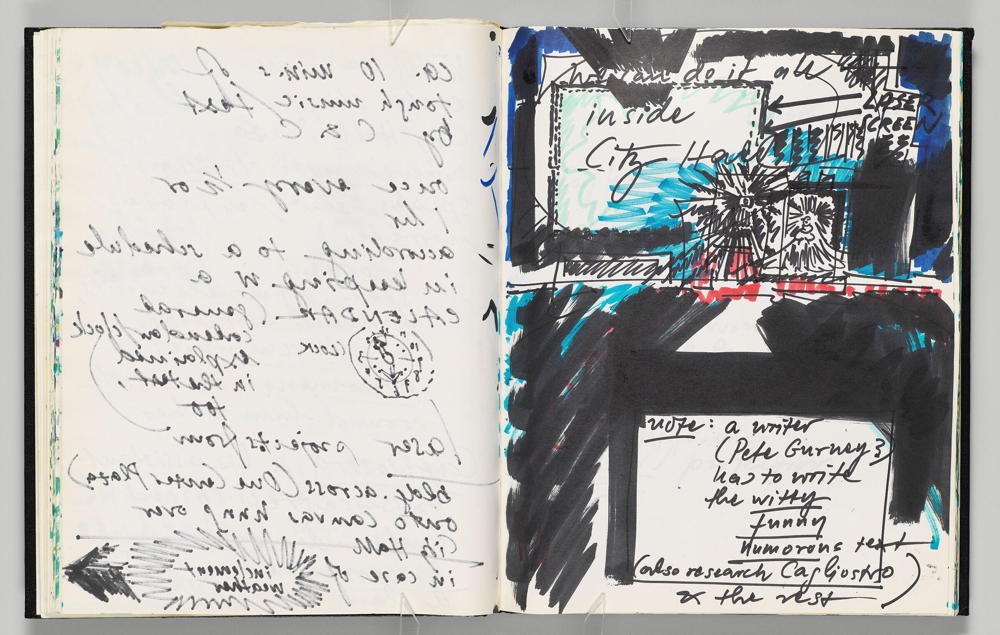
Otto Piene: Untitled
(bleed-through of previous page, left page);
Untitled (notes with design for stage and screen, right page)
Series/Book Title: Sketchbook:
"Retrospective of Inflatables"/"Tobago faces"/Landscapes
(1984)
So Much For The Speeders' Experience
If I could wish everyone one experience, I might choose to bless them with a leisurely toodle through The Palouse in Spring. Much of the year, The Palouse seems an unlikely wish to bestow on anyone. In High Spring, though, anyone might readily understand the blessing. It's green where most of its year knows only buff beige. It's surprisingly yellow as farmers have increasingly embraced Canola seed culture as an antidote to abysmal export wheat markets. It's lonely highway, two-lane blacktop, when you might have been convinced freeways had conquered and ruled every worthwhile route to anywhere. It's the slow way there, uninteresting to anyone still striving to get there first. Oh, there are plenty of drivers who haven't read the memo, passing on blind turns, apparently more anxious to arrive on time than alive, but those have always been there and are easily tolerated by anyone tenaciously insisting that they always win. I pump my brakes to ensure they can return to their proper lane before they execute the Wylie Coyote they seem insistent upon manifesting. Every second I slow prolongs my primal experience. This was never a race. I suspect that The Palouse might be best experienced at the speed of a walking Horse, the way my ancestors traveled. They could breathe in the scents that only ever manifested that one week in Spring, and for the duration of their passage, they were in the center of every possible universe. So much for the speeders' experience.
Weaponizing
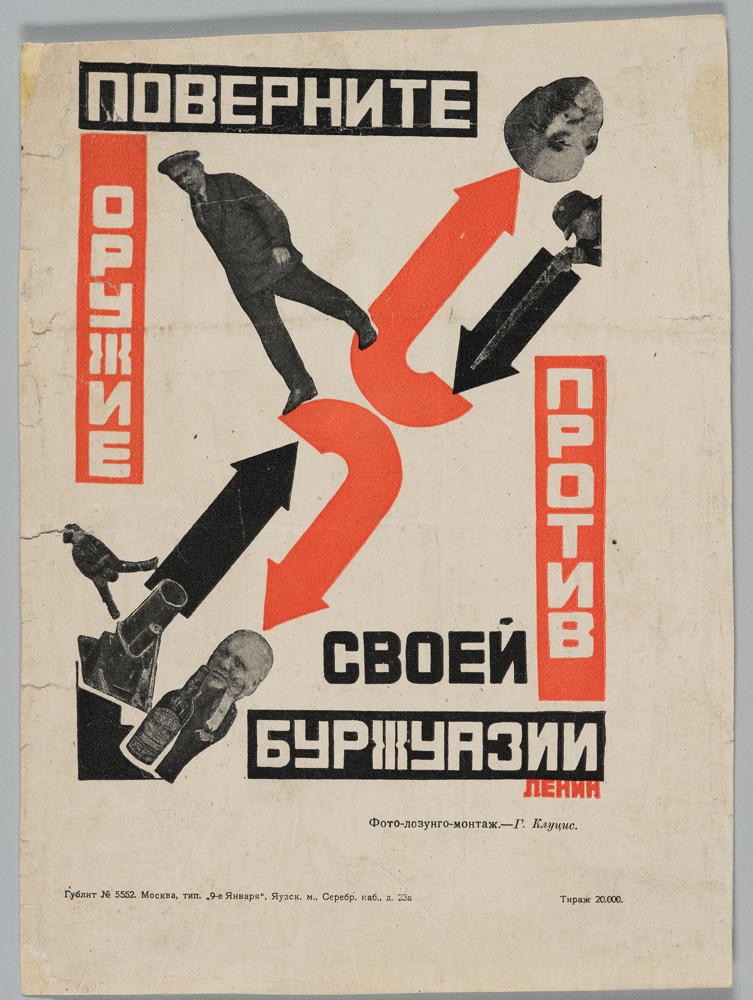
Gustavs Klucis (Klutsis):
Turn Your Weapons Against the Soviet Bourgeoisie
Original Language Title:
ПОВЕРНИТЕ ОРУЖИЕ ПРОТИВ СВОЕИ БУРЖУАЗИИ
(c. 1924)
"We might as well believe ourselves blessed to have elected
just this sort of incumbent to remind us who we always were."
The sickly scent of true desperation accompanies our incumbent's every official action. They seem overly staged, as if the production assistant feared not being noticed. Their content often proves incomprehensible, much like the campaign "rallies" that preceded this presidency. The pronouncements do not properly parse and resolve to the fundamentally incomprehensible, though a deep sense of anger inevitably shows through the cheap, glitzy veneer. One finally concludes that he thinks he’s exacting revenge from an earlier assault to mend some essentially unhealable wound. These staged performances amount to elaborate defensive stances. It might seem as though he's actively assaulting much of what we hold dear, but he's more likely frantically shoring up a defensive perimeter he deeply fears has already failed him. The more outrageous the messages, the less convincing they seem. He's already throwing the kitchen sink into action, a sure and certain confirmation that he deeply fears he's losing, that he's likely already lost.
He accuses his predecessors of "Weaponizing" our government, but it's he who's engaged in weaponization, whatever that might mean.
Venge

Adrian van de Venne:
The Donkey Laden with Food,
from Emblematic Figures of Animals (1633)
ABOUT THIS ARTWORK
Prints of animals could be accurate and fanciful simultaneously. This finely engraved yet slightly caricatured scene from Aesop’s Fables depicts a donkey laden with fine food and wine who nonetheless happily gnaws at a prickly thistle instead. Moral interpretations of the text have ranged from “One man’s meat is another man’s poison” to a critique of stinginess. Though unsigned, this humorous image of feast and famine set off a chain of copies, ironically ending with a dozen Aesop roundels that decorated the back of trenchers, wooden plates used for the final fruit and nut course in England.
————
"It's probably nobody's friend and certainly everybody's enemy."
With this incumbent, a raft of archaic usages appears to have made a comeback. Perhaps it's the conservative lilt, which intends to return to simpler times, but terms not seen in public since the Old Testament have been appearing on the lips of even the most unqualified cabinet secretaries. Many commentators have compared their vocabulary to that which emerged in 1930s Germany, where certain terms had to be resurrected to describe the horrors being initiated. Nobody had seen anything like them since at least the Dark Ages, and, sure enough, the emerging vocabulary did, indeed, accompany a replaying of some of the Dark Ages' greatest hits. Proper euphemisms gained popularity to avoid describing what was actually happening, just as they have today. Concentration Camp looked better in print than the more direct Death Factory, and the meaning of rights and freedoms were flipped on their heads for the duration. Rights became unspeakable obligations. Freedoms became insidious conscription. Life became death, and death equated with a better life.
Venge has become perhaps the most frequently used.
Emoluments
El Greco (Domenikos Theotokopoulos):
Christ Driving the Money Changers from the Temple
(c. 1570–75)
"I suspect his first impeachment indictment will focus upon his many violations of the Emoluments Clause."
What's in it for me? has never been a question that comes very naturally to me. My birth family raised me under a more self-sacrificial ethic. I always asked what I could do for my country rather than what it might do for me. I do not believe that everybody shares my perspective. Indeed, when reflective, I don't share it, myself, because I learned through sometimes painful repetition that it's often better if I understand what's in it for me when I engage. Not to get all self-centered about it, but I discovered that I also have valid needs and that it need not be all about me for it to have some alluring something in it should I choose to engage. The choice matters. I was raised to default toward self-sacrifice, as if dimninishing myself should serve as adequate payment. I'm still apt to default in that direction and I often require considerable circumspection to catch myself before I martyr myself again.
Some were apparently raised with an opposite ethic, though theirs hardly seems ethical to my reconning. They wouldn't think of lifting a finger without an explicit agreement concerning the resulting payment, and sometimes even requiring a prepayment or deposit to initiate engagement. Their employers are in their debt. The ego strength supporting this stance astounds and confuses me. What could lead anyone to believe they're worth any outlay before they've delivered anything on their promise? This does not smell like service to me. Nor does it resemble what I consider a free or fair exchange. Render the service, then accept payment. In extreme cases, perhaps create a sinking fund to hold the funds until the contrracted effort's acknowledged as done.
Our incumbent observes the latter order. He seems in no way self-sacrificial. Historically, every prior holder of that office has felt as though it was honor enough to simply hold the office. The trust extended by the voters represented essentially a prepayment of whatever salary the execution of the office's duties might provide. This guy has been scheming to bring in more personal revenue from his first second in office. It has often seemed as if he sought the role just for the income it would attract to him, personally. The actual responsibilities of the office seem secondary to how he conducts business. He comes across as a definite Me First character, which is to say he seems to lack some essentially character required of those who hold high public office. The Presidency, especially, was intended to be fulfilled more selflessly than selfishly.
Article I, Section 9, Clause 8 of the U.S. Constitution, The so-called Emoluments Clause, prohibits federal officeholders from receiving gifts, payments, or other things of value from foreign governments without Congressional consent. Along with preventing the federal government from granting titles of nobility, the Founders intended it to safeguard against foreign influence and corruption by ensuring that public officials are not influenced by personal gain from foreign entities.Clearly, our current incumbent does not subscribe to that element of our Constitution. He has proven to be a pick-and-choose chief executive, selectively ignoring significant elements of the checks and balances our founders prescribed. Consequently, he adds to the growing Bill of Particulars his adversaries have been accumulating with almost every decision he's been making. Tension builds with each pronouncement.
Few disagree with any fair payment scheme. Many in the public believe their president to be overpaid. They hold the same opinion of their dog catcher, for public service was never supposed to make anybody rich. Accepting a gift of a $400 million dollar obsolete airplane from a jihadi sympathizer wouldn't seem like the shortcut to anybody's heart, but the MAGA crowd lost its pride when it lost its mind. It's heart followed. They don't seem to mind that their titular leader makes billions corrupting his office, our office of our presidency, not his. The plane seems like spare change when compared with his crypto-currency schemes and stock manipulations. Character cannot be purchased no matter how many billions get exchanged. Corruption rots more than merely the direct participants. The context itself sours as simple decency decomposes through complacency and greed. Jesus chased the moneychangers out of the temple, the one exchange where he seemed to genuinely lose his cool. Those who believe they can barter decency for their own enrichment render everyone else poorer, however wealthy they might become. I suspect his first impeachment indictment will focus upon his many violations of the Emoluments Clause. Good riddance!
©2025 by David A. Schmaltz - all rights reserved
El Greco (Domenikos Theotokopoulos):
Christ Driving the Money Changers from the Temple
(c. 1570–75)
"I suspect his first impeachment indictment will focus on his many violations of the Emoluments Clause."
“What's in it for me?” has never been a question that comes very naturally to me. My birth family raised me under a more self-sacrificial ethic. I always asked what I could do for my country rather than what it might do for me. I do not believe that everybody shares my perspective. Indeed, when I reflect, I don't share it, myself, because I learned through sometimes painful repetition that it's often better if I understand what's in it for me when I engage. Not to get all self-centered about it, but I discovered that I also have valid needs and that it need not be all about me for it to have some allure in it, should I choose to engage. The choice matters. I was raised to default toward self-sacrifice, as if diminishing myself should serve as adequate payment. I'm still apt to default in that direction, and I often require considerable circumspection to catch myself before I martyr myself again.
Some were raised with an opposite ethic, though theirs hardly seems ethical to my reckoning.
Surrendering

Anonymous Germany, Anonymous Italy:
Book XXXIII.10 Macedonians pretend to surrender
{Quarte Decadis Liber Quartus p. CXCVIII verso}
Series/Book Title: Illustrations from Livy, Decades.
Venice, Philipp Pincio, September 27, 1511 (1493)
" … to continue contemplating a Surrendering I'll never accomplish."
The seemingly endless inanity eventually wears anyone down. Surrounded by monstrous stupidity, the least of us start feeling defeated. Logic won't work. Reason fails us again and again. There's no reasonable explanation. We eventually say, to ourselves if to nobody else, "Maybe I'm the crazy one." We're exhausted trying to maintain what we previously never even needed to consider. I stopped eating eggs rather than continue fretting over their ridiculous price. I sense my world contracting. I was raised with the explicit expectation that our universe would inexorably continue expanding, so I hold few antibodies to defend against this unlikely experience. I reframe until I appear blue in the face, but all to little avail. I feel altogether too much of a world that seems to exclude altogether too much of myself. I feel older than my age. My back began bothering me as if I'd been shouldering too great a burden. Weariness haunts me. I declared an obscene number of sick days. I feel defeated much of the time, though little of substance seems to have changed.
Our incumbent trades exclusively in paper tigers, though even the paper kind can still cause real havoc.
TEaCh

James Gillray: The Graces in a High Wind
published May 26, 1810
published by Hannah Humphrey
"I hope never to become its master."
The incumbent uses Truth Social, a failed social media experiment in which he holds majority ownership, to share his lies with the world. I suppose a few of his postings contain honest renderings of his thoughts and feelings. Those elicit a near-universal Ewww response from most of the public, offering glimpses into an internal universe about which we imagine we'd be better off never knowing. But it's a given that everybody must employ tech to count these days. Those not plugged into the latest 'thing' seem hardly worth considering, and I'm little different other than the fact that I cannot seem to keep up. I resist downloading every promising new app. I have never once played a video game on any of my many machines, and not just because I do not know how to download and play any of the curiously popular video games. They belong to the class of experiences I've deliberately avoided engaging with, believing them to be the electronic equivalent of poison. I avoided Candy Crush like it was plague. Same with Wordle, whatever that entails. I'm the sort who can't absorb the rules and key strokes required to play because that sort of play feels like excruciating work to me. My eyes glaze over, and I become unresponsive.
I've likewise avoided learning how to operate Microsoft anything.
Trappings
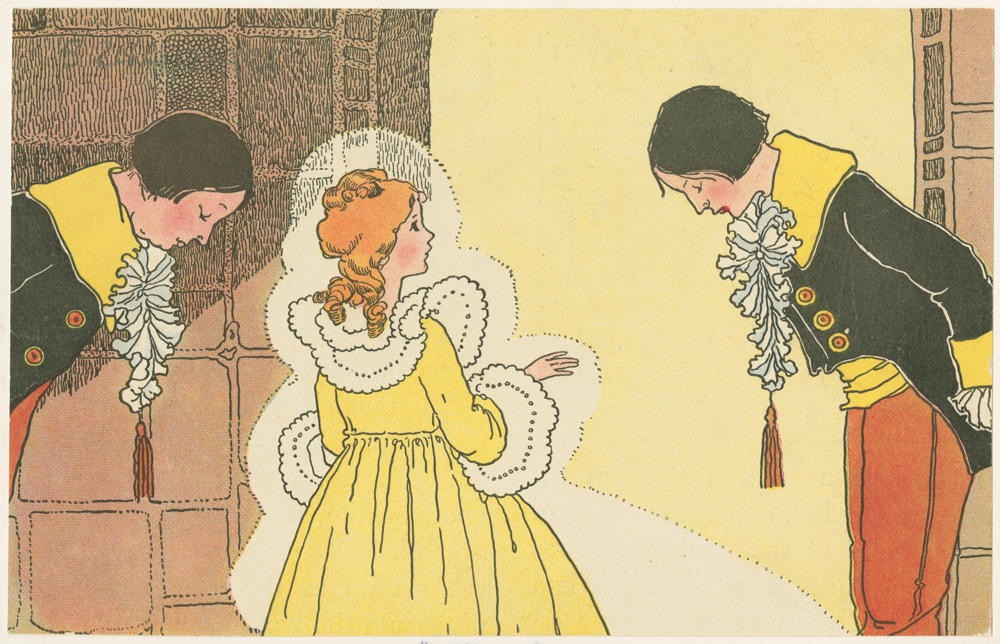
Margaret E Price:
Princess Furball attends the royal festival
adorned in her golden dress (1921)
" … deserve to ultimately be humbled by their surroundings."
Power seems an intangible entity. Nobody would suspect one possesses it until they wield it. Titles largely seem to threaten its use more than promise it. It seems too easily over-reached. It can often be breached. It can manifest as defensive or offensive. It need not be used at all. Gaining power tends to reveal more of a person than many other experiences might, for it carries a frightening capacity to buoy one's self-credulity. Anyone unprepared for a certain shock of recognition or an awe in their own presence seems likely to embarrass themselves without noticing. The true test of any influential person might be the restraint they employ. Not using power serves as the most potent use of power. In this way, power always proves paradoxical. To use it is almost the same as to abuse it, though shrinking from its legitimate uses renders it useless. So, a certain maturity seems necessary for anybody granted power. We've seen immaturity undermine otherwise powerful people. We've watched the assumption of power go to someone's head. We've seen the Trappings that inevitably accompany power catch the attention of the suddenly powerful to utterly undermine whatever their intentions might have been.
The Trappings our incumbent enjoys seem to distract him.
Weekly Writing Summary For The Week Ending 05/08/2025

John Simmons: Unite or Perish, Chicago (1968)
I Will Inhabit My Future
I was supposed to write this introduction on my new MacBook Air, which arrived yesterday afternoon just as I was sitting down to create this week's writing summary. I deferred playing with that new machine until after I'd completed that chore, setting the copying over of the six hundred thousand odd files through supper. It was still happily grinding away two hours later. When I rose at two, the progress bar reported that three more hours remained, so I went off to distract myself for that time. Back just after five, I found it had finished copying, but it hadn't yet finished with me. It had prepared a gauntlet of Pastwords for breakfast, each with a slightly different name and incomprehensible, in turn. With The Muse's groggy help, I made it through the first two gates and was delighted that Safari and Chrome could remember the last opened tabs. The new computer apparently had a functional touch key, which might mean that I won't have to continually type out my seventeen-digit Pastwork so frequently. That alone would justify the purchase. I'm hoping the continual crashing that has become a near-constant background annoyance might finally be reduced or even eliminated. Facebook couldn't remember me or my Pastword, and, as is often the case, my Pastword-remembering software apparently couldn't remember the most current iteration, either. I figure if it can determine that my Pastword's incorrect, it already knows who I am and is just playing hard to get. Typed in Pastwords make as much sense as TSA pat-downs yet we all submit to the tyranny. The Facebook failure chased me back to my old machine, even though I knew I'd undermine the parallel environments final migration would require. It was Friday, and I was not yet ready for my daily posting and my preparation for my Zoom Chat. One day, I will inhabit my future.
SlyenceFriction

Lucas Emil Vorsterman: Backgammon Players (c. 1630)
ABOUT THIS ARTWORK
Adam de Coster was a prominent painter of illuminated night scenes in Antwerp around 1630, about the same time that Lucas Emil Vorsterman was engraving works after his popular contemporaries in the same city. A student of Peter Paul Rubens, Vorsterman employed a style that was originally similar to that of the Flemish master, until a falling out with Rubens and subsequent trip to England provoked him to create stronger, more stylized, Caravaggesque engravings such as Backgammon Players. Clearly influenced by De Coster’s handling of light, Vorsterman brightened the otherwise dark scene with two candles whose flames illuminate the faces of those seated around the table.
"Real life does not even distantly resemble a game of Grand Theft Auto, and probably never will."
A seemingly separate species of human has emerged over recent decades. If this species existed before modern times, they were never terribly influential in human affairs. In scientific circles and among scientific professionals, odd lifestyles doubtless proliferated and were tolerated. Many famous early scientists’ histories read like psychodramas, but they were rarely asked for their opinion on taxation, for instance, or moral questions. Today, nerds seem to have gotten out of hand. Gamers carry a certain reverence in much of the public mind, as if their successes on the Xbox certify them as geniuses or something. Those who take science fiction seriously today enjoy a certain cachet imparted on no ancient. Those who believe we should be colonizing Mars are inexplicably thought to be exceptionally insightful rather than the more traditionally delusional. Something feels unsettling about people who choose to spend their non-refundable time gaming, especially those who consider gaming to be a competitive sport. People who get their jollies blowing away imaginary space aliens might be "on the spectrum" but seem too spacey to ever be senior advisors to a President. So much the worse for anybody who believes science fiction is mere allegory. Many now sincerely believe it's predictive and prescient.
Those who follow false Gods have never before been so involved in politics.
Pettiness

Style of Abraham Jansz Diepenbeeck:
King Midas at the Contest Between Apollo and Pan
(circa 1616–1675)
"That's the cultural capability of our present incumbent: Pettiness."
I was raised on tales of great men accomplishing great things. The possibility of a President actively promoting Pettiness never came up in polite conversation, so it's been particularly jarring as our incumbent has set about accomplishing nothing after rising to the role of so-called Most Powerful Person In The World. Such authority apparently lies in something other than the title, for our incumbent has already amply demonstrated that power lacks authority when placed in unworthy hands. It's not clever to opt out of employing lawful means to attempt to accomplish change. It's downright stupid to flaunt the Constitution because that document, above all others, amounts to sacrosanct text in this culture. Further, the oath of office insists upon an active defense against enemies of said Constitution, both foreign and domestic. It does considerably more than stretch credulity when the incumbent embodies every element of that enemy against which he took that oath, dedicating himself to defending against it instead. This paradox just seems to amplify his pre-existing cognitive disabilities.
Nothing of greatness has even been suggested since this administration, Hell-bent on not successfully administering anything, began failing to effectively rule.
Scheduled
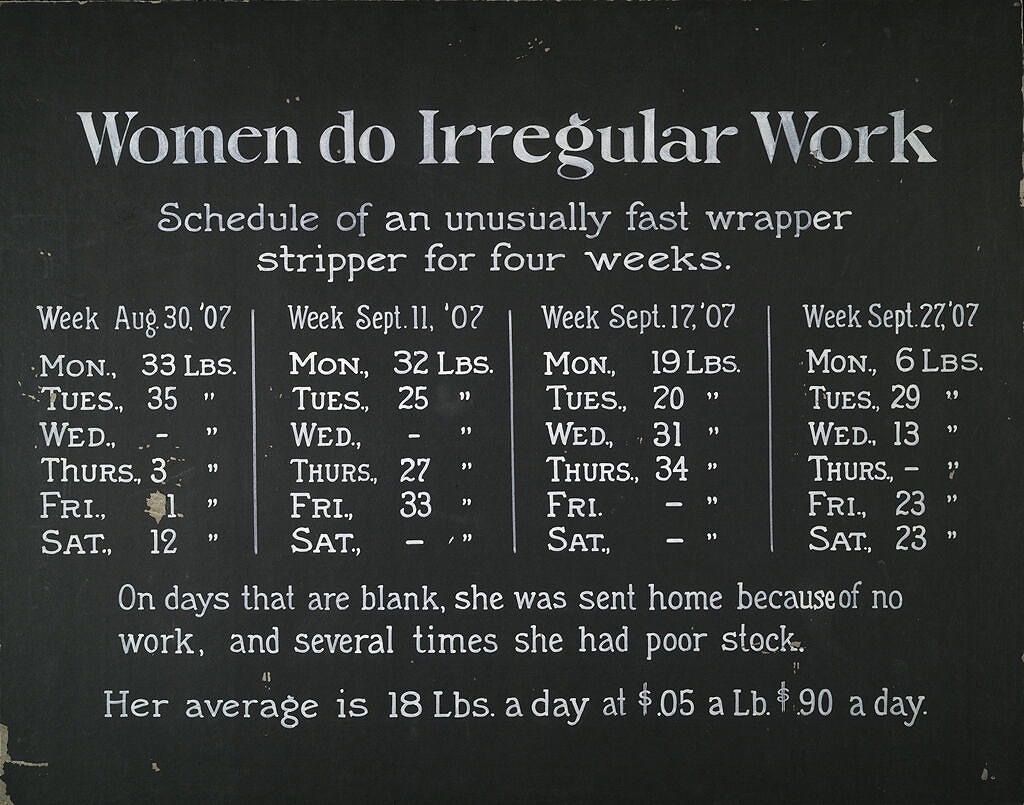
Lewis Wickes Hine: Women do Irregular Work,
Schedule of an unusually fast wrapper stripper for four weeks.
Series/Book Title: Social Museum Collection
(1907-1908)
"It was only ever eternal in the moment before it was declared done."
My dental hygienist reported that she was Scheduled into next year and booked solid into November, six months hence. Her dentist was booking into the following month, and so couldn't possibly perform any procedure not previously Scheduled. I once maintained such a schedule where I could reasonably predict my position months into the future. I inhabited a speculative reality, one capable of containing me every bit as effectively as any jail cell might have. I willingly entered, feeling secure in there rather than imprisoned. Call it job security, but I felt a real sense of certainty then. I later became a freelancer and lost most of my previous confidence. Then, I felt as though I was constantly juggling, coniving to survive somehow. Like the biblical Birds of the Field, though, I rarely starved. Plenty manifested before me, even in the absence of a tangible Schedule. I came to understand that Scheduled might have always been more of a preference than an imperative. In the absence of a Scheduled horizon, I'd reliably stumble upon one that managed to sustain me. This experience amounted to heresy.
I worked in the Project Management field.
Mistery

Master of the Die: Apollo Slaying Python, plate one from The History of Apollo and Daphne (c. 1532)
Gallery Note:
The alteration to this impression is not initially evident, but closer inspection reveals that this predominantly nude Apollo is missing his genitalia. A viewer deliberately scraped away the ink at the god’s crotch in a campaign of extremely localized censorship. Given how modestly Apollo was originally endowed, this change does not significantly alter the image overall. Rather, the god’s sizable arrow quiver dangles more provocatively between his legs than his own penis ever did. The objecting viewer, apparently lacking a grasp of age-old visual puns, may not have realized that, with his alteration, the visual emphasis merely shifted to this larger and more obvious phallus substitute.
"Eye for an eye and tooth for tooth sentences actually seem like justice to them."
For MAGAs, the past is not comprised of memories. Those of us seeking referents for MAGA assertions about the past seem doomed to disappointment, for they do not share a history with anybody but themselves. They rely upon a different basis upon which to anchor their assertions. To their minds, these are not fictional representations, but more like Biblical ones. Sure, the past might not have happened precisely like they recall, but their rememberings seem more divinely inspired and thereby more valid than what might have actually happened. Their recollections carry the gravitas of Old Testament testimony, unlike the obviously phony more conventional histories. They and the members of their tribe know better than the “lame” mainstream academics. Academic histories were obviously written with political agendas, as are all histories written by winners. The losers carry different stories and believe in theirs more fervently than any professional historian ever believes in theirs. The professionals might insist that theirs are not dependent upon belief but facts. In any wrestling match between belief and facts, bet on the beliefs to ultimately prevail.
Many advancements seem absent from MAGA history.
RecitalRules
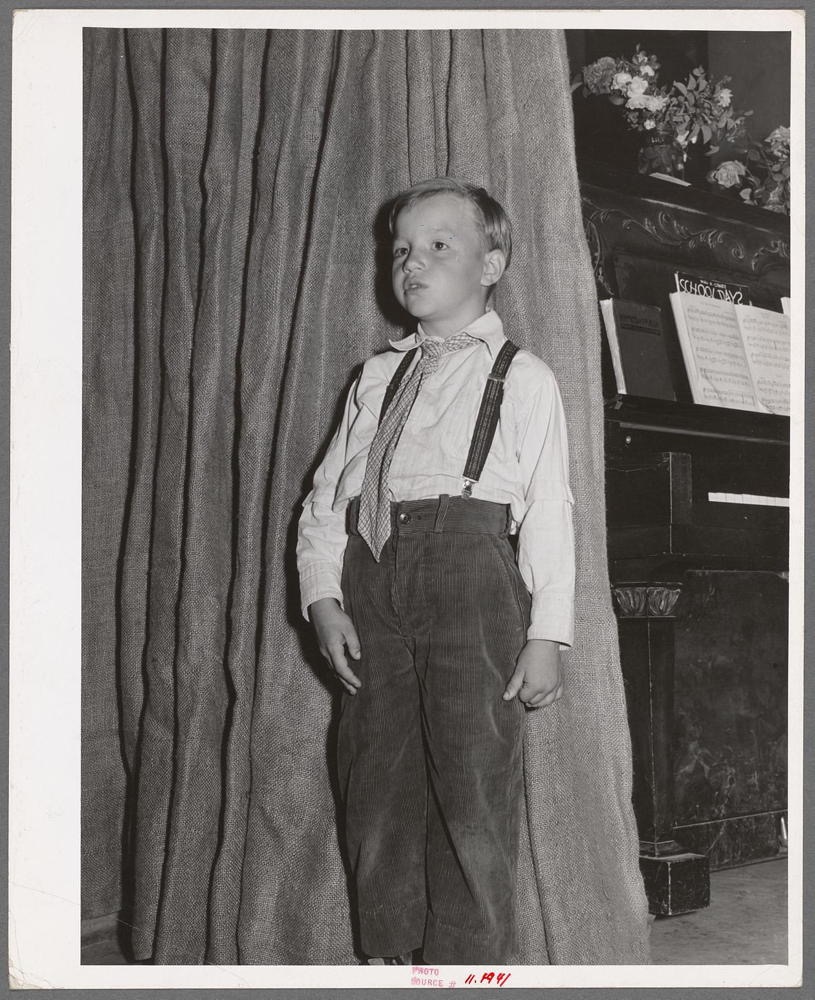
Lee Russell:
Boy giving recitation in program at end of school term. FSA
(Farm Security Administration) labor camp. Caldwell, Idaho (1941)
"We only have everything to lose otherwise."
Lest I forget the purpose for which I started writing this series forty-five days ago, The Universe has been conspiring to remind me. In my experience, if I set my mind on something, the universe sets about reminding me when I misplace my focus. My part in the circus seems to come from forgetting that focus and generously accepting reminders. I tend to wander and weave my way, whichever way I've chosen. The universe always seems to be conspiring to remind me, and I don't mind. I appreciate that I inhabit a universe so generously disposed to focus on somebody as genuinely insignificant as little old me. I can use the reinforcement, especially when I'd committed to write about hope and coping. How have I been doing? I've been wandering and weaving, as is typically my way. I rarely travel via straight lines. I've even proven myself to be more than capable of going backwards when pursuing something, even when that something seems as essential to my well-being as coping and hope. I've proven myself more than capable of losing my way, so I sincerely appreciate this universe when it seems to nudge me back into awareness.
It's been a rough time, with interference appearing almost every morning.
Idiology
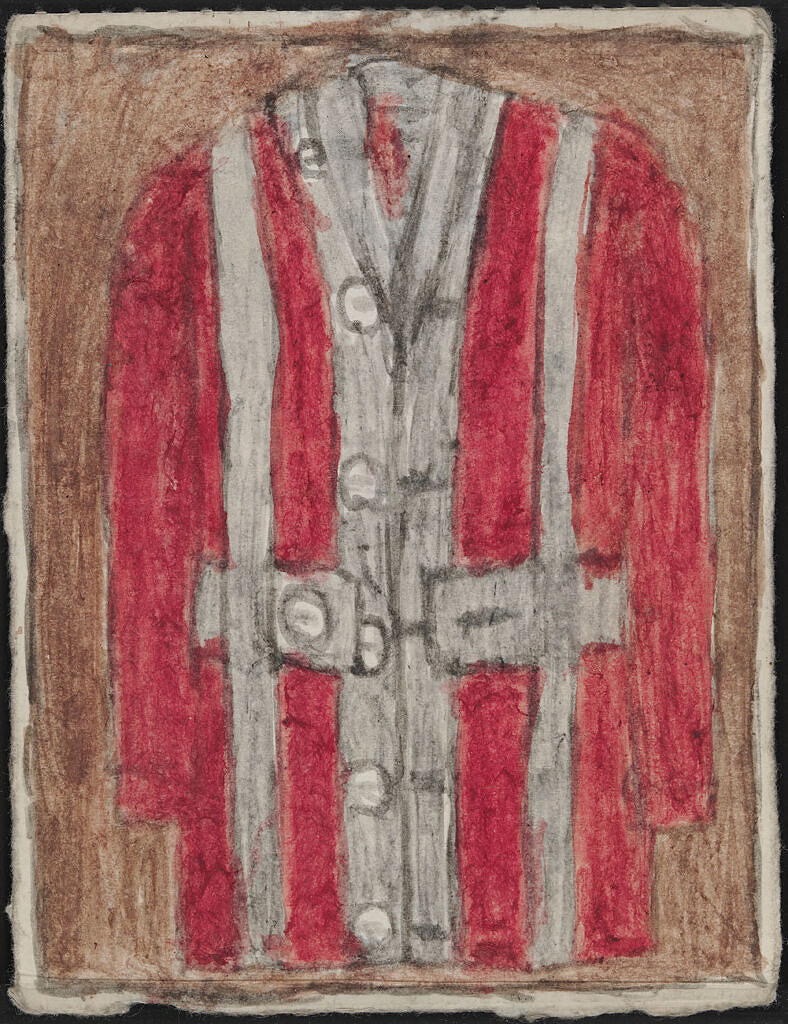
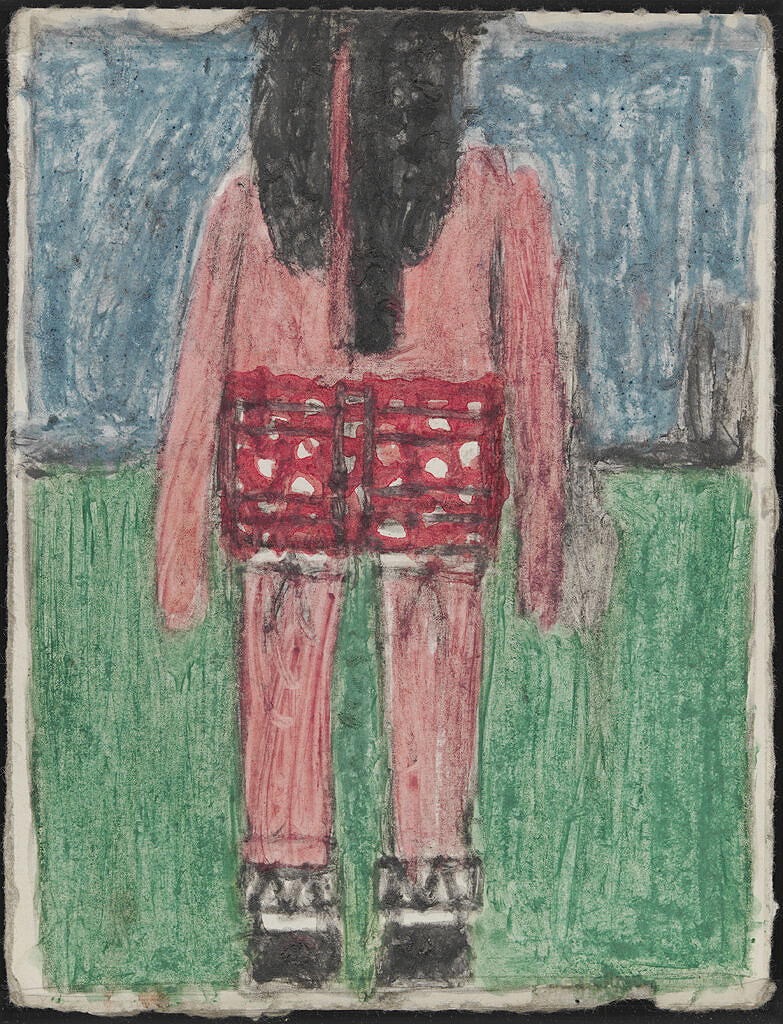
James Castle: Red Coat; verso: Back of Man ((20th century)
"The best of all possible opponents to have when battling for decency and justice."
People complain about the MAGA ideology without slowing down to appreciate its underlying Idiology. It might be that we innocently mistake one for the other. Ideology amounts to ideas and ideals—beliefs—that drive political theories and policies. It's easy to presume that some shared beliefs drive an ideological bus, when they might not be present or that influential. It sure seems as though every MAGA has undergone a brain transplant to replace their intelligence with something less inquisitive. Belief sure seems to drive their behaviors, but their beliefs don't seem to be all that consistent. What might bring them together when their beliefs only seem to converge? I think it's the urge, or more properly, the inherent inability to control that urge. It's not so much what they believe as how they believe. They believe with such conviction that they do not seem to question the reasoning behind their interventions. Because of this hair-trigger belief system, they render themselves incapable of foreseeing likely implementation complications. They act without first questioning. They engage with such unshakable certainty that they seem genuinely shaken when their latest hare-brained scheme predictably blows up in their face.
It's a genuine gift for an opponent to exhibit authentic Idiology, for however fickle the details of their moves might seem, they each share a hyper-predictable pattern.
Weekly Writing Summary For The Week Ending 05/01/2025

Charles Green Bush:
Let Us Have Peace! -Fortissimo, from Harper’s Weekly
(published June 19, 1869)
He Will Probably Never Recover
May caught me napping. It arrived while I spent most of my writing week escaping from a seriously twingy back pain that visited me for no apparent reason. One problem with even attempting to be a reasoning being comes with unreasonable events, occurrences that sidestep or somehow transcend reason. There never seems to be a reasonable end to the search for the cause of these afflictions. The doctor asks questions to which I can muster no reasonable response. The first prescription doesn't work. The second doesn't do much, either. Circa day three, I took a high-level pain pill The Muse had leftover from some prior procedure, one of the ones the doctor threatened to prescribe, so I took one. It didn't touch the pain, either. Maybe that second batch of muscle relaxers worked, or, after four down days, my body started responding to rest. By the fifth morning, my back still felt twingy, but the twinges no longer elicited grimaces. A week spent in intermittent agony serves to reset the gauge intended to determine whether I'm okay. My threshold has been considerably reduced from where I'd grown accustomed to it.
Ire

Peter Paul Rubens:
Hl. Ambrosius und Kaiser Theodosius (1615/1616)
"This reaction makes the so-called superior appear inferior and the complier seem spineless."
Recent headlines reported that many, including a few of the wealthiest and most powerful people in this universe, have taken to tiptoeing around our incumbent to "avoid his Ire." I recognize the word "Ire" as one of those holiday serving spoons restricted from ordinary supper use, exclusively reserved for company. I remember the few times it's been trotted out, not for itself, but for what it was always associated with. Its presence seems rare enough in memory to almost be considered a sacrament, warmly remembered. I proudly recall the times when I managed to spark Ire, especially in someone I was supposed to automatically provide deference: a principal, police officer, or high official who felt as though I'd disrespected their position, if not them personally. The Ire itself always took the form of threats, promising retribution for the imagined infraction. The imagined portion was almost always a misunderstanding stemming from my failure to engage with what I might characterize as adequate gravitas. I might have engaged with a superior as if he were an equal or, worse, a lesser. Few angers rival those sparked by a sleight perceived by a superior, for they might seem to threaten the whole concept of "superior." Those relying upon their position to prevent being perceived as inferior seem to possess the thinnest skin and generate the bulk of the Ire in this universe.
I prefer to inhabit a world where we employ a more level playing field where nobody can be seriously considered to be anyone's better.
Infliction

William Hogarth:
The Punishment Inflicted on Lemuel Gulliver (1726)
"Good riddance to abysmal governance."
Only apprentices ever opt to Inflict difference upon others. Ten thousand more effective ways exist, so only the deeply inexperienced ever resort to Inflicting change. The more insistent the Infliction, the less effective, and the shorter-lasting the attempted change. Those who seriously believe they can command while others will obey only successfully delude themselves. It's a sad and sorry spectacle to observe, especially when the Inflictor convinces themself that they're acting in the Inflicted's best interest. Such attempts inevitably fall far short of an actual initiative. They might initially appear to produce real difference, but whatever initially appears to stick proves to be short-lived. Considerable undoing might result, but the desired change will quickly dissolve and disappear. Further, the Inflictor will ultimately fall much further than they imagined they might rise had their initiative proven effective. Those afflicted by the attempt will be absolved of all accusations against them when they resisted. The opposition will produce the only heroes. The Inflictors will make themselves infamous.
Fresh from a multi-day affliction, an epic back spasm that left me bedridden and aching, I carry a fresh appreciation for change.
SacredSarcasm

John Tenniel: "Once," said the Mock Turtle, with a deep sigh,
"I was a real turtle."
Illustration from the 1911 Edition of Alice in Wonderland (1911)
"Congratulations, or something, Mr. President! Grow a pair!"
If anything distinguishes Democracies from all other forms of governance, it must be the freedom to shamelessly mock itself in public. The chief problem with authoritarianism lies in its innate humorlessness. It takes everything, especially the microscopically irrelevant, seriously. It presumes to make daily proclamations insisting upon the most fantastical absurdities. It continually assaults common sense and its citizens' own experience, attempting to override it with idiotic ideology. One's left wondering what could possibly come next. Our current authoritarianism infection began with a full frontal assault on decency. If an unwinnable opponent were ever proposed, common decency would seem the perfect choice. Only one so thoroughly entranced in their own self-importance could ever seriously consider making decency their primary enemy. Of course, they had to ineptly hide their real agenda. This tactic barely worked before utterly undermining itself, as any founding father could have easily predicted it would, for we are not that serious a society. We were founded upon the sacred proposition that all people were created equal, which, roughly translated, means in practice that everyone holds the more or less equal responsibility to be the butt of their fellow citizens' jokes. If nobody stands above the law, nobody stands above the next derisive punchline, either.
Our society has evolved into an entertainment medium.
BadBack

Jacques Callot: Beggar on Crutches and Wearing a Hat,
seen from Back, plate five from The Beggars (c. 1622)
" … I'd be aching, too, if I had to put up with all I put it through."
I have not had a BadBack since I finally submitted to that long-deferred back surgery more than twenty years ago. Before that, I suffered from a standard stenosis and a lingering adolescent denial in more or less equal proportions. The physical difficulty was easily resolved with a straightforward surgery. The denial required more than a decade of concerted effort and considerable suffering to finally resolve, which was achieved by my merely consenting to the long-averted surgery. I tried every non-surgical alternative but mostly embraced suffering as the antidote. I got very, very good at suffering because I was already a near master at denial. I could work through that white hot blindness that waves of pain brought, essentially blocking vision. I could stand and deliver while otherwise basically unconscious. I also experienced public collapse like that especially memorable time when a blinding wave of pain disabled me while I was strolling down Lower Broadway in New York City. Miles from my hotel room, I could neither stand nor sit comfortably. That one scared me.
It took a bout of shingles to finally convince my doctor and me that I had successfully tried and worn out every possible alternative.
Restarting

Unknown, After Jean Restout: Saint Hymer in Solitude
(c. 1735)
" … whether or not it accomplishes anything else."
Restarting my machine has become the first step when producing another story. This amounts to ritual now, in that it reassures more than guarantees anything. If I don't Restart first, I might increase the risk of my machine crashing before I've finished, and then have to recreate lost parts. Writing to post involves using five or six different applications combined with plenty of cutting and pasting. I accomplish all this on my thirteen-inch MacBook Air. The small screen means I cannot just grab and drop most copyings. I need to switch displays to change applications. I save before switching between any two applications, so I'm also continually saving in addition to the constant cutting and pasting. I'm uncertain which of these operations will eventually result in crashing my machine. Usually, my blog application crashes first. I try to save something in it, and it doesn't respond. I pull up the ever-useful ForceQuit display, which usually indicates that RapidWeaver's frozen again. Then, I can ForceQuit that application and either reopen it or choose to execute another full Restart. The full Restart takes a few minutes, as each application needs to reopen. Sometimes, depending upon where the crash finds me in the process, I have to copy the contents of something like a Facebook post over and into Pages for safekeeping during the subsequent Restarting; otherwise, I'll lose whatever I've started there.
In these ways, my writing has become an exercise in paranoia.
Improv

Vasily Kandinsky: Improvisation No. 30 (Cannons) (1913)
" … as if his audience was supposed to care."
It might be essential to remember that our incumbent is an actor. Actors train in and practice the art of deception. They pretend. They might become most skilled at pretending to be themselves, an identity that typically gets garbled in such practice. The others they become skilled at pretending to be are unavoidably incomplete, for nobody, however experienced, has ever managed to thoroughly portray somebody else. There are too many edges to consciously cover. To compensate, skilled actors amplify a few of the more prominent traits of the ones they portray, thereby accentuating some of their more recognizable aspects. They become identifiable by overplaying some characteristics. Voice impersonators tend to employ a few key phrases associated with the character they play. This produces a reinforcing association, whether or not their voice very accurately mimics their target's. John Wayne was apparently the only actor whose character employed the term "Pilgrim" in their dialogue.
Actors train in their trade by engaging in Improv.
Weekly Writing Summary For The Week Ending 04/24/2025

Henry Fuseli: Milton Dictating to His Daughter (1794)
Gallery Notes:
This painting by Swiss artist Henry Fuseli depicts 17th-century English poet John Milton, who became blind in his 40s, dictating his epic poem Paradise Lost. His daughter transcribes his words while another woman listens intently as she sews. A forerunner of the Romantic Movement, Fuseli created drama through chromatic contrast. A cool light illuminates the rosy-cheeked women and casts deep shadows around Milton’s ghostly figure and face. Fuseli created this painting for his Milton Gallery, a self-run enterprise that showcased the artist’s Milton-inspired works. While this entrepreneurial venture failed commercially, it raised Fuseli’s prestige and visibility as an artist.
Given The Current Volume of Obvious Imperfections
One week each year, perhaps a few days longer, the Villa's yard takes on the Garden of Eden Scent. The apple blossom sweet of the two enormous ornamental crabapples, with the magenta one dominating, combine with the budding lilacs. When we returned from our exile four years ago this Spring, I planted five fresh lilac bushes along the back fence. They were healthy three-footers then. Now, they're topping seven feet and bursting with blossoms. They provide a sampling line where The Muse and I can sink our snouts deep into each bush's blossoms to experience the subtle differences between the various varieties. We added fish to our bubbling backyard pond this week, and I immediately felt the difference their presence brought. I suspect the neighborhood raccoons have already discovered this addition, as somebody tipped over the fountain pump on two successive nights. My lawnmower replacement for the one recalled as a potential fire hazard arrived just in time to counter the emerging lawn, and the carpenters completed installation of the front porch beadboard ceiling. I could proclaim that all's right with the world, but there's still a considerable lot that's not right yet. I feel reassured that this world can pull off a Springtime like this, even given the current volume of obvious imperfections.
Tech

Nan Lurie: Technological improvements (1937)
Works Progress Administration
"We thrive exclusively on the promise of another paradigm shift …"
Technology serves as both our enabler and enslaver. It encourages hope and creates the lion's share of the frustrations we daily struggle to cope with. If ever a human invention exemplified the notion that there's no such thing as a free lunch, Technology holds that distinction. It giveth while also taking away. It encourages before disappointing. It seems to be continually, constantly annoying. On my better days, I find ways to fiddle with it less. On my worst days, it can hold me completely in its thrall. I curse its presence and pitch a fit when I cannot access it. It improves life immeasurably, by which I mean unavoidably. It creeps into routines almost unobserved, then won't let go for anything.
It seems I can barely remember my life before, if I had a life before Tech.
Presententions

Master of the Beheading of St. John the Baptist:
Allegory: Combat of Animals in the Presence of Man with Shield (1515/20)
"Everything except the lilac garden seems twisted and broken."
I inhabit a suddenly disorienting time when usual expectations no longer reliably produce. Emerging realities seem wacky. Our incumbent leads exclusively by whim. This might entertain He With A Negative Attention Span, but it exhausts the rest of us. He appears wholly presumptuous, as if he targets every one of his mindless proclamations for The Ages. I sense he, or more likely his fundamentalist followers, thinks his "reign" biblical and, as usual, the most devout take the allegories literally. This produces predictably ridiculous reactions, the sole predictable part of his many machinations. They always go sideways and are often rescinded after inducing some fresh, otherwise unnecessary, chaos. Some speculate that chaos must be the underlying purpose, keeping opponents off balance. This almost works, except it seems to off-balance the perpetrator more than the opponents. Consequently, the loyal opposition appears to be gaining the upper hand. As usual, the incumbent seems only capable of undermining his own plans, assuming he even has any plans.
He seems to live by presumption.
Serfdom

Jules Breton: The Song of the Lark (1884)
"Let us choose more wisely going forward after we finally impeach this bastard."
The problem with monarchies must be that they require vast numbers of peasants. All that idling demands many waitpeople, cooks, gardeners, butlers, maids, footmen, and vast numbers of serfs, peasant farmers who live at or slightly below subsistence so that their monarchs might live as kings. The overhead involved seems unreasonable to us raised in more liberal circumstances. How much better might it be if everybody could become more self-sufficient and at least earn and pay a living wage? People could trade rather than indenture, choose instead of becoming chattel. This tension between the monarchial and liberal worlds has peaked lately, with a self-proclaimed dictator elected to lead the world's oldest liberal democracy. Conservatives, traditionally those most enamoured of market traditionalism, for some unknown reason, embraced him who became our first self-proclaimed dictator. Dictatorships and monarchies seem identical at some level, for they both require unreasonable numbers to perform as peasants.
The Road To Serfdom, a popular book from the 1940s by Austrian economist Friedrich Hayek, described how excessive government control of economic decision-making and central planning inevitably lead to tyranny.
GigaMa

Xiang Shengmoe:
Crab-apple Blossom from a Flower Album of Ten Leaves
(1656)
"May she fondly remember her great-grands."
The Muse's post-cancer treatment includes five years of surveillance involving frequent doctor visits and occasional specialist consultations. No reason for serious concern has yet emerged from this scrutiny, but the inquiry continues for at least another eighteen months. She could have chosen to see this specialist via tele-health. Still, she decided it might be useful to visit in person, if only to stay in touch with someone offering more experience than her local practitioner can. This means a short trip to what I'll forever call Sleazeattle, an overnight in a grossly over-priced hotel, and associated adventures. Ask me what gives me Hope, and I'll respond that the future renders me hopeful. When the present seems filled with hopeless boobs conspiring to make their lives Hell, the future never gets even distantly involved in those shenanigans. What helps me cope with how things seem to be now? Two things: the shadow of my future and the ability to roam around a bit in my present. I'm a dedicated homebody, but The Muse insists I get out into The World. I rarely regret these excursions, though I usually faunch beforehand in anticipation.
The Muse opted to see this specialist in person because it gave her an excuse to see her great-granddaughter Really. (Really's a family name! Nobody's ever a family member until after they've been given a family name to fix the shortcomings their original inevitably exhibits.) Her real name doesn't matter to family. To us, she's Really. The Muse had seen her a few months ago, but we do not live nearby, so she's already three times older than she was on that first visit. I'd never met her, and though I'm no blood relative, I still consider her my great-granddaughter. Great-granddaughters provide a reason to feel hopeful, regardless of current conditions. A GGD has an upside, which is the one thing no great-grandfather can realistically provide. My future's been shrinking constantly since the day I was born, leaving me ever further behind on the upside portion of the program. I'm more than physically shrinking. A GGD provides an extension into a world I will never know. That's hopeful for me.
The ride over was typically remarkable.
BowSaw

Jack Gould: Untitled (two men sawing large logs) (c. 1950)
" … designed to preserve enthusiasm rather than undermine it."
Yesterday, while the rest of the world was busy going to Hell, I rediscovered an often unused corner of my little Heaven here. I'd tried and failed to construct a little pop-up-paint-tent on the front of the garage to shade me while I strip and repaint some long trim boards for our front porch restoration. I'd drilled holes and set eye hooks, thinking I could string up a tarp to serve as the roof, but I was short one anchor point. I figured I could screw a left over cut-down seven-foot two-by into a paver then further weigh that down with a concrete cornerstone, but the screws failed, so I folded up the tarp and set that project aside. My puttering efforts often encounter such blockages because, despite my advancing age, I remain largely ignorant about calculating forces. Combine that innocence with at least an equal ignorance of how such problems are typically solved, and I have an explanation for why my grand schemes so often initially fail. I do not take these failures personally. I consider my attempts experiments, even though I suspect that someone out there could solve such problems in their head without even resorting to pencil and paper. I almost always eventually resolve such difficulties, though usually in ways I couldn't have imagined before serially failing. The universe backs me into most of my successes.
That problem set aside, I attempted to resolve another small dilemma.
FreshStart

Corita Kent (Sister Mary Corita): fresh bread (1967)
Inscriptions and Marks:
Signed: l.r.: Corita
(not assigned): Printed text reads: Fresh bread, a secret agent / A jug of wine a loaf of bread and WOW / What kind of a revolution would it be if all the people in the whole world would sit around in a circle and eat together? [heart shape] / What you seek in vain for half your life, one day you come full upon, all the family at dinner. Thoreau
—-
"I prefer the quality only ignorance ever dispenses."
I've grown weary of the continuing anticipation, the fantasies pretending to qualify as policies, and the inescapable idiocy masquerading as stable genius. This will never become genius, regardless of how many unqualified commentators try to convince us. We will never be persuaded. If anybody does, we possess the closest thing to common sense anybody ever has. I'm not casting aspersions, but those who don't understand won't. It's just not in them. Whether through willful ignorance or chance, they were never invited to the dance. Yes, they hold grudges. They do not seek justice, but vengeance. They flee from decency, apparently the only toxic substance likely to do them in. I fear that too close an association might render me like them. I worry that even watching them so closely has been rendering me stupid.
Yet I do not want to miss any subtle shift in strategy.
Weekly Writing Summary For The Week Ending 04/17/2025

Jack Gould: Untitled [mother and daughter at table, writing] (c. 1948)
We Prefer Homemade
Our small city has been hosting Town Hall events featuring our absent congressional representative because we're worried, and he seems uninterested or unable to facilitate a gathering to reassure us. Though we try, we don't really reassure each other when we gather. We show up, by which I mean we bring our natural diversity, as if we intended to annoy each other by displaying it. Only in a cult, where everybody's too terrified of being identified as different, do we gather without fear of disturbing each other. The usual sensitivities always come, as if to highlight our shared dilemma. We ache to be community, but we dare not insist upon conformity. E Pluribus Unim, as I said somewhere this week, insists we're from different root stock, not similar. The miracle of our form of government was never its ability to engender anything even distantly resembling efficiency. Its stated purpose was to promote apparently inefficient diversities to surprisingly produce more than the sum of their components. This strategy has worked for approaching two hundred and fifty years. The efficiency experts lack the calculus to reduce this possibility into anything resembling a satisfying formula. As I also said somewhere this writing week, those who pay to play cannot understand those who would never pay for or play with any of the freedoms we enjoy. We're freeloaders where freedom's concerned. To purchase it defiles it. We prefer homemade.
Desperation
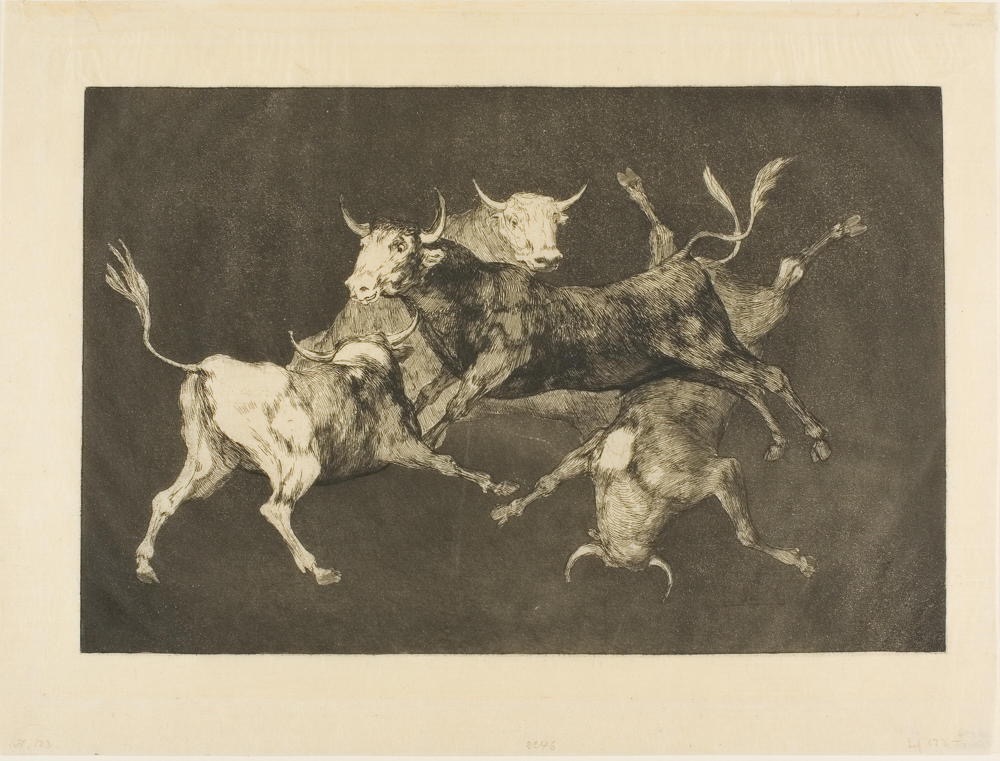
Francisco José de Goya y Lucientes:
Fool’s Folly, from Disparates (1816–19, published 1877)
"He was never primed to contribute what success always requires."
The unmistakable scent of Desperation accompanies every proclamation and every action initiated by this goofy administration. It's as if they know everybody's already on to them. They persist, perhaps bravely, failing to achieve even a threshold of believability. They have not managed to convince themselves. They cling together around their largely absurdist stories like proverbial rats clinging to flotsam, and hardly even deserving that hackneyed old allegory to describe their condition. They present as pitiful, yet they still seem to produce fruitful disruption. As the courts start kicking in, their explanations become even more fantastical. We knew they weren't serious from the outset, with their assault on decency and efficiency, neither of which parsed to anything other than fantasy: abuse, fraud, and waste. Their “savings” cost more than they saved. Their police for their police state seems comical, cosplay goons performing administrative errors. International incidents initiated by middle-of-the-night tirades: the usual.
The more paranoid point out that they follow a plan, published in paperback form, so the rest of us can follow along.
Crumbling

William Blake: Thy Sons and Daughters Were Eating and Drinking Wine (The Book of Job),
Alternate Title: Job's Sons and Daughters Overwhelmed by Satan (1821)
"The incumbent will richly deserve his comeuppance."
A hundred days into our incumbent's second term, it's difficult for me not to feel as though I'm stuck somewhere in the Book of Job. You will remember Job as the unfortunate believer whose life inexplicably turns to shit as if he had been a sinner. True belief in anything doesn't immunize anyone from very much of anything. Some things happen regardless of anyone's faithfulness. Other things might occur due to misplaced belief. Belief in false premises or misleading promises can contribute to reversing fortunes, but belief itself can't independently be ascribed as cause. Other factors must intrude to produce results. In our case, our incumbent's abysmal second-term results seem easily ascribable to our incumbent himself. Whatever evil playbook he might have tried to follow, his performance so far shows him incapable of following any playbook. Investors have begun to publicly speculate that he's insane. Former supporters have started moving further away as he's again demonstrated his incompetence in practice.
As I've noted before, our economy was the world's envy a short hundred days ago.
Contemptible

Jean Audran: Minachting [Contempt] (1727)
"Such behavior transcends explanation and excuse."
Our incumbent was never careful. Oh, he took precautions, though even those seemed a little too loose or fast to ultimately evade detection. Most of his administration's business has been conducted on Signal®, an insecure and illegal platform upon which to conduct official business. Even in small things, he chooses lawlessness. He thumbs his nose at convention and decency with equal contempt. I'm unsurprised, then, that the sum of his efforts amounts to Contemptible. He holds decency in contempt as easily as he seems to revere evil. He seems to have been built backward from most people. He can't help but carry what most hold as internal out on his shoulders. He continually shares way too much information. He parses his world with a rusty potato peeler. He skins convention alive. It should be no surprise that he managed to prove himself Contemptible in the eyes of his sole Court of Last Resort, one he struggled, in his last administration, to stack with unfit judges owing him. They suddenly owe him no longer.
It's quite an accomplishment to offend people you paid to be your friend, but even paid-for justices have their limits.
CopingTactics

Ferdinand Olivier: Coping-stone (1823)
"I'd rather be crazy on my terms …"
Most people seem incapable of mustering a coping strategy, for we do not live all that strategically. We exist episodically, hoping against hope that we will somehow cope with even the more extraordinary stresses our times expose us to. I might insist that I've never seen a time like this, but I've survived stressful times before. Those times sure seemed dire at the time, and only in retrospect do they seem tame by any comparison. They terrified me to what I then understood to be my core. I didn't know beforehand if I could cope with those tensions and stresses. The tenacious unknowingness of those times caused the bulk of the damage. Others were more wounded than I, though it was not in any way a credit to anything I necessarily contributed. I proved fortunate under those circumstances, though I felt anything but lucky at the time. One never knows or, certainly, I never seemed to know at any point. Later, perhaps through speculation, I sometimes made sense of such experiences, though I suspect my stories about those times better qualify as fiction than accurate reportage. I chalk them up to one of my more prominent CopingTactics.
I write my cares away, though writing more often amplifies my cares than mollifies them.
Wealth_

Jan Luyken:
Man met de wereld in zijn armen laat kostbaarheden vallen
[Man with the world in his arms drops valuables] (1710)
"I will then settle in to become dirt myself."
April brings recovery. The messes accumulated over the receding winter demand attention, and rediscovery accompanies that attention. It always takes me some time to get started again, for engaging quickly becomes obligation. There will be scant respite until at least November. What begins as preliminary weeding blooms into mowing, planting, watering, fertilizing, and ongoing weeding. Some reconfiguring always intrudes, too, as something will have degraded since the prior growing season. This is a reminding time, for each April, I rediscover my Wealth, the single sure accumulated asset I will ever truly steward. I can't possibly own it, for it belongs more to the ages than it could ever belong to anybody. It represents my tacit legacy. Properly prepared so no inheritor will ever know precisely what they receive, though each might well find reason to revere me come future Aprils.
I measure my Wealth in tilth, the soil quality in my garden.
MagicalThinking

Master of the Die: Psyche,
Thinking to Appear More Beautiful...,
Opens the Fateful Box (1530–1540)
"We never were merely externalities …"
Our billionaires inhabit a radically different universe than the rest of us, for they exist without consequences. I might reasonably believe their existence must prove much more consequential if only because they command vast resources. In that narrowest sense, I might consent, but commanding vast resources says little about success. It might be that few things more reliably exceed than excess, but this says nothing about effectiveness. It's little or nothing to purchase something with one-hundredth of one percent of one's resources. The significance, however otherwise magnificent, tends to get lost in rounding on those sorts of transactions. A working man might struggle for a decade to finally save a downpayment for a modest home he'll never ultimately pay for. Still, he will have really accomplished something monumental in so doing. The lowly billionaire could buy and sell him ten thousand times without diminishing his wealth by a comparative dime, yet never once experienced success in the way that workingman does. Nor could they experience consequences because the workman risks everything to achieve his modest result, and the billionaire risks essentially nothing.
It's much more and different from idolatry to worship our billionaires' successes.
Weekly Writing Summary For The Week Ending 04/10/2025

Francesco Bartolozzi: April [Aprile] (18th century)
Attempting To Go It Alone
Following George McGovern's presidential campaign, self-described 'gonzo journalist' Hunter S. Thompson published a collection of his Rolling Stone campaign dispatches into a book titled Fear and Loathing On The Campaign Trail '72. I cut my teeth on Thompson's writing. For years, I carted around my Rolling Stones collection as one of my most prized possessions. Even with Richard Nixon involved, what constituted Fear and Loathing in 1972 would hardly spark a disinterested retch today. Our current incumbent's shenanigans have reset the bar for fear and loathing. Our closest neighbor now considers the United States to be a rogue state, the source of illegal guns, drugs, and every manner of contraband, rather than a trusted ally. We offer them lax border security.
I can't seem to help feeling as though my reputation has also been tarnished, even though I in no way supported any of this clown's initiatives.
Smugness

Ewald Dülberg: Self-Portrait (1917)
" … he sure seems clueless about how transparently he exposes his inner urges."
Woe be the leader without competent advisors. Those who go it alone and serve as their own coach have the fewest resources from which to draw. They must make much of it up, and nobody's imagination proves bottomless enough to adequately serve that need. Worse, though, comes when said leader considers themselves the smartest person in every room, for even if this belief were true, it would provide little benefit. Life is no more an IQ test than in is a race. Those who compete, especially those who compete with themselves, lose the most. Those for whom each decision becomes a competition probably have nothing left to lose. Our incumbent seems to suffer from these conditions. On those occasions when he listens to someone, he more often acts upon his misunderstanding of what they'd intended to advise. He usually swipes some notion out of context and then claims it is his original before swelling with a curious Smugness. It's a genuinely infuriating habit, an authentic abuse of power.
I suppose we each profoundly misunderstand the world in our own unique ways.
Weakman

Unknown Artist: Man of Sorrows (1465/70)
ABOUT THIS ARTWORK
Images such as the Man of Sorrows were intended to shock the beholder into repentance. The pristine condition, and even survival, of this hand-colored woodcut is primarily due to its having been pasted-like many early devotional woodcuts-within a protective book cover. This unique impression was discovered amidst the rubble during the bombardment of London in 1945.
"Good riddance to another so deluded he couldn't recognize his own weaknesses when they manifested."
——
Our incumbent fancies himself a strongman on the order of a mafia don. The most curious attribute of such strength might be how it reeks of weakness. It seems primarily defensive in nature, often co-optive, as it intends to do unto others before they have the chance of doing it undo them. These amount to preemptive retributions, a speculative getting even for something that hasn't really happened yet. In this manner, the self-proclaimed strongman exists as a Weakman instead, for the surest signs of weaknesses accompany the unselfconscious use of force as if it represented power. The truly powerful have little to show off, for their strength lies mostly in reserve, unperturbed by day-to-day existence. They live in peace, with deep respect for the absolute calamity that would have occurred had a Weakman been in charge. The weak might speak of law and order, but their rhetoric, carried to action, encourages righteous lawlessness, producing deeply defensive disorder.
The Weakman sees the world as zero-sum contentions sorted into clear winners and obvious losers.
Insanity

Adolph von Menzel:
Studies in the Insane Asylum (1844)
"We never know how to respond congruently."
Ordinarily, politics entails differences of opinion. It's different than this in the case of our current incumbent. There, realities seem to conflict. He and his minions deny the existence of verifiable conditions and assert the existence of clearly delusional ones. He exercises uninformed power. He primarily exercises non-existent powers. He proclaims stuff that could never be objectively excused as in any way related to truths. He holds convictions that only the more deluded conspiracy theorists ever seem convinced, then threatens and even exercises retribution against anyone disagreeing or, to use his words, "defying" him. Since when has a difference of opinion warranted such a response in this country that first championed freedom of speech, religion, and political conviction? Disagreement doesn't constitute a crime here. We have long revered dissent as one of the purest forms of patriotism, indeed nothing deserving any form of political retribution.
We teeter on an edge more perilous than mere politics.
TheBlues

Dodge Macknight: Blue Sky (19th-20th century)
"I had TheBlues so bad one time it turned my face into a permanent frown …"
Taj Mahal: "Cake Walk Into Town" from Recycling the Blues & Other Related Stuff
℗ 1972 Columbia Records, a division of Sony Music Entertainment
Released on: 1972-01-01
I live in such close proximity to ambiguity that it's a genuine wonder I can usually figure out what's happening around me. I can see out of The Villa's back second-story windows TheBlues rising to the east and south, the Blue Mountain foothills, that is. They represent a world of considerable wonder. In the summer, The Muse and I trundle up there to gather a sharp-scented local Black Current variation prized by The Nez Perce (Nimiipuu) tribe, TheBlues, comprising a significant portion of their homeland. In the spring, we enter seeking morels, a magical, almost mythical mushroom revered around here by both chefs and hillbillies. In winter, the snow crazy wend there way up into that country to ski, an activity that never made much sense to me, but God bless them, anyway. Last Fall, we stumbled upon a significant crop of wild huckleberries up there. Wildfires overran our favorite space during the teens; in our lifetime, it will never again be anything like it was. We still visit to reminisce and walk around in the remaining reassuring silence.
My ancestors crossed on The Oregon Trail, which passed a point I've not been able to locate, which they called The Top Of TheBlues.
InDEIcency

Hendrick Goltzius: Those who litigate must be shameless, patient and rich (1597)
Gallery Notes:
A litigating man (Litigator) walks up a staircase with two things in his hands and behind him three women carrying bags with the inscriptions 'Shamelessness', 'Patience' and 'Money' in Latin. Extensive caption in Dutch, German and Latin. This print is part of a series of eight prints about greed, deception and litigation.
——
" … we pride ourselves on being a decent people …"
Our current incumbent began waging a senseless war on decency from his first hour in office. He focused upon a modest-seeming target: recent attempts to codify decency into law. The overriding Law of Unintended Consequences might have gotten involved because quite a constituency had accreted around the idea that equality constituted an intolerable insult to the polity. They described it as Reverse Descrimination. From a zero-sum mindset, I suspect this logic might make close to perfect sense, for within that worldview, any gain by anyone else constitutes a loss for the home team. Consequently, they sense their historical and, therefore, sacred boundaries eroding. Further, such insistences become intolerable when any law commands that people treat everybody decently, for only some seem more deserving. Besides, the subtext screams that we were here first, so our rights and privileges must be superior, even though we don't believe we are in any way privileged.
The concept had been shorthanded into the label DEI, or Diversity, Equity, and Inclusion.
Weekly Writing Summary For The Week Ending 04/03/2025

Judith Rothschild: Untitled-
from Untitled portfolio of fifteen works by Judith Rothschild, Frank Bacher, and Sheri Martinelli (1946)
Why Should Any Of Us Be Any Different?
The turbulent end to this March and the even more turbulent beginning of April realized what had been prefacing since this incumbent took the oath he had no intention of fulfilling. The troubling story continues more or less unabated. When delusion got elected, our collective coping skills were called to kick in along with our harder-won hoping skills. Of course, this week also challenged our collective and individual abilities to hope, for the future looked progressively grimmer with each passing day. I continued writing, sharing my impressions. This morning, a neighbor stopped as she walked by out front, as I was saying goodbye to a visiting childhood friend, to report that she'd just survived a half-hour conversation with someone she felt sure was a Trumper. She was shocky. As I wrote this week, I reminded her that Rome wasn't undermined in a day. It wasn't built in a day, either. Little happens in a single day. However horrible events might seem on some of the more troubling days. Days decide nothing, though they can appear to undermine everything. That sense that all is lost must certainly be illusory. Even more illusory than that sense that our hope might be fruitless. I'm pleading for maintaing the quality of my experience at pretty much any cost, so I took some respite days and crawled around my yard preparing for Spring this week. Few things cannot be improved by crawling around a yard preparing for Spring. Spring comes regardless of our hopefulness to deliver reassurance not one of us was ever worthy of receiving. The Maribelle plum trees are blooming. The magenta ornamental crabapple is threatening to astound. Why should any of us be any different?
Power

Jan Asselijn: The Threatened Swan (c. 1650)
"Who went too far?"
Precisely because there's so very little to be gained, he engages in the game as if meant something. Sure, it's cruel; for some, that alone would constitute a more than adequate payoff. His thirst seems more of an unquenchable variety. His hunger was never once satisfied by merely consuming anything. Eating seems to sharpen his hunger, leaving him, if anything, even hungrier. He seems insatiable because he most likely is insatiable. Some mistake this for formidable, but it looks more like a vulnerability. He has no sense for enough. Adequacy evades his grasp. He demands excess in all things except moderation. Because he always goes big, he lacks strategic intent. He defaults rather than chooses. In the long run, he cannot conserve his resources. He believes himself all-powerful. This, of course, remains his greatest vulnerability.
Not everyone seems capable of wisely wielding Power.
Respite
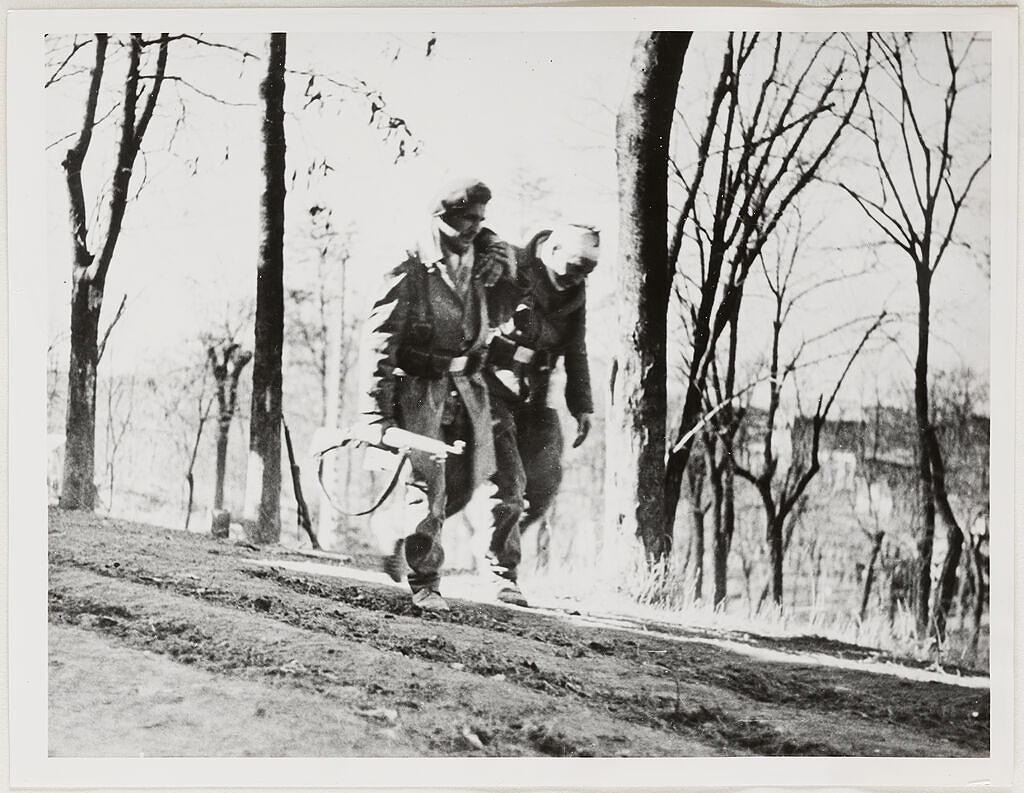
Robert Capa: Wounded Loyalist Is Aided Behind The Lines, Spanish Civil War (1937)
" … must I remain on the ramparts as if my presence alone repels a disoriented and misguided aggressor?"
Even breaking news eventually grows old. The sense that my attention might be the only thing holding this increasingly fragile world together becomes self-destructive. Even though the battle, let alone any wider war, remains unfinished, my effectiveness diminishes. I realize it cannot be my calling to be always up to date with the latest developments. My media diet seems too anemic to maintain an adequate watch. I don't even subscribe to cable, and I cannot figure out how to access local television stations without The Muse's intervention. I get by with what I can stream, my local paper, which has a surprisingly effective editor, and the beleaguered NYTimes, my Washington Post sadly having recently disqualified itself. Much of what I can perceive from here appears to be feinting moves, stuff of little short or long-term consequence. It's helpful to understand that there is no master plan guiding these intrusions, and even if there were, those executing those plans seem incapable of following directions, even those painstakingly written with kindergarten crayons.
April came, dragging Spring behind her.
Forty-fourth

Harold Edgerton: Ouch! [Archery] (1934)
" … and I don’t think they can!"
I take a respite from my CHope series today to remember my remarkable daughter, born on this day forty-four years ago. She was not supposed to die before me, though she left me with occasionally overwhelming memories of her presence. I miss toodling into the Willamette Valley to spot newborn lambs with her. We were formidable lamb-lookers. I miss our long-searching conversations that always lead to revelations. My magic almost always worked with her. I won't forget our final conversation where she cried, revealing that the latest surgery had not relieved her symptoms or her often overwhelming pain. She fixed that herself in a meticulously planned and executed execution.
The searing superficiality of all our present incumbent engages with pales compared to a single genuinely significant life, like my darling daughter's.
Hubris
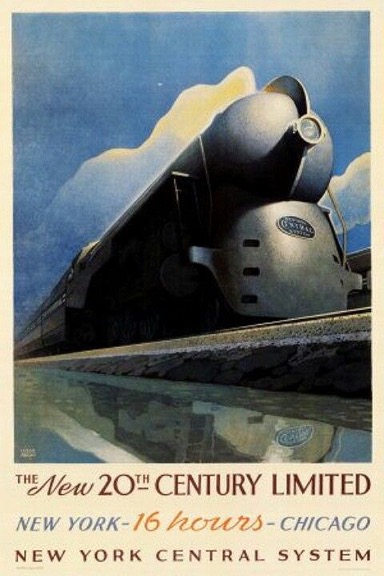
Anonymous, after print by Jean Veber: Schaduw van Paul Kruger hangt over het Franse leger tijdens de wapenschouw te Bétheny,
[Shadow of Paul Kruger hangs over the French army during the gun show in Bétheny] (1901)
Gallery Comment:
"This coat of arms of the French army was held on September 19, 1901 in Bétheny for Tsar Nicholas II. Paul Kruger was in Europe at the time, where he tried to recruit support for the struggle of the Boers in South Africa - especially from enemies of the United Kingdom, such as Russia and France. Print is part of a magazine with cartoons about the Second Boer War. With a three-line caption: Never has a cleaner army shown its strength more brilliantly… while such a clean use had to be made of it for the matter of law."
"They will exit on the same horse they rode in on."
Every civil society insists upon certain comportments. In Washington, DC, most government employees still wear formal business attire. It's unthinkable to go into the office in jeans. In Silicon Valley, a similarly enforced dress code focuses upon a more studiously casual style, just as religiously observed. There, it might be unthinkable not to go to the office in jeans. In the South, people still routinely address each other as "sir" and "madam," however backward that might seem. When I lived there, I quickly adapted to the local standard even though I'd previously thought myself too modern to so engage. I noticed the resulting gentility when people observed this practice and felt adequately cultured when I participated. Even though I'm re-ensconced back in the heathen north, I still observe this practice. It now seems like a matter of simple decency to me. If I had not been raised well, I managed to learn better.
There are likewise comportments that never seem to contribute anything positive.
WitchHunting
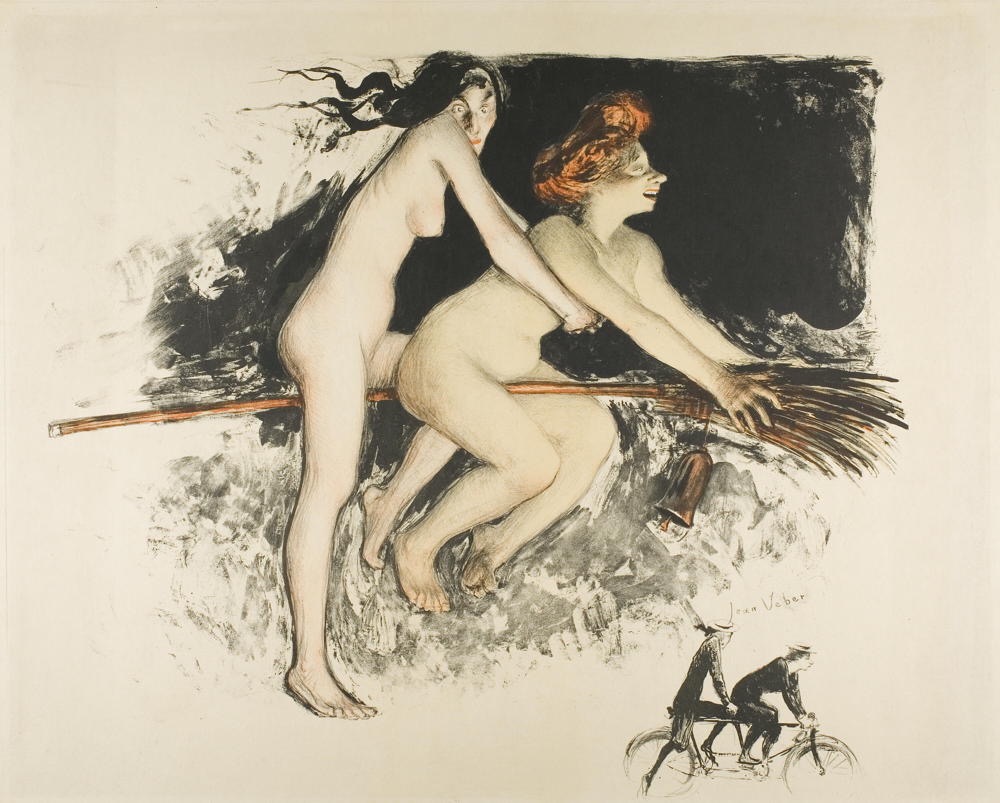
Jean Veber: Witches (1900)
"All accusations to the contrary qualify as WitchHunting."
Even wannabe dictators must learn to spend much of their time in denial, for they become a magnet attracting outrageous accusations. Not that most of them aren't true, but it just would not do to confess to what he's actually up to. Aspiring dictators must uphold certain standards, and truthfulness is, frankly, somebody else's purview. Truth and fiction must become indistinguishable, requiring at least daily denial. News conferences almost always feature the incumbent awkwardly admitting something by vehemently denying it. The assembled journalists and even the press secretary understand the ritual, and few even attempt to deliver a killer follow-up after their original question gets rudely blown off. The palpable fictional content of the denial hangs in the air for a while like smoke obscuring mirrors. He insists they've only uncovered another Witch Hunt, which everyone understands does nothing but confirm the absolute truth of the original statement.
It might help the eroding credibility if he could vary the terms he employs to describe the situation.
ChangingThePast

Mel Bochner: If the Color Changes [MB2042] (2001)
© Mel Bochner
"They toil to expunge themselves. Good riddance!"
Unable to positively change any future, repressive regimes quickly turn their attention to ChangingThePast. This amounts to an impossible objective, though the native impossibility of it won't halt or even meaningfully retard their effort, for outrunning an unsavory past seems imperative if the repressive regime is to gain any respectability. If they can whitewash history, they might stand a chance to reprogram memories. This could result in a sort of forced respectability that repressive regimes always seek. They want to be seen as in favor of mom and apple pie rather than bloody labor strife and Jim Crow Laws. If they are nothing, they are deep-down hypocrites. They desperately want to forget whatever might tarnish their reputation and, their reputation being less than reputable, requires some extraordinary reengineering. They focus on repressing books because they're an easy and reliable target. Not that many of their supporters read all that many books. They've always sown deep suspicions that readers are progressives. They slur other publications and their publishers. Suppose The New York Times publishes a highly-regarded series that turns into a book and a Netflix series tracing the real history of African Americans. In that case, everyone involved gets labeled as "woke." Pure public relations genius soon rebrands "woke" from meaning a form of insightful wisdom to meaning a means for demeaning white people. Wokeness becomes public enemy number one.
Repressive regimes seem uninterested in any distinction between truth and fiction.
Weekly Writing Summary For The Week Ending 03/27/2025

Kunisada Utagawa: Writing examination (1810 - 1830)
Just Trending Toward Something
If I'm witnessing a revolution, it certainly seems to be an awfully ham-handed one. I'm reminded of how a gorilla might go about disassembling something he doesn't understand. He resorts to muted brute force, not knowing what might cause the thing to open. He dents the case and ultimately gets defeated by tiny screws, the operation of which seems too subtle for him to comprehend. Almost every move has been thwarted by the courts. Appeals have likewise proven fruitless. Chaos has resulted. I won't argue that chaos doesn't produce its own effects, though they tend to be something other than structural. They might even create a more substantial structure than it attempted to threaten. As chilling as many of the initiatives have seemed, they sum to deeply superficial, perhaps because they're inspired by science fiction. They rely upon non-existent principles and properties. They profoundly misunderstand human nature.
PennyWisdom
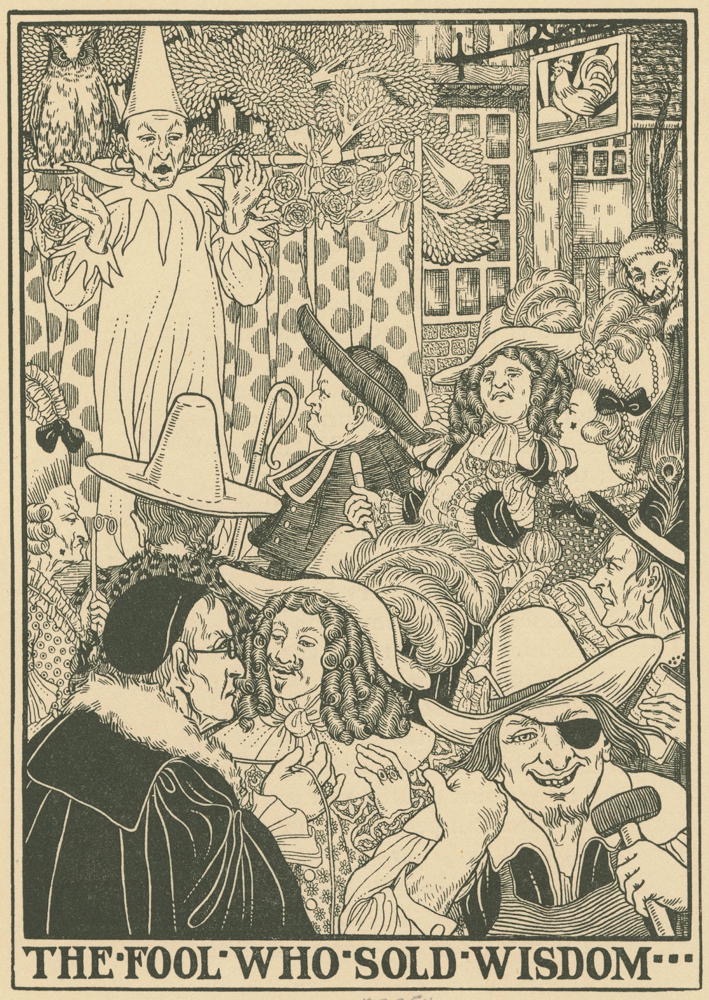
Percy Billinghurst: The fool who sold wisdom. (1900)
"I wonder how our public purse might be influenced
if our billionaire benefactors had ever learned to play Find A Penny, Pick It Up."
The recent injection of multitudes of billionaires into positions affecting the public purse has provided an opportunity to understand better how the very wealthy relate to money. I, the son of parents who grew up through the Great Depression, inherited certain beliefs and practices regarding money. I believe that money is almost impossible to acquire. This belief encourages me to be stingy. I do not seek luxury. I prefer good enough over perfect. I understand that everything costs money and that, mostly, the amount of money stuff costs cannot be meaningfully reduced. Attempting to reduce the cost associated with basic living tends to increase that cost. Trying to eliminate that cost almost always creates catastrophe; the absence of such expenses produces genuine calamity that will cost multiples of whatever was supposed to be saved to recover. I try to be satisfied with what I have, understanding that it's always possible to spend a lot more without gaining an ounce of additional satisfaction. Get-rich-quick schemes tend to be the best way to get poorer quickly.
BIllionaires seem to believe that a penny not spent is a penny somehow liberated from a form of slavery.
Equivocal
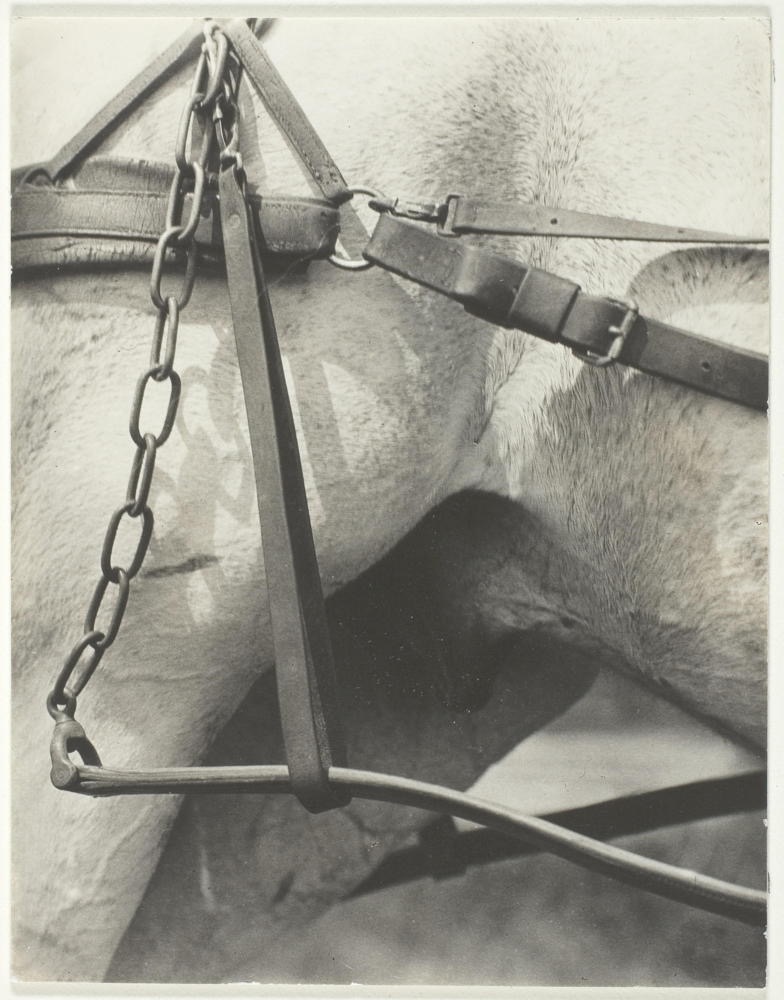
Alfred Stieglitz: Equivalent, Spiritual America (1923)
"The reigning forces of darkness have no idea what they've inspired."
They lie so reflexively it remains impossible to see any shred of truth in their responses. They know that you know, too. It's as if they're chiding you, urging you to go ahead and try to get even. Impunity never imagined a better friend. And they're right for the moment. In that instant, there couldn't possibly be any leveling of that playing field. The whole game seems to belong to Simon Legree's team. The umpires are crooked. The fans, divided. Even the future of the game appears undecided. What was once considered The Great American Pastime no longer means anything to anybody. It's become a medium for domination to a few and the absolute symbol of subjugation to a fast-growing majority. This situation will turn, but not immediately, and certainly not without considerably more discomfort. Until then, the lies will continue unabated as if winning those little controversies mattered, and the liars will continue enjoying the only notoriety they will ever see. They're each set on a course toward infamy.
Philosophers might insist that every human action might as well be considered ambiguous.
Insecure
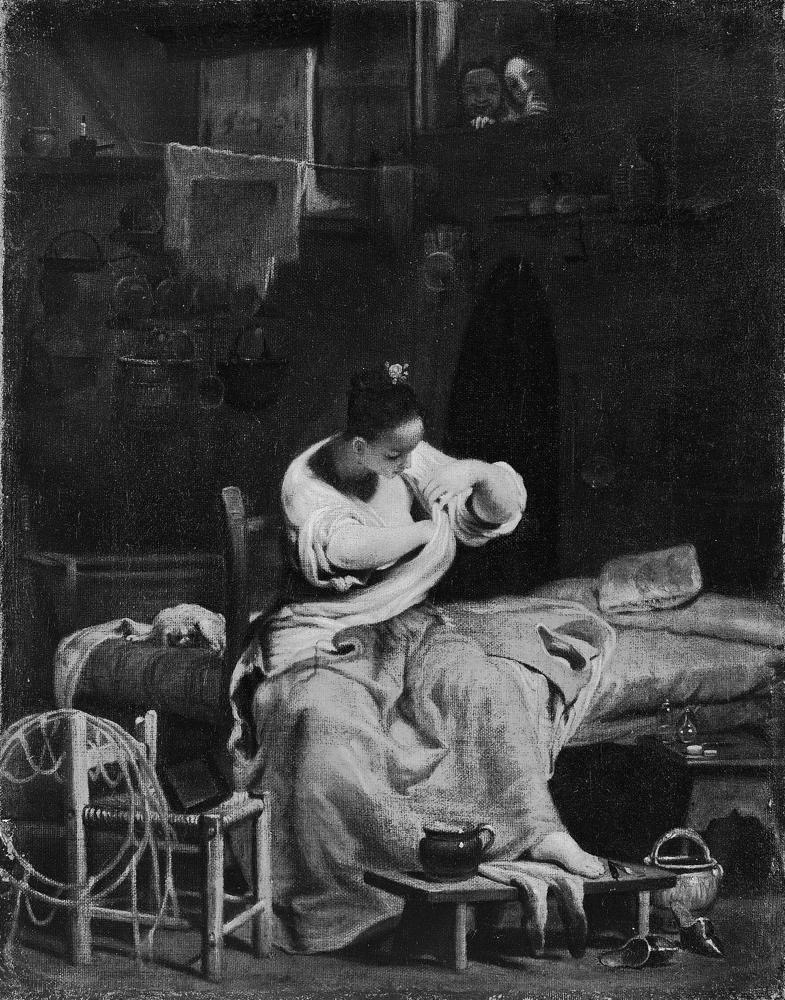
Attributed to Giuseppe Maria Crespi:
Woman Looking For Fleas (c. 1715)
" … the one true sign of their underlying cowardice!"
Security was never gonna be this administration that can't administer anything's strong suit. If loose lips did sink ships, we'd be down a few battle cruisers after only two months with "him" in office. Fortunately, most breaches go unnoticed by allies and enemies. The most damaging ones live on to become exemplars of an administration's performance, bloopers that lived on to become definingly infamous. The amateurs employed by this operation ensured a day like yesterday would eventually come around, where a group of senior officials engaged in top-secret government business on an insecure private network with an inadvertently invited journalist listening in. This arrangement violated more laws than it respected, though few doubt that what it represented has been a typical scenario since this incumbent took office. I know from a recent conversation with an old friend who works at the USDA that they, too, communicate via Signal, though that violates multiple communication preservation and security protocols. It should surprise nobody that this incumbent, who scoffs at almost everything, also routinely scoffs at security laws.
When confronted with the evidence of this egregious security breach, our new Secretary of Defense (SecDeaf) responded by screaming at the questioning reporter, thoughtfully channeling his emotional age as if anybody was likely to guess differently.
Extortion

James McNeill Whistler: The Strong Arm (1895)
"Congratulations, or something. Such are the wages Extortionists always earn."
Nothing better evidences the weakness of this new administration that can't seem to administer anything than that they resort to bullying instead of convincing. Honest politicians exercise the considerable art of forging such deals, persuading, horse-trading, and working for agreement with the implicit acknowledgment that whatever's decided won't hang together long without voluntary acceptance. Governing demands the consent of the governed, as every failed authoritarian can readily testify. They thought it might be somehow simpler to strong-arm their way toward acquiescence, and in the extremely short run, such tactics might even seem to succeed, but no allies get created when inflicting such decisions. Quite the opposite. With each so-called success, the number of detractors grows until no supporters are left. It matters how treaties emerge.
It feels no less terrifying to understand that the assault comes as a result of their weakness.
MessSitting

Jack Gould: Untitled [mess on floor of ruined apartment] (1955)
"I'm first coping with the underlying nature of the difficulty."
Last night, for the second night in a row, The Muse and I had been invited out to engage in another dialogue. Neither engagement was intended to fix anything, but each was more focused on better understanding the nature of the difficulties or what fixing might entail. We might have wondered what we'd gain from engaging in conversations while Rome burns, except our experience strongly suggested that failing to engage in precisely such conversations might be the leading cause of failures when attempting to extinguish fires. It's all too easy to run into the burning building armed with little more than the best intentions, only to discover some hidden nature of the fire after entering. Under the Measure Twice Before Cutting Rule, it's often proved better to engage in some aimless conversation before acting to resolve a situation, however urgent it seems. It might even be that the more urgent a response appears, the more necessary the preceding conversation. Improving focus or understanding might better target a response.
This always seems like wasted time.
CHope

Jules Bastien-Lepage: Mower Honing a Scythe (1878)
" … and to radiate enough hope to make however I cope feel worthwhile."
Over recent months, my MacBook Air started crashing each morning. Because I became a compulsive saver, I rarely lost anything in these crashes. They became annoying, usually happening at one of the more inconvenient times. I'd be rushing to finish posting my daily story when everything would freeze up, and I'd have to begin that familiar recovery routine. We all know how rebooting under such conditions seems to take a little longer than forever. I'd recover and then finish my business feeling persecuted rather than elated. On a recent trip to Portland, I resolved to buy a new MacBook. I'd diagnosed the crashing difficulty as being caused by insufficient memory. I'd learned that my current machine already has all the memory it can handle, so I reasoned that I needed a new machine. The Apple Store was its usual minimalist purgatory overrun with potential customers. I managed to catch the attention of a representative after spending fifteen or twenty minutes poking at sample display machines. I'd decided what I needed but quickly learned they didn't have what I wanted. I was advised I could order one online but cautioned that the low inventory probably meant some newer models were imminent. I left with a pocketful of complications, knowing that I would not run home and purchase a new machine online.
I started coping better with my situation instead.
Weekly Writing Summary For The Week Ending 03/20/2025

Louis Auguste Lepère: Modern Bucolic (1901)
My Still-Tolerable Fiction
I have become somewhat of a Pollyanna character in the current psychodrama because I remain hopeful and optimistic despite or because of the current troubles. I remain astounded by how so many seem so sure that they can see what's coming. Many seem to project from recent experience to confidently insist that we've already lost our sacred Democracy. And if we could reasonably project just from recent experience, their confidence might be well-placed. I don't understand what such confidence gets anyone besides discouragement when we seem to need more courage rather than less. I admit that I do not and most probably cannot know. This admission doesn't nudge my dread into complete remission, but it does seem to extend permission to believe remission still remains possible.
This NextWorld Series has helped me focus and perceive what has been unfolding before me, as much as I would have preferred to have been distracted and not paying such close attention.
Without
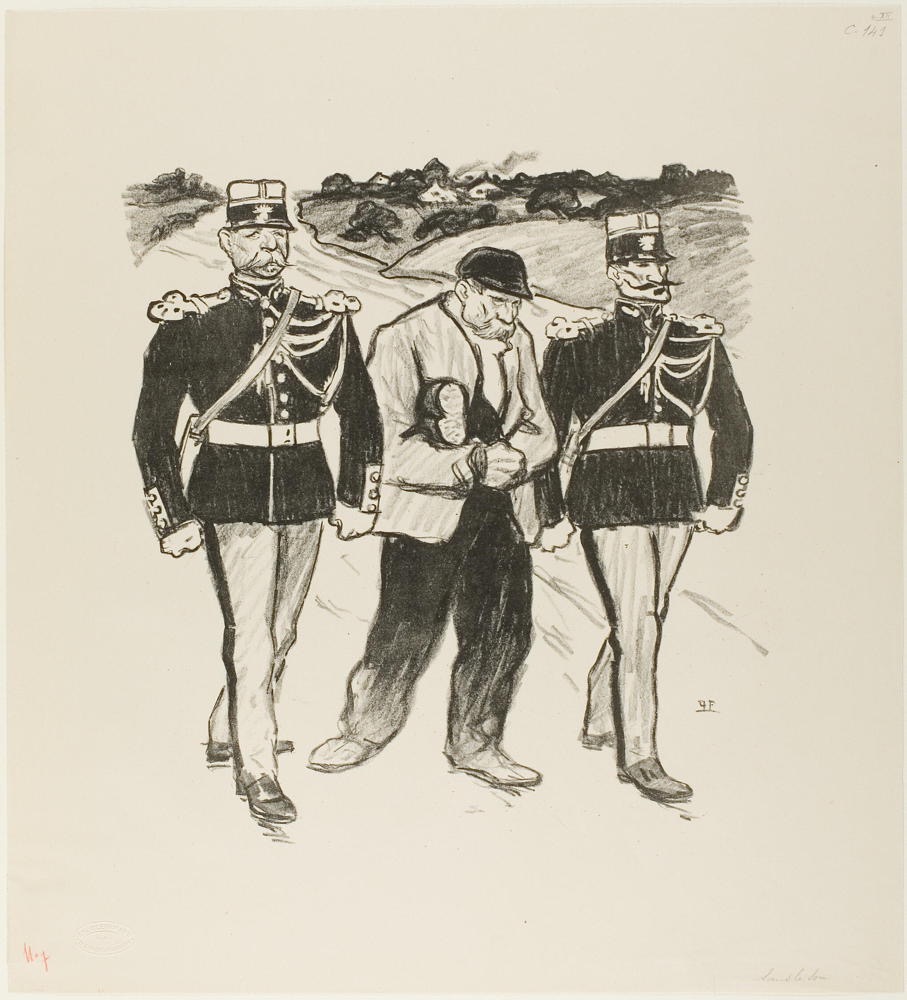
Théophile-Alexandre Steinlen: Without a Cent (March 1894)
printed by Edouard Kleinmann
" … patriotically doing Without!"
The first day of spring started suitably moist. The tail end of a week-long Pacific front left the street leading toward The Center of the Universe puddled and glistening. The cats, lately too familiar with that damp back fur feeling, hesitated before departing outside to make their morning rounds. I've tried to preserve their sense of rhythm through the long and isolating winter where outside so often seemed too unpromising for them to spend much time out there. I hovered close as if they might return the favor, for I also needed my time regulated. My world started disintegrating as the NextWorld began kicking in, though even my anticipation of it served to start closing me in. I anticipated shortages. As a proud veteran of the pandemic, I'd excelled at doing Without. I hunkered down and proudly made do, timing my off-hours excursions to avoid crowded venues. We didn't go out for supper. We avoided movies. We became willing homebodies, feeling we contributed to the common good via small sacrifices. While some protested the need for such compromises, we reveled in them. We thought mask mandates were common sense, and people complaining about them seemed self-destructively stupid.
The crazies have taken over now.
Unresolved
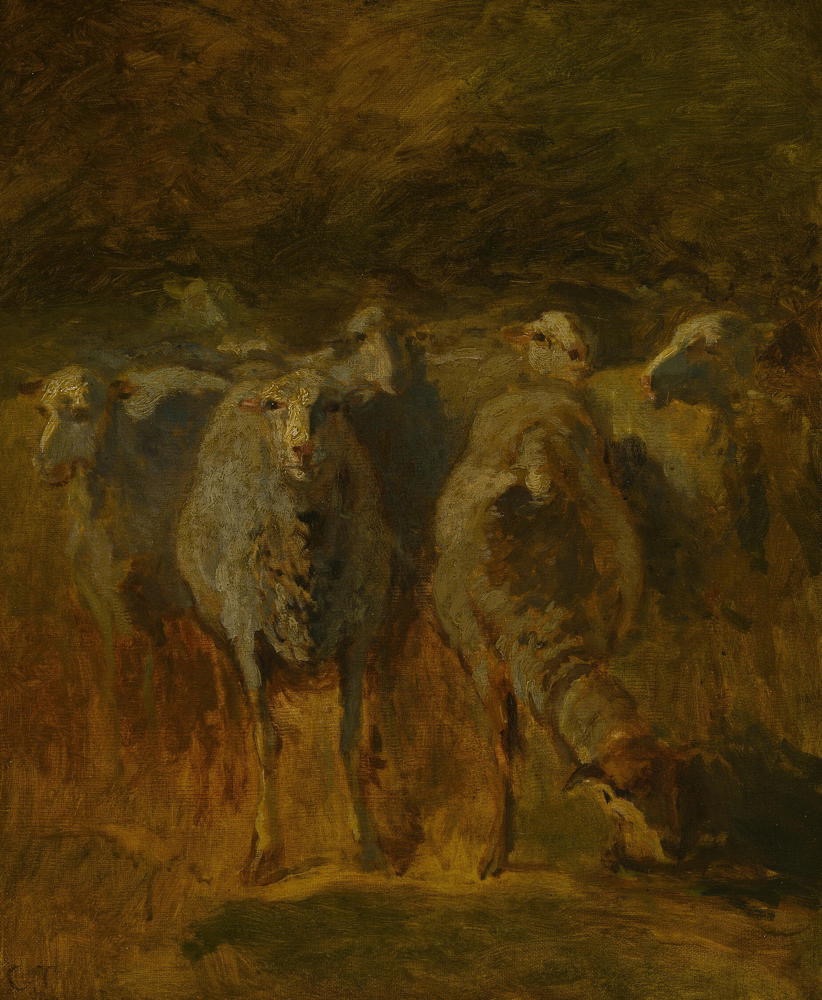
Constant Troyon: Unfinished Study of Sheep (c. 1850)
"If you think changing the world is difficult, try to keep it the same."
The ninetieth installment of any of my series marks the planned last story for me. This NextWorld Series will be a little different. It was probably always the nature of this particular series that it might hold the potential to be never-ending, for I designed it to be more about chronicling than post-facto reporting. At the beginning, I couldn't have known how or even if it might ever end, and that was my explicit intent. This has been my thirty-first series written over the prior almost eight years. Each followed this same design principle: the story would unfold rather than be outlined beforehand. In this sense, each series has violated one of the fundamental principles of both fiction and non-fiction. I might have been a writer much earlier in life, but I had to first get over the instructions that my fifth-grade teacher insisted represented the only proper way to write. She demanded an outline first before even laying pencil to paper. Then, she'd judge the result by how closely the finished work tracked to the original outline, as if this represented how anything works. It took decades for me to outgrow that poisonous lesson and simply start writing.
" … to mistake an aspirational for a supposed-to-be might be the source of most tragedy in this world."
Now, I can't seem to stop.
Lawlessness

Anti-slavery Almanac:
Lawless " burning of men " by the many. (1840)
(The American Anti-Slavery Society published the almanac
yearly from 1836 to 1843.)
"We were not supposed to abandon all hope here."
Every bully dreams of anarchy, believing themselves immune from the inevitable harm that always accompanies Lawlessness. Their so-called success always proves temporary when they succeed, for the bullies always manage to do the most damage to themselves under such regimes. Without rules or line judges, they tend toward excesses that not even they can ultimately tolerate. Further, there is no respite when every man, woman, and child decides they're a despot. Vigilance starts against vilified groups but soon extends to include former friends and even relations. When agreements can be blithely ignored, everyone's imperiled, and no defensive force proves adequate to repel the wolves from any door. Periods of relative anarchy historically proceed periods of stricter order. The comeuppance comes as a kind of penance never soon forgotten. Vestiges of that innate wildness remain, of course, or we wouldn't be human, by which I mean, or else we wouldn't be wild animals. We never were as civilized as we'd hoped we'd be. It seems we're only decently respectful toward each other after we've committed some significant sin together. Armistices celebrate a temporary end to evil more than the beginning of good.
Our incumbent was always dangerous because he refused to follow prescribed rules.
ImaginaryEnemies

Giovanni Battista Piranesi: Title Page from Imaginary Prisons (1749–50)
"I do not believe he can possibly succeed by so transparently misleading us with his ImaginaryEnemies."
Sixty days into NextWorld, ImaginaryEnemies seem to outnumber any actual ones so far. Our fresh incumbent must possess a hyperactive imagination, if only because of the astounding number of opponents it manufactures. Ancient allies regularly turn up on replacement watch lists, accused of some previously invisible infraction. Our oldest trading partners stand accused of ripping us off for generations by insisting on following mutually agreed-upon trading rules. Our former benefactors join the ever-lengthening list of probable suspects. It almost seems as if we’re suddenly suffering from some persecution complex, as ridiculous as most of the accusations seem. With each new indictment, the accuser's credibility diminishes in the public's eye. With plummeting popularity, he, unsurprisingly, doubles then triples down. It would not surprise me to learn that we had finally been discovered to have been our own worst enemy for years and that it took a stable genius in the White House to finally recognize the threat. I suppose we will be owed an obligatory tariff on ourselves next.
I feel increasingly exhausted by the transparently imaginary turmoil.
HeadCold

Robert Dighton: Dev'lish Cold, from A Set of Heads (c. 1795)
"Achoo! [Bless You!] Bless us all!"
I've had something like a HeadCold haunting me over the last week. It's been sneaky because its sole tell has been a clogged left ear. No runny nose. No overwhelming sneezing. No cough or phlegmy throat, just that otherwise innocuous yet annoying clogged ear. I bought some decongestants, which, carrying on the proud tradition of decongestants throughout history, worked just a little worse than nose-picking. The primary symptom has been modest disorientation. I'll be writing a story at my deck when I suddenly sense myself listing slightly to the left. I felt weary then, as if I needed to lie down for a minute. These sensations distract me from my mission, though I have so far been able to stave off completely caving into them. However, I have been begging off working in the springtime yard in favor of lengthy naps. As we enter my favorite season after a protracted and unusually discouraging winter, I've been slinking around, so I sense something's wrong. The HeadCold hardly seems to qualify as an explanatory diagnosis.
Then, I caught onto an underlying significance.
Blather

Edward Lear: from Book of Nonsense (1850s)
"Fishermen and golfers tend to be the most prodigious liars, masterful Blatherers."
News outlets have finally started publishing ver batum quotes from our incumbent. Before, journalists would attempt to translate whatever he'd attempt to say in what might have been a misguided belief that it was their journalistic responsibility to at least try to translate the essence of what he'd attempted to impart. This tactic failed in two significant ways. First, nobody could ever be confident that they'd adequately parsed a proclamation, so the reportage violated some journalistic first principle separating observation from fiction. The results often better qualified as reassuring fiction. Second, the reader was insulated from the more significant element of the story, that their president exclusively spoke in incoherent utterances instead of straightforward sentences. During the campaign, many complained that he seemed to be losing cognition. They'd assess word variety and see that his vocabulary had shrunk compared to earlier campaigns. Video of his speeches, almost exclusively replayed in small snippets, also demonstrated a definite incoherence. Those who survived one of his ninety-minute barn burners tended to lose cognition themselves from being subjected to his usages for so long.
Now that he's chief executive, he seems to have lost some of his former reticence.
Weekly Writing Summary For The Week Ending 03/13/2025

Wolf Vostell: TV-Oxen II, from the portfolio "Weekend"
[TV-Ochsen II, from the portfolio "Weekend"] (1972)
Published by Galerie René Block, Berlin
I Quietly Pray As I Wonder
I often wonder whether what I write will hold any future significance. Moments slip past all of us, and it might be that all writers attempt to stem that slippage by chronicling time's passing. As I reported last week, I've been spending more time considering before setting fingers to keys since I started this series. This time has seemed almost pregnant with significance. I write in ignorance, if not total ignorance, at most the usual volume of it. I anticipate here and also reflect; neither acts perfect reflections. Imperfections might best represent this time later, this period when NextWorld started manifesting without anyone controlling it. Our fresh incumbent seems to have honed his self-sabotage skills since his last time in office, and he already possessed perhaps the very best such skills ever seen in any incumbent. He's far surpassing even his prior incompetence. Our democracy struggles to compensate for his utter incivility. Most days, it seems as if he never noticed that other people are here, many utterly dependent upon his decisions. Fortunately, our attorneys general and judiciary remain steadfastly standing between us and his ineptency. I quietly pray as I wonder what to describe in my writing each morning.
Woebegone
Claude Monet: Sandvika, Norway (1895)
"I expect they'll continue trying, anyway."
The Lake Woebegone Syndrome might have proved the most damaging of all the popular delusions. Some would vote for Dunning-Kruger, "a cognitive bias in which people with limited competence in a particular domain overestimate their abilities" (Wikipedia) Different people favor different foibles, but for self-sustaining delusion power, Woebegone works for me. Named after Garrison Keillor's fictional Minnesota town of Lake Woebegone, where, in his description, "the men are strong, the women, good looking, and the children, above average." Keillor describes a fictional place that perfectly encapsulates a common human aspiration. Who wouldn't want to call such a place home? Who didn't, at some level, hail from a similar myth, if only because the world of our youth might have seemed more understandable, more reasonable? I refer to my hometown as the center of my universe, where gravity works right, and Keillor taps into that sense when he characterizes Lake Woebegone. Who doesn't aspire to return to such a place? Who doesn't secretly try to recreate that sense when designing something?
It's common that a company, when considering recruitment, produces a process intended to create a little Lake Woebegone.
Undue

Lucas Cranach the Younger:
page from book: The Art of Wrestling: Eighty-Five Pieces
[Ringer Kunst: Fünff und Achtzig Stücke] (1539)
written by Fabian von Auerswald
printed by Hans Lufft
"I suspect this might be you and fear it will be me."
What better way to get your way than to simply ignore the rules as if they didn't pertain to you? The rules, after all, exist as mere agreements, and any associated guardrails are enforced more by practice than by police forces. We mostly police ourselves; when we don't, we tend to let the matter slide until some perfectly predictable accident occurs. Then, if then, the Justice Department might step in. If NextWorld has demonstrated anything, it's been how much civilization still depends upon the goodwill of upstanding citizens. Inject a few ill-willers into the mix, and everyone's world turns chaotic. Our incumbent stands as a cautionary tale in this respect. He always was the sort of personality we build jails to house, yet his brushes with justice found him slippery. He represents the worst our culture produces, unrepentant and insistent upon receiving much more than he's due. It was a huge mistake, if nonetheless typical that The Senate refused to convict and impeach him when they had the chance. I can find no evidence that showing mercy under such circumstances ever produces anything but worse behavior. It's no mercy, even to the offender, to find him not guilty when he's guiltier than sin.
Perhaps most of all, we prided ourselves on being a country of laws.
Nonsense

Unidentified Artist: The Nonsense Seller (1814)
Published by Aaron Martinet
"We will doubtless continue feeling disoriented … "
Ordinarily, following a few months' immersion, a new context starts making sense. I can one morning suddenly properly anticipate again. I rarely feel blindsided or surprised, even when some fresh inanity appears. Here, though, my experience has so far seemed unprecedented. I feel no sense of what might be coming next. My dread quotient sits near the red line, and I do not know how to quiet it. I feel deeply saddened as if utterly surrounded by stupidity, and it's stalking me. I daily learn of some fresh indictments for actions that don't qualify as crimes. Since when was it likely that one might be arrested for insulting a president, for showing genuine disrespect, especially after he'd earned it? Since now, I guess, though the courts seem as though they are already clogging up with what will inevitably be judged as frivolous charges. I expect a record number of disbarments as the Justice Department ramps up to become the incumbent's lap dog. The Nonsense might have made sense had Jonathon Swift, Lewis Carroll, or Mark Twain spun this tale. Instead, a third-rate, unreality television actor with declining cognition seems to have jumped the rails to become his own scriptwriter.
A respectful amount of literature was written to ridicule absurd rulers and their policies.
A_Modest_Proposal
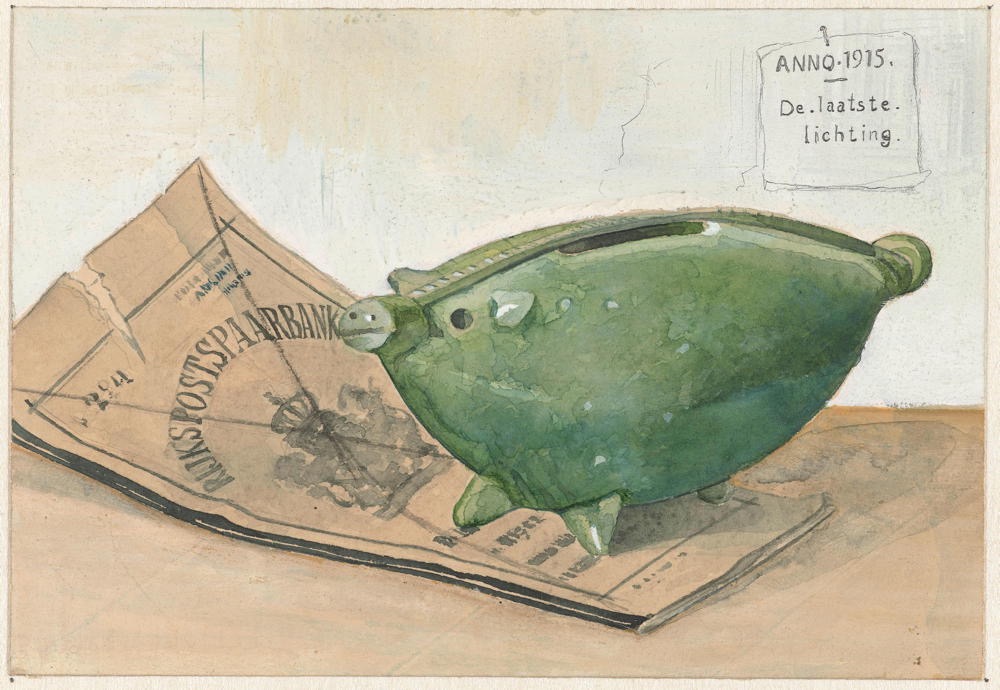
Frans Everbag: Spaarvarken en spaarbankboekje
[Piggy bank and savings bank book] (1915)
"( … can we actually achieve greater before we've even achieved great?)"
How very fortunate we are to find ourselves blessed with an experienced self-dealer holding the office of the presidency. Prior office holders were not so experienced in the fine, if often shady, art of creating personal fortunes through insider trading. Far fewer than one percent of any population ever possess the secret to resolving every problem human civilization has ever encountered, so what were the chances that we'd hit that lotto number in our lifetime? In any lifetime? Probably much less than zero, but here we are with an experienced self-dealer at our service! Just last week, he invited a group of crypto-captains to supper at the White House, where he announced the creation of a Strategic Crypto Reserve to be added to the nation's other stores of wealth like Ft. Knox. He apparently tipped off those insiders as to which currencies he would choose for the pilot program. Over the following weekend, two previously languishing cryptocurrencies experienced dizzying increases in value, suddenly launching whoever held those "currencies" into personal wealth beyond imagination. The president himself, skilled self-dealer that he was, reportedly cleared something north of five billion dollars just over those two days, a return he confidently declared amounted to peanuts. The targetted cryptos reportedly later crashed back to be worth a little less than before they started booming that previous Friday.
In the past, such an admission would have put him into the number one slot for investigation by the FBI's financial fraud division.
Unnecessity

Printed for and sold by W. Bingley, Newgate Street London:
The Fruits of Arbitrary Power: or The Bloody Massacre (1770)
Massachusetts Historical Society Online Collection
"Not a lick of any of this was ever necessary for a second."
NextWorld seems primarily comprised of Unnecessity, absurdly arbitrary insistences. The war on common decency, where our better angels are vilified in favor of long-ago vanquished lesser ones. The absurd attacks of diversity initiatives, equity improvements, and respectful attempts to include everyone in opportunities. Nonsensical complaints about awareness, as if sleepwalking were preferable to acknowledging experience. The forced blindness of refusing to acknowledge genders. The never-existent yet still popular War On Christmas. The belligerent practice of primitive Christianity as if it represented the state religion. The insistence that, despite our Constitution, our sacred separation of church and state amounts to an abomination. Perhaps most of all, the cruel discrimination as if some citizens were naturally more American than others. The vilification of the weakest among us. The criminalization of everyday actions via presidential proclamations. Perhaps most of all, the presuppositions guiding these insanities. These notions go largely unquestioned, though nothing beyond innuendo was ever offered to justify or prove they were true.
The belief that all government spending has always been, by definition, wasteful, fraudulent, and abusive, and therefore, should be suspended.
Whim

Johann Wilhelm Baur: The Ordering of Chaos (c. 1639)
" … an undisciplined eight-year-old ruled by Whim."
The defining element of NextWorld might end up being Whim, our incumbent's impulsive choices. What if there never was a plan, if Project 2025 never influenced a single action by this administration? What if the continuing analysis intending to identify motive and strategic intent amounted to so much wishful imagining? In statistics, sophisticated tests exist to determine if apparent patterns amount to random events or contain potentially useful information. Since we are pattern-seeking organisms, we readily perceive patterns where there might be none. It can be damnably difficult to determine the difference in the real world. We presume strategic intent, whether or not it exists. We imagine that some plan informs action even though much of our own behavior might be best labeled unplanned. But we don't natively seem to perceive randomness, either. We might be incapable of perceiving randomness, especially regarding human events. We might accept that evolution depends upon random iteration without fully appreciating that it influences human events and world history no less.
The booming cottage industry focused on understanding our latest president's behavior never seems to sleep.
Weekly Writing Summary For The Week Ending 03/06/2025

Charles Green Bush: Let Us Have Peace! -Fortissimo,
from Harper’s Weekly Date: published June 19, 1869
Inevitable Impeachment Trial
With only two more weeks remaining in this quarter—in this over-long winter—I realize that the NextWorld I have committed myself to describe in this series will not fully manifest before I exhaust my allotted time. Three months has been as long as I've cared to focus my attention on any topic. After fully immersing myself in prior series, I have required some fresh perspective. I sense that this series might have been a mistake, for I am not a political commentator or patriot by nature or interest. Yet, I have been watching myself channel my inner Thomas Paine in my writing each morning. I have felt genuine outrage that anyone would try to undermine MY democracy. My relationship with my country has never before been the least bit chauvinistic. I've thought the banner-waving patriots more hat than cattle. I have squelched whatever pride I might have felt, sensing my pride probably would preface some fall. The Mall in DC is lined with monuments to human folly, and thanking others for their service has often felt obligatory. I sometimes plumbed the edges of diversity yet still felt my country was of me. The criminals currently occupying the government disgust me, for I believe we should be gratefully bound by laws. The lawlessness exercised by these clowns might go unpunished, with four Supreme Court justices unable or unwilling to abide by our constitution. I do not aspire to be a reporter, though. I'm just a writer. I have surprised myself with the content of this series so far. I didn't know how deeply I felt about my government, how deeply I respected the patriots who populated the misunderstood bureaucracy until it was threatened by idiocy and lawlessness. There never was any master plan. The tactic was to disrupt, bring down, and humiliate, yet that tactic has been backfiring so far. Even the tariffs turned out to have been unconstitutional. Add that violation to the ever-lengthening indictments. I wonder what I'll write about when the inevitable impeachment trial gets underway.
NoDogBarking

Edwin Landseer: The dog and the shadow (1877)
Engraver: Charles Cousen
"Our antibodies should vanquish this evil infection."
The oath guides the oath-taker to swear to defend against all enemies, foreign and domestic, without offering any instruction about how to identify an enemy. The most insidious enemies arrive unrecognizable or, worse, in deep disguise, so they seem friendly. Everyone assumes that they'll know one when they see one, but never having seen one, they have no experience from which to draw. False positives might be common, but false negatives seem far more worrisome. The literature has explored every variation, from the fox in the hen house to the demon born as the son of the American ambassador. Once they're through the door, defenses seem as useless as The Maginot Line. Once the infiltration happens, one faces a wholly different problem. One that might not have a solution, for then it's no longer an attempted intrusion but a full-blown infection, and we're usually loathe to take our medicine. We reason that we did not deserve this illness, that we had generally always been decently intended, but our pleas fall beside some more profound point. We're no longer independent from the threat. It has become us, so to live up to our oath, we must figure out how to defend against ourselves.
When the president commits treason, the defense must stretch beyond what would have once passed for reason.
FutureTensions

Corita Kent (Sister Mary Corita): let the sun shine (1968)
Inscriptions and Marks
Signed: l.r.: Corita
(not assigned): Printed text reads: LET THE SUN SHINE IN
the creative revolution—to take a chunk of the imagined future and put it into the present—
to follow the law of the future and live it in the present. Waskow
inscription: l.l., in graphite: 68-69-E
"We experience dying."
NextWorld is most assuredly not the present world and never will become it. It exists only as promises never intended to be fulfilled. It exists only as a placeholder to attract and hold attention away from present tensions, which true believers insist will prove to be only as temporary as necessary. We wonder how provisional that might prove to be. They tout the oldest excuses, insisting that nobody bakes cakes without breaking eggs when they're neither baking cakes nor breaking eggs. These are real people involved. Now! They do seem to be cooking up something, though, and it doesn't smell much like dessert. It smells distinctly fishy and not in any alluring way. It stinks! The promises are supposed to separate us from those senses, to fill us with satisfying hot air. It lacks substance, nourishment, and anything even distantly resembling truth. It only tastes sweet if you believe. Those who cannot or will not believe cannot receive the blessings only such belief can bring. NextWorld is nothing and never will be. It still wrecks plenty of havoc.
Those who somehow manage to believe baffle the rest of us, for belief never requires any sort of verifiable basis.
Deflating

Edmond Guilliaume: Bismarck, from Les Génies de la Mort
[The Geniuses of Death] (1870)
ABOUT THIS ARTWORK
Edmond Guilliaume’s images are blunt caricatures that combine well-known German symbols, war leaders, and macabre images of destruction. Otto von Bismarck became prime minister of the Prussian state in 1862 and of the unified German Empire in 1871. To a French audience, he was the cruel leader of the Franco- Prussian War (1870–71). With a skull head, pointed Prussian helmet, and Prussian eagle superimposed on his face, Bismarck looms like a poisonous, grasping plant over the destruction of the French countryside. Playing off a noble coat of arms, Guilliaume gave the French enemy a ghoulish image of death.
"We'll see who fills the gaps deliberately carved into our once-reliable safety nets."
When I attended high school, my part-time after-school job paid me $23.50 in today's currency per hour. Further, depending on the season, anyone who wanted a job could find one. Through the summer, even better-paying harvest work went begging. My actual rate of pay was $2.50. The Vietnam War raged in the background, and the economy was booming. As the war started winding down, inflation became a concern. Unemployment became a thing again as the economy cooled. Several shocks to the economy occurred in the early seventies. War in the Middle East spawned a slowdown in petroleum imports, which raised domestic gas prices by over fifty cents a gallon, doubling overnight. Interest rates soared as never before, with mortgage rates climbing into the mid-teens by the end of that decade. The Reagan Administration engaged in almost unprecedented efforts to reign in what was labeled "stagflation," economic stagnation combined with alarming inflation. The effort attempted to cool the price expansion without cratering economic growth. This was my introduction to Deflating.
For most of my life, the economy had hummed along growing.
Consent

Unknown Artist: Nullification….despotism (1833)
LITHOGRAPHER: Endicott & Swett
"Commerce between master and slave is despotism." Thomas Jefferson
"We were founded to instantiate E Pluribus Unum, never the other way around."
Democracy demands that the governed give consent to those who govern. The alternative, however else it might get dressed up, amounts to despotism. To clarify my terms, despotism denotes any form of governance depending upon absolute power to affect that governance. In other words, under despotism, the people do not have a say about who governs them or how that governance operates. It amounts to a Father Knows Best form of government where The People enjoy the absolute freedom to be treated as ignorant children. Many organizations operate under this form of governance, not least some of the more prominent churches. Traditionally, whatever The Pope declared was considered the word of God. It's difficult to imagine any more absolute power than that exercised by God or his duly designated representative here on Earth. Even The Pope holds an elected position, though. A general election of all Catholics might not have chosen him, but a collection of the second-highest potentates, who supposedly represent the interests of all their constituents, come together to select a Pope from a slate of candidates of their peers, effectively providing consent of the governed to the selection process. In this way, not even the Catholic Church fully qualifies as despotism since the power seems to initiate from the consent of at least the governed’s representatives.
Labor unions are founded upon just this principle: workers should properly have a say in managing the operations within which they labor.
TheBreaking

Harold Edgerton: Hammer Breaking Glass (1933)
" … what might really make America greater than anybody ever expected, again."
The dedicated sociopath eventually oversteps his boundaries. He never could color within the lines of propriety, and, eventually, he strays too far over the lines and alienates his primary constituency. His was never more than theoretically anything, anyway. Its reality would, then, have to seem rather radically different from the illusion he so successfully managed to initially project. Making America Great Again couldn't have ever possibly felt like as great an experience in practice as it promised in theory. Once gravity actually engages, nothing seems to fly as easily. Hefting actual mass makes real work. Every action inevitably spawns a roughly equal and opposite reaction, and externalities tend to quickly start inconveniently piling up. Unintended and unexpected consequences burden acceptance. Targets move too close to home. We finally glimpse the long-reviled enemy, and he turns out to more than merely resemble us.
Even benevolent reformers encounter these effects, for old status quos, however ineffective, tenaciously hold their ground.
WhoTurns?

Jacob Jordaens:
The Master Pulls the Cow Out of the Ditch by its Tail (1652)
ABOUT THIS ARTWORK
The title and subject of this etching come from a proverb in the Dutch poet and humorist Jacob Cats’s 1632 Mirror of Old and New Times. The proverb explains that it is necessary for a person to take responsibility for his or her own affairs. Jacob Jordaens depicted the proverb literally, showing a cow that has fallen into a ditch and must be pulled out by its master. The crowd of onlookers does not help the man, for it is his duty to care for his animal. The theme of this etching exemplifies the moralizing nature of many Dutch works of the period, and the composition recalls a tapestry by Jordaens in his Proverbs cycle.
"We dare not sit silently while this perverse, immoral minority tries to take over our state."
Our world has always been overfilled with seductions. Depending upon individuals’ proclivities, they might find infinite ways to fall. Some tumble to the ever-popular omission while others prefer to commit something, but none of us were ever impervious to some perverse attraction. Our moral and ethical fiber seem unlikely to ultimately save anybody, but a time will come when one will face a choice. Most choices will not come nearly as simply as any either/or, and many if not most, might manifest more like dilemmas, where your response will appear to damn you, whichever side you take. A moral or ethical compass finally shows its inherent usefulness after perhaps a lifetime of idling. Then, the defining difference might emerge. Then, the underlying purpose of every prior struggle might find meaning. Once one makes this choice, it's likely to be irrevocable. The fate's sealed. Identity is finally revealed. The question was always, "Will you become a Nazi?" You're already done for if the answer isn't "No!”.
The rise of NextWorld harbingered just such a choice.
Weekly Writing Summary For The Week Ending 02/27/2025

William Delamotte: Resting, Men and Dogs Under a Big Tree,
from the first issue of Specimens of Polyautography 1802, published 1803
An Emboldened Opposition Cheers
How many ways can anybody observe an unsettling situation? Probably an infinite number of ways. I've concluded that their strategy was primarily to scare. My job must then be to refuse to be spooked and to remain self-assured. The howl was never intended to serve as a warning. It was their initial assault, their strategic first step, meant to seem blood-curdling. Those whose blood has curdled produce weaker defenses. Their offense depends upon our weakened defense, so we must muster something other than an, in any way, weakened one. Some insist that we should feel emboldened instead, that we might as well interpret their venom as so misguided as to qualify as self-sabotage. Who's to say it isn't? Who's to say they didn't intend it to be self-undermining? We might be and probably are still witnessing a lemming-like mass extinction event, an attempt by backward-looking Repuglicans to finally do themselves in. They noticed the numbers and have been watching the trends.
No future warmly welcomes them.
Uncle!

Bernard Picart:
Bust of Young Man Resting Chin on Hand (c. 1720)
" … only I hold the cure."
I sleep poorly, if at all, and I can't seem to get hungry. I recognize these symptoms, but only I hold the cure.
Let the record show that after sixty-nine consecutive mornings chronicling the emerging NextWorld, the author croaked out a muffled, "Uncle!"
Imformation


Claes Oldenburg: False Food Selection (1966)
Designed by George Maciunas, Published by Fluxus
"Find friends who will deny your heart's desire in exchange for everlasting innocence."
Subtle differences often go unnoticed. They're part of one of the oldest tricks in the book, employed by charlatans throughout history. Sell somebody the title to a property with a slight misspelling in the description, and you've sold them nothing. Promise with a pinkie pledge while slightly mispronouncing the premise; the other will almost inevitably believe they can trust you. A whole lot of what I might label Imformation exists out there that was only intended to mislead you. The unscrupulous revel in such wordplay. They are playing a game their targets never suspect is even being played. They might discover later, if they ever discover, that they were played in the most profoundly cynical way. Discouragement might be the purpose of this play.
They call them Confidence Men, though that label belies what they should elicit.
Enough

Hercules Segers: Still Life with Books (c. 1618–1622)
Gallery Statement: While Segers’ stack of books looks unassuming enough, it is entirely original, and may even be the earliest still life in European graphic art. While still lifes frequently feature in 17th-century paintings, they are rarely found in black-and-white (in prints).
——
" … they'd never before achieved anything even approaching Enough."
NextWorld seems to contain no Enough. It seems insatiable whether focusing its appetite on the trivial or monumental; it can never get Enough. It wants without regard to availability or means. Using the old addict's excuse, it claims to want what it wants, as if wanting were adequate justification and also as if wanting occurred beyond or before volition. NextWorld seems a victim of its wanting, wanting filling the role of both demon and god. It might be the religion. It is the force behind the non-existent throne. It always was communicable as Hell, perhaps precisely as communicable as Hell, though not everybody seems equally susceptible. I could write an encyclopedia describing the characteristics of those for whom wanting is most disabling, except I wouldn't want to add to the already voluminous literature on the subject. We know who they are and are far too familiar with their dances. The Nazis were famously insatiable. So were Mussolini and his fascists. They each became voracious because they became bottomless. When there's no real answer to the question of how low can you go? a certain kind of gravity seems to take over. One can gorge at every meal, every opportunity, without ever experiencing Enough or even approaching it.
After twenty or thirty years, when vampires seemed to dominate literature and film, we managed to manifest a genuine infestation.
Golf

Jack Gould: Untitled
[woman wearing dice costume playing golf] (c. 1950)
"He's absent without leave or purpose. This might be his greatest gift to us."
Golf represents one very prominent feature of NextWorld. I might be tempted to insist that our Incumbent sought the job for the leisure time it provided, for, despite being one of the Quote, Busiest people in the world, Unquote, he somehow manages to spend three or four days each week at one of his golf courses, playing or playing at golf. I might also be tempted to consider this proclivity evidence of more than an idle interest, perhaps an addiction, for few activities more demean high office than time spent on "the links." The game represents the pinnacle of what economist Thorsten Veblen called Conspicuous Consumption. Veblen lost a series of university appointments because he insisted upon writing unpopular analyses of the world he inhabited. He possessed the temerity to propose that the apparent purpose of success in America was to essentially waste the resulting wealth showing off. Few human activities seem more frivolous than owning clubs dedicated to offering well-heeled opportunities to fritter away hours chasing a small ball around a park. Indeed, the most frivolous possible activities involve throwing away irreplaceable time.
Kurt Vonnegut believed that the true purpose of human existence involves farting around.
Bluster

Henri de Toulouse-Lautrec: The Mad Cow (1896)
"It displays just how frail you've become …"
As The Incumbent's cognitive decline continues, he seems to become increasingly impatient and threatening. He seems to enjoy belittling others more than he used to, and he used to revel in the practice. He promises trouble for non-compliers, an act in which defense attorneys delight. He pounds his highchair tray, impatient for compliance. He seems to believe that he's owed deference and respect, even though he's only playing at being president. Maybe he convinces himself, between all the venom and firings, that he's the most powerful man on the planet. He maybe could have been that man had he proved to be man enough to fulfill that role. Instead, he's viewed as the 'enfant terrible' and widely mocked. He performs the role of parody president, attempting to exercise powers he does not possess. He imitates Mussolini, who could always pretend to pitch a fit in a pinch. He lacks that certain gravitas.
Don't get me wrong, he still produces plenty of chaos.
Savings

Unknown artist: Saved (19th century)
"They seem to be aching for a comeuppance from Congress."
Christians associate saving with salvation, the deliverance from harm. Savings might seem even more beneficial than a single act of Saving, though in practice, especially in our new NextWorld context, Savings holds an entirely different connotation. One might innocently presume that as a result of Savings, for instance, that one might necessarily have accumulated a nest egg available to purchase stuff. Not so in NextWorld economics; there, the best one might expect from expansive Savings might be fewer future obligations. In a cash economy, nothing will necessarily accumulate as a result, though lower demand on income might eventually result in some surplus. The purpose of Savings in NextWorld exists only on paper. They're intended to make it appear that we'll have no deficit going forward into future years. For this to be the case, of course, the "Savings" would need to focus on paying down pre-existing Deficits, but that does not seem to be the intention here. No, the purpose seems to be to make the economy appear to be credit-worthy, capable of assuming even more significant deficits to subsidize our poor, suffering one-percenters. The billionaires are wailing and desperately need the public to bail them out again.
In practice, Savings means cutting. In NextWorld terms, it means eliminating even essential services.
Weekly Writing Summary For The Week Ending 02/20/2025

Thomas Holcroft: The Larder (1806)
from Henry Fielding's 1742 novel
The History of the Adventures of Joseph Andrews
and of his Friend Mr. Abraham Adams.
A Difference Nobody Could Miss
Mid-February reliably brings Spring along the forty-seventh parallel, though an arctic intrusion slowed the usual warming this year. The sun crosses some angle where its light reveals a dimension winter withholds. Trees suddenly show height and breadth, and the sky turns the most reassuring shade. A few days spent struggling to shrug off the accumulated snow and, what do you know, it started smelling like Springtime, too. Linda Sue, our housecleaner, chirped that she was so reassured to see the robins flocking in our yard. Flickers descended from up in the mountains to strip our ornamental crabapples bare before they started budding and discarding their fermented fruits. I felt moved to drive my pick-up across the state line to find some fruit tree spray. I'm dedicated to properly pruning the Sacred Apricot and the two newer Maribelle trees this year. I always enter Winter reluctantly, uncertain if I can face up to and survive another isolation. Spring, though, lures me in a month before the calendar finally insists it's here. The calendar and the meteorological always disagree at this time of year, but the angle of the shadows defines a difference that nobody can miss. This was a winter of considerable discontent. May this Spring bring a hasty impeachment. May the inept insurrectionists receive everything they ever feared they'd deserve. I want our country to be of thee and me and you again!
TheWiseKing

Thomas Holctoft: The Welcome (1806)
from Henry Fielding's 1742 novel
The History of the Adventures of Joseph Andrews
and of his Friend Mr. Abraham Adams.
"He obviously had no viceroy insisting The King Is Wise."
Our incumbent has taken to referring to himself as King. He'd starting making "kingly" pronouncements from his first day in office, though most of these seemed eminently ignorable, just so much bluster. But the delusion seemed to expand as his tenure lengthened, culminating in a self-published magazine cover depicting him in an ermine-trimmed coat and crown. He'd replaced Time at the top of the cover with his name, as if to amplify the depth of his growing delusion. He performs like an eight-year-old might, aching for a sword fight. He looks ridiculous, though he doesn't seem to notice, for few experiences are more entrancing than such imaginings. To elevate oneself more than entrances, it quite literally ennobles. It's all delusion, of course, but the most uplifting sort. The notorious madness of kings originates in just this way. Even those who inherit their crown are subject to this come-down, for the limitations of every charter tend to far outweigh the power they bestow. Real kings learn in their earliest training not how to cope with great authority but how to cope with the more humbling reality of their situation.
They learn that they were born more figurehead than anything.
Innuendo

Thomas Holctoft: Squire Guzzle (1806)
from Henry Fielding's 1742 novel
The History of the Adventures of Joseph Andrews
and of his Friend Mr. Abraham Adams.
" … no jury in this universe fails to identify the guilty party."
Being a nation of laws, we highly value evidence. We insist upon more than mere rumor to indict and beyond-doubt evidence to convict. We respect habeas corpus. We prefer to freely cross-examine our witnesses, and we expect them to respond. We have been unaccustomed to moving based solely upon anybody's say-so. NextWorld, though, attempts to run on Innuendo. A mere slur might spur some serious response. Someone without a portfolio might insist that they've cut waste and abuse without producing evidence of either, as if they could replace two hundred and fifty years of disciplined engagement with whispers. Further, nobody seems interested in claiming responsibility. The Who Done It resolves to, at best, vague pronouns. When a federal judge asks who's in charge, the Justice Department defender can't respond, claiming they don't know, so the judge reminds the court of the penalties involved in lying to the court.
The usual sources of vetted information shut down, as if we didn't need to remain well-informed about our government's performance and the spread of the latest infectious diseases.
Dis-

Thomas Holctoft: Lawyer Doublefee (1806)
from Henry Fielding's 1742 novel
The History of the Adventures of Joseph Andrews
and of his Friend Mr. Abraham Adams.
" … They exclusively worship craven images."
NextWorld seems full of imaginary enemies. Former friends and associates apparently turned on us, though I remain unsure just what their infraction was. One morning, I learned that they were also vilified. I wondered if we would have any allies left at the rate we seemed to be chasing them off. Trust collapsed into enmity. Dignity coalesced into infamy. Cooperations evaporated into clouds of obvious Dis-information. Praise became distrust. Admiration turned into public Dis-gust. The incumbent couldn't say enough bad things about anybody. Fascism apparently thrives on a steady diet of imaginary enemies.
But it's not only trading partners who receive these bum's rush characterizations.
MiddleNightMusings

Thomas Holctoft: Salutation (1806)
from Henry Fielding's 1742 novel
The History of the Adventures of Joseph Andrews
and of his Friend Mr. Abraham Adams.
" … it will not be because we knew what to do with it."
My nights have grown longer over the month since NextWorld emerged. Sleep has come in disconnected segments. If I wake a few hours before my alarm rings, I'm apt to opt not to go back to sleep. My monkey mind won't stop grinding, sorting through the disturbing incoming information. Irresolution makes for a disquieting diet.
I sit up with a cat on my lap.
BeLeef
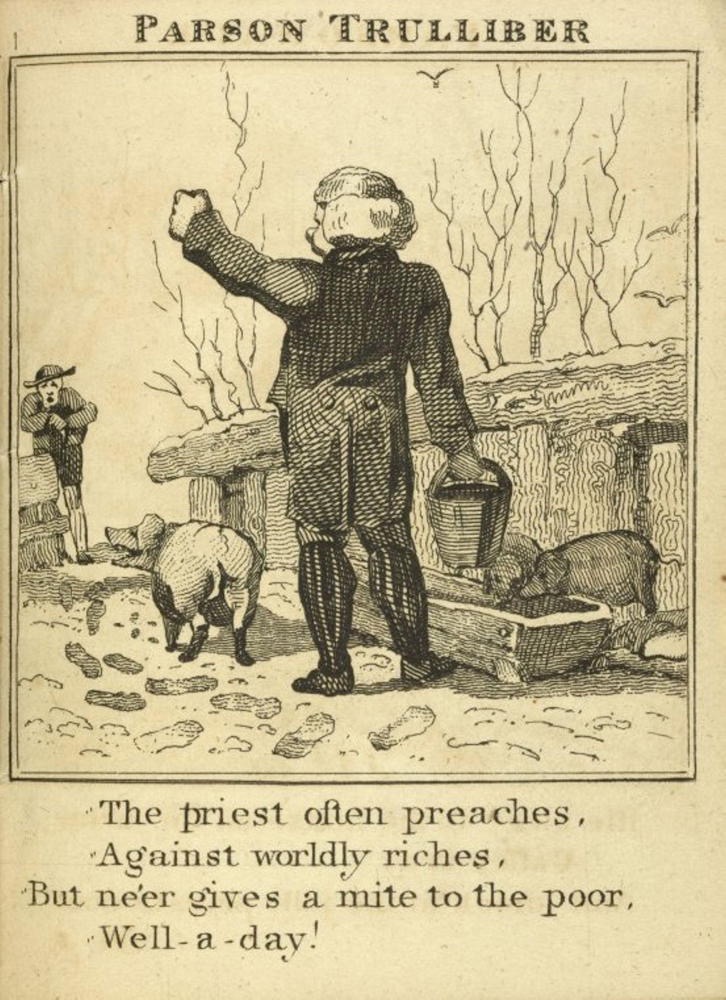
Thomas Holctoft: Parson Trulliber (1806)
from Henry Fielding's 1742 novel
The History of the Adventures of Joseph Andrews
and of his Friend Mr. Abraham Adams.
" … indulging in innocuously guilty pleasures to discover some sense of freedom …"
I suppose I've been steadily accumulating my belief system since just after birth. I don't know this for sure, but I could speculate that my beliefs are merely the sum of my exposures, though that assertion somehow doesn't seem completely genuine. I understand, as nobody else ever could, how I weighted my absorption, favored some inputs over others, and utterly avoided placing myself in the position where some might influence me. I remember back in the eighties when a vendor mentioned how she'd discovered an entertaining new radio commentator. She said he was on for hours daily and couldn't help but listen in as she made her rounds between clients. She played a piece of one of his programs as she drove us to a lunch meeting. I'd never heard of Rush Limbaugh before. I was appalled by his program. I felt as though my vendor had shared porn with me. Her not-even-a-little-bit-guilty indulgence convinced me I should probably not be doing business with her. I quietly withdrew her contracts as they expired and never hired another contractor from her firm.
It seemed to me that she had been poisoned.
Deficits

Thomas Holcroft: The empty purse (1806)
"Damn those who never learned how to manage money!"
The key might be to balance. The very wealthy are different from the rest of us because they exclusively live on somebody else's money. It amounts to a wise way to live if you can get away with it. The more complicated way to live must be hand to mouth, or hand to forehead when there's not enough. Those who live by exchanging cash or, heaven forbid, gold, forfeit the possibility of leverage, a magical process by which one can comfortably live beyond one's means. Galbreath said that every generation seems to need to relearn the lessons leverage extends. They usually learn by leveraging too far beyond even their magically-extended means to utterly undermine their dreams. They default on their debt and undermine their credit. This catastrophic event instantly evaporates prosperity, sometimes permanently leaving the debtor in penury.
But I speak here of individuals and corporations, not reserve currency nations.
Weekly Writing Summary For The Week Ending 02/13/2025
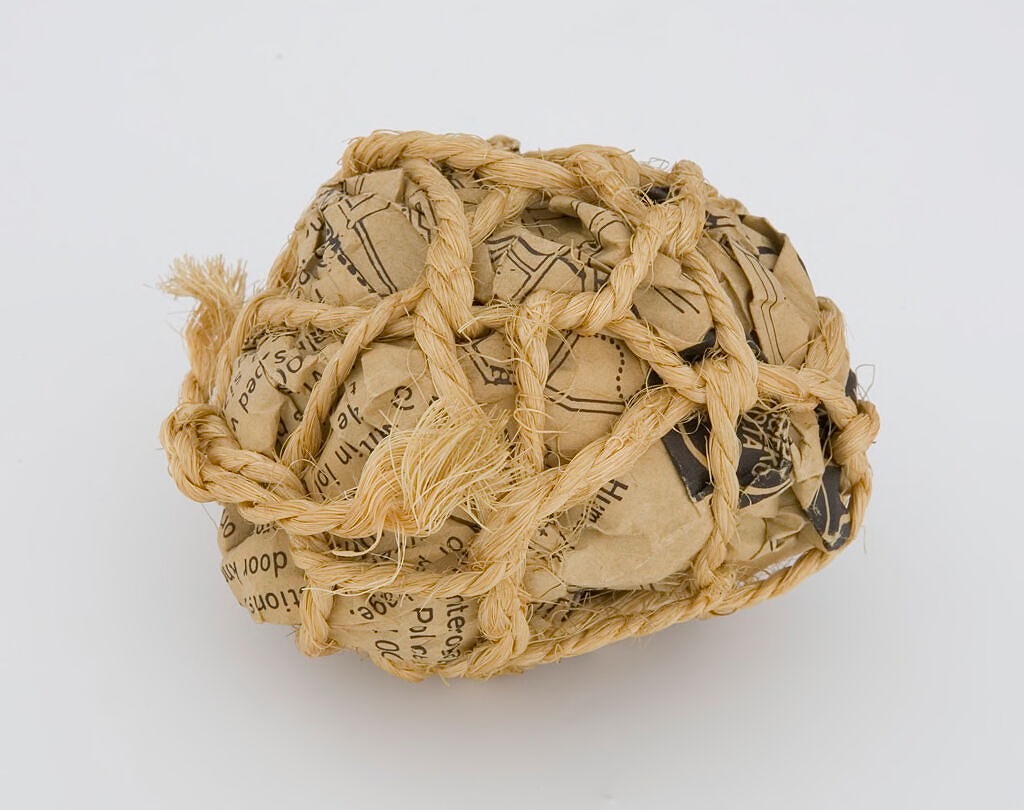
Hi Red Center: Bundle of Events
Designed by George Maciunas
Published by Fluxus
Edited by Shigeko Kubota
(1965)
Tracks They Left Before
This might be the Cabin Fever Edition of my Weekly Writing Summaries, for these stories emerged into a frozen world featuring snow and ice. Most of this winter seemed barely different from Fall, but Arctic air finally descended. It's been a winter wonderland since. I've been exhibiting my snow shoving technique, which I perfected through six Colorado winters. I learned to avoid shoveling there, which requires lifting, sometimes heavy lifting. I employ my snowplow-like snow shover to nudge the stuff out of my way. A snow cover makes The Villa seem cozier, though I've been avoiding building a fire, even though I have plenty of firewood. It's like I'm concerned that I might run out, so I wear my down vest around the house. The cats have been reluctant to go out but still resist using the litter box. They despise walking through snow and carefully reuse tracks they left before.
BigMysteries

Hi Red Center. Canned Mystery (c.1964) Distributed by Fluxus
Inscriptions and Marks
Inscription: bottom of can, in artist's hand: The letter on the bottom of the can - either H or I - is a code referring to the contents. The code can only be broken by opening the can, which then changes the work....
—-
"This somnambulance could be killing us!"
Since this NextWorld formally began on January 20, 2025, mysteries have been proliferating for me. They started in the moments following inaguration when the new incumbent tied into what, just a scant hour before, had been universally-recognized as the world's most successful economy, the envy of every other nation. The acceptance speech, or what passed for one, disparaged what universal concensus had previously praised. We were transformed from a prosperous country into a pauper one necessitating wholesale restructuring. Budget cuts were not just proposed but imposed, even though the incumbent was never given that particular constitutional power. Mass layoffs were implemented, again without the authority to initiate them. I could not imagine how this magic had occurred, from prosperity to the very edge of penury, in minutes. Never in the history of this world had any country fallen so quickly and so far.
Since then, the mysteries have only deepened.
BigPicture
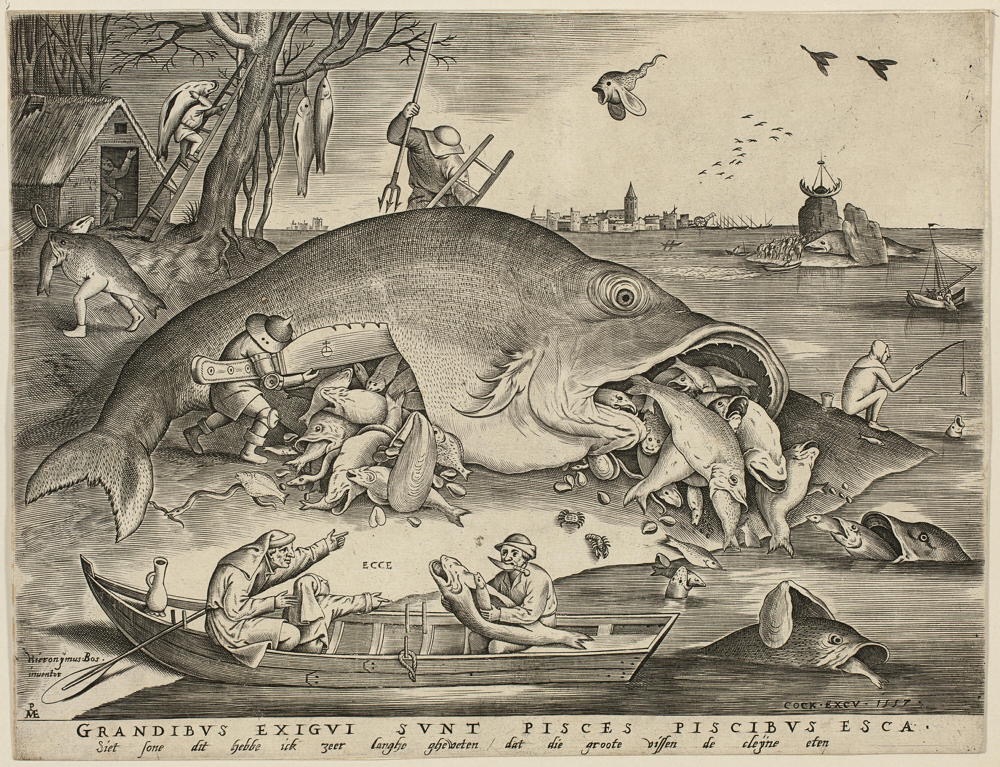
Pieter van der Heyden, after Pieter Bruegel:
Big Fish Eat Little Fish (1557) Published by Hieronymus Cock
ABOUT THIS ARTWORK
This engraving hauntingly illustrates the proverb that the big fish always eats the little fish. Starting with the larger-than-life fish at its center, the image teems with grotesque activity, as bodies spill out of other bodies and hybrid creatures walk and fly about. Pieter Bruegel seems to take a dim view of humanity here, one of disgust at its seemingly endless capacity to cannibalize itself. This is epitomized in the hybrid fish-person at left carrying off its prize, another fish, in its gaping mouth. In the foreground, a man directs a child’s gaze toward the scene, telling him to “behold” (ecce) the proverbial truth on display.
"Those incapable of imagining a coherent BigPicture should never be considered leadership material."
My degree compelled me to enroll in a Systems Thinking class when I went to university. This was considered cutting edge at the time. In it, I was introduced to a few cybernetic precepts and assigned to "design a nuclear-powered electricity generating plant.” I knew nothing about nuclear power or generating electricity, but the instructor showed me how to start with a BigPicture notion of how something like that would have to be configured to work. It would require certain inputs to produce desired outputs, and specific functions would need to occur within the system. The professor demonstrated how to group similar functions into what he referred to as "subsystems." I needed to let go of my natural need to describe details to succeed. I wouldn't need to concern myself with what bolts might hold together a combustion chamber. Those were "mere" details. To arrive at a useful BigPicture, I'd need to presume more than any plant designer needs to define. I was instructed to maintain a useful altitude.
From that perspective, I surprised myself by creating a reasonably practical-seeming high-level portrait of the plant in that exercise.
DeVoting

Anonymous: Cartoon of the funeral of Pastor Abraham van de Velde, 1677
Gallery Notes:
Cartoon of the funeral of Reverend Abraham van de Velde, June 14, 1677. A long funeral parade of 4 rows of men with steep ears or donkey ears moves with the corpse of Ds. van der Velde from the House of Unrest over 'the miserable kerkhof', past some tombstones with appropriate inscriptions to the church of the Spiritual Supreme Wore. Some crying sisters lead the procession; in the middle a banner with the inscription 'The profession of Troyen'. The print includes a text sheet with legend. The Footian pastor had previously been banished from Utrecht and played a role in the conflict in Zeeland between the Footians and Coccejans in 1675.
—
"He never understood why he couldn't make the universe dance once he'd gained advantage."
In NextWorld, accolites will vote to enable their leader to choose what to support. That leader will ignore popular opinion and decide to satisfy his desire for vengence against both those he imagined wronged him and innocent, unrelated citizens, for their leader considers himself omnipotent. Their leader intends this novel use of enfrancisement to undermine the future will to vote. As citizens see that their votes influence nothing, they might choose to disenfranchise themselves further. Their indifference could become the most significant influence in future elections, guaranteeing that only the most dishonest candidates succeed. The DeVoted followers might never suspect that they are victims of deliberate DeVoting, a betrayal of everything their country used to say it stood for. By then, the population will have become overwhelmingly cynical, able to explain everything wrong without exhibiting a notion about what might have always been right or how to repair anything broken. It becomes Down With Everything except their disconnected leader. Then it becomes Down With Him, too.
Those most supportive of DeVoting will naturally be the least capable of deciding anything.
ManifestingDestinies

Albert Bierstadt: Rocky Mountains, "Lander's Peak" (1863)
"God the Father manifests as a terrible sword whenever people get involved."
A gleaming emanates from those who believe themselves on a God-given mission. They are not merely existing or just living, but actively Manifesting. Manifesting what? Their Destinies, of course. They might not hold an explicit vision of their end result. Still, they hold an unshakable conviction that they have been especially chosen to deliver something transforming for themselves and the world. These people are crazy, yet if anybody's likely to accomplish something, it seems most likely to be these driven people. They can be self-sacrificial, unconcerned about their well-being. They can also seem completely self-absorbed, uninterested in anything other than their particular obsession. They often exemplify the sin of self-importance, for even given their sometimes considerable self-sacrifices, they always seem to make whatever they're overcoming about them.
These self-selected envoys from God seem odd.
UpRoarious

Charles Joseph Traviès de Villers:
Got to admit that the government has a very funny head.
Original Language Title:
Faut avouer que l'gouvernement a une bien drôle de tête.
Series/Book Title: La Caricature III (60) 22 dec 1831, no. 121
(1831)
"You should have cornered the popcorn franchise before you started. That might have rendered you rich and successful."
The MAGA Movement became a movement the same way the more traditional bowel movement emerged, primarily by seeking to create Uproars. They aim to disrupt rather than propose, to break instead of repair. What they intended to be an UpRoar most often becomes UpRoarious, hilarious in its naivety and evident ineptness. They hold principles they carried forward from the darkest Middle Ages. I hope I'm not inadvertently disparaging the more respectable elements of Middle Ages culture to suggest that the MAGA worldview seems tenaciously backward. They tout White Supremacy as if those memes had not been proven self-cancelling since at least the fifties. The eighteen-fifties. They call themselves conservatives, but few understand why they chose to get stuck so far behind modernity. They behave as if everything modern were an abomination, and so they seem to casually discard the accumulated efforts at creating more perfect unions since the creation of this nation. They consequently present a far less than more-perfect platform, but a demonstrably worse one.
They sing the praises of the days when only two genders existed, as if those days had existed.
Sociopathy
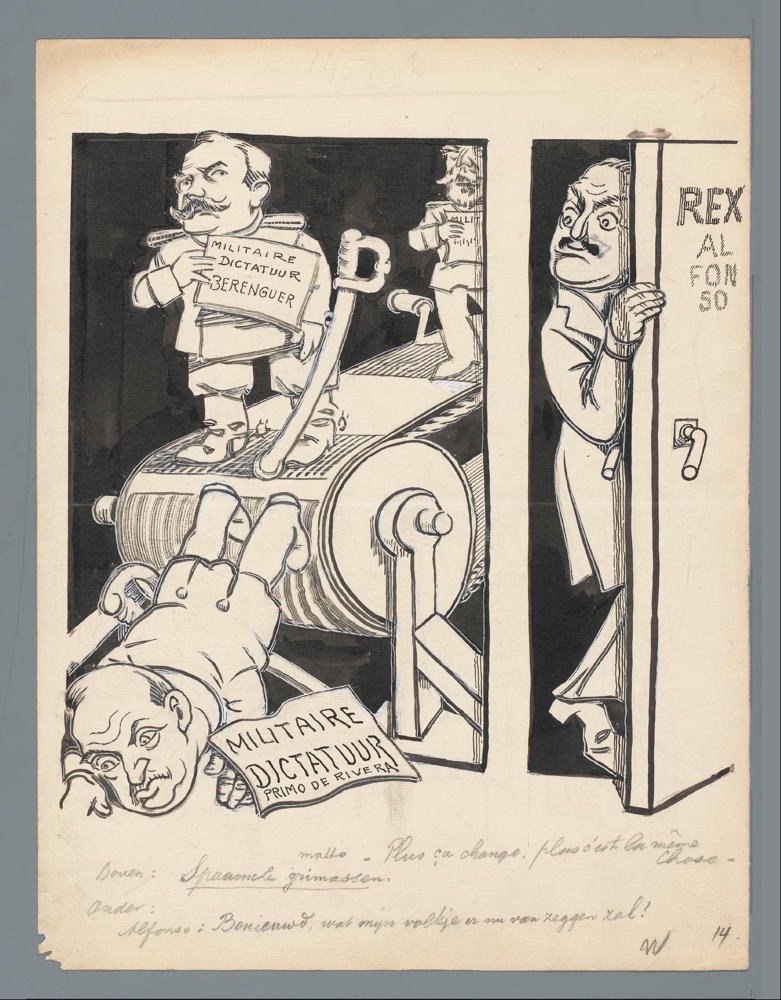
Patricq Kroon: Succession of Spanish dictatorships (1930)
Gallery Notes:
The Spanish King Alfonso XIII watches as the dictator Miguel Primo de Rivera falls off the assembly line and is succeeded (in 1930) by the next dictator Dámaso Berenguer. Design for a political cartoon.
"They seem offensively self-centered."
Certain characteristics seem common to the MAGA Class. The traits seem strangely consistent, as if each proponent had been schooled in the same comportment, for each exhibits similar patterns. A MAGA might be reasonably expected to profess Christianity, though not any innocuous odd mainstream kind. They tend to "be" evangelical, which means they carry an explicit obligation to try to convert everyone else to their belief system. This notion must require enormous ego strength to fuel what must eventually seem like serial failures. However, it appears that MAGAs also tend to stay within a narrow social circle where the bulk of people have already "accepted Jesus Christ as their personal Lord and Savior," whatever that might mean. They tend to carry the certainty of The Saved. Whatever sins might have spotted their past, they seem to feel washed clean from them now. They speak and act with unusual impunity.
They might believe they are not beholden to obey specific laws and rules.
Weekly Writing Summary For The Week Ending 02/06/2025

Carlo Marchionni: Caricature of Man Writing
(18th Century)
Smothered In Fresh Bullshit
I don't think of myself as so much a slave to truth but more of its servant. Truths have generally served me well, once I recovered from my typical adolescent embarrassment over who I was. As I discovered, developed, and learned to appreciate my gifts, I could increasingly feature them in my stories rather than presenting ginned-up exemplars. I found more leverage telling my truths than by fabricating lies. I noticed then that I attracted different sorts of friends than others discovered around them. They weren't selling anything. They seemed accepting. They lived above board. They kept their share of secrets but for privacy instead of piracy. It surprises me how central lies seem to be in this NextWorld presidency. I doubt anybody can keep up with the lies spewing out of the White House. Small and huge, covering every possible topic.
I doubt anyone can discriminate between truth and lies from there, other than to conclude that there's no truth in there. I wonder about the self-esteem required to so thoroughly surround oneself with fabrications. I sense a slimy sort of soul poking out sticks from within a cage. He must be terrified of the truth. I'd never before considered how fungible lies can be. They might be easier to defend than even the most obvious truth, for they do not depend upon anything but imagination to justify them. They seem relatively impervious to criticism. A simple denial surrounded by a remarkably few fresh untruths and even the most dedicated critic finds themself smothered in fresh bullshit.
The American Way

Master of the Die, After Raphael:
Three Cupids Playing With An Ostrich (16th century)
"The stence of competing righteousnesses clogged the nostrils."
The American Way must be one phenomenon that can only be recognized when seen because it sure seems to defy description. I could haul out the fife and drum and affect a limping march while performing an old English drinking song about a gay blade. Very few would take offense at my performance because we were seemingly all raised with that representation, and we immediately recognize it as really about us. Call us, "Macaroni!" We expropriated much of who we are and what we've become from close associations with people from other traditions, other nations. If we aren't a melting pot, we're a slag heap, incompletely assimilated bits and pieces coexisting more or less. Our unity seems to come solely from our inherent diversity: out of many, one. This tenuous identity has been a defining trait through decades of misadventures.
This identity has been particularly annoying to efficiency experts, and few professions have ever been more American than efficiency engineering.
The American Scream

Frederic Edwin Church: Our Banner in the Sky (1861)
Gallery Text:
"Within this vibrant scene of atmospheric flux, an opening within a roiling cloud layer reveals stars against a blue firmament. The barren tree in the foreground doubles as a pole for this celestial apparition of the “broad stripes and bright stars” of the U.S. flag. Following the rapid succession of political provocations that led to Confederate forces firing on Fort Sumter, Church channeled his belief in the divine righteousness of the Union cause into this patriotic visual spectacle.
As the sectarian conflict stretched from weeks into months, the oil sketch, with its allegorical river valley resembling the Catskills and the Hudson River, was translated into a popular chromolithograph. The New York branch of Goupil & Cie issued the prints as a subscription fundraiser to support the families of Union soldiers. This is one of the few lithographs from the series that Church painted by hand."
" … trying to rebuild a society similar to the one that existed on the last day of Joe Biden's administration."
It seems in the nature of countries that they do something monumentally stupid every once in a while. Some of them might have seemed like a good idea to a few. Still, ultimately, nobody holds that opinion because these events introduce an extended recovery period during which the country gets to reconsider every belief it ever held. Brexit was such an event for Britain. The firing on Fort Sumpter serves as an example of us doing stupid to ourselves. We still struggle with integrating the ramifications of that single short-sighted act.
However wise or wonderful, every country takes its turn.
The American Dream
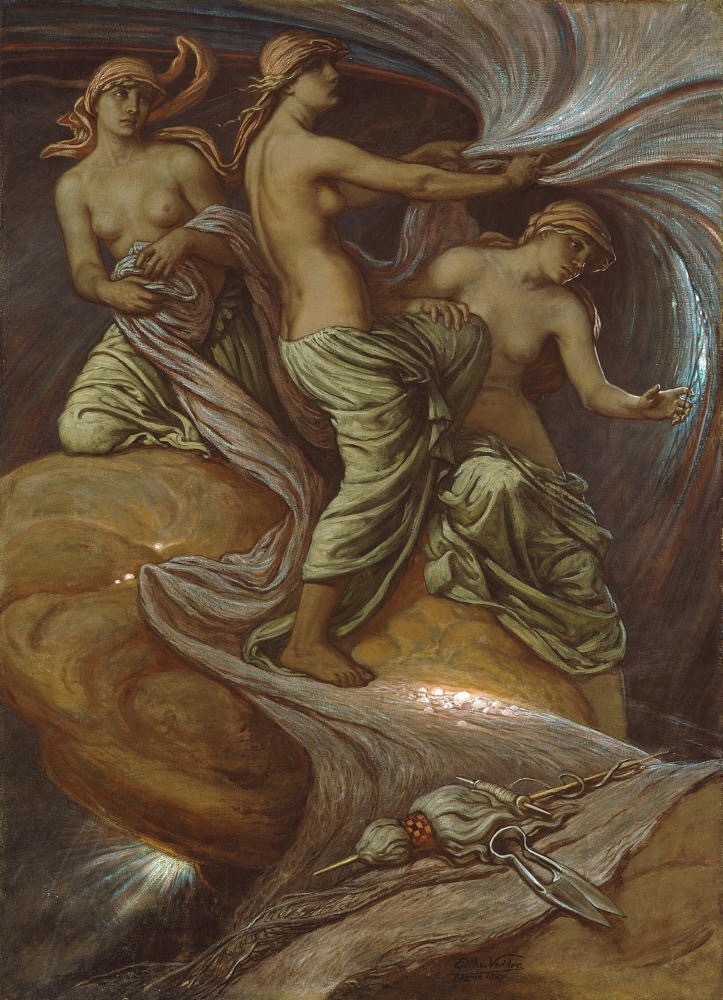
Elihu Vedder: The Fates Gathering in the Stars (1887)
Gallery Notes:
Elihu Vedder depicted the three Fates of Greek mythology working the thread of life: Clotho spins the thread, Lachesis fixes its length, and Atropos cuts it at the appointed time of death. Their symbolic tools—spindle, distaff, and shears—rest in the foreground, emphasizing the Fates’ decisive role in matters of life and death. Vedder adapted this painting from an illustration he had designed for an 1884 publication by Edward FitzGerald—a translation of the work of 11th-century poet Omar Khayyám, The Rubáiyát. Vedder was attracted to mysterious, visionary subject matter. Here, he explored metaphysical questions of life, death, and afterlife, subjects at the core of Khayyám’s poetry.
"We will never feel completely satisfied with this perfection."
People have been trying to improve our Constitution since the day it was ratified. It was born broken, the product of debate and compromise, not even aspiring to perfection. It was genius, though, in perhaps only one aspect. It was deliberately drafted to be amendable. It was created to be changed. Change, therefore, would not be evidence of something having been broken. Change would help realize aspiration, which might have been the whole purpose of our Constitution in the first place. It was an aspirational document rather than the final word. A beginning, never the end. It might have been that the Founders envisioned an ending to their story. If so, history has so far foiled that intention. Between those firmly believing that our Constitution is the word of God and those who perhaps equally firmly believe it was the product of typically imperfect people lies the playing field upon which we create our history's first drafts. Our future might draw a few conclusions about it, but we certainly can't.
The resulting government mirrors the Constitution in one crucial aspect.
The Biggest Lie

Félix Edouard Vallotton: The Lie, plate one from Intimacies (1897)
“Those who had most loudly insisted that faceless bureaucrats had compromised our country became the faceless bureaucrats about who they so publicly complained.”
The Biggest Lie in American politics insisted that our country has been stolen by faceless bureaucrats and, in its later configurations, by an unidentified "Deep State." It insisted that our government no longer belonged to us because its laws seemed to hurt rather than reward us. Of special focus, income taxes were characterized as theft and government services as "inefficient," another undefined term intended to mean "wasteful." Lost in these arguments was any sense of how wealthy our country was, perhaps because few could even distantly imagine how wealthy that might have actually been. It was easier for most of us to imagine our government's finances as roughly similar to our household, where perennial income shortfalls continually threatened solvency when we were collectively wealthy beyond almost anyone's wildest imagination. We were in the postwar years, rich enough to personally bankroll the economies of Britain, Europe, and Japan. Our debt became the free world's burgeoning prosperity, and we more than made back every penny we expended, whether in direct aid or financing.
We were so wealthy during the immediate postwar period that our government spent the equivalent of the value of every bit of privately held property on defenses we would never use, and this while steadily increasing the support supplied to disadvantaged citizens.
The CEO Disease
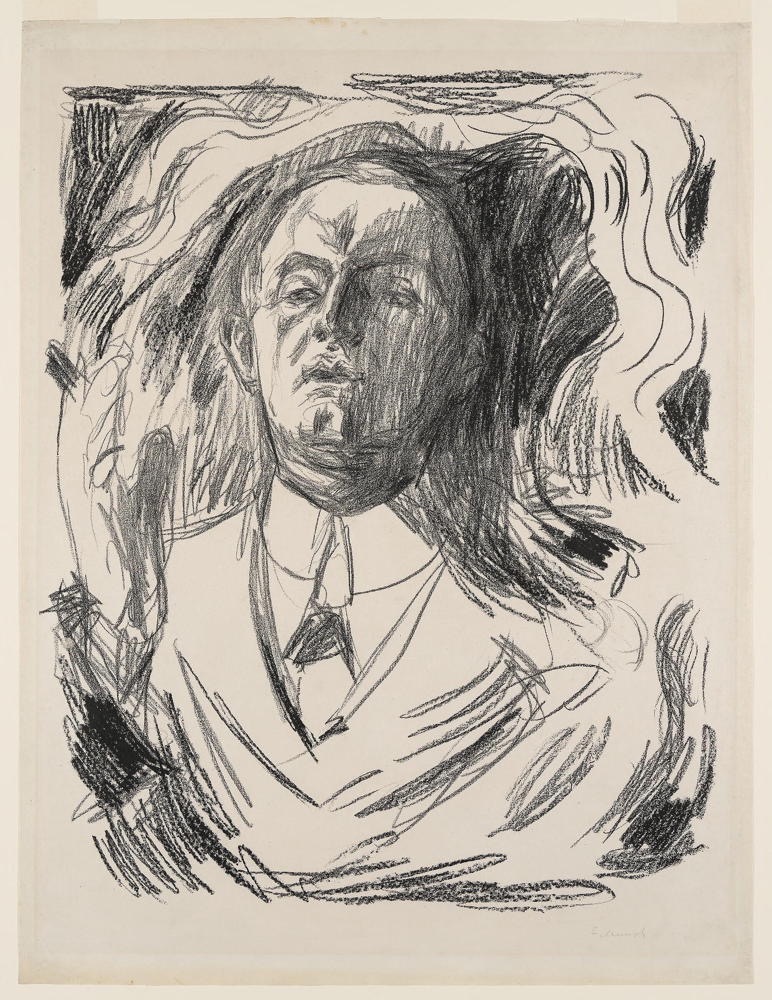
Edvard Munch: Self-Portrait with Cigar
Original Language Title: Selvportrett med sigar
(1908-1909)
" … nobody's pissed off Old Mary enough. Yet."
Thirty-three years ago this month, I went to work as a very junior consultant with a boutique Silicon Valley consulting firm. Our clients included most of the hot high-tech companies of the time, with Apple topping the long list. I'd gone from a middle management position in a regional mutual life insurance company to being an advisor to some of the best and brightest minds in the acknowledged finest high-tech companies. I found those minds to be largely unexceptional, for they seemed to be prey to the self-same delusions and misconceptions within which I'd caught myself dabbling. Something extraordinary happens whenever we engage in project work together. I had been working on an understanding of this mysterious something. That was a big reason I'd agreed to take that job, even though it gave me a pay cut and demanded that I travel four or five days each week. I sensed a considerable upside. If I could work with these great companies, perhaps I could learn their secret. Maybe I could even finally become proficient in the project work I'd failed to master over the prior decade.
Several of our clients were led by what I understood to be true industry icons.
The Fourth Stage of Cruelty: Reward

John Bell, after William Hogarth: The Reward of Cruelty (1750)
Series/Book Title: The Four Stages of Cruelty (1751)
"We will be as grateful then as we were rightfully fearful before, Gods willing."
"The Final Stage of Cruelty, following the casually random, wide-ranging cruelties practiced through Stage Three, occurs posthumously via some form of autopsy. The corpus will be literally cut open as if to find the source of the evil he incarnated. The coroner will find nothing to explain the behavior. No brain tumor or pituitary problem. He will ultimately be judged as apparently normal except for those disturbing behaviors he seemed compelled to inflict. He was not, as many speculated through his life, particularly sick. Anyone with a dick even that size might have been tempted to act out, but he went beyond mere over-compensating behavior. His performance eclipsed acting. He will have died at his own hand. Not necessarily suicidally, but as a direct result of casually inflicting some genuine cruelty. Eventually, even the universe loses her patience and takes out a particularly errant child. This one never matured into an actual adult. He died as he existed, at the emotional age of about eight. May we finally rest in peace without him." NextWorld, The Third Stage of Cruelty: Perfection
I began this final installment of this series within my Nextworld Series with the final paragraph from the next-to-last installment, for I presaged this ending there.
The Third Stage of Cruelty: Perfection

William Hogarth: Cruelty in Perfection
Series/Book Title: The Four Stages of Cruelty (1751)
"May we finally rest in peace without him."
As The First Stage of Cruelty finding a foothold created space for the institutionalization of cruelty in the Second Stage, the efficient expansion of cruelty within Stage Two burst the barriers into casually practicing any and every perversion after guilt-free cruelty comes unimaginable brutality. What might have started as torture morphs into murder. No limits exist for the experienced. Those who might have dabbled in Stage One Cruelty or felt sucked into Stage Two, if they didn't excuse themselves or flee, finally feel free to simply go off the rails into Stage Three. Hogarth referred to this stage as Perfection because nothing inhibited its excess. It could no longer be considered anomalous. It became just whatever it always was, but now without limits. No guilt intrudes—no sense of error or danger. If pure evil exists, it only persists after reaching Stage Three. Stage Three Cruelty puts everybody at risk because its artillery knows no trajectory. There will be accidents, and innocents will, of course, be destroyed. The perpetrator will have lost their inhibitions by then.
There will be no reformation.
The Second Stage of Cruelty

William Hogarth: The Second Stage of Cruelty
Alternate Title: The Four Stages of Cruelty, Plate 2.
Series/Book Title: The Four Stages of Cruelty
1751
" … no business even attempting to lead others."
Cruelty becomes insidious once institutionalized. However benevolent an institution might have seemed when founded, it might always remain vulnerable to corruption. The corruption might first seem merely seductive, a not-quite guilty pleasure, diverting entertainment. It was probably championed then by someone who seemed unafraid of judgments, somehow above routine worldly cares, a millionaire, seeming unusually powerful. Few would have noticed how vulnerable he felt, for even he was probably not in touch with those depths. He stood securely in only two dimensions and, lacking depth, could have been easily toppled then by even a concerted casual wind. But he stood. He stood and didn't entirely embarrass himself, and he took the wrong message from this early success, which was actually more like an early absence of overt failure. He continued until his behavior became his identity, and it became merely expected. He attracted followers who, accustomed to mimicking, behaved the same. Soon enough, those performances no longer raised so many eyebrows. They still seemed uncouth but no longer obscene. Values had already eroded.
When institutions turn to cruelty, they render it efficient.
The First Stage of Cruelty

William Hogarth: The First Stage of Cruelty (1751)
Series/Book Title: The Four Stages of Cruelty
Alternate Title: The Four Stages of Cruelty, Plate 1.
"I'm asking for a dear friend of mine and yours."
The initial stage of cruelty must come subtly if it's to be sustained. Too overt an entry can shock even partisans into premature recognition. It ideally occurs against some other, preferably one long-reviled. The torturer often targets minorities for precisely this reason. The best victims naturally have the fewest supporters. Some leakage remains unavoidable, though, scrupulously one designs their offensive. Remember, cruelty is inherently offensive. It will seem at least somewhat repulsive to every witness, even the most thoroughly enthralled. The executioner, therefore, has, by long practice, characterized himself as the greatest victim in the transaction. "Poor Henry, whose fate calls for him to behead people for a living!" In extreme cases, the director of the cruelty can comfortably characterize himself as the worst off for the experience. Just imagine! He has to forever live with the memory of the execution while the victims hardly felt a thing as they exited.
The psychology does not seem terribly complicated.
NoNews

Christoffel van Sichem II:
David receives the news of the death of Absalom
Alternate Title:
A ruler on a throne rends his clothes upon receipt of a message (1646)
"I can't be bothered now!"
I was once a perfect news consumer. At ten, when I started delivering newspapers, I read each edition from cover to cover, skipping over the parts that didn't interest me. I was there when NPR first launched and quickly became an ardent listener. For decades, my alarm clock woke me with BBC or Morning Edition. I rarely missed a broadcast and felt deficient whenever I did. I thought I could not live without those twice daily doses, morning and evening. I subscribed to the local paper, too, and read it through. I considered these habits to be necessities of citizenship and to be ill-informed, a high crime, or at least a significant misdemeanor. When our newly-instilled Chief Executive was sworn in the first time, I found myself suddenly unable to listen to the travesties reported twice daily as news. It seemed like unnecessary information, as meaningful as something produced by the Worldwide Wrestling Federation because it probably was. Further, my old, reliable NPR reporters were retiring on me, replaced by what sounded like interns who insisted upon ending every declarative statement with another question mark. I felt as though the more I heard, the dumber I became. I painfully weaned myself off of my NPR habit.
I retained my New York Times and Washington Post, though I made no attempts to scour those from end to end as I had with my small city publication.
Dreadfulled

Corita Kent (Sister Mary Corita):
(tame) hummed hopefully to others (1966)
Inscriptions and Marks
Signed: l.r.: Sister Mary Corita
(not assigned): Printed text reads: TAME [IT']S [NO]T / Somebody up there likes us. / A hum came suddenly into his head, which seemed to him a good hum such as is hummed hopefully to others. Pooh / Deep within every man there lies the dread of being alone in the world, forgotten by God, overlooked among the tremendous household of millions upon millions. That fear is kept away by looking upon all those about one who are bound to one as friends or family; but the dread is nevertheless there and one hardly dares think of what would happen to one if all the rest were taken away. Kierkegaard
"They are terrorists …"
The dream was back again last night. I do not recall the last time it visited, but it had not been so long ago that I wasn't familiar with the scene. We were driving through a hallucination. I'd lost my visual field, so when I looked out through the windshield, it looked to me like we were driving on a body of water. I knew there had to be a road there somewhere, and I suspected The Muse could see it, but I couldn't. There was also something about the music playing that seemed especially upsetting. We were in a precarious balance but at great risk of crashing. I woke up, but the dream persisted. It took an hour of sitting up in the dark for the vestiges of it to finally leave me, and even now, the memory persists.
I realize how exhausted I feel.
Cowardice
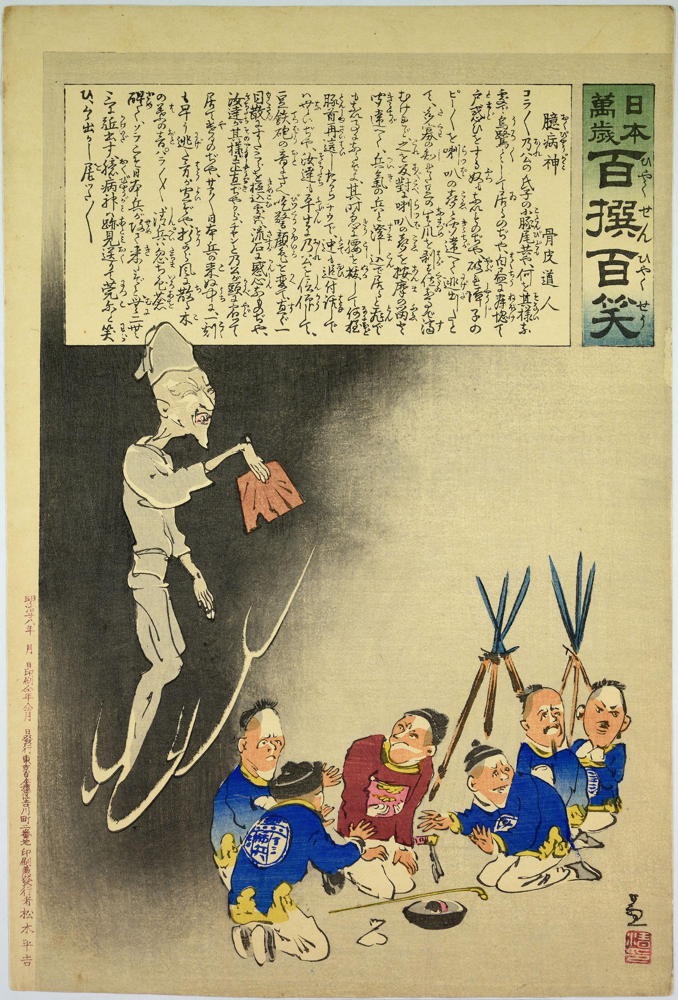
Kiyochika Kobayashi: The god of cowardice (1895)
"Only cowards engage in endless wars."
Ares, the Greek God of war, was known for his brutality and cowardice. When discovered to have been conducting an affair with Aphrodite, he and his lover were humiliated before the other Gods. Throughout history, mythical and not, great leaders have been reluctant warriors. They could muster an army but would rather settle differences more peacefully. The inherent cruelty of battle renders it a distasteful choice and always has. Beware leaders who rattle swords, for they disclose the opposite of what their saber-rattling might suppose. They might outwardly appear brave, but they will be quaking beneath their armor. Those who pick fights are rarely the mightiest. They attempt to chase off their opponents by appearing fierce. Once engaged, they're more likely to attack the most vulnerable than the more powerful. They invade schools to entrap parents rather than engage with peers as peers, perhaps because they never feel equal or superior.
Our MAGA maniacs come similarly shackled.
Weekly Writing Summary For The Week Ending 01/23/2025

Jack Gould: Untitled [composite photograph of a man doing a jumping twist; continuous motion] (c. 1950)
I Dare Not Avert My Eyes
The content shift seemed stark enough, but the underlying context shift seemed more consequential as we moved away from a government sworn to tell the truth to one dedicated to delivering only self-serving lies. Lies betray even the liar, though, and prove unreliable. They backfire. What might have been intended to help the cause often hurts it. In just four days, our new/old Chief Executive sparked several constitutional lawsuits and ample attempted crimes and misdemeanors to justify at least one impeachment inquiry. More will be coming, for this guy clearly knows no limits and personifies self-delusion. His performance seems more feature than problem and reassures me that this NextWorld Series might prove to have been amply justifiable. Under Yogi Berra's old advice that one can see a lot by looking, merely observing and reflecting upon this performance seems to have already better prepared me to cope with its presence. I remain perhaps unjustifiably optimistic that this performance won't last long, certainly not for four more years, but its inherent self-sabotaging nature probably amplifies its fragility. Tough guys feel the weakest inside.
The most confident require continual reassurance.
ContinuouslyTranslating

John Singer Sargent: Figure and Head Studies (1872)
" … his Base eases into apparently effortless understanding."
I cannot comprehend most of whatever The Incumbent says. He mumbles. He exclusively speaks in incomplete sentences that often lack an object, subject, or coherent verb. He seems to speak in a shorthand dialect that some of his more fervent followers certainly seem to understand. I do not know how they accomplish this feat, which seems like mindreading to me. My best explanation comes from my experience working with a partner named Jeff after I joined that boutique Silicon Valley consulting firm back in the nineties. Jeff had previously worked as an engineer for Attari, the early video game producer, and with Apple. He was considered a rainmaker in the consulting firm, for he seemed to know everybody in the valley. Name a company, and he invariably had an old friend there with whom he was on a first-name basis. Several of them were CEOs. They'd grant him an interview and often enough agree to sponsor at least a trial workshop.
Jeff baffled me because as I was learning how to teach that firm's flagship workshop offering, I had been sitting in the back of the room watching Jeff facilitate.
Apologists
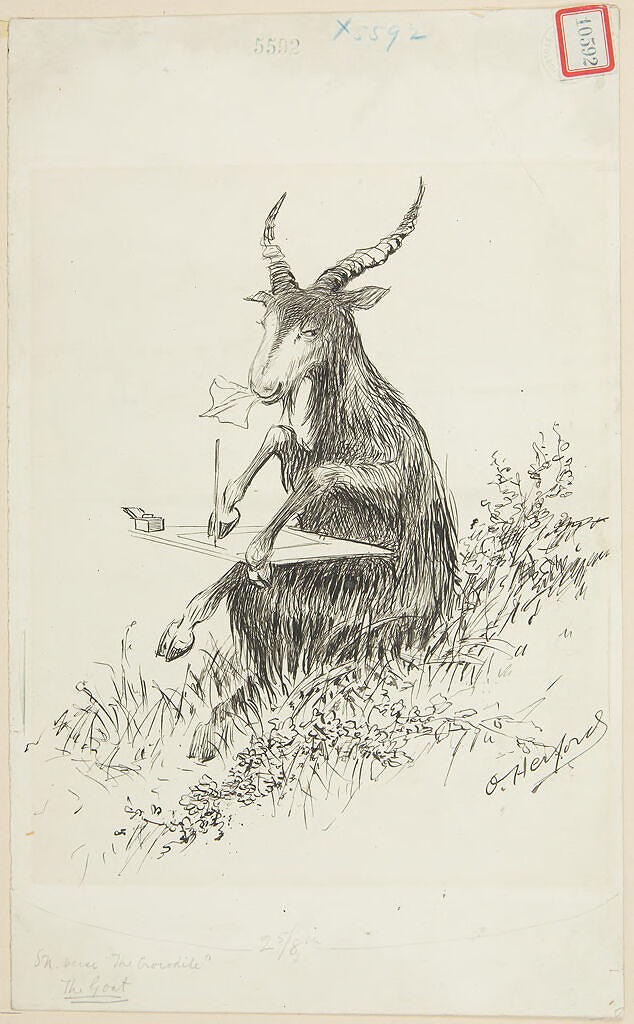
Oliver Herford:
The Goat, for "The Crocodile," by Oliver Herford (1891)
"When you're President, the Apologist supply is infinite."
Whenever a new incumbent ascends office, a crowd of true believers quickly encircle the new President. Their primary purpose might be the opposite of their apparent one, for they might seem to be there to ward off any serious misperceptions and set the story straight from the outset, though they're likely also defending their delicate egos lest some inconvenient truth slips out. It's important to understand that everyone engaging in the following farce already knows the worst about the incoming President. They know most of his most serious shortcomings, for he'd been featuring them as evidence of his superior experience for the position throughout the campaign. Seriously, anyone still able to stand in public and spout self-importance after being convicted of rape and fraud might have curiously earned his place as the leader of the free world, a role that might require an egregious amount of shamelessness.
The Apologists have a ready response to every criticism.
Rationalizing

Helen Hyde: In the Rain (1898)
"The result will mete out its own punishment. Vengence was never mine to deliver."
Slightly more people voted to elect The Oldest President (TOP) than voted against him ever holding public office again. He had abused his privileges during his first turn. He had been promising ever greater abuses if returned to office, so those who couldn't see any attraction to him as either candidate or ex-president were baffled as to why anyone might feel moved to waste their franchise on such a clearly unworthy character. Their vote amounted to an act of self-abuse, I suspect, or maybe it was just a mistake. Ask, though, and one acquires a fresh lesson in the human power of Rationalization, the attempt to make some irrational act seem reasonable in retrospect. Every terrible public servant has trailed a long line of Rationalizers behind them. They've attracted the Lesser Of Two Evils Crowd, who always seem to see only the worst in anyone representing an opposing party. They'd vote for Hanibal Lecter if he were a Repuglican running against anyone enjoying a more conventional diet. They also attract the partisan who never even investigate alternatives. They vote without reflection, choosing not to choose, a part of this country's sometimes overly-proud suffrage tradition. Democracies include even those opposed to democracy.
Then there are the Pig Shavers, the ones who split hairs.
DogEaters

Adriaen van de Velde: Dogs (17th century)
" … they will insist that they represent the real spirit of the laws …"
We speak of the Republican'ts and the Democans as if our society's essential divide lay in mere political labels. It likely lies much deeper than that, as deep as belief and perspective might lie. On one side, we have a cadre who, try though they might (they don’t really try at all), still firmly believe they inhabit a zero-sum world. Conversely, we have those who understand it needn't necessarily be so characterized. It can be a zero-sum world if we insist that it must be, for the world, indeed, our universe, seems poised to be responsive to whatever belief we bring when considering its nature. When it comes to universes, it's not believe-it-when-we-see-it, but we see what we believe—it cooperatively becomes whatever we believe. The eyes we bring to the inquiry make all the difference. Of course, we're always blind to the eyes we cannot bring to an investigation. The Republican'ts, like the Southern Confederates a century and three-quarters before, experienced a zero-sum world of their own projection, where one person's loss was necessarily another's gain. They seriously entertained the notion that force alone could secure their future. They held hostage the means for securing their fortune, believing they could hold justice at bay indefinitely, infinitely.
The zero-sum people see a dog-eat-dog world, where every newborn puppy's destiny must be to either master the skill of puppy killing, or they will undoubtedly be killed and eaten by another puppy.
Inconstancy

Allart van Everdingen: Reynard disguises as monk and distracts cock (17th century)
"Hail to the chief."
[Author's Note: I draw this story from various archetypal descriptions of a psychological type: this one, the eternal eight-year-old who cannot successfully focus upon anything for long. The particulars might misrepresent, though I feel confident that these patterns paint quite an accurate portrait. When dealing with Inconstancy, any opponent can feel confident that their opponent will be their opponent’s most effective opposition, for they cannot maintain their focus or attention long enough to achieve any strategic objective. Hell, they rarely maintain focus long enough to settle on a coherent strategic objective. They mainly pursue warm air, not possessing adequate attention to heat their story to the point where it truly qualifies as hot air.]
Perhaps his sole superpower lies in his sheer Inconstancy.
TakingCredit
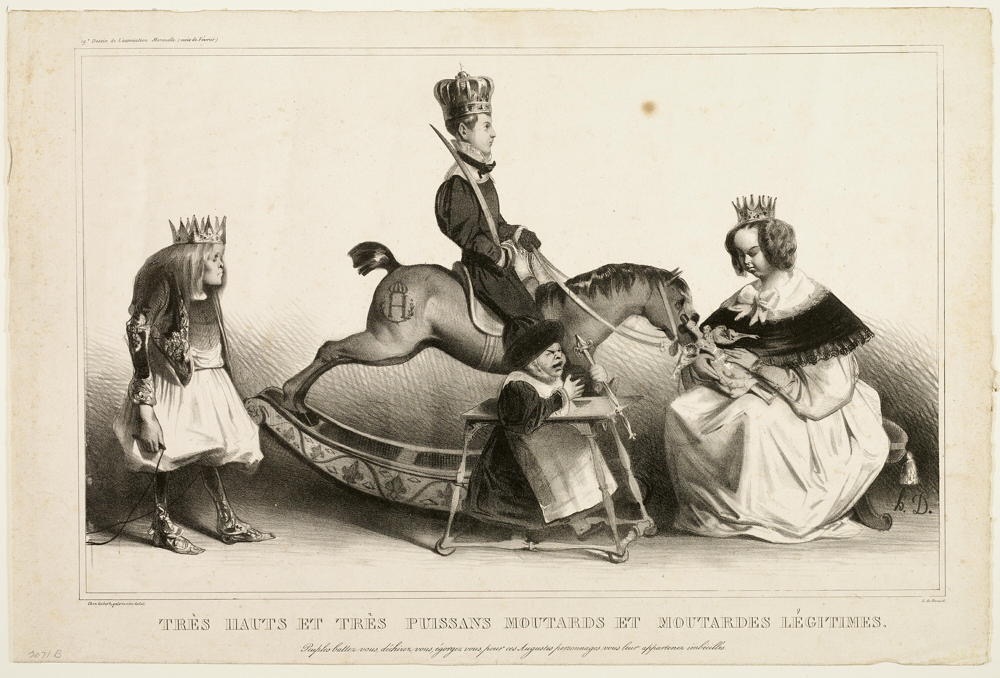
Honoré Victorin Daumier:
Very High and Mighty Legitimate Brats.
Peoples, defend yourselves, tear yourselves to pieces,
sacrifice yourselves for these royals,
you belong to them, imbeciles, plate 19 (1834)
"He firmly believes he's smarter than everyone else, which renders him the stupidest …"
On inauguration day, the adults will leave the administration, and a malignant narcissist will move in. He started TakingCredit for good things his predecessor accomplished before he even took office. He seems to maintain such a high opinion of himself that he simply cannot help himself. He seems to firmly believe that he is, indeed, the greatest. He accomplishes this astounding feat of self-esteem by steadfastly refusing to acknowledge anything he might have attempted that didn't quite make the grade. Indeed, his actual track record shows him mostly failing, though if you listen to him and his minions tell the story, he never fails. He will rather quickly begin identifying people who disappointed him. He claims to pick only winners, but his choices inevitably prove faulty. He will fein surprise then and insist that this seldom happens to him and that it was actually somebody else's fault that he selected a faulty incumbent. He maintains a queue of even better candidates, though he insisted before that his original list comprised only the best and brightest.
I will have to get used to having a malign eight-year-old in the highest office in the land.
Disingenuosity

Anonymous, after a design by Hans Baldung Grien:
Tenth commandment:
do not give false testimony about another
[iende gebod: leg over een ander geen vals getuigenis af]
1539
" … the least qualified President in history about to begin his second term."
It would simplify the situation if certain nominees would appear to testify wearing orange jumpsuits. Some of these guys seem like they're interviewing to be included in the Colorado Supermax Class of 2030. They quite transparently lie or withhold or deny. Their clever attorney clearly counseled them to go ahead and be disingenuous. They give Disingenuosity a bad name. History will remember them, but not kindly. Those disseminating straightforward questions become infamous, especially when 60 Minutes replays the juicy part of their testimony after the future incident. There will always be a future incident with these clowns. There always has been. They are uniformly unqualified for whatever role the incoming executive has nominated them to fulfill. Everyone in the hearing room understands they are not voting for or against the clown before them but the impending executive who chose him. Partisans need to appear supportive. Opponents must appear fair and balanced, which is always tricky in a context where the clown in question won't answer even the most straightforward question. This one's mom submitted testimony against him.
He calls known facts with sufficient evidence anonymous rumors and innuendos.
Ineptitude

Israel van Meckenem the Younger:
The Fight over the Trousers (c. 1495)
" … the patience of Job and the countenance of Greek statuary …"
Through his first foray into The Presidency, our impending incumbent proved incredibly, if intermittently, inept. Usually, his operation proved capable of producing run-of-the-mill cruelty and only managed anything more significant by accident. Many attempted initiatives got away from their initiators to take on their own lives, seemingly without meaningful external control. They proved the adage that a broken clock works twice each day, even though it's ordinarily so wrong as to be useless. Those of us opposed to those initiatives learned that we could usually rely upon that administration's inherent Ineptitude, which would have been humorous had it not also been occasionally so disastrous. It was as if the incumbent brought no executive experience into his role, for he seemed incapable of even the barest executive performance. He exhibited little strategic influence, frittering away his time on initiatives that could no more than temporarily annoy his opposition. His opposition would occasionally register outrage when something especially egregious occurred, but they primarily focused on building their coalition and expressing gratitude their opponent was so poorly resourced.
Before taking the oath of office that he will have no intention of upholding, he's been busying himself with selecting prospective cabinet members.
IntoFamiliarity
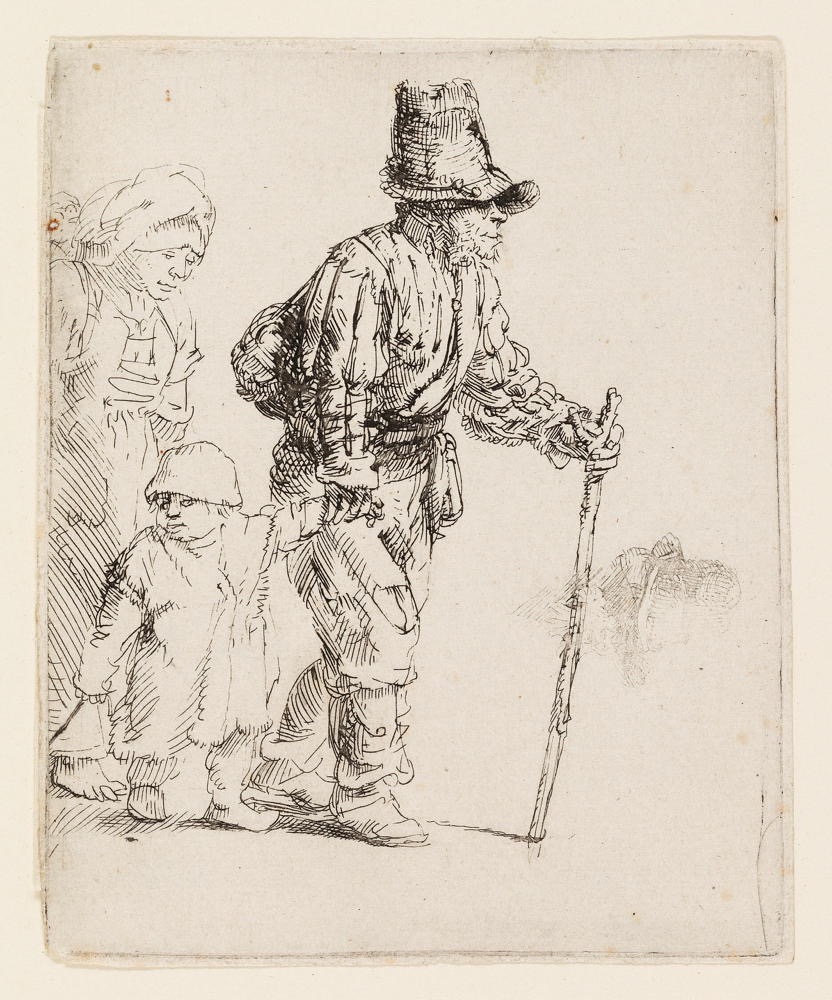
Rembrandt van Rijn: Peasant Family on the Tramp (c. 1652)
"I might even rediscover who I always was …"
Trump's election as President for the second time left me peering into a dreaded future. I felt curious and confident that he would once again prove himself not nearly up to the task and dreading the inevitable failures he would most certainly produce with his inept attempts. His successful campaign rendered him no smarter or more popular, and it seemed inevitable that he would be dragging his familiar ineptness into everything he attempted to accomplish. I most dreaded that impending bumbling, for he would set about attempting to reinvent wheels his predecessors had already successfully invented, leaving us worse off for his efforts. It seemed a certainty that he would leave us all worse off. We liquidated our stock portfolios and hunkered in, though that's not all we did in response. We also fled IntoFamiliarity as an antidote to the dread.
Finally, almost three years after returning from Exile, I began organizing my tools and basement workshop.
SelfRecrimination
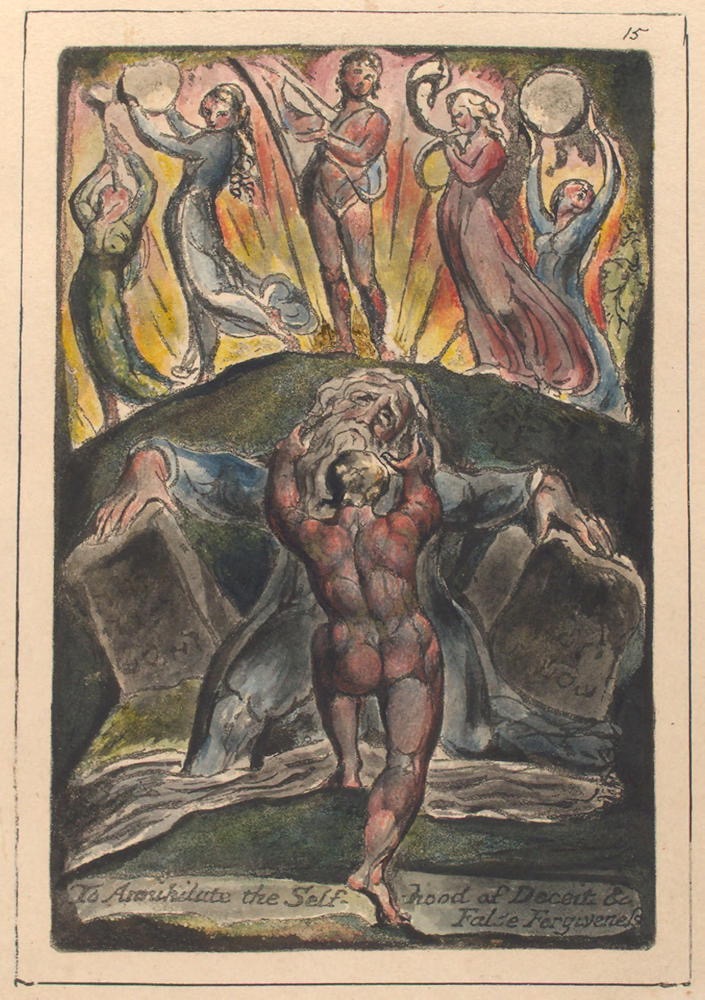
William Blake:
To annihilate the Self-hood of Deceit & false Forgiveness
(1804-08)
"The usual answer will be, "No, there wasn't," but only because there never is."
After any significant loss comes a period of SelfRecrimination, I suspect that the healthiest might engage in the deepest reconsideration of their former positions, for a loss should properly bring some of anyone's basis into question. What of what then seemed so right was so wrong? Could I have credibly owned any alternative position? Would I have agreed to pursue any other end with anything resembling a similar passion? Were my convictions wrong enough to warrant a reconfiguration of my perspective? Each of these questions should rightly feel unsettling, for these challenge the very basis upon which any thinking person holds any position.
Contrary to popular opinion, the best team does not always win.
Pherocity

Spex:
The sovereigns offered their subjects entertainment and fierce beast fights in circuses
[Les souverains offraient à leurs sujets des divertissements et des combats de bêtes féroces dans les cirques]
(1882 - 1884)
" … we cannot help but hear their disturbing noises."
Outrage, outward rage, might be the signature emotion of the MAGA movement. They seem consumed by theatricality, always performing as if they were cast in a production from Ancient Greece where the actors needed to artificially project their voices so the backbenchers could hear their lines. Their every expression seems cartoonish and caricatured. They seem incapable of thoughtfulness or gentleness. They never seem to be merely disappointed with an outcome but enraged. Their emotional content seems unsustainable, but with each new performance, that same familiar character emerges. Whatever the role, they seem to overplay their part. They seem decidedly self-conscious, not just in role but hyper-aware that they're in that role. They rarely, if ever, let down this facade. Some speculate that they're deep down shallow. A seething frustration lies just above their surface. They have an unscratchable itch. They bitch about everything. They would seem ferocious if their performances were in any way believable. They project a phony-seeming form of ferocity instead, mere Pherocity.
They seem to believe everything's a life-or-death matter and a zero-sum game.
Threatenings

Attilio Mussino: Harlequin and Pulcinella...
were threatening each other with sticks and blows. (1925)
"That's a promise, not a threat!"
Another common aspect of the MAGA style seems to be a fierce vacuity. They spend inordinate amounts of time threatening people, places, and things, even nothings. They always seem ready to interpret any butterfly's shadow as a mortal threat and overreact. This comes across as needlessly theatrical, maniacal ravings rather than well-thought-out intentions. These performances might primarily serve as distractions because any attempt to parse any deeper meaning or significance or, heaven forbid, pattern out of them will leave one grasping hot air. There's rarely anything there, and whatever manages to manifest bears little resemblance to the fire and brimstone characterizations that utterly fail to describe what was supposed to be coming. These performances almost always prove unsatisfying both from a content perspective as well as from any resulting action that might have been expected. In retrospect, they seem like Daffy Duck or Donald Duck rants: many feathers, little consequence.
They do seem to satisfy themselves with this barking, though.
Newness
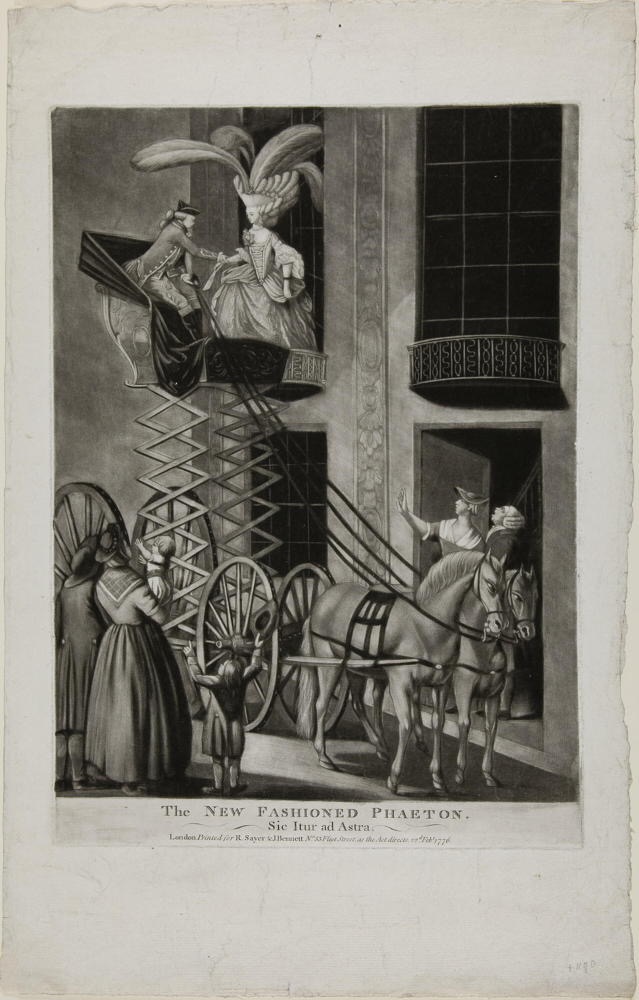
Attributed to Philip Dawe: The New Fashioned Phaeton (1776)
ABOUT THIS ARTWORK
Devoting less effort to the fabric textures and pearly luster of high-society mezzotint portraits, publishers also mocked sartorial excesses, especially those with foreign sources. In 1770s London, the epithet macaroni was directed at dandyish men and overdressed women who adopted an outrageous, European style and acted in an affected manners that their genders were said to become indistinguishable. Such costumes evidently even made leaving home difficult. This print’s subtitle, “Sic Itur ad Astra” (which translates as “Thus one goes to the stars”) comes from the Roman poet Virgil and suggests that the wigs and expanding carriages shown here have reached astronomical new heights.
—Art Institute of Chicago
"There was never a prescience half as satisfying as projection."
Newness is getting old. As I have aged, the new has increasingly lost its attraction. The information age might have finally done it in, what with the daily builds and too-frequent upgrades. I can't hardly start my laptop without some update needing to be installed, and the old, once-reliable app suddenly behaves differently, never to regain its former utility. We seem too anxious to abandon what was in favor of what never quite is yet. We speak of evolution but experience near-constant revolution. What might I depend upon now?
I struggle even to imagine replacements when an old and once-reliable falls by some wayside.
NuthingBut
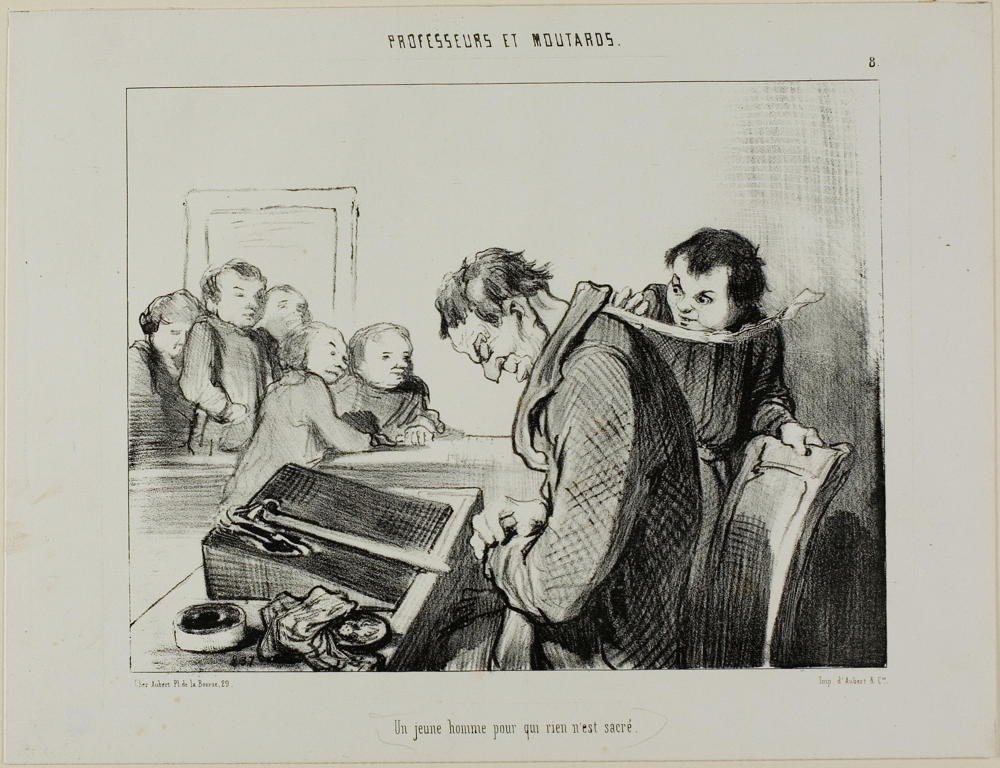
Honoré Victorin Daumier:
A Young Man to Whom Nothing is Sacred,
plate 8 from Professeurs Et Moutards (1846)
"We will be inaugurating the lamest duck in our country's history …"
In courts of law in this country, witnesses are compelled to swear to tell "the whole truth and NothingBut." Consequently, telling falsehoods can result in a perjury charge for lying to the jury. Outside of court, nobody holds anybody to such stringent expectations. We all can get a little loose with literal truths, but most of us work hard to avoid materially misrepresenting ourselves if only because few want to be fairly characterized as loose with the truth. We rely upon each other to fairly represent our experiences, so it’s scandalous, if not strictly illegal when a private citizen routinely misrepresents himself. Further, deliberate misrepresentation tends to introduce a parody of a response as repeated attempts to uncover the truth produce responses intended to cloak it further. These interactions resemble old I Love Lucy episodes from the fifties but are not nearly so entertaining.
As of this writing, our current President, Joe Biden, has kept his promise to tell The People the truth.
Statusing

Nicolas Toussaint Charlet:
Metselaar bij een muur [Mason at a wall] (1821)
"They despise themselves most."
With the MAGA crowd, I sense that I could never belong. Though I cannot delineate their selection criteria, they run a more exclusive operation than most country clubs. It seems backward and upside-down from more established segregations, though a few selection criteria seem obvious. They stand in apparent deliberate opposition to more traditional segmentations as if formulated to thumb their nose at an establishment. However, they seem every bit as exclusive as any old-school gentleman's club. Those granted entrance can seemingly do no wrong until they do. They remain blessed regardless of their sins, former or ongoing, much as their leader enjoys blind forgiveness from his followers. They do not perceive themselves as members but as loyal and devoted followers. They insist they're Christian, though apparently only in name. They also claim conservatism as a central organizing principle, which seems unlike any conservatism the good old days knew. It seems secret, though, as if its members were plotting the overthrow of something. Those not allowed into their club believe they represent a malign influence on our politics and treat them with the same respect they traditionally extended to the Klu Klux Klan.
The apparent obsession with status, though, baffles me.
BeingGrudged

Edvard Munch: Two Human Beings. The Lonely Ones (1894)
" I'm hoping the arc of our collective experience turns toward enlightenment …"
Last week, I proposed five elements of what I referred to as The Stupidities that seem to be ascendent as we move into our impending NextWorld. These elements terrify me because they seem to reduce our polity's resilience. They amount to increasingly popular fallacies, mis- or dis-representations of our everyday reality. They undermine an individual's ability to agilely navigate together into our future. Gathered together as a common practice, the group engaging in these behaviors damages their abilities and hobbles their societies. As I explained before, those engaging in The Supidities tend to insist that they're certain about what nobody could ever be certain about, often about delusions and fictions. They engage in what The Muse refers to as The Sins of Self-Importance; they are vain and sincerely believe that everything was always actually all about them. They also exhibit a discernable addiction to common Inanities. They seem dependent upon and exclusively informed by unreliable sources that have few compunctions about just making shit up as news.
Another common presence in this mix engaging in The Stupidities seems to be, among a significant portion of the population, a sense of BeingGrudged.
Weekly Writing Summary For The Week Ending 01/02/2025
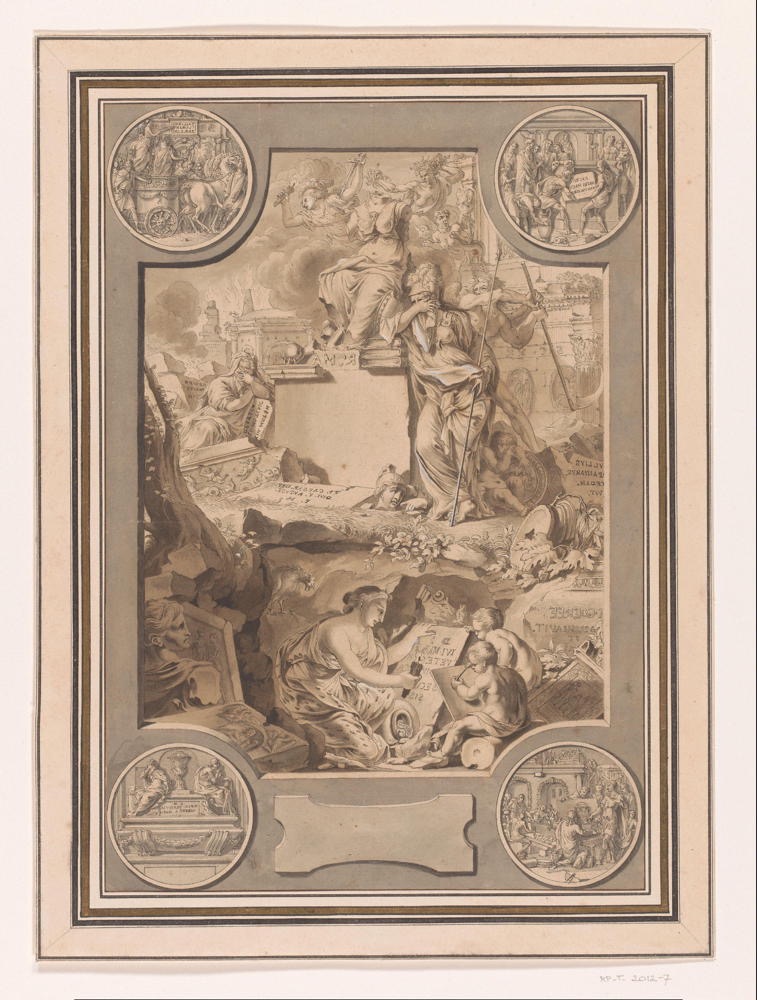
Jan Goeree:
Frontispiece Design from Corpus Inscriptionum (c. 1707)
Gallery Statement: A weeping Minerva is depicted here near a dilapidated statue of the city of Rome, surrounded by all manner of ancient remains. The drawing is the design for the title page from a collection of Roman inscriptions compiled by J. Gruter and published in 1707. The engraving was used once again in 1726, with a different text, as the frontispiece for a survey of the monuments of ancient Rome.
—-
The Day Inexplicably Turns
Into the new year and still without a killing frost. My Magnolia tree is budding out and will bloom before the end of January unless some winter settles in. I'm now praying for what I so recently dreaded, though the extended rainy season has already answered many prayers. It still unsettles me to acknowledge that we utterly rely upon the rains, which come more or less randomly. Anyone still holding on to the conviction that we must have strong central coordination might have missed this underlying condition. The context within which we exist was not concocted by us, no matter how much we might have tried to reengineer it to do our bidding. Now that we're actively influencing age-old patterns, our world responds, coloring outside expected lines. Summer gardens extend into the following January. Winter might not come this year. Magnolias might bloom twice. Our NextWorld seems only tangentially related to our more familiar ones. It's a wonder I hadn't noticed much earlier. I might not have been paying close enough attention, but I suppose it's our nature to take much for granted. We might be more blessed than we could ever appreciate. As I've watched my world slink toward the dreaded upcoming inauguration, I have been paying closer attention. I suspect the tardy winter will arrive to inconvenience what might have been an early spring, and everything will become jumbled again as if that might constitute a difference. I anticipate everything becoming strange once the new administration begins with their abomination. I savor these final few days before the air turns gray and the day inexplicably turns into a long night.
Inanities
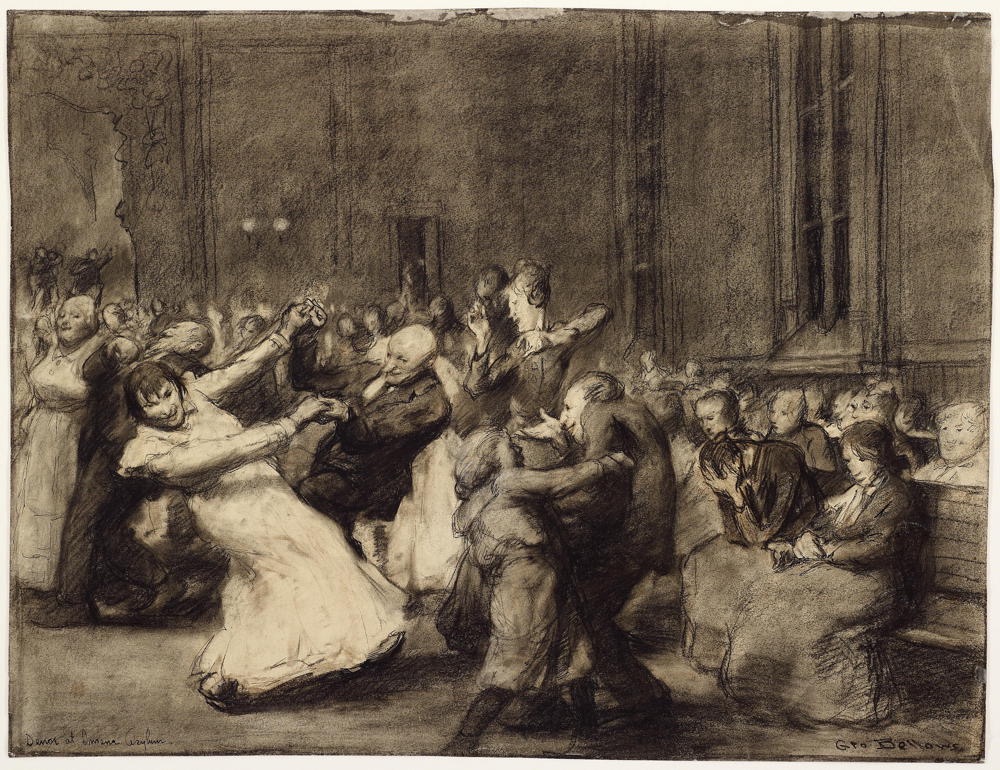
George Wesley Bellows:
Dance at Insane Asylum (1907)
"I'm confident it's coming."
In the late 1980s, a relatively new phenomenon entered America's media landscape. A disc jockey from Miami found traction as a political commentator. He was never knowledgeable. His superpower seemed to have been his willingness to say anything on air. He was not careful to distinguish between fact and fiction. Indeed, almost everything he said on air was provably fictitious, but the delay between utterance and rebuttal rendered his utterances most memorable. Ordinary people were attracted to this doubtlessly entertaining programming, and very quickly, the vocabulary of political dialogue changed on Main Street. What had previously seemed unspeakable became common vocabulary. In this way, formerly arch-conservative opinions slid into more of a mainstream position.
A decade later, a media billionaire from Australia started an alternative news service patterned after the worst of the British Fleet Street rags.
Vanities

In the manner of Adriaen van der Werff:
Bubble-blowing Girl with a Vanitas Still Life
(1680 - 1775)
"He spends his wealth on the equivalent of candy and gum."
We were the first country founded on the principle that every citizen was granted the freedom to pursue happiness. Unsurprisingly, this freedom has not resulted in unbridled happiness. Like always, true happiness seems intermittent and the purview of a select few. Most seem to more or less content themselves with the understanding that they possess the right to pursue happiness, even if it continually eludes them. Happiness, under this freedom's influence, seems to have taken many curious forms, the Second Amendment right to bear arms among the strangest. Who would naturally correlate gun possession with happiness? The Beatle's tune Happiness Is A Warm Gun was intended as irony rather than a declaration of natural fact.
Happiness can be a tricky objective.
Stupidities
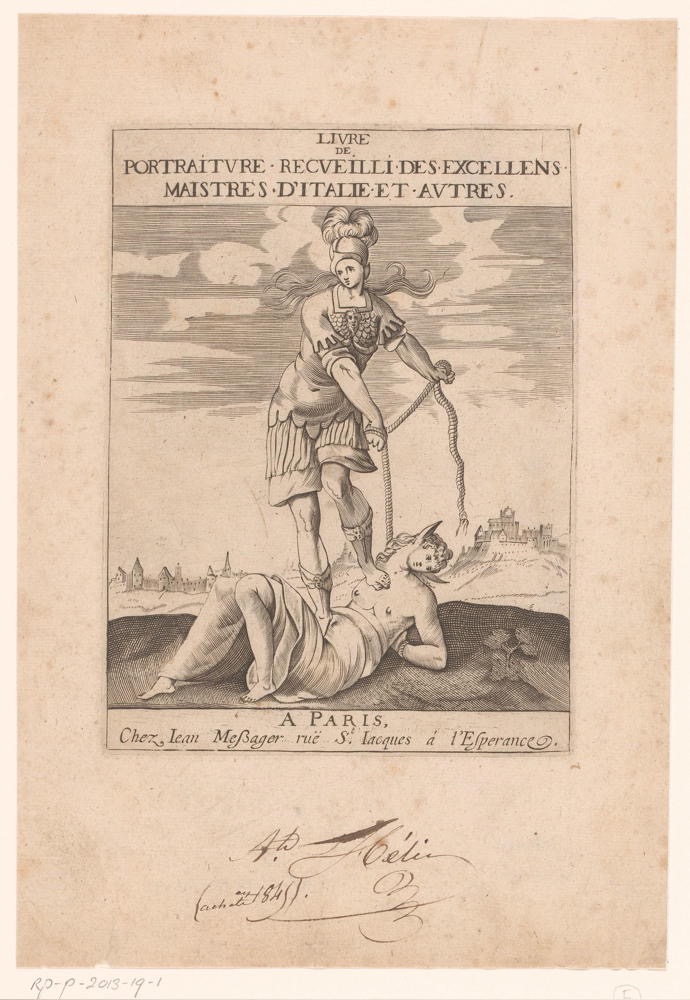
Jean Dubrayet*:
Minerva bindt de Domheid vast met een touw
[Minerva ties the Stupidity with a rope] (c. 1627)
Titelpagina voor een boek met tekenvoorbeelden.
[Title page for a book with drawing examples]
*"Jean Dubrayet was a print maker who is known for works such as Minerva ties the Stupidity with a rope and Portrait of Ajax." (Google AI experiment) I could find no other biographical information on this artist.
" … the trinkets with which our future was purchased."
It might be that history has always been a slave to the Stupidities. When I was still very young, I remember my more ancient elders wondering how their world would get along with the quality of young people coming up to eventually replace them. The young have always known nothing, and to those who knew everything in their time, they unavoidably seem relatively stupid. Youth tend to master stuff that seems meaningless to their elders. Our own Grand Other was showing off her gaming computer, a gift she and her dad built together as a Christmas present. She was proudly displaying the high-quality graphics, which I could barely see. I was thinking that the old text-based Adventure® game I used to play back on that 360 clone in the 70s had far better graphics, and it was text-based. I lasted a few seconds before I excused myself and went to wait for The Muse in the car. It disturbed me deeply that our Grand Other would somehow tumble to such stupidity! (She belongs to an after-school sports team at her high school. Her sport is, and I kid you not, competitive gaming!)
I'm ordering handbaskets.
Surrealizations

Dorothy Dehner: Landscape for Cynics (1945)
"Merry Christmas might take any of a variety of meanings in any NextWorld."
When The Muse and I bought our Villa Vatta Schmaltz, we imagined it would eventually become the center of many extended family gatherings. I imagined that when my kids had children, The Villa would naturally become the over-the-river-and-through-the-woods holiday destination of choice for them, as my folks' place had been for me and my family in my time, but it hasn't. Our twelve-year exile opened space for different patterns to imprint. By the time we returned, we remained as off the holiday radar as we had been when exiled in Washington, DC, and Colorado, both places too absurdly far away and lacking any history for the family to reasonably consider as holiday destinations. So, those generations imprinted on other places for the holidays, though I hadn't reimprinted on this NextWorld until this just passing Christmas.
My Christmas gift was the Surrealization that I had been living embedded in that past notion, that what I had tenuously believed would be the case twenty-some years earlier would likely still eventually come to pass.
Weekly Writing Summary For The Week Ending 12/26/2024

Tobias Conrad Lotter:
Astronomische theorieën en uitleg
[Astronomical theories and explanation] (1749)
Adequately Chilling
The first week of Winter brought Spring-like weather with Chinook winds and more rain than we've seen since last Spring. We've had three bomb cyclone systems bump into our coast since Halloween, each bringing fierce wind and much-needed rain. The Winter Wheat, already sprouted in the fields, has gotten a great head start. Our wheatfields sport Spring Green cover while we continue waiting for our first killing frost. I still have last summer's petunias, geraniums, and roses, which are still blooming. I sank the fuchsias into a composter bin; they seem secure enough for now. Winter has not come yet. Moreover, our usual weeks of numbing fog mostly missed us as those wet and windy systems repeatedly scoured our valley. I began a new series this week that has yet to reveal its purpose. After the terrifying results of last Fall's elections, I needed something more positive than politics to focus my attention on. I anticipate a period of great upheaval, even tragedy. I needed to clean out my backlog before taking on another initiative. Winter might not come this season, but the events unfolding on the world's stage threaten to be adequately chilling. I worry about our NextWorld.
UnProcrastinating
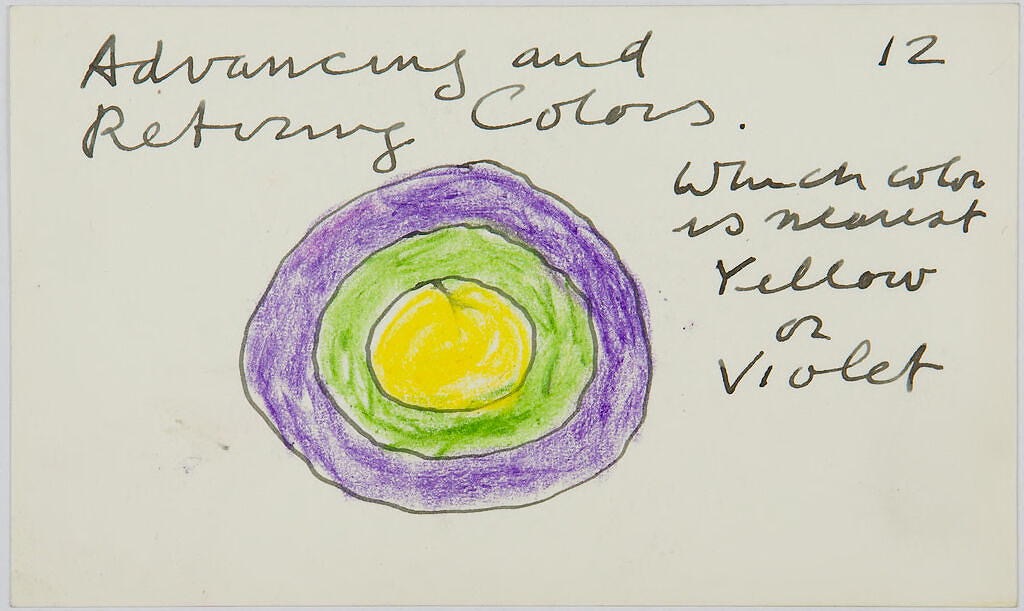
Stuart Davis:
Advancing and Retiring Colors Diagram (1942)
" … I can accomplish virtually anything."
Almost four years ago, when we moved back into The Villa Vatta Schmaltz after a twelve-year absence, we just crammed some stuff into whatever corner availed itself, particularly in the basement. Then, life regained momentum, and we didn't find a reason to retrace our earlier decisions. Clogs resulted. Particularly in my basement shop/laundry room, the clutter predominated. I'd just splayed most of my tools along the vast workbench top and worked around that mess. A month ago, I took positive steps toward eradicating that embarrassment. I hired Kurt, our painter, to refinish a peeling back wall, and I pivoted some of the shelving ninety degrees to provide space along its backside for pegboard, where I imagined I could mount my hand tools for tidy and convenient access. Painting done, I've not yet started moving back into the freshly refurbished space.
I am in the process of UnProcrastinating, with the explicit intention of creating a fresh context, if not a NextWorld.
Distinctioning

Jan Luyken: Vrouw Wereld toont kinderen de brede en smalle weg
[Woman World shows children the wide and narrow road] (1699)
" … largely unexplored."
When might this NextWorld appear? From here, the answer to this question seems to depend upon what one considers a distinction between one world and a next. What change, one to another, might qualify as enough to accept it as a genuine difference? I know, this seems awfully subjective. Some people maintain stricter standards than others. It might be that those who acknowledge slight differences as constituting distinctions experience more successful lives, for they might more comfortably manage to "change the world." Those who hold the strictest standard when making such distinctions live in a world that, by self-imposed definition, must always stay the same.
But aren't some changes more obvious?
Faith-Based

Jehan Georges Vibert:
Trial of Pierrot (Not Dated - late 19th century)
"I will have levitated by the means of tugging up on my own shoelaces."
I might be one of the least religious people you could ever meet. I don't have much particular animosity toward religion, only that I don't belong. Their lore doesn't interest me much, and their metaphors tend to lose me. For instance, I will never understand the concept of a personal lord and savior. I cannot understand what that phrase means nor imagine what such a service if competently performed, would even look like in practice. I never bought into the idea of original sin, either. I appreciate the good works various religious bodies perform. I am rightly appalled by the evil organizations engage in, seemingly as a matter of course. Any collection of individuals organized together becomes capable of evil far exceeding any individual's potential. I believe that groups must be more careful lest they inflict unintended damage on others. The notion that one collection of people is necessarily superior to another due to their beliefs disgusts me.
All that said, I acknowledge that my life has been a Faith-Based initiative.
ThinkingIll

Lovis Corinth: Cain (1916)
"No whining!"
Two days into creating my Christmas Poem Cycle and halfway finished, I encountered a definite blockage to completion. I caught myself seething inside. I have been holding an anger, and the old, probably incorrect definition of depression was "anger turned inward." The idea apparently was that inward-aiming anger might fester into deep self-destructive sadness while anger aimed outward might at least dissipate, perhaps even harmlessly. But we live in an era when anger has turned outward, which has resulted in considerable carnage. School shootings seem to have become a daily occurrence, and what are those but outward-focused angst? You must have played hooky through those years if you were not seething through middle school.
My challenge as a poem writer involves poisoning the well.
WritingPoems

Yashima Gakutei:
Woman About to Write a Poem (c. 1824)
" … not the definition of insanity but of quality."
Every year, as Christmas nears, I find myself stuck to my desk WritingPoems. Years ago, I solemnly swore to stop buying presents in stores. I'd had it with that despondent shuffle exhibited by people hoping to find that perfect gift while having no real ideas about what such a gift might entail. That annual desperation of hoping a pre-Christmas miracle might appear in an overcrowded aisle. The passion play involving the eternal search for perfection, demanding faith and devotion yet often fruitless. It might be that perfection cannot be successfully sought but can only happen unbidden. Anyway, I'd had it and swore off that curious addiction. I would henceforth write poems and give them as gifts.
After more than twenty years of experience, I can't say that WritingPoems has necessarily been easier than shopping would have been.
NextWorld

Franz Marc: The Bewitched Mill (1913)
"I guess I'll keep watch and see if I can catch a NextWorld emerging."
The inescapable ignorance of youth and the inevitable arrogance of age conspire to mislead most into believing that youth possesses innocence and the elderly own prescient wisdom. What could prove to be further from the truth? Youth has never been able to hear its elders, let alone understand them. The elders innocently expect their broadening experience to amount to something when it rarely does. Youth insists upon making its own mistakes and elders have little with which to trade but their undervalued perspective. The NextWorld, the one continuously emerging, has never turned out to be as anticipated or similar to what came before. Forced to poke sticks into darkness, civilization continually moves onward, if not necessarily forward.
I have little to offer in the way of advice.
Weekly Writing Summary For The Week Ending 12/19/2024

Rembrandt:
Self-portrait in a Soft Hat and Patterned Cloak (1631)
Tomorrow Morning's Problem
Someone I was chatting with at a holiday party asked me if I was retired. I'm never sure how to respond to that question because I don't consider myself retired, yet no one employs me. I responded by declaring myself a writer who puts in his daily hours. I don't know what I'd do if I retired. I still feel the deep need to create something every day and the responsibilities owning The Villa place on me. I continue to get up very early every morning to seriously consider what I should be doing that day. By the time The Muse rises hours later, I've already accomplished something, however modest. The balance of my day builds upon that early success. I rarely fail to achieve something of my own devising, early each morning. If I fear anything, I fear not accomplishing that something. I might suffer from some obsessive-compulsive disorder, except my world seems exquisitely ordered. I am free to procrastinate after I've finished my writing, and I procrastinate plenty, but I am never free to avoid my writing. Am I retired? Not hardly. I can't imagine myself ever hanging up my spurs.
As I finish another series, I ask myself if I have another one in me. The answer is an inevitable maybe. I cannot know until I've finished whether I have another in me. The honest answer would be that I didn't but that I didn't need to have another one in me before I started writing. What would become another one was never in me before I began but passed through me as I continued once I started. The starting primed the pump. The daily ritual maintained the flow. Knowing was never necessary or, I suspect, sufficient. There's no going back to recover what was never started. There's never a good enough excuse for not starting. I have not yet decided what my next series will focus on. That's tomorrow morning's problem.
Passing
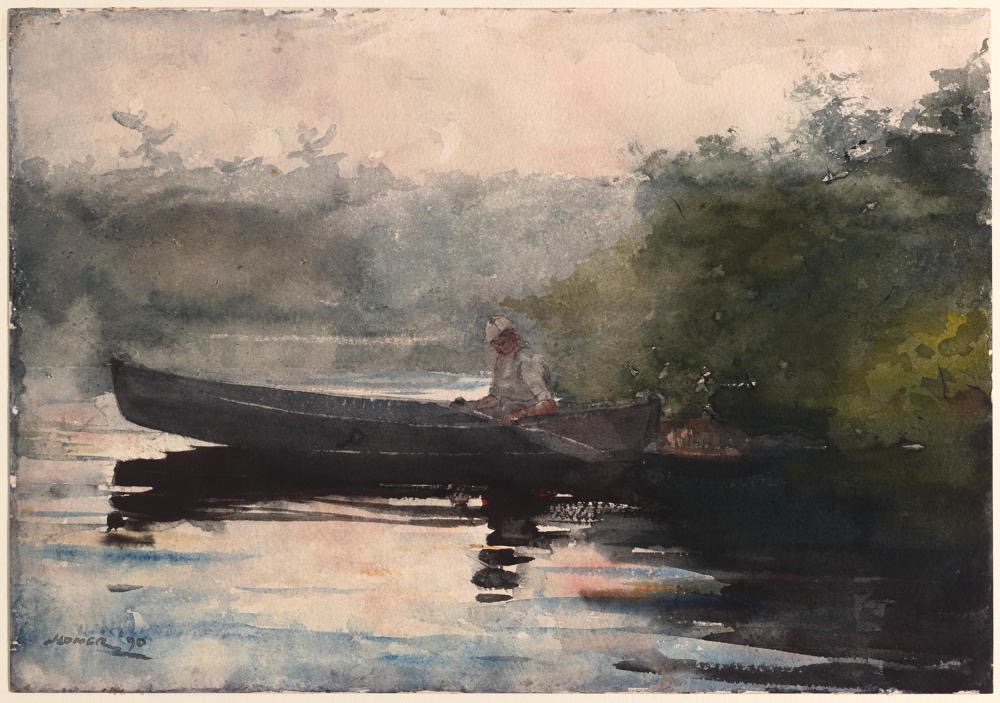
Winslow Homer: The End of the Day, Adirondacks (1890)
" … anyone Exiled never returns."
Our Exile didn't so much end as pass. In the same way, a person passing from life to death does not undo what they've accomplished; their story continues in their absence. As this series might have demonstrated, my Exile, our Exile, remains a prominent presence even now, three years after it passed. It continues Passing. I expect its Passing to continue until I pass, too.
The final few weeks away were excruciating.
PiecesOfMe

Louis Rhead:
I diverted myself with talking to my parrot (1900)
"Another Exile might be in all of our near futures."
These Exiled Stories have not just been about me, but actual PiecesOfMe. Everywhere we landed on our twelve-year odyssey, PiecesOfMe sloughed off and were left behind. By the end, I felt as though I had been pruned to within an inch of my existence. Though I supposed I was supposed to return with treasure, I returned immeasurable instead. What had I gained but some stories? What had become of me in my absence? Who was I supposed to have become? I returned dumber than I left and likely no wiser, either, for I had been absent the entire time. I'd learned a raft of things that have no practical application back in my homeland, even as generalized abilities. How could I apply my learned facility with public transportation in a place offering little of that? How would my learned tolerance for high humidity serve me when living on the edge of a vast desert? I returned with very little to show for my absence but stories.
Did my extended absence at least make my heart grow fonder?
LastAdolescence

Carel Christiaan Antony Last:
Meisje met Tulband [Girl with turban]
(1835 - in or before 1839)
"Once we were empty nesters again … "
More than a year before we returned from Exile, well after we'd comfortably settled into Colorado, The Muse received an urgent message from her granddaughter, our GrandOtter. The Otter had struggled since graduating high school, and even achieving that success had proven extremely stressful. All drama aside, and there had been ample drama from The Otter over recent years; she suffered from a baffling collection of diagnoses. One suggested she exhibited symptoms of some borderline personality disorder that seemed to me to have been an over-the-border one. Whatever the context, when The Otter contacted us, we couldn't help but respond, for she was our GrandOtter, and we'd considered ourselves an implicate part of her childhood and life. If she were in trouble, we'd respond.
It was always difficult to separate the real from the imagined with her.
Separations
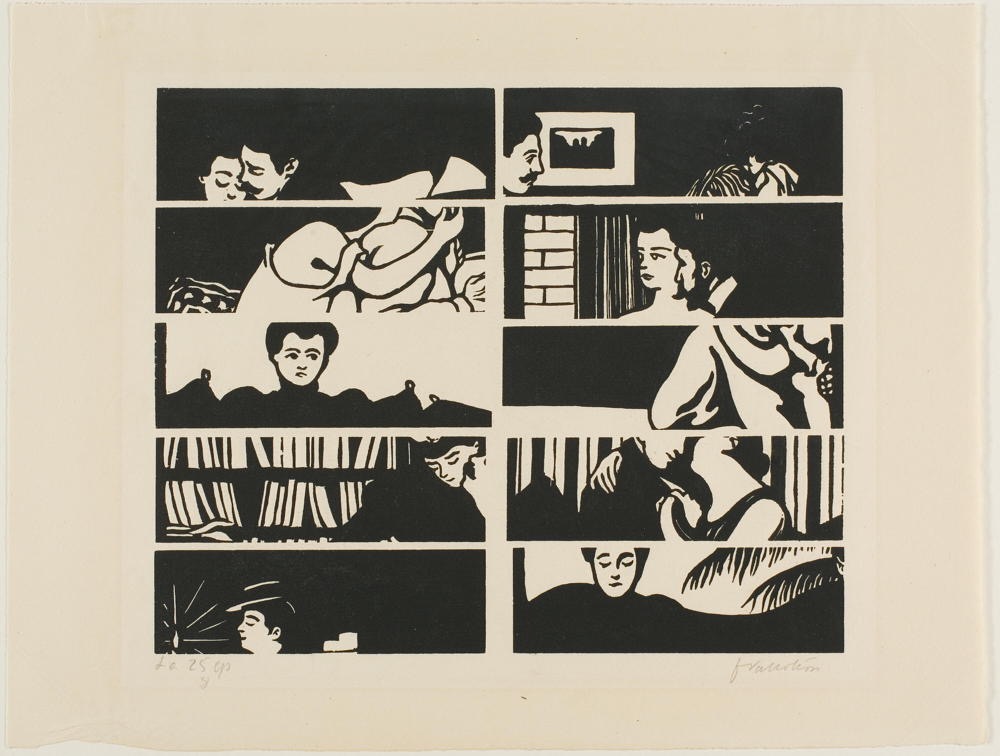
Félix Edouard Vallotton:
Cancellation sheet,
fragments of ten woodblocks from Intimacies (1898)
" … actively engaging in her separation dance."
We ended our Exile with several preliminary Separations, for we'd become connected, perhaps even addicted, to our Exile after more than a decade gone. We had been Exiled for almost as long as we'd been together before we were Exiled. The Exile threatened to outshine our prior experience together to become the new anchor. The shelf life of any Exile experience was never meant to outlast the sum of any of the Exileds’ pasts. We felt some pressure to return before we exceeded some imagined upper limit, after which no one can credibly reappear, but we couldn't simply disappear. We had made connections. The Muse was still employed and more or less enjoying her Exile career. I'd made peace with where we'd landed, only rarely feeling too isolated to bear. Wherever we were once we landed in Colorado; we were much closer to home but still more than merely a long two-day drive away.
My mom died after we moved to Colorado.
LeaveMaking

Randolph Caldecott: Taking leave. (1885)
"More complications sat between us and our exit."
We focused on leaving through the last half of our Exile. For over six years, The Muse schemed to position herself—us—where we could cleanly leave. In Takoma Park, Maryland, our starting point seemed impossibly far away from our target in Southeastern Washington State. A single hop home seemed unlikely to work from there. Further, after the first six years in Exile, we barely had our heads above water. We'd need more capital to achieve what we aspired for upon returning from our Exile. The Villa would need considerable refurbishment once we returned, and we'd learned that opportunities for accumulating wealth were few and farther between there than they would be almost anywhere else, like in Colorado.
Our first move took us to Colorado, then, where we figured we just might be able to swing purchasing a home.
ChristmasesPast
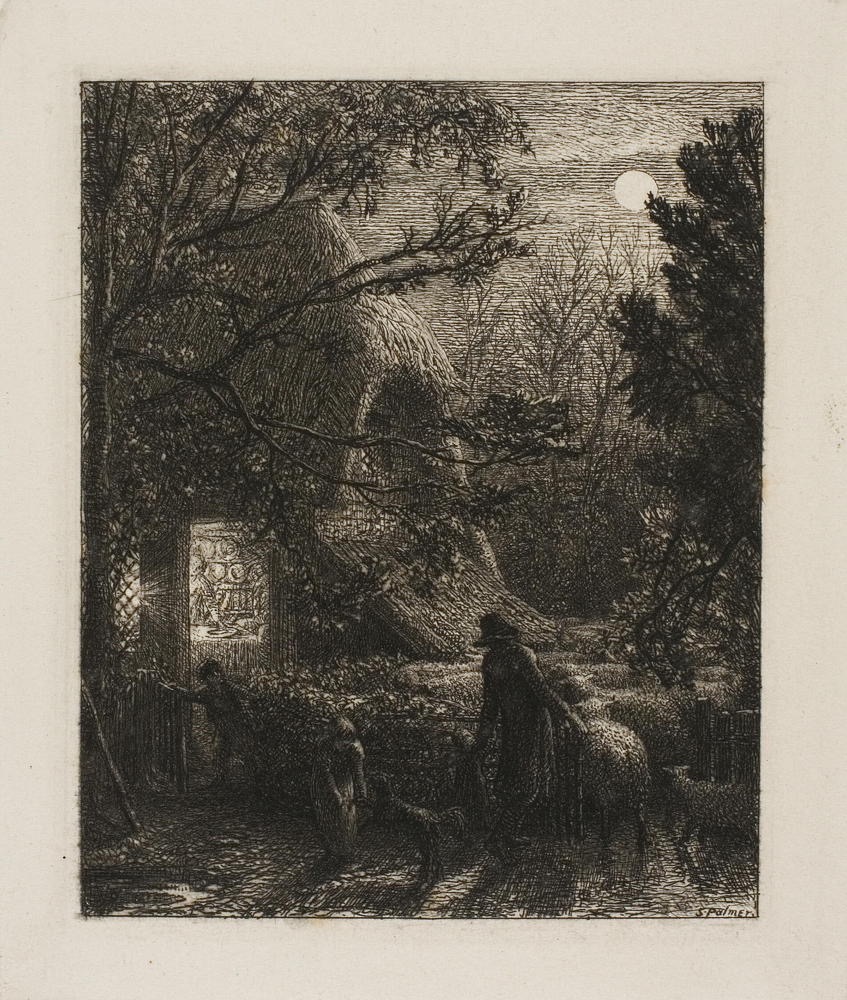
Samuel Palmer: Christmas (c. 1850)
"Our Exile was best when ChristmasesPast were the present."
The Muse and I didn't dwell day-to-day upon our dilemmas. We had our lives to live, Exiled or not, and the usual activities of daily living consumed most of our available attention. However miserable we might have become, we maintained a believable semblance of normalcy. Wee-hour thoughts rarely visited and never persisted into full obsession. We did not live lives of silent desperation. We were comfortable after a fashion. In some ways, we became more comfortable than we'd ever been before while we were Exiled, for some of the complications of regular life didn't haunt us in our absence. Our social obligations narrowed. Our acquaintances slimmed. We knew few. Our time largely remained our own. Once we developed routines, little further problem-solving was involved in our daily lives. It was sometimes like we had been furloughed from our regular life instead of being absent without leave.
When the Christmas season came, though, we teleported ourselves home.
Weekly Writing Summary For The Week Ending 12/12/2024

Copy after(?) Maurice-Quentin de La Tour:
Self-Portrait (18th Century)
Except For Occasional Reappearances
I took myself to lunch today, the busiest day of my week after the carpenters finally showed up this morning to begin installing our new porch deck. They'd hauled away the gold-plated deck boards—clear, verticle grain Douglas Fir tongue and groove three-inchers—a few weeks ago to sand and finish them in a heated shed. The boards returned transformed! We'd discussed the final details as light snow fell, and I left exhausted. I decided to take myself to lunch to purchase some respite. I went to the Sub Shop to order some of their chicken rice soup, which isn't soup so much as a thick goup, perfect for a chilling Thursday lunch. I ordered the soup and a half of a tuna sub. As she dished up my goop, the checker said she'd bring out my sandwich when it was finished.
I retired to a table in the back and enjoyed my goop, but my sandwich never came. I returned to the counter, and the checker reacted as if she'd never seen me. I responded to her asking how she could help by saying I was back for that half sandwich she'd said she'd deliver to my table. She looked astonished! "I wouldn't have said that," she replied, "because I don't deliver sandwiches to tables." She went on to ask what I'd ordered as if she were speaking to someone who had recently returned from the Twilight Zone. She turned to dish up the goop, and I stopped her, saying I'd already eaten my goop and just wanted the sandwich. She asked me what I wanted as if I had yet to order and paid for what I wanted just a few short minutes before. She took my order and passed it on to the sandwich maker, who had witnessed my earlier interaction. A minute or two later, she handed me the tuna in a to-go bag, though I'd ordered it for there, and, curiously, didn't charge me again for the sandwich she'd not acknowledged I'd earlier ordered and paid for. She'd even thrown a chocolate chip cookie into the bag. I retired to my table to swallow that sandwich, wondering.
The Muse has been out of town this week, so I've been lacking one of my usual verification mechanisms to confirm I'm present. Due, probably, to some Heisenberg factor, I might not actually exist unless observed by someone who knows me. My cats often perform this service, but in that sub shop, I was missing my verification medium and, therefore, experienced what it might be like without me being present. This episode perfectly encapsulated my Exiled experiences. You might recall the episode where I was feeding feral cats with a four-year-old. We named one of those cats The Cats Who's Never There. I got to experience how that cat must have felt. My certainty that he probably didn't exist and that raccoons were eating the food we left collapsed his existence wave, but only for me. For lunch today, I had a dish best never served, the sense that I might not actually exist and that I might have been permanently Exiled to someplace else, except for those occasional reappearances.
ConstantCompanions

Possibly after Ignatius van Logteren:
Young Bacchus and Companions
(not dated- Early Eighteenth Century)
"He serves as a continuing inspiration."
My Exile was eased and occasionally burdened by the presence of ConstantCompanions in the form of two cats. Crash, the senior partner, had adopted me when I was recovering (poorly) from my second divorce. I suspect he recognized me as a fellow Exile and took to jumping up in my lap. I've always suspected that cats are clairvoyant or, if not, that they're not entirely subject to the same space/time limitations that contain us. I believe he knew what a remarkable companion he would become for me and chose that fate as an act of appreciation and service. He was a life-saver through those harrowing days when The Muse and I first found each other. We were both exiled then, and both were somewhat worse for the wear. Crash took great care of us.
Later, after we found The Villa and relocated to Walla Walla, we found our second cat, Rose, who was forever skittish.
FellowTravelers

Jean Charles Cazin: Tobias and the Angel (1878)
Background Note:
Tobias and the Angel is the traditional title of depictions in art of a passage from the Book of Tobit in which Tobias, son of Tobit, travels with the Archangel Raphael without realizing he is an angel (5.5–6) and is then instructed by Raphael what to do with a giant fish he catches (6.2–9). The Book of Tobit is accepted by Catholic and Eastern Orthodox Christians as part of the biblical canon but not by Judaism or most Protestant Christians, the latter including it in the Apocrypha. (Wikipedia)
" … mirror images playing before us."
Those who have been Exiled develop an ability to recognize others who have been Exiled, their FellowTravelers. This fraternity was never anything anybody aspired to join. Each was conscripted, much as each was Exiled, not necessarily against their will but probably without anybody first asking permission. Being Exiled must leave similar wounds across its population. Exiled men, women, and children each seem to carry this common attribute. Time doesn't seem to affect its presence. Neither does any trauma related to the experience. For some, their Exile served as an escape; for others, an imprisonment, yet for both, the experience seems to leave similar indelible traces. It's rare that anyone quickly discloses their personal experience with Exiles. Most keep this story secret until the listener can be fairly classified as an intimate. Yet when the disclosure finally emerges, the previously Exiled listener will probably experience an I Knew That Moment. They realize that they knew without being able to assign an explicit label to that sensation.
We're all connected in myriad ways.
Arrogance

Hieronymus Wierix: Val van de mens [The Fall of Man] (1578)
Allegorie op de ondergang van de mens. De Wereldse Mens (Mundanus Homo) valt met tafel en al door het geopende luik in de vloer. De duivel (Diabolus) houdt zijn netten gereed om hem te vangen. Een naakte vrouw, de Zonde (Peccatum), trekt de Wereldse Mens aan zijn jas, zodat ze hem met haar pijl kan doorboren. In het midden richt de Dood (Mors) zijn pijl op de vallende man. Hij wordt tegengehouden door de Goddelijke Genade (Gratia). Boven haar hoofd de duif van de Heilige Geest. Geheel rechts vechten Arrogantie (Arrogantia), de man met helm, schild en opgeheven zwaard, Eerzucht (Ambitio) en Geweld (Violentia). Ze strijden om de aardse rijkdommen die van het bed van Vanitas door het gat in de vloer zijn gevallen. De voorstelling wordt verduidelijkt in de Nederlandse, Franse en Duitse onderschriften in de marge.
Allegory of man's demise. The Worldly Man (Mundanus Homo) falls into the floor with the table and all through the open hatch. The devil (Diabolus) keeps his nets ready to catch him. A, Sin (Peccatum), pulls the Worldly Man by his coat so that she can pierce him with her arrow. In the middle, Death (Mors) points his arrow at the falling man. He is held back by the Divine Grace (Gratia). Above her head, the dove of the Holy Ghost. On the far right, fight Arrogance (Arrogantia), the man with helmet, shield, and raised sword, Ambition (Ambitio), and Violence (Violentia). They compete for the earthly riches that have fallen from Vanitas' bed through the hole in the floor. The performance is clarified in the Dutch, French, and German captions on the margins.
—
" … an infantile worldview and a wound that could never heal."
The Exiled exhibit a common Arrogance. The act of being Exiled feels undeserved. Consequently, the Exiled feel wronged. They believe themselves to be, as a class, innocent parties. Nothing better fuels an Arrogance than having been unjustly punished. The Exiled feel almost saintly superior in their anguish. Many carry a martyr complex. The world they've been cruelly forced into feels far beneath their station. Having been coerced into abandoning the center of their universe, they recognize how everything in the Exiled-Into hinterlands stands well beneath their standards. Forced to live among the rabble, the Exile might seem withdrawn. They are probably not as shy as they first appear. They are seething and have no idea what rules govern their presence there. They feel embarrassed.
Washington, DC, might seem like a shining city surrounding Capitol Hill until you search for an apartment on the backside of that shining hill.
Impermanence
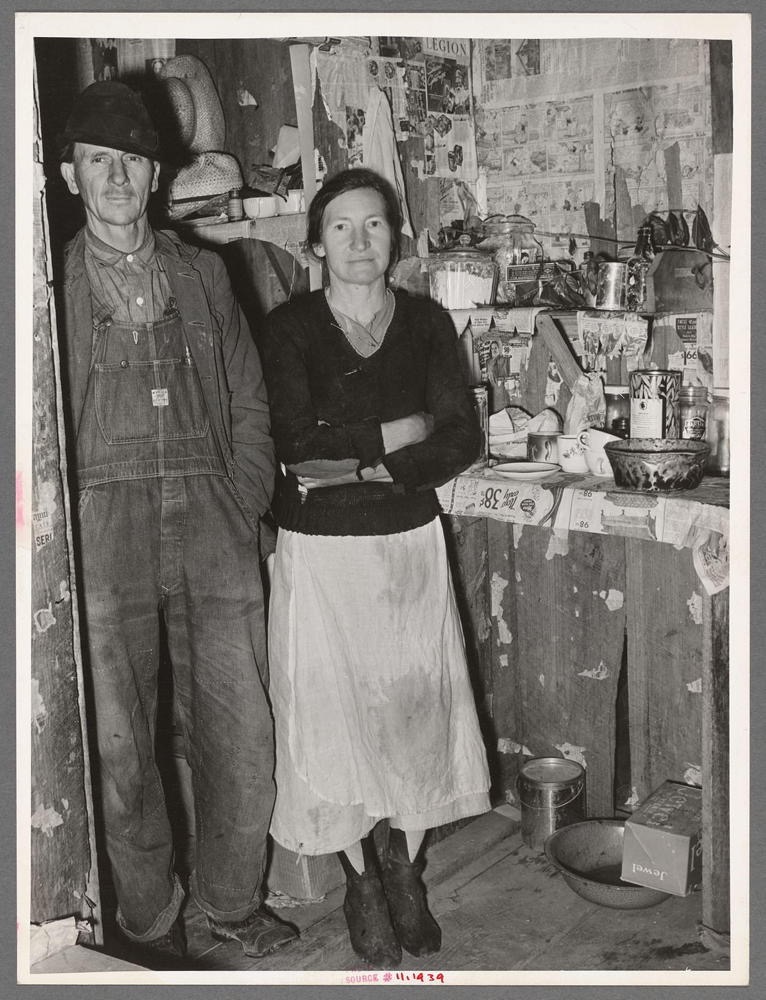
Lee Russell:
Migratory berry pickers in temporary home
near Ponchatoula, Louisiana (1939)
[United States. Farm Security Administration]
"My sense of Impermanence gratefully proved impermanent itself."
A fundamental paradox of living involves the necessity of seeing the temporary as somehow permanent. Life is a wasting state, destined to end eventually, but living seems best served when presumed to be permanent. We don't take the temporary as seriously as we take the eternal; just a subtle reframing materially transforms experience. We live in a too-disposable era where many things come in single-use packaging. We've grown too used to discarding so that we too easily perceive even our precious, non-refundable minutes as somehow disposable.
When I was Exiled, my life seemed to go off the books.
Untreatable
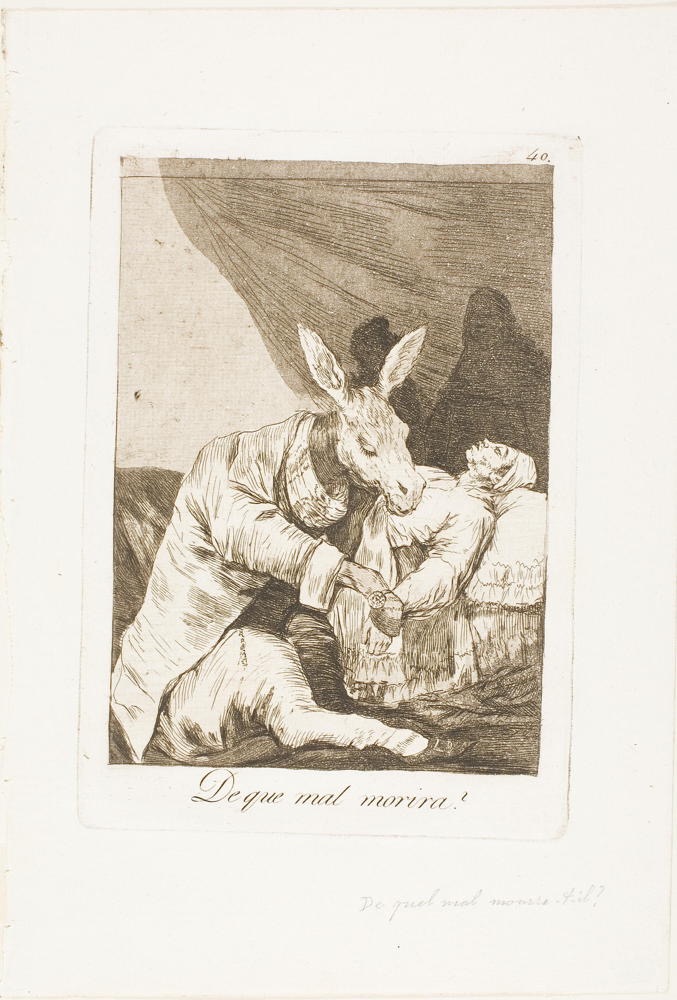
Francisco José de Goya y Lucientes:
Of what ill will he die?, plate 40 from Los Caprichos
(1797–98, published 1799)
" … the lesson that seems to need to be relearned anew every time."
Being Exiled does not amount to a treatable condition. It is not a problem requiring a solution, though I first considered it a serious problem. I spent considerable nonrefundable time needlessly and fruitlessly seeking a solution. My life became a parody just as certainly as if I had awakened to find myself cast in an old I Love Lucy episode. This experience might have been tragic. Indeed, it seemed as though it certainly could have become tragic. That it didn't, or eventually didn't, amounts to a form of magic. I certainly contributed to the comedy of errors. I sought salvation from what I might have more productively considered a mere flesh wound, a scratch. I blew my condition out of proportion and then blamed the Gods, the universe, or my ineptness for cursing my meager existence. I felt cheated, wronged, and violated. I was the one wielding the weapon, though. I was burgling myself unawares.
In this life, stuff happens.
Reappearing

Rembrandt Harmensz. van Rijn:
The Incredulity of Thomas
["Christ Appearing to the Apostles"] (1656)
"Home seems less where the heart grows fonder than where one's pasts live …"
After Being Exiled, The Muse and I occasionally Reappeared on our old home turf. We came for various reasons, usually to see family, though I also once came alone to repaint the Villa. I'd slip down to the Main Street Starbucks at 5 AM to swipe some wi-fi and post my latest dispatch. I would inevitably get spotted by somebody from my former existence. I would get the opportunity to explain where I'd gone and what I was doing returning. Somebody would usually ask if we'd come back, but I'd have to admit we hadn't. Not yet. We'd recount a few of our former misadventures before disappearing into the ether again. I'd run into old friends wherever I went, even visiting my mom in the old folks' home. Another inmate's kid or a staff member knew us under other circumstances and usually asked after us.
Our stories always seemed pretty lame to us.
Weekly Writing Summary For The Week Ending 12/05/2024
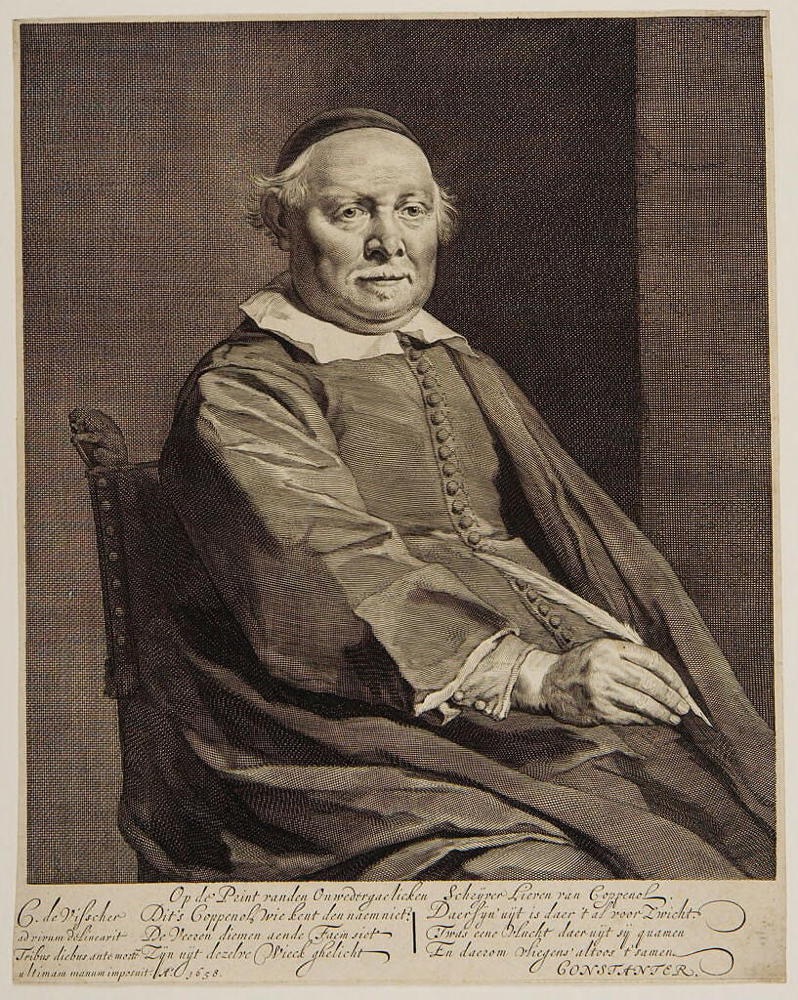
Cornelis Visscher: Lievens van Coppenol, Writing Master (1658)
Muster An Effective Resistance
As Winter approaches here, a persistent inversion layer appears. It brings low cloud and consistent temperatures that very slowly work their way downward toward freezing. For weeks, temperatures might hover in the low thirties without actually freezing. The petunias have not yet been frostbitten, nor have the geraniums. Their days will come as December unfolds. Genuine cold will arrive, and the fireplace will become the center of our lives again. This old house becomes its coziest when it's coldest outside. Sure, a place this ancient leaks a lot. A more or less subtle yet constant breeze discloses its respiration, but it's nothing that can't be cured by putting on another sweatshirt.
The Muse becomes even more the South Dakota Farm Daughter when this weather arrives. She bakes her pies and buys a hog's head to render into head cheese and souse. She finds poppy seed for Stölen-making, and we continue experimenting to find better ways to shell fresh chestnuts. The outside world seems as though it's upside-downing itself, preparing for a new administration spouting absolutely insane notions. Another inversion, with temperatures hovering just above chilling. It remains out-there as it has always been in-here. This time of year, we might just as well celebrate something as collapse into tears. We celebrate being here, at the right time and place for a change, rather than Exiled. Exile might come again next year. For now, we're still here, having so-far survived. The outside might rage in impotent insistence. We can muster an effective resistance.
Mine

Kate Greenaway: Baby Mine (1910)
Edmund Evans, Wood Engraver
"I haven't quite yet gotten over it."
Being Exiled eventually reframed my notions of possession. Before, I held a narrow idea of what belonged to me. Besides books, I never cared much for possessions. After Exile, I held onto my collection of books until just before we relocated to Colorado, when I gave away at least a quarter of my collection to the Takoma Park Library fundraising book sale to avoid moving so many. I took to borrowing books from libraries instead of buying them, and I grew to feel that I came to own any book I'd read and even those I'd just perused. Before Exile, I'd also imprinted on our home as our possession. This relationship was a unique one. I felt more the steward than the lord of that manor. That possession was more obligation than anything else. Exile left me feeling as though I was neglecting that obligation.
My relationship with real estate shifted when we bought that second house in Colorado.
Never_Returning
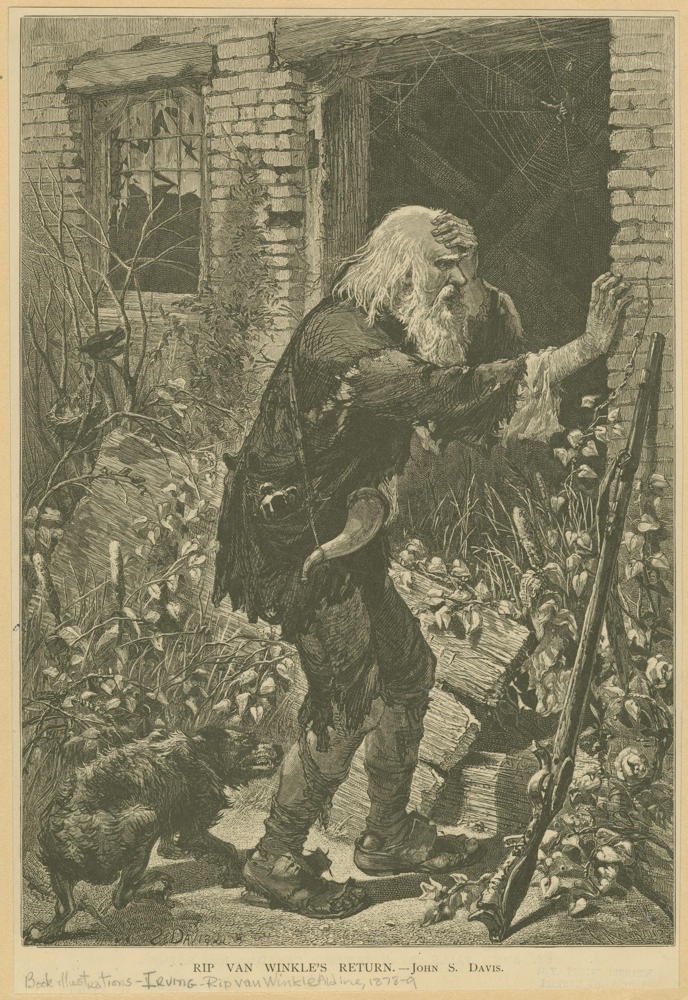
John Steeple Davis: Rip Van Winkle's return. (1879)
Charles Maurand, Wood Engraver
"We returned sequestered and suspicious if we ever returned at all."
At some point after we'd relocated to Colorado for what we imagined would be the final part of our Exile, I started believing that we would be Never_Returning from that excursion. Our source had by that time changed too much for me to believe that we might find enough recognizable remnants of our former existence to believably argue that we'd returned, for time and passing circumstance had already pulled that rug out from underneath us by then. I didn't necessarily view this realization as tragic, for it seemed simply inarguable. We had once imagined we would one day return. Then we came to understand that returning might have never been in the cards, that the plane within which our return might manifest might have evaporated like a wave function upon the moment of our exit. Only constancy of perception could have ever argued otherwise. That constancy almost always proves to be little more than an illusion, albeit reassuring, until it isn't any longer.
If I'd been baited and switched, I had baited myself.
Explorers

Oskar Schlemmer:
Three Figures with Furniture-like Forms
[Drei Figuren mit Möbelformen] (1929)
"That wanderlust has largely left us since we returned from Exile."
Exploring became one sure way to distract ourselves from often depressing realities after being Exiled. We could go discover something. Though earlier explorers had already discovered every possible thing, our surroundings were new to us; strange customs always surrounded us. We were looking for roads less traveled since traffic seemed to be the most significant barrier to going anywhere. We learned when to avoid the freeways and when they might be okay. We'd often chart a course around the most direct route since they frequently proved to be the most significant hassle. If everyone's discovered a shortcut, it takes longer. We ached to discover our own secret passages.
We kept our navigating systems offline when Exploring because we didn't want The Cloud to learn and then advertise our secret shortcuts to anybody else.
SnappingBack
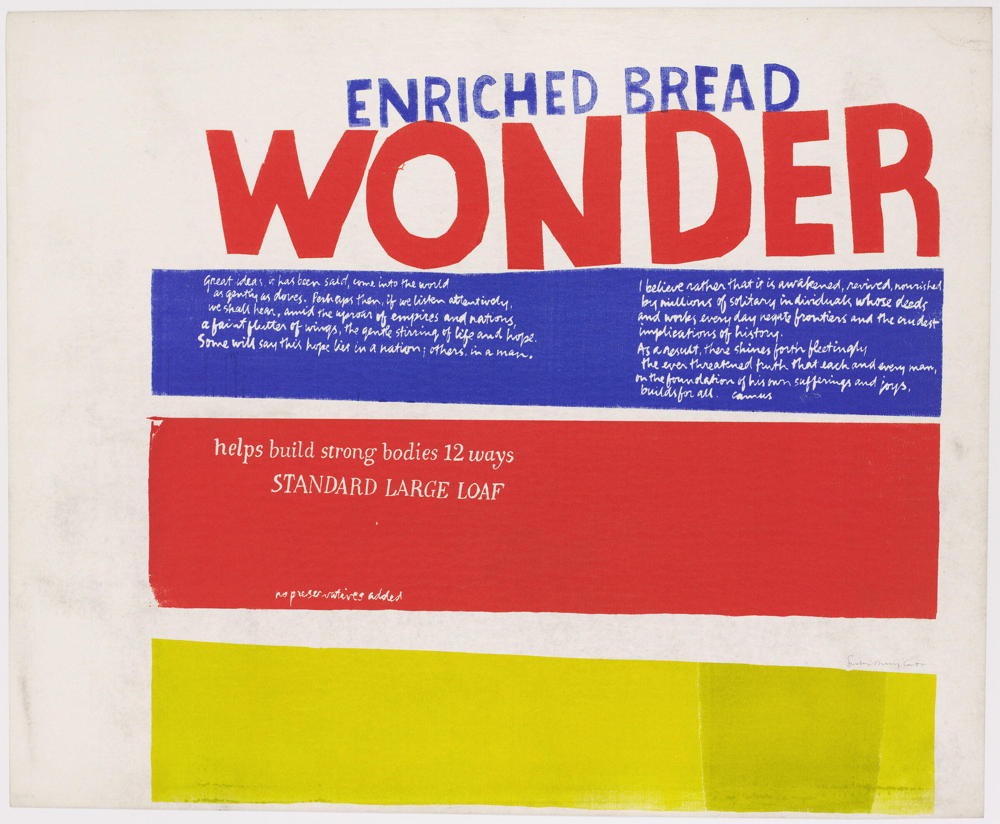
Corita Kent (Sister Mary Corita): enriched bread (1965)
Inscriptions and Marks:
Signed: l.r., in black ink (ball point): Sister Mary Corita
Inscription: ENRICHED BREAD / WONDER / Great ideas, it has been said, come into the world as gently as doves. Perhaps then, if we listen attentively, we shall hear, amid the uproar of empires and nations, a faint flutter of wings, the gentle stirring of life and hope. Some will say this hope lies in a nation; others in a man. I believe rather that it is awakened, revived, nourished by millions of solitary individuals whose deeds and works everyday negate frontiers and the crudest implications of history. As a result, there shines forth fleetingly the ever threatened truth that each and every man, on the foundation of his own sufferings and joys, builds for all. Camus / Help build strong bodies 12 ways sTANDARD LARGE LOAF no preservatives added
Inscription: On verso, l.l.: 65-2
" … still in more or less one piece."
When we were Exiled, losing my DelicateBalance and slipping into LostDays rarely lasted long. We would shortly be SnappingBack into more fully functioning organisms. Just the continually threatening nature of being Exiled sort of insists upon the Exile's full functionality. Days lost cannot turn into lost weeks without increasing the already screaming threat level. We had defenses to handle and offensives to scheme. Exiles do not simply take care of themselves. As with everything, there's always something insisting upon attention, threatening an already tenuous homeostasis. Remember, we had chosen not to be mere renters, so we needed to maintain that all-important owner mentality. We had responsibilities! However powerless or exhausted we might have felt, no excuses could have worked. Like our pioneer ancestors, we'd get back behind the plow mule again, usually by the following morning.
Our discipline doubtless helped us recover after we'd stumble.
LostDays

John F. Peto: Lights of Other Days (1906)
" … a familiar part of our regular repertory."
Lest any reader of these chronicles receive the impression that The Muse and I were exceptionally courageous or virtuous after being Exiled, I must note that we experienced at least our share of LostDays there. Sundays seemed to have presented particular problems for me, for I couldn't seem to settle into any rhythm for them. Separated from my weekday routines and alienated by bizarre local rituals, I often felt like the odd man out on Sundays. Both DC and Denver exuded football madness in season, an attraction I never even wanted to muster. There are rituals that inhabitants of big cities observe that nobody not of those places can ever come to understand. The Sunday morning church bells served to alienate me further there. Our small hamlet outside of Denver featured a mega-church with parishioners in the tens of thousands among its half-dozen affiliated campuses spread along the front range. Whatever might have occurred in their sanctuary, they reliably produced a mega-traffic jam every Sunday at noon. We were wise to head in the other direction.
I mentioned in an earlier installment that shopping seemed to be the entertainment of choice for those living anywhere near shopping centers.
DelicateBalance
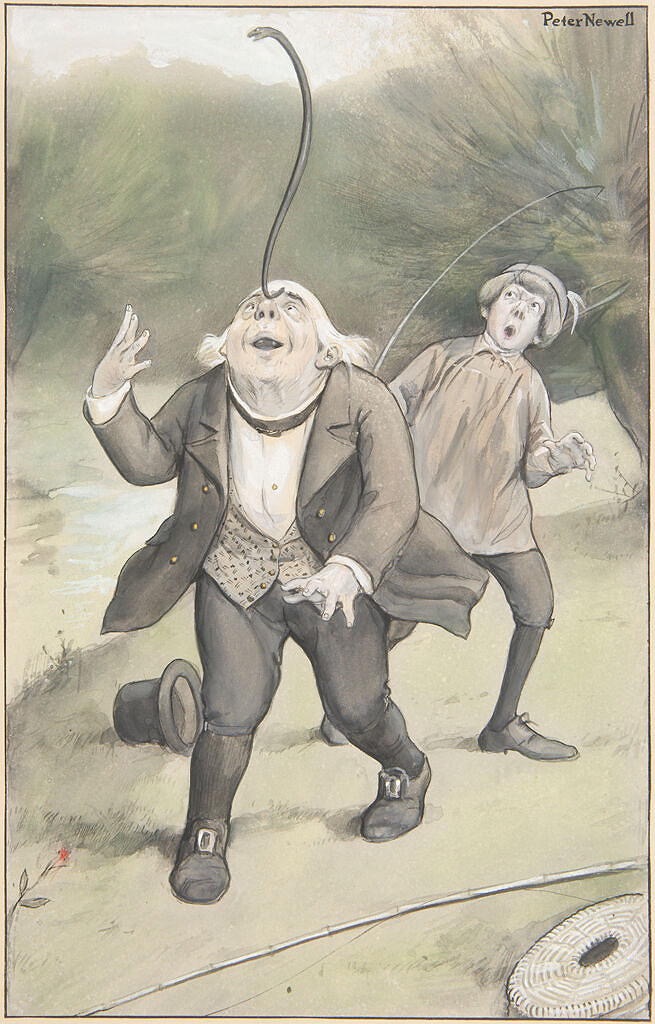
Peter Sheaf Hersey Newell:
Old Father William Balancing an Eel,
from "Alice's Adventures in Wonderland" (c. 1901)
" … whimpering like a wounded puppy."
I live in a DelicateBalance. I never know precisely how delicate my balance might be until some event or experience nudges me off my center. I sometimes seem remarkably robust with the sense that almost nothing could possibly throw me off balance. Other times, I feel precariously poised upon some precipice and likely to take a terrible tumble. Most days, under most conditions, I feel in no danger. I've always been most imperiled by forces I could not see coming. I seldom accurately anticipate the arrival of any unbalancing. These events bushwhack me into becoming their victim. I seem powerless to avoid these, depending upon my allostatic load, a rough measure of the level of burden I'm already compensating for carrying. When that load's been excessive, a feather in the wrong direction can tip me over and pour me out all over the floor.
I don't suppose I carry an unusually high allostatic load.
Weekly Writing Summary For The Week Ending 11/28/2024

Claude Monet: The Petite Creuse River (1889)
The Impending Downfall
My Business Law professor told me back when I was still an undergraduate that if I wanted to predict our political future five or ten years out, I should just keep an eye on British politics. He insisted that the United States parrotted whatever our British cousins did over the prior couple of centuries with a few years' lag. It never seemed to matter whether the British did something brilliant or stupid; we'd be following on their tail. Their Brexit vote, arguably the most foolish political movement in modern history–at least up until the MAGA movement kicked in—took place in 2019, with the catastrophic effects starting immediately. Their government's "conservative" response to the vote's impact proved disastrous, for they began to engage in austerity to manage the immediate effects of choosing to walk away from their previous prosperity. After a few years of that absurdity, with government services worn to less than a nub, their conservative movement in Britain effectively ceased to exist, a victim of their own appalling excesses. We're about five years behind. November 5, 2024, was our Brexit vote, and we narrowly chose to leave our union. We will shortly experience an austerity-induced recession, which could become depression-quality depending on how quickly we smarten up. Our unemployment numbers should soar as qualified workers are serially disqualified from contributing because Congress could never codify the rules for their inclusion. They took five years. Like Britain, we chose to follow lies rather than obvious facts, chasing pasts improved with fictional proofs. Our government, by and for The People, seems set to turn against The People in favor of a regressive austerity that can only wound the weakest while enriching the already wealthy. The comeuppance will come after providing a lesson Britain had already learned and we could not quite learn from yet. Divided, we fall. We can only stand tall when united. I'm grateful for the coming comeuppance if not for the impending downfall.
ThanksGiven
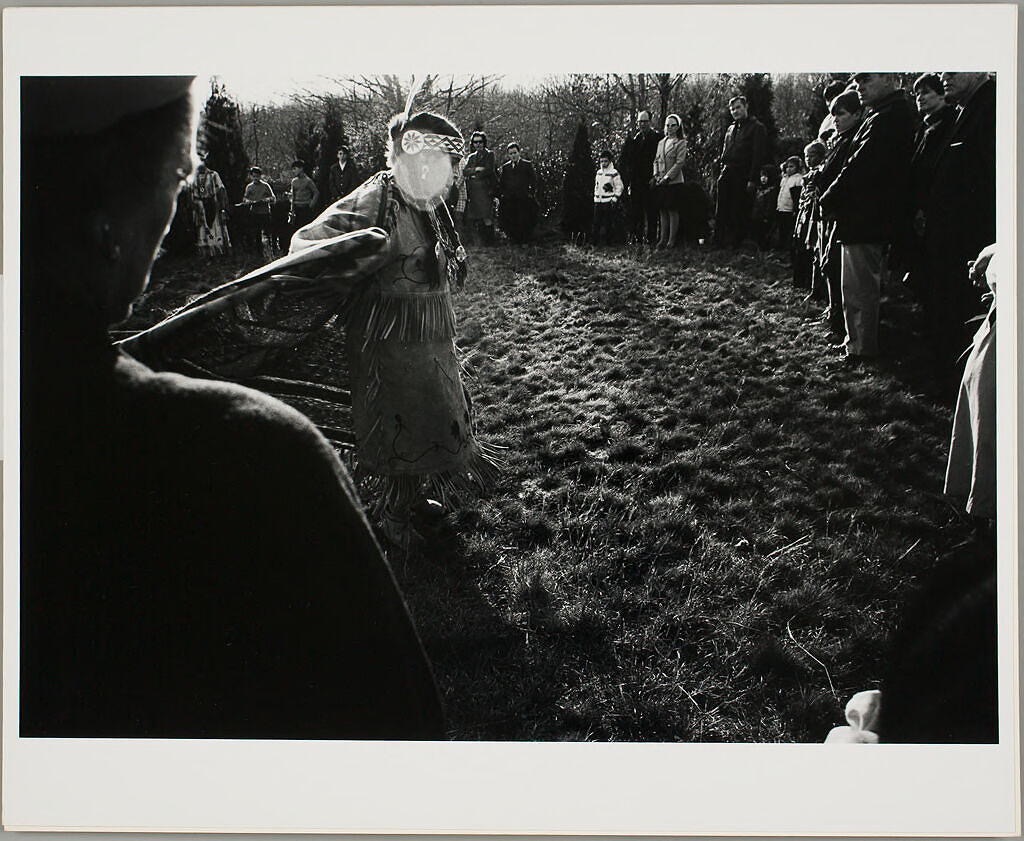
Giuseppe Rosso: Thanksgiving (1968)
" … an experience one cannot choose but for which might feel gratitude later."
I had not understood when, sixty-seven installments ago, I began this Being Exiled chronical. I thought I might be trying to release some trauma by recounting it; a strategy long ago rejected as ineffective by trauma specialists. I had no intention of discovering justifications for gratitude, for had we not been wounded by the experience? Didn't it ding our dignity and leave us wondering about our viability? Of course, it did, but those feelings seem no different from what any random day might deliver. Nothing's strictly one thing or another. We live bittersweet existences, usually more salty and savory than sweetness, anyway. As we age, we grow to favor bitter flavors and think of ourselves as more sophisticated for appreciating them. We find our friends in the most unlikely places and grow to appreciate experiences that might have otherwise just made us bitter.
I might as well feel grateful, for all was not lost.
IdEntity

Julia Margaret Cameron: Julia Jackson (1867)
" … I returned an IdEntity with Ego clearly absent."
After bankruptcy took my professional identity, my ego seemed to recede. I became progressively less and less interested in making something else of myself. For the first time, I stopped striving to become something other than I was. I also lost much of my former curiosity for uncovering who or what I actually might be beneath my cloaking exterior. I became more instinctual as I became less purposeful. I began following my senses. I was never skilled at following maps, so I relied upon a kind of dead reckoning to guide me. I'd imagine the topography, then follow where that notion led me. I often ended up very near where I intended. I sometimes ended up in another county, but neither outcome mattered. I usually had no particular place to be. I held few imperatives. I began thinking of myself as more an observer than a player. What I wanted or needed didn't seem to matter very much after we were Exiled.
My therapist friend Carole first noted my ego's absence.
MissingHistory
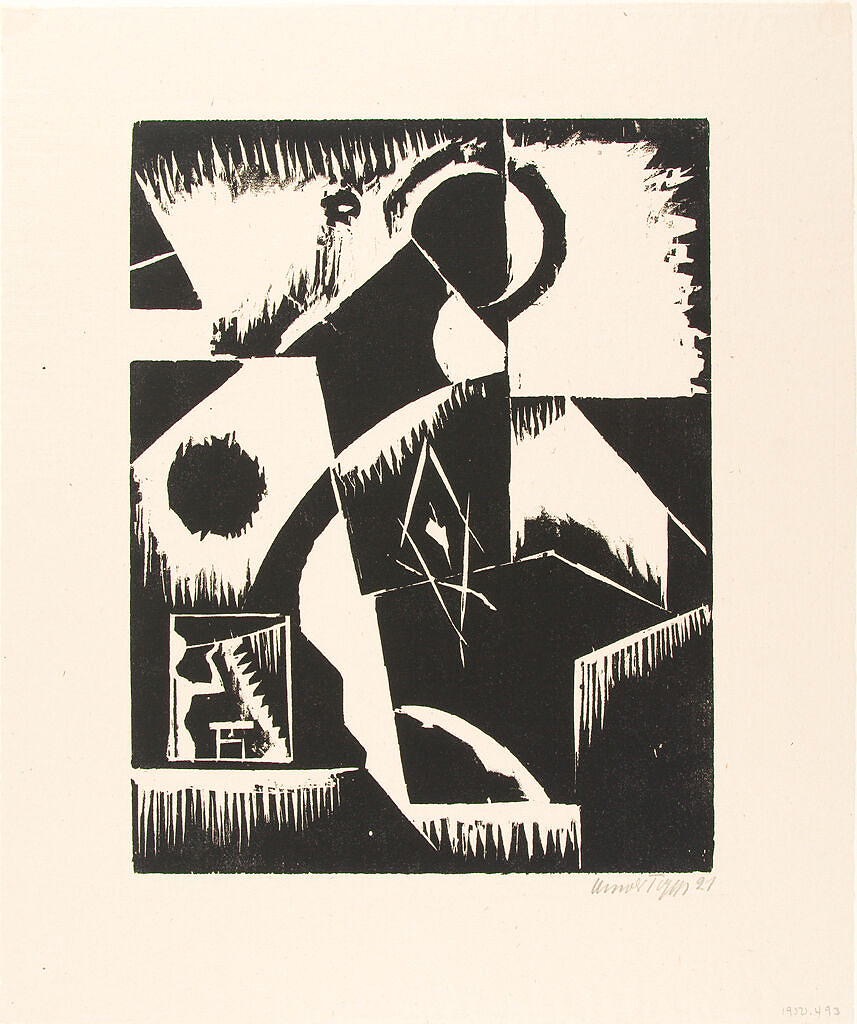
Arnold Topp: Abstract Composition, from the portfolio "New European Graphics, Portfolio III: German Artists"
[Abstrakte Komposition, aus Bauhaus Mappe "Neue Europäische Graphik III: Deutsche Künstler"]
(1921)
"I couldn't hope to become a local while being Exiled there …"
Exiles arrive with little knowledge of the history of the place they're relegated. They remain contextless for a time. In some ways, their initial contextlessness never leaves them, for most of the local history could never have been captured in stories and books but needed living to comprehend. Even the written stories impart little meaning without some understanding of locations. Locations take considerable time to imprint on any newcomer who first tries to get from place to place and can't yet be bothered with history's subtler dimension. Later, an insipient disorientation settles over the Exile, and he seeks resolution. He asks questions, hears stories, and slowly starts comprehending.
Once we'd arrived in Colorado, I'd occasionally meet someone who claimed to have grown up there.
TrackingIn
![]()
Pierre Redouté: Morus rubra = Murier rouge. [Red Mulberry] (1801 - 1819)
"We couldn't help but TrackIn some of what we'd acquired … ."
The house I grew up in featured a Mulberry tree in the backyard. It grew over the clothesline, resulting in some interesting sheets reminiscent of Batik in season. Us kids would climb high to reach the ripe fruit, TrackingIn bright purple footprints across my mother's kitchen floor. Ever since then, I can't help but imagine myself TrackingIn whatever I've just been walking through. This time of year (late November), I notice my Muck shoes carrying smashed Dogwood berries in their treads. Last night, while The Muse and I were preparing supper, I noticed we were listening to The Big Broadcast, a Sunday night tradition broadcast on Washington, DC's NPR station, WAMU. This show replays radio dramas from the heydays, and it, along with Hot Jazz Saturday Night, became a habit when we were living in Exile in Takoma Park. We continued listening when we relocated our Exile to Colorado and still tune in sometimes now that we've returned home.
Nobody returns unchanged from any Exile.
ElbowRoom

Eugène Delacroix: Standing Lion (1833)
" … lest I become a traitor to my home."
I continued my Discrediting efforts for the duration of our Exile. I wanted to avoid becoming 'of' Colorado, for that would violate my relationship with my true home, the one from which The Muse and I were then Exiled. I tolerated no mixed emotions; even when I found some aspect of our temporary home endearing, I'd find some reason to characterize it as one down from my "real" home. Denver was remarkably easy to characterize so, for it was always a curious major city. It didn't look the least bit pretty, though the views could be fantastic. It grew according to nobody's master plan, being one of those railroad towns that got out of hand. It grew by booms and busts, upward and outward when the times were good, and then down and out when the booms went bust. All the booms eventually went bust except for the population one. A confusion of brick buildings were torn down in the fifties and sixties in the unlikely belief that skyscrapers would replace the resulting naked parcels. The naked parcels remain today and serve as eyesores and parking lots, some with unlikely single-story suburban buildings littering urban views.
Had the place been Vienna or Rome, I would have extended the same treatment, for I was in the business of ego defense.
Discrediting

Edward Donovan: Anchovy, Clupea encrasicolus (1804)
" … not a single deli in all of Denver could hold even a small candle [to the one I left behind.]"
Under the Absence Makes The Heart Grow Fonder Clause of the Exile's Charter, I set about hazing our new location shortly after we arrived. I've noticed that I do this by attempting to discredit the new place by demonstrating how different it is from the old familiar one. As with anywhere, living there accustoms one to certain readily available items. For instance, people living near the ocean grow accustomed to eating only the freshest fish. Move one of them inland, and you'll likely hear no end of complaining at first about how much better the fish were when they lived at the beach. There will be no slight hint of derision embedded within these complaints. Perhaps they're protecting or promoting their ego. The net effect of these grumbles reduces the validity of the newer place. I'm uncertain why this is so often the case.
I felt the lack of Italian delis almost as soon as we landed in Colorado.
Weekly Writing Summary For The Week Ending 11/21/2024
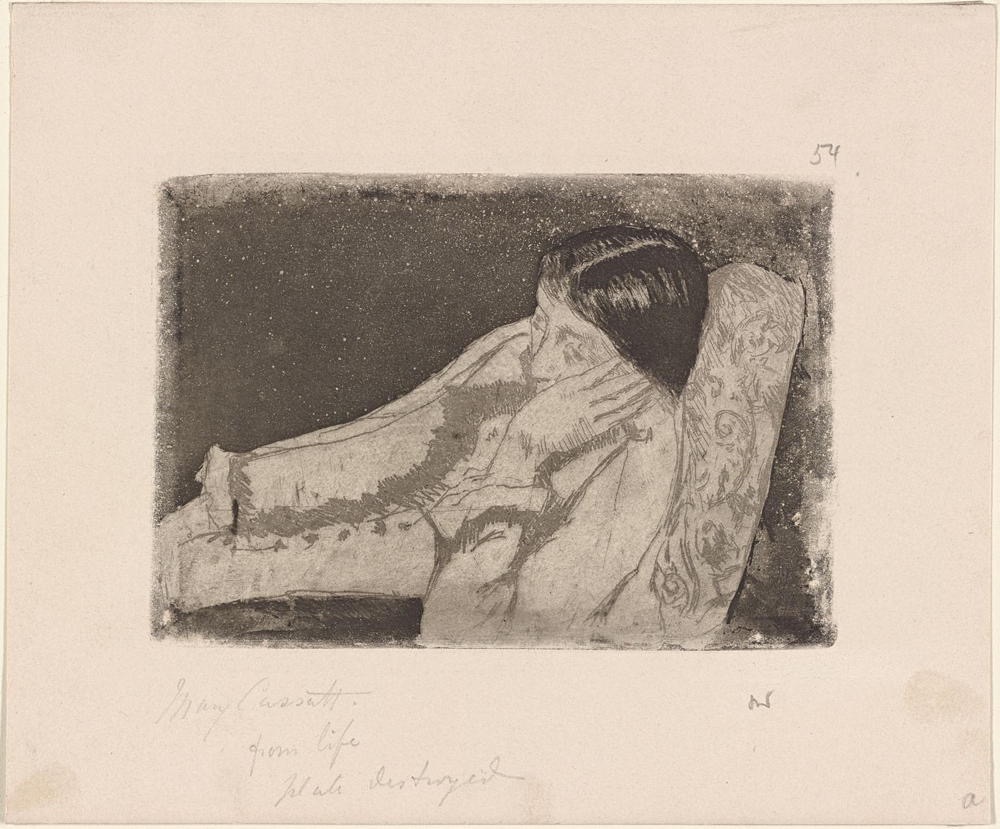
Mary Cassatt: Meditation (1883)
You Were A Gem
My first wife's mother, Nancy, my first mother-in-law and kids' grandma, died this week, aged ninety-six. Her mother, "Grandma Nelly," had lived into her nineties before her, just like most purebred Norwegian women do. She was an educator and a former Dean of both Seattle Central Community College and Chemekita Community College in Salem, OR. She profoundly influenced me, her son-in-law, who had been designated Not College Material in high school. She encouraged me to continue my education after I'd been out of high school for seven years. She gave me a book that showed me what my working-class upbringing had never known. It explained which clothes fit what conditions, when to wear a brown suit and what to wear with it, and how to comport myself in business, stuff my business school studies never covered. I learned to dress at a price point above my station and to shop the all-essential menswear sales. Her master's degree was in home economics, and her PhD was in education. She was a whiz in the kitchen and could paint, hang wallpaper, and sew with the best of them. She finally convinced her caregivers to stop trying so hard to prolong her life. She told them this dying stuff was boring, like watching paint dry. She died like she'd always lived, on her own terms. Rest In Peace, Nancy. You were a gem!
AWriter_(4)

Lambert Antoine Claessens,
After Rembrandt Harmensz. van Rijn:
Philosopher, Meditating (18th-19th century)
" … evidence that I'm at least still trying to make some difference."
I recently realized that this year, 2024, I have been meditating twice daily for fifty years, with very few instances where I could not maintain this pattern. I have yet to give up on the promise the practice held, and while it promises nothing explicit, the implicit benefits continue to attract my almost undivided attention. Initially, the promoters of the practice promised no end to the benefits. They described it as a backdoor route to everything from perfect health to increased intelligence. Some of the devotees went on to carry their originating metaphor out of all reasonableness, claiming they could break some of the otherwise immutable laws of physics. I never held much interest in violating otherwise immutable laws of physics, so my practice has encompassed much more modest objectives, like no explicit objectives at all.
I firmly believe that it's beneficial for me to engage in something diligently, so fervently that I will not shirk even such a trumped-up obligation as meditation.
AWriter_(3)

Edouard Vuillard: Album Cover for Landscapes and Interiors (1899)
"I became AWriter by typing with my two-and-a-half typing fingers: Another Summer."
The Muse recalls always thinking of me as AWriter because I always seemed to be writing, but I had not gained the discipline being AWriter requires. She says she thought I'd become a consultant to collect material, and she might be right. To my mind, AWriter, a real one, writes. Their writing can't be contingent upon how they feel or whether they're inspired unless they trade in mere transcription. I once believed writing required inspiration or some other high-minded situation to express itself. That became a self-defeating belief because it often dissuaded me from writing. It generated excuses instead. Whatever else might be the case, a straightforward fact underlies the whole writing business: Writers Write. It's just as simple and certainly no more complicated than that.
That said, though, it must matter what AWriter writes.
AWriter_(2)

John La Farge: The Dawn [Former Title: Dawn on the Edge of Night] (1899)
" … before I could properly proclaim myself AWriter."
When my soul brother died of ALS, I became the apparent heir to replace him as the author's representative on our mutual publisher's board of directors. This nomination boosted my sense of legitimacy as an author, if not necessarily as a writer. It was unusual in the publishing industry for an author's representative, let alone an actual author, to serve on a publishing company's board. Other board members included a bookshop owner, a diversity and inclusion expert, also an author, and a woman who worked for a prominent author's company, so it was more than just me there representing author interests. The assignment confused me since its details had little to do with what interested me. I was never that into balance sheets, but the responsibilities leaned more toward encouraging a coherence between the firm's philosophy and its operations. That purpose was right up my alley. I even felt hesitantly competent to serve.
The firm's CEO took to coaching me through a book idea I'd been harboring but hadn't managed to get flying.
AWriter_(1)

Jan Ekels II: A Writer Trimming his Pen (1784)
"I wasn't quite a writer yet …"
I discovered that I'd become a writer while in Exile. This discovery took a while, for I needed to work through the usual stages of acceptance to make it. I had already become an author by the time I made this discovery, and though I'd been writing for decades, this discovery shocked me. I had previously considered myself a wannabe writer with the aspiration but without the necessary certifications. I didn't yet understand just how one became a writer. I just knew that I hadn't become one until then, I had. The final transformation came in a moment of begrudging and beligerate acceptance, an "alright, then, dammit" moment that finally quieted the roiling questioning and controversy forever. Before, I wasn't. After, I really was.
This discovery resolved nothing but the lingering background uncertainty anybody might hold about any aspiration.
TheLight
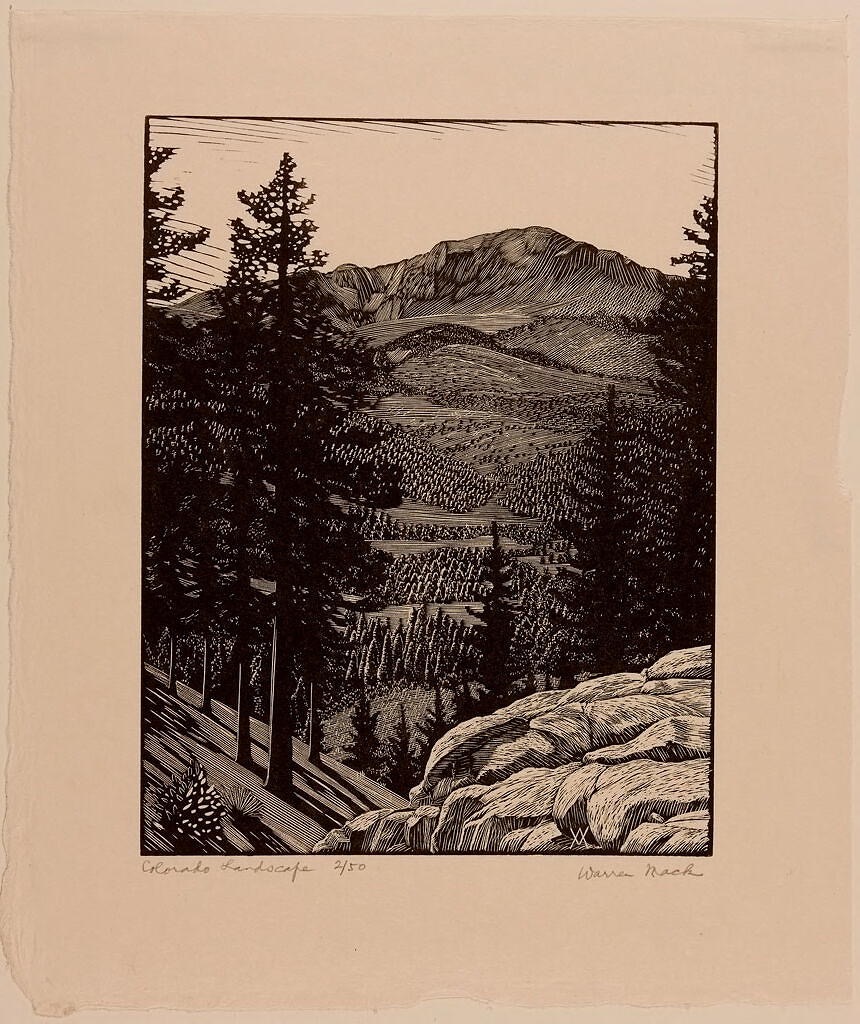
Warren Mack: Colorado Landscape (First half, 20th Century)
"The last half of our Exile would surely cast lasting shadows."
Before we left Takoma Park and The East, I would tune into television serials set in The West to vicariously experience TheLight. The atmosphere in the East becomes heavier. It seems to blot out much of light's native intensity. A few Spring and Autumn days might approach the everyday clarity of TheLight in The West, but in Colorado, every day features blinding brilliance. I noticed that difference first. I'd rise early to write on the East-facing concrete pad porch of our Barbie and Ken transitional apartment to watch the sun rise out of Kansas to bathe the bluffs and plains in its purity. At better than a mile high, the air's thin, so the sun slips right in. Sunglasses were never optional there. I wore long sleeves and havelocks to avoid melanomas.
I watched for that returning sun every morning The Muse and I lived there.
Suburbia
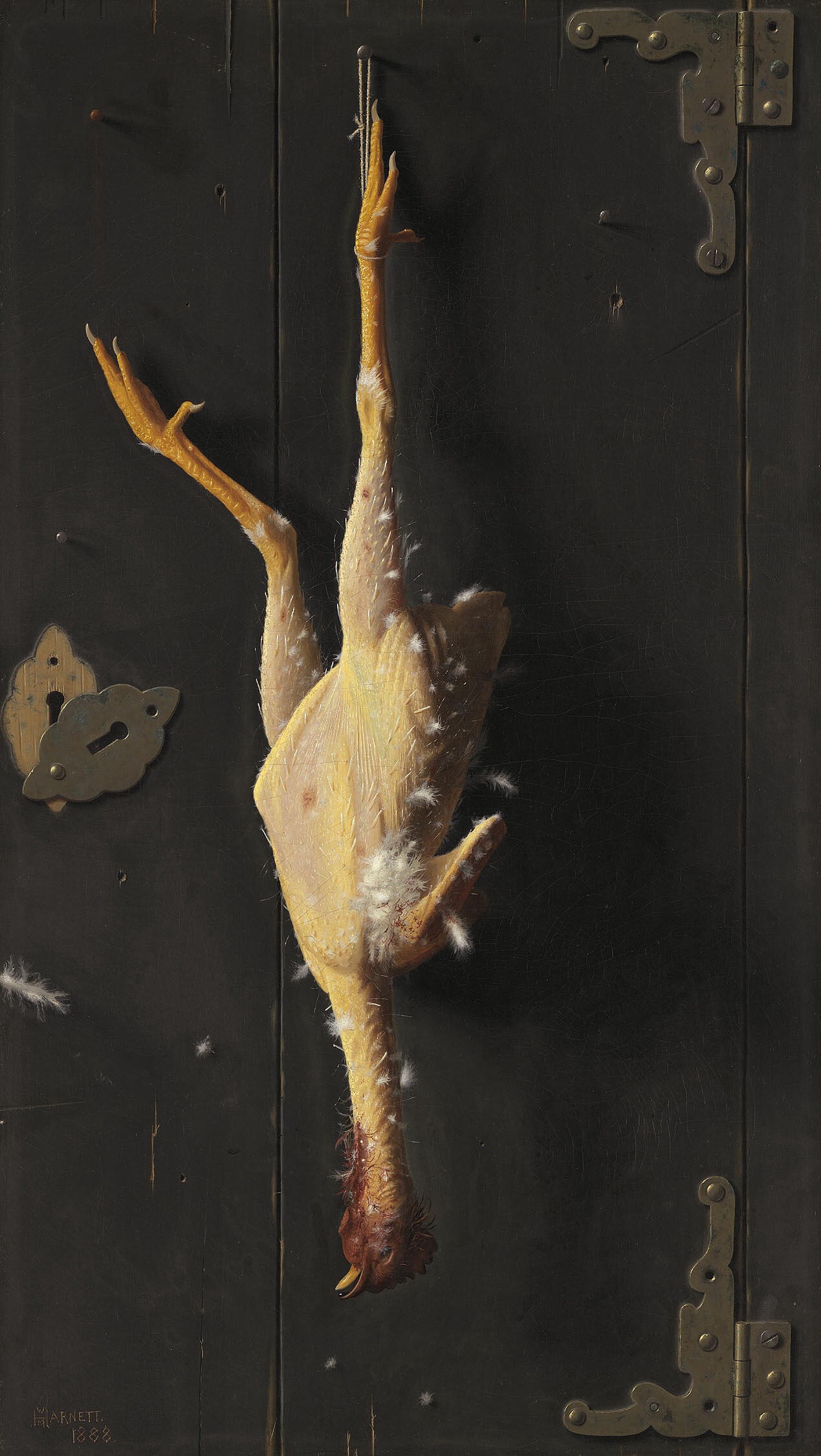
William Michael Harnett: For Sunday’s Dinner (1888)
"I said I thought I might be able to live there …"
Though I was raised in the fifties and sixties, I came of age without developing an appreciation for the modern American suburb. We lived in a turn-of-the-century castle, compared to the concrete slab construction passed off as Mid-Century Modern. I disliked the gently curving streets inevitably leading into cul-de-sacs in which those places tended to be built. The streets typically sported what I labeled Tourquise Names, with hyphenations stolen from far-away places, describing nothing similar to the local topography. Mar-a-Lago Lane overlooking high desert terrain. Their cookie-cutter sameness and visual blandness, with each place identical to its next-door neighbors, disturbed something wild within me. I'd always dreaded ending up in some Suburbia somewhere.
Exiles exist to expose us to our worst-case scenarios.
Weekly Writing Summary For The Week Ending 11/14/2024
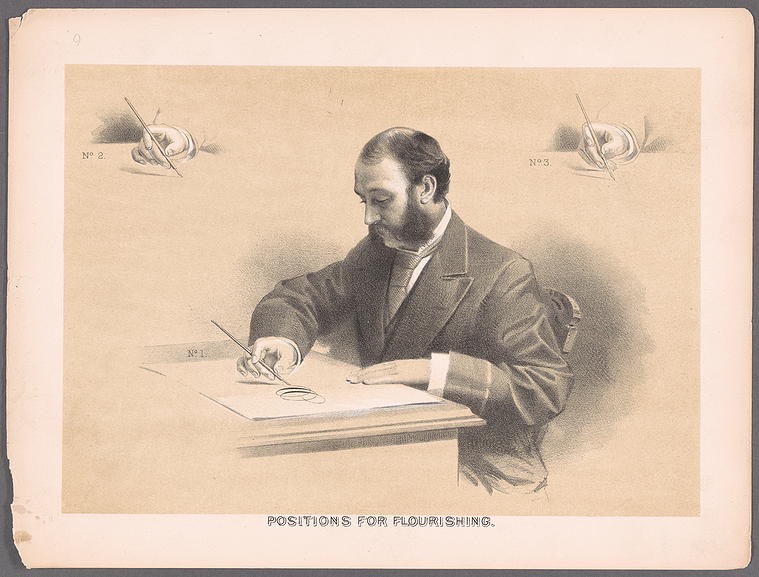
Archibald McLees, Engraver: New Spencerian compendium of penmanship, Part 2 (1879)
We Can Be Certain Now
When I began writing this series, I couldn't have known we would experience something like another Exile together when I was halfway through creating it. Exiles might be much more common than I had earlier appreciated. I had innocently figured that most people never experience that sort of trauma, and it was consequently a rare sort of event. I recognize familiar tells when surveying my friends and colleagues' reactions since the recent election. We're all Exiles now, seemingly kidnapped against our will and forced to cope with conditions we'd hoped we'd never have to face. Our faith has already been wounded, and we anticipate it will get worse, much worse. We're heartbroken, and we damned well should be. What's coming still seems utterly unnecessary. We seriously believed that we were better than this. It sure seemed like we used to be. These feelings provide the context within which Exiles have always existed. The sense of unfairness never completely relents. It would be unreasonable for me not to doubt my ability to cope with the upcoming insults. Must we exist on platitudes now? We were formerly engaged in serious business. We're forced to struggle to barely achieve survival, and even that's in question now. All Exiles start the same, with their end in question. Every Exile ends differently; of this, alone, We Can Be Certain Now.
VenueChange
She wrangled a transfer to her lab's home office in Colorado, where real estate seemed more affordable. Slip over here for more ...
Visitors

Isaac Israels: Two Donkeys (1897 - 1901)
Gallery Notes:
Scheveningen’s donkeys were not just entertainment for seaside visitors; Israels made grateful use of them in his paintings. He portrayed them a few times, either with children riding or a boy leading, or as here, waiting for the next ride. Their keeper lies in the foreground, on the sand.
"I remember we'd once been Exiled before our Visitors found us home."
Visitors transformed our Exile. On our first days there, two old friends just happened to be passing through the area to visit relatives, and we spent two days easing into that terribly unfamiliar place together. It seemed much less foreboding with them there to distract us into entertaining. Something about visitors brings the host out in us. We might not usually take ourselves out to dinner, but when we have Visitors, we're much more likely to consent to the splurge and even try to find the best. I become tour guide-y, even when I'm unfamiliar with the territory. I have an almost uncanny ability to find interesting places, and our Visitors almost always appreciate my efforts. We wouldn't have visited half the tourist traps in DC had Visitors' presence not quietly goaded us into agreeing to go.
The GrandOtter was our most frequent Visitor after we were Exiled.
Just_Visiting

Philippe Pigouchet: Visitation, from Book of Hours (15th Century)
" Who would greet us when we returned?"
During Exile, The Muse and I were able to infrequently return to the scene of our banishment to visit family and friends. We learned early in our Exile that holidays were lousy times to visit since people already had their traditions, and the last thing they needed was some fifth-wheel visitors messing up their rhythms. Also, we ached to visit ordinary times rather than during celebrations when people might be on their best or worst behavior. The one visit we made over Christmas, early in our Exile, proved disastrous. We never attempted a repeat performance.
I usually managed to make it back for my grandson Roman's birthday, even though it was in February.
DaGoils
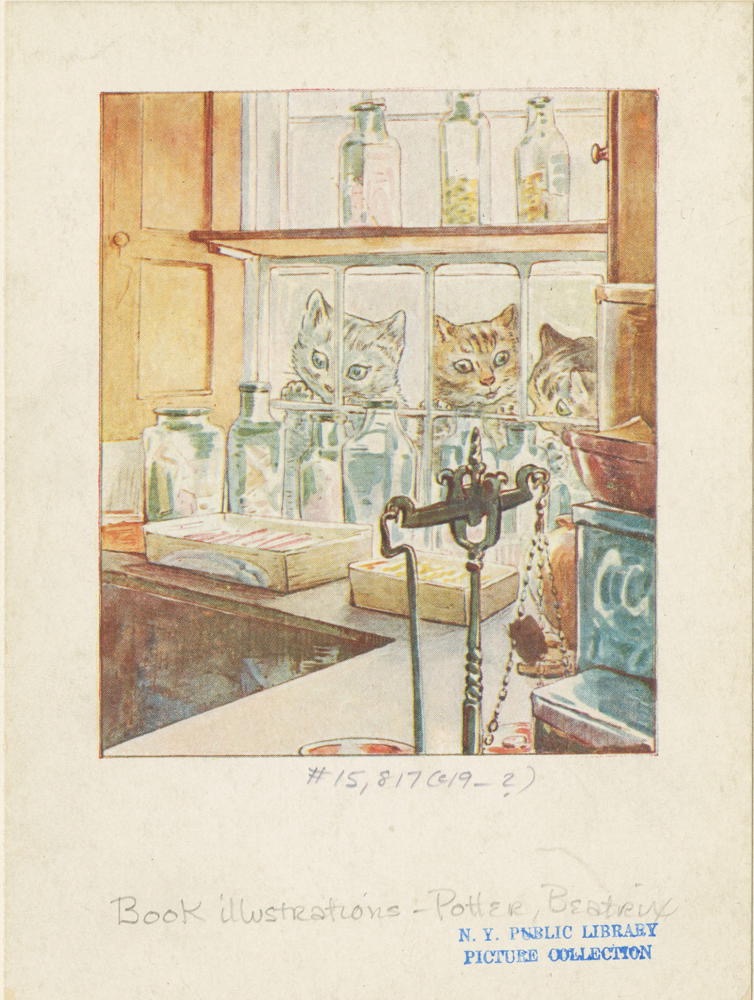
Beatrix Potter: Cats in the Window (1909)
" … those fading days may never go away."
Before I move these stories away from Takoma Park, I must recount one of the most fulfilling activities I engaged in there. Our Sherman Street neighbor and benefactor Clair had been involved with a group that cared for the town's many feral cat colonies. He recruited me to take a turn. Rather than try to domesticate these critters, these people trapped and neutered them, then returned them to the wild, returning daily to feed them forever. Each volunteer agreed to feed a certain number of cat colonies for specific days each week. I decided to service five drops, four days each week. I was responsible for buying and dropping the food off each designated day.
The colonies lived invisibly.
StatusQuoing
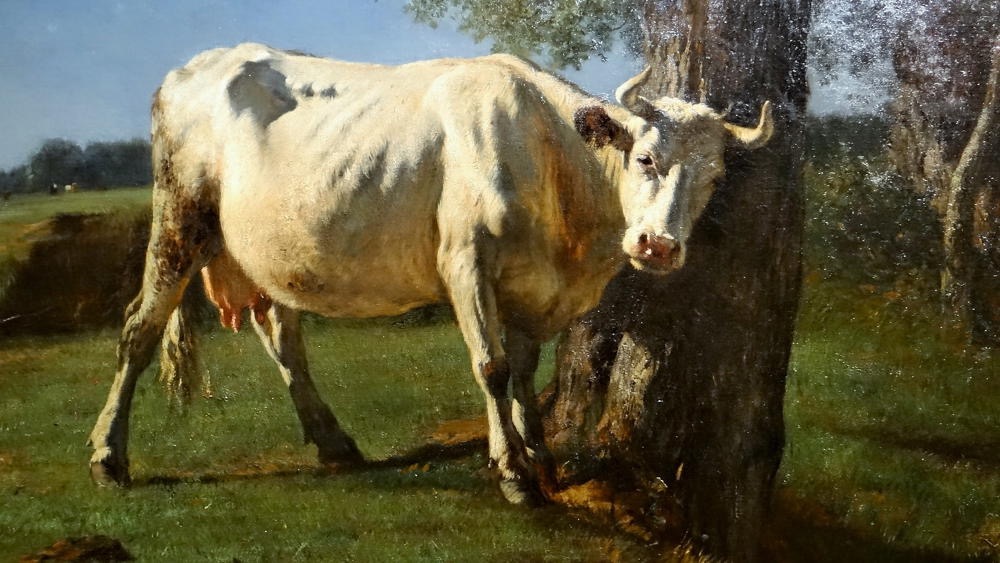
Constant Troyon:
Vache qui se gratte [Scratching Cow] (1858)
"I knew most people only in passing."
Eventually, that second Exile settled into the very soul of domestic tranquility. The Muse's early struggles to adapt to her job's politics settled into her widely acknowledged mastery of that context. She held a job that made a difference and was held in high esteem by her colleagues. I, too, had found a level. The yard in Willow Street offered me opportunities to tend a garden and mow a lawn. That house could have been more reliable. The HVAC repair man and I were on a first-name basis. He confided that the owner had installed the air conditioners upside down and backward. The house was so big, and the climate was so fierce that two air conditioning systems were stacked into the attic. The heating system, too, exhibited problems. We returned from a visit home to learn that the young woman we'd hired to tend cats and plants hadn't noticed that the furnace had failed. We lost about half the house plants, and the basement filled with millipedes. Millions of them. That took some serious cleaning up.
That landlord had hired a management company to watch over his home while it was rented out.
Preservation

Pieter van der Heyden after Pieter Bruegel: Everyman (1556 - 1560)
Gallery Notes: The bearded figure with the lantern represents Everyman during his lifelong search. The legend explains, ‘Everyone searches for himself in various things, all over the world. How can anyone then get lost, when one is always looking for oneself? However, no one knows himself, … Whoever understands this has insight into a great miracle’.
"We live lives of ritual and habit …"
Pieter van der Heyden after Pieter Bruegel: Everyman (1556 - 1560)
Gallery Notes: The bearded figure with the lantern represents Everyman during his lifelong search. The legend explains, ‘Everyone searches for himself in various things, all over the world. How can anyone then get lost, when one is always looking for oneself? However, no one knows himself… Whoever understands this has insight into a great miracle’.
"We live lives of ritual and habit …"
Life continues in remarkably similar aspects even after being Exiled. Conservation and Preservation Laws applicable to physical systems also seem to apply when considering social ones. My rituals and familiar patterns continued trying to replicate themselves even once their originating contexts disappeared. Many attempts seemed absurd, though I rarely considered whether my intentions were reasonable. We were used to taking Sunday toodles when living in our small city, so we attempted to continue the ritual after moving into a big one. It might have taken us half the afternoon to get to what we might consider country, at which point we'd have to turn around to get back home by suppertime. We toodled anyway! In this and a thousand other ways, we preserved our rituals even into Exile.
Before, we'd home-can tomatoes every summer.
Weekly Writing Summary For The Week Ending 11/07/2024
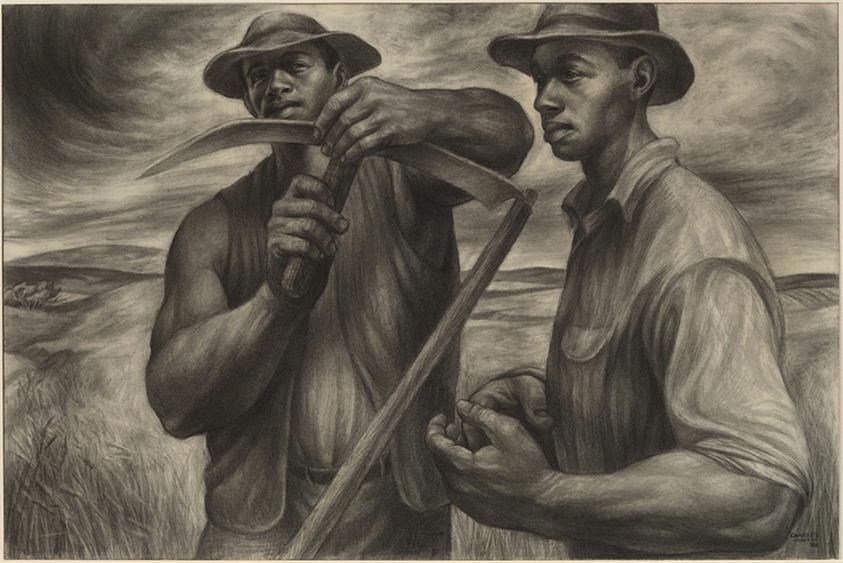
Charles White: Harvest Talk (1953)
Frequent readers might recall that The Muse and I started a project to remodel our front porch in the first week of August. We end the first week of November without a completed remodel, ultimately violating our original worst case by not completing it by Halloween. Halloween found me camped out in front of the blocked-off front porch steps to ensure no goblin fell into our porch deck frame's black hole. I’ve reset my original expectations a half dozen times since we started. Everything I knew about project work informs me that we're executing normally. No project was ever supposed to be completed on the initially expected schedule. Each rightly became an exercise in recovering from the shock and shame of turning out different than initially expected. Project Mastery, a subject in which I once taught well-respected workshops, was always about managing emerging expectations rather than ensuring the originals occurred. No force in the known universe could ever ensure satisfying original expectations and it's at best naive to presume that anyone in this generation could so succeed. No, we're born to experience serial failures and somehow manage to recover from them. The MAGAs will prove to have been every bit as cruel and unreasonable as we expected they would be, and we will prove to be worthy of unexpected opponents. Who will ultimately win depends upon whether one believes in an end to history. I suspect the people to whom I will become the 16th great-grandchild will still wrestle with the same dichotomies. Evil might be just as eternal as good. My job, and your job, must be to stand on the side of good, however seductive evil might seem this time. Thank you for following along!
Tourististan

C. M. Bell: Smithsonian Institute.[still image Stereograph} (1870-79)
" … charge nothing for admission but leave a much more lasting impression."
Neither The Muse nor I had ever lived in such proximity to famous places until we were Exiled to our nation's capital. There, a National Mall holds a collection of monuments and museums that contain something akin to our national heritage. Millions of visitors travel long distances to visit these places. It's a tradition that if you're about to graduate from a high school located anywhere along the Eastern Seaboard, your class will travel by bus to what The Muse and I came to call Tourististan. On any odd summer afternoon, tour busses line The Mall from Fifteenth Street to the foot of Capitol Hill, idling, belching diesel smoke. They disgorge their passengers into swirling crowds of the usual suspects: boys showing off to imaginary girlfriends and preening teen females carrying identical non-functional purses. Add to the mix families pushing strollers filled with kids too young to appreciate anything they might witness. Welcome to Tourististan.
We gave The Mall wagon room and usually went out of our way to avoid the place.
Dislocated

7310 Willow Street, Takoma Park, MD (2012)
"Dislocations do not always prove to be as perilous as they seem."
Three years into our Exile, The Muse and I were Exiled again when our landlord informed us that he would sell the Sherman Street house. He and his wife were relocating back to the States from The Hague and needed the cash out of that house to buy themselves a place in Houston—no hard feelings, nothing personal. We would have put an offer on the place if we had been in any position to purchase it, but we were still recovering from our bankruptcy three years earlier and couldn't quite imagine floating the deal. We'd been juggling finances since we began our Exile. The Muse had contracted with a couple to make a down payment on a rent-to-own arrangement that gave us some cushion, but that deal had fallen apart after less than a year. Those renters had left the place worse for their wear. The Muse's son agreed to move in and help recover from the damage for reduced rent, so we'd been paying premium rent in Takoma Park and subsidizing our original mortgage back home.
The last thing either of us wanted was to go out searching for another place to live.
Self-Determination

Laura Theresa Alma-Tadema: Self-Help (c. 1885)
"When I could no longer believe in who I might become …"
Besides laying open the myth that I could return home for Christmas, my Exile also displaced my inherited faith in the great American Self-Determination Myth. Most Americans of my generation were taught that we could accomplish anything we put our minds to and that any of us could grow up to become President. This might have been an odd offshoot of Jefferson's assertion that all men are created equal, a helpful fiction not necessarily intended to have been interpreted literally. Anyway, like almost everybody, I came of age believing my lot in life, if not at that moment improving, was definitely, if invisibly, trending better. Sure, my current trajectory might seem unpromising, but the magic of Self-Determinism would shortly muster a miracle. I just needed to contribute faith, patience, and persistence.
The thing about belief was always that it conveniently becomes self-sealing.
AwayForHolidays

Lucian and Mary Brown: Untitled [boy with Easter egg] (c. 1950)
" … celebrations exclusively reserved for nuclear families …"
A myth promotes the idea that anyone far away might successfully return home for holidays. I'd attempted to accomplish this end for most of my adult life before being Exiled. Once Exiled, the underlying truth finally sunk in. Before Exile, I grew up and moved away, dutifully returning almost every Christmas and many Thanksgiving holidays. I considered these excursions high points. I'd reclaim my childhood bedroom and introduce my kids to country Christmas traditions, though I might have noticed I no longer belonged there. It had not been my home for years, and my annual return was more nostalgic than substantial. I'd forgotten how to appropriately dress there, and my interests seemed more distant from theirs every year. I sincerely wanted to be everybody's favorite uncle, but nobody ever gets to be an absentee anything. You're either there or not; if you're not almost always there, you've already gone, your annual appearance more ghostly than actual.
Exiled to the odd other coast, returning home for Christmas was mostly out of the question.
PoliticalExile

Emil Orlik: Three Women 1905
" … a much broader connection than I ever could have discovered had I just stayed home."
Our Exile was as much a political act as it was social. Our business went bankrupt in no small part due to the corrupt practices of the George W. Bush administration. The mortgage bubble his supply-sided economic policies promoted ultimately brought down the economy on our shoulders. He'd been doing damage to the high-tech industries our consulting firm relied upon since the very beginning of his very first term. His hasty invasion of Afghanistan, followed by his foolish incursion into Iraq on blatantly false premises, had amplified uncertainty, which is one thing every economy fears. The oughts were fraught with stupid political turbulence. We fled into Exile and the welcoming, reassuring arms of the first term of the Obama administration. Washington, DC, in those days, was a palpably hopeful place. Obama had made viable a hope many had not dared to dream. We relocated to a place very near the center of that renewed enthusiasm.
We had been politically active before being Exiled.
TheInvisibleHusband

Carle Vernet: Hussard Walking in Front of his Horse,
Smoking a Pipe (February 8, 1817)
" … one impossible plan."
It might be true that every Exile serves their time alone. Certainly, The Muse's Exile seemed very different than mine. She would disappear into the Takoma Park Metro Station every morning and return every evening, off to engage in meaningful work and petty politics. She was an increasingly significant presence in her workplace, expanding her role from its initially forgettable status into something with genuine if informal, influence. She was becoming something. I was the one who ensured she got up on time and would often give her a ride to the station. In the six years we lived in Takoma Park, she drove the car to work three times. I regulated her departures and arrivals. Having supper ready when she returned became my primary occupation.
I had rarely had so much alone time.
Weekly Writing Summary For The Week Ending 10/31/2024

Edvard Munch: The Vampire II (1895/1902)
We're Not Going Backward
I have avoided making overt political statements in my stories, and not only because politics tend to render stories less timeless. For instance, I did not write a January 6, 2020 story, though I've never tried to hide my affiliations. Like you, I have always believed Trump was a dumpster fire. He represented what was always reprehensible about Americans stretching back before and including Andrew Jackson’s champions, which included some of my forebears. I might be remiss if I missed this opportunity to acknowledge at least that these Exiled Stories, as well as the preceding Grace and Fambly stories, were all created beneath a pall of the possibility that old Mr. Corruption might get reelected. Now, five days before the election, his reelection seems even more impossible than it appeared eight years ago when we were all blindsided by the most catastrophic election returns in the country's history. Trump didn't disappoint my expectations for an instant of his term. He proved inept and incapable, the very soul of terrible. He's only gotten worse since.
But I come here to praise Harris, not to recount Trump's many shortcomings. If he didn't have shortfalls, he wouldn’t have any falls at all, for he's a singularly unimpressive person, a failure by almost every measure; even his purported wealth appears to have been phony. He still owes money to every venue he rented for his 2020 campaign. This campaign only made that debt worse.
Harris has already accomplished what so recently seemed impossible. She's managed in a few scant months to remind us who we were and who we might become again. The seething foreground her opponent foments was never once a threat unless, and of course, we took that noise seriously. She didn't and hasn't, and in the process of taking her opponent unseriously, she's reminded me of who I intended to be. I had been afraid and needed reassurance. I believe we all needed to see a slim woman stand up to that shameful fatcat and his minions as if they couldn't ever lay a hand on her. They haven't. They couldn't. They can't. They will continue to ineffectively rant, but we're well on to their con.
I feel courageous now, American rather than cowardly courageous, the kind that proudly hails instead of disgracing itself. Harris did the impossible. She reignited a flame that most commentators had insisted might never burn again. I could not have been more delighted to vote for Harris and Walz. I have avoided engaging in the traditional catastrophizing Democrats always engage in every four years. I have at times pretended to feel confident that the American character remained intact, that it had only been napping and would be ready to engage again once awakened. I'm awake now that we're not going backward but forward again. Finally!
Reading

Anonymous: A Man Reading (c. 1660)
"I gratefully retained little but the memory of the pleasure I derived when Reading to survive my exile."
However hostile and unwelcoming DC initially seemed, its libraries warmly embraced me. From the Arlington County library in Ballston, Virginia, and on to Takoma Park's little city library and Montgomery County, Maryland's Silver Spring branch, I found warm refuge within each. I rushed to the Ballston Branch to find a remarkably bright and well-appointed space when we were still in temporary housing. I marveled at the selections and immediately chose two books that would profoundly influence me and my upcoming transition. James Carse's The Religious Case Against Belief and James Hoopes' False Prophets: The Gurus Who Created Modern Management and Why Their Ideas Are Bad for Business Today. Carse's book reminded me that the purpose of inquiry might never be to find an answer but perhaps to more deeply appreciate the questions. Hoopes' book read like I had written it and reassured me that maybe I wasn't as crazy as I sometimes felt. I also found some CDs by Acoustic Academy. These became the soundtrack for my upcoming successful house search. I devoured those books before rushing back for more.
Those libraries and, more importantly, their books became my refuge while I was Exiled.
Carole

Jack Gould: Untitled (man talking on telephone, looking down) (c. 1950)
"She was my guardian angel …"
Joinings and ChanceEncounters aside, I felt intensely lonely after we were Exiled. I became a resident alien who would never feel entirely at home in my indentured homeland. I'd lost more than my home. My career had imploded with the bankruptcy. I lost my business partner, who had necessarily moved on and into another career so that we might survive. I proved less adaptable. The Republicans had left the economy in another tailspin again, and jobs were scarce, but even if jobs had not been thin, I was uncertain if I would ever prove to be employable again. The segment of society I'd successfully serviced seemed to have evaporated, and I felt every bit the old dog considering new tricks. I had not just been Exiled but obsoleted. None of my formerly familiar employments seemed available. I felt cut loose and sinking.
My writing seemed like something I might successfully fall into again.
ChanceEncounters

Edvard Munch: Encounter in Space
Original Language Title: Møte i verdensrommet
Original Language Title: Begegnung im Weltall
Former Title: Meeting in Space
(1898-1899)
"It’s the purpose to which we are blind that determines what we’ll leave behind."
Meeting Mitzi during that GWU lecture series was just one of the consequential ChanceEncounters I experienced while Exiled. It seemed as though one of the purposes of being Exiled was to stir up the old routine to increase the likelihood of ChanceEncounters occurring. I've long considered them just the sort of magic this world relies upon, for formal channels seem far too narrow to produce sufficiently substantial connections. However much the matchmakers might insist on the importance of formal introductions, informal ones most often suffice. Of course, they lack the sense that anything of substance might be brewing.` They're notoriously easy to miss, even if one's paying close attention. I suspect that a certain inconvenience improves these outcomes. They happen through a fog of annoyance. They happen to us. How fortunate for us and the world when we notice.
The Muse was never fully satisfied that I had not become a hermit while we were Exiled.
Joinings

Unknown Artist: Hurdigurdiano joining in the wedding dance of Signora Fisketti (19th Century)
" … a heretical thought for this formerly heartbroken Exile."
Unknown Artist: Hurdigurdiano joining in the wedding dance of Signora Fisketti (19th Century)
" … a heretical thought for this formerly heartbroken Exile."
I was never much of a joiner. The Muse belongs to a half-dozen societies and study groups. I stay at home to get supper ready for when she returns. If I had been a joiner, I might have found a church to join after we had been exiled. Takoma Park featured several fine churches to choose from, representing all the usual denominations, but I never learned how to select a denomination, and I remain uninterested in doctrine. I "joined" the Library of Congress. The Jefferson Building's Reading Room served as an ample cathedral for me. I could choose my own doctrine there from the most extensive collection of material ever assembled. I could access much of it, too, and even have books delivered to my study shelf. I'd hop the Metro or sometimes ride my bike down to that library, where I'd sit on a hardwood chair every bit as torturous as the worst Pilgrim or Quaker pew. I almost always felt saved when I stood up to leave at the end of the day.
The Muse was dissatisfied, though, with my general get-up-and-go.
Belonging

Cornelis Visscher (II): Abraham verlaat Haran
(Abraham leaves Haran], after Jacopo Bassano (1638 - 1702)
"I could not hope to thrive without holding some deep sense of Belonging …"
Being Exiled disrupted my sense of Belonging. I fled from a place I had been steeped in all my life to a place where I didn't know myself from Adam. So much of anyone's identity seems intrinsically tied to their place, their spot, that prolonged distance from there wears one down. The open-ended prospect of never returning should be more than merely disturbing; it should and did spark a genuine existential crisis for me because I'd lost the defining element of my identity. I could and did navigate our new world as if I were present, but I wasn't. I might have been somebody else, and I could not have told anyone who that somebody else might have been. I arrived and lived initially as a placeholder of myself, hollowed out and thin.
A concerted search for myself ensued and took several forms.
Walking

Gesina ter Borch: Walking Skeleton (c. 1656)
"Better for me to maintain about the speed of a walking horse …"
Exile encouraged The Muse and I to engage in Walking. I believe it's true that urbanites walk more than their suburban or rural counterparts. The suburbs seem predicated upon automobile travel. One must hop in the car to go anywhere there. Even more so, our rural relatives, for everything there lies further than a short walk away. Our Takoma Park place was almost a mile from the Metro station, a comfortable twenty-minute walk. We soon considered it nothing to take that hike. Likewise, we could walk to the food co-op, the farmer's market, the local library and the video store, and even supper. Before we realized it, we had changed our lifestyle. Walking became an integral part of our Exiled days. The house was also within two blocks from about five different bus lines. It became more convenient to hop on the bus and walk than to find and pay for a place to park on the other side, so we walked. We became walkers.
In this respect, if few others, our lives in Exile were vastly improved over how they'd been before.
Credentials
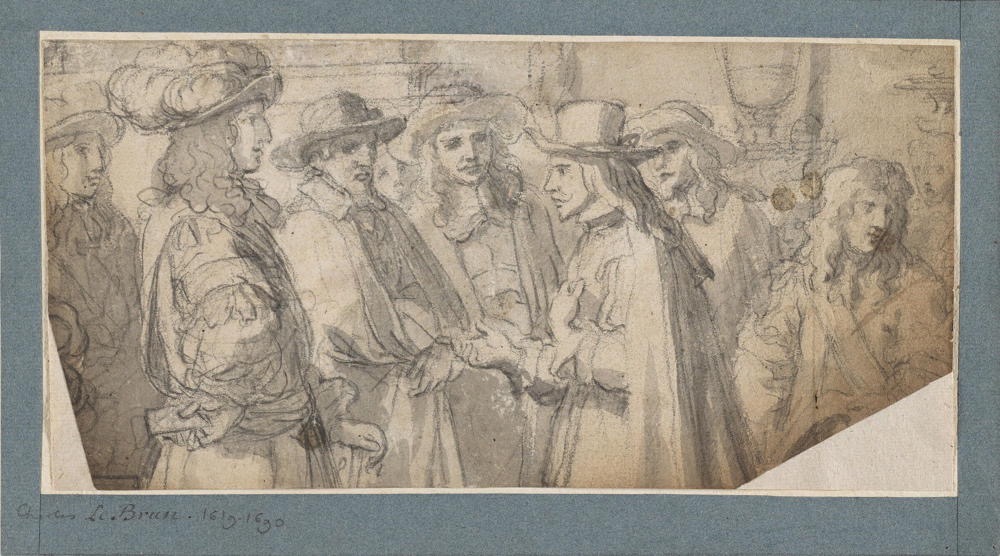
Charles Le Brun: King Louis XIV Receiving Ambassadors from the Court of Spain (c. 1674)
" … just another form of playing the same game …"
No other place in this country was ever even half as formal as Washington, DC. Everybody there seems to carry Credentials, usually on a lanyard around their neck. Those without that lanyard seem mysterious. Perhaps they're visitors? Maybe one of the rare private sector employees? Most work for our government and interact with material deemed secret from somebody. Every lobby features a security checkpoint requiring ID to pass. Office suites require a magnetic card or an escort to enter. Further, business casual has yet to arrive and might never arrive. The men wear suits and ties, and the women wear equally formal attire. Casual Fridays were never observed. People engage exclusively in serious business, much of it mandated by Congress.
The Muse received her credentials after undergoing a thorough FBI background check.
Stranger

Walter Crane: The strangers entertained (1910)
"Avoiding traffic became my occupation …"
I recently had a conversation with one of The Muse’s fellow Port Commissioners. He reported that he had been worrying about an impending move. He and his wife had bought a condo in town into which they would soon relocate. He explained that when he first married, he’d moved out of his parent’s place on the farm and into what had been his grandparent’s house next door. He’d lived there until ten years ago when he built his present house three miles from where he was raised. This condo would be the furthest he’d ever lived from his home place. It was ten miles away, in town. He said he’d never been away for longer than two weeks in his whole life, and he was wondering what might become of him if he couldn’t look up to see the familiar hills or predict the weather by checking what the clouds were doing. He seemed to have been scared of becoming a Stranger. I knew too well how he felt.
Once the movers left, I realized I could no longer consider myself a visitor.
MisRemembering
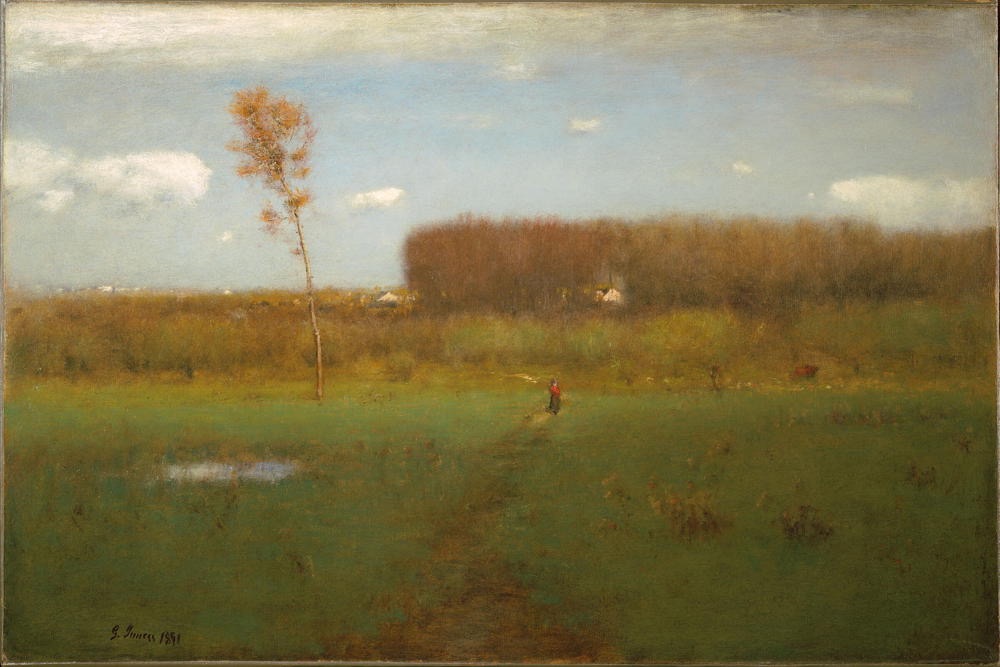
George Inness: October Noon (1891)
Gallery Text
Blurred, softly painted, and almost otherworldly, October Noon differs markedly from the realistic, crisply rendered American landscapes that hang nearby, such as Bierstadt’s magisterial view of the Rockies. Though Inness probably based this scene on the flat, marshy terrain near his New Jersey studio, his image retreats from hard facts and recognizable places to suggest a peaceful, imagined, or dimly remembered landscape. Formally evocative of work from the French Barbizon School, Inness’s quiet paintings found favor among New York patrons overwhelmed by the rumble of the new modern city. As one New York critic put it, “Now and then [Inness] has a picture of perfect peace. . . . It tranquilizes the soul even to look upon it.”
" … a heretic in Rome …"
Creating mémoire inevitably involves some MisRemembering. Dates, places, and sequences aren't always stored in recoverable order, and even short-term memory might prove unreliable. Still, it's a genuine shock whenever I discover that I've gone and done it again, presenting some fiction as representing what actually happened. The Muse usually serves up my undoing, for she has often been a witness or co-participant, and her memory might disagree with mine. Through such disassembly, the story might straighten, leaving me feeling at least temporarily crooked. But MisRemembering's no actual sin. It's more like a part of the price for engaging in remembering, with no way of escaping. The sin lies in the more deliberate DisRemembering, intentionally burnishing the facts, often to enhance the author's reputation. Every writer is probably capable of committing this sin. What matters might be how they respond to being outed.
I MisRemembered key elements of two recent stories, TheMove and SettlingIn.
Weekly Writing Summary For The Week Ending 10/17/2024

Rembrandt van Rijn: Lieven Willemsz van Coppenol,
Writing Master: The Smaller Plate (c. 1658)
Trading In Authentic Impressions
I feel grateful for my unreliable memory. The Muse corrects me at inconvenient times, often after any possibility of properly correcting the record exists. This frustrates me, but it's exasperation of my own making. I can always make amends or attempt to. Even an inadequate explanation might restore some lost credibility if only to reset my listeners’ expectations that I'm not the most reliable source. Gratefully, my stories don't have to be true to be useful. They might accurately represent my lasting impressions even if they materially misrepresent what happened. Time scales shift. Whatever happens becomes different if seen through any rearview mirror. I'm never entirely sure I'm present at any moment, anyway. I'm reasonably confident that I was effectively absent through the first few Exiled months and I still find reason, now that I've returned, to question just how present I ever become. I distract myself partly by reflecting and attempting to remember things. I cannot simultaneously be there and here, though I don't go anywhere different when I'm in reverie, writing. I shift my attention, which doesn't demand that I watch whatever's playing before my eyes. I remain grateful that I'm so easily distracted I possess the genuine superpower to doze off, particularly when in the middle of some traumatic experience, so I never accurately record what happens. I trade in authentic impressions that might or might not necessarily strongly correlate with what actually happened.
Settling_In
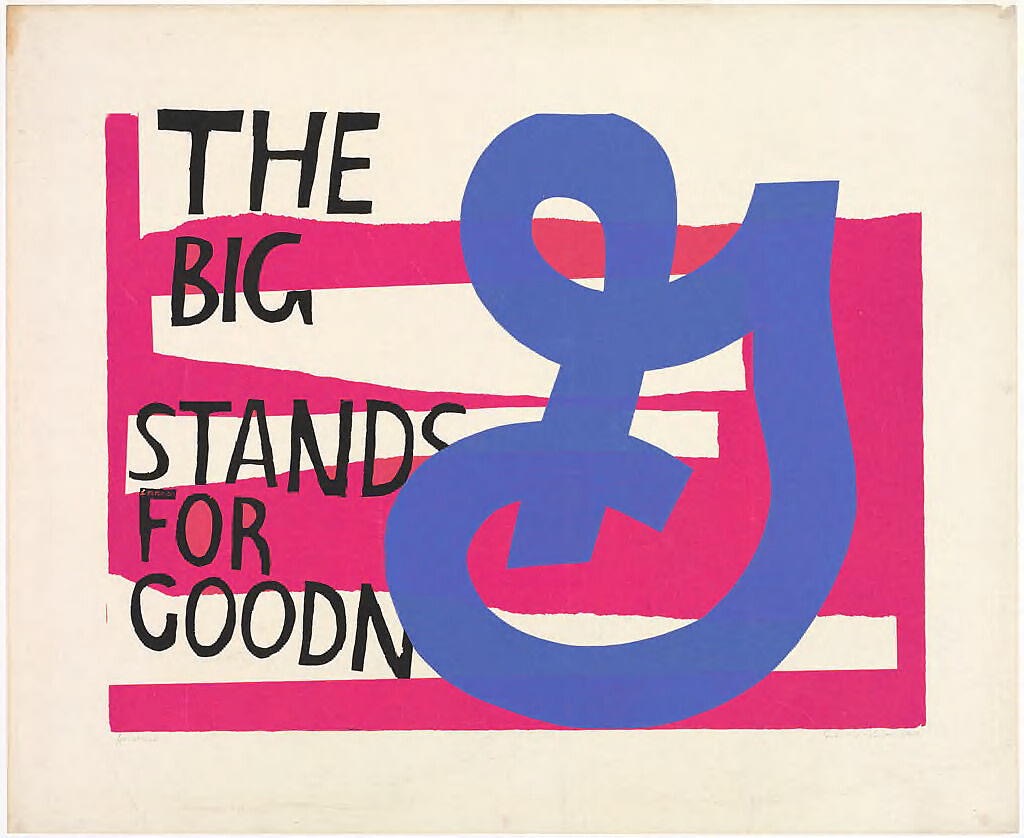
Corita Kent (Sister Mary Corita): for eleanor (1964)
Inscriptions and Marks Signed: l.r.: Sister Mary Corita IHM
(not assigned): Printed text reads: THE BIG G STANDS FOR GOODN[ESS] / 4 Eleanor
" … we could read their deep disappointment at what their future had wrought."
When I was little, on Christmas morning, my siblings and I would sometimes rewrap already-opened presents so we could open them again. July 2, 2009, brought that feeling back into focus for me. After more than three dog months living without our stuff—that having been boxed up, carted off, and stored somewhere until we found a place to live—opening those boxes felt like a ginned-up Christmas. The Muse was overjoyed to be reconnected to her extensive dish collection. That house was the only one we considered that came even close to having enough kitchen cupboard space to contain it. We parked our china cabinet along the one blank kitchen wall to hold the display items.
My office space, a narrow windowed room off the dining room, seemed perfectly dimensioned for my purpose.
TheMove
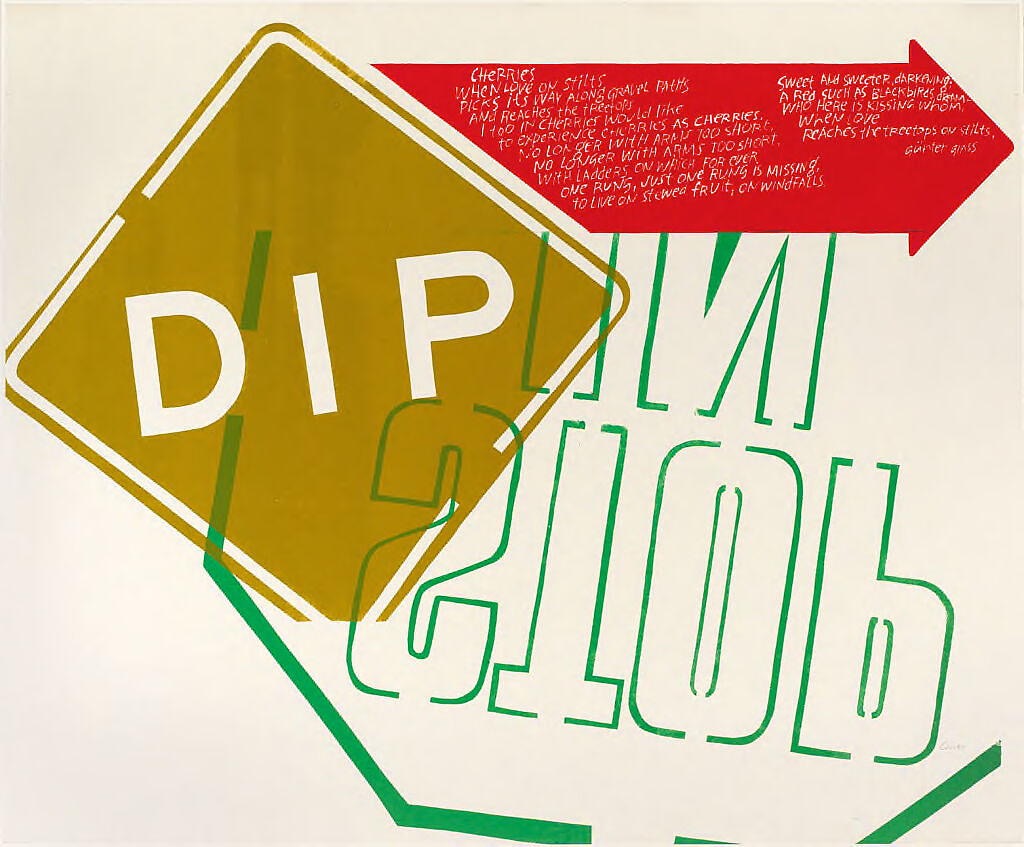
Corita Kent (Sister Mary Corita): dip (1967)
Inscriptions and Marks: Signed: l.r.: Corita
(not assigned): Printed text reads: DIP / IN STOP / Cherries when love on stilts picks its way along gravel paths and reaches the treetops I too in cherries would like to experience cherries as cherries. No longer with arms too short, no longer with arms too short, with ladders on which for ever one rung, just one rung is missing, to live on stewed fruit, on windfalls. Sweet and sweeter, darkening; A red such a blackbirds dream-who here is kissing whom, when love reaches treetops on stilts. Günter Grass
"We would be months getting accustomed to Tacky Park …"
July 1, 2009, would be warm and sticky, hanging in the high seventies into the low eighties. In the unaccustomed humidity, it certainly seemed much warmer to The Muse and I with The GrandOtter beside us, as we packed up our few belongings and the cats and left the temporary housing high-rise for the last time. We were unaccustomed to the drive to the other side of The District, for Rosslyn was just over the Southern border and Takoma Park, hard on the Northeastern edge, eleven miles and nearly an hour's drive. We were to meet up with the movers at the Sherman Street house. This was the day we would finally move in; TheMove was at hand. We'd left home three full months before and overstayed our temporary housing welcome by a month, but we were finally going to land somewhere.
As it does in summer back there, the world smelled musty and damp. I'd already sweated through my clothes by the time we arrived.
Finders

George Walker: Leech finders, Plate 35 (1814)
Engraver: R. & D. Havell
"We mostly avoided going that way."
The transition from seekers to Finders felt abrupt. After weeks of fruitless seeking, we became Finders one early Sunday morning in May. We had almost overstayed our welcome in our temporary housing, for our search had apparently been unusually fruitless. The Muse pleaded for an extension, which was granted, but we were already more than ready to regain access to our stuff and move out of that high-rise. We had taken to cruising our chosen destination on weekends. The Muse with her Blackberry at the ready, refreshing CraigsList postings, so we were around the corner when our new home's listing first appeared. We were there in seconds. The owners had recruited the neighbor to show the place. They'd relocated to The Hague for the wife's job. The neighbor and I turned out to be brothers from different mothers. We instantly hit it off, and he became our champion. We learned later that he called the owners when we left to tell them that the right tenant had just left. He implored them to say "Yes," that they wouldn't ever be sorry for a second. They weren't.
A financial and credential check was still required.
North

Corita Kent (Sister Mary Corita): right (1967)
Inscriptions and Marks — Signed: l.r.: Corita
(not assigned): Printed text reads: [W]RON[G] WAY / Prophets of boom / and if only we arrange our life according to that principle which counsels us that we must always hold to the difficult, then that which now seems to us the most alien will become what we most trust and find most faithful. How should we be able to forget those ancient myths that are at the beginning of all peoples, the myths about dragons that at the last moment turn into princesses; perhaps all the dragons of our lives are princesses who are only waiting to see us once beautiful and brave. Perhaps everything terrible is in its deepest being something that wants help from us. Rilke
" … With our attention finally properly focused …"
To move to Washington, DC, is to confront racism face to face. In many places, the racism seems securely hidden to the point that you'd swear it doesn't exist there, except, perhaps, in that one isolated quarter where African-Americans traditionally settled. In Portland, Oregon, where I spent twenty-nine years of my adult life, the "black" neighborhoods had been developed using an overt discrimination called "redlining." Banks would only loan mortgage money to African Americans in certain areas. When I-5 was created, it was built right through the middle of that designated area, further fragmenting and isolating the neighborhoods there. This practice was hardly unique to Portland, though. Seattle was no better and might well have been worse. The Bay Area in California designated Oakland as their minority area and the East Bay. East Palo Alto was, for years, the South Bay's designated ghetto.
When shopping for neighborhoods, our realtor advised me to avoid certain areas.
Circling
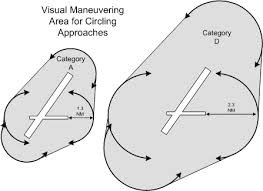
Corita Kent (Sister Mary Corita): tomorrow the stars (1966)
Inscriptions and Marks — Signed: l.r.: Sister Mary Corita (not assigned): Printed text reads: come alive / Tomorrow, the stars
"The East was looking iffy after Cheverly."
I employed a Circling process when searching for a place for us to live. Circling makes it particularly difficult to assess progress because the ending point of a Circling route is always back at the starting point. It often seems as though absolutely no progress has been made, affecting motivation. The only clues that I had been doing anything all day were the fresh marks on the master map denoting identified unsuitable areas. The Circling eventually managed to winnow down what seemed like infinite choices into a more blesséd few. I figured that any day I could disqualify an area had been well spent. I might not have produced any likely candidates, but if I had managed to eliminate territory, I wouldn't have to worry about further canvassing that area.
The elimination began before we started searching when we decided Northern Virginia would be unsuitable for our habitation.
AlmostRandomly
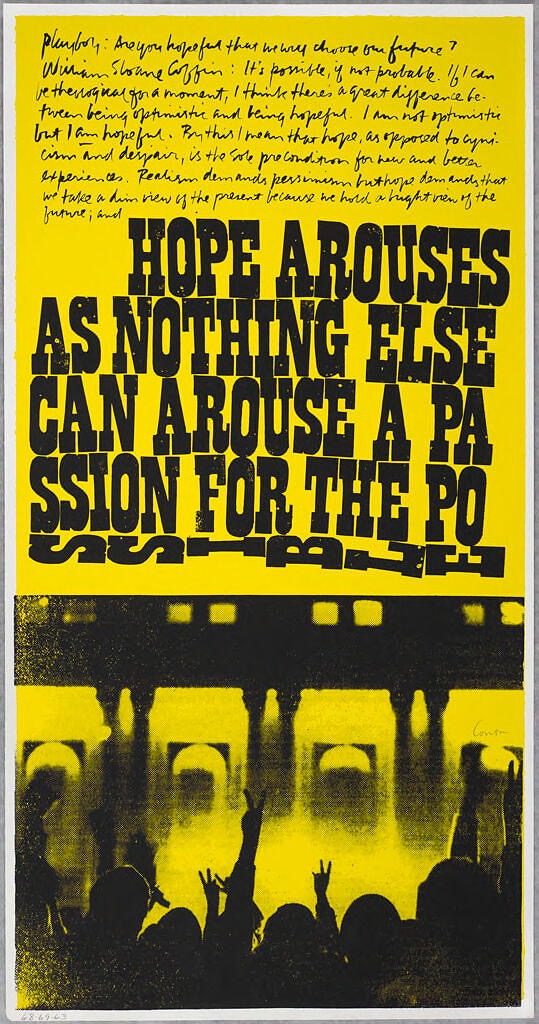
Corita Kent (Sister Mary Corita):
a passion for the possible (1969)
Inscriptions and Marks — Signed: l.r., within image: Corita
inscription: l.l., in graphite: 68-69-63
(not assigned): Printed text reads: Playboy: Are you hopeful that we will choose our future? William Sloane Coffin: It's possible, if not probable. If I can be theological for a moment, I think there's a great difference between being optimistic and being hopeful. I am not optimistic but I am hopeful. By this I mean that hope, as opposed to cynicism and despair, is the sole precondition for new and better experiences. Realism demands pessimism but hope demands that we take a dim view of the present because we hold a bright view of the future; and HOPE AROUSES AS NOTHING ELSE CAN AROUSE A PASSION FOR THE POSSIBLE.
"We continued searching AlmostRandomly …"
Our highest priority upon arriving in Exile became finding suitable digs. The Muse's employer had thoughtfully provided temporary housing through an Oakwood franchise, the sort of housing guaranteed to encourage short tenancy. I'd lived in an Oakwood property when working for a boutique Silicon Valley consulting firm fifteen years earlier. That was a sprawling two-story suburban affair ringing a swimming pool. This latest one was a fifteen-story highrise overlooking a firehouse. The swimming pool was situated out back behind security fencing and a thick hedge. Both were places that reeked of dislocation. I inhabited my Silicon Valley one four nights each week, baffling myself at the supermarket when failing to remember which refrigerator I was stocking. I'd invariably end up with too much and too little of some things because I could never keep my inventories straight. Our Arlington neighborhood of Rosslyn apartment wouldn't offer any such entertainment.
The apartment proved to be a definite downgrade from our usual and customary.
Weekly Writing Summary For The Week Ending 10/10/2024
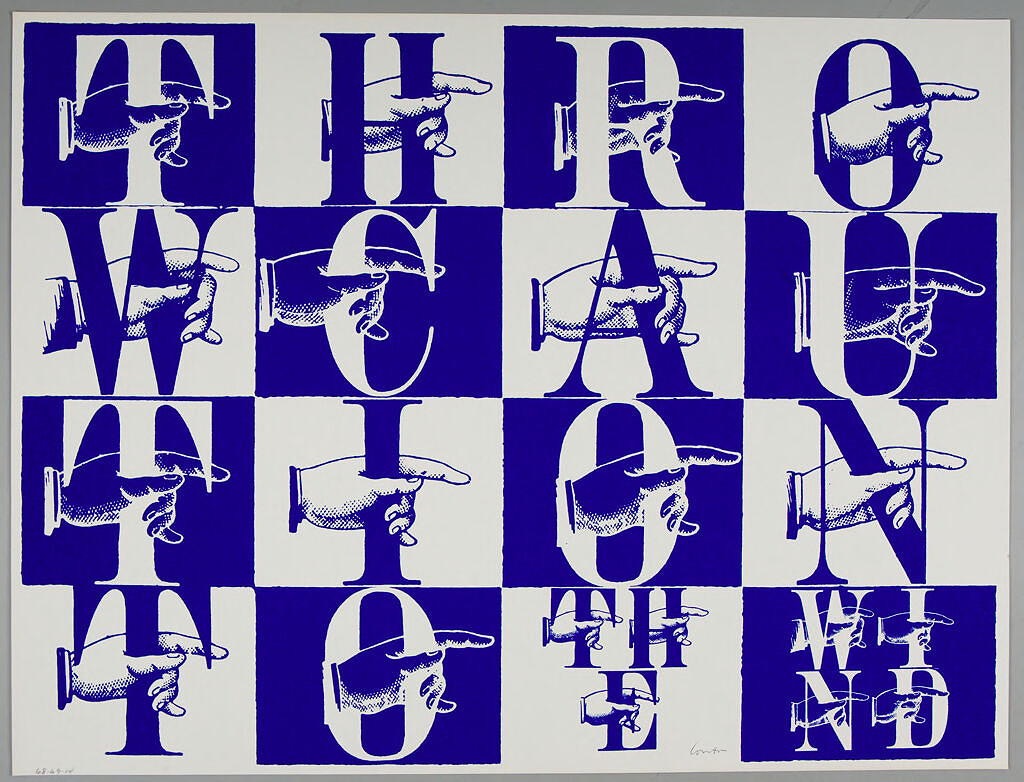
Corita Kent (Sister Mary Corita): n is for caution (1968)
Inscriptions and Marks
Signed: l.r.: Corita
(not assigned): Printed text reads: Throw caution to the wind
inscription: l.l.: 68-69-14
—
My Context Trying To Clue Me In
During an optometrist appointment this week, I was delighted to notice that I could easily read the bottom line on the chart with or without my glasses. My eyesight improved and stabilized after cataract surgeries four or five years ago. Those surgeries marked the end of my middle ages, for it was when prepping for the surgery that my high blood pressure was first acknowledged. I pled that I suffered from White Coat Syndrome, where the presence of a medical professional elevated my blood pressure to alarming levels, but neither The Muse nor the doctors bought my story. The Muse insisted, as only The Muse can insist, that I finally find a personal doctor. I'd successfully avoided having one through my remarkably healthy fifties and well into my sixties, but I complied and began regularly visiting pharmacies shortly after that. My blood pressure returned to normal, and my eyesight improved, so I felt satisfied when my eyes seemed to see so well during that latest examination. Then came the part where I was told to cover one eye and read the chart. My right eye worked fine, but the chart became a complete blur when I covered it to read from my left unassisted. I couldn't even read the largest letters. I spent the better part of a half-hour fussing about my performance before I checked my glasses. The left lens had some severe scratching, obscuring the view. I needed new lenses, not new eyes. How often have I mistaken some shortcoming as defining me when it was just my context trying to clue me in?
Variety

Corita Kent (Sister Mary Corita): morning (1966)
Inscriptions and Marks
Signed: l.r.: Sister Mary Corita
(not assigned): Printed text reads: [tu]r[n] [tu]rn / turn / Morning Sometimes we go on a search and we do not know what we are looking for, until we come again to our beginning In the beginning (in the beginning of time to say the least) there were the compasses: whirling in void their feet traced out beginnings and endings, beginning and end in a single line. Wisdom danced also in circles for these were her kingdom: the sun spun, worlds whirled, the seasons came round, and all things went their rounds: but in the beginning, beginning and end were in one. And in the beginning was love. Love made a sphere: all things grew within it; the sphere then encompassed beginnings and endings, beginning and end. Love had a compass whose whirling dance traced out a sphere of love in the void: in the center thereof rose a fountain. Fields were set for the circus, stars for shows before ever elephant lumbered or tent rose. Robert Lax
—
"I feel nostalgia for those times without wishing to return to them for a minute."
Washington, DC, surprised me. Like most cities, it seemed as if it would be something different than it turned out to be. Like New York City, which is merely a close association of remarkably small neighborhoods, DC is also tiny at its root. It carries much history on its shoulders, but it's not a very complicated place. It is, or always was, a "Chocolate City," one of the few with a genuine African-American majority. It also features one of the more entrenched aristocracies in this country, featuring diplomats and higher-ups to match or better any other place. It has more blue-collar workers than most places but also more white-collar ones. It features more professional administrators than anywhere. Those elected to high office might maintain their offices there, but an invisible cadre of office workers and security personnel manages their affairs. It's the best-guarded city, and nothing happens there without many pairs of eyes witnessing, confirming, and cataloging. It features more Variety than any other ten cities anywhere.
I noticed the Variety of goods sold in supermarkets first.
Shoestrings

Corita Kent (Sister Mary Corita): elephant's q (1968)
Inscriptions and Marks
Signed: l.r.: Corita
(not assigned): Printed text reads: Q / John Dewey says-I'm not quoting his words, (Dr. Felix Adler), but this is what he said, that "no matter how ignorant any person is there is one thing that he knows better than anybody else and that is where the shoes pinch his own feet " and that because it is the individual that knows his own troubles, even if he is not literate or sophisticated in other respects, the idea of democracy as opposed to any conception of aristocracy is that every individual must be consulted in such a way, actively not passively, that he himself becomes part of the process of authority, of the process of social control; that his needs and wants have a chance to be registered in a way where they count in determining social policy.
inscription: l.l.: 68-69-47
" … undifferentiated others certainly originally came from one."
My parents' birth families seemed to the childhood me to be filled with contradictions. There appeared to be a profusion of odd relations: second and third cousins, step- and half-siblings, what my mom referred to as "Shoestring" relatives. Some were actually related by blood or marriage, while others were adopted, the sort of people one might choose, which, of course, one can never do with any blood relative. Most lived far away. We might have seen them once in all my growing-up years, through town for a reunion or funeral, and never to return. Most had legends associated with them. My mom could recite the stories as if she'd written them, though I suppose her mother taught them before she realized she was teaching her anything. Our Shoestrings complete already complicated enough family portraits.
When The Muse and I were Exiled, we could have sworn that we didn't personally know anybody in the entire region into which we were cast.
Escape

Edward Ruscha: Crackers [How to Derive the Maximum Enjoyment from Crackers] (1969)
"My incarceration was also an Escape …"
Being Exiled felt like an assault, an insult to my dignity and reputation. It was also a great gift that I couldn't, for the life of me, perceive at first, for every life is a mix of liberation and sentence. As liberation, it overflows with freedoms. As a sentence, it severely restricts movement. One must always be here rather than there, no matter how one might wish to be there instead. Perhaps a week away on what passes for vacation must serve as the only possibility for distraction. Most of the time, one must contend with the intended and unintended consequences of being themselves. No place seems all that glamorous that sees the same face waking up every morning. Variety might be the spice of life, but most lives are explicitly constructed to inhibit too much variety. They generally promote even more of even more of the same.
So, being Exiled served as an Escape from those patterns.
AShamed

Corita Kent (Sister Mary Corita):
(tame) hummed hopefully to others (1966)
Inscriptions and Marks- Signed: l.r.: Sister Mary Corita
Printed text reads: TAME [IT']S [NO]T / Somebody up there likes us. / A hum came suddenly into his head, which seemed to him a good hum such as is hummed hopefully to others. Pooh / Deep within every man there lies the dread of being alone in the world, forgotten by God, overlooked among the tremendous household of millions upon millions. That fear is kept away by looking upon all those about one who are bound to one as friends or family; but the dread is nevertheless there and one hardly dares think of what would happen to one if all the rest were taken away. Kierkegaard
" … one helluva way to make a name for myself."
I was Exiled in considerable shame. Not shame bestowed by anybody else, with the possible exception of a certain misguided skip-chaser who called several times each day from different numbers to harass me about my recent bankruptcy, and most certainly not the citizens of my hometown, who treated The Muse and I with only the utmost decency and respect once our dilemma became public. No, I'm afraid I shamed myself. This was perhaps a misguided act of sincere contrition, for it sure seemed that someone should take the blame for everything leading up to our being expelled from our Eden. In my own misguided fashion, I blamed myself and set about extracting satisfaction in the form of the most profound damage anyone can ever do to themself.
Shaming is no simple form of blaming.
AnAloneliness

Corita Kent (Sister Mary Corita): the sure one (1966)
Printed text reads: Dial "0" FOR HELP
/ The Sure One
/ Anybody who thinks he can manage alone,
he's an idiot
" … damned to return to a world poorer for his absence after inhabiting a world seemingly poorer for his presence."
The Exile didn't begin until about ten days after The Muse and I left our home behind. We spent most of that first week driving across the country to our temporary apartment in the Rosslyn neighborhood of Arlington, Virginia, every inch of twenty-six hundred miles from what had been our home. On the way, we stayed over one night outside of Kansas City with dear old friends, though we were hardly even shadows of ourselves by then. We'd seen Sandhill Cranes gathering like angelic buzzards along the Platte River reaches near Grand Forks, Nebraska. Our cats were grateful for a night over in something other than a motel room. I guess we were sociable enough. The next night found us in Lexington, Kentucky, and the following in Rosslyn. It took three trips to empty the car of all our possessions, up and down in the elevator from the underground parking garage.
Other old friends happened to be passing through town that weekend.
Grooves

Arthur Rothstein: Morning routine, nursery school,
Harlingen, Texas. FSA camp. (1942)
United States. Farm Security Administration
"Losing our Grooves leaves us wandering relatively aimlessly in wilderness."
Being Exiled separates one from their Grooves, their essential routines that pretty much define them. Grooves might seem non-essential, but after losing every other point of orientation, a Groove or two prove at least reassuring, perhaps even confirming. They are who you are and were inseparable before they weren't. Loss of home might feel like loss of self, but losing those Grooves seals the separation. Through early Exiled days, I moved around in a definite haze. I couldn't find my rhythms, the cadences within which I engaged. I suffered from a form of arrhythmia where nothing seemed to work right. I could continue doing anything I'd done before, but without an essential elegance, as if I'd been thrown back into rank amateur status. Even activities in which I'd grown skilled became difficult. I was more likely to slice my thumb when in the kitchen. I'd even nick my chin when shaving.
Grooves grow to become invisible.
Weekly Writing Summary For The Week Ending 10/03/2024

George Inness: After a Summer Shower (1894)
It Cost Us Much More
I woke this morning to find Molly, our nearly feral girl cat, curled up on top of The Muse's open suitcase. We'd returned home the afternoon before to find our boy cat Max waiting and ready to mount my lap for some overdue petting. Molly had slipped in unnoticed later for her quick bite of supper before disappearing back out into her waning summer. The Muse harvested the week's worth of ripe tomatoes from our extraordinarily productive garden, and we took supper inside, the outside temperature having plummeted into Autumn in the short time we'd been gone. Our absence had made our hearts grow fonder for this place from which we were so long ago Exiled. Homecomings since have been uniformly sweet. They make the leaving seem worthwhile even though the world we find out there seems increasingly hostile to innocent visitors. Decent digs seem almost impossible to find. We traveled well again, our style honed in no small measure by our long-ago exile. We travel almost exclusively via roads few consider taking. We avoid schedules, often stopping to read and learn from those roadside readerboards. I gratefully slow to allow whoever's behind me to pass, lest they follow too closely and learn our sacred secrets. We learned to find our way by being rudely Exiled and thriving anyway. May we never have to go away like that again. I'm grateful, though, for the learning being laid low afforded us. I'd say our understanding's priceless, but it cost us much more than that. It's worth more, too.
SecretPassages
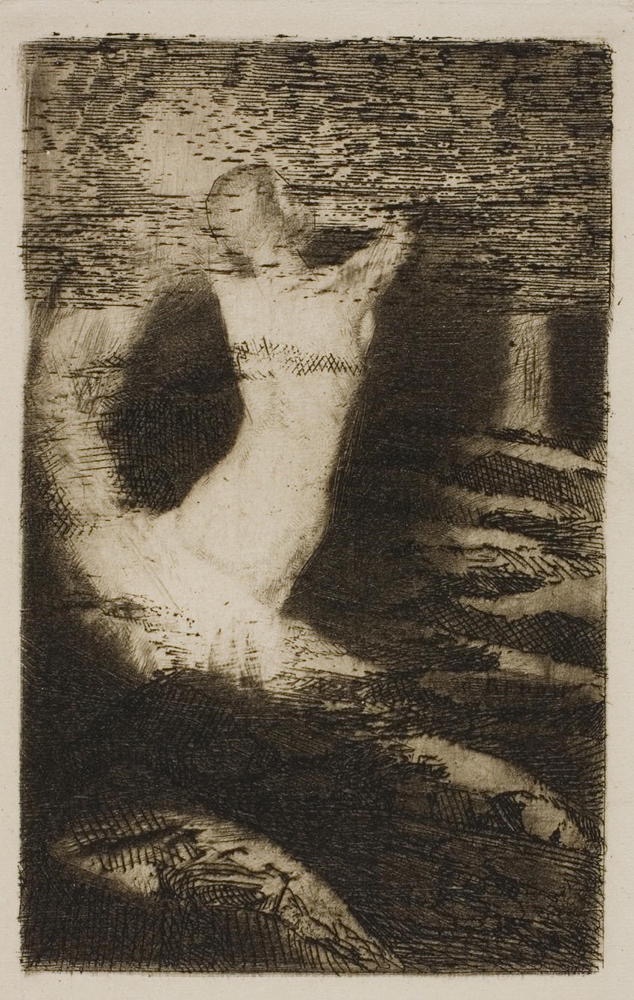
Odilon Redon: Passage of a Soul (1891)
"The roads least taken tend to be the ones most worth taking."
The Exiled do not readily adopt their new home. They naturally resist assimilation because too easy an integration might serve to disrespect their "real" home. They will find many reasons why their new station seems inferior, however superior it might objectively seem to every other observer. Traffic became chief among my complaints when we landed in Northern Virginia. Traffic had evolved into absolutely unworkable patterns there, where the bulk clogged what were euphemistically referred to as arteries. These often proved to be among the longest paths between any two points, but paradoxically also the most traveled. I believed that this had more to do with habit than design. People often follow what appear to be the wider paths, for instance, when narrower ones might make more sense. Of course, if everyone followed these shorter paths, they'd become clogged, too, so I worked hard to keep my emerging SecretPassages secret.
Chief among my strategies for keeping my SecretPassages secret involved turning off any navigation apps that might be recording my passage.
Anonymity

W. Tringham, after Jacques de Sève:
Onbekend dier [Anonymous Animal] (1773)
" … I sense myself a better man …"
Anonymity might be the one utterly reliable superpower that the newly Exiled possess. Though stripped of most of their possessions, they all acquire this one in exchange. It might initially seem freeing to move about the world with nobody watching or anyone watching having no clue what they're seeing, but this gift has indefinite limits. The anonymous hold little influence. They have nobody they can call to help them out should they get themselves into a jam. They can go anywhere without fear of being recognized, but they tend to roam few places where such recognition might matter. It's as if they exist without any observers, without any risk or hope of accidentally bumping into someone influential and embarrassing themselves. The Anonymity, while initially freeing, comes to wear one down. If nobody knows you from Adam or Eve, it might become difficult to know what you believe. Acquaintances can at least remind you who you are or who you used to be, and without that feedback, it grows difficult to remember who you are or were in this world.
Anonymity reliably produces ghosts.
ExPat

Eduard-Julius-Friedrich Bendemann:
The People of Jerusalem in Exile (c. 1832)
" … not actually sentenced to spend time in jail but still there, even if Just Visiting."
Before we'd found permanent housing, we discovered that we'd been Exiled into the one place with more Exiles than any other place in this country. Federal government employees are routinely sent "on station," assigned to work in Washington for periods ranging from a few months to a few years. Thousands are encouraged to volunteer for these assignments, promised better future promotions, and a deeper understanding of how the system they're a part of works. Many bring their families, but more don't, and consequently, there are thousands of people left wondering what to do on weekends. Many work right through their weekends, figuring that the sooner they finish their assignment, the sooner their exile might end. Local connections seem challenging to make. The locals have families to attend to, and other ExPats have their own lives to live. Further, the sheer size of the DC Metro area means that people who work next to each other throughout the week might bunk fifty or more miles apart. Consequently, an Expat's life can be lonely.
The Muse and I, within a couple of weeks of arriving, began hosting a Sunday night potluck supper at our temporary digs.
Accidentally
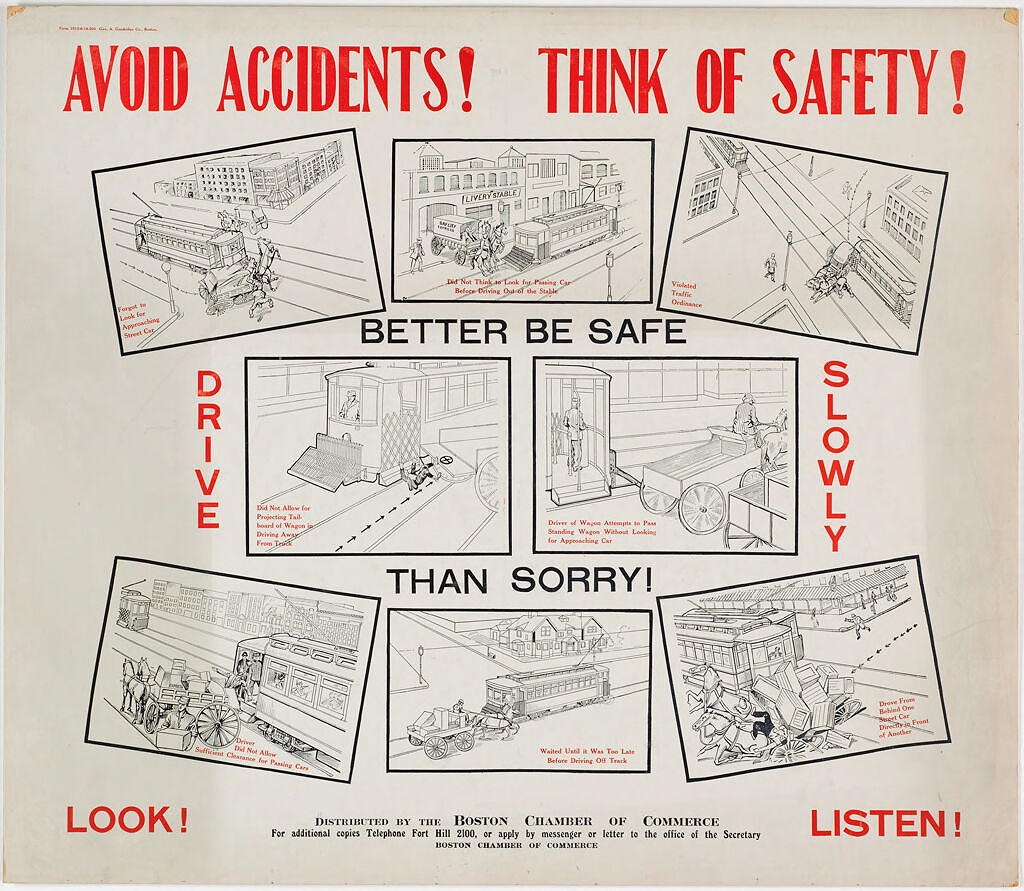
Unidentified Artist: Avoid Accidents! Think of Safety!
[Series/Book Title: Social Museum Collection] (c. 1903)
" … we ended up Accidentially thriving there …"
Our Exile separated The Muse and me from much more than our beloved home. It also separated us from our accustomed means of thriving. The Bankruptcy cleaned out our liquidity and, with that, our sense of identity. If we lacked money, how would we be able to continue pursuing our purpose? How would we be able to purchase what we needed to survive, especially once we'd relocated into one of the pricier housing markets in the country? We had no idea how we'd survive. We kept moving forward As If, perhaps taking heart from the parable of The Birds of the Field, who apparently manage to get by without the usual means to survive. They manage to live Accidentally On Purpose if that makes any sense. Of course, that notion makes no sense whatsoever to anyone schooled in this culture. Here, we carefully plot our course before purchasing passage. We thrive through planning, or so we continually insist. We're schooled to avoid accidents and believe that accidents result from poor planning and that accidents suggest terrible things about us. We even revile the accident-prone.
The Muse and I set about living Accidentally On Purpose.
Familiars

Anselmus Boëtius de Boodt: Robin
[Erithacus rubecula] (1596 - 1610)
" … long ago when I still expected novelty to light my way home."
I sought out novelty before we were Exiled. After, I felt more attracted to Familiar things, to Familiars. Before, I'd considered myself adventurous when seeking some odd or unusual experience. I'd order the wild boar in the restaurant and seek out the Stearnwheeler supper cruise. I'd gather these experiences like some collect bracelet charms, believing myself especially blessed and a bit courageous. I once drove over an hour to find a trailer in the Arizona desert where a retired fireman from Poughkeepsie had set up shop selling rattlesnake rattles so I could return from that trip with unique gifts for my kids. I preferred to take the less-traveled roads and thought myself unique. That was before I was Exiled.
After being Exiled, I sought out Familiars, even the formerly banal ones.
Leaving

Harry Sternberg:
Father Leaving Home with Suitcase
[Series/Book Title: Life in Woodcuts] (20th century)
"I no longer need to take leave."
The drive up and out of The Walla Walla Valley that first morning of Exile felt promising, for our possessions were already on their way, and we'd been left behind. It seemed as though we were only trying to catch up to our life as we headed East across the Blue Mountains and on through Southern Idaho into Utah. We made Evanston that first evening, just as far as my to-be first wife and I had made it the first morning of our initial Exile thirty-five years earlier. We were catching up to our lives then, too. She was chasing her first job after graduating from university, and I was tagging along, heading into what was then still a seemingly great unknown. I was twenty-two and had never experienced humidity, which made me a virgin of sorts. I'd never imagined what most of the rest of the country routinely experienced, clear evidence that I'd left Eden for some alternate universe inhabited by heathens. Why would any sentient being tolerate high humidity? It did not make sense!
With that first Exile experience and a lifetime's accumulation of others, I'd grown familiar with Leaving.
CashEconomy

Unknown Igbo Artist: Mami Wata figure (1950s)
"I might have been broke, but never broken."
The bankruptcy rendered us effectively insolvent. We entered a previously unperceived CashEconomy. It was as if the economy had suddenly returned to the gold standard, and we had no access to gold. Modern economies do not trouble themselves very much with cash. It serves more as an artifact than as a means of exchange. It becomes a metaphor, a way of speaking about value rather than a means for holding it. Modern economies transact exchanges with symbols once or more times removed from actual specie, just as CashEconomies sit at least once removed from their underlying gold. It's enough that Fort Knox holds reserves. Remember, it became illegal for private citizens to hold too much gold, even when we were still on the so-called gold standard. Such conventions ultimately came to limit economic potential, and so were done away with in favor of plastic and similar, more imaginative systems.
The most profound initial effect of the bankruptcy was a radical loss of liquidity.
Hopefulling

"(Giuseppe Niccolò Vicentino)(After Parmigianino)
(Previously attributed to Circle of Ugo da Carpi): Hope
(Sixteenth Century)
"We were never caught once."
We entered our Exile curiously hopeful. We had every right to engage in despair, for we had fallen far. We'd been within a month of moving into barrels, becoming cartoon-character destitute wearing barrels with suspenders, yet we felt hopeful instead. Obama had just been inaugurated, and Hope was in the air. We would be there, near where the upcoming miracle would happen, next to ground zero of the transformation. The Muse would even participate in her role in the bowels of The Department of Energy's Biofuels Development Office.
My role was unclear.
BeneathMe
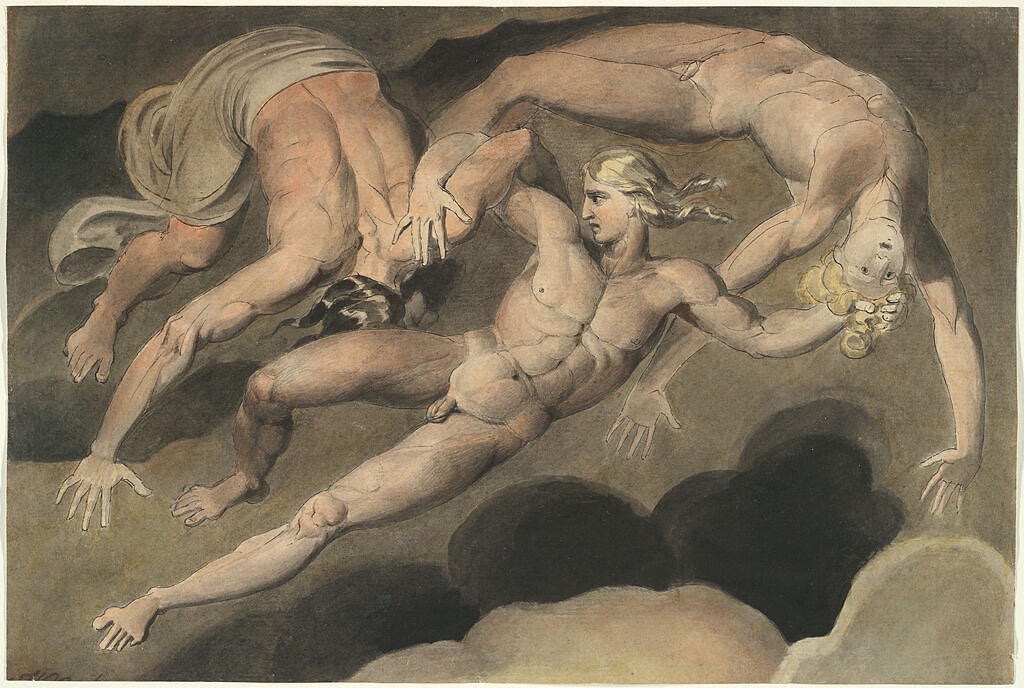
William Blake: Fallen Angels,
Alternate Title: Three Falling Figures (c. 1793)
"Maybe I could find a new identity, even one AboveMe there."
While attending university in Portland, my first wife and I lived in a main-floor-of-an-old-house apartment on a busy arterial. When friends moved out of their main-floor-of-an-old-house apartment on top of Mt. Tabor with views of both Mt. Hood and Mt. Saint Helens, we moved in a minute and soon came to think of ourselves as the sort of people who lived on top of one of the more prominent vistas in the city. Later, when our landlord decided to raise the rent by the amount of the increase in the Consumer Price Index each month, we decided to buy a house. The best we could afford was located down in what we called The Flats, a neighborhood far beneath our accustomed station, with industrial operations squeezed between houses. The adjacent milk bottling plant left the neighborhood smelling of sour milk most mornings. All claims to have been urban pioneering aside, we felt as if we had been Exiled into a third-world nation. It would be where we'd raise our kids and live our lives. In retrospect, it doesn't seem half as demeaning as it felt.
I recognized that old familiar feeling when The Muse and I landed in Roslyn, Virginia, at the beginning of our later Exile.
Experienced
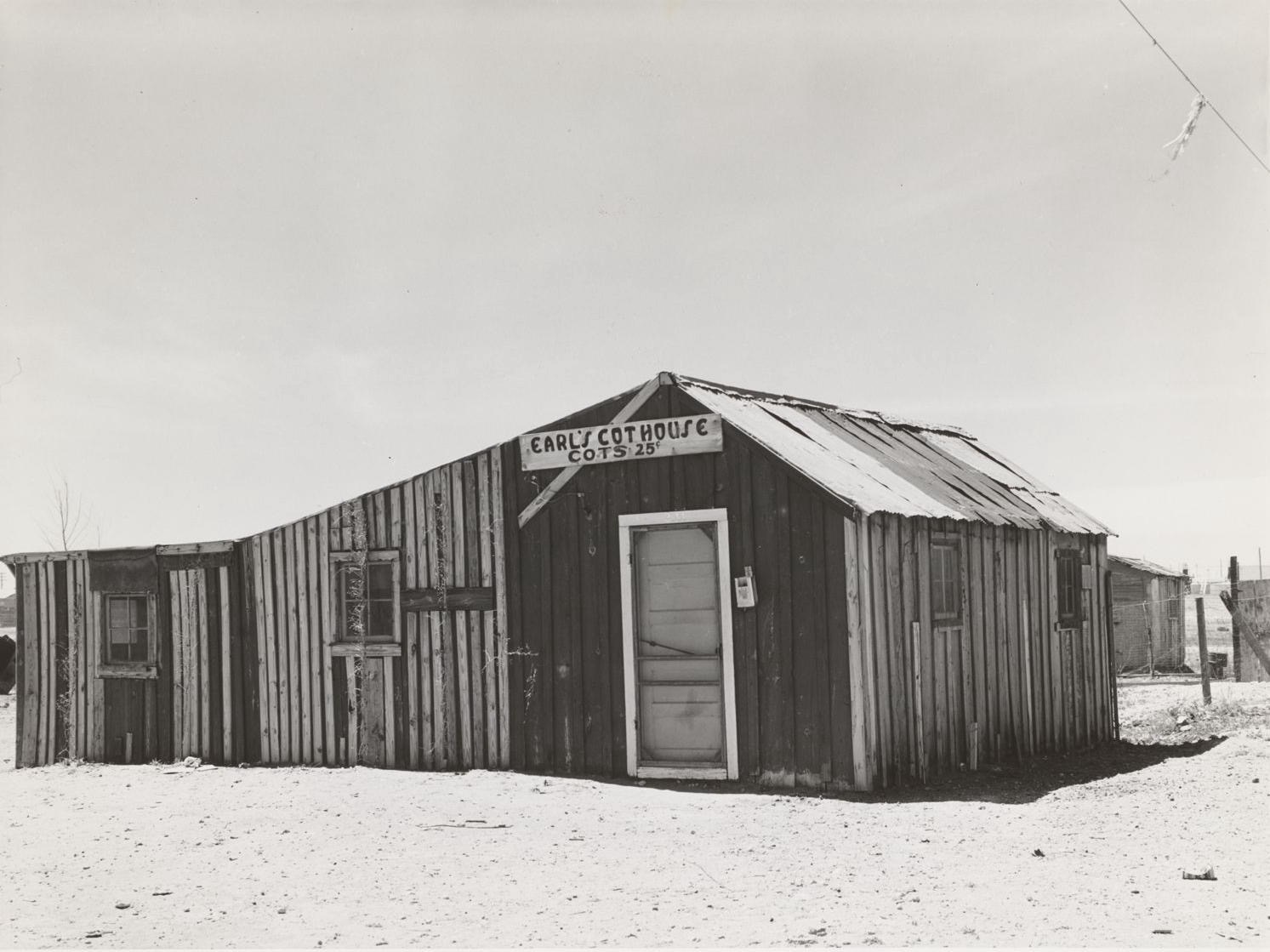
Russel Lee: Cot house in the oil town of Hobbs, New Mexico. Hobbs is now experiencing a boom and the cot houses are necessary for the swarms of workers who come in. This is typical of all oil boom towns. (1940) United States. Farm Security Administration
"I'd been shipwrecked before. I knew the routine."
Until The Muse and I were Exiled following our unfortunate bankruptcy, I hadn't understood how Experienced I had been at the odd art of exiling. Anyone accustomed to living and working in a place might never suspect a simmering exile economy surrounding them. Traveling salespersons might live in perpetual exile, as do consultants. I had been a consultant before the crash, so I had grown accustomed to working anywhere but home. One year, I stayed in fifty different hotel rooms and a few for longer than overnight. Each business trip amounted to a practice exile, for I would be rechallenged to find a cup of decent decaf and an acceptable bakery. I ultimately came to pride myself on being able to locate both within an hour of landing in any strange city. Traveling for a living seemed little different from being Exiled, except for the returning home part.
Leaving home was another matter.
Exiled

Paul Gauguin:
cover art for Catalogue de l'Exposition de Peintures du Groupe Impressionniste et Synthétiste
[Catalogue of the Exhibition of Paintings of the Impressionist and Synthetist Group] (1889)
Book containing eight zincographs and letterpress text
in black ink, with photomechanically printed gray stripes on cover, on tan wove paper
"I never learned how to feel as though I belonged there."
In late March 2009, The Muse and I left our beloved Villa Vatta Schmaltz for an indeterminate exile. Over the prior month, our local newspaper had published my series of essays entitled The White Collar Recession, which recounted our recent dénouement, our fall from grace. The prior autumn's economic crash had left our once-thriving business and us bankrupt. Coming concurrently with my father's death, the blow had been devastating. We fully expected to lose everything, including our beloved Villa, once the symbol of our success turned into our most visible evidence of failure. The bankruptcy administrator found us faultless, but his judgment did little to assuage our feelings. We were less than a month away from moving into a barrel when The Muse was offered a prestigious job with one of the Department of Energy's National Laboratories. The rub was that we would have to relocate far from the center of our universe. When entering that stage of life where we had been expected to be winding down our wandering, we were forced to rewind ours. By the time the newspaper declared my White Collar Recession their second most popular series of the year, we were no longer there, for we had been Exiled.
We landed in a close suburb of Washington, DC, Roslyn, Virginia, in transition housing, a sixth-floor apartment overlooking a firehouse and beneath the final approach to National Airport with two restless, edgy cats.
Graceful
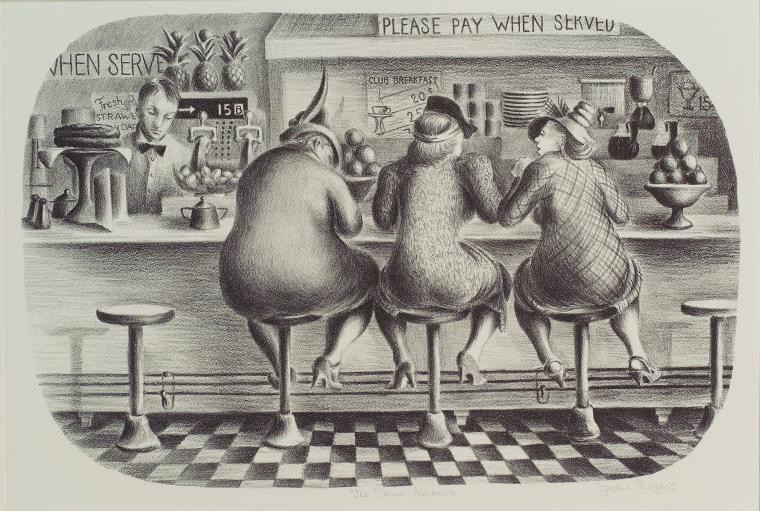
Julia Rogers: Three Graces (1939 - 1943)
" … each seems willing to show up for the cast party following each performance."
I might not live that elegant of a life, but I aspire to live a Graceful one. Not necessarily a well-choreographed or excellently executed existence, but at least a decent one. The presence of Grace in my life might ensure such a fate, for Grace smoothes over otherwise obvious imperfections. The object of life doesn't seem to be perfection but something much closer to imperfection instead. We seem to be given imperfections with the intention of perfecting them. Not to make them perfect, but, as Lincoln insisted, to make them somehow more perfect than before we encountered them. We try to improve. Not all of our efforts succeed, nor do we necessarily intend to succeed in handling all of them. We fail plenty, then begin again, perhaps more humbly than we initially engaged. There might be more Graceful potential in any odd failure than in any unbridled success. Remember, blessèd are the poor, weak, meek, and destitute. Those in desperate need of Grace seem quite naturally to employ it better.
My summer has been a fairly unextraordinary one.
Weekly Writing Summary For The Week Ending 9/19/2024

Lewis Wickes Hine: Syrian-Arab, Ellis Island (1926)
And Properly So
My Summer Of Discontent coexisted with my writing this Grace series. I see now, as the Summer and discontentment fades, that I spent my summer suffering from one of the more ordinary blindnesses, the one that sees the present altogether too clearly, and so cannot adequately either see past or foresee future. Presence never was an end-all or a be-all, but merely one of the simultaneous states informing and misleading us, in probably roughly equal proportions. The heat gets me but not nearly as thoroughly as I can get myself. I can see in retrospect what I could not even suspect prospectively. Every long-suffering experience quickly turned to dust, the same as every thoroughly satisfying one. I actually accomplished something this summer in spite of or, perhaps, because I was suffering. Summer wrought what summers have always wrought: Autumn, and all the uncertainty that season has ever brought. By the time the next three months have passed, I will have experienced snow again and re-engaged in my annual Seasonal Affective Disorder dance. This could become my Autumn of Discontent, but I've grown weary of discontent. It alters nothing but the quality of my experience. It apparently cannot even chase away Grace, for here, at the very end of my Summer Of Discontent, I hold a completed journal of my experience entitled Grace, and properly so.
Level

Level: Classification Artists' Tools (20th century)
"There once was a crooked man who lived in a crooked house …"
Level amounts to an abstract concept in The Villa Vatta Schmaltz. Built in 1907, the old place has been settling unevenly into place ever since. When remodeling, we must remember that we're restoring relative to what the eye recognizes as Level. That value might differ considerably from what my old Cherrywood Level might propose. An unbalanced roofline was the chief reason we began refurbishing the front porch. When approaching from down the facing street, the house seemed stuck in a permanent shrug, losing at least six inches across the twenty-foot roof line. We'd thought then that the bricks we believed supported the roof were failing, but those bricks were never more than ornamental. They never supported anything. That roofline had been trying to support itself and ultimately began to fail. That it managed to support itself for who-knows-how-long stands as a testament to our good fortune. We might have had to clean up a catastrophic failure instead of merely making the roof line Level again.
As with most projects, this one began under false premises.
Whimpered
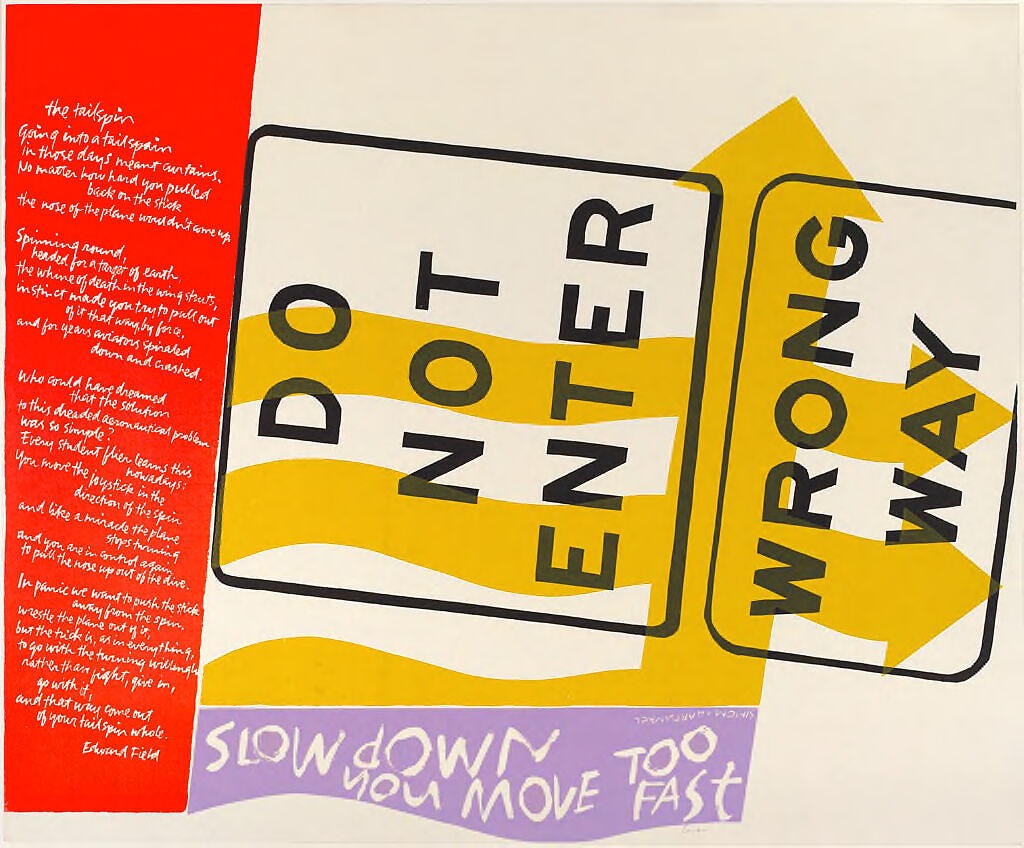
Corita Kent (Sister Mary Corita):
feelin' groovy [print] (1967)
Signed: l.r.: Corita
(not assigned): Printed text reads: DO NOT ENTER / WRONG WAY / The tailspin / Going into a tailspain in those days meant curtains. No matter how hard you pulled back on the stick the nose of the plane wouldn't come up. Spinning round, headed for a target of earth, the whine of death in the wing struts, instinct made you try to pull out of it that way, by force, and for years aviators spiraled down and crashed. Who could have dreamed that the solution to this dreaded aeronautical problem was so simple? Every student flier learns this nowadays: you move the joystick in the direction of the spin and like a miracle the plane stops turning and you are in control again to pull the nose up out of the dive. In panic we want to push the stick away from the spin, wrestle the plane out of it, but the trick is, as in everything, to go with the turning willingly, rather than fight, give in, go with it, and that way come out of your tailspin whole. Edward Field / SLOW DOWN YOU MOVE TOO FAST Simon + Garfunkel
"Most good work ends with something other than a bang …"
The concrete work Whimpered when it ended. There were no ticker-tape parades, no marching bands. No heavenly hosts singing through the firmament. It was almost a non-event. Three remaining crew members worked the walls to a smooth finish. All the pomp and circumstance involved in the BIG pour was absent. I set three cold beers into the ice chest and pointed the survivors in their direction. The next thing I knew, they were pulling away from the curb. Pablo, the concrete contractor, called a while later to say he'd return the following morning to see how the last coat dried. I told him I wanted a walk-around so we could appreciate the work before I wrote him a check. There are odds and ends to finish and a more thorough cleaning of the area, but Jesse, our structural contractor hired to prop up and level the porch roof, will make his mess, and he's next on the agenda; this ending only a way station on the way toward final completion weeks or months hence.
Sports competitions materially misrepresent how contests work.
RidingBus

Jack Gould: Untitled [passengers on crowded city bus] (c. 1950)
" … prefer to wait on the corner for their next ride to anywhere."
The Grand Other enrolled in a new school this term, so her last year's school bus routine wouldn't get her there. She'd have to ride the city bus, something with which she had zero experience. Further, her older sister had filled her with stories about how rough the city bus could be, so she was understandably hesitant even to try that ride. Her mom and dad both went to work long before The Other would have to leave for school, so she was left with a dilemma. Fortunately, her grandfather is an enthusiastic bus rider, and seeing opportunities to engage in one of his favorite activities, he volunteered to introduce her to the lifestyle.
I consider RidingBus to be a lifestyle, a choice.
Anniverse

Izaak Jansz. de Wit, after Wybrand Hendriks:
Echtpaar in een boeren interieur
[Couple in a farmer's interior] (1794)
" … we continue forward somehow."
Some dates seem to attract events. My father and nephew were, for instance, born on the same day/month, January 15, and that became an annually celebrated anniversary greater than the simple sum of two birthdays. My first wife's younger sister was born on Norwegian Independence Day, Syttende Mai ("Seventeenth of May"), elevating that anniversary into a super holiday for that Norwegian family. What one says on such days tends to be the same, ever older stories, grown perhaps even more remarkable with each retelling. For the Muse and I, September 15th must undoubtedly be our most prominent anniversary. It's the day we met twenty-seven years ago, and it carries ever greater nostalgia and significance with each passing year. This year, additional significance attached itself to the day when The GrandOtter, The Muse's granddaughter Sara, gave birth to our first great-granddaughter, making us both great-grandparents.
Such significances always seem unlikely, though double occurrences cannot be described as rare.
ImperfectlyLegal
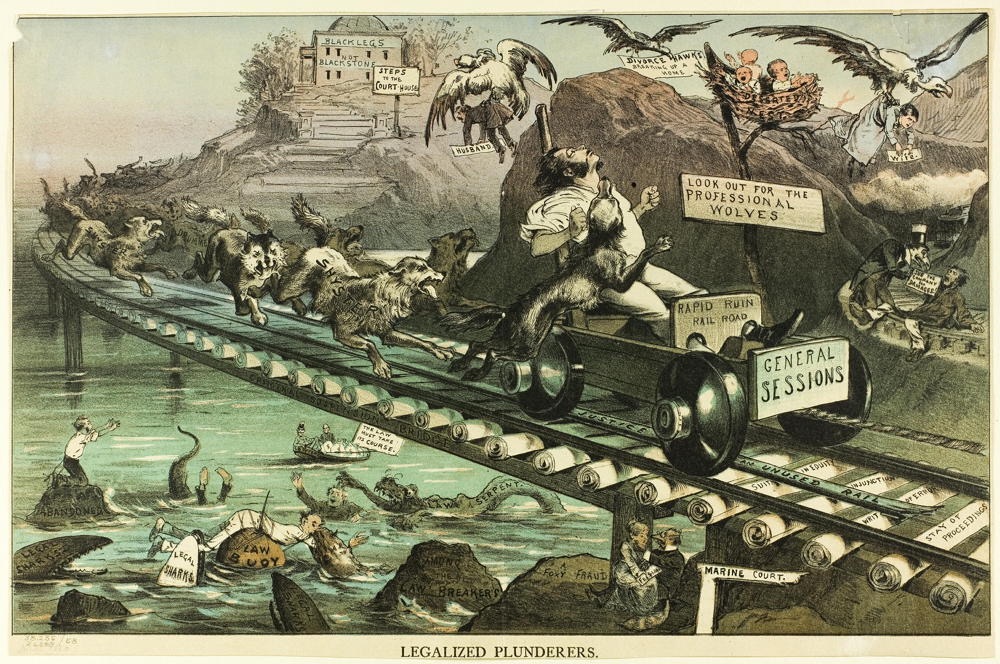
Unknown Artist: Legalized Plunderers, from Puck (1880)
" … fly coach with their constituients when on the people's business."
The Muse and I last night attended a neighboring county Democratic Party's annual celebration dinner featuring a visit from our spectacular United States Senator Maria Cantwell. A visit with her when she was visiting Walla Walla in June yielded The Muse a senatorial letter of intent for an important Port project and me an appreciative interest in my Blind Men and the Elephant Book. We attended the dinner in hopes of continuing the conversation we'd started and also to revel in what is turning out to be a genuine banner year in the history of our Democratic organizations. The dinner was held at a union hall, where we learned that Biden's term has resulted in a record number of apprenticeships and jobs. That county's economy's on fire!
We were seated at a table with a couple of former school teachers who retired from the Seattle suburbs and moved over into the less urban east of the Cascades.
Senses
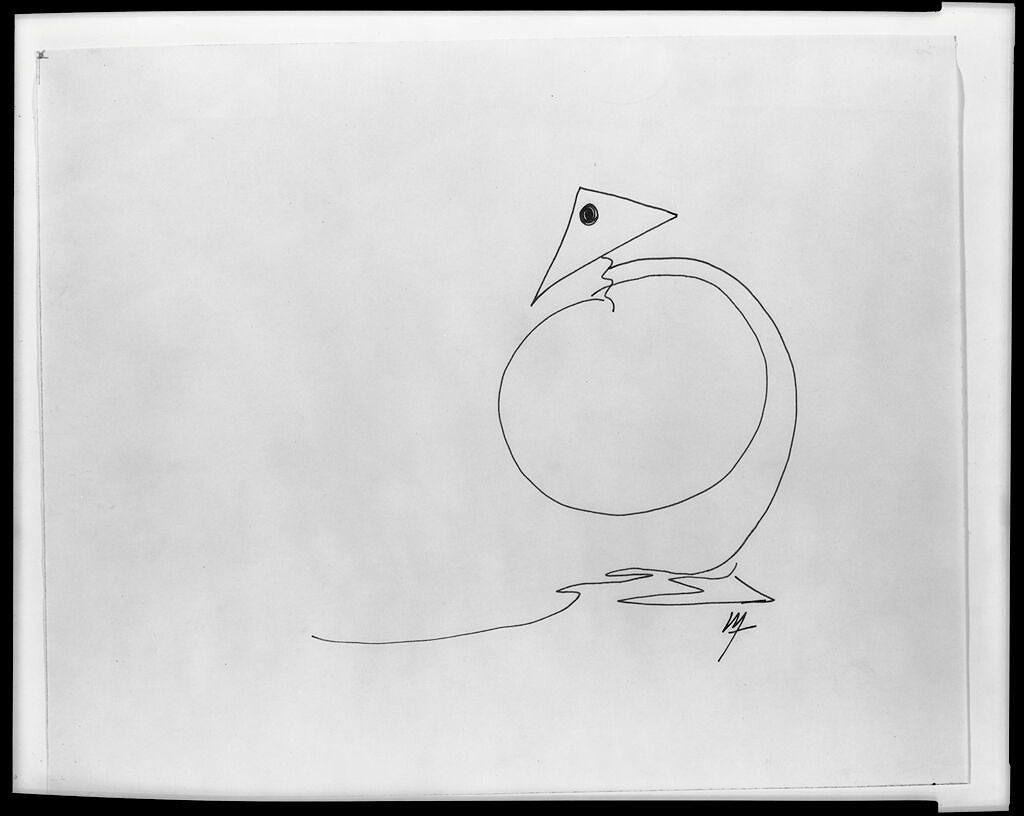
Margaret Fisher: With a Sense of Humor (20th century)
" … Presence isn't quite ready to make sense to us again."
I feel moved to consider Senses in this story. Not the usual sight, smell, taste, hear, and feel, but a parallel or even an orthogonal set familiar to everyone: Insense, Outsense, Absense, and Presense. I could throw in the sense of humor, too, and any others that might only come into focus once I start this consideration. I propose this plotline because The Muse and I experienced a shocking Absense over recent days, the sudden disappearance of a presence that had come to kind of define us. Loss seems ordinary enough. We slough off plenty in our regular day-to-day existence, and life itself depends upon death. Everything we consume except milk, honey, water, and air depends upon something dying for sustenance, so we're certainly not strangers to Absense.
The steelhead filet I carefully grilled over hot coals before dinner last night disappeared shortly after that, never to return.
Weekly Writing Summary For The Week Ending 9/12/2024

Preston Dickinson: Self-Portrait (c. 1926)
Qualifies As A Feeling?
I mostly feel lucky even though lucky probably doesn't fully qualify as a feeling. Further, luck must be utterly out of my control, or else it's not really luck because luck if it's governed by anything, must be ruled by randomness. One might harbor feelings about impending luckiness but only experience luck once it happens. How often do I "feel" lucky without experiencing an actual manifestation of luck? How frequently do I experience luck without having a premonition of its arrival? Both questions seem as unnecessary as they are unanswerable. I might cringe when Friday the Thirteenth comes around, regardless of which day of the week it lands on that month (Thanks, Walt Kelly!), but I cower for nothing more or less than randomness. Not to downplay randomness, for it was probably the force that resulted in us. It routinely produces unlikely results if only because we cannot calculate the likelihood for most results. We might be equally blessed and cursed by randomness, just as lucky or unlucky as we expect to be, depending primarily upon our expectations, which are rarely random and most often focused on feeling luck as if luck even qualifies as a feeling.
GoodMeasure

Unknown Artist:
Ivory and Brass Folding Shoe Measure (1738)
" … I feel deeply sorry for that absence."
I recently happened upon a Neil DeGrasse Tyson video where he explained how, in high school, he acquired his first calculus textbook. He admitted that he initially felt utterly intimidated by the gibberish he found inside. He explained that the jump from algebra to calculus is greater than from arithmetic to algebra. Even so, as weeks went by, he came to catch himself understanding ever more of the previous gibberish so that within that quarter, he'd come to rely upon those previously baffling formulas. This seems the typical testimony of anybody's mastery. It tends to grow upon them slowly, perhaps eventually leading to a flash of realization. Not everyone finds mastery, though, and those who don't often remain baffled about why they couldn't experience that shift.
I was making small talk when driving The Grand Other to school yesterday.
Revealed

Unidentified Artist
[after Rembrandt Harmensz. van Rijn]:
The Blind Fiddler
-Alternate Title: Blind Fiddler, Led by His Dog
(1631)
" … all will shortly be Revealed."
And so it came to pass that after a weekend drying in the late summer heat, the new concrete porch portal watched the crew return to remove its forms. Screws whirred out, and pry bars separated painstakingly-prepared form faces, oiled chamfer strips and insets intact. Over a scant couple of hours, the place had a new face, one that was in no way familiar. By morning's end, after all those boards had been loaded into a trailer, the yard was bare for the first time in almost a month, and our new home stood before us. The concrete was darker than it would seem by week's end, as Pablo, our concrete contractor, explained. The finishing had already begun. Each edge would be sanded or ground, imperfections filled with a putty-like substance, then sanded or ground again. They will repeat this process until no blemishes remain. It's painstaking work again, back-breaking in its own way, requiring delicacy this time rather than brawn.
The new face seems massive.
Lap-Sitting

Lucian and Mary Brown:
Untitled [boy sitting in woman's lap] (c. 1950)
" … just run-of-the-mill reassurance."
I have proudly possessed a string of Lap-Sitting cats. My current one, Max, finds me most mornings, drowsy and tentative, sitting and staring out the library window. He tries to hop up stealthily, but that's generally beyond his ability. He tromps around the place in those pre-dawn hours. I can hear him coming from clear across the house, for his are no mere little cat's feet. He most often enters from the upstairs window, landing at the end of the hallway with a definite thump before proceeding down the hall to the stairs, which he makes ring with each step, down into the entry hall before turning through the dining room and into the living room where he finally fails to sneak up behind me. He can still surprise me with his timing, though. He suddenly appears on the chair arm, sometimes managing to get tangled up with my arm, whereby he aborts the attempt. He'll sometimes slink away then and not return, but he often mounts a second try, landing off balance in the vicinity of my lap. He often requires a little nudge and some guidance to find a comfortable position before settling in for some serious Lap-Sitting.
I adjust my schedule for these visits, which usually seem far too brief.
Greatness
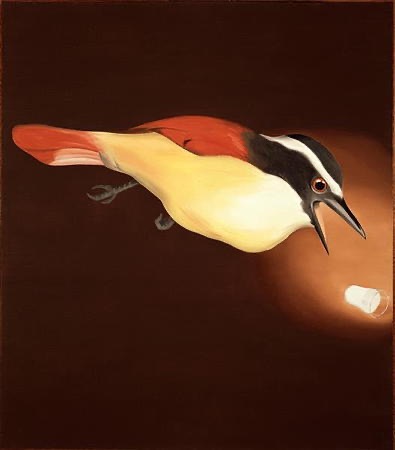
Edward Ruscha:
Angry Because It's Plaster, Not Milk (1965)
©Edward Ruscha, Fair Use
"Thank you for your patience."
My Greatness must have evolved in me, for I was not born Great or, indeed, born to Greatness. I believe that something, not Greatness, was, however, inborn in me that helped me achieve what nobody who knew me then would have foreseen as my emerging Greatness. The preconditions must have been there, however unnoticed, because leopards never change their spots. Nobody knows how leopards first acquired their spots, only that once possessed, they're never lost. I suspect that Greatness carries a similar distinction because it knows no comeuppance. Once emerged, it's present. Once noticed, it's no longer tacit. It becomes the defining attribute of anyone who owns it, though some insist that Greatness owns its incumbents. Either way, I say it's Great to experience Greatness. Those who have never experienced their own Greatness couldn't possibly understand. Whatever Greatness anyone who's not Great ever notices isn't even distantly related to what that one with genuine Greatness experiences. I'm shocked when anyone even mentions my Greatness, for how could they possibly know of what they speak? True Greatness comes through suggestion: the great must introduce themselves to the unwashed. Some insist that Greatness is exclusively a function of auto-suggestion, though I strenuously disagree, as would anybody possessing the Greatness pedigree.
I'm impressed with how language evolves out from under even its strictest adherents.
Assembling
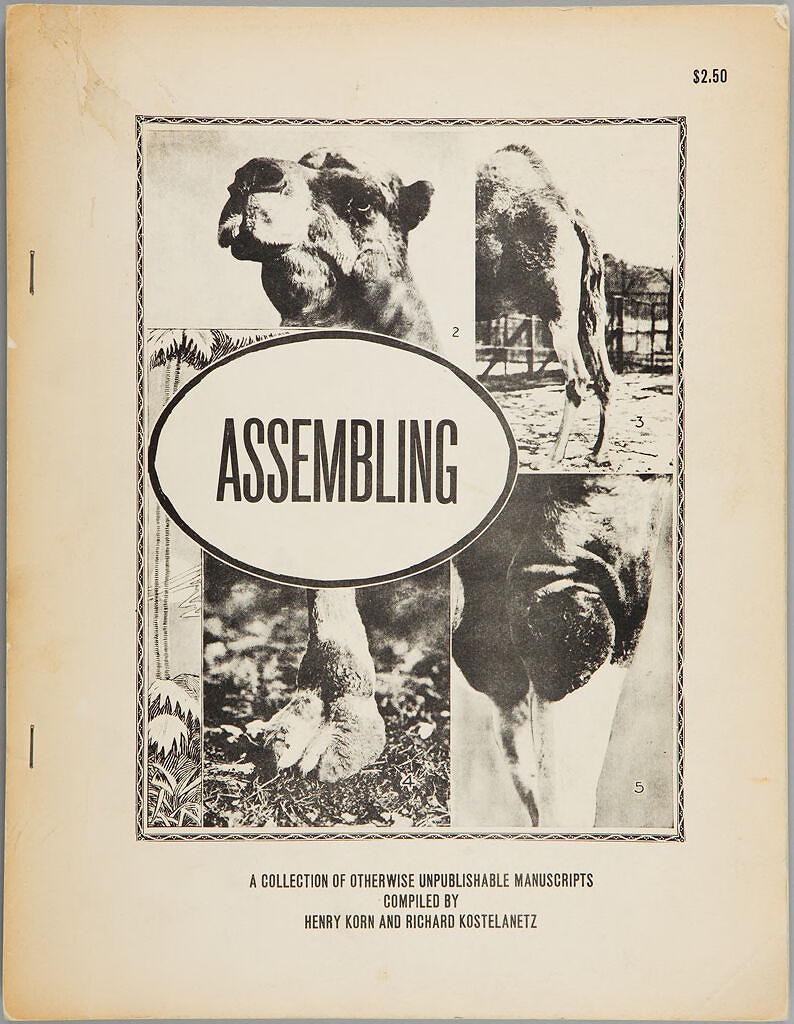
Edward Ruscha: Chocolate
[Series/Book Title: Assembling, vol. 1,
Henry Korn and Richard Kostelanetz, compilers
Brooklyn: Gnilbmessa inc. (1970)
" … genuinely qualifies as work worthy of shirking."
The final fortnight of each quarter, my thoughts turn to Assembling. If disciplined in my writing that quarter, I will have completed ninety stories, each written under the presumed aegis of that quarter's theme or stated purpose. This quarter, I've been writing Grace stories, though not every piece necessarily seems on topic. If I squint, I can see how I interpret each piece to have fully satisfied its theme, though I seem like an over-insistent assistant district attorney prosecuting my case. Assembling involves bringing each story together in one place so that it might appear to be a manuscript where I can number pages and list chapters in a Table of Contents. The manuscript amounts to the least helpful form for every purpose except one, that of publishing.
Given that I have not published any of the stories I've been creating over the last twenty-nine quarters, I've primarily considered Assembling an optional activity.
Porchy
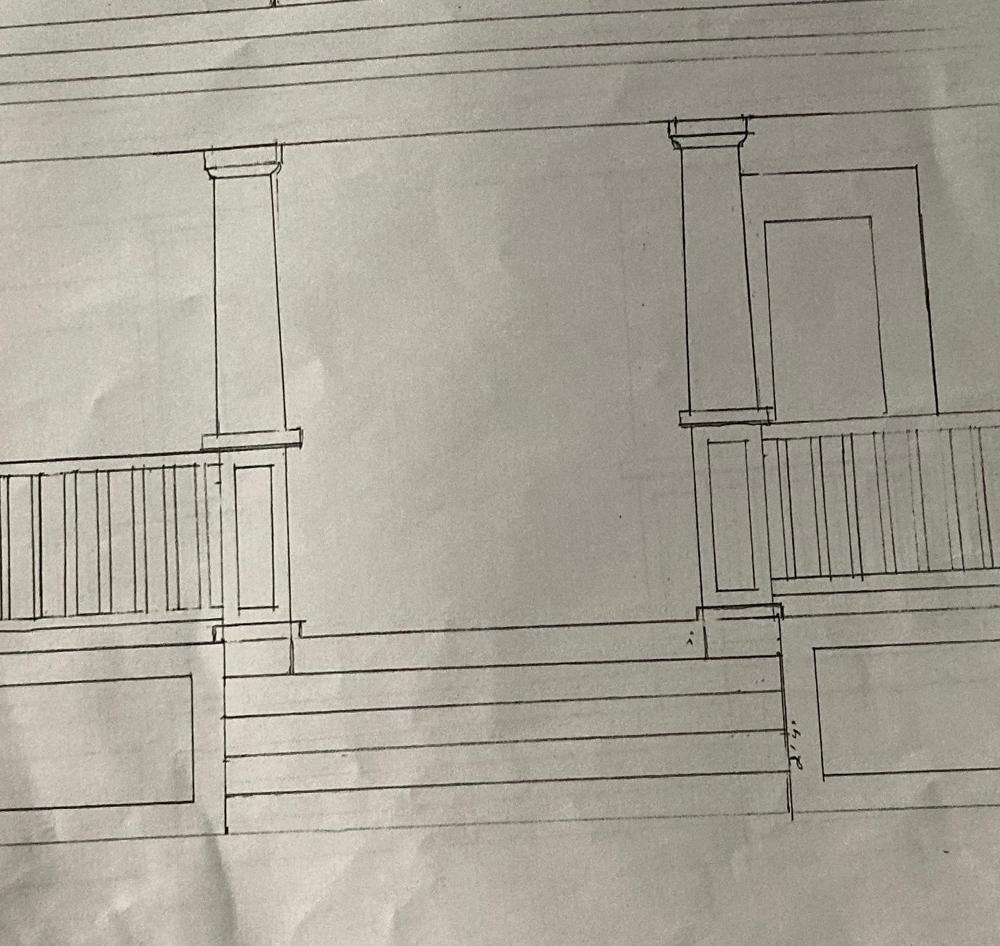
The Muse's rendering of our finished porch remodel.
"Those without the patience of Job experience the amateur's impatience …"
When creating something, the creator must somehow tolerate a lengthy period where that something does not yet even distantly resemble the end product. The difference between amateur and artisan might be measured in the distance between their patience. Impatience seems the constant companion of the amateur and forbearance, the artisan's eventual nature. The patron's left wondering if their investment will ever pay off. Pablo, our concrete contractor, aspires to be the artisan he only occasionally is yet, though he's coming along. Yes, he did get a little ahead of himself when pouring that first footing and failing the following four inspections. His comeuppance tried everyone's patience, especially his. We ended up with a footing so over-engineered that it will still be here through centuries hence. Whoever tries to turn The Villa into a teardown will curse our existence.
Preparation for the Big Pour consumed more than a week, with constructing forms and fitting them with wooden strips to produce insets and beveled corners.
Weekly Writing Summary For The Week Ending 9/05/2024

Russell Lee:
Boys on sacks of wool, Malheur County, Oregon (1941)
United States. Farm Security Administration
Almost Exclusively In The Dark
The dust turns to talcum powder as August becomes September. School starts, and I volunteer to show The Grand Other how to ride the bus, but the bus route closed down due to road construction work. I drove her to school, reveling in the opportunity to influence her. I feel compelled to offer her the benefit of my experience, even though she doesn't seem to appreciate my attempts. I know my influence won't be immediate, though it might prove insidious. Grandparents are widely recognized for their insidious nature. We plant seeds we know we'll not see flower; our indifference remains our probable superpower. Few things cannot be improved by the judicious application of sincere indifference, and I can see and raise any indifferent move our granddaughter might attempt. She suffers from the certainty that she can see right through me, but I am not nearly as transparent as I probably appear to her. I'm dense and defensive from a longer lifetime of engaging. I can't quite remember the certainty of my youth, but I considered it considerable then. I earned my comeuppances, and while I'd hope The Other might benefit from them, I understand the rules of this game preclude her directly learning anything from me. That's why I go subversive. She cannot see and might never perceive, though the possibility will always remain. Decades from now, one of my odd comments might finally find its mark. Like everybody, I live almost exclusively in the dark.
Approximately
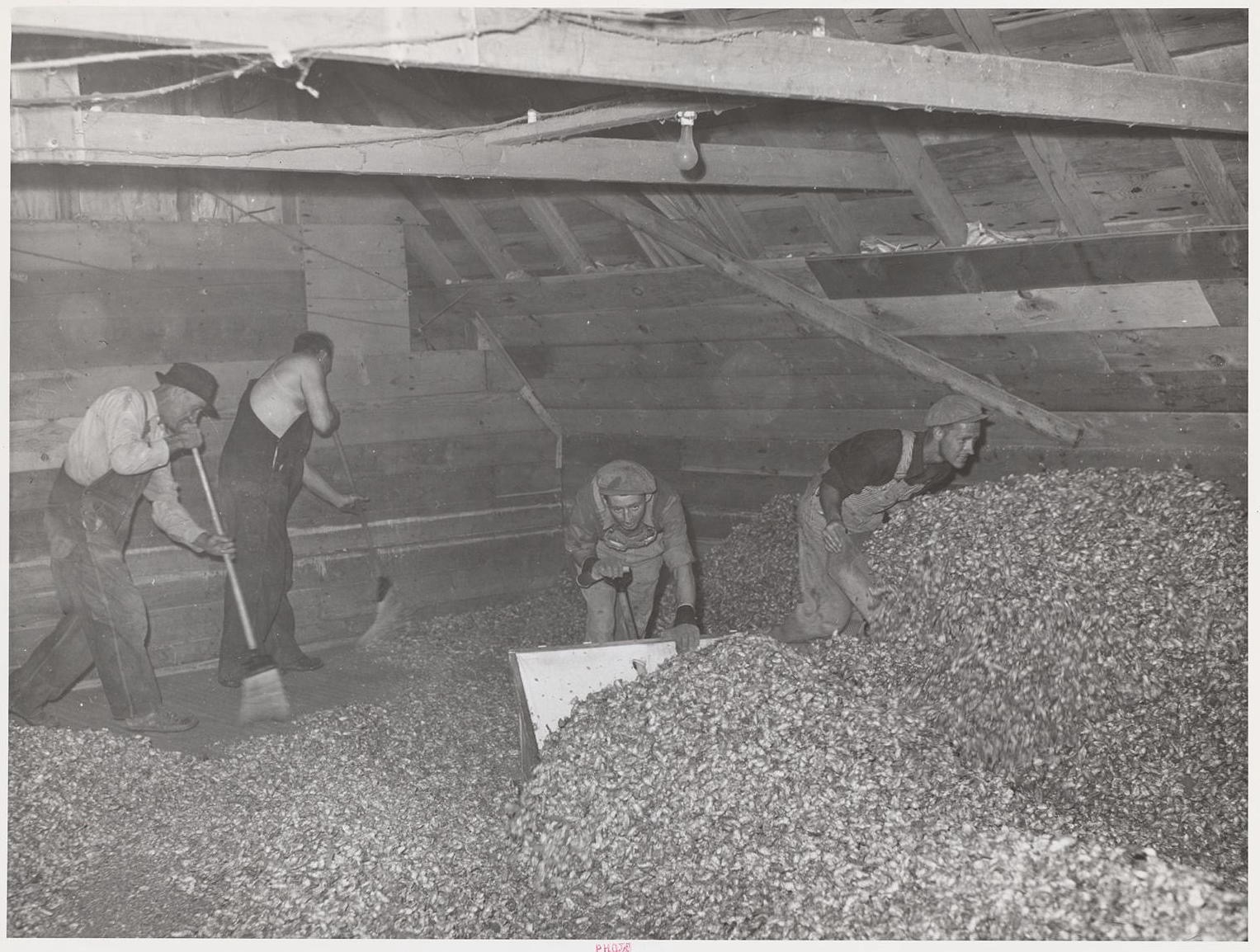
Russell Lee:
Scooping and sweeping dried hops
from drying room to adjacent room
where they will be baled.
Yakima County, Washington.
There is approximately twenty-five percent
dryout of hops (1941)
United States. Farm Security Administration
"You guys figure out the exact measurements between you."
I am an Approximately person. I do not deal in preciselies. I broadly estimate impacts and generally thrive. I do not appear to have the sort of mind that derives details. I see impressionistically. To my mind, Renoir and Monet painted with photographic clarity. Details lose me. I take measurements to immediately forget them. When Pablo, Our Concrete Contractor, asks my opinion, I refer him to Jesse, our Structural Guy, or Joel, Our Carpenter, for I cannot seem to retain a memory of exactly what we decided when we discussed design. How high the supporting wall should be poured does not reside in my head. I might notice when a disagreement emerges, but I will not be the one resolving the question. For that, we need to convene a conversation. I called Jesse and Joel after it seemed Pablo was measuring from the wrong surface. I could neither confirm nor deny a problem. I held suspicions. I'd also insisted that Pablo call Jesse and Joel. I was trying to encourage some conversation. Why is it so hard for people to talk with each other?
It would have been an excellent idea for us to detail the design of our front porch refurbishing before we started demolishing its past.
FiveHundredMiles
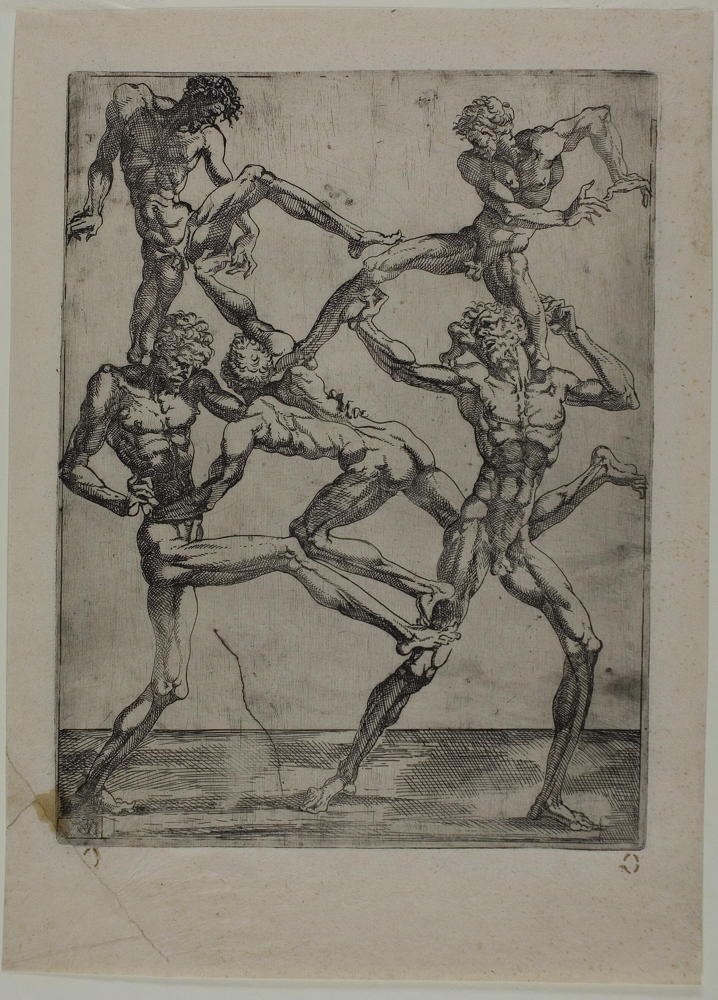
Juste de Juste: Pyramid of Five Men (c. 1543)
" … closed on Tuesdays forever."
My pioneer forebears would have counted themselves uncommonly fortunate had they been able to make twenty miles a day for a month. That would have gained them about what I drove yesterday in just eight hours. FiveHundredMiles seems like a vast distance. We rarely drive more than three hundred miles in a day, and even then, we feel the miles when we arrive. But I needed to run a couple of errands in Portland, and the schedule suggested I might spare no more than a day, so I decided to try. I'd initially figured I'd drive alone since The Muse's schedule's more crowded than mine, but the night before, she sheepishly asked if she might tag along. When I assented, she quickly cleared her schedule. "You'll have to be ready to go by seven," I cautioned. Over and back in a day works best when accomplished in daylight.
We got away by eight.
Helpless

Elihu Vedder: Fisherman and Mermaid (1888-1889)
" … I prefer to do my own ironing."
I am, like all males, Helpless in many ways. All men avoid developing certain skills for a wide variety of reasons. I, for instance, cannot dust. I tell The Muse it's because my failing eyesight cannot discern dust from whatever it’s covering, but since my cataract surgeries left me with nearly 20/20 vision, that reason lacks believability. I still stick by it, dusting being, by personal affirmation, beyond my calling. Nor do I sew, although tailors are often males. My mother was a very talented seamstress, so I probably inherited the genes, and The Muse likewise sews like a pro, so I don't lack a qualified mentor. Yet, I'm sure that sewing remains far beyond my skill set. I am also nobody's auto mechanic or technical support. Anything with many moving parts requiring a precision hand lands outside my skills, abilities, and experiences, or so I insist.
I probably drew my competence lines for reasons other than my lack of fine motor skills.
Fairing

Johann Theodor de Bry:
Little Village Fair (16th-17th century)
"The less than generous sociologist in me steadfastly refuses to see the resemblance."
Last week was Fair Week in the Valley They Liked So Well They Named It Twice. The Southeastern Washington Fair and Rodeo has been an annual event since the eighteen-sixties. It was a highlight of every one of my summers growing up, occurring just when the new school year was starting. We'd begin the school year the Wednesday before Labor Day, then take the following Friday and Monday off. No better way to start a new school year than with a four-day weekend! That Friday would be Kids' Day, and we would flood the fairgrounds to ride the rides, eat the food, and win goldfish that were inconvenient to transport home. We'd wear Rosellini for Governor buttons and dutifully tromp through animal barns and pavilion displays. In its day, the Fair seemed a pretty perfect portrait of our small city's personality, from the Saturday morning parade to the parimutuel horse racing.
The Fair seems less grand now.
F_J_B

H. R. H.: Pen Pictures of the Leading Events of the Last Week, from Chicago Tribune
(Published Feb 26, 1893)
" … they are not incorrect."
I solo worked our candidate's booth at the fair, casting for and reeling in potential voters. I'd learned the technique watching The Muse last year when she was running for the position of Port Commissioner, an election she went on to win. The Muse is a naturally gifted retail politician, which means she can attract attention and gain support. Not every candidate comfortably projects themself onto others, and not every potential voter necessarily appreciates a candidate reeling them in. She'd ask innocuously: "Are you a voter here?" The answer winnowed out the many out-of-town visitors to our fair. Anyone answering was hooked. Many remained oblivious, almost invisible, as they moved through the crowd. She could usually tell if someone was conservative because they'd turn their head a quarter turn away, deliberately not seeing her there, casting into the crowd. They'd become deaf, too, suddenly unable to hear her question.
Those who responded could be reeled in with a follow-on question, and some would soon find themselves engaged in good-hearted conversation.
Jobsite
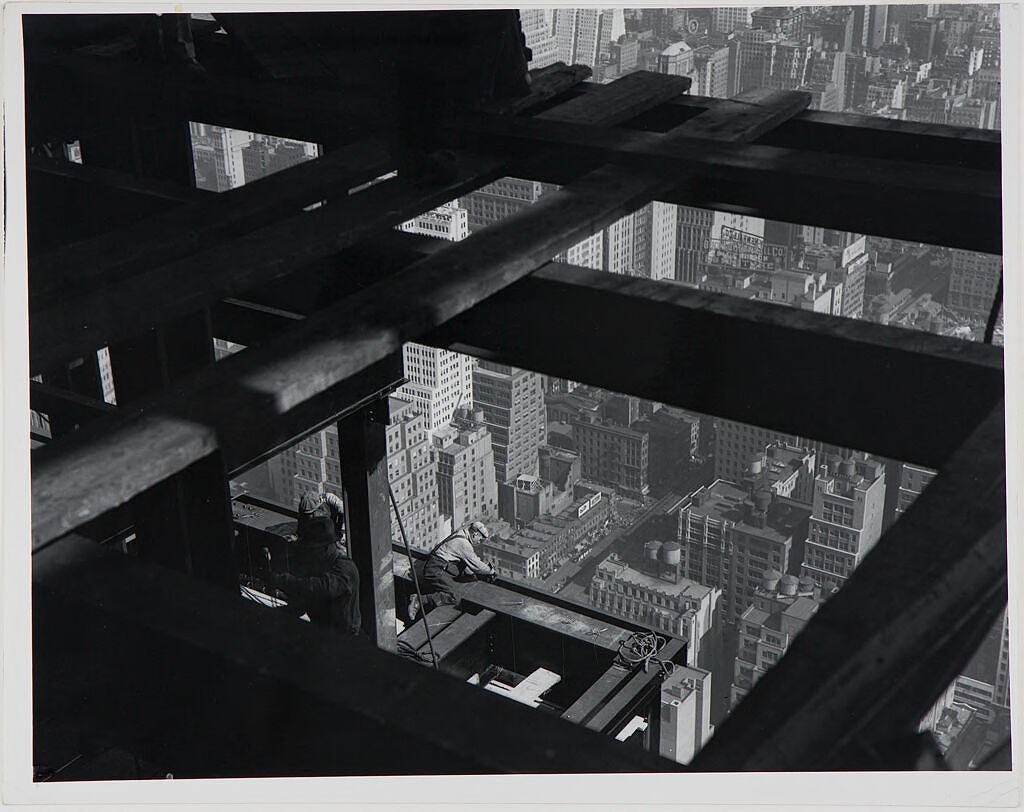
Lewis Wickes Hine: Construction--Empire State Building, (1930-1931, printed later)
" … we will sorely miss this sacred inconvenience."
A home becomes a jobsite quickly, without very much fanfare. One minute, I was breakfasting on my front porch, and the next, or at most the moment after, that porch was being roughly disassembled. I double-locked the front door to prevent anyone, me included, from inadvertently stepping out into air improved only by naked joists. The idea that such a thing could happen haunted me every time I passed by that door through the first weeks. The view out the bottom-of-the-stairs window became a peek into the progress of the deconstruction and the following rebuilding. I stepped around construction materials to set sprinklers and tried to remember to move the vehicles before the work crew blocked the driveway every morning. The whole rhythm of my life changed.
A work crew seems the rough equivalent of a haunting.
Weekly Writing Summary For The Week Ending 8/29/2024
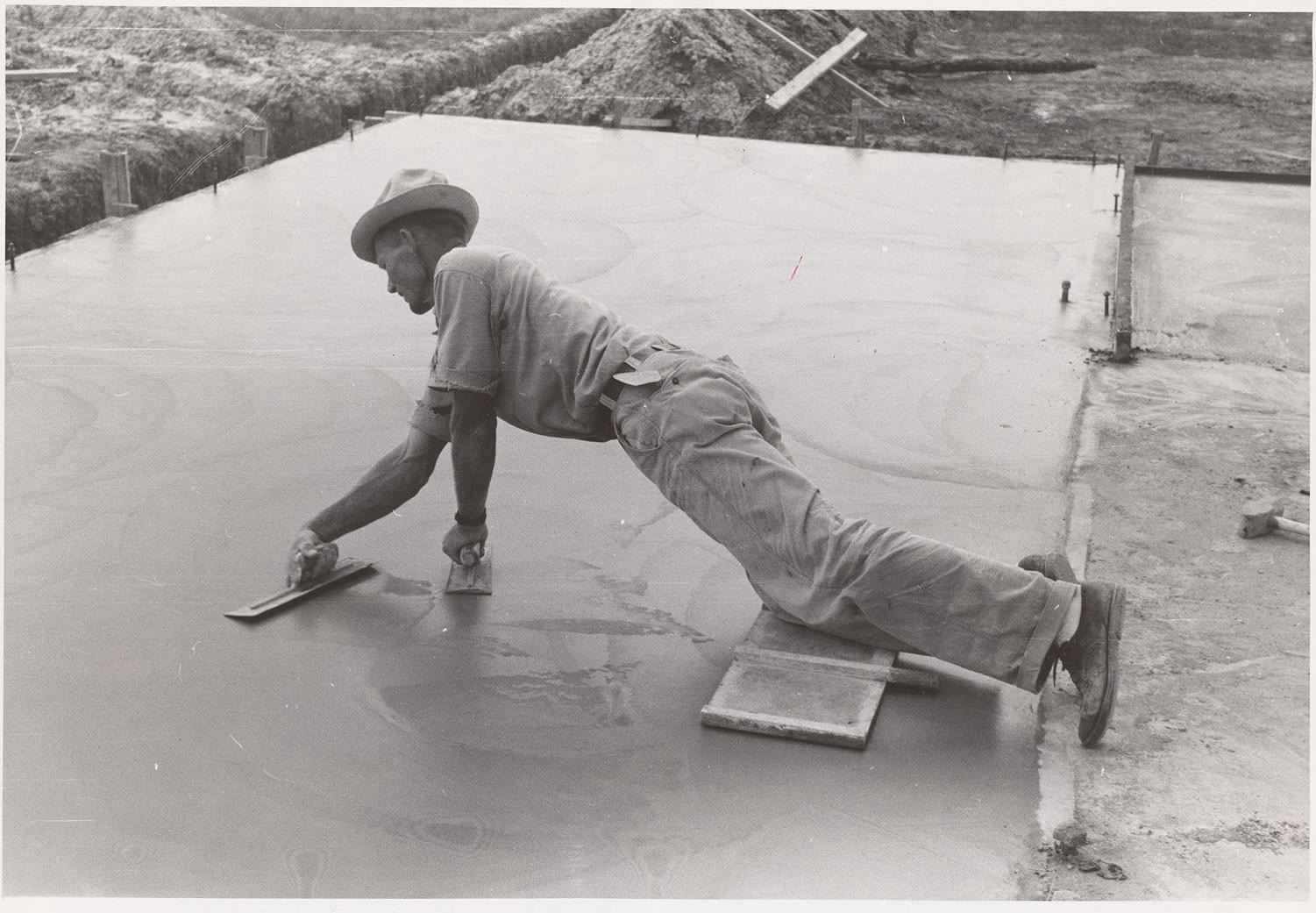
Russell Lee:
Smoothing concrete floor at migrant camp
under construction at Sinton, Texas (1939)
United States. Farm Security Administration
Pride As Well As Purpose
This writing week might have served as a reminder of the necessity of deliberately choosing the terms and conditions I'm pursuing. I can default to a mindset believing I'm somehow destined to succeed, but neither success nor failure usually operates so inadvertently. Deliberate choice might not guarantee a damned thing in this world other than clarity of purpose, though satisfying purpose cannot usually be guaranteed. Clarity helps identify failures more often than it ever guarantees success, and while clarity of purpose might best guarantee disappointment, that clarity remains important. For instance, a fresh choice can feel renewing when overrunning original purpose, even in the light of certain impending failure. One dream ending into an alternate beginning might make a meaningful difference. I'm usually tempted to ride a losing horse until a little after losing the original contest, when I could have switched horses well before losing the race, and I can almost always project that I'll lose. It might even be possible to feel pretty damned successful without ever once even finishing any individual contest, taking pride as well as purpose switching horses.
ThePour
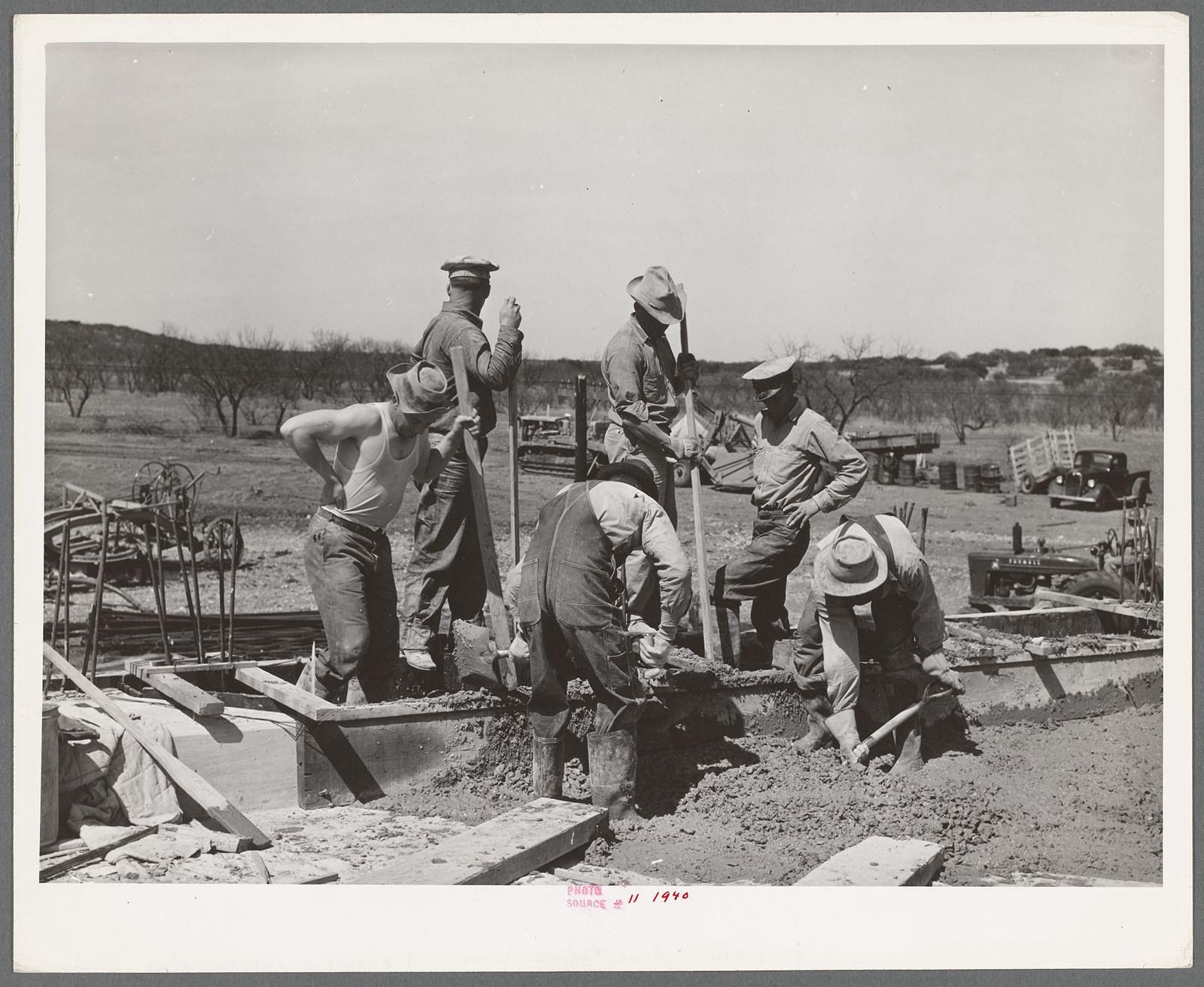
Russell Lee:
Road worker mixing concrete in Menard County, Texas (1940)
United States. Farm Security Administration
"I swear I'm just along for the ride."
Ten days later, we might have recovered our porch refurbishing project. A bungled footing pour had set the effort back by requiring some remedial reengineering and considerable additional digging. Four failed inspections, and the inspector still needed to clear for ThePour, which had sometimes seemed like a mythical, perhaps unattainable future objective. The morning of ThePour, we still had yet to receive the requisite permission. I stopped by the job site to chew Pablo, our concrete contractor, a "new one," telling him to stop fucking me and do his job. "We will pass this morning's inspection," I insisted more confidently than I should have. He started explaining to me that one footing might not yet have been dug deep enough, that he might have to jackhammer out the sidewalk and dig from the top down rather than from the side in. "Fine," I replied, "Whatever it takes."
I left it at that, leaving to take our GrandOther to school, promising to return in an hour.
ComingToFuckingJesus

Franz Stuck: The Guardian of Paradise (1889)
"I might convene my ComingToFuckingJesus Meeting,
but nobody even remotely resembling Jesus ever attends."
I am, by nature, a patient man. I am taken to making generous interpretations. I think of myself as forgiving to a fault. I travel without the burden of grudges. I have never been obsessed with the presence of even imagined enemies. I am, in short, usually happily oblivious. Go ahead, take mean advantage of me. I'm unlikely to seek redress in the thoroughly unlikely event that I notice. I am a well-known and long-standing schlemiel, born to be humiliated. But even I have my limit. I rarely experience it, but somebody will likely hear about it when it finally appears. I'm likely to convene what I call a ComeToFuckingJesus Meeting to air my ill feelings. I will expect contrition and compliance from the target of my considerable vehemence. I will come pissed and usually surprise myself with the swiftness of my truly terrible sword.
I am not now, if I ever was, a Christian.
Successable

Franz von Stuck: Verwundete Amazone [Wounded Amazon] (1905)
" … if only we were clever enough to insist upon those more infinite terms of engagement."
Success has ten thousand identities, from the simplest-minded to the sublime. The simplest-minded achievements are those where some winner takes all, where a student earns straight As, and the quarterhorse takes the crown. The more nuanced successes are more common, ones where criteria seem ambiguous and some higher-order judgment appears to be required to even coherently aspire. A mentor of mine reminded me to begin every critique by appreciating that something even appeared on the page, for that alone might qualify as a miracle. Few experiences can be appropriately characterized as total losses; even last place still finishes a race. A firm belief in the possibility of absolute success was never required to enter a race. Once the odds turn against a competitor, it rarely makes much sense to insist upon belief in an unlikely ultimate victory. Choose your success criteria carefully.
It matters which game you're playing.
ReInspecting

François Boucher:
Landscape with Rustic Cottage (c. 1760)
" … an essence of ProjectCommunity."
Failing that first inspection threw our porch remodeling project into some chaos. We started insisting upon dotting 'i's and crossing 't's, which affected momentum. Our concrete contractors found another project to entertain them while waiting for the city to mark where utility lines lay. A couple of days later, we decided that since they would be digging with shovels rather than backhoes, we would be unlikely to get into trouble if we just went ahead and started digging around the offending footings. You might remember that the inspector found the footings too shallow and that the engineer had prescribed simply digging deeper beneath the four load-bearing points along the footing. The crew quickly dug the prescribed depth and dimensions on three of the four load-bearing points. I ordered a second inspection before they'd finished the fourth point, which looked to be a more difficult dig. The inspector appeared at the appointed hour, though the contractors didn't.
It was clear that the work was not yet complete.
Reunion

Louis Monza: Corn Eaters Reunion (1940s)
"Life would be tragic if it weren't so goddamned beautiful sometimes!"
She insisted that she would not attend, that the experience would prove too painful to bear. She had helped organize the last reunion. She had participated but with a role to play, a role she could hide behind. She had been charged with taking pictures, and she'd successfully hidden behind her camera so she could witness without engaging. She felt too vulnerable and exposed this time, so she wouldn't go.
Then she told the most remarkable story.
ReckoningWith
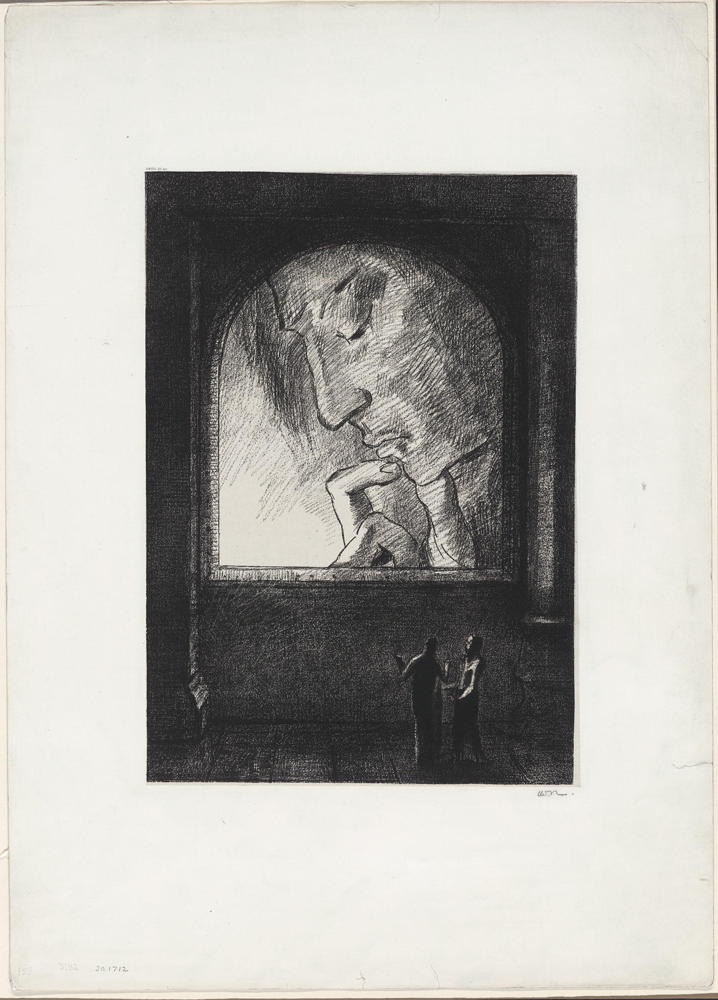
Odilon Redon: Light (1893)
Reckoning With
They insist that you are a force to be reckoned with,
but I perceive you’re much different.
While you undoubtedly are a force
that sometimes requires some Reckoning With,
this characterization misses more essential elements,
for you are, first and foremost, A Woman Of Substance,
not merely of force,
and any attempt to reduce your presence
to one of the baser elements misses points.
Weekly Writing Summary For The Week Ending 8/22/2024

Claude Monet: Étretat: The Beach and the Falaise d’Amont (1885)
Nothing Else To Find
I might be the most fortunate SOB in this universe. Even so, not everything in my life goes according to plan. Heck, only some things I do seem necessarily planable, but I abide. I have been aging every inch of my way, though aging, being almost imperceptible from day to day, never seems prominent. I take stock each year as Summer starts waning and my birthday reappears. The Muse's birthday follows a few days later, and in the course of a week, we've successfully recalibrated. I nap more than I used to. I hesitate more before writing. When I started this writing streak seven years ago, I seemed fearless, though cluelessness more likely explains my behavior.
I worry whether my writing will prove up to standard, a standard I have yet to define or enforce. I do not want to live on purpose but on something more like an accident. I want what I create to remain mysterious, if not necessarily to my readers. I prefer to believe it's an expression more than a creation; creations need too much deliberation and design before beginning. I cannot command that I be spontaneous, for that command co-opts what spontaneity requires. I might live accidentally on purpose, the purpose an emergent property of engagement. It must not be all that important that I know beforehand what I'll create, but more necessary that I discover something I can relate to when creating or just after. I still do not know how to write, though I'm coming to understand when to write. I might have nothing else to find if I can muster the foolhardiness to write when it's time.
Flipped
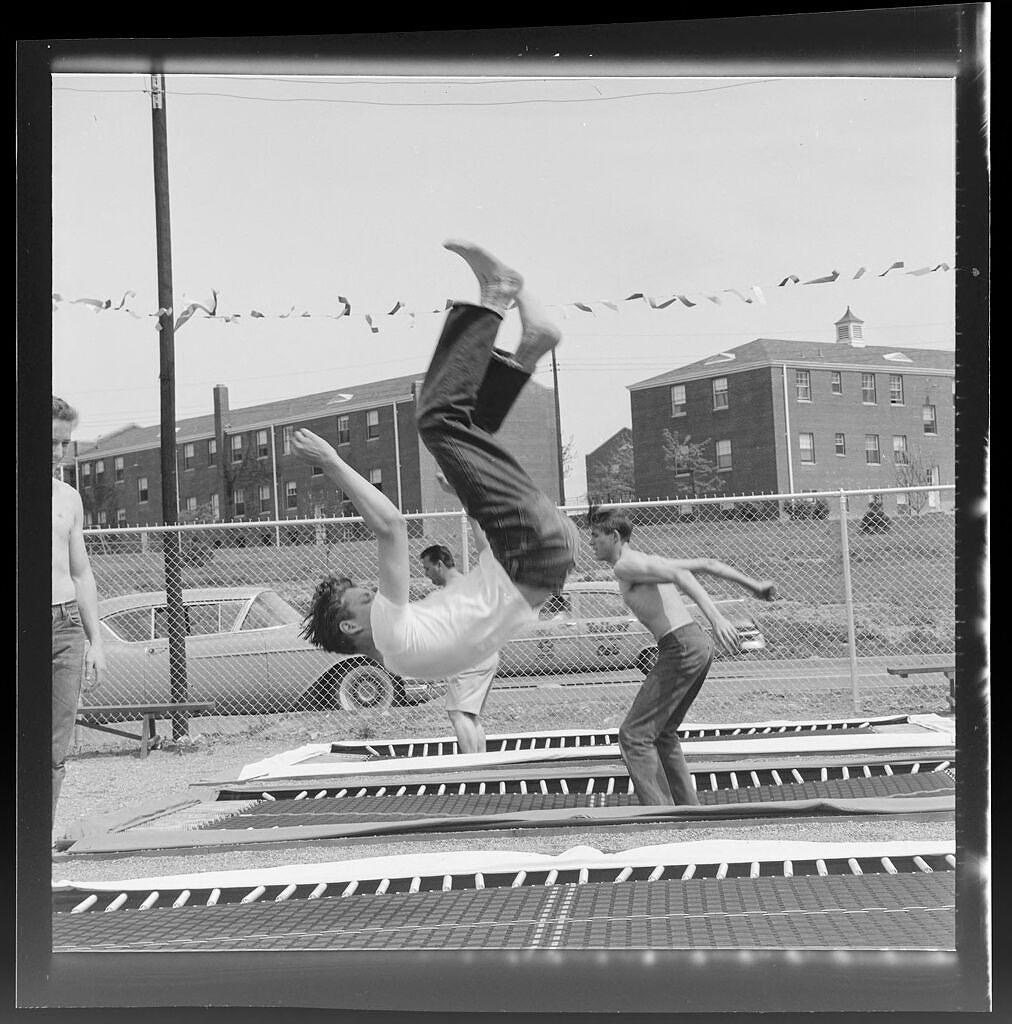
Jack Gould: Untitled [boy doing backflip on trampoline] (c. 1950)
"Weird seems to be the word of the moment."
Early yesterday morning or the morning before, I Googled "Jamie Raskin Speech At DNC" to find Representative Raskin's Banana Republican speech, which I'd seen mentioned in a New York Times piece. I'm a huge Raskin fan. We lived just around the corner from him when we were exiled to The People's Republic of Takoma Park in Maryland, and I appreciate his wisdom and wit. We also share the tragedy of losing a child filled with promise for our future. Having survived two bouts with Cancer, he seems exceptionally courageous and purposeful, the soul of effective opposition to the Banana Republicans. He also stood as a manager of the House's January 6 hearings. He chose the right side of history when making it. Google delivered the link, and I clicked on it, whereupon the Google Gods selected an appropriate advertisement as a preface, for, if anything, the algorithm is known for its prescient context sensitivity.
It served up one of those rambling, incoherent Trump ads featuring the chief Banana Republican failing to make either a case or a point.
GiftsDiffering
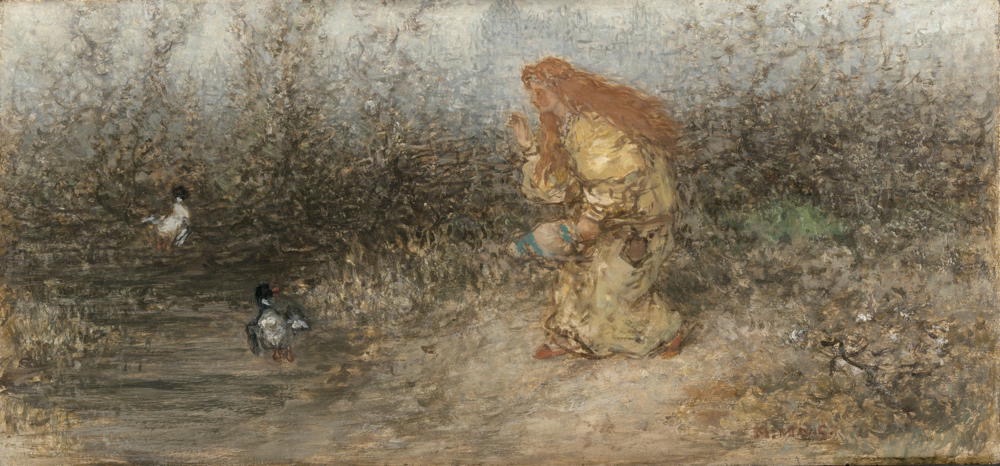
Matthijs Maris: Fairytale ( c. 1877)
" … surprise and perhaps even delight us in the end."
Gifts Differing: Understanding Personality Type, a 1980 book written by Isabel Briggs Myers, introduced me to the study of different gifts people bring to their lives and their work. Before I read this book, I naively presumed that my behavior represented normal responses while everyone else's was some variant of weird. I was not wrong in these early assessments; I was just a little incomplete, for coming to know my perspective just began my understanding. My perspective remains my base understanding, for how could it be otherwise? I have never experienced anything from another's perspective, and nobody else has ever shared mine. I remain unique but not necessarily typical, just like everybody. We remain steadfastly different but not unclassifiable. We each tend toward some common differences; those of us more comfortable with introverting are often more alike than we seem when compared with those preferring extroversion. If one does not get too awfully tangled up in their perspective, one might come to perceive others simply being themselves: perhaps weird but not necessarily wrong: different.
The few people populating our porch refurbishment project couldn't be more different.
Sacraments

Carla Liss, Designed by George Maciunas,
Published by Fluxus: Sacrament Fluxkit (early 1970s)
" … enough to fully satisfy our legacy …"
On my birthday or thereabouts, The Muse and I escape whatever life we're living to engage in an annual ritual as sacred as Christmas. We flee to the edge of the backcountry, on the border of the Winaha/Tucannon Wilderness, to partake of an indigenous fruit, the Winaha Currant. We accidentally discovered them decades ago when on an otherwise routine mountain toodle. We found bushes leaden with clusters of lush black fruit emitting an overwhelmingly alluring scent and tasting quite extraordinary. We hesitantly waded into the adjacent chilling stream and commenced to harvest the fruit, punctuating our work with greedy, lip-staining nibbles of our prey. We returned that first day with a couple of plastic bags of fruit, enough to produce some reduction for use in the kitchen: an unusual drizzle over meat or dessert: Sweet but perfumy, Savory, and absolutely unique. These were not quite the generic black currents popular throughout Europe but a New World variant as unique as our region.
We found that first foray into Current-gathering more than refreshing.
Redemption

John Singer Sargent: Death and Victory (1922)
" … the forgivable sin of project work."
Last week ended in deep disappointment. The porch refurbishment project had become an embarrassment. I sent the concrete crew home or off to another job pending a reply from the consulting engineer. I remember cursing the stipulation that this job needed an engineering report, clear evidence of needless regulation, and another thousand dollars spent to dubious effect. I'm learning that every resource this effort has attracted has been a critical puzzle piece, their importance sometimes puzzling until some moment of extremes. We'd failed our inspection—well, actually, the footing poured by Pablo, the concrete contractor, and his crew had fallen short of expectations. It's interesting how I included myself when ascribing guilt. I wanted no blaming or finger-pointing. We were either laboring in concert or wasting our time, so I owned my part in the disaster. We might have avoided the failed inspection if I had been more attentive and insistent. We failed it, as we also failed ourselves.
The inspector insisted that he would approve any plan approved by the consulting engineer if it was executed according to plan.
MovingOut/In/Up/On
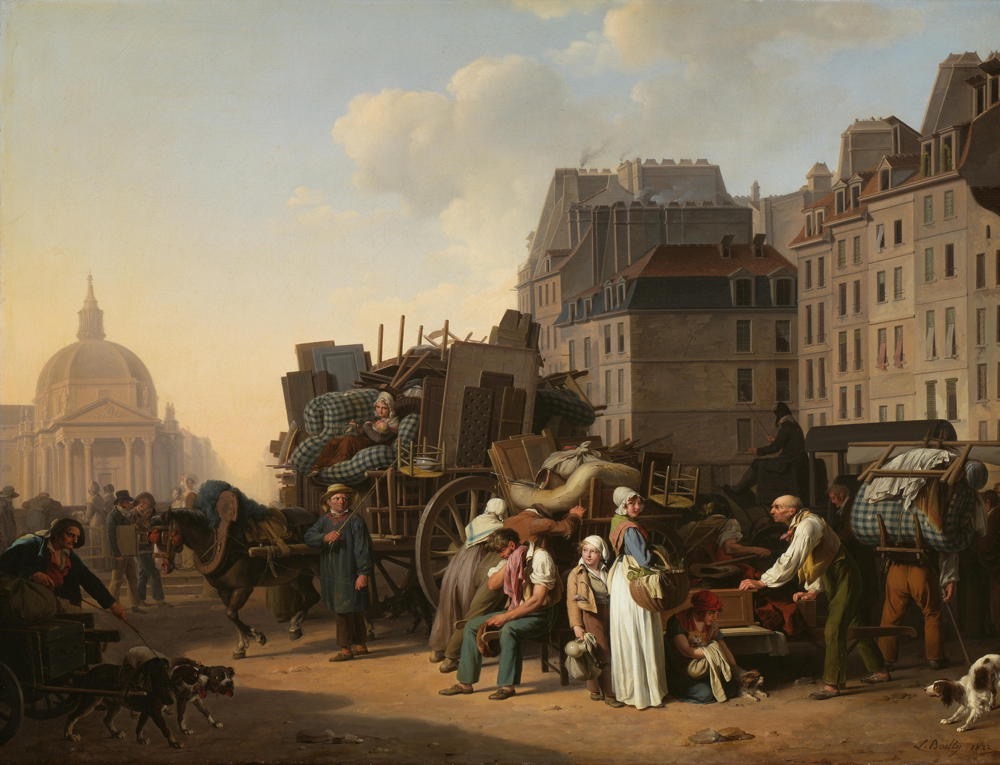
Louis Léopold Boilly: The Movings (1822)
" … every damned one of those takes considerable getting used to."
Of all human activities, Moving might be the most illuminating. When Moving, one becomes perhaps both their most vulnerable and their most liberated. Displaced, even temporarily, reveals many hidden edges and allows for much discovery, especially the sort one had sincerely hoped to avoid. Pull a dresser away from a wall and find the remnants of some earlier inattention, like a pair of cobweb-covered underwear. Idealy, Moving should only be attempted in private, but some possessions, like the infamous hide-a-bed, require at least a crew of two to move and, even then, will insist upon opening up when halfway up the stairs. The first and last scenes in many popular stories involve Moving, with the hero leaving on their defining journey and then returning to move on into another realm. There never seems to be any actual coming home, only MovingOut/In/Up/On.
I've been blessed with the opportunity to assist my son Wilder in his latest MovingOut/In/Up/On.
BackAlmostToGo
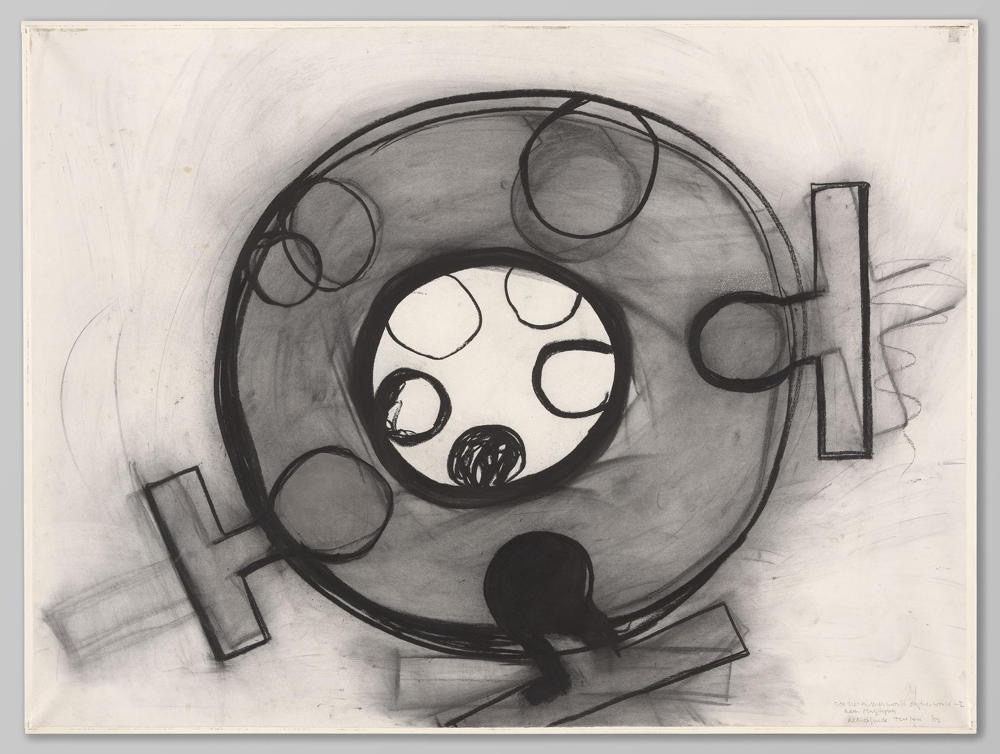
Kees de Goede: Studie Innerworld Outerworld I/, Naar Mug Stegner
[Study Innerworld Outerworld I/, To Mug Stegner] (1987)
" … I'll be faunching to get moving again."
A certain cadence profoundly influences every activity on this planet, or seems to. Time, as some wag noted, prevents everything from happening at once, but little prevents anyone from occasionally getting far ahead of themselves. This usually happens for all the proper reasons, with good intentions often contributing more than their fair share. Whatever the cause, the effect, if not permanent, does tend to be relatively immediate. A brick wall steps sideways into traffic. An unanticipated force field steals momentum. We get directed to head BackAlmostToGo without collecting our two hundred dollars. We seem incapable of seeing these experiences coming, even though they most often occur like a proverbial slow-moving train. After, we complain about how our senses must have left us behind, about how we must have become temporarily blinded. We're wary for a while after, sensing that our senses hide something essential from us. Our senses were never not withholding much of our experience from us. We register only tiny fractions of the perturbations around us, and we ignore many of those we experience as trivial or unimportant. Importance comes later if, indeed, it ever comes at all.
My latest fall came with the first inspection, a visit The Muse and I invited when it really should have been the contractor inviting.
Weekly Writing Summary For The Week Ending 8/15/2024
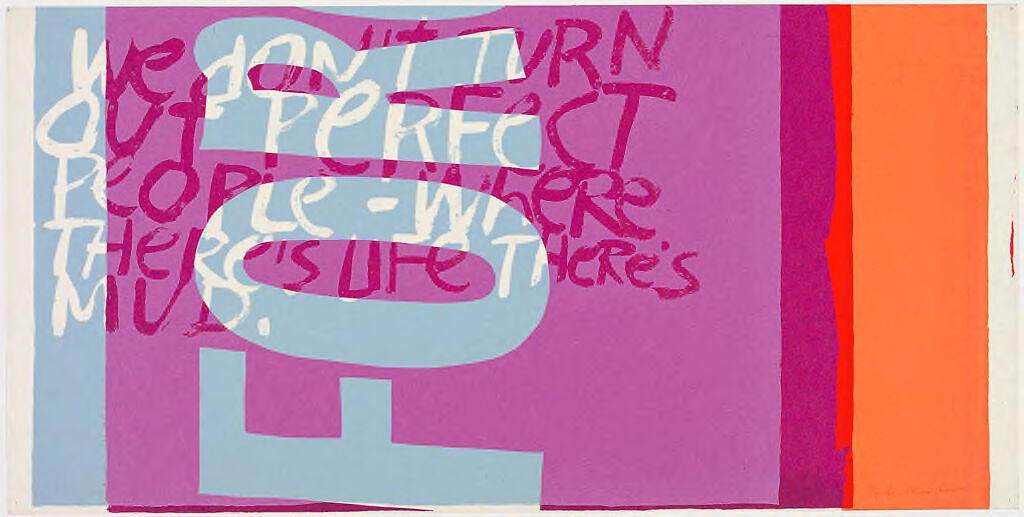
Corita Kent (Sister Mary Corita):
where there's life there's mud (1966)
Printed text reads: FOR[GET IT] /
we don't turn out perfect people
- where there's life there's mud.
Harvard Art Museums/Fogg Museum,
Margaret Fisher Fund
Copyright © Courtesy of the Corita Art Center,
Immaculate Heart Community, Los Angeles /
Artists Rights Society (ARS), New York
Once Upon A Time Aspired
As an acknowledged expert at project work, I would be remiss if I considered this designation to be an inoculation against experiencing any of what projects routinely serve their sponsor. One cannot avoid the inevitable, though one may, if remarkably clever, come to understand that inevitables say nothing about anyone's mastery or understanding. Acknowledged masters managed some of the most significant failures in the history of projects, and most of them eventually became godsends once the people involved accepted that they never were nor could have been in charge. Grace often arrives in sackcloth and shame, only to later tame discouragement. I cannot count the number of blessings I've experienced that were clearly curses when they arrived. It took time and patience for the universe to align around how the grand plan actually turned out. Nobody's very well positioned for determining success or failure as long as either metric seems to matter. Later, often much later, the blessing slips out from behind her disguise, and Grace sets down to have a spot of supper with you. Not one of us are masters, and none have an ounce of worthwhile advice between us. We're all still subject to the capricious winds and capacious disappointments. Not one of us was ever perfect, though several of us once upon a time aspired to become so. "Where there's life there's mud!" Sister Maria Corita
GoldenRules
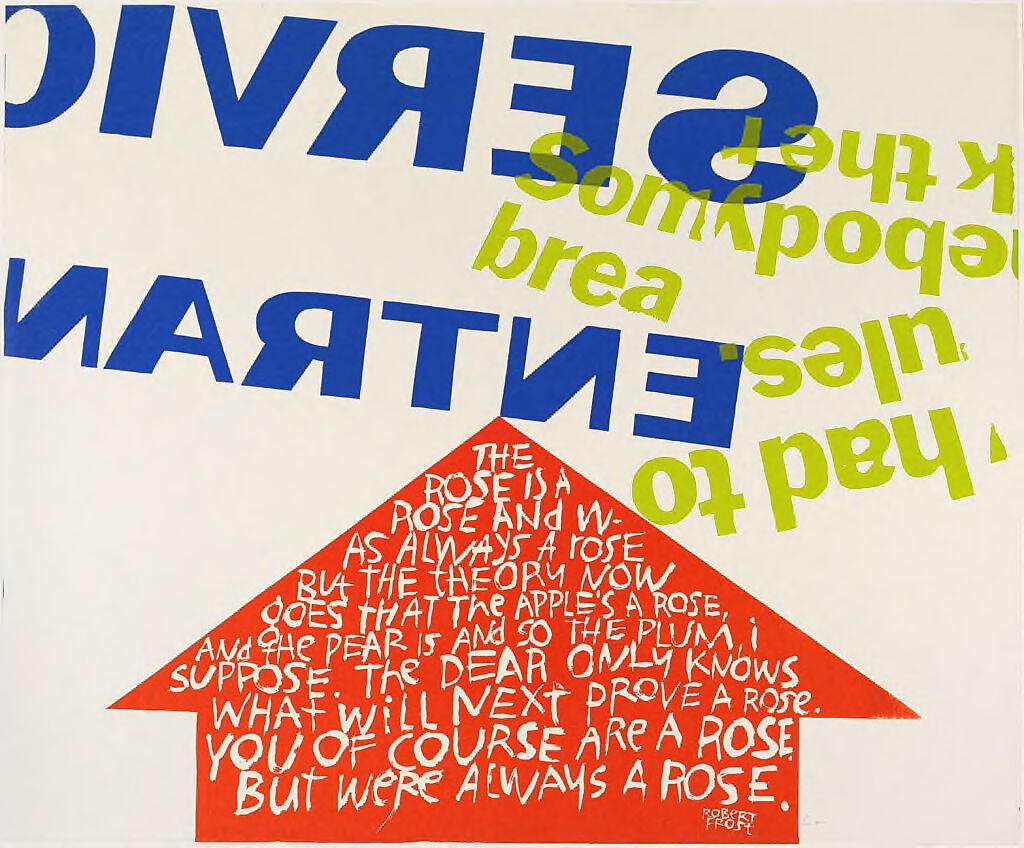
Corita Kent (Sister Mary Corita):
somebody had to break the rules (1967)
Screen print
The printed text reads: SERVIC[E] ENTRAN[CE] / somebody had to break the rules / The rose is a rose and was always a rose but the theory now goes that apple's a rose, and the pear is and so the plum, i suppose. The dear only knows what will next prove a rose. You of course are a rose. But were always a rose. Robert Frost
Credit Line: Harvard Art Museums/Fogg Museum, Margaret Fisher Fund
Copyright © Courtesy of the Corita Art Center, Immaculate Heart Community, Los Angeles / Artists Rights Society (ARS), New York
"I wonder every morning how I should live."
The question remains open regardless of how often it's answered: How should I live? It might be better understood to wonder, 'How should I live now?' because, with shifting contexts and ever-accumulating experiences, one's response might reasonably change over time. The aspiration to answer this question once and for all might be universal, for it's as inherently unsettling of a question as it is also apparently definitively unanswerable. I have caught myself getting glib in the face of it, resorting to some Hallmark® Card homily as if that might dispatch the troubling issue. I try to do unto others as I'd prefer them to do unto me, The Golden Rule, even though I know not everyone might appreciate what I’d warmly receive. I considered The Platinum Rule an improvement—to do unto others what they want to have done unto them—until I realized that I rarely have access to what others want to have done unto them. I'm not omniscient. Further, even if I knew focusing on their bare want could quickly get me into trouble or violate my own better intentions. I wouldn't want to supply drugs to a person with an addiction to satisfy some Platinum Rule.
The forms of these rules never change.
Inspecting
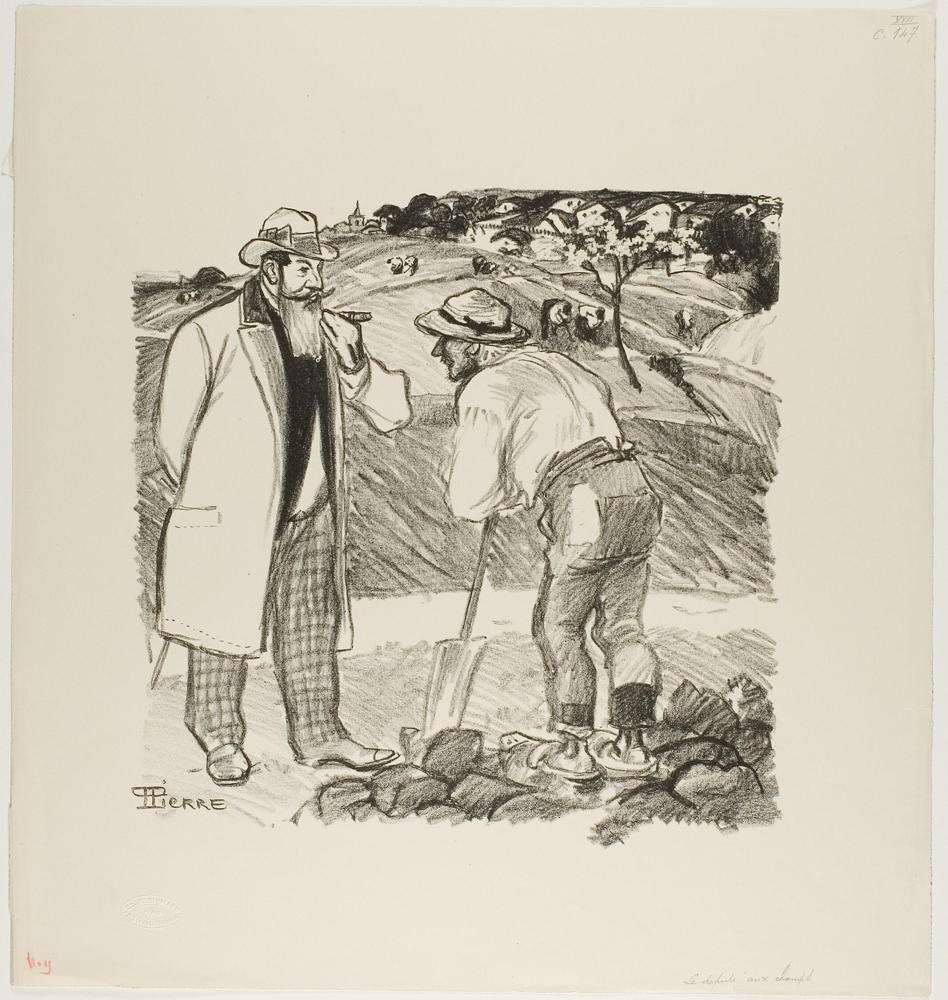
Théophile-Alexandre Steinlen:
The Field Inspector (April 1894)
"Placating paves more streets than protesting ever did."
When we finally collected the permit required to start our porch project, after nearly two long years of failing to satisfy its requirements, I asked about inspections because I didn't know the rules. The permit person said our contractor would know when to call for inspections, so I set that issue aside as beyond my purview. I had not thought another second about Inspecting until late yesterday afternoon when Joel, our carpenter, dropped by to survey progress. The footing had been poured that afternoon, and all seemed right with the world. Joel asked if the inspector had visited yet. He hadn't, as far as I knew, but I had not been trying to stay in the know on that issue. Joel went on to say that said inspector might insist that we encase the porch deck supports in concrete, too, and that he usually wants to see the rebar inside a form before concrete's poured. However, he often happily assumes the work was done properly if he knows the contractor. The footing concrete has already been poured. He could insist, if he wanted to be a real son-of-a-bitch, that we remove the newly poured footing to confirm it has the required rebar embedded in it.
This practice should be confusing because I'm not now and have never even aspired to become a member of the contractor society that lives and dies by the judgments and rulings of city inspectors.
Designering

Heinrich Aldegrever:
Ornamental Design with a Bat in the Centre (1550)
"We approximately understand what we're doing …"
Design, like almost everything, seems different in theory than it does in practice. In theory, Design must be complete before construction begins. Practice finds considerable overlap. We might diligently try to fully flesh out aspirations beforehand, but our context shifts once we start moving dirt. We often cannot foresee what will become evident after we've exposed rafters and taken down walls. More than fine-tuning occurs regardless of how complete the design seemed during preliminary discussions. The contractor holds more responsibility than they'd ever willingly contract to deliver and always have. They're most likely to notice the small incongruences that could explode into disaster. They're the ones present to see the plan's emerging incompleteness. They're the ones tacitly charged with continually asking the most uncomfortable questions.
Spontaneously mustered conferences are called. Jesse, the structural guy who will perform the follow-on effort, held clues for the foundation builders and vice-versa.
LevelSetting
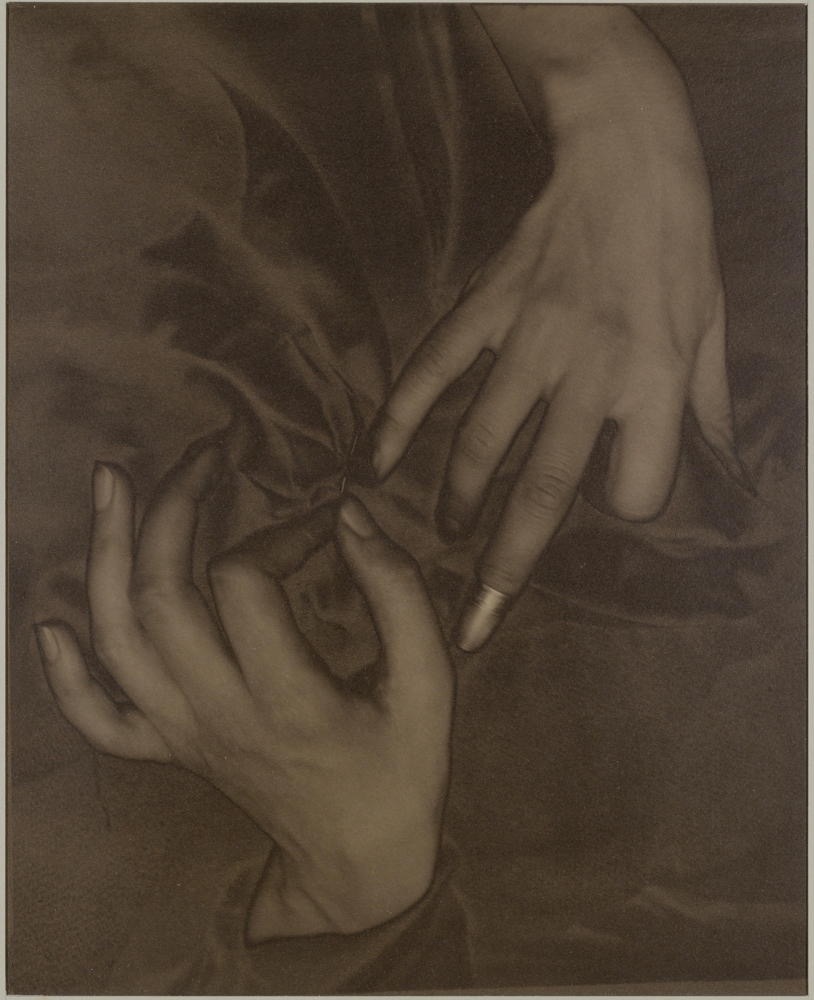
Alfred Stieglitz:
Georgia O’Keeffe—Hands and Thimble (1919)
"I'll insist on seeing level even if some crookedness persists …"
On the third day, brick removed, the concrete contractors started pulling string and finding plumb. I asked Pablo if he was doing that, and when he confirmed, I cautioned him that many had sought level and plumb in the old house, but they had yet to find it. He insisted that he would persist and lay a footing upon which a level and plumb front porch would permanently rest. The Muse and I left town for the weekend while his crew prepared to quit by noon that Friday. I'm watering around the works this morning, waiting for the crew to arrive to start fitting rebar into the space. Tomorrow, I expect some concrete will be delivered, and the permanent part of the effort will commence on just the fifth day of work.
Pablo moves sure and fast.
FuturesPassing
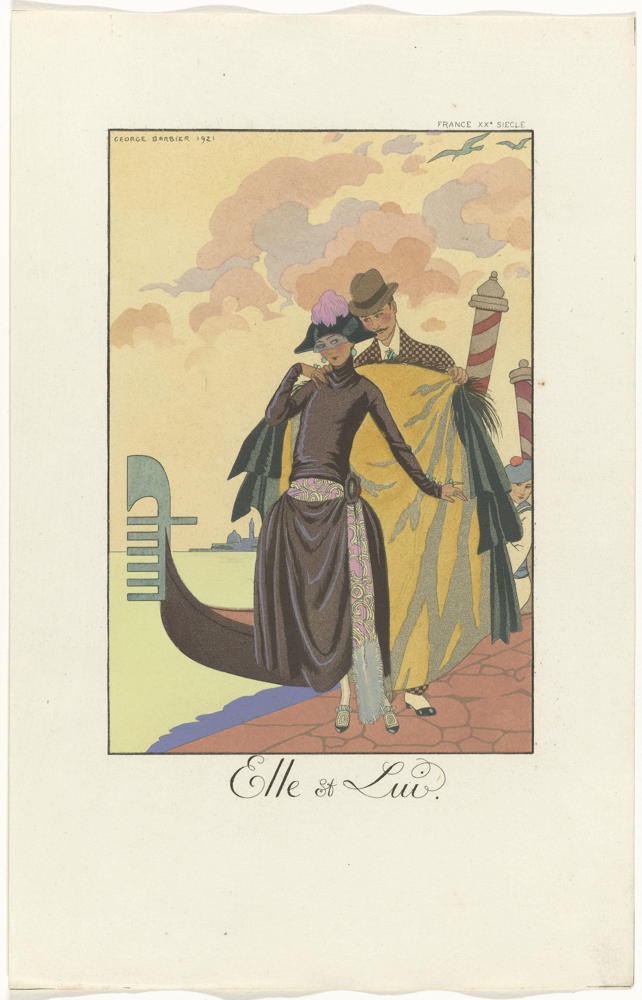
George Barbier: Falbalas et Fanfreluches: almanach des modes présentes, passées & futures pour 1922: Elle et Lui / France XXe siècle, [Falbalas and Fanfreluches: almanac of present, past & future fashions for 1922: She and Him / France 20th century,], (1922)
"The future doesn't hold a place for any us, thank heavens."
To a man my age, a trip anywhere becomes a trip into an unwanted future. I might depart aspiring to visit my past but inevitably return having glimpsed a dreaded next. It will likely become much worse than I imagine, but the hints I do glimpse leave me stunned. There was a day when the future seemed promising. Midcentury America featured posters promising flying cars and what now appear to have been early precursors to Spandex®. The flying car notion fell apart when encountering human potential. Had we understood the cost of combustion engine propulsion, we might have retained our attraction to wagons and horses. Still, we were smothering ourselves in horseshit then, and the invisible pollution from the combustion engine seemed a vast improvement. Maybe it was.
I had warmly anticipated a visit to Norstrom's flagship store, remembering when Nordstrom really knew how to run a flagship store.
Aches&Complaints
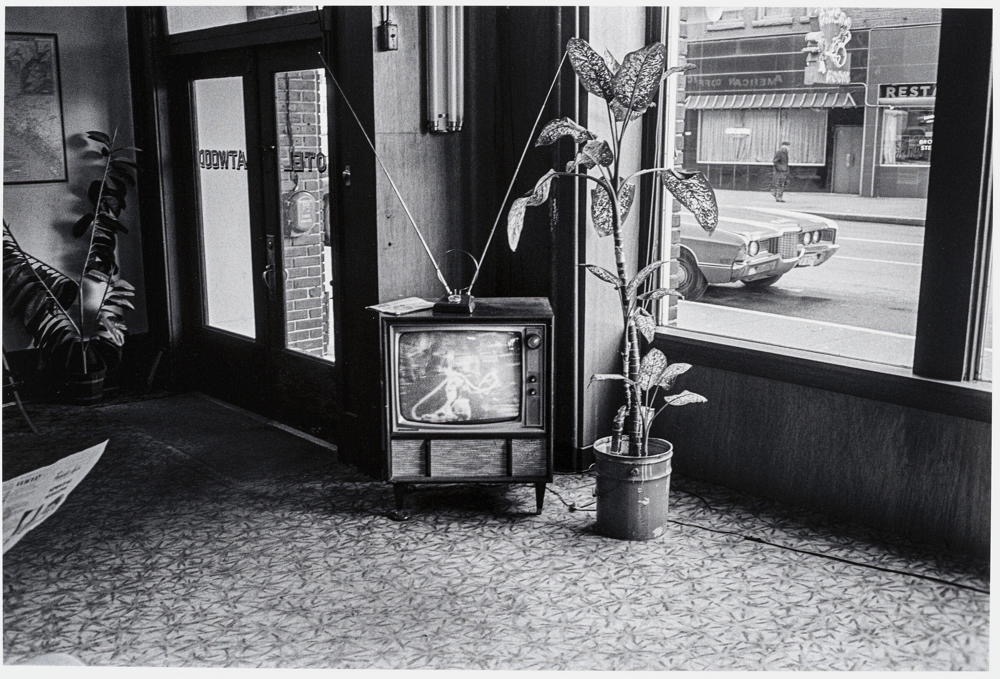
Dennis Feldman: TV and plant in hotel lobby – Seattle, WA – 1974 (1974)
"Sleazeattle embodies the sin of self-importance."
Driving into Seattle from the east on I-90, I was reminded of the many times I'd hitched along that road fifty and then some years ago. I much preferred to hitchhike that route, and as I drive now, I reflect backward on that time and place that no longer exists. Sleazeattle seems all but indistinguishable from the place I knew then. The street names remain unchanged, but everything else has become some post-modern approximation of the authentic article. I explained to The Muse that back then, there was no tunnel on the western side of the Lake Washington Floating Bridge. The freeway emptied onto surface streets that were never not tangled with traffic. We somehow slip through the newer approach and slide the two exits north on I-5 without difficulty, even though it's after five on a Friday. As usual, we must circle a few blocks to get The Schooner properly oriented to the hotel's loading zone. We checked in quickly, and I slipped across the street to park the car in the lot next to the Korean restaurant. Welcome to Belltown again.
We're doing a Jazz Alley show and dress for the occasion.
Weekly Writing Summary For The Week Ending 8/08/2024

Charles Émile Jacque: Summer (1885)
Committing Sins and Seeking Penance
A spare year ago, I first experienced what my internist would later label Bursitis, a mysterious and painful inflammation in something I'd been blissfully ignorant I even had. It seemed like a made-up disorder, even though it kept me from finishing a painting project. I felt I needed that project as repayment of a debt I'd incurred when first refinishing that surface. I had penance to pay, but the Bursitis prevented my repayment. I hired a painter and nursed my shoulder, feeling decrepit. A year later, I'm still learning how to integrate my now definitely more tender shoulder into my existence. I'm learning that if I don't challenge The Bastard Bursitis, it tends to win. When I buck up and engage with it anyway, whatever discomfort I initially feel quickly disappears. The harder I work it, the more it seems to reward me by forgetting to punish me for my indiscretion. This story perfectly fits my predilection. I want to believe that personal gumption overcomes physical affliction, even though I know that notion to be essentially fiction and dangerous. I live an elaborate fiction, growing ever richer with each fresh experience. One day, the sum of my continuing indiscretions will probably catch up to me. Until then, I'll continue committing sins and seeking penance.
QuickStart

Unknown English Artist: Linen, plain weave;
embroidered with wool and silk in tent stitches:
Harvesting (1701/25)
"What began as endless frustration …"
Two days following the FirstMeeting, the porch renovation project enjoyed a QuickStart. By eight-thirty, deck boards were being pried up. By noon, ceiling props were already being placed, and the brick planter wall was demolished. By the end of that first day of actual work, the ceiling had been thoroughly propped, and part of the brick perimeter had already been toppled. I constructed a peanut gallery comprised of a vintage metal lawn chair and a garden bench where Kurt, Our Painter, and I sat through the early afternoon making observations as the crew did what crews have always done. We considered it a credit to Pablo, The Concrete Contractor, that the crew seemed light-hearted, joking good-naturedly while they worked. Pablo occasionally called me over to point out some fresh absurdity in the construction he and his crew were dismantling. One only knows once deconstructing just how flimsy the prior renovation had been, though we had always suspected.
We decided that the brick front had indeed been cosmetic because the columns didn't extend down to the ground.
Denialing
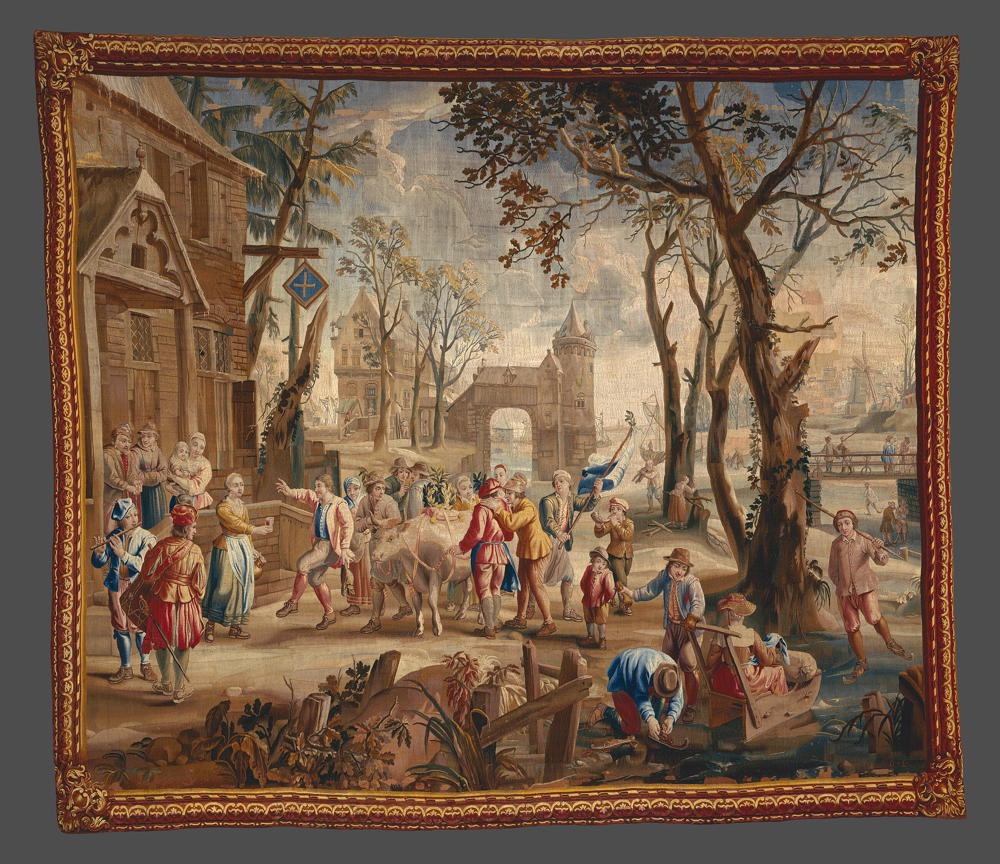
After a design by Jan van Orley
Woven at the workshop of Daniel IV Leyniers:
Procession of the Fat Ox from a Teniers Series (c. 1725)
Denial remains the first stage of acceptance.
"This process should be upsetting."
The true purpose of that First Meeting wasn't satisfied until a second meeting took place. The concrete contractor, the lead player in this production, couldn't make the initial meeting, so we convened a supplemental session for those who couldn't make the first. Pablo, the concrete contractor, and his assistant Wilbur asked harder questions. The conversation began light-heartedly enough but quickly degraded into difficulties, which was precisely its purpose. We tend to start projects filled with promise. We neglect to recognize what must be sacrificed to achieve that promise, and it always comes as a profound surprise when the first hints of underlying costs surface. I began my contribution by suggesting we could support the roof from the top of the deck. I even took Pablo to the basement access panel to survey the underlying infrastructure. He seemed to become thoughtful as I sold my proposal. Once we returned to the front porch, to the top of the deck, Pablo asked the Golden Question.
We had been seeking problems rather than solutions.
FirstMeeting
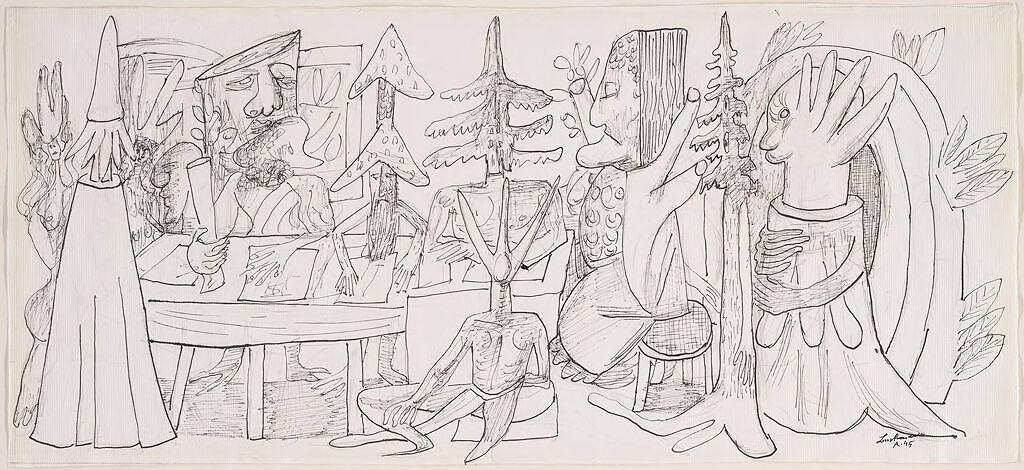
Max Beckmann: Meeting of the Forest Owners (1945)
"Now I understand how I will get to trust him."
The FirstMeeting on any project becomes a defining moment, for this gathering always occurs unselfconsciously. The attendees have yet to fall into whatever identities close association always encourages. They're as close to their shoes-off-selves as they'll ever be, if only because nobody quite knows who they're supposed to be yet. Yes, some will show up intending to show well. Others will come inquisitive, but each will come wrapped in an innocence they will quickly abandon in favor of forward momentum. In this session, patterns will make their first appearance. The group's DNA will be present but not yet fully evident, disclosing only hints. Attendance alone will communicate something, for not everyone will make the meeting. Each explanation should say something about who they might become once they join this ensemble. I try to maintain my attention.
The concrete contractor, by far the most crucial player in the early part of this effort, had his sister, who answers his phone, call fifteen minutes before the scheduled start to explain that he'd had a mechanical failure during a pour and couldn't get away from his current job site for the meeting.
Mustering

Master with the Mousetrap: The Two Armies at the Battle of Ravenna, 1512 (c. 1512, printed 1530)
" … we're rapidly closing that overlong-open window."
The scheming part's over now. We're finally Mustering the forces necessary to affect the changes to the front porch The Muse mandated two summers ago. The project hadn't started, couldn't have started, until after the permit was approved. Before then, we were scheming, projecting, and assessing. Permit approval made this project inevitable and, finally, surprisingly, real. Before, it was theory; now it begins to become practice. Very little's settled yet. We've painted only in the broadest strokes. We've spoken as if we knew even though we couldn't have possibly known. We wanted estimates for an effort nobody could imagine. Once the principals converge to imagine together, we will begin the real work of assessing actual effort and focusing forces. So far, I've given notice that we have approved permits, doubtless a huge and important milestone even though we really haven't started anything yet.
The first presumption of many to die in this effort was the notion that we might keep the mess from intruding into our lives.
HeatExhaustion
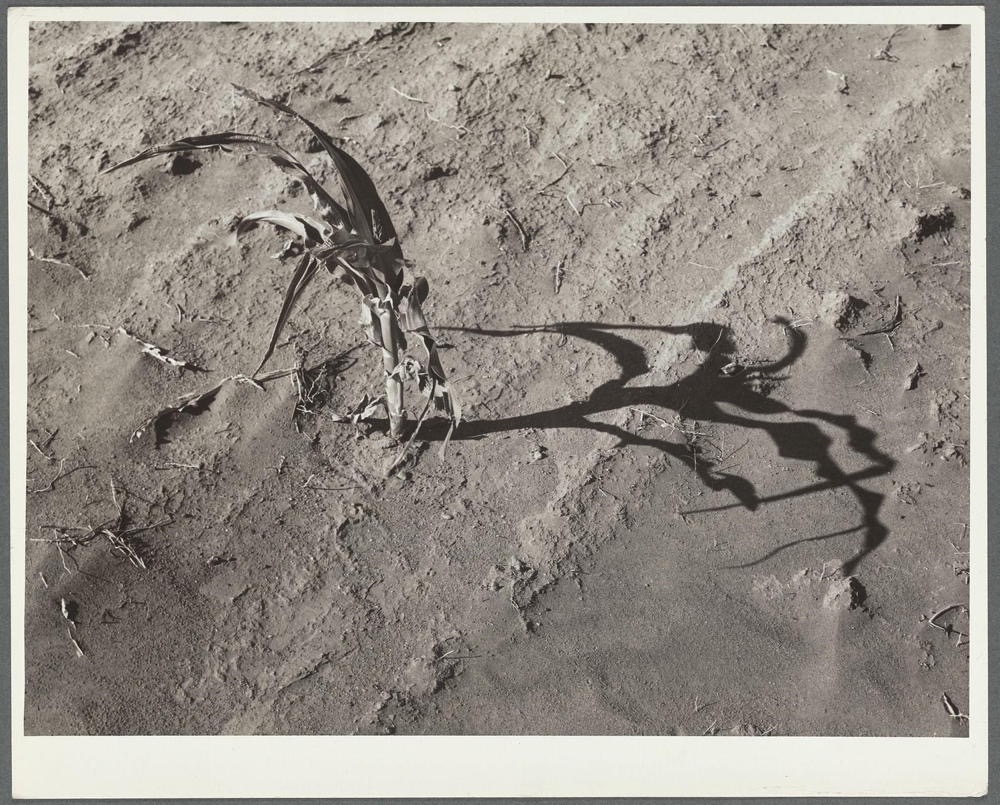
Arthur Rothstein: Corn withered by the heat and chewed by grasshoppers. Terry, Montana (1936)
" … Grace even within this seeming wasteland."
By August, the surface of this valley becomes burnished buff beige. The days start growing noticeably shorter, though they each nonetheless seem endless. On nights when the outside temperature can't even fall below seventy, The Muse opens up the house before she slips into bed when it's still hotter than eighty outside. I wake from fitful sleep to flip my sweaty pillow before finally surrendering to wee-hour wakefulness again. Nights seem no less interminable than days. The cats don't even bother to come inside those nights. They return listless in the morning to leave half their breakfasts uneaten. They hug cool pavement or find a soggy corner of the lawn to lounge on. I envy their soggy corner.
Our basement provides the only respite.
BustinLoose
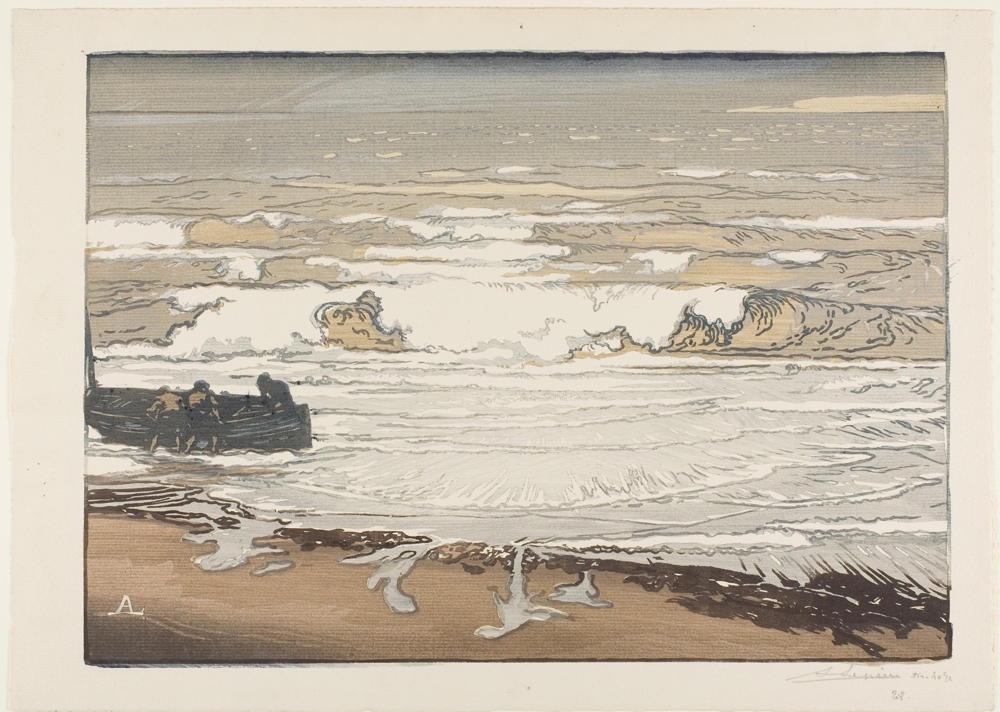
Louis Auguste Lepère: Breaking Waves, September Tide (1901)
" … just gravity or something similar having her way with us again."
If I am to take away any notion from this discontented summer, let it be the conviction that things seem like they will never be any different until a slight difference appears one day; then, things can never be the same again. This abrupt nature of change belies the idea that it might occur gradually, according to the Boiled Frog Theory. However, even in the Boiled Frog Theory, the frog has no sensation of boiling until it is too far gone to be rescued. He, too, senses no change until it "suddenly" becomes inexorable. Then, that familiar lifestyle's already over, never to return. This seems the truer nature of life, of living. We might be forever changing, but we only sense we're changing on relatively rare occasions after it's already inexorable. This is another face of Grace.
Those who claim to be masters of change are probably lying to themselves.
Weekly Writing Summary For The Week Ending 8/01/2024
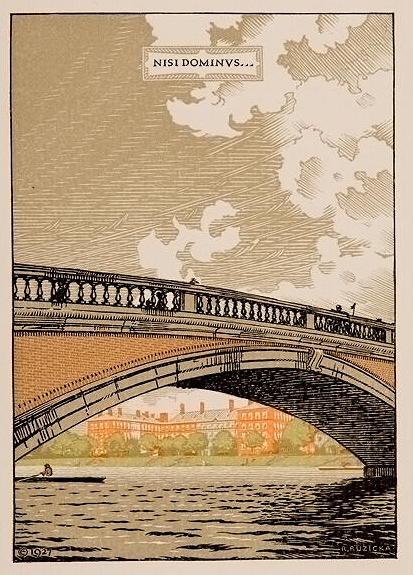
Rudolph Ruzicka:
Weeks Memorial Bridge, Cambridge, Massachusetts
(1927)
Unchangeable Until It Isn't
I have been quietly and happily dispatching long procrastinated chores this summer. Such efforts only commence after I've reached a certain level of self-loathing. I can shove stuff to the back of the closet for only so long, and it's over once I cross that border. I'm not reforming then, not repenting, just entering a later stage of the same form I had been inhabiting. It's a magical time, though. As I convey each clog, another appears, and each seems less daunting to dispatch. I gained a growing sense of personal authority as if I were discovering long-lost superpowers. Those powers were never lost but merely waiting for conducive conditions to arise. This summer of my discontent presents those conducive conditions, like late summer, which presents differing conditions from seemingly endless same-old, same-old days. I might never understand how change arises from sameness, but I can nonetheless depend upon its eventual emergence. Nothing can never be quite the same again, or really even for a first time. It's all different except my discernment, which seems unchangeable until it isn't.
Doubt

Wouter Pietersz II Crabeth: The Incredulity of St Thomas (c. 1626-30)
"I might conclude that confidence isn't required …"
I pity all True Believers, for they cannot experience incredulity, and without that small skill, they become a shill for every come-on and con artist they encounter. The True Believer insists that their faith sustains them while it nibbles away at whatever originally made them human. Only machines seem capable of unambiguous engagement; every other entity reserves something to preserve itself in case it makes an incorrect assessment. We gingerly place a toe in the water before jumping in. We likewise invest as if we could lose everything rather than as if we were sure from the outset to win. Caution trumps certainty—Doubt conditions belief.
My mother ended every phone call I ever had with her by saying, "Well, I don't know much."
Disappointment
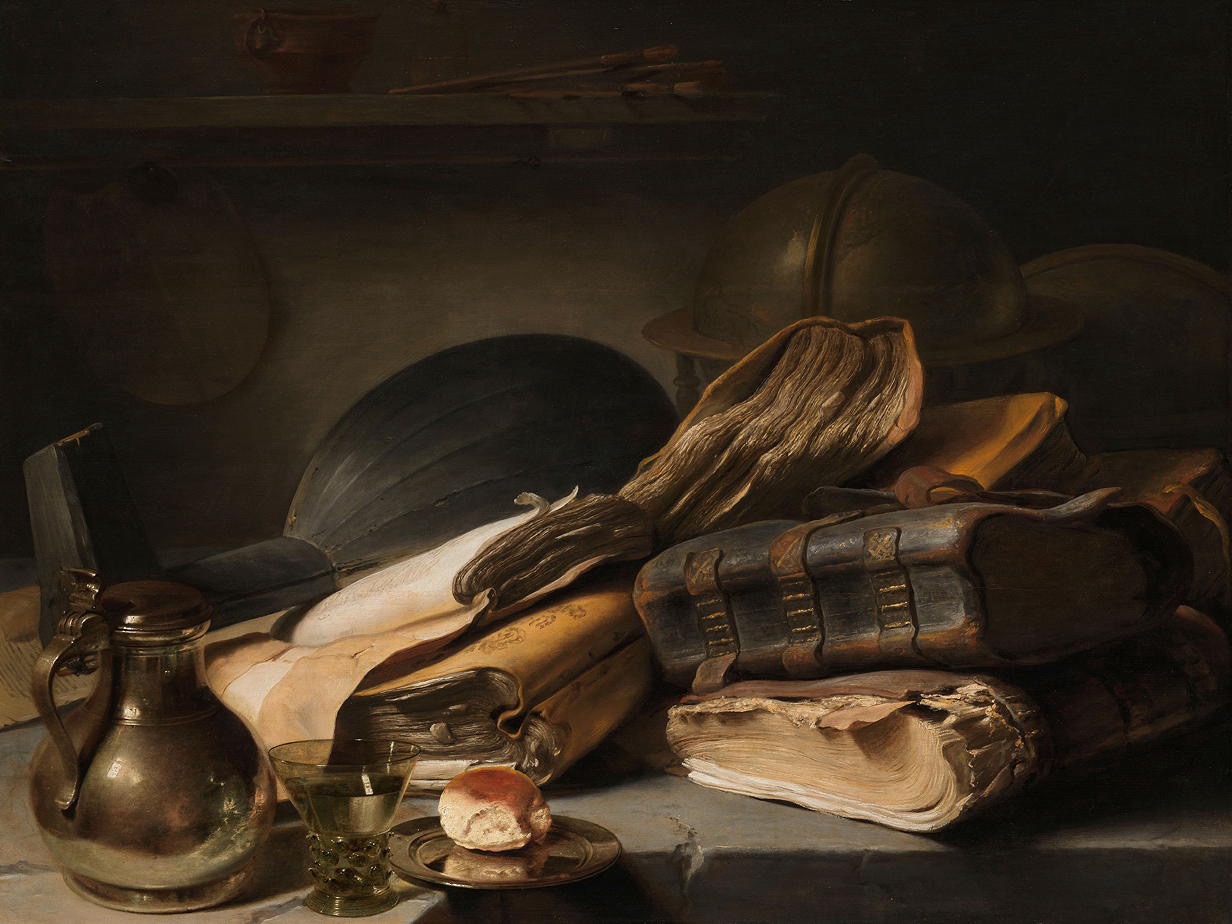
Jan Lievens: Still Life with Books (c. 1627-28)
"Maybe I was meant to f#ck that last one up!"
This world sure can disappoint. It can encourage fantastic aspirations and then fail to reward them. It asks for dreams and then seems to scheme to find ways to undermine them. It wants your best before sending its regrets. We seem somehow destined to fall short of something. Always a fly in the works and one in the ointment. What's anyone to do? We try to remain faithful to largely fallacious ideals. We believe or insist we do, even though we couldn't reason through to resolution, either. Some days, it seems we're all pretending just as hard as we can, actively ignoring the obvious facts at hand. We might not be able to afford to know or afford to understand, so we plan with studied ignorance before blaming the shortfall on happenstance. We inhabit a hyperactive Disappointment machine.
Some people seem less vulnerable, as if they are exempted from the usual consequences.
Delusion
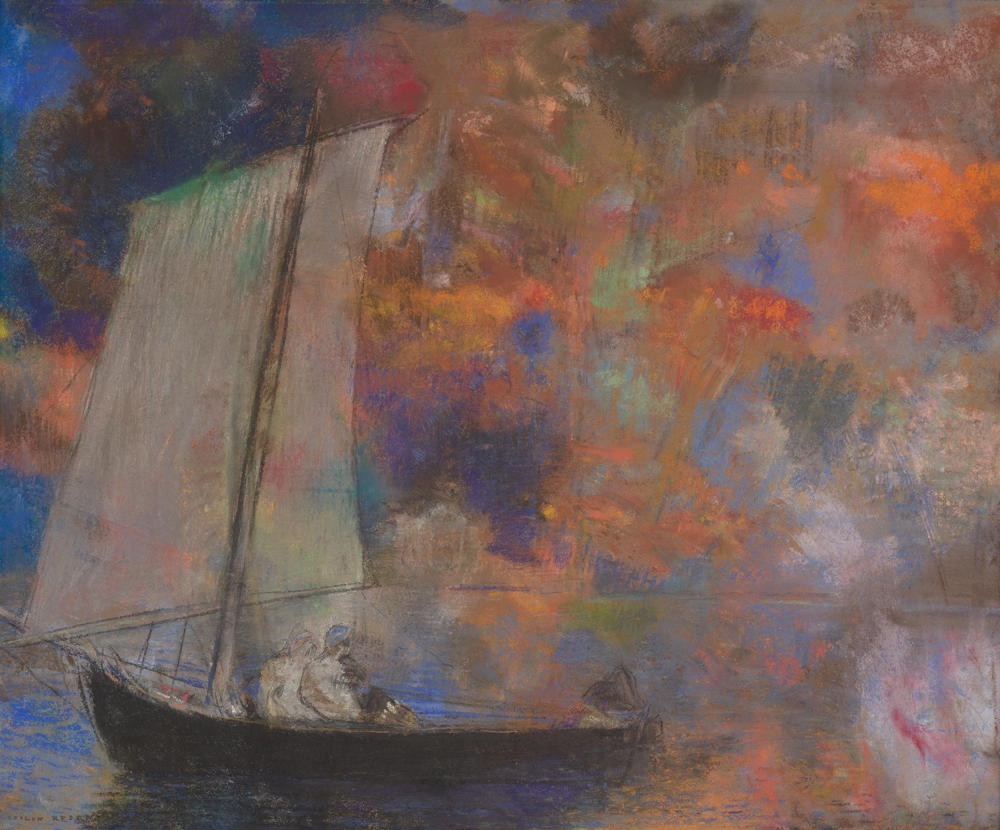
Odilon Redon: Flower Clouds (c. 1903)
" … not even Delusion could save my bacon this time around."
It might be true that every genuinely great idea began as a Delusion. The great discoveries of science often started as no more than metaphor, awfully odd-seeming combinations of concepts as yet unproven. It might also be true that if one hopes to make valuable observations, one must increase their tolerance for Delusion. Those too married to reality rarely see anything creatively, for reality drives hard bargains. It struggles to suspend its disbelief. It relies too heavily upon the familiar. It wants to know the correct answers. Delusion, on the other hand, was never that well-grounded. It makes belief rather than relying upon certified sources. It thrives on what-ifs and speculations, deferring to make its point until after it's considered its space. It understands that even a wrong foot breaks the inertia of stuckness and that movement might be more important than initial direction.
The transition back from a decently Delusional start can prove daunting.
Defiance
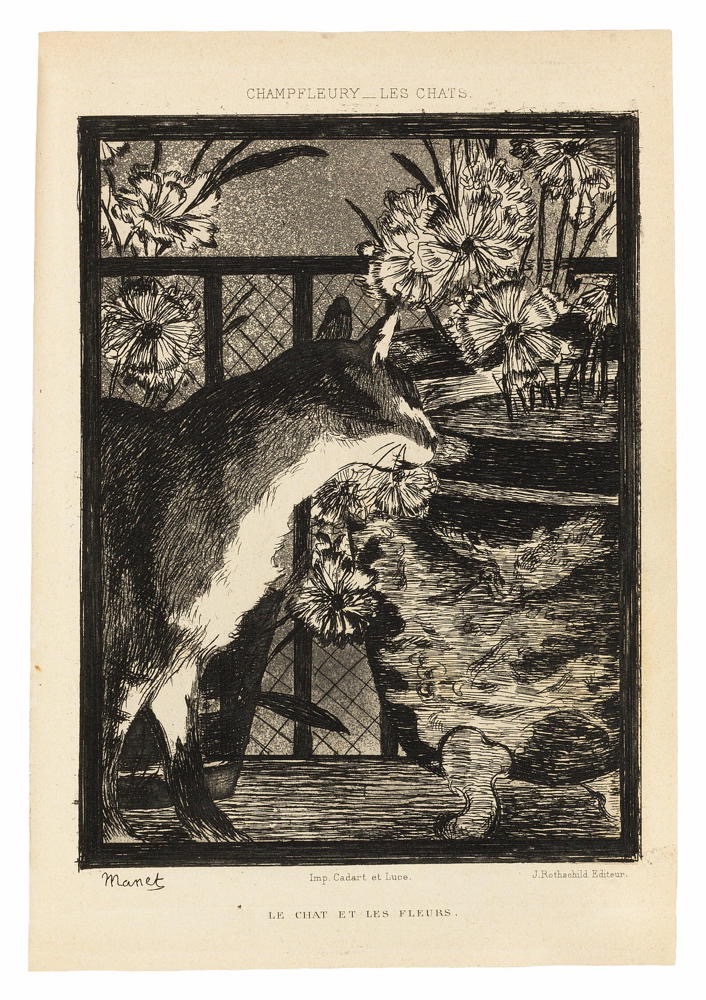
Édouard Manet: Excerpt from a book, Les Chats (1870)
published by J. Rothschild
and Libraire de la Société Botanique de France
typography by Gustave Silbermann,
printed by Cardart et Luce
Book with five etchings, two with aquatint and three with plate tone, one color lithograph, and line block prints, two with hand-coloring, with letterpress in black on ivory wove paper, with cardboard and paper cover and leather spine with gilt lettering
"May Grace grant us respite from our Defiant nature, even when we steadfastly refuse to ask for it."
Go ahead. Tell me not to do something. Refuse permission. Forbid anything. I dare you. I encourage you, for nothing better fuels my forward momentum than a decent or even an indecent Defiance. I will insist, somehow, on getting satisfaction, and I will damned well succeed. Vengence becometh mine in those moments, and I wield my very own terrible and shockingly swift sword. I might even become self-righteous, for I will feel wronged and surely—certainly— set out to somehow right that wrong, believing it my birthright. It will become a matter of honor and self-respect, and I might barter every ounce of respect anybody other than me ever invested in me, but I will succeed, even if the success kills me. Do not ever tell me, "No!"
I think people generally refuse to do what they're told.
Diligence
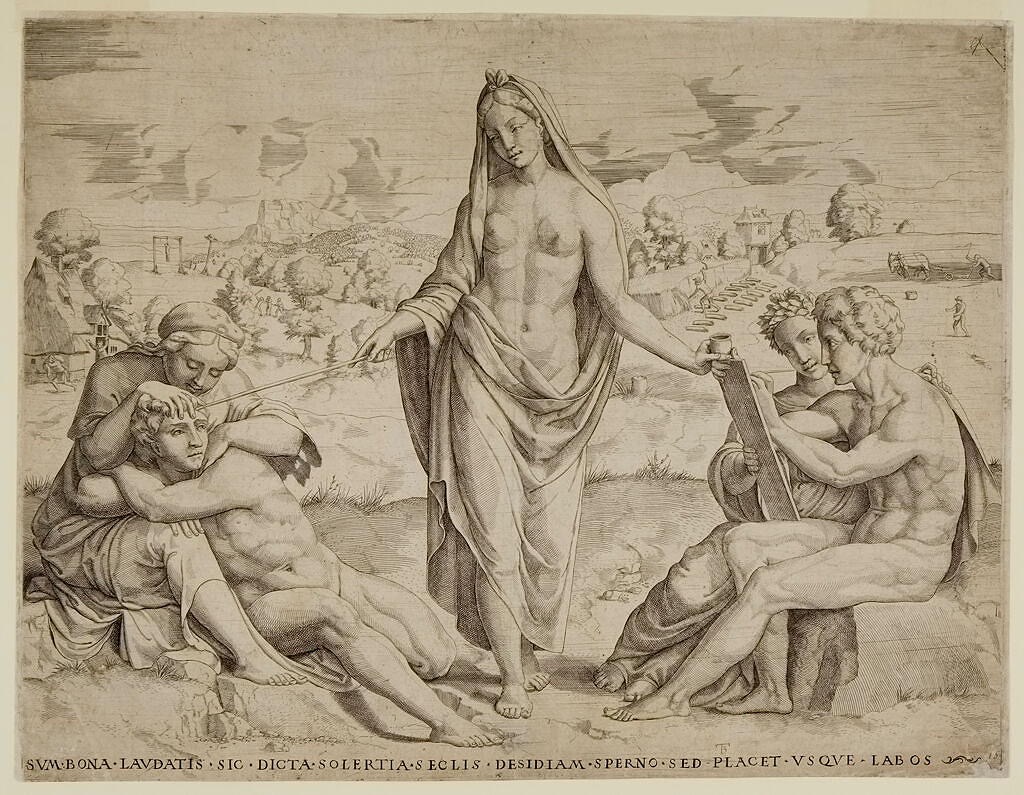
Cornelis Bos: Allegory:
Industry Rewarding Diligence and Punishing Indolence
(c. 1540)
" I seem to need a somewhat stiff wind in my face to find that most satisfying sort of Grace."
I think of myself as more diligent than disciplined. Diligence doesn't need discipline, for it seems to operate on distraction. I loosely focus my attention, then keep returning to the task; no or very little discipline ever required. I can certainly trudge much further than I can march and probably even further than I can stroll. I need not even know my destination to begin, on the principle that any direction, diligently followed, will ultimately guide anyone to a very different location. The difference need not matter so much as its magnitude. The mountains might not be far from my starting point, but they represent a vast difference that naturally seems like concomitant progress. Slow and steady might not win any race, but it does tend to fuel persistence, which can often outlast even the most dedicated competitor. How did I do that? One diligent inch at a freaking time!
I do not operate to any sort of grand plan.
Discipline

Will Hicock Low:
He Met Within the Murmurous Vestibule,
His Young Disciple (1885)
"Almost nothing demands more Discipline than this!"
I was up at 2 AM yesterday, wondering if I still possessed the Discipline to continue writing or if I ever truly possessed it. Discipline was never one of the more tangible possessions. It does not hang near any surface but remains hidden within time. It only ever appears over some longer duration than any instant. I've been meditating twice daily since the Spring of 1974, over fifty years. I've missed a handful of sessions over that period, but no more than the sparest handful, so it might seem beyond question that I possess Discipline, yet I still question myself. Discipline dispensed in twenty-minute increments might be insignificant and hardly seem to make any difference. I cannot assess the difference fifty years of meditating made because I neglected to include a control in the experiment. I would have needed a clone to not meditate over the same period to determine if the Discipline has made any difference.
I can say that I can sit still for any odd half hour.
Whelming
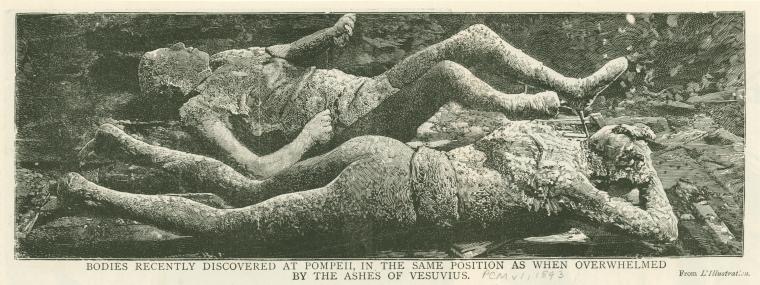
Still Image, Periodical illustration, by unknown photographer:
Bodies recently discovered at Pompeii, in the same position
as when overwhelmed by the ashes of Vesuvius (1893)
"Why would I expect anything to feel any different now?"
I might be a master at overWhelming myself and also at master at underWhelming myself as well. I hold no middle or middling ground, only extremes: swamped or parched, tossed or drowned. I might need a vacation, a break from my usual expectations since every one seems to overwhelm my coping mechanisms. I consequently feel trapped in a world beyond or beneath me, chalking up experience only as an incapable contributor. I figure nothing out. The instruction manual only complicates use. Experience further confuses rather than informs.
I'm almost certain this Whelming amounts to a self-inflicted state.
Aimlessly

Torii Kiyomitsu 鳥居清満: Man Fitting Arrow to Bow
(Edo period, 1615-1868)
"I'm hope I'll be finished by sometime next week."
I've heard it claimed that none of us know how to use the many systems we rely upon. I might use five percent of our Subaru's features. Occasionally, I'll get in trouble and have to ask The Muse to look something up in the absurdly voluminous user manual, a volume within which I cannot successfully reference anything. Even my lawn mower, broken for three weeks, remains a cipher except for the narrowest of uses when mowing lawn. The many systems on my MacBook Air remain largely vaporware, for I might employ one percent of their capacity. Whenever I attempt to do anything there, I come close to the edge of my universe. I often enough fall over into Neverland.
Just this morning, trying to capture the illustration for this story, my usual museum browser refused to find anything.
AKingsGambit
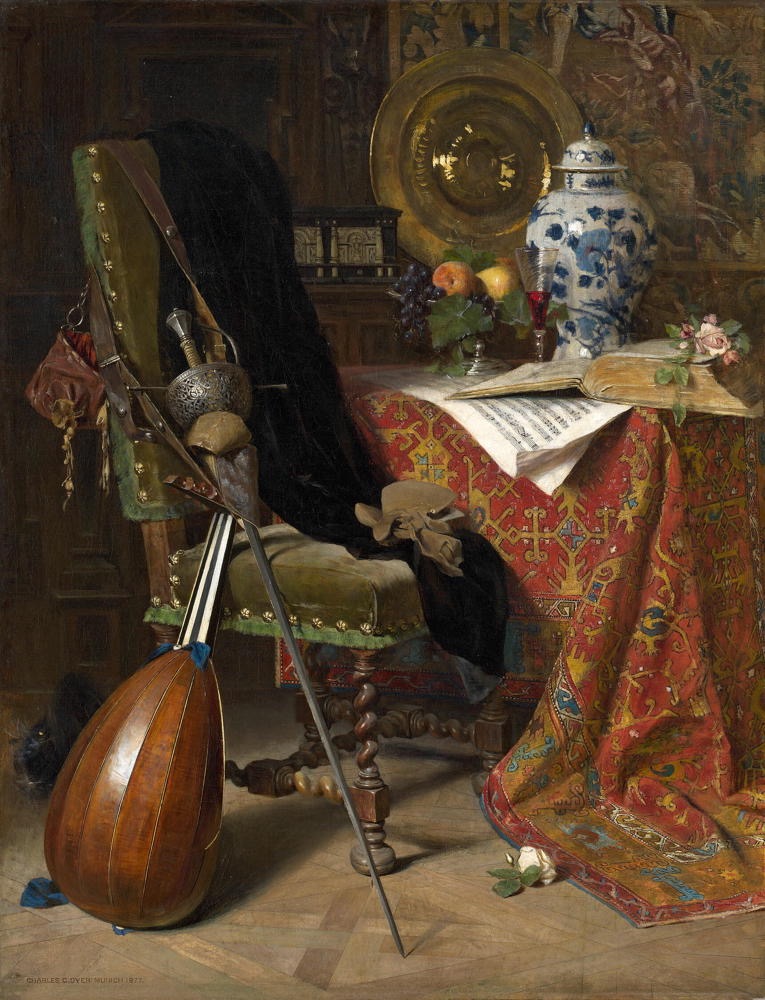
Charles Gifford Dyer: Seventeenth-Century Interior (1877)
" … positively evolving to the utter astonishment of its recently confident opposition …"
I thought the game had begun, but it had not. Preliminaries had been happening for years without an encounter, then that first one disappointed many. I didn't witness the event, having better things to do than watch some boob continue making a public fool of himself. Those who witnessed left shaken by their champion's performance even though his unworthy opponent never managed to commit a single truth. Their champion had more than competently performed the duties of his office, and nobody except his unworthy opponent and his minions had suggested that he was unfit or incapable of a second term until that single disappointing performance. Then, partisans joined the foes to insist that Joe should go. I opposed these moves. I thought them presumptuous. As with most things Presidential, the people have little understanding of anything associated with the role. I figured he'd know if Joe needed to go and act accordingly. He'd never shown any tendency to put himself above his country, unlike his unworthy opponent and, to my mind, his hankie-twisting so-called supporters.
Nobody saw it coming.
Irrelevance

Gustavs Klucis (Klutsis): The Development of Transportation:
An Important Task of the Five Year Plan, Poster, Print (1929)
"May we all experience the Grace that only achieving our own well-earned Irrelevance could ever provide."
From the earliest days of the Soviet Union, the Five Year Plan worked as a central focusing tool. It codified the aspirations of the ruling class, making them possible to describe and enforce. The government imported a small army of American engineers, each schooled in the so-called engineering science of Frederick Winslow Taylor, the self-proclaimed Father of Scientific Management. Employing techniques proposed and affected by Winslow's assistant, Henry Gantt, these engineers created plans to produce the most remarkable products. Whole industries were invented from scratch as the Soviets attempted to jump from feudalism into the modern world in a single great leap forward.
Most of these plans came to naught but the prosecution and execution of those Soviets who created them because they were naively drawn.
Travesty

William, Hogarth, Printmaker: Beer Street (1751)
"Can anybody find me an ESB, please?"
After a five-hour drive and four hours of The GrandOtter's baby shower, I felt more than ready for a couple of beers and a spot of supper. Constantly aware of my surroundings when out on the prowl, I'd spotted a place on our way over to the hotel that looked as if it might fill the bill. The Spot, a so-called Sports bar conveniently located less than a half mile from our hotel. Its website claimed that this bar had been operating continuously since the Kennedy Administration. The menu looked typical bar fare and listed that they carried a beer I rarely see anymore, an ESB or Extra Special Bitter, a common enough brew in Blighty but seldom seen in this country.
Call me old-fashioned, but I prefer my beer to taste bitter. I prefer beer with flavor.
Goner
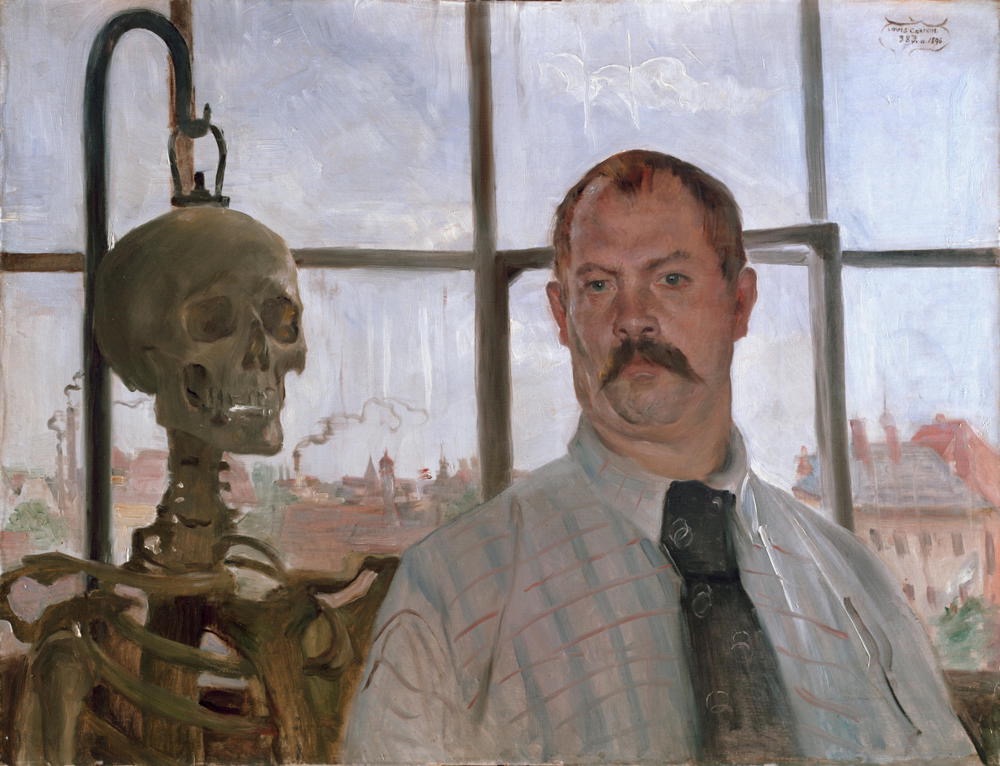
Lovis Corinth: Self-Portrait with Skeleton (1896)
"Grace visits just before such exits."
I never rise more enthusiastically than on those mornings I'm going away. My imminent absence tends to prize out my most prominent presence. I might dawdle every other morning, but these mornings, I'm focused, for I will soon be gone and unable to water the yard, incapable of performing even the least of my usual maintenance. The cats sense that something's up, and they're there fawning for an early breakfast, feigning indifference. I sense that they understand my importance to their existence, and they might doubt my dedication when they watch my taillights disappear a little too early some mornings. They know if only because we've left a window open that we will not be back to feed them supper or to provide that odd lap on-demand later.
I might rail about the need to get away for a couple of days, but I faunch at the prospect.
Weekly Writing Summary For The Week Ending 7/18/2024
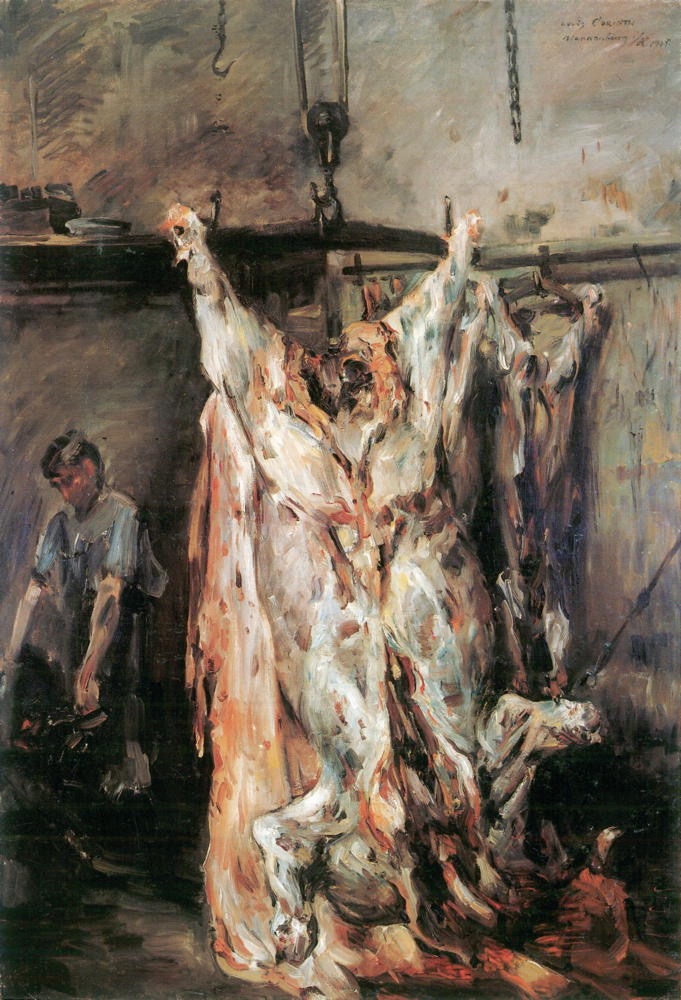
Lovis Corinth: Slaughtered Ox (1905)
Stop Clutching Their Pearls
As if this world had not grown weird enough, we now have MAGA Democrats, people so devoid of strategic integrity that they're willing to discard a winning administration for less than a handful of magic beans. They seem untroubled that they cannot name a single qualified replacement for the ticket most likely to win, all at the suggestion of a felon and the worst administrator ever to hold office. I expected the Dems to clutch their pearls and wring their hankies. Those are their traditional election-year antics. I had not anticipated that so many suddenly started believing in polls that nobody had ever believed in. Not even the pollsters believe their own polls now. We inhabit a distorted playing field whose dimensions have been obscured by the repeated torturing of traditional rules of engagement.
The opposition religiously refuses to commit a single truth as if incapable of such an act. The incumbent has consistently been underestimated. The almost unforgivable element might be the lagging self-esteem this whole defection represents. Dems have always struggled to stand by their man or woman when the going got real. Berney proved to be enough distraction that the felon was elected the first time. (Thanks, or something!) I've stopped reading my newspapers, and I'm unable to distinguish between news and propaganda. The world seems to have lost something in translation. The MAGA movement was always a scam. Anyone who felt it answered their prayers, except perhaps for billionaires, was a shill. I struggle to find an ounce of Grace in any of this shameful dance.
It has universally been the case that if I can hold my attention and continue engaging, Grace always appears. I pray that will be the case once my fellow Democrats stop clutching their pearls.
Backward

Lovis Corinth: Nude Bending Backwards (1919)
" … we've somehow managed to make some headway, anyway."
I'm entertaining the notion that I learned everything Backward. By dint of tenacious good fortune, my education hasn't managed to do me in yet, but that could happen at any moment. I suspect that everything I have accomplished would have been easier to achieve had I just started the right way around, but I didn't. I didn't even suspect another orientation could have existed; I just went about doing whatever I was doing with more or less the same information. I was never all that interested in learning.
Certainly, my manner of living will not long outlast me.
etymology

Karl Zerbe: The Face of the Big Lie (1951)
"I will feel vindicated when he loses …"
If there is such a thing with words, the usual evolution of a lie moves from the tiny to the more encompassing. Dabbling in lying tends to eventually lead to larger trouble, if only of the parody kind. A "little white lie" can successfully cordon off vast regions of authenticity from further exploration, lest what started as a small secret get inadvertently shared. Honesty became recognized as the best policy because of the exorbitant premiums charged for using its opposite.
We live downwind of a single BIG lie, one which had no clear precedent from which it grew.
BackInto
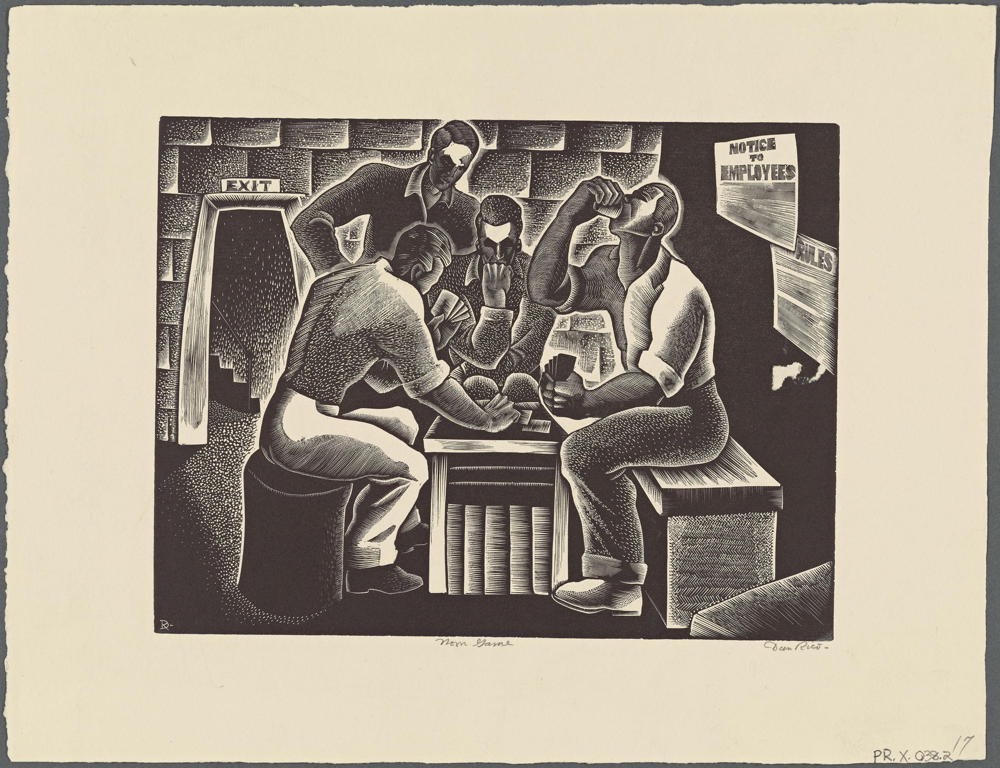
Dan Rico: Noon Game (1935 - 1943)
United States. Works Progress Administration
"My emotional crankcase drained …"
I had not remembered that ease when I'd suited up, even through the weeks leading up to the disruption. I'd undoubtedly struggled to suit up when I was down, but then I was not even pretending to enter any game. Suddenly, the act seemed more effortless than I ever remembered it seeming. I was BackInto the game again!
I feared my week's idleness might permanently eliminate my acceptance as a player.
ReEntry

Unknown Hopi carver:
Owa-nganroro [Mad Stone Eater Kachina],
(c. 1900, First Mesa, Arizona)
"Grace exclusively works in such mysterious ways."
As the Seasonal Affective Fog lifts, ReEntry emerges from the shadows. The exit had not been deliberate but mere side-effect. The resulting absence seems anything but profound. The symptoms typically linger. I'm always uncertain when to consider any bout over. I'll typically try ReEntry a tad too soon and feel rebuffed, but the sun still reliably comes up every morning, giving just as many second chances as necessary. Sometimes, I require a dozen second chances to finally find my traction. By then, I'm as thoroughly disgusted with myself as I can imagine, though should I fail at ReEntry that morning, I'll find an opportunity to better my recent record.
I am nobody's prodigal son.
Recovery

Edmond-François Aman-Jean: Reverie (c. 1900)
"The patient seems to be Recovering this morning."
With my self-diagnosis of Seasonal Affective Disorder came the emerging realization that I might already be recovering. Diseases and disorders do not just settle in and stay, not usually, not always. They pass through, first rendering us clueless about what might be ailing us or if we're even ailing. These visitors follow a progression from barely there to almost gone, leaving their benefactor or victim in some state of Recovery afterward. Recovery is where I integrate whatever that latest brush might have attempted to teach me. It's where I might freshly revel in same-old activities. It's where symptoms turn vestigial, and effects increasingly become intangible. Memories linger, though, of self-doubt and revelation, exhaustion and foreboding, and a particular haunting uncertainty. The Muse was convinced I had some bug. I believed I had lost my backbone and began slacking. Whatever the lessons, if any, I continue assimilating and integrating in Recovery.
I'm still naive enough to believe that everything probably happens for a reason and that my job primarily consists of determining underlying reasons and making some sense of them.
AintNoCure

Alphonse Marie Mucha: The Seasons (1897)
" … an infinite game perhaps intended to encourage the pursuit of happiness …"
"There Ain't No Cure For The Summertime Blues." - common folk wisdom
In the deepest and darkest days of a typical January, some notable percentage of the population will at any time suffer the effects of what's labeled Seasonal Affective Disorder (SAD). The effects tend to be mild to moderate depression, said to be caused by light deprivation. Common treatments include exposure to broad-spectrum lighting and long naps. Many escape South to become what we call Snow Birds. Some even become extremists and purchase second houses in places where the sun always shines, like Arizona and extreme Southern New Mexico, abandoning their more Northern homesteads half the time. Zealots might move to some awful place like Florida full-time to escape these effects.
There ain't no actual cure for January's Seasonal Affective Disorder, though there are treatments.
Weekly Writing Summary For The Week Ending 7/11/2024
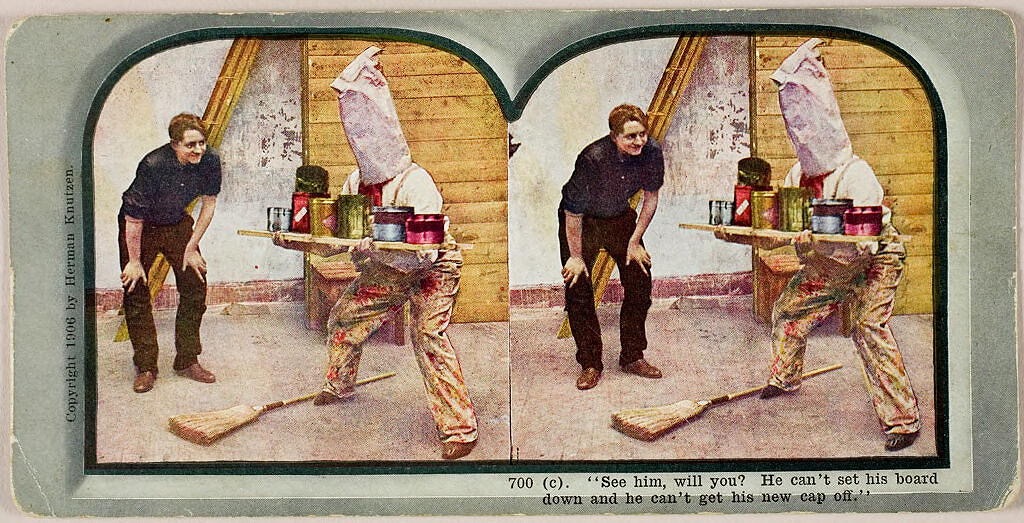
Unidentified Artist, stereoscopic photograph,
"See him, will you? He can't set his board down,
and he can't get his new cap off." (700 c), (c. 1906)
What Was Never Realistically Figure-outable
I'd thought I'd banished the notion that intelligent people were smarter and leaders could lead, but I keep finding vestiges of my initial innocent beliefs. These wound me because I long ago proved that I could not live up to such fictional expectations. In my time, I have carried the titles but have yet to fulfill the naive expectations. My smarts were balanced with at least a counterbalancing amount of stupids. My leadership required some followership, too. As I've insisted before, I was never once an island and not even a half-decent isthmus. I remain connected to much I'd long ago hoped to out-grow or divorce. Anyone who ever divorced learned that there's no such thing. It's just another fiction. I rarely manifested anybody's overly advertised ideals, or believably wrote about them. But then, nobody's likely to purchase the guide for becoming the imperfect anything. Asperation requires absolute fealty to some impossible ideal. We thrive and also die on our dichotomies.
I stand shivering at the end of another humbling writing week, appreciating your presence here and quietly wondering what's kept you coming back. I remain supremely unworthy of your presence, for I have always been mumbling here, trying to figure out what was never realistically figure-outable. Thank you for following along!
—
Weekly Writing Summary
This Grace Story reports the sorry state of my Clutter, a presence I often struggle to justify. I sometimes think I should produce better than Clutter without always recognizing the Grace it represents.
Jean-Baptiste-Siméon Chardin: The Attributes of the Arts and the Rewards Which Are Accorded Them (1766)
" … poor but honest penmanship …"
—
This Grace Story finds me happily Uncluttering after mentioning my Clutter in yesterday's story. It's funny how this universe sometimes seems to work this way. Just mentioning can start a chain of reactions that makes a real difference.
Unknown Artist: Panel of Uncut “Slip” Designs, Hemp, plain weave; embroidered with silk in tent stitches (1625-75)
—
This Grace Story finds me enjoying the only enjoyable time in the Summer Heat, the wee hours when the world feels moist.
Angelo Caroselli: Summer (c. 1620s)
"Grace appears in these most unlikely places."
—
I went to bed last night feeling every bit as incompetent as I've ever felt. This morning, it dawned on me again just how overrated competence has always been. That's the subject of this Grace Story, Competence.
Gordon W. Gahan: Star's Daughter (Eleventh -- End of Set): "I am interested in becoming a good actress, not a movie star. If I happen to become a star, too, I'd love every minute of it, of course. But my first goal is to become a competent actress."(1964-65)
"It's by the Grace of something far less than any of us that we ever manage to succeed."
—
The original version of this Grace Story was indescribably better than this one, but the original was lost to the ages after I'd gotten a little AheadOfMyself. The Universe attempted to teach me a lesson this morning about the dangers of living in lines.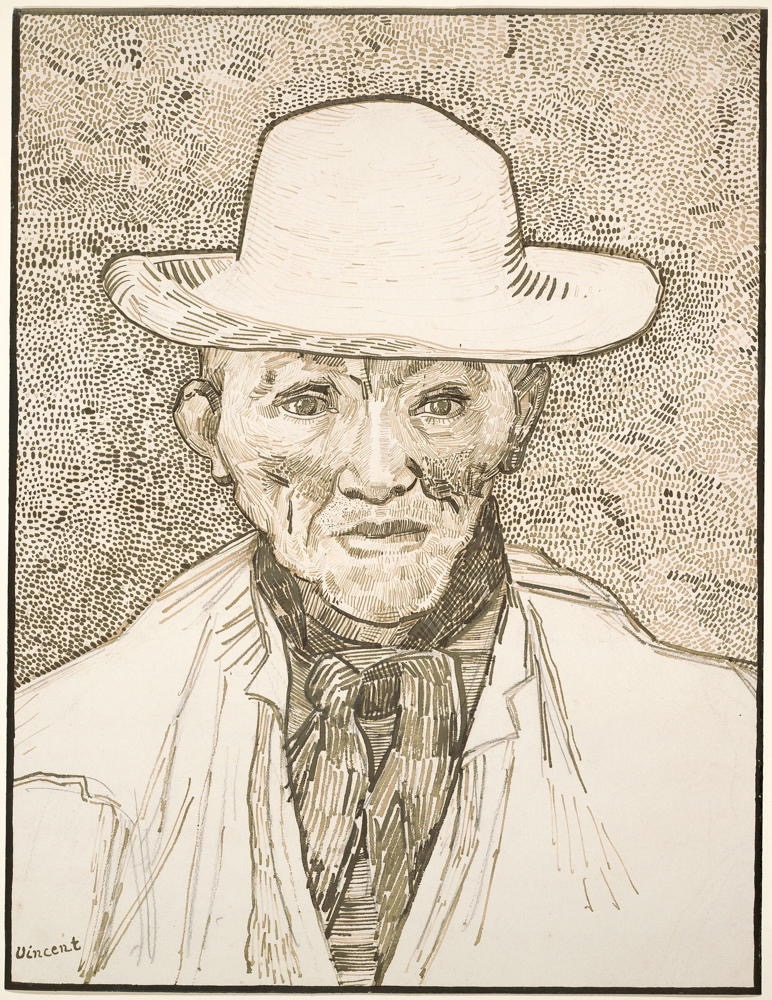
Vincent van Gogh: Paysan de la Camargue [Peasant of the Camargue, Portrait of Patience Escalier] (1888)
"We do not live in lines."
—
This Grace Story includes no Grace in it. It only implies its presence within an explanation of a True Impossible, a HaveToWantToCant.
Gordon W. Gahan: Taking no notice of a troublesome right shoulder, New York Yankee star Mickey Mantle manages a "thumbs up" sign as he overlooks the Mayo Clinic from his hotel room here on January 17th. The champion slugger will undergo nearly a week of tests at the clinic to see if the shoulder can be fixed up. Before starting on the grueling series of examinations, Mantle remarked, "It isn't sore, but I can't throw with it." (January 1966)
"I must be dealing with a true impossible here."
—
I mentioned in one of my stories this week that all the possible combinations present in every fifty-two playing card deck have yet to result from all the diligent shufflings they've so-far been subjected to. It shouldn't surprise me to realize that I've barely nicked the possible configurations of a week's writings. If I can muster enough trust in the universe, a fresh perspective will emerge every morning, right on time. A few of the resulting perspectives do not honestly seem all that fresh, but each has been different enough, if not entirely different. I'd imagined that I'd eventually exhaust the possibility of posting any new material, but that has definitely not been the case. I'd thought I share that last half-decent Dad Joke and be done with this audacious experiment, but that hasn't happened yet, either. I have more than fifty-two cards in my deck. Clutter came up in the never-to-be-repeated rotation, and did its brother, Uncluttering. The Heat this Summer's delivering also made an appearance. I encountered one of my abiding incompetences in Competence before catching myself getting a little Agead Of Myself. I ended this writing week immersed in a Truly Impossible, a Want To, Have To, But Can't. One of those occasions no one ever actually rises to. Thank you for following along!
©2024 by David A. Schmaltz - all rights reserved
HaveToWantToButCant

Gordon W. Gahan: Taking no notice of a troublesome right shoulder, New York Yankee star Mickey Mantle manages a "thumbs up" sign as he overlooks the Mayo Clinic from his hotel room here on January 17th. The champion slugger will undergo nearly a week of tests at the clinic to see if the shoulder can be fixed up. Before starting on the grueling series of examinations, Mantle remarked, "It isn't sore, but I can't throw with it." (January 1966)
"I must be dealing with a true impossible here."
My senses usually keep me safe from directly experiencing many of the more terrifying realities. It's true that I'm hurling through space on a corkscrewing planet moving at 67,000 mph, or 18.5 miles per second. I sense none of this. Likewise, I hang upside down on the face of this planet while directly sensing none of that, either. My sense of the possible shares some of this blesséd blindness, for I cannot directly determine possibility, either. Much of my work emerges under Wait And See conditions. I can talk myself out of something without directly knowing just how possible it might have been to produce. More telling, I can just as easily talk myself into starting something that will later turn out to be an impossible. Knowing which it might become often proves the most impossible, for will sometimes determines way. Other times, no amount of will can translate into any feasible way. We only ever learn this later.
The run-of-the-mill Impossible might well seem eminently doable at the outset.
AheadOfMyself

Vincent van Gogh: Paysan de la Camargue [Peasant of the Camargue, Portrait of Patience Escalier] (1888)
"We do not live in lines."
I just "lost" my first hour of writing. I hadn't managed to do that in years. I'd grown careful and cautious. As one who measures my progress in captured words, I never approach my work in a cavalier fashion. I tend to be deliberate to a fault, following patterns varying little from session to session. I set up my page before setting to work, saving often, as if sighing. This morning, I must have forgotten to sigh. I inadvertently sorted my collection of stories by something other than the usual Date Created. I had not anticipated that I could have sorted them by Title instead, and there's only a tiny checkmark in the corner of the column label to indicate that the underlying list has even been sorted.
The list made no sense.
Competence

Gordon W. Gahan: Star's Daughter (Eleventh -- End of Set):
"I am interested in becoming a good actress, not a movie star.
If I happen to become a star, too,
I'd love every minute of it, of course.
But my first goal is to become a competent actress." (1964-65)
"It's by the Grace of something far less than any of us that we ever manage to succeed."
Competence has always been overrated. Most of the best that has ever been accomplished has been achieved by those who have yet to be fully qualified to produce such works. The writer, who was considered unpublishable until she squeezed out that best seller. The artist who lived in an unheated garret through most of his life and whose oeuvre now graces The Louvre. We're all of us essentially Bozos on this bus, and, for sure, always were.
It's not that we haven't tried to create effective certification programs; they're over-enrolled.
Heat

Angelo Caroselli: Summer (c. 1620s)
"Grace appears in these most unlikely places."
Summer turns merciless when July Heat arrives. Days bleach the lawn a buff-brown, and the gardens cower, praying for their morning or evening shower. The hanging pots need watering every morning, or they'll wither in the late afternoon sun. There's nothing to be done. I can work outside until noon. Then, I must flee back inside to hibernate until evening. I go effectively nocturnal, and the light seems more of a hindrance than helpful. Cold showers come back into fashion. It's not the Heat so much, but the humility of restricted latitude of movement. I daresn't go on a whim. I need a pretty darned good reason to venture out into it. It brings no discernable benefit.
They still say, "At least it's a dry heat."
Uncluttering

Unknown Artist: Panel of Uncut “Slip” Designs,
Hemp, plain weave; embroidered with silk in tent stitches (1625-75)
Sometimes, but only sometimes, naming a condition starts the process of resolving it. So it was yesterday when I called out my Clutter before, later, tucking in to clear out some of it. I spent most of my day Uncluttering. If only it were also so easy. I feel grateful that it IS sometimes just that simple.
I've long held that I have an ethical responsibility to discuss whatever's not supposed to be discussed, for undiscussables hold special powers.
Clutter

Jean-Baptiste-Siméon Chardin:
The Attributes of the Arts
and the Rewards Which Are Accorded Them (1766)
" … poor but honest penmanship …"
My desk belies my self-conception as a tidy person. Perhaps I once was neat, but an honest appraisal would conclude that I am no longer well-ordered. My desk holds the residue of innumerable works in progress, some of which I finished. I've always struggled with creating permanent records. I maintain no files, just piles that continue accumulating. To put anything "away" seems the equivalent of losing it.
With the death of a dear friend last month, I've started wondering what sort of legacy I'll leave.
Weekly Writing Summary For The Week Ending 7/04/2024

Henry Peach Robinson:
When the Day’s Work is Done,
A combination print made from six different negatives.
(1877, printed January 1890)
I Sleep Though My Julys
I dread July more than I dread the dead of Winter. Aside from the cool mornings, July days tend to turn punishingly warm. There's no escape until I turn on the sprinkler as the sun starts setting lower. The gardens exist balanced between scorched and saturated; whatever water I manage to apply early will be evaporated out by the end of most days. It's exhausting just failing to keep up. The gardens start producing, though, and the evenings, once the sun sets and the sprinkler's done its magic, compel us to eat on the back deck instead of in front of whatever's streaming. The TV's not been turned on in more than a week, and I'm not missing it. If I'm up by two, I have plenty of time to finish my writing before the sun starts to blind me. I can maintain my schedule as long as I'm out early. I hibernate most afternoons, remembering a soft blanket my mom used to spread on the living room floor before inviting me to nap through the blistering early afternoon hours. It was cool on the floor, and I could never keep my eyes open. I sleep through my Julys just like I doze through my Decembers.
Wronking
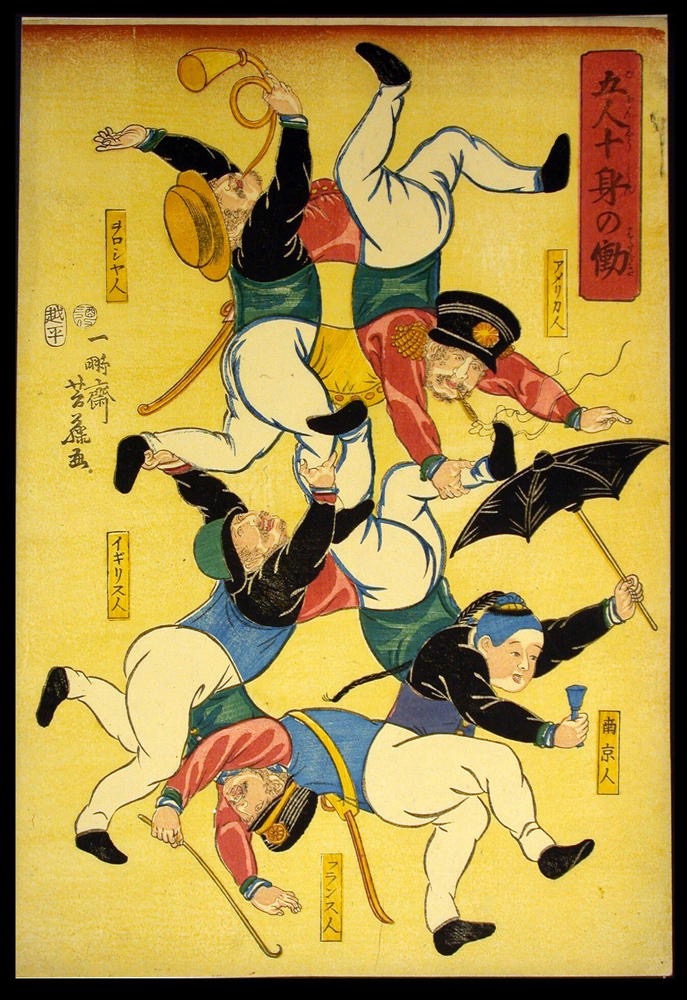
Utagawa Yoshifuji:
Five Men Doing the Work of Ten Bodies
(Gonin jushin no hataraki) 1861
"Let nobody say that I compromised and delivered anything the easy way!"
I was wrong on several levels when I assumed that work would become easier as I aged. I presumed that I would naturally become more experienced so that my prior knowledge would accumulate to the point that I might only rarely feel baffled. Almost precisely the opposite has proven true. I find myself freshly baffled with virtually every engagement, with experience proving to be lousy preparation for whatever presents itself next. Contrary to my earlier theory of ever-expanding competence, my proficiencies wain. This feels more painful than I might have imagined. After decades of living without much ego involvement, I've lately started suffering from a wounded ego, a debilitating if rarely fatal condition that nonetheless feels alarming. My best intentions sneer back at me these days.
I have heard of people who claim to enjoy learning.
RootDirectory
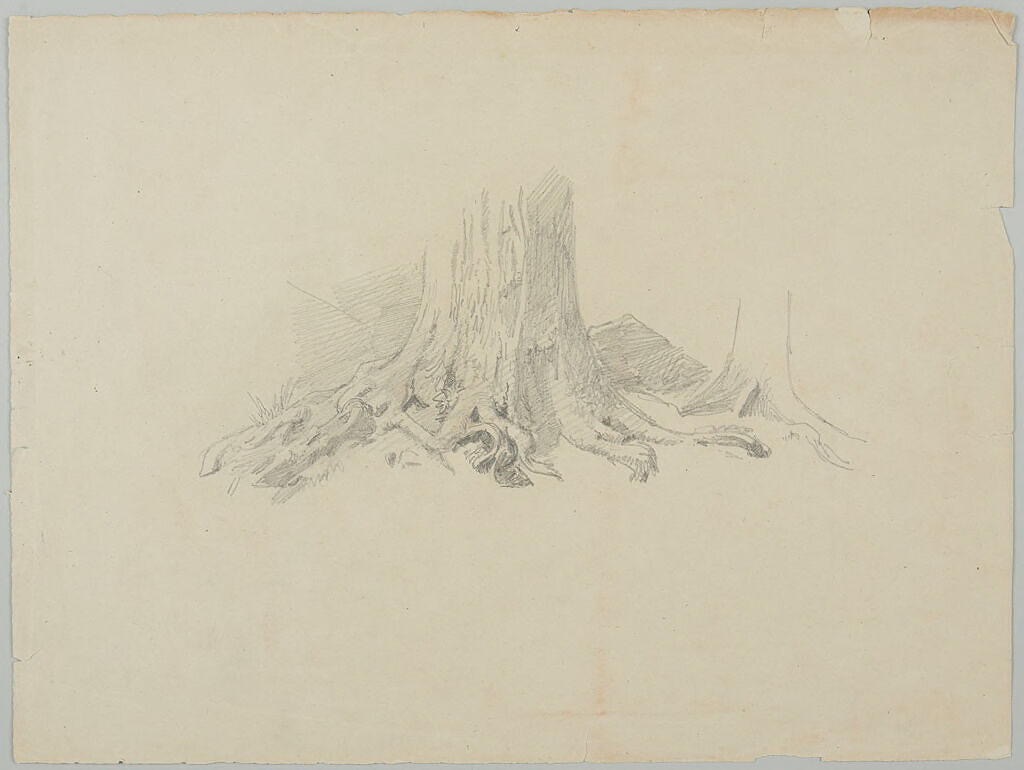
William Trost Richards: Tree Roots (19th-20th century)
"May the Grace of perseverance preserve my sanity in the face of this unending inanity."
I recently complained here about the new and improved Google Apps, for they seemed to have been specially designed to be unusable. Further use has led me to a deeper understanding that they were not new or improved but rely upon a now ancient design, one I had until recently managed to avoid learning. They employ the same form as MS-DOS' old hierarchical directory design, one so counter-intuitive as to seem unusable to anyone not entrained to comprehend it. I do not know how one comes to learn how to use RootDirectories and such. I know they offer few clues about navigating within and around them. I'm suddenly back to the primitive hunt-and-peck stage, often bewildered and frozen without a clue what to do next. If The Muse isn't around to advise, I stay frozen until after she returns.
The Muse is barely civil when I ask her one of my questions, for she learned about RootDirectories ages ago.
Convertible

Jack Rodden Studio: Untitled
[dignitaries riding in convertible in town parade]
(c. 1950)
"Grace even catches up to politicians when they ask nicely enough."
Political campaigns look different from the inside. Outside looking in, an observer hopefully sees mostly what the candidate wants them to see. Scenes should seem carefully choreographed, scripts thoughtfully written and practiced, and presentations more or less perfect. Inside looking out, it's continually one damned thing after another, none of which seems quite right or even right-able. The ship seems like it's taking on too much water. The campaign started too late and seems to be falling ever further behind. The difference between inside and outside states gets to grate on the campaign team. Everything takes longer, costs more, and produces less. If not careful, the candidate and team might grow despondent. Were it not for the likely fact that the opposition has it worse, the effort would hardly seem worth it.
Take, for example, the simple idea of the candidate appearing in the Pasco Fourth Of July Parade, a tradition in this legislative district.
Memorial

Jan Verkade: Memory (1893)
" … he'll forever overlook his homecoming."
No death seems complete until the survivors attend a Memorial. These affairs range from simple to elaborate, family to community. They represent much more than merely the memory of the recently departed; they embody an utterly unique slice of the departed's community. We trivially insist that everyone's essential and nobody exists as an island, but few ever suspect the depth and breadth of anyone's circle until after that center departs. Then, it's as if the central point of orientation has left the building. Even those otherwise related to each other seem somewhat worse for the absence without that one additional degree of connection. For instance, I could have sworn my friend Gary lived as a virtual hermit these past few years, but legions showed up for his Memorial picnic, catered with a massive hauled-in barbeque rig and a separate chuckwagon bar.
I came with my requisite pocketful of words.
UnwantedInsight
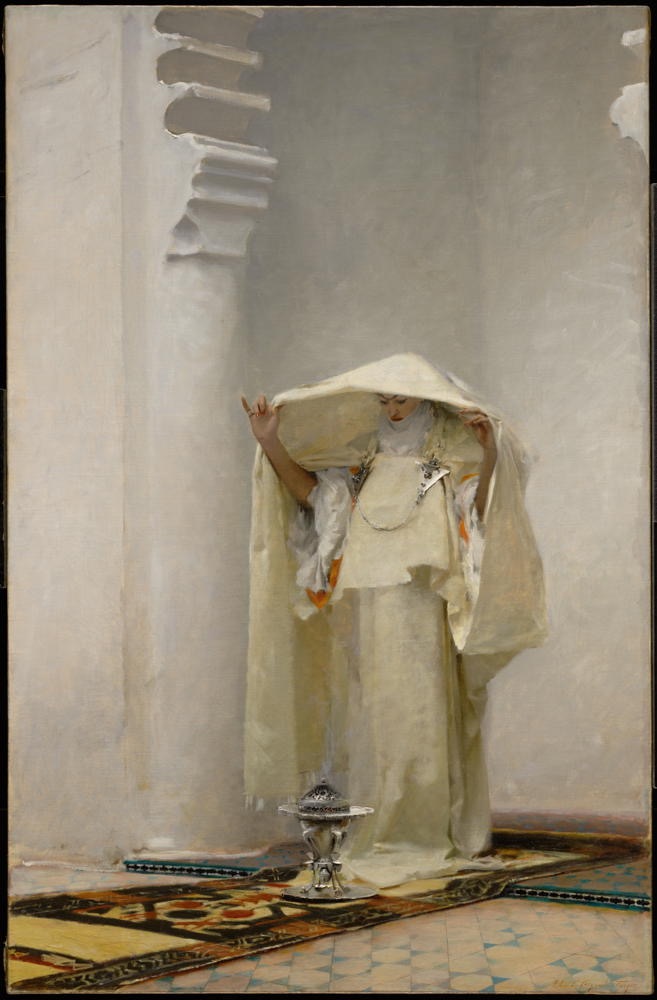
JOHN SINGER SARGENT:
FUMÉE D'AMBRE GRIS [SMOKE OF AMBERGRIS] (1880)
"Grace often comes unbidden and unwanted, insisting upon differences we would not have chosen. Grace seems to trade in UnwantedInsights; acceptance serves as the medium of exchange."
I claim to be seeking truth, but I prefer confirmation. I'd much rather my preconceptions reveal the truth instead of my pretensions. I think of myself as an insight seeker, though I'm just as disconcerted as the least of us when an insight reveals some suddenly glaring shortcoming in my once so proud performances. I wanted to get it right the first time, if only because that rarely happens. I thrive on misconceptions, perhaps valiant attempts destined to undermine my best intentions. I frequently find this cycle unbearable. I retire, thinking myself especially put upon. I only suffer from sometimes especially virulent cases of The Normals, for progress might have always been achieved chiefly by discovering errors. Perfection could not have ever been an objective. Seeking the more perfect seems the more realistic perspective.
I can be confident that I will be capable of writing a better story than this one tomorrow, but I'm not inhabiting tomorrow yet and couldn't possibly.
HesitantHedonist
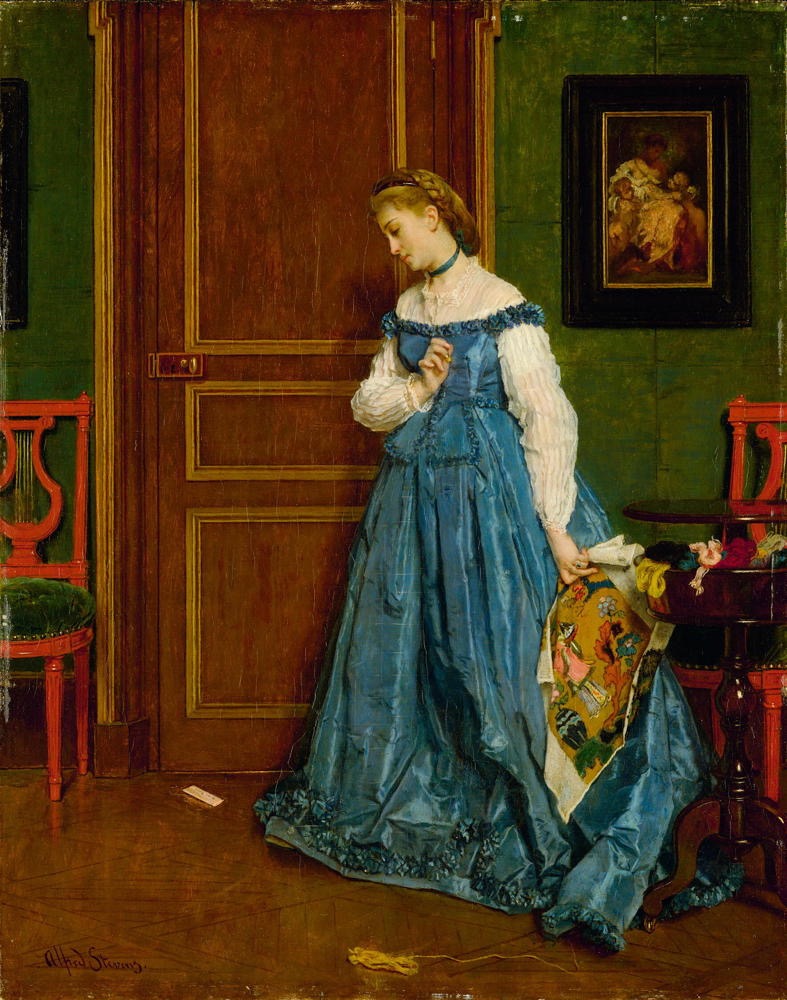
Alfred Stevens:
Hesitation (Madame Monteaux?) (c. 1867)
"Life cannot be fulfilled by merely satisfying obligations."
I love to weed my gardens. I'd rather be on my knees digging dirt than do anything else, although I do maintain a mental list of the activities I most enjoy. Curiously, on any given day, I'm unlikely to engage in any activity on that list. I prioritize otherwise, first dispatching obligations to satisfy expectations. Then, I'm more likely to engage in hygiene activities, cleaning up messes. While certain satisfactions come from completing these, I cannot honestly report that they please me. I'd rather be weeding. Still, I catch myself making excuses that delay me from engaging in this most favorite occupation. It might be too hot or too cold. I seem easily dissuaded as if I require perfect conditions to engage in this most perfect of all possible occupations.
This might say something about how I was raised.
Weekly Writing Summary For The Week Ending 6/27/2024

John Singer Sargent: Study of Two Bedouins (1905–6)
An Achingly Aspired-for Answer
We seem to be floating here and always have been floating. Nobody among all our forebears ever once experienced firm footing. They each slipped and slid, stumbled, and mumbled their way into whatever they eventually seemed to become. There were no shortcuts then, and none remain for any of us to leverage now. How will we survive? We might survive for now without any of us individually surviving much longer. The very purpose of this exercise must be rooted in its inevitable demise. We're short-lived, whatever we might devise. This means we must seek for purposes other than salvation or survival. However attractive notions of figuring might seem, we're clearly not born here to figure out anything, and certainly not for any plausible long run. We're dancing on next to nothing without the promise of transforming any of that surface into anything lasting. We enquire in lieu of knowing. We ask instead of answering. We wonder when we'd prefer to know. We might be here to inquire, not to resolve. It might be plenty and enough to manage what the best of our forebears manifested: a decent question, an achingly aspired-for answer, a hopeful presence, and a grateful denouement—a life. Thank you for following along this week!
GracePeriods

John Singer Sargent: An Artist at His Easel (1914)
"I was out-dated before this product was even released."
I'm terribly slow on the uptake these days. I seem to need more space and time than previously, and I find myself far less productive. Give me a deadline and I'm almost sure to miss it, usually for good reasons, but sometimes for lousy ones. For instance, I've been trying to learn how to use the new and "improved" GoogleDrive apps, and it's been an excruciating experience. They've been almost entirely redesigned, seemingly to impede performance improvement. I need to rediscover every function every time I try to use it. The passageway into the file list was hidden three or four layers beneath an unrelated link, so I often wander aimlessly. Doing anything takes longer and becomes more frustrating than I ever remember GoogleApps being capable of inducing before. I need a GracePeriod, acknowledgement that I’m typing with chopsticks, so everything will quite naturally take much longer than otherwise necessary. I am a beneficiary of this encumbering technology.
I need to forgive myself for my own unwanted trespasses.
Humbling
Charles Bird King: The Vanity of the Artist's Dream
Former Titles: The Anatomy of Art Appreciation
Poor Artist's Study
Still Life, The Vanity of An Artist's Dream
(1830)
"I deserve a Humbling cup filled with a bitter brew."
The scandal had broken the Friday before the Candidate Forum. The incumbent County Commissioner had been investigated for some incidents of incivility at the prior year's fair, where she'd pushed around some underlings and humiliated herself for no good purpose. Those of us supporting her opponent quietly cheered inside to see that she had decisively stumbled. There might be no way Jenny Mayberry could be reelected with this black mark on her record. She'd already conclusively proven herself to be an inept commissioner. She'd proposed raises for first responders and hired some more without considering how the county might pay for those changes. Then, she'd steadfastly refused to vote to increase taxes, saying she'd sworn not to raise taxes when running for office. The adult commissioners voted in favor of paying for her increases, and she'd set about blanketing the county with reelection signs, insisting she really cares about the county and its people.
The morning of the Candidate Forum, Jenny called in sick.
PickEmUp

Lucian and Mary Brown:
Untitled [boy playing with truck in sandbox] (c. 1950)
" … the continuing possibility of these strange convergences and Grace."
I'll start this story by declaring that I do not believe in The Prosperity Gospel or the often-touted Laws of Attraction. I believe this theory and practice amount to a cruel joke, a fraud perpetrated on innocent people who probably deserve better. That this fraud is often self-inflicted is no defense and might render it even more offensive. There are plenty who encourage such beliefs.
I admit to sometimes seeing evidence that, if I was unconvinced, might convince me that The Prosperity Gospel and The Laws of Attraction could be real.
Self-Sacrifice
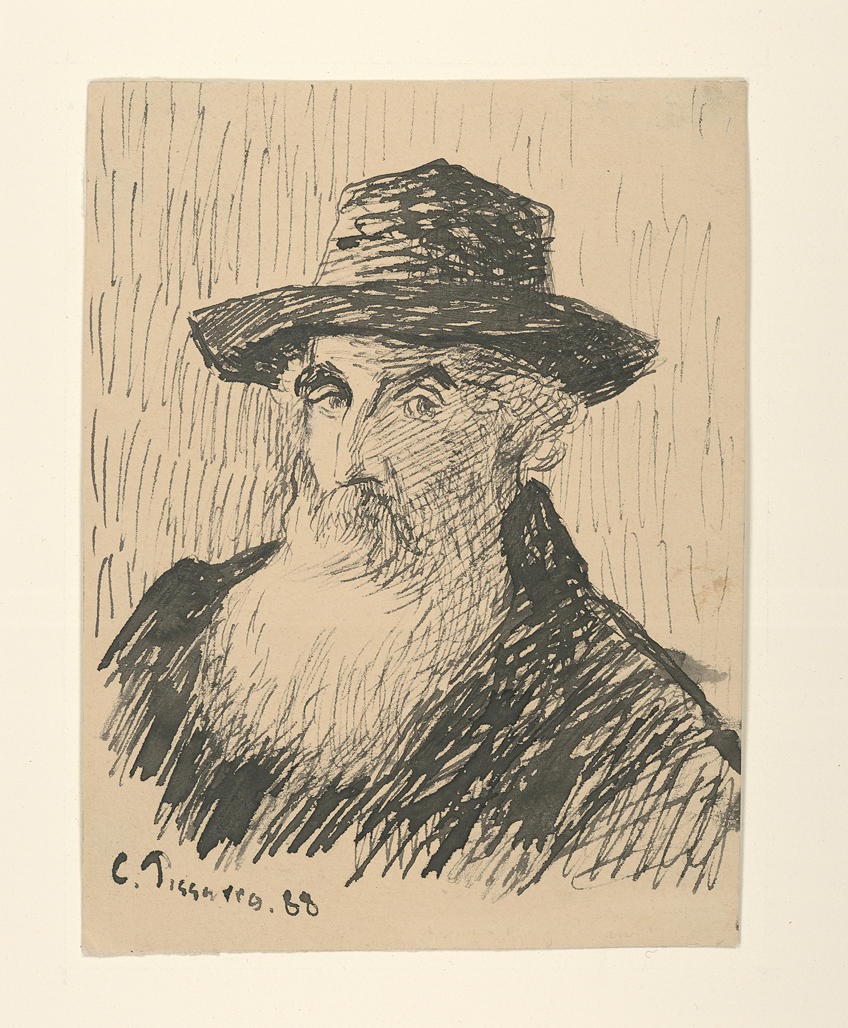
Camille Pissarro: Self-portrait (Undated, circa 1888)
"Never get yourself so busy not doing your job that you can't properly not do your job."
The Muse and I arrived at the convention hall feeling hopeful despite the frustrating time we'd had attempting to properly prepare for the experience. After reviewing the first draft of the party platform document, I'd started before the prior weekend to influence the final wording, which I found primitive and demeaning. Our Legislative District Chair first deflected my suggestion that he invite delegates to talk through the document to identify areas needing improvement. The Chair explained that he was too busy to convene anything before finally agreeing to try to schedule a session over the upcoming weekend. He hadn't scheduled the session, so The Muse and I arrived feeling as though we'd missed an opportunity to influence anything there.
Further, the day before, we'd learned that the platform committee on which our Chair had served had unanimously adopted a plank that could tank every candidate's opportunity for election in the current race.
Damns
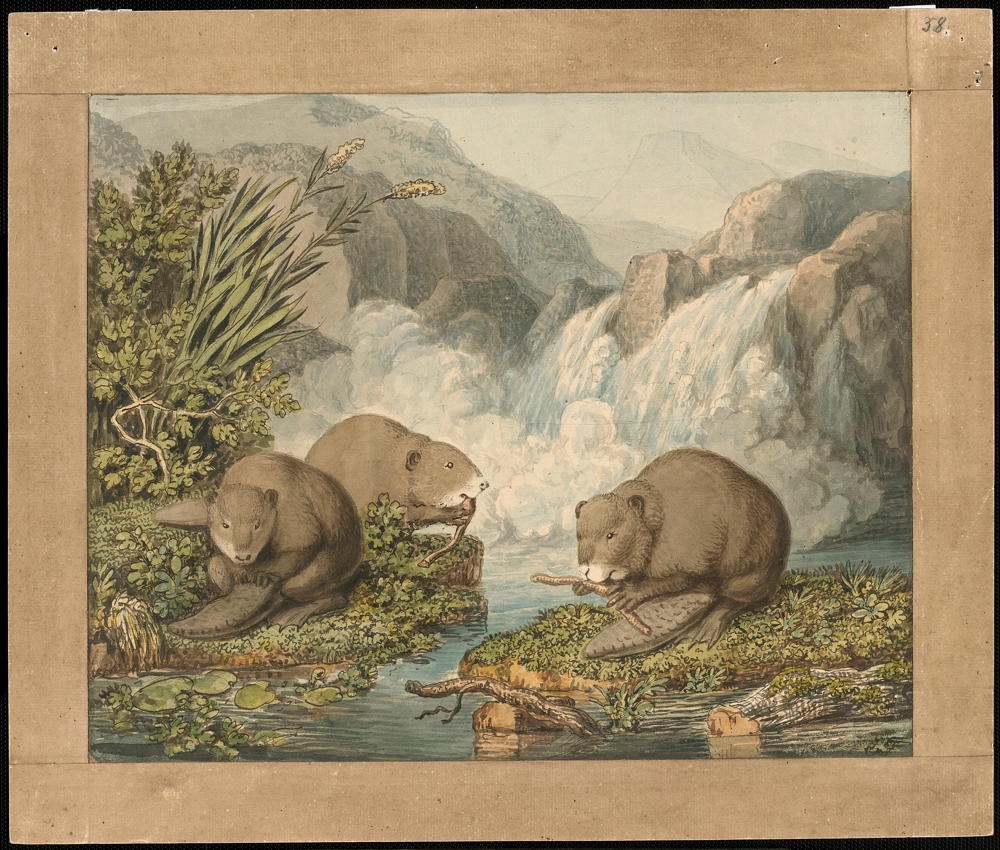
J. H. W. Tischbein:
Three Beavers Building a Dam (c. 1800)
" … surrounded by the effects of our great-grandfather's profound ignorance."
All who live near the end of the Oregon Trail share a heritage. The valley I call my valley, the one they liked to well they named it twice, was once home to artesian wells. The groundwater was under such pressure that when a well was dug, the water would fountain up high into the air. That aquifer was filled with water that had taken twenty millennia to work its way down out of the mountains and under the valley floor. It could be removed in minutes on no more than a whim.
Our forebears were not system thinkers.
Grace

Adriaen van Ostade: Saying Grace (1653)
" … the best example of graceful aging I can imagine."
There but for the Grace of some God or Gods, went I. I have lived a remarkably fortunate existence, an unbidden gift for an unworthy recipient. I could ascribe all I have achieved to the presence of Grace, the free and unmerited favor of some God or Gods I very likely would not believe in if they were identified. I suppose this attitude alone qualifies me as a heathen. Now that I'm recognizably aging, I am urged to at least attempt to accomplish my aging gracefully, whatever in the Hell that injunction might mean. The Muse complains that I have been complaining about almost everything lately, and I reluctantly admit that I have been. Was I not supposed to complain about everything that failed to work as expected? Technology grows progressively—regressively—worse with every upgrade and innovation. Is this phenomenon evidence of technology aging gracefully? It might be that my pointing out the increasingly obvious shortcomings of Google Drive Apps amounts to one sort of Grace. My complaints beat going unconscious in the face of such disgraceful performances.
Grace might be the great undefinable.
Weekly Writing Summary For The Week Ending 6/20/2024
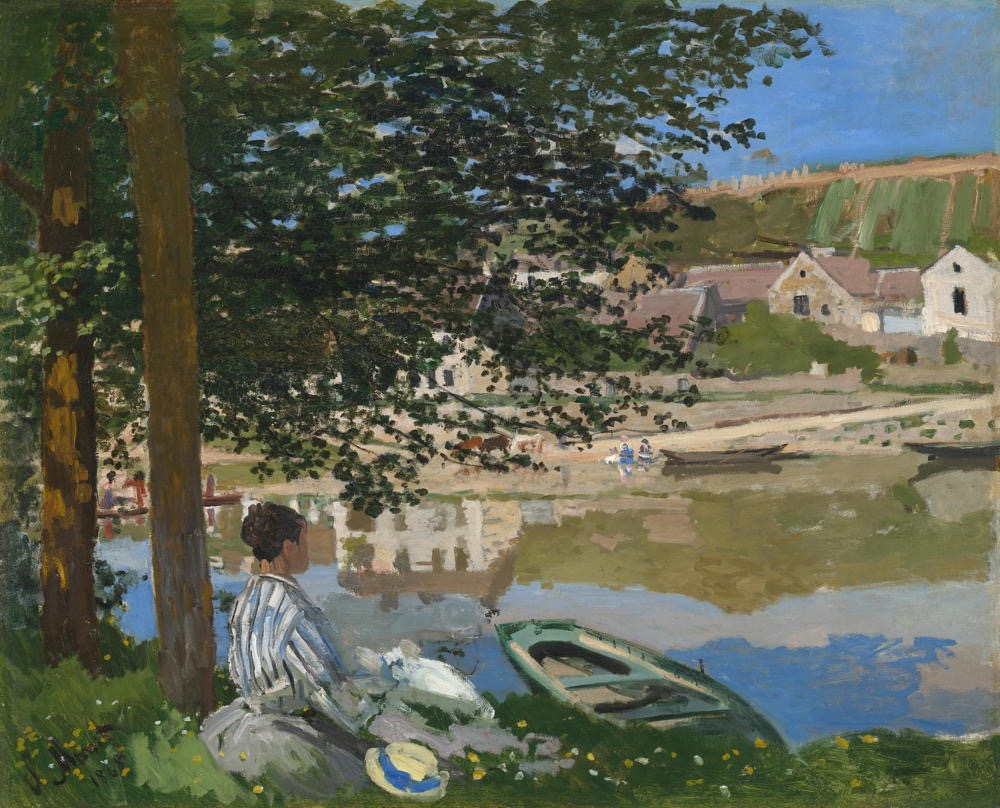
Claude Monet:
On the Bank of the Seine, Bennecourt (1868)
This One's No Exception
My first great-grandparents had an asparagus farm on what would become The Hanford Reservation. In 1940 or so, the War Department bought their farm and their neighbors' farms, even the nearby town. For my great-grandparents, this sale was a godsend. They bought a small house on Pine Street in Walla Walla and retired in greater ease than they'd ever imagined experiencing. My mother remembered visiting their tarpaper shack where only the parlor had proper wallpaper, the other rooms were papered with newspaper to keep out the drafts. Nobody was ever allowed in the parlor. Today, Richland, Washington, where The Muse and I stayed last night on our way to the State Democratic Party Convention, to which we've been elected delegates, is part of the third largest metropolitan area in the state, with over 300,000 inhabitants. My mom remembered before Richland existed when adjacent Kennewick consisted of a single gas station/grocery next to the ferry. There were no bridges across the Columbia River. The Army used those former asparagus fields to centrifuge the plutonium used to blow this world to kingdom come, leaving behind a permanent superfund site that fuels this city's continuing growth. When I was a kid, we referred to this place as The Dry Shitties rather than their formal name, The Tri-Cities. There were good reasons General Groves chose this place in the first place, perhaps chief among them, the preexisting desolation. It's growing like a weed because weeds always grew best here. Every prior generation secretly believes their world's headed for Hell without the requisite handbaskets. This one's no exception. Thank you for following along through my Fambly Stories!
RaggedBegending

Josua van den Enden: Kaart van het oude Gallië
[Map of ancient Gaul] (1627)
"I might just have too much left to learn or too much left to forget …"
I introduced this Fambly Series ninety-two mornings ago, three full months. Since then, I have created a fresh installment every day. This story will forever be number ninety-three, the final one, a ragged ending and also a ragged beginning for whatever follows, a RaggedBegending. As those who follow my writing already know, I deliberately avoid deciding my route too far ahead of my present. Nature abhors tidiness even more than it abhors vacuums. It demands an uncertain orientation, a welcomed not-knowing rather than another clever plan. Life should properly feel disorienting, lest we lose some critically important facility. We can connect our own dots, thank you very much. We do not natively need anyone to tell us what their story means for that's for each witness to decide. As the writer here, I work hard to disclose what I'm coming to know. This series has been the most enlightening one I've created so far. Even now, though, I see better than when I started just how much story remains to discover and to tell.
Fambly seems everyone's proper occupation.
Protege

Jacob Matham, After Hendrick Goltzius:
Hendrick Goltzius, a famous Protégé (1617)
" … this series comes to you due to the steadfast patronage of The Muse …"
I am a kept man. Though this arrangement should seem shameful to both my patron and her Protégé, we've worked our way into acceptance of the way our lives have become. I was The Muse's Patron for a time, encouraging her to steal what was once my consulting company if she wanted to become a consultant. She succeeded in satisfying my injunction and ultimately succeeded me in managing that firm, much to the betterment of us and that firm. When the firm went bust in the not-so-great 2008 Recession, we were both thrown out of our profession. We were a month away from losing everything when The Muse was offered and accepted a job. As I mentioned earlier, her employer had no notion of how The Muse would engage when fulfilling that position, and she remained a surprisingly resourceful contributor until after that hiring boss retired. She became the money earner and I became her Protégé, not that I was in training, mind you. Protégé is the proper term for anyone receiving patronage. Most of the greatest artists throughout history have received patronage and were also "kept," much to the benefit of succeeding generations of art appreciators.
Our economic notions lean heavily toward the Self-made Man theory of vitality, that success demands no less than economic viability.
Entrepreneur

Pierre-Auguste Renoir:
Portrait of Monsieur Choquet (c. 1875)
"She remained a puzzlingly successful handful …"
I fear that these final installments of this Fambly series might have become too confessional, though I suppose it might be acceptable to tell all in the interest of fuller disclosure. I wanted to avoid creating one of those silver-plated tin sculptures so often offered as family history. I aspired to include actual history and not simply the mysteries and highest points on the excursion. I might have shown both the best and worst of times and thereby come close to presenting as it actually was, given that we have no clear translation of the manners of living from century to prior century. I assume enough without trying to edit out inevitable dirty laundry.
That said, I eventually became an Entreprenuer.
Dismemberment

Meester van Antwerpen (I) (attributed to):
Christus predikt over scheiden
[Christ preaches about divorce]
(1485 - 1491)
"Some experiences just come to pass …"
The data seems straightforward: birthdate/place, marriage, birthdates of children, death date/place. Almost nobody got divorced in the old old days. The church forbade it. Monarchs would occasionally seek a pope's dispensation and sometimes receive it, though even kings were expected to show some restraint. The third time anyone pleads ignorance after they married another first cousin, even a pope might lose patience and insist that such close relatives should try harder to get along. I think of divorce as a more modern phenomenon, but it's almost as old as marriage. Several of my ancestors carried on with something like informal plural marriages, never working very hard to hide their mistresses. This practice, though, was publicly frowned upon as unseemly. One was expected to keep their dalliances private, especially when with a commoner. Infidelity among the upper classes might have been common, but the details were rarely considered to be worthy of common knowledge.
I call my first divorce my Dismemberment because it pretty much tore my life apart.
UrbanPioneer

Max Liebermann:
Dutch Village Scene with Hanging Laundry (1890)
Nearly three years later, I graduated from Portland State University with a BS Degree in International Marketing, a field I was neither qualified for nor deeply interested in entering. My University education sort of happened to me, my primary interest being to get through it in as short a time as possible and with minimal fuss. Betsy, my first wife, had grown increasingly impatient to start a Fambly of our own, and my education was standing in the way of realizing that goal. In the end, or near the next beginning, 'we' became pregnant and our son Wilder was born three months before I'd graduate with my BS Degree. The degree itself, though, worked its magic as I had already been promoted at the job I'd taken to pay for that education. I became a supervisor before I'd even graduated, overseeing a small unit of clerks responsible for processing unusual payments. I was in no way qualified for that position, either.
That final quarter of school was a challenge.
ThePotWizard
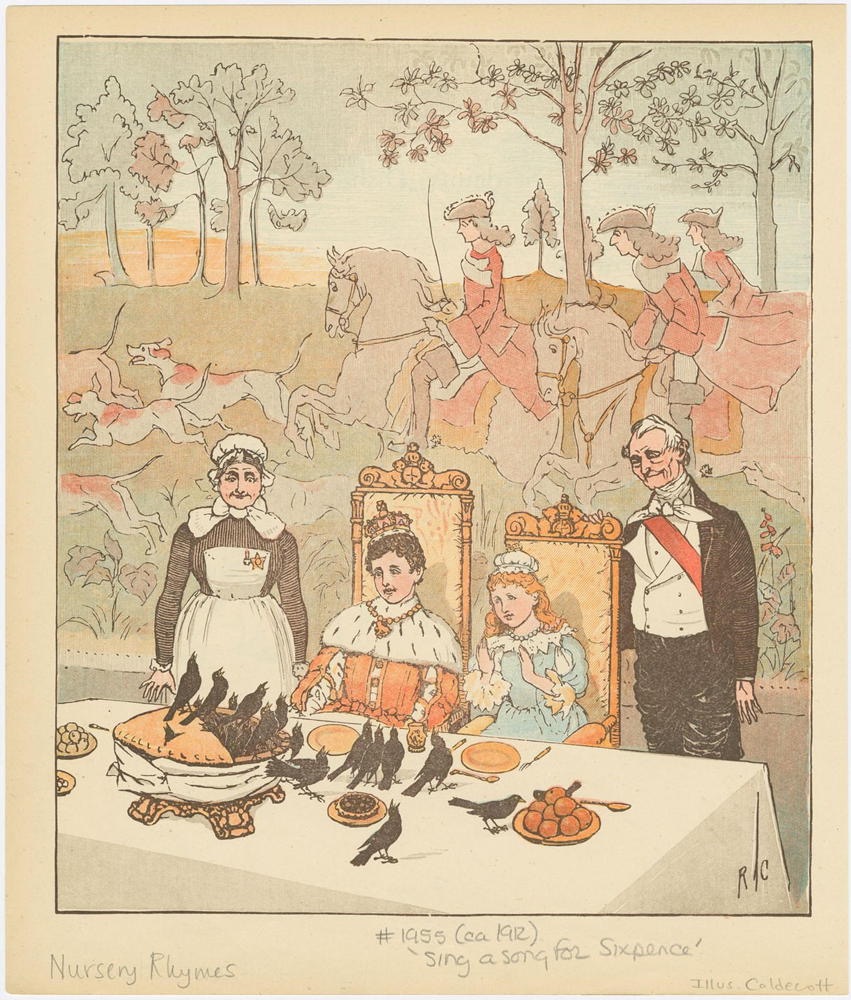
Randolph Caldecott: A dainty dish. (Undated)
"Me, eternally ThePotWizard …"
Everyone stumbles into and back out of different personas as they proceed through life. After I left The Old Home Place, I began to think of myself as David, the single acoustical performer, complete with an agent who would book me into inappropriate venues. There might not be any better way to master any skill than to attempt to deploy it in inappropriate venues, places where the audience is not particularly predisposed toward acceptance. Most would rise no further than indifference, reinforcing that nagging sense that I was an imposter pretending to mimic myself, a common notion among any budding creative class member. I persisted so that when my to-be first wife, Betsy, finished her university studies, completed her mandatory three-month practicums, and found her first professional job—In Northeast Pennsylvania—, I had convinced myself that I was a songwriter of some prominence. I hadn't hit it big yet, but success tends to be elusive in those contexts and should not be confused with anything other than ordinary. I accompanied her backward toward an Eastern Eden at the other end of our Oregon Trail.
After years of living in shared apartments in Sleezeattle, finding and renting our own apartment back east seemed terribly grown up.
Weekly Writing Summary For The Week Ending 6/13/2024

Ueda Kōchūex: Boy on a Bull (late 19th century)
Nothing Like Finished Producing
Something clicked as I worked my way into the part of this series that involved recalling my history rather than recounting my ancestors'. It felt as if I'd recovered some sense I'd misplaced along the way. I'd chalked that absence up to aging, considering that I might have been losing some cognition and had settled into attempting graceful acceptance, when there it was back again. I suited up and engaged in some chores I'd been too effortlessly procrastinating, understanding that I hadn't lost anything after all. Perhaps I'd just stalled. Maybe I'd needed a break from my routine if only to reassert some overt expectation again. Maybe I can still make my own decisions and choose to do what I probably would have expected myself to do anyway. There's ultimately never any running away from responsibility in this Fambly. I have considerable history to represent here in the present. I still have some history to create, too. I'm nothing like finished producing yet.
Becaming

Francisco José de Goya y Lucientes:
Boy on a Ram (1786/87)
"I had been Becaming all that time before."
I lived at TenFifteen for thirteen years, from when I was five until I was eighteen. I did not grow up there, certainly not completely. I continued growing up there. Mostly I was Becaming. Becaming occurs as a result of aspiring to become something. While still aspiring, you have not yet become whatever you aspire for. Later, you might surprise yourself to see that you achieved that dream, or some significant piece of it. Then, the effort expended might seem as if it was more than mere dreaming. Then you notice that you've changed and that you're no longer a mere aspirant, but that you embody an actual achievement. You had been Becaming. There was scant evidence that you were making much in the way of progress until you manifested the difference as if by magic.
Those thirteen years seem absolutely magical in retrospect.
TenFifteen

1015 Pleasant Street, Walla Walla, Washington 99362
46.06265478666864, -118.31136536454669
My Old Home Place
" … some curious cross between Tom Sawyer and Swiss Family Robinson."
My fambly moved into TenFifteen Pleasant Street when I was five. It seemed more like a haunted mansion than a home then, cavernous and grand. The yard, almost an acre, seemed bigger than the whole neighborhood around SixFortyFour. The back fence abutted onto a neighbor's horse pasture which featured actual horses that would nuzzle us through the wire. An enormous pipe swing sat in a side yard, near a large brick barbeque. Trees covered the upper two-thirds of the lot: an apricot, a pear, and an enormous ancient crabapple. A matched pair of birches framed the front yard along with a gnarly ancient locust and a silver maple beside the driveway. Spirea anchored a wide porch that stretched clear across the front. A huge mock orange and numerous ancient lilacs framed the left of the property, along with a sharp spruce and a triangular rose garden with the sweetest Peace rose I've ever smelled. Iris beds graced the front and back yards. A Mulberry tree shaded a long pipe clothesline between the house and the large detached garage. This house would amplify my sense of living in a Walt Disney movie to some previously unimaginable Nth degree, complete with a Tom Sawyer Island in every way superior to the actual one in Disneyland, California.
This would become my birth Fambly's Old Home Place.
SixFortyFour

644 N Seventh Street,
Walla Walla, Washington 99362
46.07182° N, 118.34825° W
Google Maps® Street View (2012)
"An older woman who remembered pioneer days lived across the street."
I grew up in a Walt Disney movie. After all those generations preceding me, I became the fortunate son of the inheritors of all that history, Bob and Bonnie Schmaltz (nee Wallace.) They met and fell deeply in love in Condon, Oregon, marrying in 1945 amid a controversy of their own making. Bob had been born Catholic. Under the ever-watchful eye of his grandfather and grandmother, he was raised Old Catholic, the kind tempered by ample suffering for the faith. His grandfather ruled with an unforgiving iron hand. Had he not died by then, he would have been appalled when Bob agreed not to be married by a priest in the Catholic church. My mom would not consent to catechism classes. After centuries of her family practicing what probably passed as Calvinist faith, she was indifferent, even skeptical of religion in general. The priest insisted that no Catholics attend the nuptials, which meant the groom's family could not attend. Nobody could go anywhere in such a small city without bumping into somebody. They began their married life in controversy.
They were doting parents, delighted with their fate.
Modernity
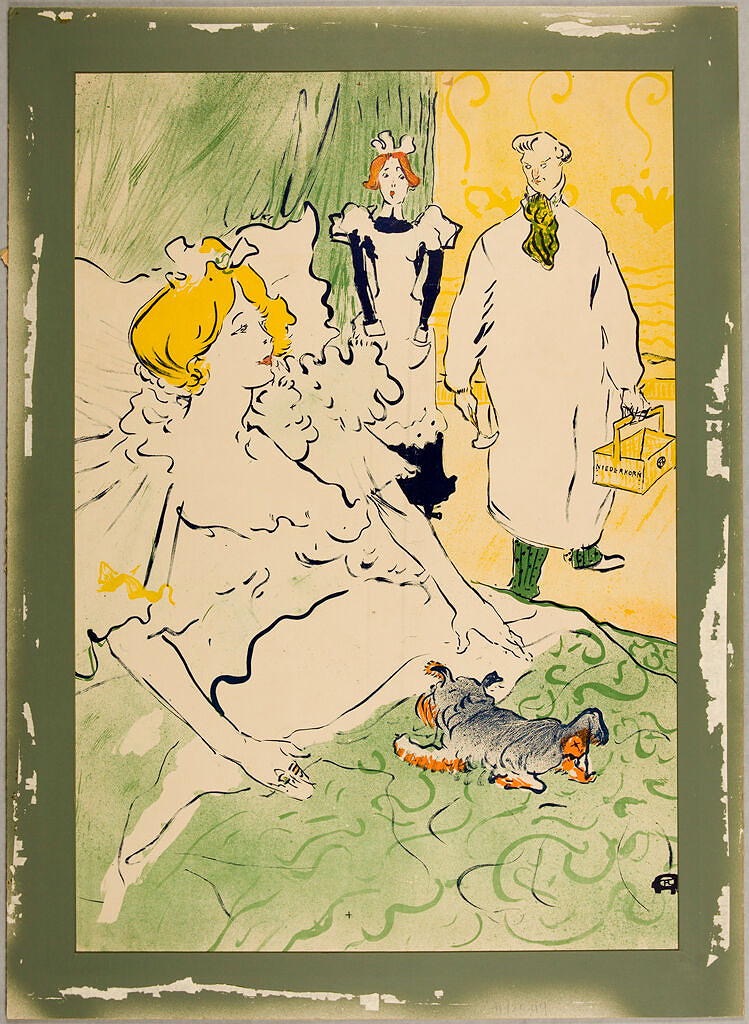
Henri de Toulouse-Lautrec: The Modern Worker (1894)
"Modernity always promised much more than it ever once delivered."
As near as I can determine, Modernity must be in the eye of each beholder. I suspect that every generation stretching back to before recorded history believed itself to be the very soul of Modernity, for how could that not have been? Each successive wave represented the most advanced one to date. There were, in fact, none more current than whichever one was present, even when The Dark Ages overtook previous pinnacles of civilization. Those apparent retreats, too, represented an alternative form of advancement. Progress only sometimes moves forward. Some failures seem like an inescapable part of success.
Most of the history I've been reporting here occurred in a world lit only by fire, an almost unimaginably primitive state for those who have more recently arrived.
Absence

Adam Willaerts: Ships off a Rocky Coast (1621)
"One can genuinely never return home again."
Absence was always a prominent part of my Fambly's history, for even when one of my ancestors fulfilled the role of Lair of some Scottish estate, he was frequently away on business. He might have traveled to Belgium or Holland to oversee the transfer of the wool he'd raised or off on some errand for his Lord or King, for most land was held in feudal trust, and the owner paid his rent in service as well as shares of crops, just like his serfs. Throughout most of The Middle Ages, wars raged in nearly endless succession. The Hundred Years War lasted almost three generations and was fought on the continent. English lords and serfs beat a steady path through Calais to battle away with the French, their first and second cousins. Even monarchs volunteered for Crusades, which could take them away from their homeland for years and often forever. It was no sign of sophistication when people traveled, but most often, a sign of simple obligation.
In my generation, my sister and I felt the need to leave our old hometown to create our lives.
TheStepMother

Eleanor Beauchamp, TheStepMother's Mother
Depiction of Eleanor from the Rous Rollc. 1483
"She was not beheaded by beserver Yorkist extremists."
TheStepMother's mother, Eleanor Beauchamp, Duchess of Somerset, was a fine lady. Married three times, she bore thirteen children in her fifty-eight years. Her first marriage to Thomas Ros, 8th Baron Ros, produced three children and ended when her husband, participating in the Hundred Years' War in France, fell into the Seine during a minor skirmish and drowned. Her second marriage to Edmund Beaufort, 2nd Duke of Somerset, produced ten children, including TheStepMother, their second child, and their second daughter, Joan Beaufort. Edmund Beaufort was a polarizing figure in war and politics. Henry VI assigned him to replace his chief political rival, the Duke of York, as head of all English forces in France. Edmund became notorious as the one responsible for losing all territory won there by the English, thereby ending the Hundred Years' War. He returned in relative disgrace, though the king held him in considerable esteem. Ultimately, the king could no longer protect him, and he was captured and killed by York forces in the first battle of St Albans, the opening volley in what would become The War of the Roses. This conflict would ultimately take two of TheStepMother's brothers, both killed on the same day. Eleanor's third husband, Walter Rokesley, produced no offspring. She died in Bayard's Castle in London, a known Yorkist hangout.
It would have seemed a wise move for TheStepMother to leave Old Blighty.
Weekly Writing Summary For The Week Ending 6/06/2024

Camille Pissarro: Woman Bathing Her Feet in a Brook (1894/95)
Must Be Worth Something
This has been an unusually cool and damp Spring here near the end of the Oregon Trail. It has been perfect weather to contemplate my place in this world. I understand that not everyone can trace their family's history back many generations and that I must be incredibly fortunate to have found traces of ancient ancestors. I admit that these discoveries have given me a radically fresh perspective on who I must be and a sobering realization that few of the characteristics commonly considered inheritable actually are. Still, even imagined inheritances might make some significant difference. The self-confidence I feel knowing I had powerful ancestors seems to be making some difference. My sense of self seems unusually elevated now. My usual sense of isolation has become a story I struggle to believably repeat. I feel less alien and more at home, neither in any way negative sensations. So, while these sensations might not result from inheritance or evolution, they still seem to make a real difference in the quality of my experience. This series has been the most enjoyable for me to write, and that enjoyment must be worth something in the larger scheme of things.
AfterEden
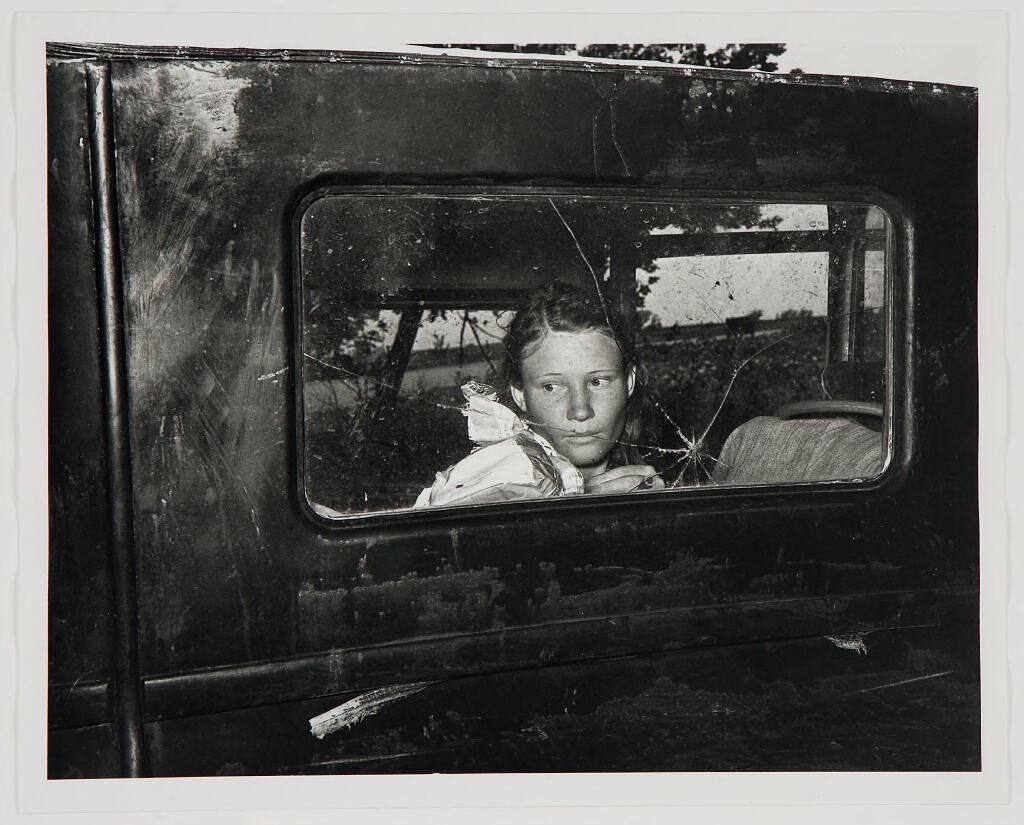
Russell Lee:
Child of Migrant Worker in Car, Oklahoma
(1939, printed later)
"If we're fortunate, we'll stumble into another …"
After The Muse and I went bankrupt in the not-so-great crash of '08, we were exiled into an unwanted but necessary adventure. The Muse found an unlikely job that required her (us) to relocate from what had been our Eden Near The End Of Our Oregon Trail to a suburb of Washington, DC. We didn't have to worry about mistaking there for any place near any Eden. It stood about as far from Oregon as anywhere on this continent could. It prominently featured many attributes that would motivate any half-witted emigrant to head out across any hostile continent, but there we were for that time as if working off some debt to society or ourselves. We got extremely fortunate in ways that never would have found us had we stayed safely ensconced in our Eden. Back there—for it certainly seemed as if we'd taken a giant step backward—gravity didn't work right, yet things seemed to turn out all right, or all rightish, from the outset. We found as close to a perfect place in what would turn out to be the ideal suburb for us. We found decent, helpful neighbors. That most un-Eden-like place came to feel like another Eden to us, especially when we compared it to where we might have ended up.
Throughout my lifelong migration, good fortune has dogged my paths.
EdenAtTheEnd

Russell Lee:
Fall spinach. Willamette Valley,
Clackamas County, Oregon (1941)
"We were guilty of a tenacious innocence …"
The EdenAtTheEnd of the Oregon Trail was both everything dreamed of and a severe disappointment. Despite all the focused aspirations, nothing about the underlying human condition turned out to be any different there. People continued to be born and retired at just about the historical rate. It didn't turn out to even distantly resemble Heaven on Earth, though it seemed plenty close enough after the centuries of trials required to arrive there. The weather offered more rain than most thought necessary, though it somehow avoided the deluges remembered from the Appalachians, Tennessee Valley, Missouri, and Nebraska. Tornados were gratefully unheard of there. Snowfall was rare, and the soil ranged from fair to absolutely heavenly. Roads were muddy, but enough unwanted trees stood that they could be harvested to create corduroy roads. Resources at first seemed infinite. Salmon in the Spring routinely came in enormous sizes; one fish would be the capacity of a buckboard wagon. We complained about having to eat fresh salmon more than a couple of times each week. It was readily available for seven in season.
The natives barely noticed our arrival, and those that did either died of our diseases or were quickly subdued and moved to reservations away from the more promising of these promised lands.
TheTrail

Carleton Emmons Watkins, Isaiah West Taber:
Mt. Hood and the Dalles, Columbia River, Oregon (1867)
"Those of us who were born in Eden …"
Few modern travelers could tolerate even a day's distance in a Conestoga wagon, especially on what passed for roads between 1840 and 1870. Especially in the earlier years, the so-called Trail was more rumor than actual, an asperation much more than a manifestation. The journey was challenging, even for those accustomed to traveling by Conestoga wagon. It was slow, even for those experienced driving oxen. It was dangerous, too, though not usually due to unfriendly Indians. The travelers themselves tended to be their own worst enemies. They insisted upon bringing heirlooms they could not bear to leave behind in the care of relatives. They brought too much frivolous stuff and not nearly enough of the essentials. They carried enough innocence to carry most more than two thousand miles across some of the most hostile and forbidding territory few of them had ever previously even imagined. They traveled The Oregon Trail.
Before 1880, every member of my Fambly that came West seeking their Eden at the end of TheTrail, came by The Trail.
Plantation

Print by anonymous artist: Tobacco plantation (circa 1745 - 1865)
"We Americans are nothing if not overflowing with contradictions."
The Plantation became the British means of colonization before Henry VIII's reign. He broadened and deepened the institution, employing it as the primary means for subjugating enemies and employing otherwise idle citizens. He began the large-scale use of indentured servants in the service of state-owned agricultural enterprises. Each Plantation was run like a stock corporation, with the labor considered just another commodity required for production and humanity at best a side consideration. At the time, England had laws that insisted anyone without a profession was required to labor for a better, a better being anyone of greater means. Part of the justification for chartering the Virginia Company, which oversaw Jamestown and other early Plantations, was to put idle hands to work. It was a strategy to subdue the rabble through forced employment.
All but one of my forebears arrived in this country as some sort of servant.
Scotch

G. Woolliscroft Rhead:
And last of all, they burned him to ashes at the stake.
Thus came Faithful to his end. (1898)
"I feel wealthy in stories, indeed!"
In my twenties, when I was imprinting on what would become my preferences in liquor, my peers chose everything but the Scotch I selected. The other choices never tasted right to me. Bourbon tasted like Sugar Corn Pops®, and not in any pleasing way. Vodka struck me as better used as a cleaning fluid. Brandy tasted far too sweet. Tequila fully qualified as horrid! Scotch offered exotic flavors with a caché of mystery. I preferred Dewars with a twist of lemon, an order that reliably raised one of the waiter's eyebrows in response. I presumed the eyebrow signaled a highbrow sign that he suspected I must know what I was doing. Honestly, I never knew why I'd chosen that one. It just seemed proper to me. Later, when selecting a Single Malt, I gravitated toward Dewars' offering, Abefeldy, without once suspecting that fifteen generations of my forebears had lived near Aberfeldy in Lanarkshire, on the Blackwood estate there. Several had been declared Laird of the place, fer cripes sake!
My last installment of this history followed Robert Weir from Ireland to Massachusetts and Oregon through his great-great-granddaughter, my great-great-grandmother, Elizabeth Lovelady Bounds.
Scotch-Irish

Thomas Frye:
Young Man with a Candle, from Life-Sized Heads
(1760)
My Scotch-Irish ancestory stretches back to House of de Vere, part of William The Conquerer's entourage in 1066. Scotch-Irish immigrants to the New World colonies resulted from failed immigration policies implemented by the British government in Ireland since at least Henry VII's reign in the first half of the seventeenth century. The English Civil War a century later served to exacerbate further the difficulty as both Oliver Cromwell and his successors fought to subdue the Irish and their infernal Catholicism. One continuing strategy had been the creation of The Ulster Plantation, a plan to overwhelm the native Irish chieftains by resettling their ancestral lands with Scottish Presbyterians. The Chieftains felt obligated to fight back, which they did with great ferocity, continually losing, resulting in The Troubles. Northern Ireland remained unstable and hostile, resulting in multitudes of fleeing Presbyterians. It would have to have been that some of those who would ultimately become my forbears would have come from the Ulster Plantation. No shortages of them came to this country during the early eighteenth century.
My Scocth-Irish forebears, Robert and Martha Ware, and family came to this continent under Rev. James MacGregor during Queen Anne's War to escape religious persecution in Ulster.
Weekly Writing Summary For The Week Ending 5/30/2024
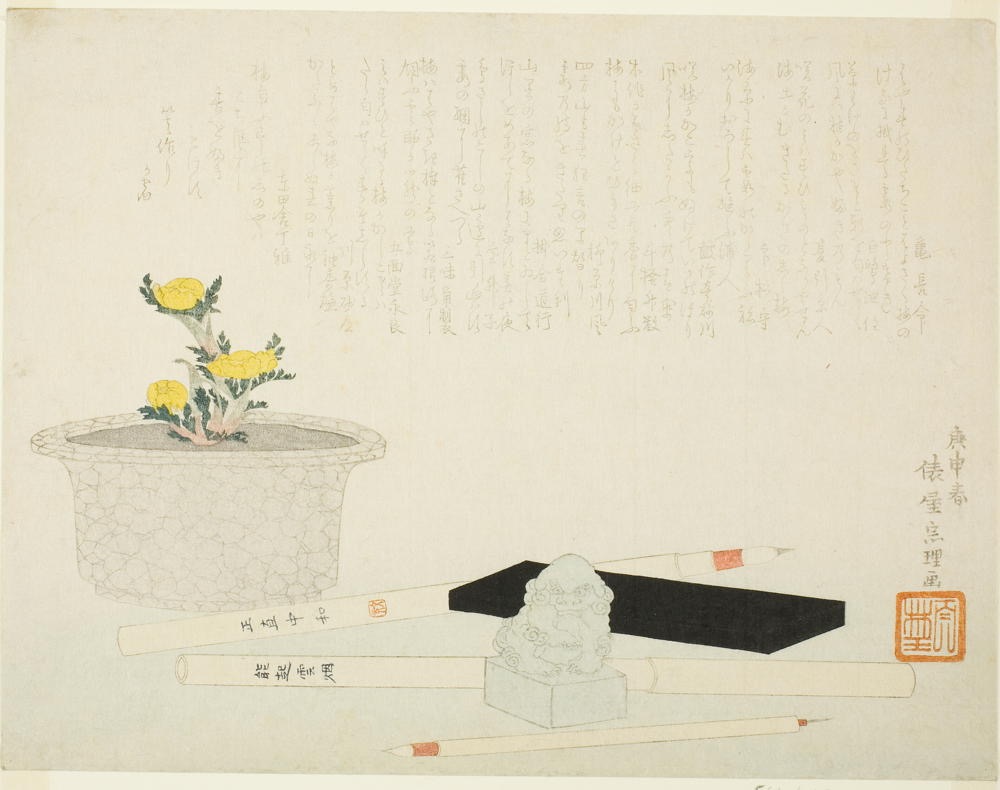
Hishikawa Sori III:
Potted adonis with writing implements (1800)
Delving Into History Insists
Delving into history seems like an inherently dangerous activity. While nobody can ever honestly foresee their future, the same holds for foreseeing their history, for it couldn't have possibly been as expected. The very nature of forebears seems mysterious, just like nobody ever understands the underlying nature of their parents' relationship’s covenant. It's not exactly a secret but of another context, not for anybody but the principles to ever profoundly comprehend. No amount of study will ever unwrap the underlying mystery, though even superficial study seems likely to uncover previously unrecognized elements. The same holds for distant ancestors as it must for immediate family. Dealing with more distant relatives erases the more closely shared context immediate relatives share. I have no possibility of anticipating the lives of relatives who spoke now derelict languages in places impossibly different than any surviving place in this world. Their motives must leave me clueless. Their morals simply must seem questionable. Delving into history insists upon me exercising my most generous possible interpretations.
Colonization
King Henry VII of England-
Lord Howth was his cousin by marriage,
and a reliable supporter of his Tudor dynasty
"We seem too stupid to survive."
I fear this story will contain little but venom, for I'm finally understanding the meaning of British aristocracy. It was traditionally a means for legally stealing property under various Might Makes Right Statues going back into antiquity. If people had been respectful and decent, they would have had no good reason ever to violate their neighbor's sovereignty with bogus claims of superiority. I'm afraid it became a habit inherited from antiquity. Those who didn't commit atrocities justified by some deity seemed to have been the rare exceptions. They produced little history due to the traditional difficulty of producing an acceptable story once your head's been separated from your body. Service in the Roman Army seems little different than service in the British or the French or the Spanish; it was all slash and burn, kill and eventually be killed, futility elevated to lifestyle. A few enjoyed great wealth, but only when it was possible to enjoy a celebration atop a mountain of moldering bodies.
Norman/British lords invaded Ireland in the late twelfth century under the justification that controlling the Eastern edge of Ireland would make it more difficult for a hostile power to launch an invasion from there.
KatherineSwynford

Unknown Artist: Katherine Swynford,
from her tomb, Lincoln Cathedral (1403)
"Swynford was an exceptional presence."
My eighteenth great-grandmother was born Katherine de Roet in 1349, in Hainaut, a territorial lordship straddling the current border of France and Belgium, the daughter of a knight. She came to England as a child when her father accompanied Phillippa, a daughter of William of Holland, when she married King Edward III. She was raised in the English royal household and reportedly started working there when she was ten, tending to the royal children. One of the king's sons, John of Gaunt, nine years Katherine's senior, knew her well. Katherine married Hugh Swynford, one of Gaunt's knights, at thirteen, a common enough age for noblewomen to marry then. Swynford owned a fiefdom but a poor one. Katherine dedicated herself to caring for the estate, Kettlethorpe, after Swynford died in Aquitaine in 1771 while on a military expedition with Gaunt, leaving her with four children.
Katherine was in and out of the King's and Gaunt's employ after that.
VisitingHistory

Gravestone of Nicholas Daniel Schmaltz,
my fraternal grandfather
" … grateful for the one day each year reserved for performing the obligatorily impossible …"
I didn't make the funeral. I was living in Seattle on an unheated sleeping porch with my to-be wife. Those days, I traveled by thumb, taking to an onramp or highway verge and sticking out my thumb. It took about half a day to travel back home that way and another half day to return. I begged off so I didn't see where they'd buried my grandpa Nick. We were not close. He and my father had a prickly history and a distant relationship, which rubbed off on the kids. When I was in high school, he and his second wife lived almost across the street from my best friend's house, but I rarely stopped by. Later, they relocated to be closer to her daughter’s family. Nick had been in failing health when he died, not unexpectedly, just a year older than I am today. He became history, but I was not there to witness his inauguration.
The Muse had been after me for years to drive up to visit his grave.
FakingHistory

William Michael Harnett:
Still-life with Flute and Times (1877)
" … nobody has a better foundation than the notoriously unstable shifting sands of time."
Genealogy was never a precise practice. It always relied upon iterated approximations such that its research reliability inevitably degraded. Even the more recent entries can be subject to misinterpretation or faulty memory, and not even recent memory is likely to be all it was cracked up to be. Studies suggest that we interpret experiences even as they occur, replacing unfamiliar details with more readily recognizable ones. Most of this business can be the soul of innocence rather than malign intent or deliberate misrepresentation. Still, some of whatever's uncovered requires judgment to interpret, and humans have grown notorious for unconsciously laying their thumbs on scales. Given a choice between two interpretations, we're likely to select the one that preserves our narrative rather than one that contradicts it, even when we know that experience frequently contradicts precedent. We're usually more interested in maintaining coherence than disturbing it.
All this seems to be the very soul of innocence.
LivingHistory
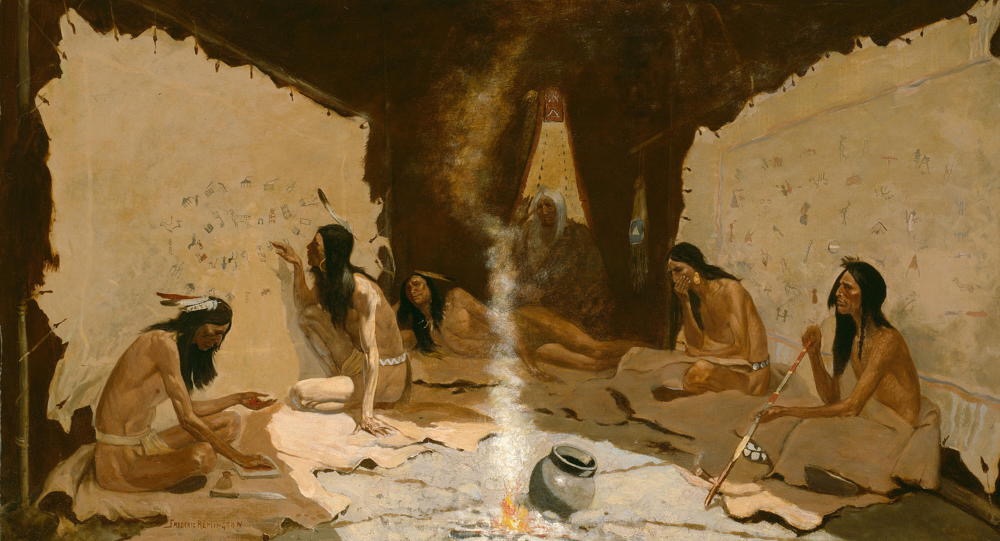
Frederic Remington: Historians of the Tribe (1890–99)
"Cicadas, like history, spend much more time in the ground than they ever spend making noise."
For most of my life, my history has lived in a series of loose-leaf binders, papers separated by surnames, compiled by my Aunt Colleen and her aunts and great-aunts. I occasionally visited these documents to refresh my memories before replacing them back in their basement banker's box repository. When I finally started trying to comprehend the stories, I quickly found nearly overwhelming additional evidence that considerably expanded what I'd always considered my history by centuries. Now, the volume of material should properly prove impossible to remember and also essentially impossible to chronicle. The material I've dredged up creating this series will never be subjected to my Aunt Colleen's scrutiny and organizing abilities since she has already been gone for more than thirty-five years: history.
I feel moved this morning to wonder just where my history resides.
Romance

Antonie Wierix (II), after Maerten de Vos:
Kerkvader Ambrosiusm [Churchfather Ambrosium] (1585)
" … even though my forebears just passed through."
When I entered first grade, I spoke as if I'd come from Missouri, close enough to Southern that I was immediately enrolled in a special speech class so I could learn to speak correctly. I had never lived in Missouri, though most of my Mother's forebears had at least passed through there on their way West. Several had initially considered Missouri their objective, but a short stay within that swampy, gray country convinced them that any place would be better than that fever-ridden territory, even Texas. Fortunately for me, they mostly eventually migrated on to Oregon, though they retained their twangs through the two or three subsequent generations. My grandfather, whose name was Elza, pronounced Elzie, spoke with a lightly amused drawl, mispronouncing many words to my ear. Those were the days before television, before the great homogenization of American English that came from tuning into Southern California every evening. Radio dramas still employed stereotyped ethnic dialects that would curdle my granddaughters' ears and even make me blush. Still, we were reared on Katzenjammer Kids German and Chef Boyardee Italian, whicha was good enougha fur me! I had been unaware that I had been pronouncing my words incorrectly.
I was exposed to properly rolled Rs and final syllables; neither had seemed necessary beforehand.
Weekly Writing Summary For The Week Ending 5/23/2024

Text by Henri of Segusio, Artist unknown: Table of Bigamy,
from the Summa Super Titulis Decretalium Completa (1275-99)
The Only Other Option
I have become weary of my history. I've been too long at the fair. My investigation began as all investigations start, with that mixture of excitement and mystery and the promise of imminent discovery. The discoveries have come almost non-stop, but once I managed to bring together all the disparate threads to my birthplace, I lost impetus. I couldn't quite see the relevance of continuing further. I found some interesting sidelights and notable features here and there along the old timeline. Still, I felt like I had started gilding lilies and wondered how relevant my later discoveries could prove. Was I just muddying up my story with so many coda embellishments? Was I inadvertently producing a rococo history of a rather ordinary family? Very little of my history seems present in my generation. I cannot change anybody's past, though my Fambly's past might be in the process of changing me. I'm here on the pointy end of history where marriages, births, and deaths continue creating FreshHistory like volcanos create fresh territory. My past has inexorably changed me. I might just as well believe it has changed me for the better. The only other option would be worse, and there's no leverage in believing my future's worse than my past.
PowerfulWomen

Meister der Münchner Legenda Aurea:
Joan Beaufort, Countess of Westmoreland as wife of Ralph Neville,
from an image in the Neville Book of Hours (1430-35)
" They created the new worlds their husbands just imagined."
No Fambly's genealogy could ever be understood without acknowledging the role PowerfulWomen played. The histories might be relatively thin on the details describing their influence, but they were just as crucial to creating history as the most noteworthy male. Charlemaigne's second wife (of four), Hildegarde de Vintzgau Herstal, was married at 12 or 13 and traveled with her husband on his military campaigns, dropping nine babies all along the way, including a set of twins and a future king of Italy. She thereby secured her husband's legacy. She died at 26 in childbirth. It's said that she was the grandmother of every subsequent king of England and France, not to mention that one of Italy.
Each generation featured equally PowerfulWomen.
ArcOfHistory

Shield of Ansbert Ansbertus Gallo De BRANDEBOURG,
supposedly my forty-fourth great-grandfather (circa 510)
If you struggle to follow my descriptions of my Fambly history, you're in decent company because I struggle, too. I cannot determine if the more ancient history amounts to truth or fantasy. Even the experts give mixed reviews. I have apparently been reporting the more popular history, the one that the experts find most suspicious. Early Frankish kings reportedly published lavish histories to legitimize their rule. Their ruse, if it was a ruse, largely succeeded in at least creating a ruling myth that convinced most that they were authentic, whether or not they were. I hold questions about how Romans managed to pivot into prominence within both the Carolingian and Merovingian dynasties, both precursors to more modern French and English rulers. The short answer should seem obvious enough. They succeeded by strategic marriages. Wed the daughter of a king, and you became the doted upon son-in-law, and certain avenues open that would have otherwise been closed. If my Fambly history was ever more than mythology, my forebears slept their way to the top, the most old-fashioned of the many old-fashioned ways.
And the top they did achieve.
Genetics

Pieter Serwouters:
An Allegory of Relations between the Generations (1608)
" … the historical record seems clear."
I imagine that one day, somebody will discover a way to reconstruct my Fambly's entire history by analyzing DNA. Then, the birth and death details and the Fambly Tree's intricate webs might become definite and unquestionable. Until then, though, reconstructing a Fambly's history remains relatively painstaking. Between transcription errors and superficial differences of opinion, any two researchers’ results might remain eternally unresolvable. After all, the original principles will never be here to settle any of the many inevitable differences. Who I am will remain a steadfastly subjective question with a slightly less than even any distantly objective response.
Still, science continues her inexorably stroll.
Cohorts
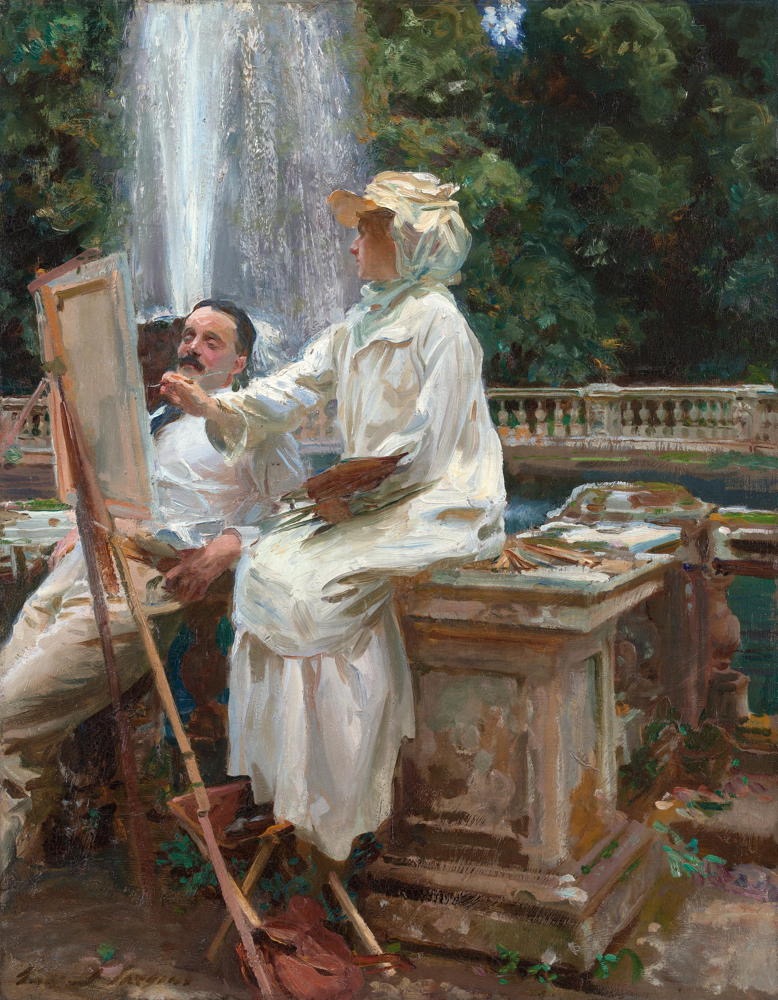
John Singer Sargent:
The Fountain, Villa Torlonia, Frascati, Italy (1907)
" … not merely as mythical rugged individuals."
The typical Fambly tree tells much less than half a Fambly's story, for family constitutes only part of anyone's usual Cohort. We're unavoidably rooted in Fambly, but most of us choose to stray from the founding fold into different country. We marry out of the Fambly, or most of my forebears did. We also often work far away, seeing even our closest blood relations perhaps only on holidays, a scant few days each year, if that. We usually most distantly relate with those to whom we're most closely related, once intimate but later almost strangers. We retain those traits and characteristics native to our Fambly. After all, we did learn the fundamentals together. We probably retain speech and behavior patterns we learned before we became aware of learning anything, our relations appearing in common quirks and similar phrasings.
We spend most of our time on this Earth with Cohorts: work buddies, acquaintances, friends, and neighbors.
DearlyDeparted

José Guadalupe Posada:
Devils in the Graveyard (n.d., circa 1871-1913)
" … not yet wholly history …"
I have visited few of my ancestor’s final resting places, though The Muse and I have tried to visit all we could over the years. We found traces of my earliest immigrant forebears in a well-weathered gravestone for my first Pilgrim great-grandmother preserved in a wall in Guilford, Connecticut. I found a fourth great-grandfather, Major George Currin's stone, in the town cemetery in Galax, Virginia, the one carved by his sons before they left for Oregon. I found Silvanus Seward, another fourth great-grandfather's stone, overgrown in an almost abandoned upstate New York cemetery. I never met any of these revered ancestors personally, though. In my life, I’ve met only the most recent tier of ancestors, most of them just before they became ancestors when they were still grand and great-grandparents, aunts, and uncles. I've even lived long enough now where I've known some contemporaries and their offspring who left before me, none of them ancients yet; I think of each of these as the DearlyDeparted.
Those who lived centuries ago might spark my imagination and even garner heartfelt admiration, but I never actually knew them, so my affection feels distant.
FreshHistory
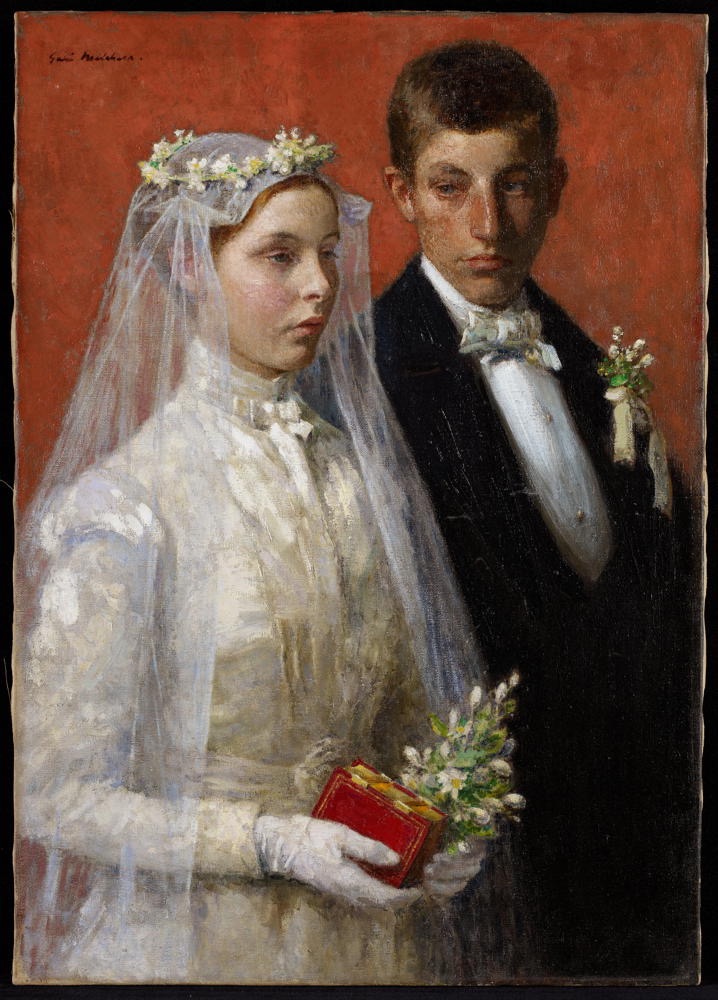
Gari Melchers: Marriage (1893)
" … we attemded a banquet."
Every present moment inexorably slips into some past, but not every past qualifies as history or aspires to. I might best describe much of everyday experience as maintenance, not in any way a similar substance to what might inexorably become history. Births, deaths, and marriages seem destined to become history, while the memory of Tuesday's supper doesn't seem likely to make it to the end of that week. Every moment might ultimately reek of significance. What wouldn't we give to have a portrait of a typical Tuesday supper from the Middle Ages? Events must have seemed as disposable and unimportant to our ancestors then as our odd Tuesdays seem to us now. That said, though, we occasionally engage in making FreshHistory, moments that seem likely to become posthumously noteworthy, worth remembering, and entered into the permanent record.
For The Muse and I and close Fambly, one of those events occurred yesterday with the marriage of our dear GrandOtter.
Weekly Writing Summary For The Week Ending 5/16/2024
Honoré Victorin Daumier:
“Sir… Sir… Siiiirrrr… Christ, it’s annoying to have a colic
when the supervisor is supervising,”
plate 13 from Professeurs Et Moutards (1846)
Some Statement of Gratitude
I carefully tot up the page views each of my postings receives through the week to create what I call my TotList. This one-page weekly writing summary serves as my analytics since the analytics others provide don’t work for me. I understand that my analytics would seem primitive to anyone in the actual business of analyzing web traffic, but my writing’s nobody’s business but mine, and I don’t care about making money posting it. I seek some confirmation that you, my audience, have been out there. Unlike many of my much more famous royal ancestors, I don’t seek fealty from my readers, and I’m proud for my writing to serve as no more than a mild, if regular, distraction from more troubling issues. I count views because I care that someone’s there, that these stories end up somewhere. Some weeks, like this last week, my stories produce far fewer hits than my other doings. One photo of a plate of oyster shells might receive twice the number of views as the best of that week’s stories, as if that mattered. What matters for me here must be the engagement. That’s what gets me up and writing even when I can’t quite decide what to write about. That’s what encourages me to produce these Weekly Writing Summaries, even though they’re by far the most difficult posting I produce each week. I delight in framing each writing week, however difficult, in some statement of gratitude. Thank you for following along.
FeepingCreaturism

Various Unnamed European Artists (19th century),
compiled by Queen Adelaide of England:
Queen Adelaide’s Album (1823–1837)
" … something quite the opposite of an encyclopedic rendering."
The arc of history seems to trend toward the ever simpler. What starts as complexity resolves into simpler forms through extended iteration until it might almost seem routine. We eliminate apparent meaningless effort to focus activity toward producing results, dropping ceremony in favor of what we firmly believe to be ever greater efficiencies. Left to its own devices, genealogy would probably eventually smother itself with ever-greater detail, for every life has always been lived at one-inch-equals-one-inch scale, so every representation can be found to be wanting: another clever exposition, another sidebar comparison, another history lesson to better outline the then present context. The genealogist never rests. He's always looking for additional angles. Without care, any Fambly's history might mature to become precious, even self-conscious, when it probably should have remained in some much simpler forms.
Engineers use the term FeepingCreaturism to label this tendency for something to become ever more complex in development.
DeconstructingHistory
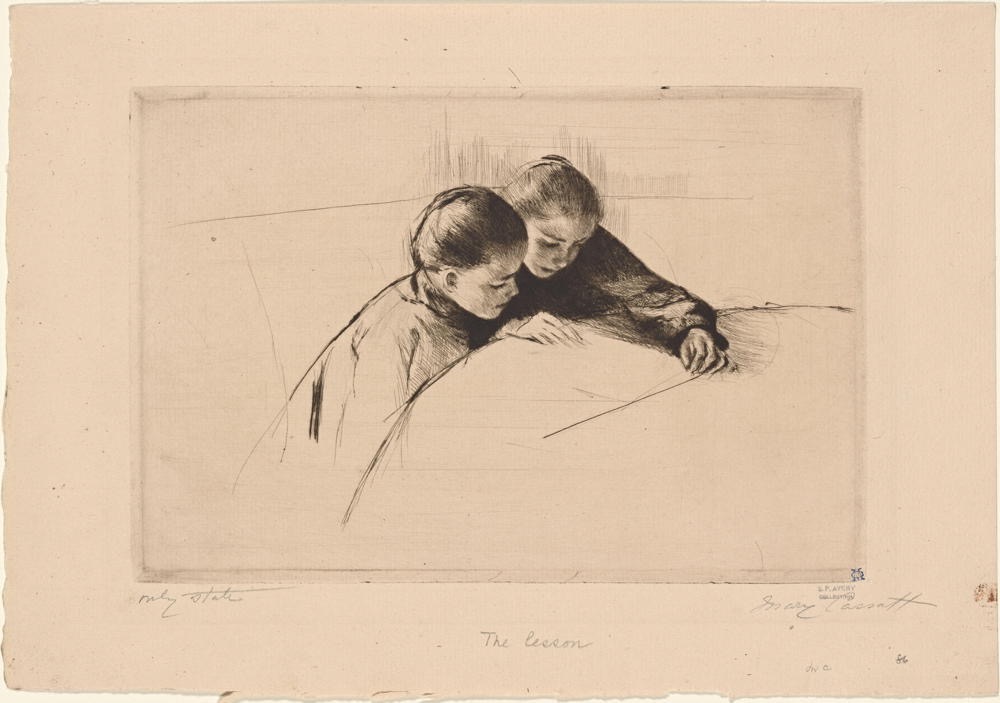
Mary Cassatt: The map (1889)
" … anybody interested in this Fambly's history will have to rediscover it for themselves …"
In the end, or nearing the end, I carry too many stories. Each seems especially important, even magical, for they represent discoveries. They were once lost, and now they're found, but in finding them, I overwhelmed my ability to retain them. What I initially complained about as clutter, I might have merely transformed into another form of clutter, open tabs rather than dog-eared loose-leaf notebooks, or open tabs and loose-leaf notebooks with fresh pieces of paper slipped in between the pages. I might have made the archive worse. This might represent the curse. We firmly believe that only we will make this world coherent before discovering that the best we mustered was a different form of the same old incoherent mess.
Maps hold some hope.
UnderConstruction
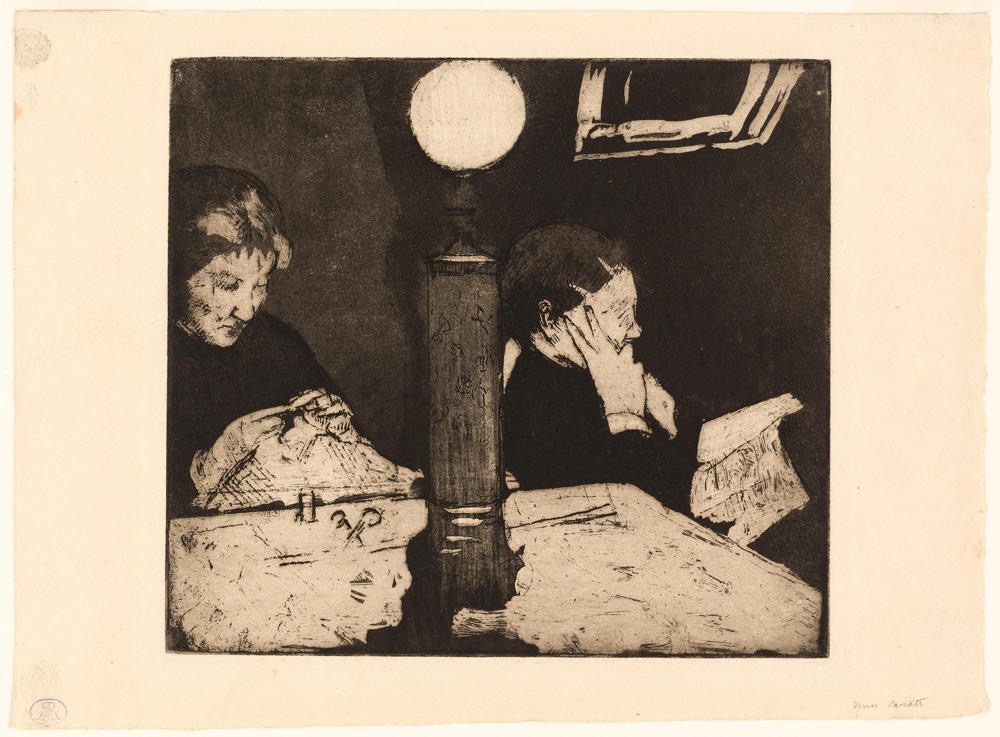
Mary Cassatt: Under the Lamp (c. 1882)
" … this series remains UnderConstruction and strenuously avoiding completion."
This series remains under construction. It might appear that I'm getting closer to finishing this series of stories with each installment, but each piece might be better considered preliminary. I've not yet decided where this series will end, for instance, so each fresh chapter probes in the hope of discovering where and how to finish it. Each story might stand on its own, but I intend that they be connected. I know my fifth-grade teacher also insisted that I should outline a work before beginning to avoid precisely this unsettling eventuality, except that I was never able to successfully know all I would have needed to know to outline anything before I started writing. The act of writing finds the way, not the other way around.
Consequently, I'm challenged to learn many things on the fly.
Visualizing
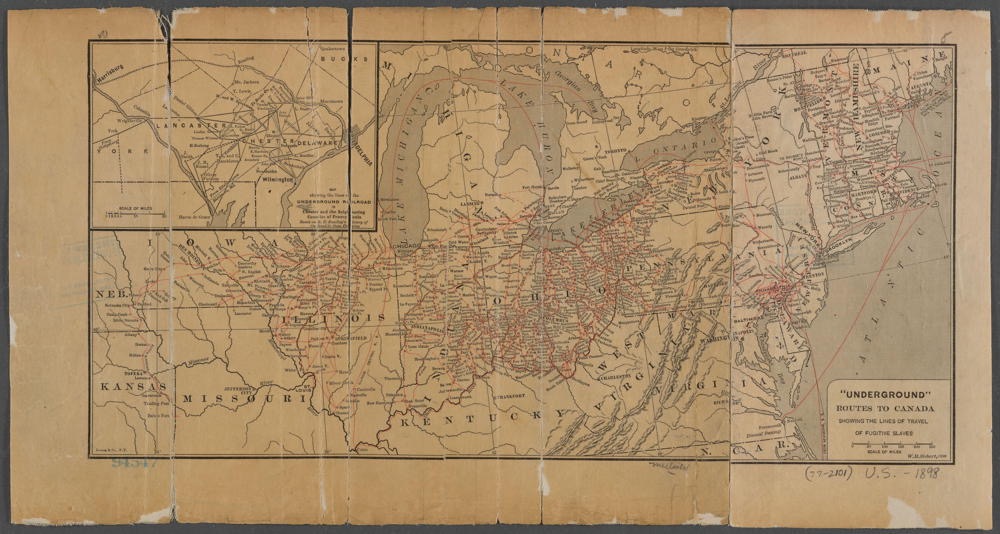
Wilbur Henry Siebert: "Underground" routes to Canada: showing the lines of travel of fugitive slaves (1898)
"Until then, I will be fueling renewed frustration."
"Trees" have become the traditional means for visually displaying a Fambly's history. They show the simple head-to-foot association of one generation to another as if each successive offspring stood on their parents' shoulders. These do not show geographical dispersion, but they aren't intended to. To display migratory paths, I must omit some information. Parent/child associations compete with physical locations to complicate any representation. Using layers, colors, and other graphic associations, I might produce a visualization too complicated for interpretation, so I must be extremely patient with myself.
One thread of my paternal grandmother's history involves the Bond into the Bounds line.
Transpositioning

Miniature of Edward the Martyr
in a royal genealogy of the 14th century.
" … the terribly fortunate ones, the benefactors of almost endless Transpositioning."
A Fambly history might best be recognized as a permanent record of that Fambly's Transpositioning, for given broad enough horizons, it will encompass pretty much every possible human condition. Royalty will counterbalance laity, saints stand alongside sinners, and heroes hang with cowards. Deciding what the Fambly story means might well prove daunting, even impossible, because it might and could mean anything, everything, and nothing definitive at all. That history might not intend to mean very much of anything, anyway, but to demonstrate how everything tends to reduce to nothing and nothing to somehow represent anything at all. When I can see through the personalities and dates and shift my focus toward perceiving what none of the stories explicitly states, I might approach a better and higher purpose for telling those stories.
As I concluded a few episodes ago, history represents the most substantial possible evidence that we were each born equal.
THE

Ethelred the Unready, circa 968-1016. Illuminated manuscript,
The Chronicle of Abindon, c.1220.
MS Cott. Claude B.VI folio 87, verso, The British Library.
Scanned from the book The National Portrait Gallery History of the Kings and Queens of England by David Williamson, ISBN 1855142287., Public Domain, https://commons.wikimedia.org/w/index.php?curid=6639643
"I can't quite wrap my arms around the title Emperor THE Chuck."
Among the many, many distractions those of us with royal distinctions in our family history must contend, the presence of singularities ranks as one of the highest. It's one thing to have an Uncle Bob and quite another to possess an Uncle THE Bob. I've found innumerable instances throughout the records of someone like my long-lost something great-grandfather Ethelred THE Unready. Who could ask for a sorrier moniker? Ethelred was, predictably, a son of King Edgar THE Peaceful and survived the assassination of his older half-brother, King Edward THE Martyr, to take the English throne at twelve, thereby the unready designation. The unready designation was a play on words. "His epithet comes from the Old English word unræd meaning "poorly advised"; it is a pun on his name, which means "well advised" [Wikipedia]
He lived a suitably noteworthy life, as any half-decent monarch might, though the Danes deposed him after a particularly egregious and unnecessary attempt to slaughter every Dane in England.
Weekly Writing Summary For The Week Ending 5/09/2024
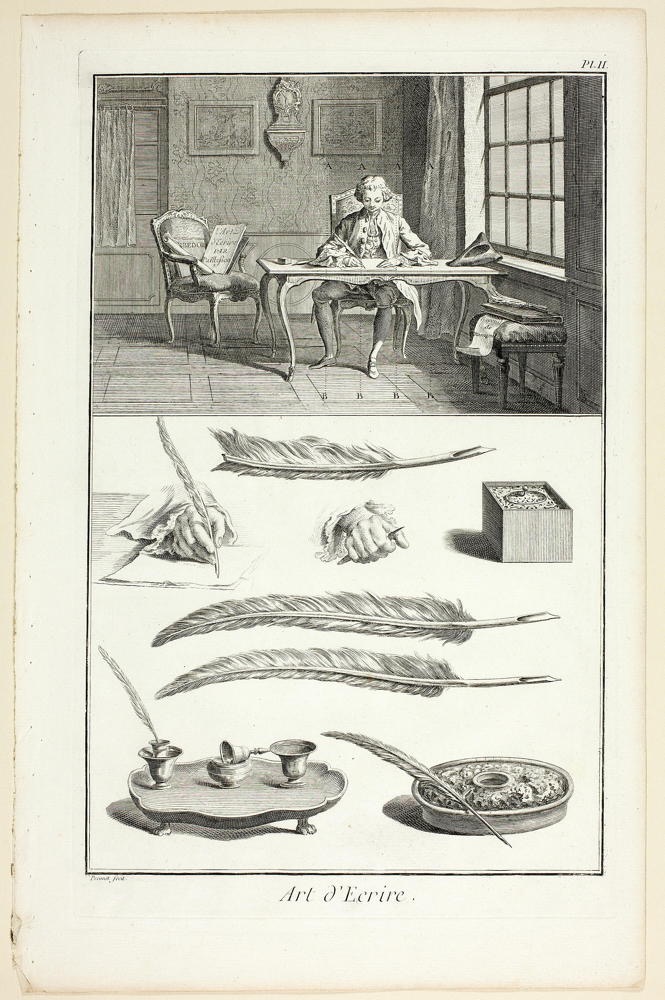
Benoît-Louis Prévost: Art of Writing, from Encyclopédie (1760)
Stand For Their Ambiguous Selves
I find it fascinating how failing to figure out what this life’s all about might prove to be what this life’s all about. Any notion that any of us might reach any authoritative conclusion seems lame in actual execution. Our questions might best exist unanswered, their purpose never actually being resolution but a representation of the inherent unanswerability of many of our questions. Go ahead and open up your Fambly history to public scrutiny. No amount of second-guessing will very likely resolve very much of anything. The significant questions might properly remain unanswerable. We rile. We stir the soup not to improve the flavor but to keep some of it from sticking and scorching on the bottom of the vessel. After all of this effort to tell these stories, I’m left believing that these stories probably always stood up for themselves. I’m no judge. I’m no master reinterpreter. I must have no idea what any of these stories ever meant. They have to stand up for themselves, indifferent to whatever you or I conclude. My purpose might have never been to conclude for my forebears. They might get to stand for their ultimately ambiguous selves. Just like us.
Fulk II of Anjou

Coat of arms of Hercule (François) of Valois, Duke of Anjou
By Carlodangio - Own work, CC BY-SA 4.0,
https://commons.wikimedia.org/w/index.php?curid=61574700
"I'm a dabbler …"
Though my heritage identifies me as a direct descendant of the kings of France, Spain, England, Italy, and what would one day become Germany, I do not feel very much like royal material. This condition might speak back to my high school years when my guidance counselor declared me not college material, a welcomed designation at the time, for it freed me up from concern about getting good grades or paying for college. I considered the declaration a Get Out Of Jail Free card in my early real-life Monopoly playing. Likewise, I can't see myself concerning myself with all the relationships necessary to maintain a halfway decent duchy, let alone a full-blown kingdom. It doesn't surprise me that royalty fought each other so continually and aggressively, for each seemed to be playing extended games of Suicide Chess, an unimaginably complex undertaking sure only to leave every player paranoid.
One of my lesser forebears, a full-blown Duke of Anjou, Fulk II, The Good, was known for his skill at negotiating strategic marriages.
Names

By Graoully - Self-photographed, CC BY-SA 3.0,
https://commons.wikimedia.org/w/index.php?curid=2770007
Vitrail représentant saint Arnould, chapelle Sainte-Glossinde
Stained glass representing Saint Arnould, Sainte-Glossinde chapel
(One of my 43rd Great-grandfathers)
"I could have been named after another forebear …"
I am blessed with a surname that sounds like a punchline from a Marx Brothers movie to most people. I believe that many immediately discount me due to my name's inherent joke quality. I admit to even discounting myself sometimes in the past. Why, oh why, couldn't I have been blessed with an innocuous name instead? Something even people with a lisp could comfortably pronounce? Something with more than one meager vowel?
Well, as sorry as my surname might seem, my super secret middle name seems exponentially more humiliating.
ClarissimaFemina

Detail from the Chronica sancti Pantaleonis:
Hedwig of Saxony - One of my 31st Great-Grandmothers
(12th century)
" … and sometimes even saints."
I have been delighted to discover that many of my Great-Grandmothers were famous or notorious enough to warrant getting their picture taken during their time. Before cameras, sketches were photos, and so were pottery, paintings, and sundry engravings. Almost every female in my Fambly tree between 500AD and the fifteenth century left some graven image ranging from pottery chard to Eleanor Crosses. None of these images were very likely true to their subject. I suspect that most were idealized and iconic, likely attempting to represent a most prominent attribute, be that an unusually large nose or blond hair, such that anyone who'd heard their legend might readily feel as though they recognize the image. Yes, most of these women also have some legend attached to them.
I think it is tragic that history continues primarily from a patrilineal perspective.
ANewCatechism

Master of the Codex Manesse:
Codex Manesse, fol. 292v,
"The Schoolmaster of Esslingen"
Der Schulmeister von Eßlingen)
(between 1305 and 1340)
" … reliably vanquishing dragons since before St. George."
How has the study and exposition of my Fambly's history changed me? It's probably too early in the transformation process to meaningfully begin to describe how I might have changed. I'll admit to feeling as though I'm changing without suggesting that I might know just how I will eventually be changed. I carry a strong sense of before and of since, of my understanding of my world having significantly shifted as a result of my recent discoveries. I plan to continue my studies to delve deeper into the histories that had previously escaped relevance. Suddenly, I'm curious about the late Middle Ages now that I have names, dates, and even some detailed personality sketches with which to personally relate. History's no longer just dates but personal causes and effects, real consequences, a present source of vanity, pride, and perhaps even more profound understanding. I seem to have acquired a greater stake in relating to the past.
I imagine future generations teaching their children this essential context, such that they might be able, as I have noticed myself suddenly able, to name my forebears in reverse sequence.
Bob

Grain Elevator, Condon, Oregon
" … the gods of geneology will decide."
It's probably always been the case that none of us really control our fate. With my family's history all spread out, I can see what eventually came about. I cannot imagine very many outcomes resulting from consciously deliberate choice. Sure, we each make decisions, mostly modest and a few monumental, but none seem to reasonably sum to produce any fate. Insignificant increments might conspire to finally sum up to something that might have been aspired to but couldn't really have been. Historians might ascribe to some specific decision whatever outcome ultimately resulted, but this world works more insidiously than that. Contrary to popular mythology, not one of us was ever really self-made. We were probably more crafted by ten thousand hands, most of which never imagined they were leaving a fingerprint or any sort of mark. We might manifest by less obvious means, and we likely create our explanatory stories to satisfy something other than reality. In reality, stuff happens, and however we come to pass rightfully remains mysterious.
That said, my father, Robert Clancy Schmaltz, an unwitting thirty-sixth great-grandson of Charlemagne, decided to move to Condon, Oregon, to help his dad.
Condon
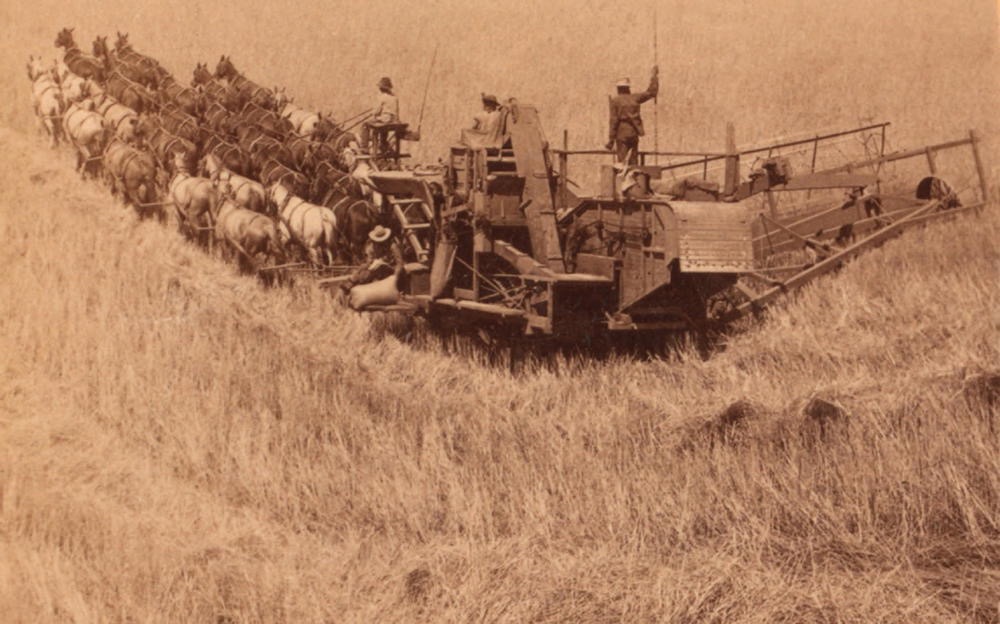
Evolution of sickle and flail, 33-horse team harvester,
cutting, threshing, and sacking wheat, Walla Walla, Washington. (1902)
Stephen A. Schwarzman Building / Photography Collection,
Miriam and Ira D. Wallach Division of Art, Prints and Photographs,
New York Public Library
"I visit her every Memorial Day."
The Gods decided, as The Gods always decide such things, in mysterious ways. After my mother's grandparents met as neighbors and then as step-siblings after each lost a parent and their surviving parent married their neighbor, they married and settled down on what appears to have been the neighboring ranches south of Condon, Oregon. They came of age in dryland wheat country, so they raised dry-land wheat, an incredibly labor-intensive effort. During harvest, scores of seasonal workers arrived to frantically work for a month or so before returning to from wherever they came or moving on to the next crop. Wheat harvest would melt into apple harvest, and the crews would disappear into the Yakima, Walla Walla, or Hood River Valleys to take advantage. In the days before the railroad came and before the co-ops built grain elevators, wheat was harvested into burlap bags, each holding three bushels and weighing about 180 pounds. The bags would fill on the harvester, and a worker would quickly whip-stitch them closed before slipping them off for later gathering.
My maternal grandfather, Elza (pronounced El-Zee) Franklin Wallace, worked this sort of wheat harvest, as did my grandmother, Ruby Kenaston, since she grew up on that ranch.
Weekly Writing Summary For The Week Ending 5/02/2024
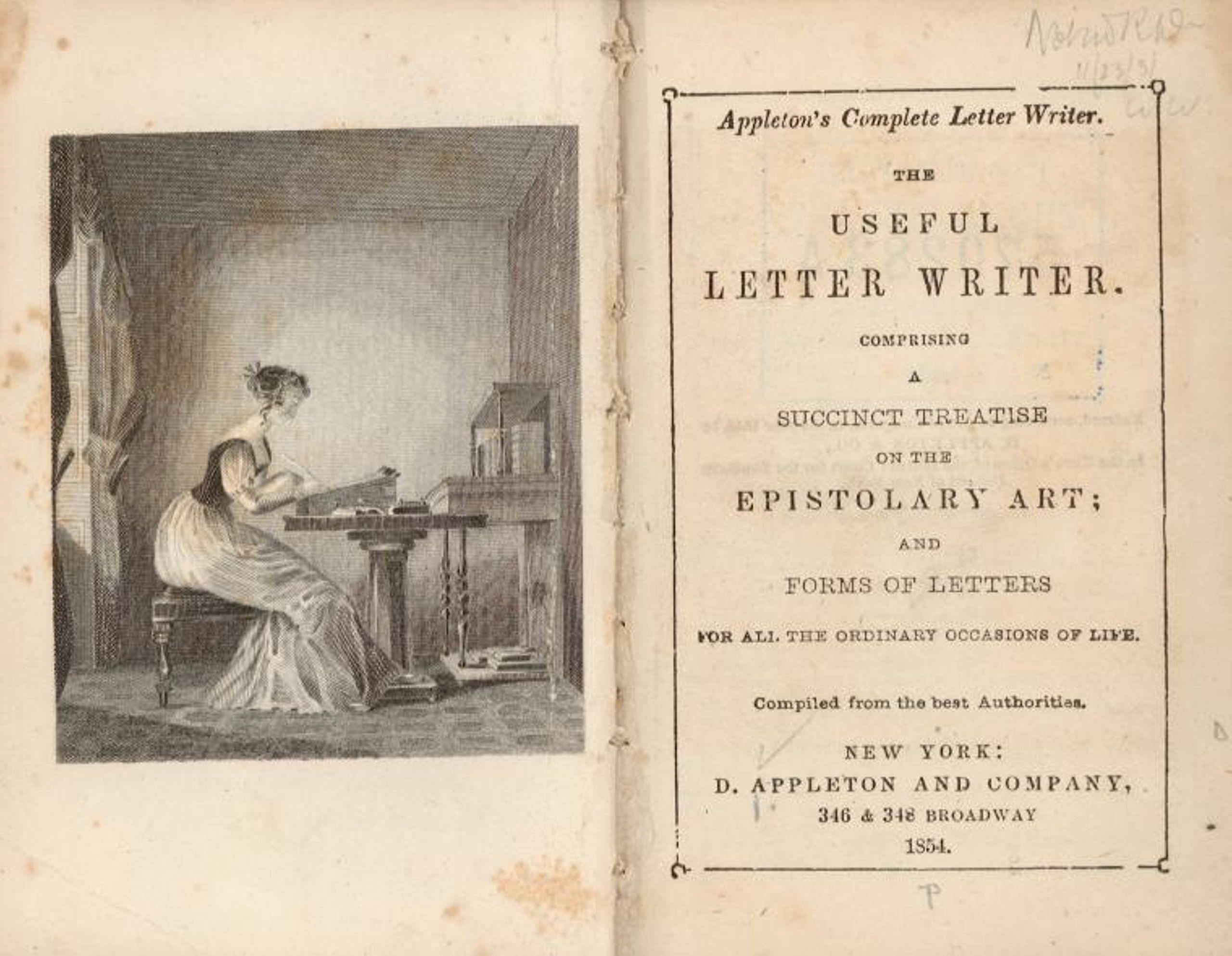
Appleton's complete letter writer..., [Frontispiece & title page] (1854)
With Nothing Remaining To Impart
I face a dilemma going further forward into these Fambly Stories. I’ve almost accomplished what I imagined I might have achieved when I started this effort, but I’ve only used half the time I’d allocated. Working a theme until the season ends has long been my practice. Into this twenty-eighth iteration, I’ve been faithful to this pattern. It has become a defining element of my work and has been unquestioned until now. I’m not quite finished, but I can see that it shouldn’t take too awfully many more stories to bring all the disparate threads together. My original vision will be satisfied once my parents meet and marry. Now, I’m wondering what I should include that I could not foresee before I found myself immersed in producing these stories. What might have been the deeper hidden purpose behind this whole exercise? How have these stories informed my perspective? What have I learned, and what have I lost? I guess I will continue writing this series until its popsicle stops giving flavor and turns into a clear icicle with nothing remaining to impart.
AGreatDepression

Ben Shahn: Untitled [Greenwich Village, New York City] (1935)
" … the reason I had a chance to be alive."
My father's brother Dan was born three and a half months after his parents were married in 1921. They were married far away enough from Mt. Angel to ensure that none of the locals would witness the scandal, his mom having recently been the local pharmacist's wife. They lived that first year or more in St. Helens, a town sufficiently distant that nobody who knew anything would likely bump into them. They returned with, as I mentioned earlier, a remarkably mature infant. My father, Robert Clancy Schmaltz, arrived shortly after that. The couple settled into a tiny house—"a cottage small near a waterfall"—in nearby Scotts Mills, a few miles out of Mt. Angel, but distant enough to avoid daily scandal. My grandfather Nick assumed responsibility for Schmaltz & Sons’ deliveries on that side of the county. The kids, Dan and Bob, settled into school and small-town life. Their parents divorced sometime after 1930. Their mom, Cassie, had been carrying on with Ed, a mechanic whose shop was just down the alley from their place. This separation injected fresh chaos into everyone's lives.
My dad and Dan began spending more time with their grandparents, even attending the Catholic school near their place.
MtAngel
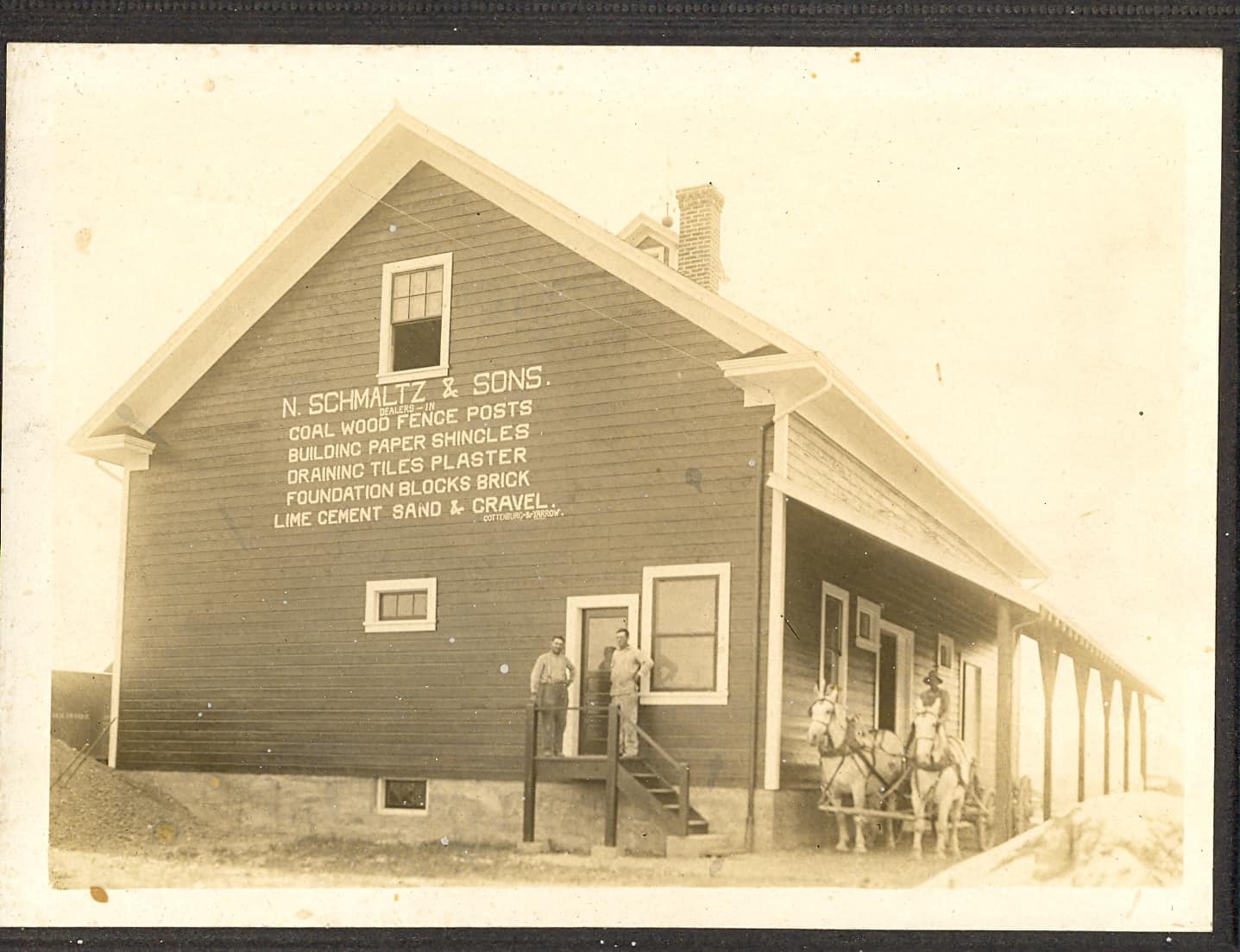
Schmaltz & Sons Warehouse, Mt Angel, Oregon (circa 1910-15)
Mt Angel Historical Society
"There's only a plaque there now …"
Nick and Elizabeth Schmaltz had relocated from Devil's Lake, North Dakota, to Mt. Angel, Oregon, by August of 1909 when their youngest daughter, Lucy, was born. Fifteen years after emigrating from Ukraine, Nick had arrived in his Eden at the End of the Oregon Trail, a small city tucked into the northern edge of Marion County, Oregon. We no longer have cities like Mt. Angel in pre-WWI Oregon. Today, we classify Mt. Angel as a small town with few services. Then, it featured every service any city required. One could hop on a train connecting you to Salem or Portland. It featured a hotel with a ballroom. A pharmacy. A hardware store and, most prominently, Nick Schmaltz & Sons farm supply.
Further, Nick built a fine two-story home, the finest in town, across the square from the church. He served as a board member overseeing construction while no doubt supplying building materials properly discounted for ecclesiastical purposes.
NewWorld

Lorenzo James Hatch: Locomotive (19th-20th century)
" … that success would ultimately cost him plenty."
As in every previous generation, arrival in a NewWorld involved stepping backward in time. The Schmaltzes and Welks had left behind their mature development in Ukraine, trading generations of successful adaptation for generations of even more of the same, starting from about where their displaced great-grandparents had begun when arriving on the undeveloped Steppe from Alsace a century before. Just before the turn of The American Century, North Dakota was closer to where it had been a century earlier than where it would end up a century later. The railroad had yet to cross half the state. Indeed, they arrived just as The Dakota Territory was admitted to the union as North and South Dakota. There were no paved roads in either state then. Settlers were still building sod houses, there being little available lumber or stone to create anything more substantial.
A government survey completed in the 1860s, when The Dakota Territory was first established, concluded that the area might productively host a dozen ranches, given the extreme weather and short growing season, and that most of those ranches might raise cattle rather than crops.
Selz

Kolonie Selz. Map by Alexander Ivanovich Mende (Mendt), 1853
"The city ceased to exist after it was evacuated during the Nazi retreat in 1944."
My fifth great-grandfather, Joseph (Josef) Schmaltz, was born on January 11, 1780, in Kapsweyer, Rhineland-Palatinate, Germany. He would die eighty years later in Kuchurhan, Odesa, Ukraine. My fourth great-grandfather, George Wilhelm Schmaltz, and his twin brother Heinrich "Henry," were born in 1804 in Germany. The family emigrated to Ukraine later that year, settling in a new town, Selz, in the Kutschurgan Valley, where the Kutschurgan River flows into the Djnester estuary, about forty miles from the district center, Odesa. This place was sandy river bottom land that melded into black prairie soil further from the river. They initially constructed rough brush huts, later building a substantial town complete with a large cathedral, a park, and extensive orchards.
Being German, much material has been passed down through the generations.
TheDeal

Giovanni Battista Nini: Catherine II (1771)
"Edens tend to come exclusively in their most primitive form."
By the end of The Seven Years' War, the surviving inhabitants of Germany were rightfully exhausted. Once again, squabbling between the crowned heads had devastated their lives. My Alsatian ancestors, still recovering from the Thirty Years' War and The Black Death's devastation, faced yet another displacement. Other German duchies had it worse. Catherine II, the former Prussian princess who'd married into the role of Empress of Russia before displacing her hapless husband once his heir was born, desired to bring Russia up to European economic standards so that she might continue financing her wars of acquisition. Russia remained a nation of serfs, still clinging to the Middle Ages, where a few wealthy landowners held the bulk of the labor captive. There was no entrepreneurial or independent farmer class; there were just serfs and sharecroppers who were successfully enjoined from demonstrating initiative on their own or even on the country's behalf. Catherine had recently won vast tracts of land from wars with Turkey and needed settlers to populate this largely uncultivated country. She proposed a deal she hoped might jump-start the languishing Russian economy to compete with Europe and the rest of the world while bringing that idle land into production.
In 1763, she issued a manifesto offering some rights and privileges to incoming foreign settlers.
Diaspora

Sarah Ann Wilson: Album Quilt (1854)
"My Fambly would attempt to bring their history forward with them and largely succeed …"
Alsace, situated along the Rhine between France and Germany, historically never considered itself a country. Like its neighbors to the east, it considered itself more of a duchy. It never had its own king. The Romans occupied the parts west of the Rhine but perhaps wisely left the other shore to the tribes and hoards, of which there were several in succession. It fell under the protection of the Carolingian dynasties, peaking with Charlemagne, whose sons bickered among themselves, dividing up the formerly united property. After that began the centuries under the Holy Roman Empire, where Alsace, being a border country, was traded back and forth among emerging countries. The Thirty Years' War brought Swedish troops, who tried to enforce Protestantism within its borders, and this seemed to work for Strasburg but failed in the countryside. Its residents looked to the Hohenstaufen emperors like Frederick I for protection and remained staunchly Roman Catholic.
As The Black Death ravaged the region in the mid-seventeenth century, age-old jealousies and hatreds eroded civil order.
Weekly Writing Summary For The Week Ending 4/25/2024
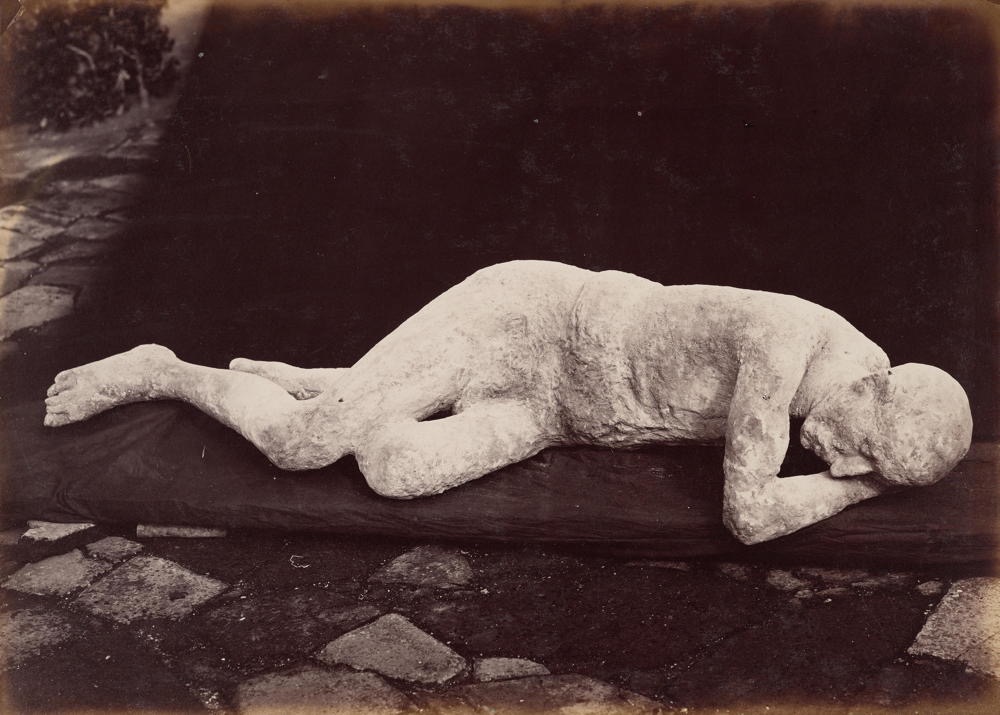
Giorgio Sommer: Plaster Cast of Body, Pompeii (1880)
Resonance Of The Many Contexts
I've learned much about myself and my world in the almost seven years since I began writing a new series each quarter. Fambly will be my twenty-eighth series, my twenty-eighth book-length work since I started Another Summer on the 2017 Solstice. As I've mentioned here innumerable times, my original intention was to chronicle some sense of my manner of living because I always seemed to encounter unanswerable manner of living questions when thinking about my ancestors. They didn't leave very much of a clue about how they lived. I sometimes fear that I've left far too much information, for my descriptions sometimes seem, even to me, scaled a little too close to one inch equals one inch, more detail than could ever prove useful. Still, I figure whoever's interested might just as well have too much as too little information. I didn't start this experiment to starve my future genealogists. Those few scraps of writing in my forebear’s own hand featuring their unique phrasing and misspellings are genuine golden treasures. As I have been reassembling the stories of my forebears, I treasure the contexts I discover more than any other part of their stories. Fambly's much more than accomplishments and dates, but the resonance of the many contexts through which we've passed.
ProgressReport
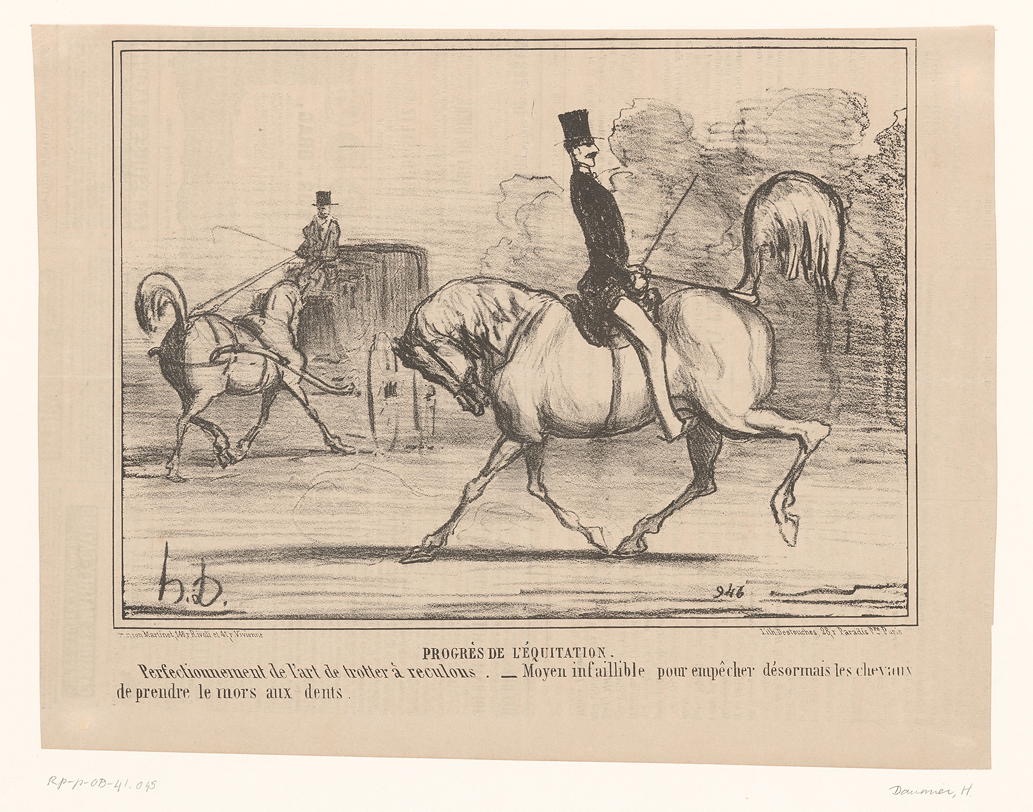
Honoré Daumier:
Karikatuur van een ruiter die achterstevoren rijdt
Caricature of a rider riding backwards (1856)
" … they were engaged in a diaspora away from their Eden …"
Everyone goes through a phase where they find their family an embarrassment. This often occurs during the teen years, when separation seems necessary to affect individuation. We gain the superpower capable of rendering siblings invisible lest we be associated with individuals so unlike us. One genuinely feels they were probably inadvertently switched at birth with some family that already had a color TV. Chores became beyond boring. I seemed to lose respect for myself. If Only became a near-constant refrain as I grieved over my sorry fate. I realized far too late just how fortunate I had been to have been born then, in precisely the right place at exactly the right time. I'd honestly never suspected. I never knew.
It might be true that we're all born into unfathomable ignorance.
APrefectOfGaul
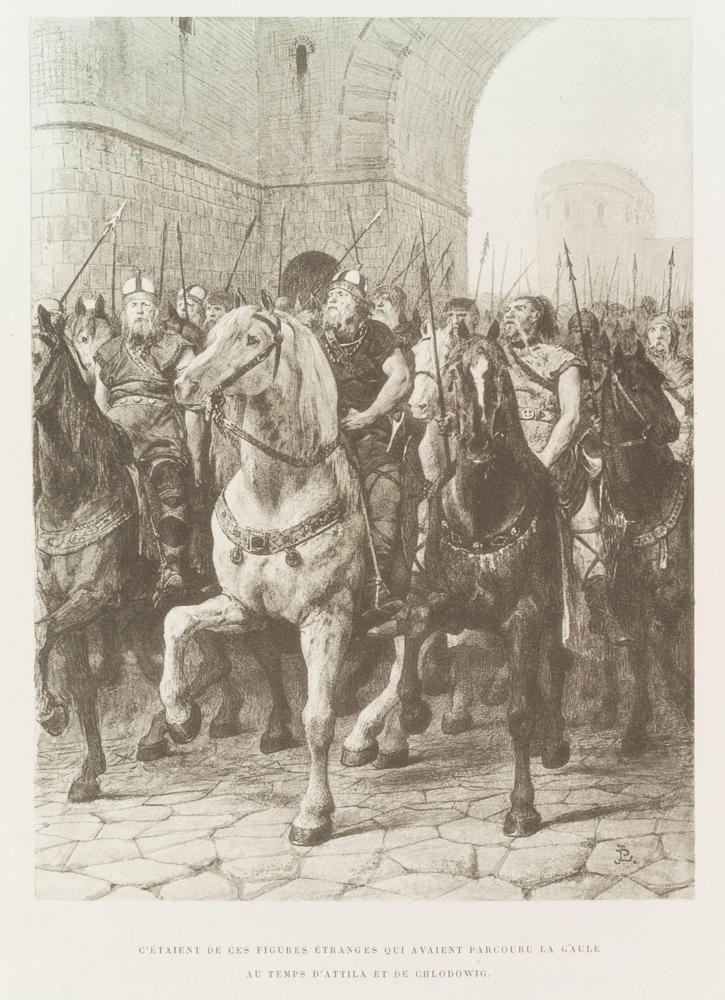
Jean-Paul Laurens:
C'étaient de ces figures étranges qui avaient parcouru la Gaule au temps d'Attila et de Chlodowig
They were one of these strange figures who had traveled Gaul in the time of Attila and Chlodowig (1887)
" … some vestigial memory created forty-seven or eight generations ago …"
My Fambly tree starts petering out around my 47th and 48th great-grandparents. That any record of them still exists amounts to either a significant miracle or a minor research error, though the record had withstood some scrutiny. Contrary to what I'd always heard, the end of the Roman Empire was not some cataclysmic fall. As with all enormous bureaucratic institutions, the end was prolonged and featured unexpected bedfellows. In my notion of that history, ravening hoards tore down walls and took no prisoners. In the real world, even the conquerors understood that vanquishing an army would win much less than half of any battle. The population would need to be governed, and not merely by military dictators, for commerce and trade would continue to be an essential part of any post-status quo arrangement.
My 47th Great-Grandfather seems to have been just such a character, a political operator capable of working across aisles and collaborating with once-sworn enemies to accomplish mutually beneficial ends.
The37thGreat-Grandson

Students of Raphael: Coronation of Charlemagne (1514-15)
"I had better consider myself worthy of all that bother."
His cat awakened the Thirty-Seventh Great-Grandson. He'd taken the day before off to nurse a painful muscle spasm and wasn't quite ready to face the day. The cat insisted. I can confidently report that this cat has our Great-Grandson wrapped around his paws. The Grandson cannot deny him anything, regardless of how shoddily that cat might choose to treat him. He might annoyingly yowl, but the Grandson never loses his ardor for that animal.
Unlike his Thirty-Seventh Great-Grandfather, our Great-Grandson was never instilled via coronation.
Swirling
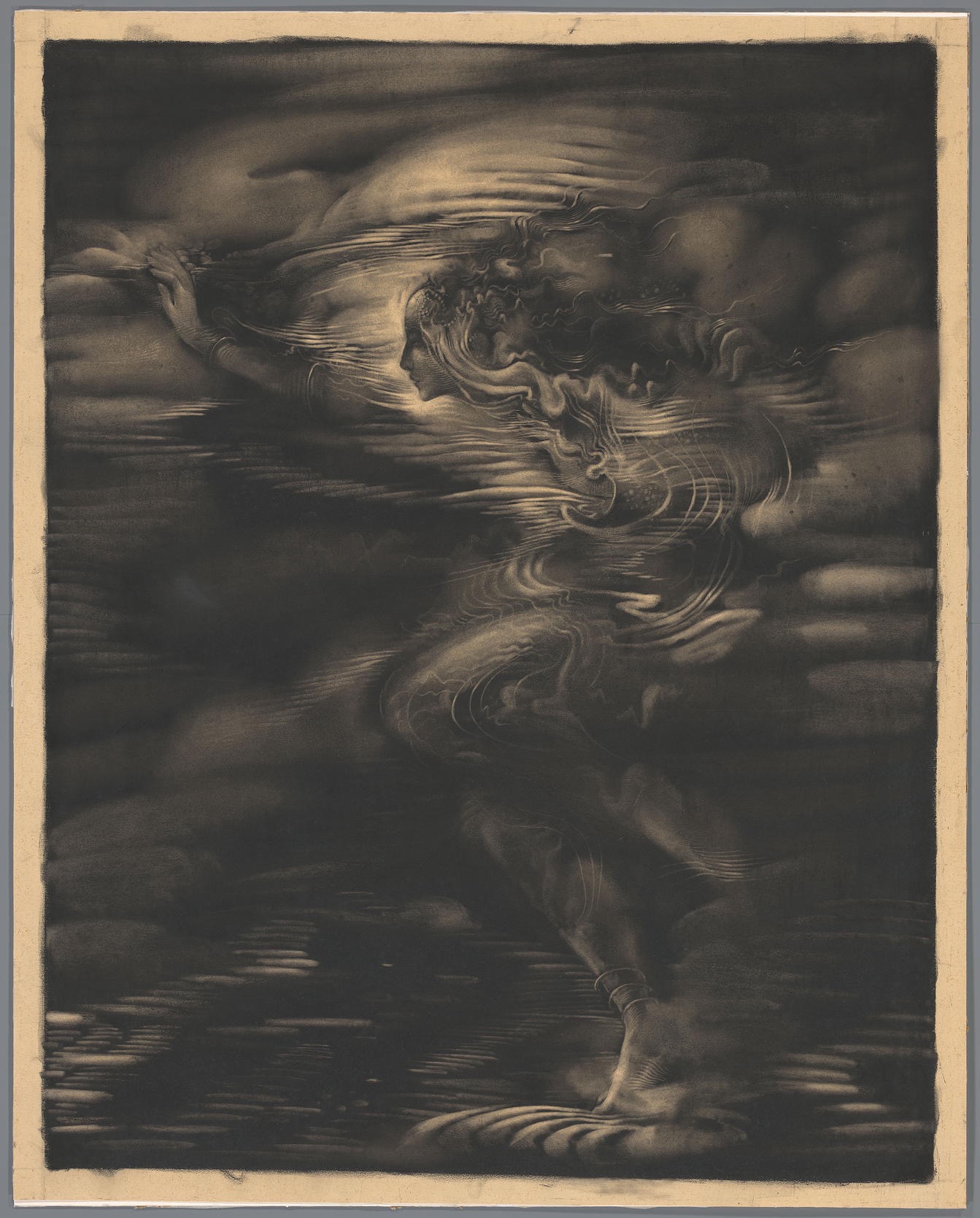
Frans Stamkart: Salome (1910 - 1915)
"This world won't allow what couldn't ever come about."
A point comes when I can no longer comprehend the context within which I find myself dabbling, for I can no more than dabble in the incomprehensible British peerage system. My forebears did not lose all their standing when they were forbidden the right of ascension. They entered the netherworld of dukes, earls, and sirs alien to the American all-men-created-equal creed. Infinitesimal differences seemed to yield enormous shifts. Even seven or eight generations after JohnOfGaunt's era, his X-times great-grandaughters remained in The Peerage, and marriage to them elevated their husband's standing. Through successive marriages, the bloodline migrated to Ireland, where generations of husbands and sons participated in the subjugation of Irish natives.
The British colonized everything they could.
JohnOfGaunt

Publisher: William Godwin:
Edward I. Edward II. Edward III. Richard II (1815)
"We're certainly directly related to almost everybody."
How does the progeny of a King and Queen of England manage to lose their rights of association? It was always easy to lose the right of ascension. That required no more than the good fortune not to be the first-born male. The rights of association proved tricker, though, for they depended upon custom and political positioning. Stay in good graces with the crown, and you and your offspring might hang around the household for centuries. Somehow fall out of favor, and you and yours will disappear, sometimes into formal exile and other times more permanently. There seems to have been little permanent sentimentality between members of the upper reaches of royal society. Anybody—and I do mean anybody—could be excommunicated on any premise on the whim of a king, queen, or even senior advisor. Not even offspring were necessarily excepted.
Rejected ones could try again by attempting to marry themself off to some handy neighboring monarch.
Eleanor-of-Castile

Print: Edward III, King of England and France (1817)
"I might just as well consider myself not even distantly related."
My twenty-first great-grandmother was twelve or thirteen when she married the love of her life, himself only fifteen at the time, and future king of England, on November 1, 1254. Eleanor of Castile qualified as genuine royalty with an ancestry dating back centuries, from before the beginning of the Dark Ages to around 500 AD, starting with a Prefect of Gaul and disappearing into doubtless royal parentage before. Since then, her forebears had fulfilled roles as varied as manager of an early Frankish Duke's household to kingships in what would later be Germany, France, Spain, and Portugal. If anything, my Fambly's history speaks to the absolute absurdity of generational wealth. Edward and Eleanor were perhaps the wealthiest monarchs in British history. A few offspring by mistresses and great-grandchildren don't receive any split of King great-Grandpa's pot. A few patricides engender hard feelings, especially within the immediate family.
Eleanor bore Edward III's first child at thirteen while still on her honeymoon.
Weekly Writing Summary For The Week Ending 4/18/2024

Jacques-Philippe Caresme:
Priest Making an Offering Accompanied by Nymphs and Satyrs
(18th century)
They Become More Real
I’m starting to believe that history might mostly be about patterns. Individual stories and actions might matter most when reduced to patterns. One instance might prove entertaining, but a half-dozen similar stories spread over centuries might better inform. I’ve been stumbling into possible crossovers, where one great-grandfather ended up in the same place and time as another and where every damned family that followed that trail ended up with almost the same story. These revelations shift my attention away from accomplishments toward responses. It might be that The Cumberland Valley, for instance, provided a context that tended to tease out the same behaviors from a variety of different people, that it might not have mattered what historical place your family hailed from or what religion they practiced, but that they fell under the subtle influence of a place they happened to share. I wasn’t there, but their stories sound more than accidentally similar. They almost seem like they were pulled from a book of valid plot lines or merely works of fiction. They become more real once they start showing their similarities.
SideTrips
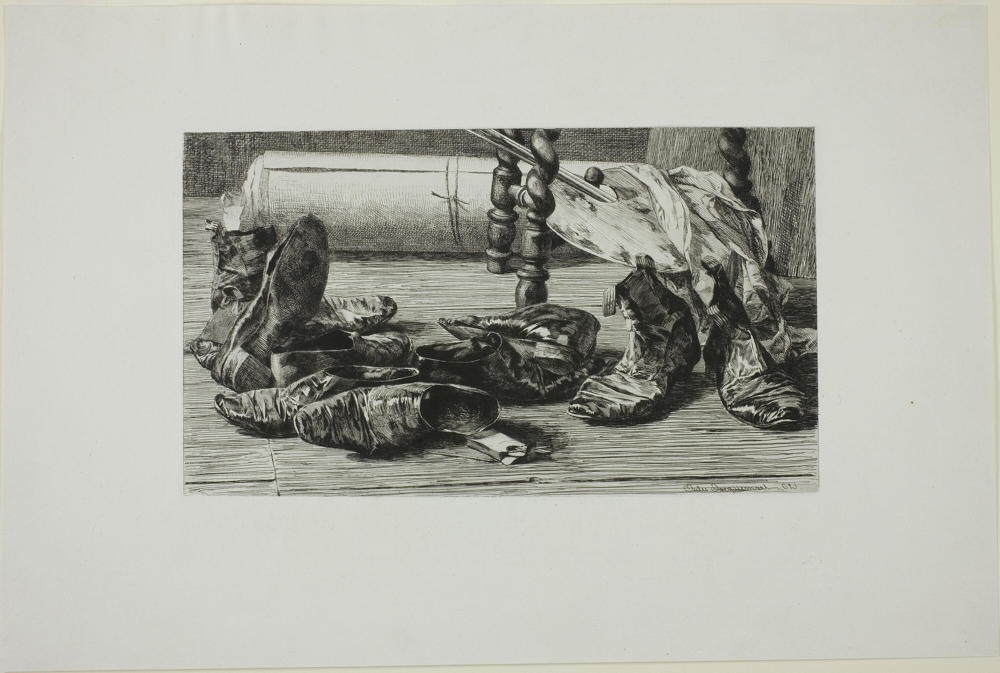
Jules F. Jacquemart: Mementos of a Trip (1862)
" … they insist we were all created equal."
Every forebear contributed their share of what eventually became me. My mother and father provided equal amounts of each of themselves as their parents did before them. Likewise, their grandparents did their part, too, and their parents before them. Over succeeding generations, a single generation's contribution gets diluted, but the formula holds. My twentieth great-grandmother contributed just as much as my twentieth great-grandfather. Yet, I tend to follow the family name backward rather than engage in many SideTrips to see what my umpteenth great-grandmother's family might have provided. Not every SideTrip goes anywhere, for only the elites ever inherit much of a family tree. It takes notoriety to guarantee that anybody remembers anybody, that, or a string of very conscientious and fortunate grandmothers. This kind maintain records in bibles and never loses their homes to fires. It's a wonder many records survive at all.
I felt curious about my second great-grandmother, Elizabeth Lovelady, who died in childbirth along the Applegate extension of the Oregon Trail on November 13, 1845, leaving my great-grandfather John Bird Bounds an orphan at twelve.
BoundUp
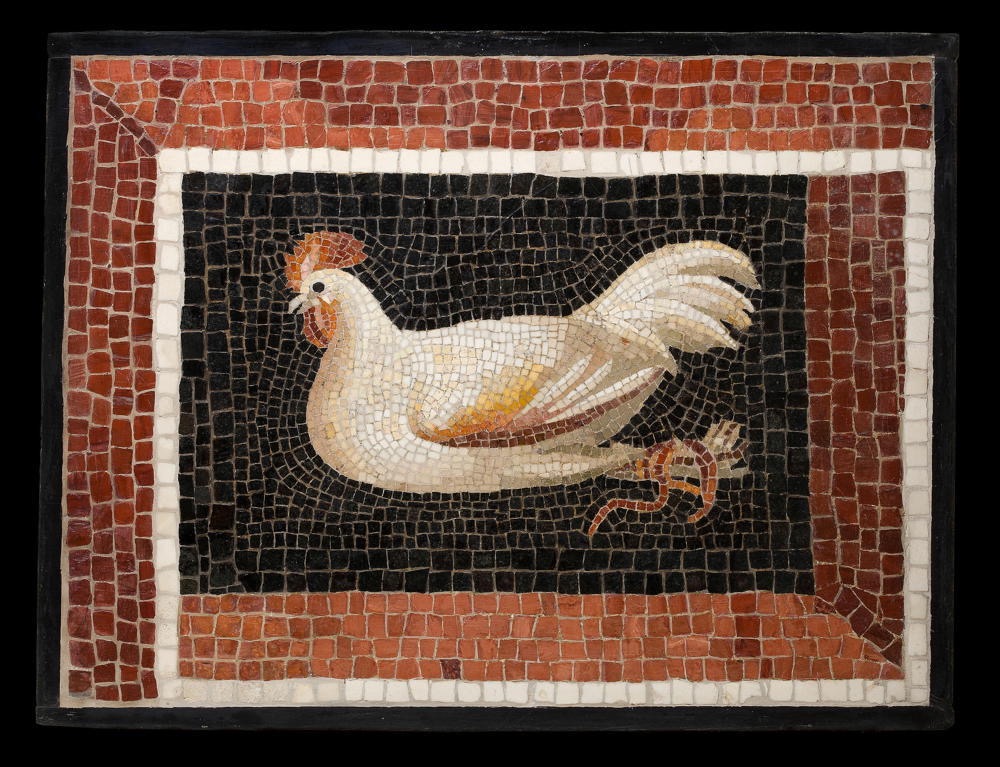
Roman; Rome, Italy: Mosaic Floor Panel Depicting a Bound Rooster
(2nd century)
" … so I almost fervently imagine."
I cannot definitively declare anything about my paternal grandmother's family. Everything I ascertain seems based upon questionable scholarship, the result of seekers perhaps desperate to confirm their most craven convictions. Everyone secretly believes their family comes from royalty. Everyone imagines they're due some long-lost inheritance. Everyone imagines they come from noble characters, dukes, and dutchesses if not grand viziers. It sometimes even seems clear how to get there from here. Just log into Ancestor.com and follow the threads if you can. Nobody adequately imagines how much speculation went into those records and how little source documentation was ever discovered. Those who retain old family bibles might have the best documentation possible. Still, in the case of those immaculate births where the offspring seemed remarkably mature for a newborn, even the Good Book might contain fiction, if for all the very best reasons.
So, I try to take my discoveries with hefty spoonfuls of sand.
Leaps&Bounds
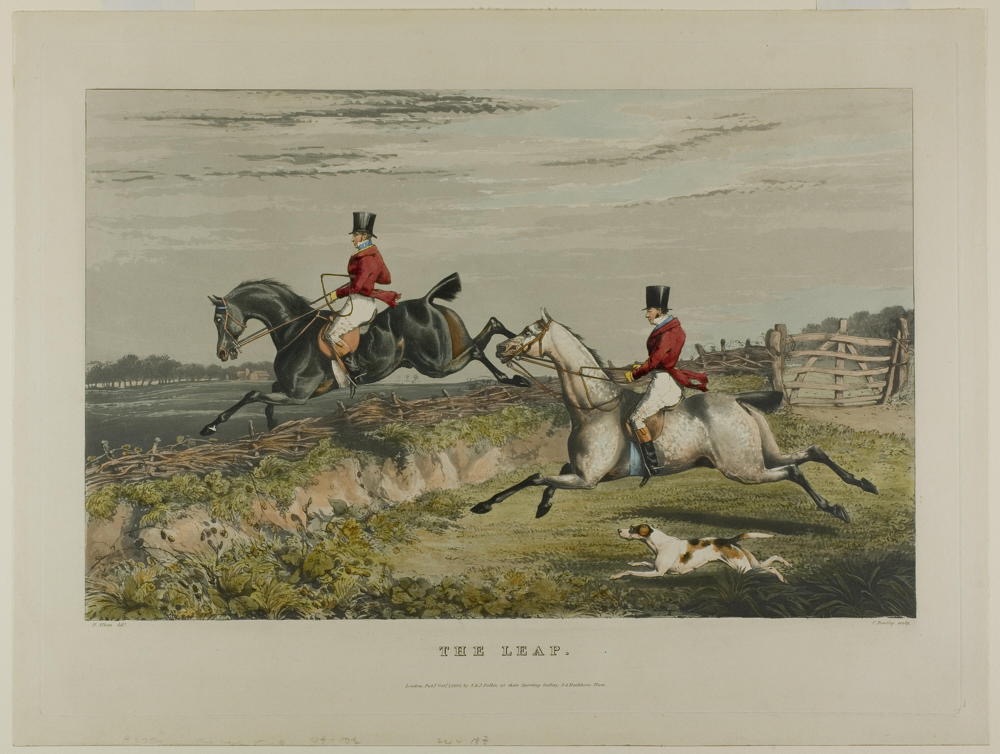
Charles Bentley: The Leap, from Fox Hunting (1828)
"She ultimately came to carry even her trauma well."
Caroline (Carrie) Pat Bounds, my paternal grandmother, was nobody's notion of aristocracy in action, though her ancestry strongly suggests aristocratic blood. Belief in the supremacy of aristocratic ancestry seems to be similar to believing in white supremacy or any inheritance-based privilege. These were stories concocted to encourage acceptance of other than democratically-elected rulers. Science suggests that genius does not run in families, though enough examples convince most that it certainly must. I swell with pride when I imagine my German genes giving me an advantage. As the history of paternal hierarchies demonstrates, good governance was never inheritable; neither was good sense. Each generation brings certain privileges and deficiencies into play. Very little's ever decided on day one.
The environment one's raised in might better determine later successes and failures, but ample stories suggest that almost anyone can overcome nearly anything in this life.
GilliamCounty

Dorothea Lange: On transportation outskirts of a small Oregon town
on the Columbia River. Arlington, Gilliam County, Oregon (1939)
"Those churches held the records."
My second great-grandparents were mostly late arrivers in Oregon. Those who weren't late arrivers found their farm after lengthy delays. Somewhere around 1885, Alonzo Kenaston and Maria (Seward) Kenaston finally returned to Oregon after their thoroughly discouraging honeymoon trip in 1865, this time by train. They'd homesteaded in the Nebraska Sandhills after dropping four children in Illinois and Missouri, including my great-grandfather Luther, in 1875. Four more in Nebraska, only two of whom lived, left them with five kids ranging from twenty-one to two by July of 1886 when Alonzo finally died of His Troubles, the effects of the Rheumatic Fever he'd contracted while marching barefoot in the snow during the Civil War. They'd finally realized their dream, acquiring acreage on Buckhorn Road just West of Mayville, Gilliam County, Oregon.
Another set of second great-grandparents had recently acquired the land next to the Kenaston spread.
TrackingProgress
![]()
Julius Gari Melchers: Mother and Child (c. 1906)
"This world moves exclusively in mighty mysterious ways."
I can track my forebears’ migrations by noticing where they dropped their babies. Those prior generations seem to have been constantly on the move, though vagaries of time might better explain their apparent restlessness. I can relive a decade in a minute, but they lived it a minute at a time. The births maintained a background rhythm that seems extraordinarily regular today. Another child would appear every eighteen to twenty-four months, most with a birth location attached. By tracking where and when those babies arrived, I easily visualize a map of their progress. They generally kept moving West, with settled periods of varying lengths. My fourth great-grandfather, James Emsley Mayfield, returned to Central Tennessee from his birthplace in Albemarle, North Carolina, and raised his family there in apparent proximity to his extended family. Born just after The Creek killed his father in 1780, he lived until he was 75 and died in 1855 in Montgomery County, Illinois, near the end of what was known as The Great Highway, the primary route between the headwaters of The Potomac in Maryland and The Mississippi.
Interestingly, that country was where James Emsely Mayfield's father had served with William Rodgers Clark in The Revolutionary War.
AndrewJackson
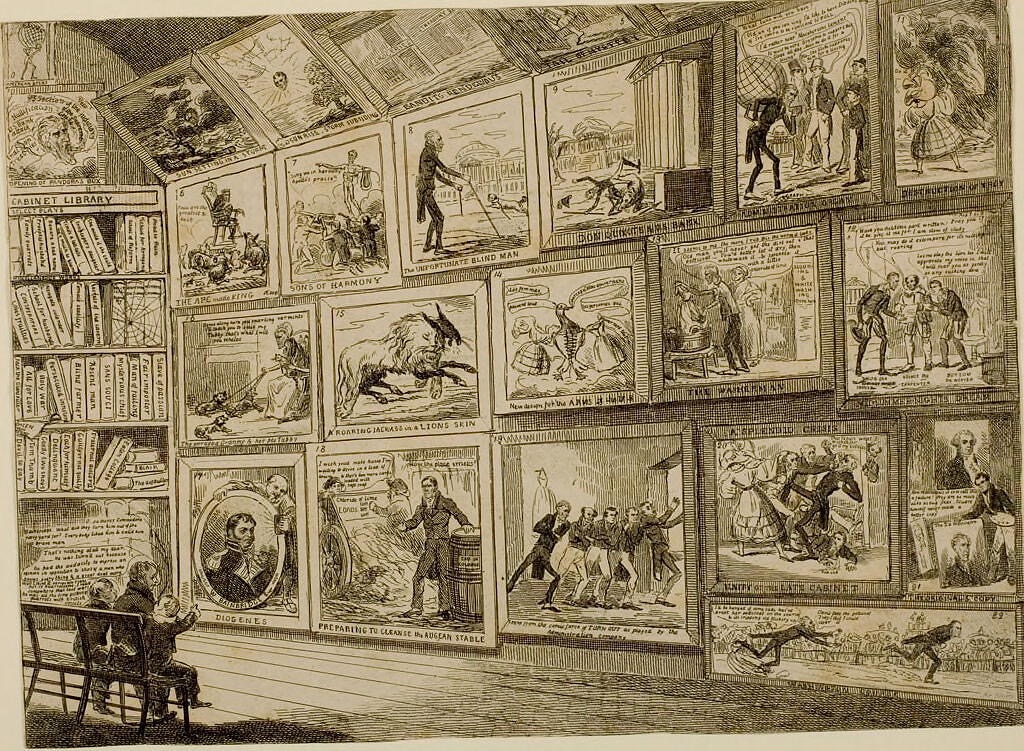
David Claypoole Johnston:
Exhibition of Cabinet Pictures: Satire on Andrew Jackson (19th century)
" … this swirl of stories constitutes adequate justification …"
I've long wondered why two of my great-grandfathers were named Andrew Jackson Mayfield. What must have moved the senior AJ's father, James Emsley Mayfield, to name his firstborn after that future President? What experience could have been so significant to move that son to name one of his sons similarly? The answer might lie in where AJ senior's grandfather, James M. Mayfield, my fifth Great-grandfather, settled after he slipped over the Cumberland Gap and into Indian Reserve territory sometime before 1780.
Mary Carter's book Fifteen Southern Families states, "The Mayfield family all seemed to have been of the caliber of Daniel Boone, David Crockett, and other frontiersmen.
Weekly Writing Summary For The Week Ending 4/11/2024

Nicholas Richard Brewer: At the Spring (c. 1895)
How Utterly Renewing!
It must be that expanding one dimension also expands others. Shoving deeper into the past might naturally nudge further into some future, too, like one of those graphic images with 'preserve dimensions' enabled. When I push my Fambly history further into the past, my future seems to extend itself in sympathetic balance. The result broadens, deepens, and heightens to keep all dimensions in synch. The result seems like a net expansion but with much less effort than expected. I shove one single edge, and the rest harmoniously maintain their relationship relative to me. Who knew that delving into history might invoke principles of physics? My world seems in ever greater balance as a direct result of my effort to dot a long naked 'i' and advance what I figured needed to be advanced. There will be no finish. Finishing could not possibly be the purpose of this series. I have been discovering myself in the stories I've been uncovering. Blow off the moss and rust, and they might be as fresh as they ever were. My history, like yours, presents as extended metaphors. I dare not interpret the least of them literally, yet I dare not interpret them in some way. How utterly renewing!
RatHoling
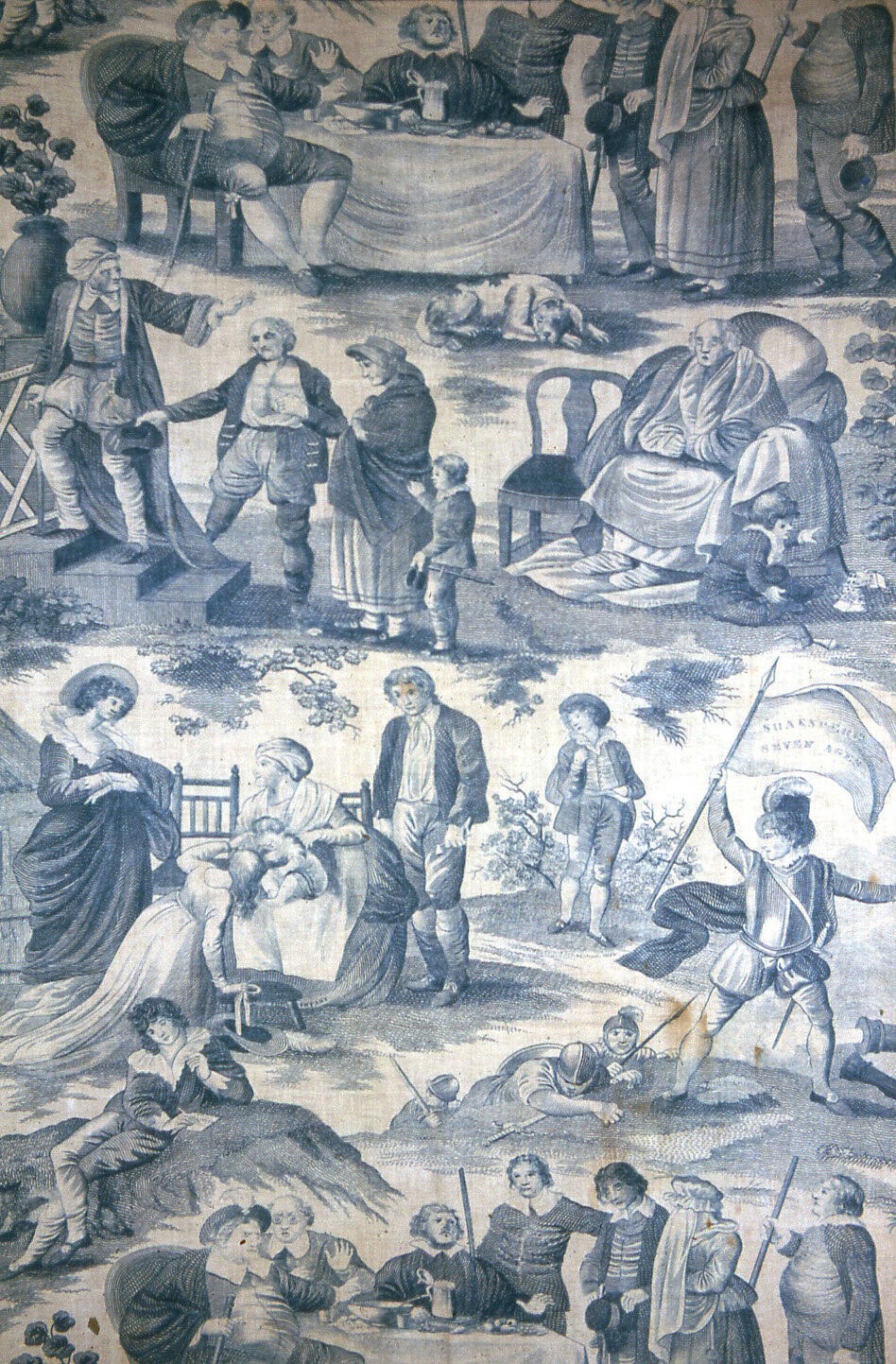
Engraved by John Slack:
Shakespeare’s Seven Ages (c. 1805)
"You may now safely refer to me as "Sir."
I'd always felt bothered that I had so little information about the Mayfield family's background. My Great-Grandmother was a Mayfield before she became a Kenaston, and I had a wealth of stories about the Kenaston clan. The Mayfield story petered out in the South just before the Civil War. I suspected they were separationists and Confederates, though, because two generations of the line, my 3rd and 4th Greats, were named Andrew Jackson Mayfield. My stories about them went no further. I suspected them of Southern sympathies during The War because they'd lived in Tennesee, and the elder Andrew married a woman from Georgia. I understand why my forebears revered Andrew Jackson. They loved him because he refused to shine a British Officer's boots during The War of 1812, then routed them out of New Orleans. They probably liked him better because he helped open land for settlement in Florida and Georgia, west to the Mississippi, killing or exiling the natives. His Trail of Tears was cause for enthusiastic cheers for those would-be pioneers waiting for openings from East of the Alleghenies.
So, I started following the stories and checking a variety of sources.
NewAmsterdam

Jacob van Meurs: View of Nieuw Amsterdam.
Novum Amsterodamum (1662)
" … there were many mysteries involved in their history."
The Northern Netherlands began building their foreign trade early in the seventeenth century. They were late to the party. England, Spain, and even Portugal were well ahead of the Dutch in creating colonies. The Dutch weren't even a complete country yet, for they had split themselves in trying to separate from Spanish domination, the Southern portion of the country still Hapsburg Catholic clinging to Spain and the Northern part just exploring an identity as an independent nation. They were still trying to invent an identity when their Dutch West India Company began exploring territory in the New World: New Netherland. A contract English captain, Henry Hudson, investigating the possible existence of a shortcut to the Far East, "discovered" The Hudson River, resulting in a Dutch fur trading settlement in what would become Albany, New York. Manhattan, adjacent New Jersey, and Long Island were likewise claimed as New Amsterdam.
By 1636, The Dutch West India Company was importing contract laborers to colonize this territory, including my tenth great-grandfather Cornelis Aertsen Van Schaick.
Evan&Sara

Warren Mack: Waves of Wheat (20th century)
"It should be no wonder."
According to a history written by their daughter Ada, my 2X great-grandfather Evan Arthur Wallace, born in Marysville, Iowa, in February 1847, married my 2X great-grandmother, Sara Adeline Jackson, born in March 1851, on August 16, 1868, at Lovilia, Iowa. They moved onto a farm situated between Lovilia and Albia, Iowa, where they brought three sons into the world: Theodore Penn (1869), my great-grandfather Nathaniel Parker (1871), and William Elmer (1874). When Elmer was three weeks old, they left Iowa with all their belongings that they could carry in a buckboard and set out for Fort Dodge, Iowa, intent upon joining an emigrant train bound for Salt Lake City. They expected to buy a covered wagon, supplies, and tools, then travel overland to Dayton, Washington. Reports of "Indian trouble" along the route convinced them to take an overland stage instead. "There were no roads, just wagon tracks, and driver knowledge. Women and children rode inside the stage while men rode on top with rifles at the ready." They were frightened by Indians twice, and at The Great Oregon Divide, women and children left the stage to walk rather than ride over that narrow passage.
The stage took them to Walla Walla.
CreatingHistory

Sebald Beham:
The Departure of the Prodigal Son,
plate one from The History of the Prodigal Son
(Early Sixteenth Century)
"We are actively, if extremely subtly, becoming the very stuff of our transcriptions …"
It seems unlikely to me that I am at this moment CreatingHistory. I began creating this Fambly history under the mistaken impression that I would just be transcribing previously assembled information when it seems more likely that I have been CreatingHistory instead. I realize that this unfolding story had never been told before now. Oh, bits and pieces of it have certainly previously crossed lips, but never these particular configurations. The stories sure seem familiar, but they include fresh particulars. It seemed that every time I told a story, it became different. I can't quite claim to have been the source material, but I must admit I significantly changed it in assembling it, I included some speculation but tried to clearly identify when I was guessing. I wasn't really creating my history, but my Fambly's. Still, I must admit to having been the author.
Where does history originate?
TheWallaceProblem
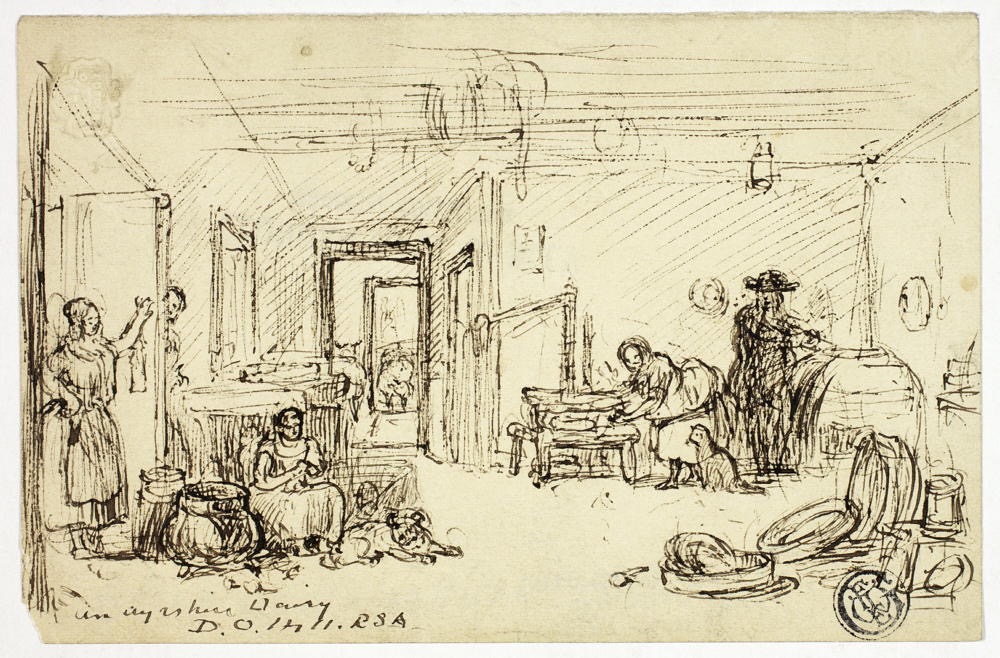
David Octavius Hill: In Ayrshire Dairy (1822-1870)
"Geneology seems indistinguishable from vanity … "
My mother's maiden name was Wallace. Wallace ain't quite Smith, but it seems an uncommonly common name. People wondered if she was related to THE Wallace, the one depicted in Braveheart. There's plenty of genealogical information on the Wallace Clan, and I can employ the term 'clan' because it's an authentically Scottish surname, as Scottish as Burns or Bruce. The wealth of information brings both ease and complication. The fame has attracted hoards of researchers before me, and they've left the rough equivalent of a muddy trench where a path might otherwise lie. Almost every query quite naturally slipped into that trench. Before I knew it, I was twenty-eight uninterrupted generations back to the true Patriarch of every Wallace since: Elmerus Galeius of Wales around 1100. That such a quintessentially Scot hailed from Wales carries no wee dram of irony. I suspect such contradictions underlie some of what the world recognizes as the Scottish attitude.
I feel suspicious of my own research.
Patriarch

James Barry: Eastern Patriarch (1803)
"sate in stocks for railing."
Patriarchy can prove to be slippery to determine. In some ways, each generation produces a patriarch, though some generations produce especially noteworthy ones. Those who serve as the center point of a grand convergence or the point of exceptional dispersal most often earn the label. In practice, assigning this title must surely prove arbitrary, with little besides opportunity or convenience deciding. In the Kenaston clan, I choose to name John Keniston, my 8th great-grandfather, born in 1615 in Manchester, England. (Spellings were fluid then; Keniston remained with an 'i' until around 1700 when the 'a' replaced it.) He arrived in Dover, Massachusetts Bay Colony, in 1623 at the age of eight. His parents, Henry and Elizabeth Leeze, and his sister, Mary, and brother, James, died of "The Sickness" shortly after their ship, Margaret and John, arrived.
At age thirty, in 1645, he married Agnes, daughter of The Reverend John Moody, and settled into the fishing village of Strawberry Banke, now known as Portsmouth, New Hampshire.
Weekly Writing Summary For The Week Ending 4/04/2024
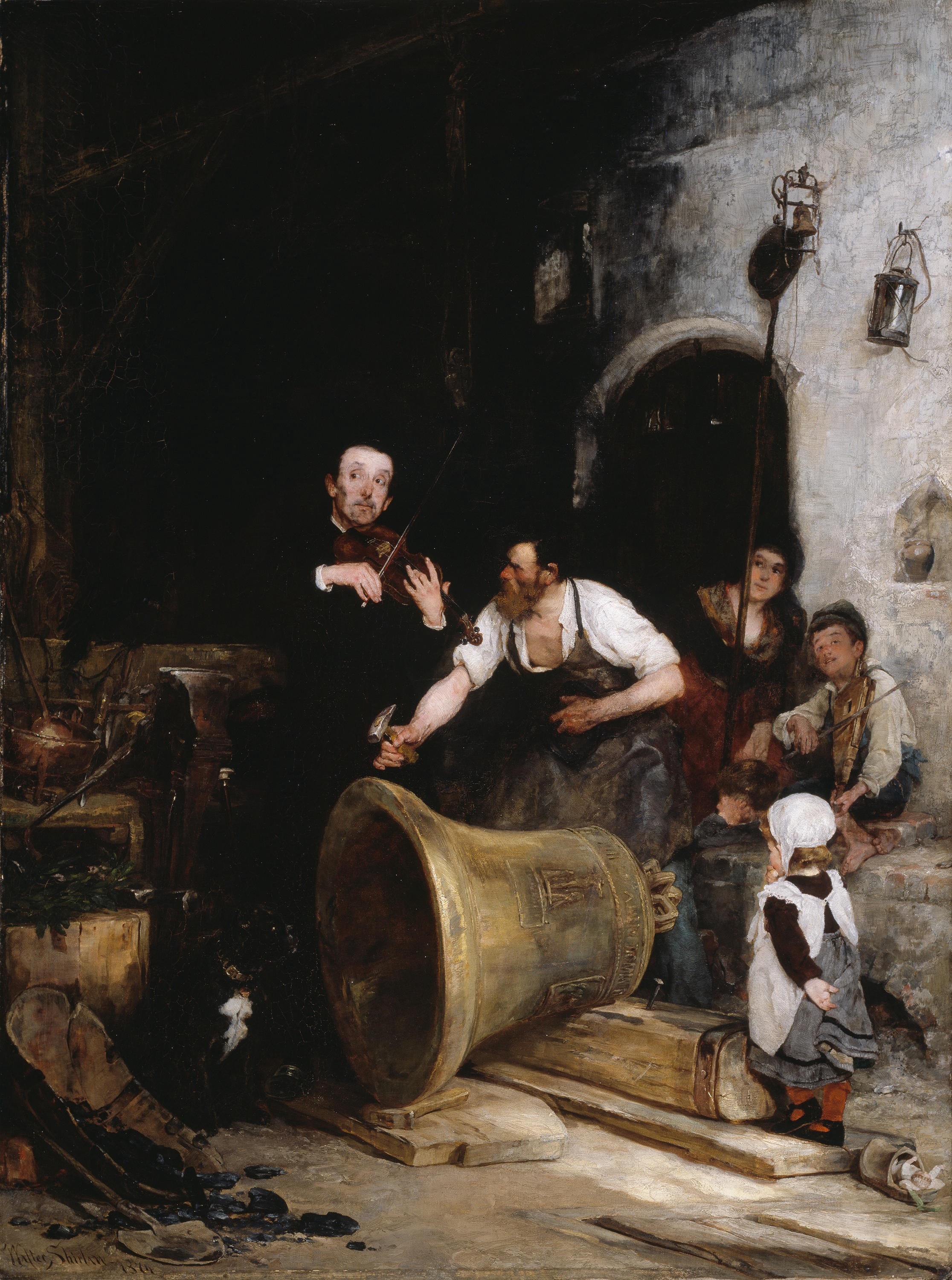
Walter Shirlaw: Toning the Bell (1874)
I Couldn't Possibly Be Any Different
The seasons shifted and I find myself already past Easter, past Passover, and screaming toward summer. The distress the receding winter visited upon me was unremarkable in retrospect, though it seemed anything but unremarkable as it was passing. Retrospection rarely carries any existential dread. It sugarcoats experiences and unavoidably misrepresents. As I create these Fambly histories, I remain almost painfully aware of all I cannot capture in them. I might curse the incompleteness I encounter in the surviving records while acknowledging that I am choosing not to mention some details. I attempt to capture essences without knowing what might comprise them. Merriweather Lewis believed dread to be an unforgivable sin. He insisted that he should move forward without much concern about the immediate future. That will sort itself out without anticipation. I might productively progress into indifference, too, interested in how my story unfolds and confident that I'm capable of coping with whatever unfolds. The historian seeks to know what happened next but dares not dwell too much on precisely where he's propelling himself. Not one of my forebears ever once knew how their stories would turn out. I might accept that I couldn't possibly be any different.
Kenaston
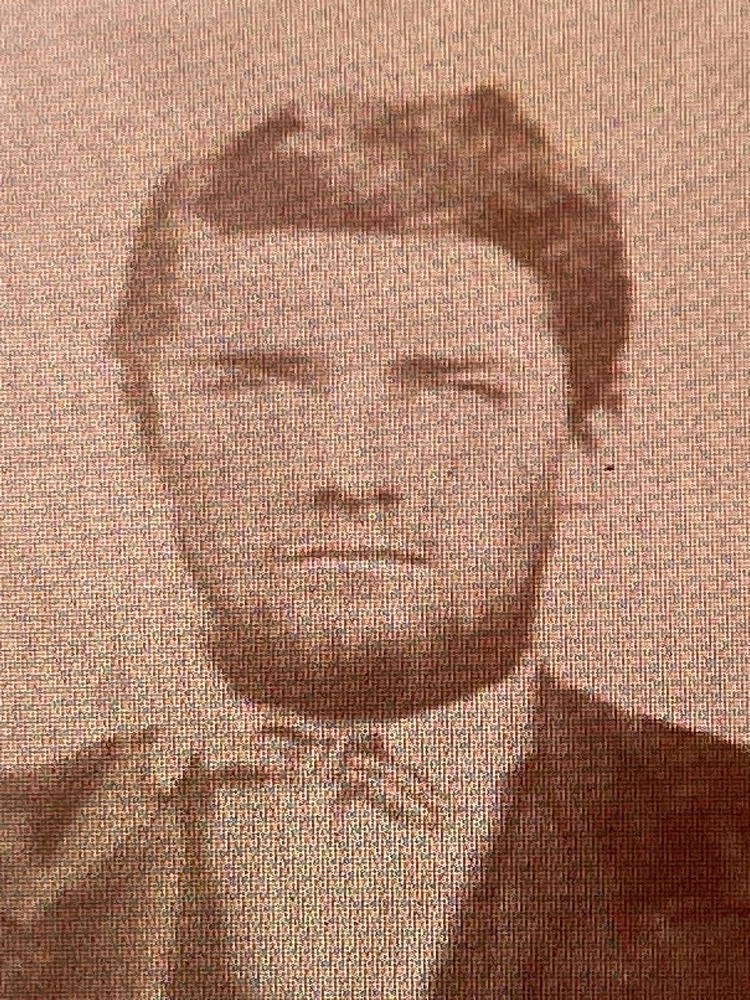
Alonzo Trembel Kenaston
1843 – 1886
My 2X great grandfather
"History seems to happen exclusively by accident on purpose."
All of his adult life, my two times great-grandfather, Alonzo Trembel Kenaston, suffered from a condition he referred to as his Troubles, which began with his service as a nineteen-year-old in the Army of the Cumberland's Kentucky Campaign in the Autumn of 1862. He was a fresh recruit from Illinois with only three weeks of training before he marched into Kentucky to chase Bragg's Confederate force out of the state. The campaign achieved its objective, but at ruinous cost; the Union lost battles but managed to scare off its opponents with sheer numbers. The march proved ruinous enough, that country having suffered through the summer drought, leaving little water for fifty-five thousand Union and seventeen thousand Confederate troops. The campaign became a pursuit for the Union, hampered by rough and hilly terrain culminating in an unseasonal wet snowfall, which left the barefoot troops at great disadvantage.
Seward

John Bunyan:
The pilgrim's progress, frontispiece (1684)
"Time exclusively moves in both tiny and enormous increments."
William Seward and his wife Grace (Norton), my eighth great-grandparents, arrived from England in what would become Guilford, Connecticut, in the late summer of 1639. They were genuine pilgrims and pioneers. They slowly built a town that eventually spread beyond the land they'd initially purchased from the female chief of the local natives. Tensions built over time. They and their son John survived King Philip's War, a two-year tangle between colonists and local natives that left a thousand colonists dead and more than two thousand natives killed or enslaved. In 1682, the second generation of native North American-born Sewards arrived, John, Jr. He would start a migration further North. My fifth great-grandfather, Aaron, John Jr's tenth child, would marry Elizabeth Clark in Granville, MA, in 1757, then serve in the Revolutionary War, father nine children, and end up in Kortright, New York. I suspect he received a land grant for his service in the war. The matriarch Grace's headstone remains legible, built into a fine wall constructed in Guilford when the original burying yard and town square were repurposed. They had prospered.
I used to believe that my Sewards were somehow related to President Lincoln's Secretary of State because that Seward also hailed from upstate New York, but I was mistaken.
Spokes
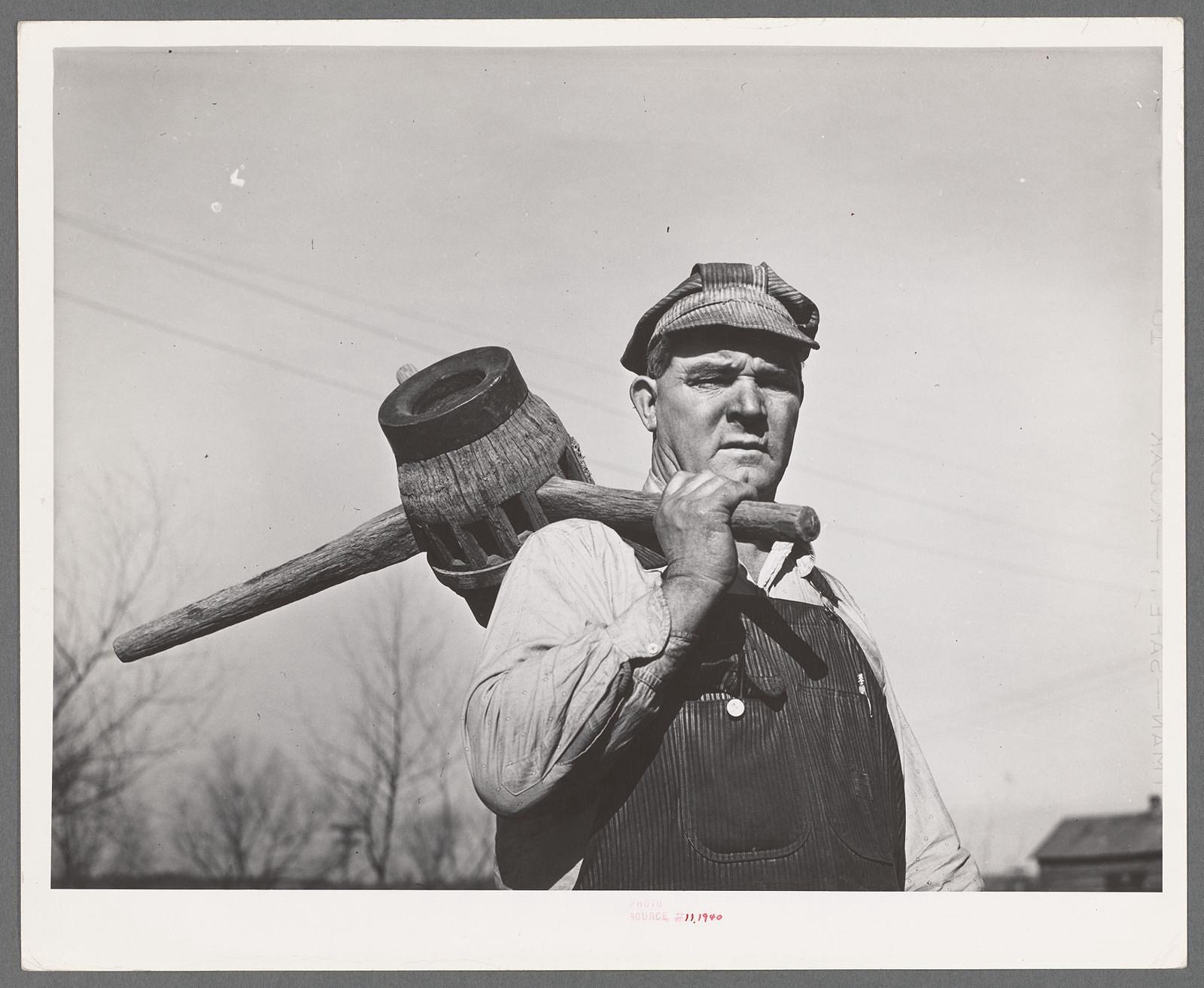
Lee Russell: Blacksmith with wagon wheel hub and spokes. Depew, Oklahoma (1940)
"Silences must frame meaning."
I earlier characterized history as being like tributaries. Like all metaphors, this one should seem imperfect in practice. Imperfect but also essential, for some visualization appears necessary in order for me to produce an orderly—or orderly-seeming—exposition. I dare not just jump all over the place, a practice I've engaged in when performing oral representations of my histories. Short stories don't demand the quality of continuity insisted upon by broader themes. I've more than once already considered that my mission might have always been impossible, even at the beginning when I felt energizing motivation. Like many endeavors, this one began as a Bright Idea! Bright Ideas! bring their own motivating forces with them and require little goosing. Bright Ideas!, however, seem fundamentally different from projects. They might prove to be the seed of a project but will need to mature into something characterized by other than blind enthusiasm. Coherence insists upon something different and much more complex.
I've been amending my original notions about this history since I started laying down the first story.
MigratingHomeward

Jozef Israëls: Homewards (not dated)
"I am the product of apparently inexorable attraction, destinies manifest."
After 1800, the Swift family's arc shifted westerly. Its second century in the Americas would watch it move into, then through the so-called heartland. If family history was a race, the Swift progeny were to win it, for they would be among the first to see The Eden At The End Of The Oregon Trail. They would have to leave the Eden at the other end of that trail, though, and Grayson County, Virginia, clearly also qualifies as an Eden. Even the area of North Carolina where the Thomas Swift family first settled after traveling down The Great Highway from Maryland still seems Eden-like, it having been the setting of the old Andy Griffith Show's Mayberry, a museum in Andy's honor is located near the old Alamance Battlefield. The forces driving western migration were growing, though. Of course, my interest focused on those who left rather than those who stayed. Those who left became my forebears, while those who stayed behind will forever remain ever more distant aunts and uncles, cousins and hangers-on.
The records turn fuzzier after Flower Swift left Grayson County with his discredited son Thomas, probably first for Kentucky.
OddEnds

George W. Boynton, Engraver
T. G. Bradford, Publisher: Maryland (1838)
"The story could have been irretrievably lost in any generation."
Over half of the people coming to the British North American Colonies before the Revolution came as indentures. In 1674, one of my ninth great-grandfathers appeared in court in Maryland. A ship's captain, Thomas Jones, brought my forebear, his servant Edward "Teage," before the court, asking the judge to assess his age. The judge decided he was fourteen. The following year, Jones returned to court to claim a "headright" of land granted to him for transporting Edward Teage and three others to Maryland. A headright claim could grant land to anyone transporting people to the Maryland colony. Typically, those transported then worked as servants to the transporter for some period of years; after, if they survived, they would be free to do whatever they pleased. Fewer than half survived their indenture. Teage survived.
In 1695, Teague was back in court, claiming the right to 300 acres of land.
Prominence
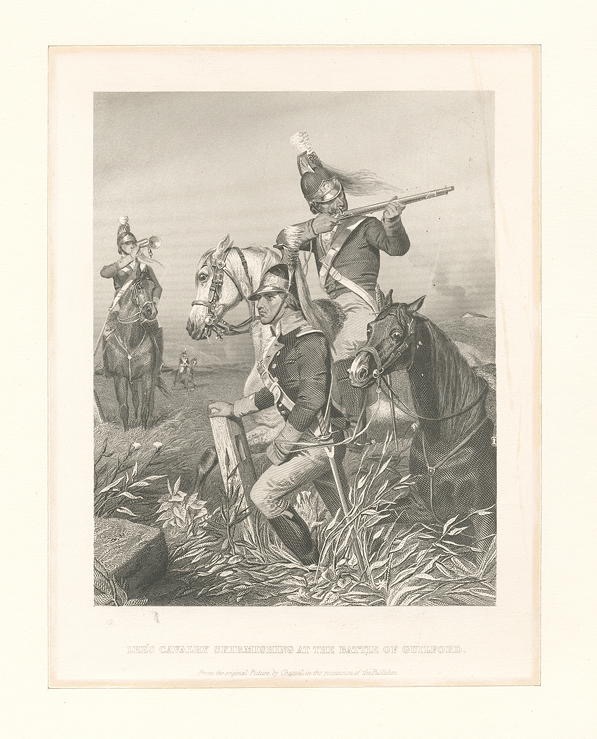
Unknown Artist: Lee's cavalry skirmishing at the Battle of Guilford.
(Print Issued 1789 - 1880)
"He left his Prominence behind."
Perhaps due to his Militia service in the Revolutionary War, my fifth great-grandfather, Flower Swift, rose to Prominence. With this came close brushes with several famous personalities. He served with distinction, though few details have been passed down. Those that survived show him to have been plucky, taking full advantage of his good fortunes. After Charleston's fall but before Camden, he was captured by a Tory patrol. As was the custom, he was disarmed and immediately paroled. Still, before he was dismissed, he overheard two British officers speaking of a planned assault on a crucial Rebel lead mine in his district. He reported this information to his officers, who passed it up the chain, clear to the offices of Virginia's Governor, Thomas Jefferson, who mustered additional militia units, appointing William Campbell, Patrick Henry's brother-in-law, to lead the expedition, and Walter Crockett, Davy's great uncle, as second in command. Swift's company most certainly fought under these in the following Battle of Guilford Courthouse, a pyrrhic victory for British forces that helped weaken the British before Yorktown. He certainly also fought at King's Mountain and in some expeditions against the Cherokee in Tennessee.
Swift served as a quartermaster when not riding or fighting.
Weekly Writing Summary For The Week Ending 3/28/2024
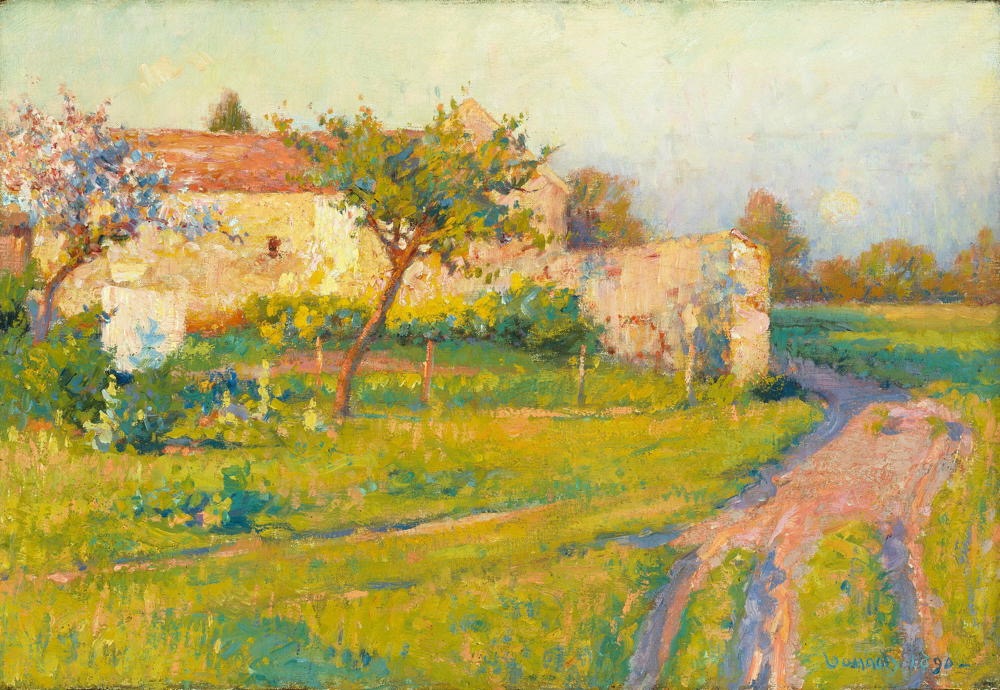
Robert William Vonnoh: Spring in France (1890)
Stories That Might Never Manage To Be Completely Told
Writing history seems very similar to writing fantasy. The writer must focus on coherence and continuity in both genres, for every story demands these. Nobody ever foresees what any story will demand of them. Research always proves wanting. I've been pouring through papers I have been collecting for decades, stumbling upon fresh details, and choosing which might fit into these stories, for no history scales to one inch equals one-inch granularity, and their continuity ultimately relies upon omissions. Complete histories must prove to be utter confusion; ditto with complete fantasies. Infinite effort might eventually prove the most satisfying. John Cage insisted that silence serves as the soul of all music. Mattisse allocated white spaces on his later canvasses. My progeny might easily use my history as a departure point to create some related, perhaps even more pleasing installments, for history seems alive and ever-growing. The actors eventually depart, but they leave behind their more resilient parts, stories that might never manage to be completely told.
Militia

Stefano Della Bella: Virginia (17th century)
"Eye for an eye justice ruled the rough Western edge of our emerging nation."
Some accounts describe Flower Swift as a Quaker, while others report he was likely Baptist. Such distinctions made little difference along Virginia's Western Frontier in the last quarter of the eighteenth century. Swift's wife, Mary Bedsaul, was most certainly a Quaker, having come from an acknowledged Quaker family, and it's recognized that the militia company Swift led, first as a Captain and then later as a Colonel, was labeled a "Quaker" company. He might have been deemed qualified to serve to lead Quakers because he had Quakers in his extended family. Quakers might seem unlikely members of any military force, for even in colonial times, they refused to take the otherwise required oath of allegiance to the Commonwealth:
"We whose names are hereunder subscribed do swear that we renounce all allegiance to George Third, King of Great Britain, his heirs’ successors,
Flower
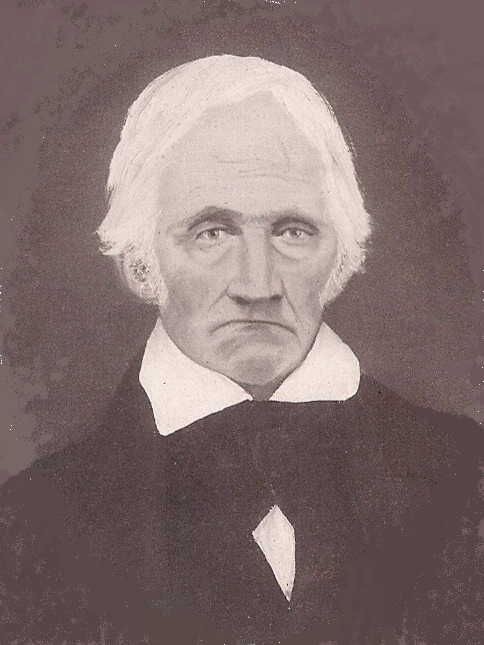
Flower Swift, a fifth Great-grandfather
(artist unknown) circa 1810
"The Revolutionary War was brewing … "
In the decades following the Lewis and Clark expedition, geographers and surveyors scoured the inner-mountain West, attempting to create accurate maps of the newly discovered territory. They were able to produce credible maps, too, which were certainly helpful enough to guide the upcoming pilgrims who would soon be flooding the Plains. Genealogy seems a similar occupation, for I'm scouring unfamiliar territory, seeking the source of incoming flows. If I find evidence of an ancestor, I wonder where they originated. I spot the higher peaks, knowing that more water will likely come off them. The high peaks in genealogical research tend to be the more famous people, for their notoriety encourages more researchers to focus and, therefore, discover more incoming flows.
The highest mountain in my family's history contains the unlikely name of Flower.
PilGrimEconomics
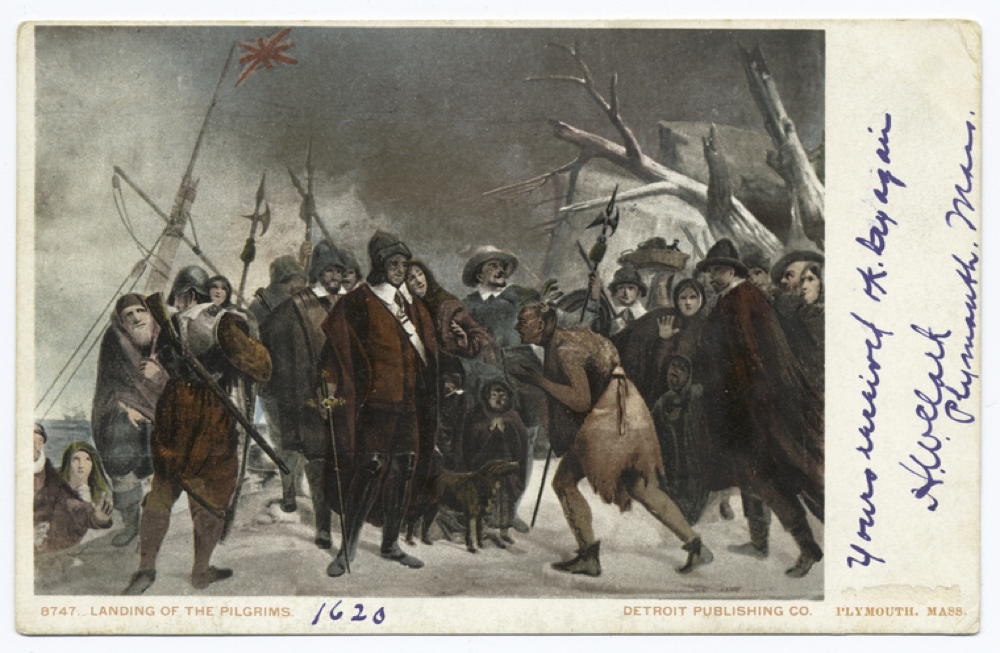
Postcard: Landing of the Pilgrims, Plymouth, Mass. (1898 - 1931)
"Their future insisted upon first routing them through their distant past."
Today, our Pilgrim ancestors are most often characterized as religious people who fled Old World oppression to found a new world rooted in religious liberty. Most pilgrims didn't believe in religious freedom. Besides Roger Williams, who founded a break-away colony in Rhode Island, Pilgrims were the soul of intolerance. Their intolerance was not solely rooted in spiritual conviction but perhaps primarily in economics. They'd mortgaged themselves as well as their ideals to fund their colonies. Not even in the early seventeenth century did money grow on trees. A wealthy congregation member didn't fund their expedition; stock investors did. They fronted our ancestors with the explicit expectation that they would be repaid and expected to be repaid handsomely and quickly, for they imagined they'd outsmarted the market to get in on the bottom floor of unlimited profits. Wasn't that New World brimming with resources ripe for plundering?
As always, the wild-eyed investors wildly underestimated the challenge, as did their Pilgrim debtors.
Perils
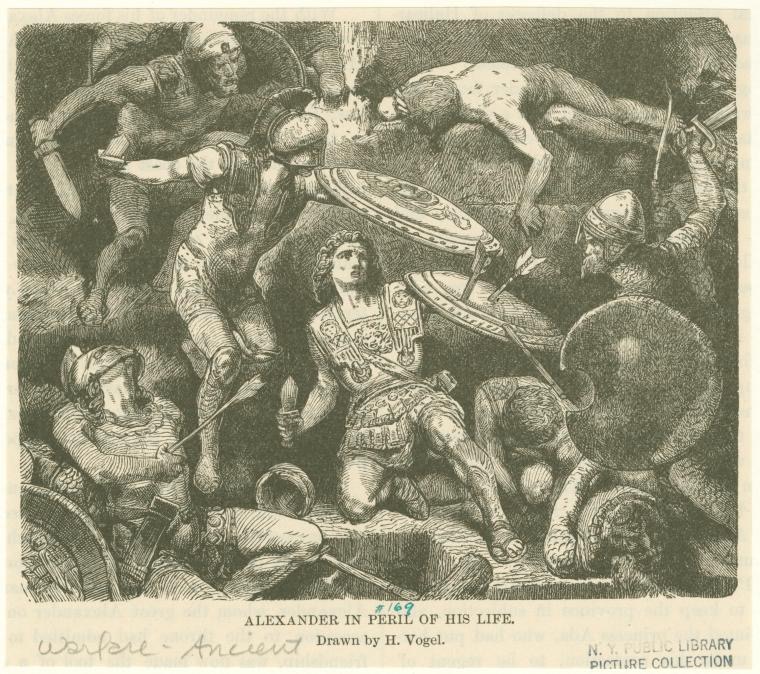
Hermann Vogel: Alexander in peril of his life 1885
" … what it must have meant … "
Writing history seems much more risky than writing my usual Philosophical, Autobiographical, Historical Fiction in the same way fantasy seems less exacting than fact. In fantasy, space wars rely upon thrusters and explosions spouting blossoms of flame that, in reality, simply could never happen. Real space battles would seem dull in comparison. Lest history seem tedious, the seduction to embellish hovers nearby. Who wouldn't want to characterize their forebears as noble? The inherent ambiguity present in any history leaves plenty of room for interpretation. Should I explain that the displaced local natives referred to my great great great grand pops as "a good white man," or am I indulging myself in whitewashing if I mention this, however much truth it might hold? I find myself surrounded by such judgment calls, each a dilemma with no entirely defensible resolution.
I choose. I feel forced to choose blindly.
Jackson

Sidney E. Morse: Iowa (1842 - 1845)
Lionel Pincus and Princess Firyal Map Division
New York Public Library
" … only a little more than one-sixty-fourth of my DNA."
When she died in 1826, my fourth great-grandmother, Rachel Parker Jackson, left behind a four-year-old son with a high falutin' name, Nathaniel Parker Jackson. His paternal grandparents would raise him and his two surviving siblings to maturity near the Ohio River in Miller Township, Indiana. Shortly after his twenty-first birthday in 1843, he would head West toward Iowa territory in an oxcart with his new bride, Elizabeth Jane Teas. There were rumors that his grandparents had been stern replacements for his deceased parents and that he was anxious to get out on his own. I've always wondered why he set out so late in the year, for starting a westward journey in the Spring was more common. They left late in the year and made it only as far as the Burlington, Iowa, Mississippi River ferry crossing before disaster struck. Elizabeth slipped on the ferry and fell into the freezing river. She contracted pneumonia and died on her honeymoon, buried in Burlington, Iowa.
Ferries then were not yet steam-powered.
Parker

Cynthia Ann Parker, or Narua (Was Found),
and daughter, Topsannah (Prairie Flower), in 1861
" … I carry some of their life lessons within me …"
Cynthia Ann Parker, the niece of my fourth great-grandmother, Rachel Parker, might have been the most famous person in the history of our Fambly. She was the granddaughter of famed frontiersman and Revolutionary War soldier John Parker, Rachel's father, who was also a Predestination preacher of a Calvinist sect so conservative that it would have probably refused to grant Calvin admission into their congregation. Parker's vitae reads like a library full of dime-store frontier novels. He helped clear the frontier with Daniel Boone (stay tuned; there's a direct relationship with one of Boone's children in a later chapter), subdued the Cherokee, and generally made life miserable for natives and, later, Mexicans. Steven Austin invited him to migrate into Texas territory in the immediate aftermath of the Alamo debacle, where he founded a fort named after him, which is now Fork Parker State Park near the Texas town of Groesbeck. He was my fifth great-grandfather.
Shortly after he arrived in Texas, his rough blockhouse fort was overrun by Comanche, who killed him and four of his sons, along with other settlers.
Weekly Writing Summary For The Week Ending 3/21/2024
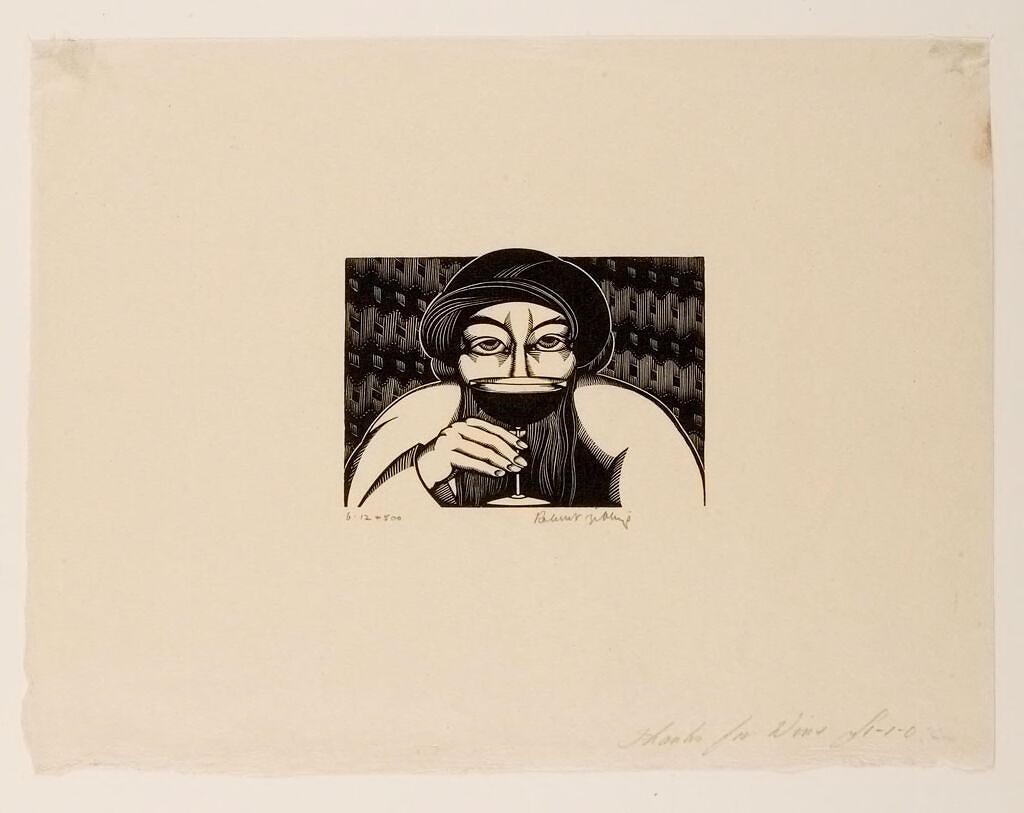
Robert John Gibbings: Thanks for Wine (20th century)
The Freedom To Not Quite Notice
I write without an outline, reorienting myself each morning depending on what I created the day before and how I feel in that moment. My intention involves letting the plot-line emerge rather than concocting it beforehand, though this practice guarantees a few inconsistencies. I cannot return to make up a missed day, for my practice depends upon accepting whatever happens. If my laptop crashes and refuses to produce, I have no net to catch me. My iAlogue Series weighed in at only eighty-five stories rather than the usual ninety due to technology failures and some winter ennui, perfectly normal disruptions. My writing practice depends upon an uncertain amount of innocence on my part, a dedicated absence of artifice. I sometimes embarrass myself, but fortunately for me, I rarely notice. One of the joys of naive practice must be the freedom to not quite notice or care when I crash.
DeepBackground

Robert John Gibbings: Ancient History (20th century)
"I understand who's driving."
Asking where a family comes from presupposes that a family might have originated in some specific place. Mine didn't. Yours probably didn't either. While I sport an apparently German surname, even its origin proves more complicated than any one location might explain, for the part of Germany that part of my family left had been contested territory, sometimes France and other times Germany, for generations and even before that contention, complications existed between ethnicities and religions. I might claim to 'be' German, but my family could just as easily declare a hot half dozen other origins. We've been on the front lines of most of modern history, and who knows how far back we go; other than that, we know for sure that our family, like yours, didn't originally spontaneously appear out of nowhere. I might claim to have had a noteworthy ancestor alive in 500 AD, but anybody can make the same claim even without anybody noteworthy on their tree. Our origins disappear into antiquity, DeepBackGround.
Following my family's progression across just this continent proves equally frustrating, for we have at one time or another claimed to inhabit perhaps a third or more of the present states in this union.


